|
Newsletter
Seminar Material
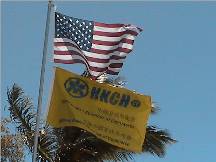



Biz:
China
Hong
Kong Hawaii


What people
said about us

China
Earthquake Relief
Tax &
Government
Hawaii Voter Registration
 Biz-Video
Biz-Video
 Hawaii's
China Connection Hawaii's
China Connection

 CDP#1780962
CDP#1780962

 Doing Business in
Hong Kong & China
Doing Business in
Hong Kong & China
| |
Hong Kong, China & Hawaii Biz*




Do you know our dues
paying members attend events sponsored by our collaboration partners worldwide
at their membership rates - go to our event page to find out more!
After
attended a China/Hong Kong Business/Trade Seminar in Hawaii...still unsure what
to do next, contact us, our Officers, Directors and Founding Members are
actively engaged in China/Hong Kong/Asia trade - we can help!
Are you ready to export your product or
service? You will find out in 3 minutes with resources to help you -
enter
to give it a try

 China Central TV - live webcast
China Central TV - live webcast
 Skype - FREE
Voice Over IP Skype - FREE
Voice Over IP
 View Hawaii's China Connection
Video Trailer
View Hawaii's China Connection
Video Trailer

 Direct link
PDF file
Direct link
PDF file

 Year of the Pig - February 18, 2007
Year of the Pig - February 18, 2007
June 30, 2007
 Hong Kong:
Hong Kong has remained as before a
magnet since it returned to China 10 years ago, and it will surely witness a
"more splendid" future in the embrace of the motherland, Chinese President Hu
Jintao said Wednesday. Hong Kong:
Hong Kong has remained as before a
magnet since it returned to China 10 years ago, and it will surely witness a
"more splendid" future in the embrace of the motherland, Chinese President Hu
Jintao said Wednesday.
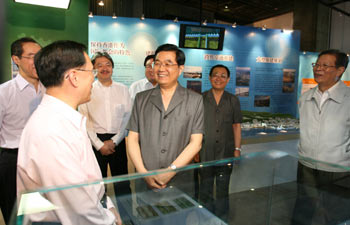 Chinese president Hu Jintao
Wednesday visits an exhibition in Beijing on Hong Kong's achievements in the
decade since its return. Hong Kong has remained as before a magnet since it
returned to China 10 years ago, and it will surely witness a "more splendid"
future in the embrace of the motherland, Chinese President Hu Jintao said
Wednesday.
President Hu Jintao (C) visits the exhibition on
Hong Kong's achievements in a decade in Beijing's Capital Museum on June 27,
2007. As part of celebrations marking the 10th anniversary of Hong Kong's return
to the motherland, the exhibition presents Hong Kong's achievements in the forms
of photos, videos, models and other installations. Hu made the remarks when
visiting an exhibition in Beijing on Hong Kong's achievements in the decade
since its return. Hong Kong's role as a free port and an international finance,
trade and shipping center has remained unchanged under the "one country, two
systems" policy, which has secured the consistency of the social and economic
systems since the special administrative region (SAR) was established there in
1997, Hu said. The president also said that Hong Kong compatriots has become
real masters on their soil as the SAR is witnessing more prosperous economy and
the compatriots there enjoying better living and gradually progressing democracy
since 1997. As part of celebrations marking the 10th anniversary of Hong Kong's
return to the motherland, the exhibition held in the Capital Museum presented
Hong Kong's achievements in the forms of photos, videos, models and other
installations. Hu, accompanied by SAR Chief Executive Donald Tsang, highly
praised the achievements that Hong Kong has accomplished. "With the compatriots'
united efforts and the solid support from the motherland, I firmly believe Hong
Kong will have a more splendid future," Hu said. Vice-President Zeng Qinghong
unveiled the exhibition. Top legislator Wu Bangguo, Premier Wen Jiabao and the
other members of the Standing Committee of the Political Bureau of the Communist
Party of China Central Committee Jia Qinglin, Wu Guanzheng, Li Changchun and Luo
Gan also visited the exhibition Wednesday. Chinese president Hu Jintao
Wednesday visits an exhibition in Beijing on Hong Kong's achievements in the
decade since its return. Hong Kong has remained as before a magnet since it
returned to China 10 years ago, and it will surely witness a "more splendid"
future in the embrace of the motherland, Chinese President Hu Jintao said
Wednesday.
President Hu Jintao (C) visits the exhibition on
Hong Kong's achievements in a decade in Beijing's Capital Museum on June 27,
2007. As part of celebrations marking the 10th anniversary of Hong Kong's return
to the motherland, the exhibition presents Hong Kong's achievements in the forms
of photos, videos, models and other installations. Hu made the remarks when
visiting an exhibition in Beijing on Hong Kong's achievements in the decade
since its return. Hong Kong's role as a free port and an international finance,
trade and shipping center has remained unchanged under the "one country, two
systems" policy, which has secured the consistency of the social and economic
systems since the special administrative region (SAR) was established there in
1997, Hu said. The president also said that Hong Kong compatriots has become
real masters on their soil as the SAR is witnessing more prosperous economy and
the compatriots there enjoying better living and gradually progressing democracy
since 1997. As part of celebrations marking the 10th anniversary of Hong Kong's
return to the motherland, the exhibition held in the Capital Museum presented
Hong Kong's achievements in the forms of photos, videos, models and other
installations. Hu, accompanied by SAR Chief Executive Donald Tsang, highly
praised the achievements that Hong Kong has accomplished. "With the compatriots'
united efforts and the solid support from the motherland, I firmly believe Hong
Kong will have a more splendid future," Hu said. Vice-President Zeng Qinghong
unveiled the exhibition. Top legislator Wu Bangguo, Premier Wen Jiabao and the
other members of the Standing Committee of the Political Bureau of the Communist
Party of China Central Committee Jia Qinglin, Wu Guanzheng, Li Changchun and Luo
Gan also visited the exhibition Wednesday.
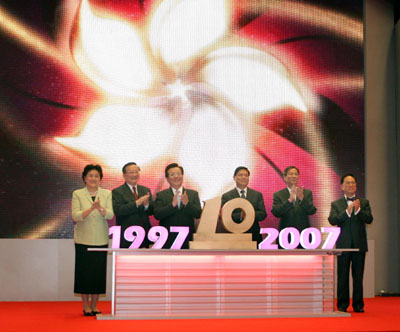 The exhibition on Hong Kong's
achievements in a decade opens in Beijing's Capital Museum on June 27, 2007. As
part of celebrations marking the 10th anniversary of Hong Kong's return to the
motherland, the exhibition presents Hong Kong's achievements in the forms of
photos, videos, models and other installations.
The exhibition on Hong Kong's
achievements in a decade opens in Beijing's Capital Museum on June 27, 2007. As
part of celebrations marking the 10th anniversary of Hong Kong's return to the
motherland, the exhibition presents Hong Kong's achievements in the forms of
photos, videos, models and other installations.
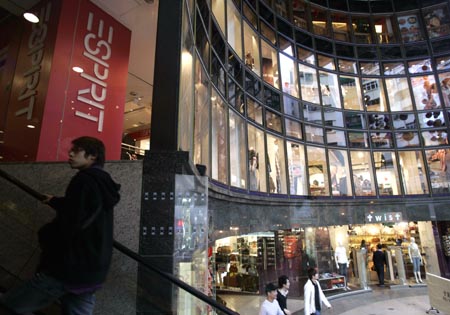 Fashion retailer
Esprit Holdings Ltd, the best- performing stock in Hong Kong's benchmark index
in the past five years, plans to spend $1 billion to acquire an international
luxury brand by next year to boost sales of high-margin clothing. "I would like
to integrate such a brand as a better sister of Esprit and as a role model to
access good designers who normally wouldn't want to work for Esprit," Chief
Executive Officer Heinz Krogner said in Hong Kong. "It doesn't need to be a huge
company and it should not dilute earnings. We aim to buy knowledge of the luxury
segment, not revenue." A luxury brand may boost Hong Kong-based Esprit in
Europe, where it earns most of its revenue selling mass-market products such as
jeans for about 70 euros ($94) and T-shirts for 20 euros. Esprit sells clothes
in more than 40 nations and aims to open a new store, including franchised
outlets, every day in the year from July. "Buying a luxury brand makes sense
because Esprit wants to position itself in Germany at the higher end," said
Erica Poon Werkun, a Hong Kong-based analyst at UBS AG. "Although Esprit targets
the mass market, its products are more expensive than those of its competitors.'
Kroger has previously expressed interest in Donna Karan International Inc. LVMH
Moet Hennessy Louis Vuitton SA, the world's biggest luxury-goods company, bought
Donna Karan in 2001 for $243 million. Esprit's profit in the six months ended
Dec. 31 surged 28 percent to HK$2.4 billion ($307 million) on 25 percent more
sales from Europe. Of the Hang Seng Index's current 39 constituents, Esprit is
the best performing in the past 10 years. Since joining the benchmark in
December 2002, the company's shares have surged 1,660 percent. Fashion retailer
Esprit Holdings Ltd, the best- performing stock in Hong Kong's benchmark index
in the past five years, plans to spend $1 billion to acquire an international
luxury brand by next year to boost sales of high-margin clothing. "I would like
to integrate such a brand as a better sister of Esprit and as a role model to
access good designers who normally wouldn't want to work for Esprit," Chief
Executive Officer Heinz Krogner said in Hong Kong. "It doesn't need to be a huge
company and it should not dilute earnings. We aim to buy knowledge of the luxury
segment, not revenue." A luxury brand may boost Hong Kong-based Esprit in
Europe, where it earns most of its revenue selling mass-market products such as
jeans for about 70 euros ($94) and T-shirts for 20 euros. Esprit sells clothes
in more than 40 nations and aims to open a new store, including franchised
outlets, every day in the year from July. "Buying a luxury brand makes sense
because Esprit wants to position itself in Germany at the higher end," said
Erica Poon Werkun, a Hong Kong-based analyst at UBS AG. "Although Esprit targets
the mass market, its products are more expensive than those of its competitors.'
Kroger has previously expressed interest in Donna Karan International Inc. LVMH
Moet Hennessy Louis Vuitton SA, the world's biggest luxury-goods company, bought
Donna Karan in 2001 for $243 million. Esprit's profit in the six months ended
Dec. 31 surged 28 percent to HK$2.4 billion ($307 million) on 25 percent more
sales from Europe. Of the Hang Seng Index's current 39 constituents, Esprit is
the best performing in the past 10 years. Since joining the benchmark in
December 2002, the company's shares have surged 1,660 percent.
 China:
Beijing has detained 28 officials
following a national audit for their role in misusing more than 46.88 billion
yuan (HK$48.08 billion) in government funds last year, the top auditor said
Wednesday.
China:
Beijing has detained 28 officials
following a national audit for their role in misusing more than 46.88 billion
yuan (HK$48.08 billion) in government funds last year, the top auditor said
Wednesday.
The European aircraft maker Airbus said on Thursday it
planned to deliver 300 A320 planes from an assembly line in north China's port
city Tianjin by 2016 to satisfy the demand in the country. The assembly plant is
a joint venture between Airbus and Tianjin Zhongtian Aviation Industry
Investment Co., a Chinese alliance of China Aviation Industry Corp I, China
Aviation Industry Corp II and Tianjin Bonded Zone Investment Co.
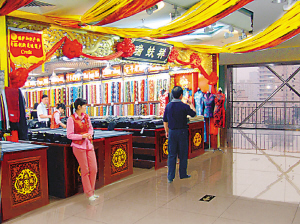 Beijing's
Silk Market (or Xiushui Street) recently expended almost 3 million Yuan (400,000
US dollars) from the "intellectual property rights (IPR) protection fund" to
dissuade 90 shops which may easily take part in infringement acts. This is to
ensure the quality of the top-notch specialized silk area. Picture displays an
old-fashioned brand shop in the Silk Market. Beijing's
Silk Market (or Xiushui Street) recently expended almost 3 million Yuan (400,000
US dollars) from the "intellectual property rights (IPR) protection fund" to
dissuade 90 shops which may easily take part in infringement acts. This is to
ensure the quality of the top-notch specialized silk area. Picture displays an
old-fashioned brand shop in the Silk Market.
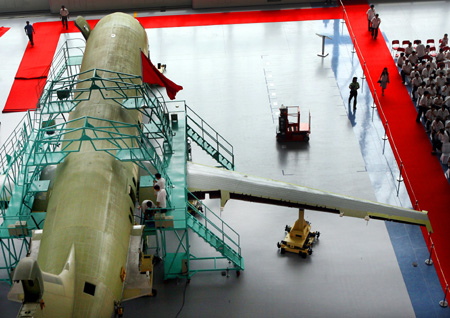 Employees assemble the wings to the
body of an ARJ-21, China's first wholly-made airplane in a hangar in Shanghai,
June 28, 2007. The final assembly began on May 30 this year, and the jetliner
will come off the production line by the end of 2007 and start test flights in
March 2008.
Employees assemble the wings to the
body of an ARJ-21, China's first wholly-made airplane in a hangar in Shanghai,
June 28, 2007. The final assembly began on May 30 this year, and the jetliner
will come off the production line by the end of 2007 and start test flights in
March 2008.
 A boy selects online game
software. China's online game market is seen growing 35% to hit $1.3 billion
this year amid strong growth in Internet users, launches of high-quality games
and yuan appreciation. A boy selects online game
software. China's online game market is seen growing 35% to hit $1.3 billion
this year amid strong growth in Internet users, launches of high-quality games
and yuan appreciation.
China says it will further modernize
traditional Chinese medicine (TCM) in the next 20 years to improve its appeal at
home and overseas as an effective alternative to Western medicine. In
modernizing TCM, efforts will be made to improve standards, study new
applications and standardize planting, production and processing of medicinal
herbs, according to the report of the China National Center for Biotechnology
Development. The government will also work to form a healthcare system where TCM
and western medicine complement each other and build TCM into an industry with
an annual output value of 400 billion yuan (US$52.6 billion), according to the
center, which is under the Ministry of Science and Technology. "China will work
to make sure that a TCM-based health system serves as an important pillar to
people's health, and a healthcare service is established through which 85
percent of the country's rural population have access to TCM," said the report,
released at an international conference on bio-economy. Currently, about 3,000
hospitals in China provide TCM treatments, with patient visits amounting to
nearly 234 million each year.
Beijing poised to launch US$200b
global fund - Mainland seeks better returns for US$1.2 trillion reserves.
Beijing has moved a step closer to launching its huge state investment company,
detailing plans for a US$200 billion reserve fund that could bankroll the
nation's efforts to become a key force in international financial markets. The
Ministry of Finance yesterday formally submitted a proposal for the bond issue
to the National People's Congress, signalling the authorities want better
returns for the country's US$1.2 trillion in foreign exchange reserves and at
the same time raise "China Inc's" profile. While Beijing is increasingly moving
to bring its rising economic power to bear on global markets, it is also trying
to tame a flood of liquidity and runaway growth that has sent domestic stock
markets soaring. The top legislature is today expected to endorse a bill that
would scrap or reduce tax on interest income from personal bank savings to deter
funds flowing into the equity markets. To fund the new investment company, the
finance ministry will issue 1.55 trillion yuan of tradable special treasury
bonds to buy US$200 billion of foreign reserves. The bonds would have a 10-year
term or longer.
June 29, 2007
 Hong Kong:
Horse still to race on and even more joyously! What has been the genuine effect
in a decade after Hong Kong's return to Chinese sovereignty? This question has
arrested not only the attention of people across China, but given rise to a
flurry of discussion around the world. Hong Kong will soon mark the tenth
anniversary of its return to China. The Times magazine of the United States has
carried a cover story on Hong Kong to the denial of a pessimistic and incorrect
prediction of sister publication Forbes a decade ago that Hong Kong would
gradually die after its return. The Times story cites Hong Kong as more vigorous
today than anytime in history. Meanwhile, the New York Time noted in an article
that the vestiges of British rule in Hong Kong will vanish and yet no one feels
it sorrowful. Even the last Hong Kong Governor Chris Patten, who also served as
Chancellor of Oxford University and the former EU Commissioner for foreign
affairs, said recently: "Overall, Hong Kong remains a very special place 10
years after its proper and inevitable return to Chinese sovereignty." Such
optimistic, affirmative appraisals have strong evidences to back up. The "fine
and sturdy steed" of Hong Kong still races on and even more joyously. To date,
it has acceded to the 190-plus international organizations in the name of "Hong
Kong, China" and 134 countries and regions have granted it an entry visa
exemption treatment. The number of aliens having immigrated to Hong Kong rose by
a 60-fold in the past decade. Hong Kong's economy has revived with its best
performance recorded over the past two decades, and its potential competitive
edge ranks the first among the top 50 global economic entities, acknowledged a
report from Japan. "Chinese sovereignty" and "Hong Kong way of life" best
epitomizes what it looks like after a decade following it return to China most
succinctly. Louis Cha, a Chinese scholar and an ace roving knight tales writer,
depicts the present situation with a popular simile that Hong Kongers today are
still under the thumbs of their wives instead of their regional government. A
couple of media moguls, who are known for their free speech on their own, note
they now enjoy much more rights to the job of editing over the past 20 years.
Hong Kongers' demand for a unique social system, the way of life and core values
has been retained and carried on without any "alterations". Many local residents
were not sure whether or not to immigrate elsewhere overseas as they had felt
that they dwelled on a tract of "borrowed" or leased land prior to Hong Kong's
return to the motherland and, after the return, they have turned more and more
resolved to take root in the city. The outcome of varied polls or social surveys
conducted recently show that Hong Kong people have greatly increasing the
recognition of their homeland and a growing number of locals turn to the
interior region as their reliable rear area. With regard of a few crises in Hong
Kong over recent years, the central government has exerted its utmost to help
tide over their and resolve the related thorny problems there in cases of the
Asian financial storms of 1997-98, the fight against SARS of 2003, forging CEPA
and opening the "free accesses to travel' in early and mid of the first decade
at the turn of the new century. Mr. Li Ka Shing, a wise Hong Kong businessman,
was fair and square when he said Hong Kong did not need to cover any national
revenue. On the contrary, central authorities has always taken to heart the
interest of Hong Kong, so local people should valuate the priceless support of
the motherland. Hong Kong's road ahead, nevertheless, is full of both
opportunities and challenges. How to shape and enhance its competition edge, how
to resolve the widening income gap, how to dissolve social bias and
discrimination, and how to spur and carry forward democracy orderly and
steadily? ¨C All these questions call for great wisdom and talents for the
solution. Fortunately, People in Hong Kong know clearly what they need most and
their society is more mature. Hong Kong has the type of people with the best
intelligence and a most ideal pioneering spirit. Chief Executive Donald Tsang
Yam-kuen has spurred himself on not to be reconciled to mediocre but to pursue
things preeminent. In the incoming decade, Hong Kongers, with an utter devotion
coupled with an all-out effort, will not have to simply repeat what they had
accomplished over the past 10 years, and so the "superb Hong Kong spirit" is
sure to re-emerge and demonstrate to the entire world vividly and distinctly. Hong Kong:
Horse still to race on and even more joyously! What has been the genuine effect
in a decade after Hong Kong's return to Chinese sovereignty? This question has
arrested not only the attention of people across China, but given rise to a
flurry of discussion around the world. Hong Kong will soon mark the tenth
anniversary of its return to China. The Times magazine of the United States has
carried a cover story on Hong Kong to the denial of a pessimistic and incorrect
prediction of sister publication Forbes a decade ago that Hong Kong would
gradually die after its return. The Times story cites Hong Kong as more vigorous
today than anytime in history. Meanwhile, the New York Time noted in an article
that the vestiges of British rule in Hong Kong will vanish and yet no one feels
it sorrowful. Even the last Hong Kong Governor Chris Patten, who also served as
Chancellor of Oxford University and the former EU Commissioner for foreign
affairs, said recently: "Overall, Hong Kong remains a very special place 10
years after its proper and inevitable return to Chinese sovereignty." Such
optimistic, affirmative appraisals have strong evidences to back up. The "fine
and sturdy steed" of Hong Kong still races on and even more joyously. To date,
it has acceded to the 190-plus international organizations in the name of "Hong
Kong, China" and 134 countries and regions have granted it an entry visa
exemption treatment. The number of aliens having immigrated to Hong Kong rose by
a 60-fold in the past decade. Hong Kong's economy has revived with its best
performance recorded over the past two decades, and its potential competitive
edge ranks the first among the top 50 global economic entities, acknowledged a
report from Japan. "Chinese sovereignty" and "Hong Kong way of life" best
epitomizes what it looks like after a decade following it return to China most
succinctly. Louis Cha, a Chinese scholar and an ace roving knight tales writer,
depicts the present situation with a popular simile that Hong Kongers today are
still under the thumbs of their wives instead of their regional government. A
couple of media moguls, who are known for their free speech on their own, note
they now enjoy much more rights to the job of editing over the past 20 years.
Hong Kongers' demand for a unique social system, the way of life and core values
has been retained and carried on without any "alterations". Many local residents
were not sure whether or not to immigrate elsewhere overseas as they had felt
that they dwelled on a tract of "borrowed" or leased land prior to Hong Kong's
return to the motherland and, after the return, they have turned more and more
resolved to take root in the city. The outcome of varied polls or social surveys
conducted recently show that Hong Kong people have greatly increasing the
recognition of their homeland and a growing number of locals turn to the
interior region as their reliable rear area. With regard of a few crises in Hong
Kong over recent years, the central government has exerted its utmost to help
tide over their and resolve the related thorny problems there in cases of the
Asian financial storms of 1997-98, the fight against SARS of 2003, forging CEPA
and opening the "free accesses to travel' in early and mid of the first decade
at the turn of the new century. Mr. Li Ka Shing, a wise Hong Kong businessman,
was fair and square when he said Hong Kong did not need to cover any national
revenue. On the contrary, central authorities has always taken to heart the
interest of Hong Kong, so local people should valuate the priceless support of
the motherland. Hong Kong's road ahead, nevertheless, is full of both
opportunities and challenges. How to shape and enhance its competition edge, how
to resolve the widening income gap, how to dissolve social bias and
discrimination, and how to spur and carry forward democracy orderly and
steadily? ¨C All these questions call for great wisdom and talents for the
solution. Fortunately, People in Hong Kong know clearly what they need most and
their society is more mature. Hong Kong has the type of people with the best
intelligence and a most ideal pioneering spirit. Chief Executive Donald Tsang
Yam-kuen has spurred himself on not to be reconciled to mediocre but to pursue
things preeminent. In the incoming decade, Hong Kongers, with an utter devotion
coupled with an all-out effort, will not have to simply repeat what they had
accomplished over the past 10 years, and so the "superb Hong Kong spirit" is
sure to re-emerge and demonstrate to the entire world vividly and distinctly.
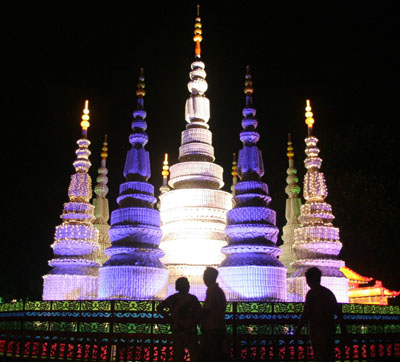 A set of tower-shaped porcelain
lights are seen during the trial period of a lantern fair in Nanjing, capital of
east China's Jiangsu Province on June 26, 2007. The fair is part of the city's
celebrations of the 10th anniversary of Hong Kong's return to China.
A set of tower-shaped porcelain
lights are seen during the trial period of a lantern fair in Nanjing, capital of
east China's Jiangsu Province on June 26, 2007. The fair is part of the city's
celebrations of the 10th anniversary of Hong Kong's return to China.
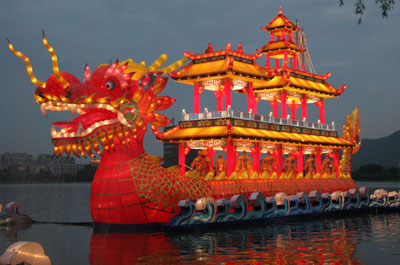 A dragon boat-shaped light is seen during the trial
period of a lantern fair in Nanjing, capital of east China's Jiangsu Province on
June 26, 2007. The fair is part of the city's celebrations of the 10th
anniversary of Hong Kong's return to the motherland.
A dragon boat-shaped light is seen during the trial
period of a lantern fair in Nanjing, capital of east China's Jiangsu Province on
June 26, 2007. The fair is part of the city's celebrations of the 10th
anniversary of Hong Kong's return to the motherland.
Lan Kwai Fong tops HK nightlife - As
the World City of Asia, Hong Kong is known for its vibrant 24-hour lifestyle.
And when the sun goes down, Lan Kwai Fong is the place to party, with its
collection of bars, pubs, and restaurants. Lan Kwai Fong, Hong Kong's trendiest
nightlife street. And it's probably the most westernized place in town, drawing
thousands of tourists, expatriates, and locals every day. Lan Kwai Fong is a
Hong Kong icon. It's a place where people of different cultures can meet, and
find good food and drinks and late night fun. As the saying goes, if you work
hard, you've got to play hard. And Lan Kwai Fong is just the right place to do
it. Dutch tourist, said, "People here are friendly, open, welcoming. I feel like
home." Australian tourist, said, "It's quite a bazaar with everybody outside
drinking, dancing, standing." Many bar owners and customers here are foreign
nationals. And no matter where they come from, Lan Kwai Fong has become part of
their life. Mr. Fox came to Hong Kong over 20 years ago from California in the
United States. At Lan Kwai Fong, he found a place that reminds him of home --
the California Restaurant. For the past 20 years, he's sat in this seat almost
every day. Customer, Lan Kwai Fong, said, "I came here every…my second
family…second child" 27 years ago, a young Canadian, Allan Zeman, opened the
first restaurant in Lan Kwai Fong. It was he who later transformed the area into
a dazzling bar street. And his name is now linked to many other Hong Kong
successes besides the world-renowned entertainment zone. Allan Zeman said, "If
the walls can tell the story, …so many different events happening in Lan Kwai
Fong…became the meeting place where from all the world….They really made me the
father of Lan Kwai Fong." Now Allan Zeman owns 17 restaurants in Lan Kwai Fong.
After Hong Kong's return in 1997, he brought Lan Kwai Fong to Shanghai. And
Zeman says his next stop will be China's capital city, Beijing.
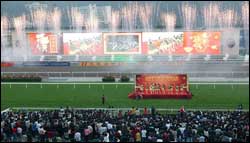 One of the thrills for visitors to Hong
Kong is one of its most popular sports--horse racing. Why does the sport hold
such a special place in the hearts of local residents? And how has horse racing
retained its characteristics over the many years? For over a century, horse
racing has thrilled Hong Kong people, providing first-class entertainment to a
highly enthusiastic public. Here at the Sha Tin race course, jockeys from
different countries are making the final preparations. With a seating capacity
of up to 85,000, Sha Tin is always packed during the race season. Mao Xuzhi, Sha
Tin racecourse, HK, said, "Gambling is illegal here in Hong Kong, except for
lotteries and horse racing. Their horse comes in first." This old punter, Mr.
Huo, has been betting on horses for over 3 decades. Like all his fellow punters
here, he enjoys studying the traits and performance of the horses. Mr. Huo says
he loves to watch the jockeys in action. Another horse racing fan, Mr. Lee, says
the sport has become a symbol of Hong Kong. That explains in part why
horse-racing has been a big industry for the past 150 years. Winfried
Engelbrecht-Bresges, CEO, the HK Jockey club, said, "Horse racing in Hong Kong
is a life style. People of HK are very competitive. They like things fast. They
like to be risky. Deng Xiaoping said horse-racing and dancing continue in HK.
This is definitely the way what has continued here." Behind these gambling-mad
crowds and the world-class horses and jockeys is the controller of all Hong Kong
horse racing, the Jockey Club. It's also the city's biggest tax payer and
charity donor. It gives about 1 billion Hong Kong dollars each year to
charitable causes. Thanks to the central government's commitment and support
after Hong Kong's return, the Jockey Club is still a winner after 10 years. And
it's convinced that Hong Kong's special system will provide a solid guarantee
for the future of the racing industry. One of the thrills for visitors to Hong
Kong is one of its most popular sports--horse racing. Why does the sport hold
such a special place in the hearts of local residents? And how has horse racing
retained its characteristics over the many years? For over a century, horse
racing has thrilled Hong Kong people, providing first-class entertainment to a
highly enthusiastic public. Here at the Sha Tin race course, jockeys from
different countries are making the final preparations. With a seating capacity
of up to 85,000, Sha Tin is always packed during the race season. Mao Xuzhi, Sha
Tin racecourse, HK, said, "Gambling is illegal here in Hong Kong, except for
lotteries and horse racing. Their horse comes in first." This old punter, Mr.
Huo, has been betting on horses for over 3 decades. Like all his fellow punters
here, he enjoys studying the traits and performance of the horses. Mr. Huo says
he loves to watch the jockeys in action. Another horse racing fan, Mr. Lee, says
the sport has become a symbol of Hong Kong. That explains in part why
horse-racing has been a big industry for the past 150 years. Winfried
Engelbrecht-Bresges, CEO, the HK Jockey club, said, "Horse racing in Hong Kong
is a life style. People of HK are very competitive. They like things fast. They
like to be risky. Deng Xiaoping said horse-racing and dancing continue in HK.
This is definitely the way what has continued here." Behind these gambling-mad
crowds and the world-class horses and jockeys is the controller of all Hong Kong
horse racing, the Jockey Club. It's also the city's biggest tax payer and
charity donor. It gives about 1 billion Hong Kong dollars each year to
charitable causes. Thanks to the central government's commitment and support
after Hong Kong's return, the Jockey Club is still a winner after 10 years. And
it's convinced that Hong Kong's special system will provide a solid guarantee
for the future of the racing industry.
Hong Kong by day shines just as
brightly. The city has a well-deserved reputation as a dining and shopping
paradise. It serves up some of the best Chinese cuisine in the world, and the
shops have visitors from all over opening their wallets. Dining is certainly one
of the highlights of Hong Kong. Outstanding Chinese cuisine can be easily found
here, like roast goose. Traditional cooking methods are well preserved, as well
as authentic flavors. The momentum of the Hong Kong economy in recent years has
ensured the local catering industry handsome profits. Kan Kun-Sing, owner Yung
Kee restaurant, said, "Our business in the past decade was much better than
before because Hong Kong remains a financial center and the economy is pretty
good. Besides, more tourists are coming from the mainland and that has been
really good for business." Dim Sum is another Hong Kong specialty. Steamed prawn
dumplings, sponge cake and pork dumplings are just a few of the delicious
mouthfuls. Western cuisine also has a place on Hong Kong tables. The huge flow
of people and the wealth they bring have attracted many of the world's finest
chefs and restaurants. Kevin NG, asst. general manager Sir Hudson, Italian
restaurant, said, "We have seen great potential at present and also in the
future for Italian food in Hong Kong. There are many factors, like people in
Hong Kong, they are very willing to try new style, new design, also the spending
power is extremely high." Equally amazing are the city's shopping options. From
department stores and shopping malls to small boutiques and bargain stalls,
there's something for everyone. Hong Kong's position of an international free
trade hub enables the city to provide global shoppers the most diversified,
quality merchandise at competitive prices. And it's not just the ladies who go
on spending sprees. Australian shopper, said, "I have been here for two weeks
and I have been shopping everyday and I can spend a year shopping, I think. (Q:
How much have you spent?) Probably, some 6,000 US dollars. (Q: What did you
buy?) Clothes, shoes, gifts for wife and everything." A pleasant shopping
experience helps bring customers back again and again. According to the Hong
Kong SAR government, the total revenue in the retail sector reached nearly 21
billion Hong Kong dollars in 2006, just over a fifth of the total of the entire
tourism industry. Hong Kong remains one of the top destinations for dining and
shopping in the world, but one thing has changed--the main driving force behind
the growth. Last year, the Chinese mainland accounted for more than half of the
visitors to Hong Kong. And they have tremendous purchasing power. This shows a
close economic connection with the mainland is vital for Hong Kong's business
prosperity.
China Mobile, the country's biggest
mobile-telephone operator, yesterday surpassed HSBC Holdings to become Hong
Kong's largest company by market capitalization as investors bet the red chip
will launch a mainland listing as soon as August. The top spot, reached only
days before the 10th anniversary of Hong Kong's handover, underscores the
ascendancy of mainland companies in the city as well as investor demand for
shares likely to benefit from a surge in the nation's stock market. China Mobile
rose 0.65 per cent to close at a new high of HK$84.80, bringing its market
capitalization to HK$1.7 trillion. HSBC fell 0.07 per cent to HK$144.10,
lowering its market capitalization to HK$1.69 trillion.
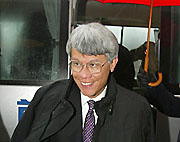 The first issuance of China's yuan-
denominated bonds in Hong Kong by China Development Bank will be available for
retail subscription starting today with the minimum investment set at HK$20,000.
As the coupon of the bonds is set at 3 percent - much higher than the typical
0.8 percent rate offered by local banks on yuan deposits - the response is
expected to be robust. The retail order book will be closed on July 6. Hong Kong
Monetary Authority chief executive Joseph Yam Chi-kwong said after the launch
ceremony Tuesday that the second issuance of yuan bonds may come soon. "The
management arrangement for issuing yuan bonds in Hong Kong by mainland financial
institutions is already in place. There is actually nothing to stop them from
coming," Yam told reporters. The Export-Import Bank of China, a fully
government-owned policy bank under the direct leadership of the State Council,
is believed to be the second mainland financial institution preparing to issue
yuan bonds in Hong Kong. The bank said earlier its board had approved the
issuance, and will proceed with the sale here after obtaining approval from the
People's Bank of China. The first issuance of China's yuan-
denominated bonds in Hong Kong by China Development Bank will be available for
retail subscription starting today with the minimum investment set at HK$20,000.
As the coupon of the bonds is set at 3 percent - much higher than the typical
0.8 percent rate offered by local banks on yuan deposits - the response is
expected to be robust. The retail order book will be closed on July 6. Hong Kong
Monetary Authority chief executive Joseph Yam Chi-kwong said after the launch
ceremony Tuesday that the second issuance of yuan bonds may come soon. "The
management arrangement for issuing yuan bonds in Hong Kong by mainland financial
institutions is already in place. There is actually nothing to stop them from
coming," Yam told reporters. The Export-Import Bank of China, a fully
government-owned policy bank under the direct leadership of the State Council,
is believed to be the second mainland financial institution preparing to issue
yuan bonds in Hong Kong. The bank said earlier its board had approved the
issuance, and will proceed with the sale here after obtaining approval from the
People's Bank of China.
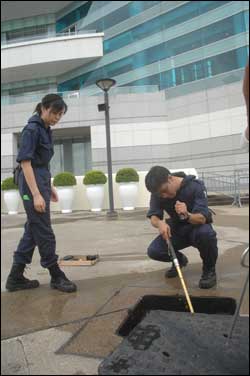 President Hu Jintao will lead a delegation of senior central government
officials for a three-day visit to Hong Kong from Friday to Sunday to celebrate
the 10th anniversary of the establishment of the HKSAR. He will also officiate
at the swearing-in ceremony of the chief executive and the principal officials
of the third- term government Sunday. It will be Hu's first visit to Hong Kong
as president, though he first visited the SAR in 1999. None of those
accompanying Hu on the trip are from the Politburo Standing Committee. Chief
Executive Donald Tsang Yam-kuen has also invited the governors of nine mainland
provinces, as well as Macau Chief Executive Edmund Ho Hau-wah. Among the
mainland leaders coming are Minister of Commerce Bo Xilai and State Development
and Reform Commission director Ma Kai, who is expected to announce the further
liberalization of Hong Kong professional services practice in the mainland under
Phase IV of the Closer Economic Partnership Arrangement. As anticipated by local
medical institutions, the new CEPA concessions will give medical practitioners
more opportunities to practice and set up clinics in the mainland. In a brief
announcement of Hu's visit, Tsang said: "At this historic moment to mark the
10th anniversary since the handover, we are greatly honored to have central
leaders to attend the inauguration ceremony of the third term of the SAR
government and relevant celebration activities in Hong Kong. "On behalf of the
people of Hong Kong and the SAR government, I extend our warmest welcome and
deepest gratitude to them." In the interests of security, Hu's itinerary was not
announced. However, it is known Hu is keen to meet the local community and
expected to visit the home of a local family after his arrival Friday morning.
He is then expected be taken on a private sightseeing tour to familiarize
himself with Hong Kong's latest developments as an international financial hub
and shipping center. In the evening, he will attend a private dinner hosted by
Tsang at Government House. Hu will have a full program Saturday. As chairman of
the Chinese Communist Party Central Military Commission, Hu will first inspect
the People's Liberation Army Hong Kong Garrison at Stonecutters Island. He will
then go to Ocean Park to open the panda habitat where the new pair of giant
pandas, Ying Ying and Le Le, will be making their public debut. The pandas were
a gift from the central government to mark the 10th anniversary of the handover.
Hu will also visit the Commission of Foreign Ministry before stopping for lunch.
President Hu Jintao will lead a delegation of senior central government
officials for a three-day visit to Hong Kong from Friday to Sunday to celebrate
the 10th anniversary of the establishment of the HKSAR. He will also officiate
at the swearing-in ceremony of the chief executive and the principal officials
of the third- term government Sunday. It will be Hu's first visit to Hong Kong
as president, though he first visited the SAR in 1999. None of those
accompanying Hu on the trip are from the Politburo Standing Committee. Chief
Executive Donald Tsang Yam-kuen has also invited the governors of nine mainland
provinces, as well as Macau Chief Executive Edmund Ho Hau-wah. Among the
mainland leaders coming are Minister of Commerce Bo Xilai and State Development
and Reform Commission director Ma Kai, who is expected to announce the further
liberalization of Hong Kong professional services practice in the mainland under
Phase IV of the Closer Economic Partnership Arrangement. As anticipated by local
medical institutions, the new CEPA concessions will give medical practitioners
more opportunities to practice and set up clinics in the mainland. In a brief
announcement of Hu's visit, Tsang said: "At this historic moment to mark the
10th anniversary since the handover, we are greatly honored to have central
leaders to attend the inauguration ceremony of the third term of the SAR
government and relevant celebration activities in Hong Kong. "On behalf of the
people of Hong Kong and the SAR government, I extend our warmest welcome and
deepest gratitude to them." In the interests of security, Hu's itinerary was not
announced. However, it is known Hu is keen to meet the local community and
expected to visit the home of a local family after his arrival Friday morning.
He is then expected be taken on a private sightseeing tour to familiarize
himself with Hong Kong's latest developments as an international financial hub
and shipping center. In the evening, he will attend a private dinner hosted by
Tsang at Government House. Hu will have a full program Saturday. As chairman of
the Chinese Communist Party Central Military Commission, Hu will first inspect
the People's Liberation Army Hong Kong Garrison at Stonecutters Island. He will
then go to Ocean Park to open the panda habitat where the new pair of giant
pandas, Ying Ying and Le Le, will be making their public debut. The pandas were
a gift from the central government to mark the 10th anniversary of the handover.
Hu will also visit the Commission of Foreign Ministry before stopping for lunch.
 China: China
has banned the production of chlorofluorocarbons (CFCs) in line with global
agreements to phase out the use of ozone layer-depleting products, the country's
environmental watchdog said in a statement.
China: China
has banned the production of chlorofluorocarbons (CFCs) in line with global
agreements to phase out the use of ozone layer-depleting products, the country's
environmental watchdog said in a statement.
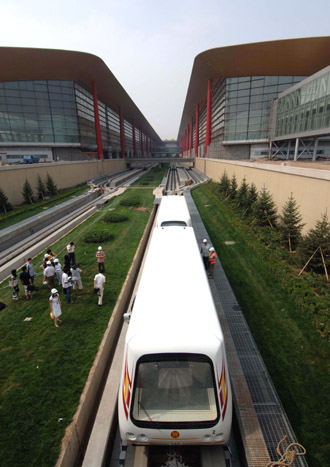 A
self-controlled train moves for a test run as it makes its debut at the Beijing
Capital Airport in Beijing, June 26, 2007. The passenger train will be running
between terminals of the airport after the third terminal is put to use before
the Olympic Games. A
self-controlled train moves for a test run as it makes its debut at the Beijing
Capital Airport in Beijing, June 26, 2007. The passenger train will be running
between terminals of the airport after the third terminal is put to use before
the Olympic Games.
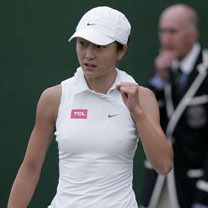 China's Yan Zi gestures
during her singles match against Italy's Tathiana Garbin at the Wimbledon tennis
championships in London June 27, 2007. China's Yan Zi gestures
during her singles match against Italy's Tathiana Garbin at the Wimbledon tennis
championships in London June 27, 2007.
 Theme song for Chow's
"Secret" debuts earlier than film - Taiwan pop king Jay Chow (L) promotes his
directorial debut "Secret Cannot Be Told" with his lead actress Guey Lun-mei.
Although the post-production work on pop king Jay Chow's directorial debut,
"Secret", is yet to be finished, the themed song of the film has been scheduled
for release in Asia on Thursday. The Beijing News reported on Wednesday. Chow's
long-time partner Vincent Fang took charge of the lyrics for the song, which has
been described by Chow as "a shining point" of the film. According to Chow, this
time he tried to emulate Britpop in composing the song - quite a different
approach from his other film music hits, such as "Ju Hua Tai", the theme song of
"Curse of Golden Flower" and another song he made for Jet Li's kungfu film "Huo
Yuan Jia". Theme song for Chow's
"Secret" debuts earlier than film - Taiwan pop king Jay Chow (L) promotes his
directorial debut "Secret Cannot Be Told" with his lead actress Guey Lun-mei.
Although the post-production work on pop king Jay Chow's directorial debut,
"Secret", is yet to be finished, the themed song of the film has been scheduled
for release in Asia on Thursday. The Beijing News reported on Wednesday. Chow's
long-time partner Vincent Fang took charge of the lyrics for the song, which has
been described by Chow as "a shining point" of the film. According to Chow, this
time he tried to emulate Britpop in composing the song - quite a different
approach from his other film music hits, such as "Ju Hua Tai", the theme song of
"Curse of Golden Flower" and another song he made for Jet Li's kungfu film "Huo
Yuan Jia".
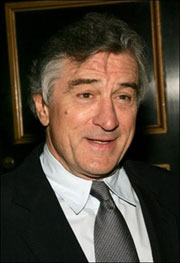 Hollywood legend
Robert DeNiro, seen here in 2006, is the co-founder of the Tribeca film festival
which is heading to China despite strict movie censorship in the communist
nation. The Tribeca film festival, co-founded by Hollywood legend Robert DeNiro,
is heading to China next month despite strict movie censorship in the communist
nation. The festival, which was set up in New York in 2002 as a response to the
previous year's September 11 World Trade Center attacks, will appear in
Beijing's artistic 798 quarter on July 10-11, Xinhua news agency said. The
festival hopes to promote independent US and Chinese films, organisers said.
"With films from China having played a major role in the Tribeca Film Festival's
first six years -- and having won several of our major awards in the bargain --
we're happy to begin this new international collaboration," said Peter Scarlet,
artistic director of the Tribeca Film Festival. Tribeca has screened 18
feature-length and short films from Chinese filmmakers since 2002, four of which
have scooped festival awards, Xinhua said. The Beijing edition will open with an
outdoor screening of Planet B-Boy, a documentary by Korean-American director
Benson Lee about the resurgence of break-dancing. "Never in my wildest dreams
could I have predicted that we would be showing Planet B-boy to an audience of
7,000 people... at the World Trade Center area, let alone at another outdoor
screening on the other side of the world in Beijing," said Lee, according to
Xinhua. Tribeca, named after the area of New York where it is based, was set up
by De Niro, producer Jane Rosenthal and philanthropist Craig Hatkoff to try to
help breathe life back into the downtown area following the 2001 attacks. In
China, foreign and domestic movies often suffer at the hands of the government's
censors. Only a handful of international films make it to national distribution
each year, and those that do are often cut. China's film censors recently cut
out large sections of the latest "Pirates of the Caribbean" film, cutting in
half actor Chow Yun-Fat's role because it allegedly humiliated the Chinese
people. The Oscar-winning "The Departed" faced a ban on the mainland this year. Hollywood legend
Robert DeNiro, seen here in 2006, is the co-founder of the Tribeca film festival
which is heading to China despite strict movie censorship in the communist
nation. The Tribeca film festival, co-founded by Hollywood legend Robert DeNiro,
is heading to China next month despite strict movie censorship in the communist
nation. The festival, which was set up in New York in 2002 as a response to the
previous year's September 11 World Trade Center attacks, will appear in
Beijing's artistic 798 quarter on July 10-11, Xinhua news agency said. The
festival hopes to promote independent US and Chinese films, organisers said.
"With films from China having played a major role in the Tribeca Film Festival's
first six years -- and having won several of our major awards in the bargain --
we're happy to begin this new international collaboration," said Peter Scarlet,
artistic director of the Tribeca Film Festival. Tribeca has screened 18
feature-length and short films from Chinese filmmakers since 2002, four of which
have scooped festival awards, Xinhua said. The Beijing edition will open with an
outdoor screening of Planet B-Boy, a documentary by Korean-American director
Benson Lee about the resurgence of break-dancing. "Never in my wildest dreams
could I have predicted that we would be showing Planet B-boy to an audience of
7,000 people... at the World Trade Center area, let alone at another outdoor
screening on the other side of the world in Beijing," said Lee, according to
Xinhua. Tribeca, named after the area of New York where it is based, was set up
by De Niro, producer Jane Rosenthal and philanthropist Craig Hatkoff to try to
help breathe life back into the downtown area following the 2001 attacks. In
China, foreign and domestic movies often suffer at the hands of the government's
censors. Only a handful of international films make it to national distribution
each year, and those that do are often cut. China's film censors recently cut
out large sections of the latest "Pirates of the Caribbean" film, cutting in
half actor Chow Yun-Fat's role because it allegedly humiliated the Chinese
people. The Oscar-winning "The Departed" faced a ban on the mainland this year.
June 28, 2007
 Hong Kong:
President Hu Jintao will visit Hong Kong this week for celebrations marking the
10th anniversary of the handover, state media reported on Tuesday. Mr Hu will
arrive in Hong Kong on Friday and stay until Sunday July 1 “to attend a mass
gathering marking the 10th anniversary of Hong Kong’s return to the mainland,”
Xinhua reported. This will be Mr Hu’s first visit to the city. The report did
not say whether he would come with any other state leaders. Xinhua said Mr Hu
would also attend the inaugural ceremony of the third-term Hong Kong Special
Administrative Region government during the visit. Hong Kong:
President Hu Jintao will visit Hong Kong this week for celebrations marking the
10th anniversary of the handover, state media reported on Tuesday. Mr Hu will
arrive in Hong Kong on Friday and stay until Sunday July 1 “to attend a mass
gathering marking the 10th anniversary of Hong Kong’s return to the mainland,”
Xinhua reported. This will be Mr Hu’s first visit to the city. The report did
not say whether he would come with any other state leaders. Xinhua said Mr Hu
would also attend the inaugural ceremony of the third-term Hong Kong Special
Administrative Region government during the visit.
China Development Bank (CDB)
announced Tuesday that it will issue five billion yuan (US$657 million) RMB bond
in Hong Kong, and this is the first Chinese currency bond to be launched outside
the Chinese mainland. The two-year bond, which will be synchronously sold to
institutions and individual investors from June 27 to July 6, yields three
percent annually. The return is relatively high compared to the 0.7 percent
interest rate for six-month deposit here, with the anticipation of RMB
appreciation. The minimum subscription for an individual investor is 20,000
yuan, and at least one billion yuan of the bond is targeting at retail
investors. The joint lead managers and bookrunners for the bond issue are Bank
of China (Hong Kong) and The Hong Kong and Shanghai Banking Corporation Limited.
The distributors comprise of 14 placing banks with branches in Hong Kong,
including Bank of Communications, China Construction Bank (Asia), Dah Sing Bank,
and The Bank of East Asia. The bond did not apply for independent ratings. CDB
Governor Chen Yuan explained that despite the bank's on-going market- oriented
reform, CDB will adhere to its mission of helping to achieve the government's
goals, and "our debt rating will also remain intact." CDB is China's largest
policy bank and solely owned by the Ministry of Finance. It has been raising
capital by issuing bonds since 1998, and has been given sovereign ratings by
Moody's, Standard and Poor's and Fitch Ratings. Analysts say both Hong Kong and
the mainland could benefit from floating RMB outside the mainland. "The issuance
of RMB bonds here will strengthen Hong Kong's status as an international
financial center," Ma Delun, assistant governor of the People's Bank of China,
said at the launch ceremony of the bond. The issuance of renminbi bonds in Hong
Kong signifies the city' s role as the country's premier international finance
center, giving local investors more choice, said Henry Tang, financial secretary
of the Hong Kong Special Administrative Region government, when addressing the
ceremony. "The arrangement is a fresh step in Hong Kong-Mainland co- operation,"
he said.
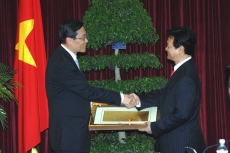 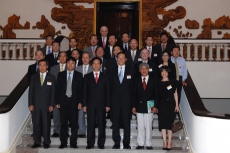 Hong Kong the best business partner
for Vietnam enterprises - Hong Kong is Vietnam's best partner for capturing
business opportunities arising from the country's recent accession to the World
Trade Organization, Mr Peter Woo, chairman of the Hong Kong Trade Development
Council, told more than 200 business executives in Ho Chi Minh City today. Mr.
Woo, who is leading a 17-member Hong Kong business delegation to Vietnam, said
that Hong Kong is an ideal conduit for Vietnamese businesses. Through Hong Kong,
they can get all the services support and contacts they need to connect with
world markets. The TDC delegation visited Hanoi, the Vietnamese capital, on
Monday and Tuesday before going on to Ho Chi Minh City. In Hanoi, the delegation
met with the Vietnamese Prime Minister, Mr. Nguyen Tan Dung, who welcomed Hong
Kong businesses to invest in Vietnam. Mr. Nguyen said that overseas investment
was an integral component of Vietnam's economic development. He added that his
government would provide favorable conditions to help Hong Kong investors do
more business in the country, particularly in the financial, banking, insurance,
securities, shipping and manufacturing sectors. The Prime Minister also agreed
that Hong Kong has the infrastructure, as well as the international experience
and contacts, to serve as a useful platform for Vietnamese companies looking to
connect with world markets. Earlier, the delegation was briefed by Minister of
Trade Mr Truong Dinh Tuyen and Vice-minister of Planning and Investment Mr
Nguyen Bich Dat on the latest developments in Vietnam, including laws recently
introduced to create a more effective business environment in the country.
Hong Kong the best business partner
for Vietnam enterprises - Hong Kong is Vietnam's best partner for capturing
business opportunities arising from the country's recent accession to the World
Trade Organization, Mr Peter Woo, chairman of the Hong Kong Trade Development
Council, told more than 200 business executives in Ho Chi Minh City today. Mr.
Woo, who is leading a 17-member Hong Kong business delegation to Vietnam, said
that Hong Kong is an ideal conduit for Vietnamese businesses. Through Hong Kong,
they can get all the services support and contacts they need to connect with
world markets. The TDC delegation visited Hanoi, the Vietnamese capital, on
Monday and Tuesday before going on to Ho Chi Minh City. In Hanoi, the delegation
met with the Vietnamese Prime Minister, Mr. Nguyen Tan Dung, who welcomed Hong
Kong businesses to invest in Vietnam. Mr. Nguyen said that overseas investment
was an integral component of Vietnam's economic development. He added that his
government would provide favorable conditions to help Hong Kong investors do
more business in the country, particularly in the financial, banking, insurance,
securities, shipping and manufacturing sectors. The Prime Minister also agreed
that Hong Kong has the infrastructure, as well as the international experience
and contacts, to serve as a useful platform for Vietnamese companies looking to
connect with world markets. Earlier, the delegation was briefed by Minister of
Trade Mr Truong Dinh Tuyen and Vice-minister of Planning and Investment Mr
Nguyen Bich Dat on the latest developments in Vietnam, including laws recently
introduced to create a more effective business environment in the country.
Hong Kong will be the main
beneficiary when the Hong Kong-Zhuhai-Macau Bridge is up and running, a senior
official of the mainland's top planning body said yesterday. National
Development and Reform Commission deputy chairman Zhang Xiaoqiang said a
mainland study showed Hong Kong would enjoy 64 per cent of the economic benefit
brought by the long-awaited bridge. But an academic who has studied the issue
said his conclusions were exactly the opposite and the Pearl River Delta cities
of Zhuhai , Zhongshan and Jiangmen would be the big winners. The 29km bridge is
still at the planning stage despite a decade of negotiations. Mr Zhang said the
mainland study, which projected the economic gain brought by an expected
increase in cross-border traffic, also estimated that Guangdong would secure 26
per cent of the benefits and Macau 10 per cent. "The bridge will be effective in
helping Hong Kong expand its hinterland," he said. But Mr Zhang said this did
not necessarily mean Hong Kong should invest more in the bridge's construction
because it would be up to companies interested in the project to negotiate a
stake. "Under the principle of attracting more private investment, it will be up
to the companies to decide who will contribute more," he said, adding that the
governments would be responsible for financing checkpoints and links. Mr Zhang
is also head of a special taskforce set up by the State Council late last year
after the plan became bogged down by disputes over issues such as the location
of checkpoints and the sharing of the construction costs, estimated at US$3.7
billion. He said some consensus had been achieved after several meetings between
representatives from the three governments, but there was still no timetable.
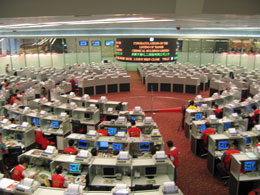 M & A activity heats up in China -
Mergers and acquisitions in China has soared to a record high in the first half
of this year demonstrating the Mainland's budding affinity with investors and
bankers. According to Thomson Financial, M & A deals have witnessed a surge in
58.3% to US$39.1 billion, slightly more as compared to the second half of last
year. Despite a busy launch, the M&As in the first half of 2007 is still lagging
behind its highest ever semi-annual figures of US$44.7 billion that was
witnessed in the second half of 2000. Violet Chung, a senior portfolio manager
at Pacific Capital Management, speculated that the M&A rise and fall cycle will
be powered by a combination of low interest rates, especially in Japan, as well
as high liquidity. A combination of factors such as a thriving stock market and
a clamor for stakes in Chinese firms have made China into Asia's most dazzling
platform for investment banking. China also radiates a growing allure for share
sales, trailing behind the U.S. in global equity issuance in the first half of
this year. Some of the largest money-making deals this year include the Rowsley
purchase of solar energy company Perfect Field Investment, the Chinese
government's US$3 billion investment in Blackstone Group as well as Dongfang
Electrical Machine's US$2.8 billion offer for Dongfang Boiler. Marco Mak, the
head of research at Taifook Securities, expressed confidence that the situation
would remain upbeat for as long as companies are still in the process of
restructuring and purchasing assets from parent firms. It is revealed that the
technology sector is a haven for foreign investors, while the preferences of
Mainland companies lie with foreign operations in the business sector. Mainland
companies are also scrambling for IPOs. China CITIC Bank Corp's US$5.9 billion
dual listing in Hong Kong and Shanghai was the world's second-largest initial
public offering so far this year. This has propelled China to own 15.2% share of
the global market, runner-up to the US in terms of IPO activity. To top it off,
an icing on the cake is the number of Mainland firms going public on U.S.
exchanges. With 10 companies raising US$2.2 billion on the New York Stock
Exchange and Nasdaq Stock Market, a new record high has been set, doubling last
year's full-year total. M & A activity heats up in China -
Mergers and acquisitions in China has soared to a record high in the first half
of this year demonstrating the Mainland's budding affinity with investors and
bankers. According to Thomson Financial, M & A deals have witnessed a surge in
58.3% to US$39.1 billion, slightly more as compared to the second half of last
year. Despite a busy launch, the M&As in the first half of 2007 is still lagging
behind its highest ever semi-annual figures of US$44.7 billion that was
witnessed in the second half of 2000. Violet Chung, a senior portfolio manager
at Pacific Capital Management, speculated that the M&A rise and fall cycle will
be powered by a combination of low interest rates, especially in Japan, as well
as high liquidity. A combination of factors such as a thriving stock market and
a clamor for stakes in Chinese firms have made China into Asia's most dazzling
platform for investment banking. China also radiates a growing allure for share
sales, trailing behind the U.S. in global equity issuance in the first half of
this year. Some of the largest money-making deals this year include the Rowsley
purchase of solar energy company Perfect Field Investment, the Chinese
government's US$3 billion investment in Blackstone Group as well as Dongfang
Electrical Machine's US$2.8 billion offer for Dongfang Boiler. Marco Mak, the
head of research at Taifook Securities, expressed confidence that the situation
would remain upbeat for as long as companies are still in the process of
restructuring and purchasing assets from parent firms. It is revealed that the
technology sector is a haven for foreign investors, while the preferences of
Mainland companies lie with foreign operations in the business sector. Mainland
companies are also scrambling for IPOs. China CITIC Bank Corp's US$5.9 billion
dual listing in Hong Kong and Shanghai was the world's second-largest initial
public offering so far this year. This has propelled China to own 15.2% share of
the global market, runner-up to the US in terms of IPO activity. To top it off,
an icing on the cake is the number of Mainland firms going public on U.S.
exchanges. With 10 companies raising US$2.2 billion on the New York Stock
Exchange and Nasdaq Stock Market, a new record high has been set, doubling last
year's full-year total.
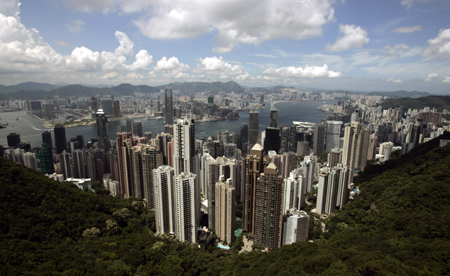 Regulator to ease
limits on domestic investments to HK - The China Banking Regulatory Commission
will soon relax existing regulations on overseas investments by domestic
investors, The Standard reported Monday, citing a mainland source. The Standard,
citing the source, said the mainland regulator will soon allow domestic
investors to invest about 70 percent of their funds in Hong Kong stocks, up from
the current limit of 50 percent, under the Qualified Domestic Institutional
Investor (QDII) program. Hong Kong is so far the only market approved for
overseas investments under the QDII scheme. The minimum amount of money required
for an investor to buy a product under the program will drop to less than
100,000 yuan (US$13,130) and could be as low as 10,000 yuan, the newspaper said.
The new minimum investment represents a dramatic drop from the previous entry
fee of 300,000 yuan for a single investment, it said. There have been
discussions to allow trust funds to be included in the scheme, the source told
the newspaper, without specifying the parties involved in the talks. Regulator to ease
limits on domestic investments to HK - The China Banking Regulatory Commission
will soon relax existing regulations on overseas investments by domestic
investors, The Standard reported Monday, citing a mainland source. The Standard,
citing the source, said the mainland regulator will soon allow domestic
investors to invest about 70 percent of their funds in Hong Kong stocks, up from
the current limit of 50 percent, under the Qualified Domestic Institutional
Investor (QDII) program. Hong Kong is so far the only market approved for
overseas investments under the QDII scheme. The minimum amount of money required
for an investor to buy a product under the program will drop to less than
100,000 yuan (US$13,130) and could be as low as 10,000 yuan, the newspaper said.
The new minimum investment represents a dramatic drop from the previous entry
fee of 300,000 yuan for a single investment, it said. There have been
discussions to allow trust funds to be included in the scheme, the source told
the newspaper, without specifying the parties involved in the talks.
HSBC Holdings (0005) group chairman
Stephen Green said Monday the lender's US subprime mortgage division will not be
affected by last week's news that Bear Stearns, one of the largest global
investment banks, will have to bail out two of its hedge funds that had bet
heavily on subprime mortgage assets.
A HK$3 billion bid from Wheelock
Properties (0049) has triggered an auction for a Wong Tai Sin residential site,
where analysts believe developers could face potential uncertainty over the plot
ratio.
Shares of refiner China Petroleum &
Chemical Corp (0386), better known as Sinopec, tumbled Monday as investors
rattled by the news of chairman Chen Tonghai's resignation dumped the stock.
Standard Chartered (2888), the
British bank that makes most of its money in Asia, said it will introduce
private banking services in eight to 10 more mainland cities by 2010 as the
number of wealthy people soars.
RREEF, the property investment arm
of Deutsche Bank and manager of the recently listed RREEF China Commercial Trust
REIT (0625), is teaming up with a private equity firm to build more than 25
hotels in the mainland under the Hilton Garden Inn brand in a US$550 million
(HK$4.29 billion) deal.
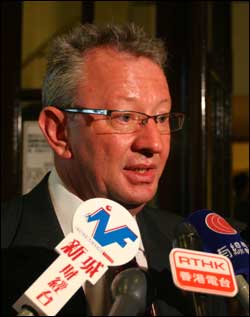 Hospital
Authority chief executive Shane Solomon has apologized and retracted comments he
made hours earlier accusing frontline doctors and their unions of leaking
information on medical mishaps to bolster their demands for better pay. After
attending Monday's meeting of the Legislative Council's health services panel,
Solomon said: "I think the political purpose is to put pressure on the Hospital
Authority and say that we have a crisis in medical staffing." His comments
provoked an outcry from a legislator as well as the Frontline Doctors' Union,
forcing him to backtrack. "I would like to apologize for the confusion and
frustration that may have been caused to the parties concerned with my remarks
made after the health services panel this morning," he said. "I'd like to
clarify that the political motives which I mentioned were totally unrelated to
the recent request for salary adjustment by Hospital Authority doctors and their
unions. As these remarks may have created concerns on the legitimacy of their
intention and recent actions, I've decided to withdraw them." Hospital
Authority chief executive Shane Solomon has apologized and retracted comments he
made hours earlier accusing frontline doctors and their unions of leaking
information on medical mishaps to bolster their demands for better pay. After
attending Monday's meeting of the Legislative Council's health services panel,
Solomon said: "I think the political purpose is to put pressure on the Hospital
Authority and say that we have a crisis in medical staffing." His comments
provoked an outcry from a legislator as well as the Frontline Doctors' Union,
forcing him to backtrack. "I would like to apologize for the confusion and
frustration that may have been caused to the parties concerned with my remarks
made after the health services panel this morning," he said. "I'd like to
clarify that the political motives which I mentioned were totally unrelated to
the recent request for salary adjustment by Hospital Authority doctors and their
unions. As these remarks may have created concerns on the legitimacy of their
intention and recent actions, I've decided to withdraw them."
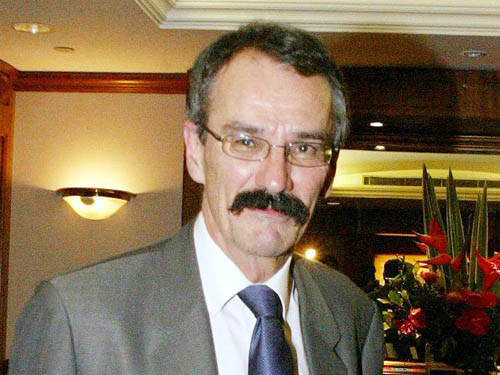 The controversy
over the Hong Kong Institute of Education has taken a fresh twist, with its
ruling council ordering Paul Morris to go on immediate leave as its president,
and deciding not to keep him on as a teacher when his term ends in September.
The council said yesterday's decision to send him on leave would enable the
institute to "turn a new leaf". Professor Morris condemned it as unnecessary.
Lawmakers, staff and student representatives called it unreasonable and
irrational. Some lawmakers called it revenge for his part in the recent
commission of inquiry into interference in the institute's autonomy, whose
findings led former chief education civil servant Fanny Law Fan Chiu-fun to quit
as anti-graft chief. Professor Morris said a council subcommittee had issued a
directive saying: "With the president becoming a central character in the
committee of inquiry, the committee has requested that the president be directed
to take leave immediately and that he be directed not to make any public
statement in relation to the HKIEd while on leave." He said: "I hope this
decision doesn't send the wrong message to the academic community about the
value the council places on academic freedom." The institute's ruling council
made the decision at a meeting to discuss whether or not to offer Professor
Morris a four-year professorship at the end of his term as president in
September. The body, which is dominated by political appointees, voted 13 to
five against offering him the job. Council vice-chairman Eddie Ng Hak-kim said
Professor Morris had been sent on leave to allow a new management team to take
over as soon as possible. Academic vice-president Lee Wing-on will serve as
acting president. Mr Ng said the professor's contract stated he would be offered
a professorship until 2011 if his performance as president was satisfactory.
Council members felt there was some room for improvement in the president's
performance, but said individual members had their own reasons for the decision.
Speaking in a personal capacity as he was about to fly to Britain, Professor
Morris said he was surprised the subcommittee set up to review the inquiry
findings had come to the conclusion he should be sent on immediate leave and not
be allowed to make any public statements. The controversy
over the Hong Kong Institute of Education has taken a fresh twist, with its
ruling council ordering Paul Morris to go on immediate leave as its president,
and deciding not to keep him on as a teacher when his term ends in September.
The council said yesterday's decision to send him on leave would enable the
institute to "turn a new leaf". Professor Morris condemned it as unnecessary.
Lawmakers, staff and student representatives called it unreasonable and
irrational. Some lawmakers called it revenge for his part in the recent
commission of inquiry into interference in the institute's autonomy, whose
findings led former chief education civil servant Fanny Law Fan Chiu-fun to quit
as anti-graft chief. Professor Morris said a council subcommittee had issued a
directive saying: "With the president becoming a central character in the
committee of inquiry, the committee has requested that the president be directed
to take leave immediately and that he be directed not to make any public
statement in relation to the HKIEd while on leave." He said: "I hope this
decision doesn't send the wrong message to the academic community about the
value the council places on academic freedom." The institute's ruling council
made the decision at a meeting to discuss whether or not to offer Professor
Morris a four-year professorship at the end of his term as president in
September. The body, which is dominated by political appointees, voted 13 to
five against offering him the job. Council vice-chairman Eddie Ng Hak-kim said
Professor Morris had been sent on leave to allow a new management team to take
over as soon as possible. Academic vice-president Lee Wing-on will serve as
acting president. Mr Ng said the professor's contract stated he would be offered
a professorship until 2011 if his performance as president was satisfactory.
Council members felt there was some room for improvement in the president's
performance, but said individual members had their own reasons for the decision.
Speaking in a personal capacity as he was about to fly to Britain, Professor
Morris said he was surprised the subcommittee set up to review the inquiry
findings had come to the conclusion he should be sent on immediate leave and not
be allowed to make any public statements.
 China: Mexico
and China Assess Bi-lateral Trade Relationship - Chinese and Mexican trade
officials met on 29 May in Mexico City to discuss several aspects of their
growing bi-lateral relationship. Mexico's Secretary of the Economy Eduardo Sojo
said that the two countries need to develop a relationship based on dialogue and
co-operation in order to better understand each other's interests and concerns.
Mexican officials expressed concern about the mounting trade deficit with China,
which reached an estimated US$22,700 million in 2006, and reiterated
longstanding industry worries about China's enforcement of intellectual property
rights, China's subsidization of export activities and the illegal transshipment
of Chinese products through third countries. Sojo also highlighted the
importance of finding ways to expand market access opportunities for Mexican
agricultural products in China, including by enhancing bi-lateral co-operation
in sanitary matters. Like other countries in the region, Mexico is trying to
achieve a delicate balance in its relationship with China that seeks to attract
Chinese investment and increase exports of industrial and agricultural
commodities to China while ensuring that its manufacturing sector is not
negatively impacted by rising imports from the mainland. Mexican businesses are
keenly interested in exporting their products to China but, at the same time,
many companies regularly complain about pirated or illegally imported Chinese
products and favour a strong trade remedy regime to shield key industries from a
flood of illegally subsidized and dumped products from China.
China: Mexico
and China Assess Bi-lateral Trade Relationship - Chinese and Mexican trade
officials met on 29 May in Mexico City to discuss several aspects of their
growing bi-lateral relationship. Mexico's Secretary of the Economy Eduardo Sojo
said that the two countries need to develop a relationship based on dialogue and
co-operation in order to better understand each other's interests and concerns.
Mexican officials expressed concern about the mounting trade deficit with China,
which reached an estimated US$22,700 million in 2006, and reiterated
longstanding industry worries about China's enforcement of intellectual property
rights, China's subsidization of export activities and the illegal transshipment
of Chinese products through third countries. Sojo also highlighted the
importance of finding ways to expand market access opportunities for Mexican
agricultural products in China, including by enhancing bi-lateral co-operation
in sanitary matters. Like other countries in the region, Mexico is trying to
achieve a delicate balance in its relationship with China that seeks to attract
Chinese investment and increase exports of industrial and agricultural
commodities to China while ensuring that its manufacturing sector is not
negatively impacted by rising imports from the mainland. Mexican businesses are
keenly interested in exporting their products to China but, at the same time,
many companies regularly complain about pirated or illegally imported Chinese
products and favour a strong trade remedy regime to shield key industries from a
flood of illegally subsidized and dumped products from China.
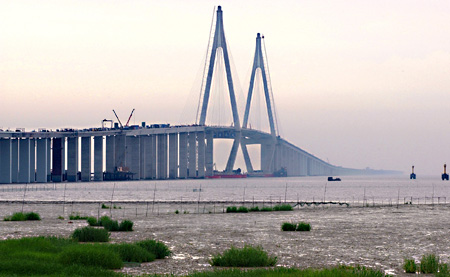 Cable towers of the bridge across
the Hangzhou Bay in East China are seen on June 26, 2007. The 36-kilometer
(22-mile) bridge that its builders claim is the world's longest sea-crossing
structure was formally linked-up Tuesday just south of Shanghai.
Cable towers of the bridge across
the Hangzhou Bay in East China are seen on June 26, 2007. The 36-kilometer
(22-mile) bridge that its builders claim is the world's longest sea-crossing
structure was formally linked-up Tuesday just south of Shanghai.
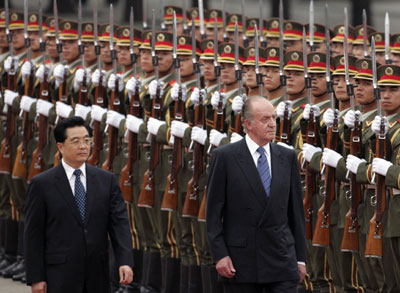 China's President Hu
Jintao (L) and Spain's King Juan Carlos review the honor guard during a welcome
ceremony outside the Great Hall of the People in Beijing June 26, 2007.
China's President Hu
Jintao (L) and Spain's King Juan Carlos review the honor guard during a welcome
ceremony outside the Great Hall of the People in Beijing June 26, 2007.
 Hainan Eld's Deer are seen at a natural reserve in South China's Hainan
Province, June 1, 2007. Population of this species has
increased from bottom 26 to 1,785 in
efforts of the local government to protect wild animals.
Hainan Eld's Deer are seen at a natural reserve in South China's Hainan
Province, June 1, 2007. Population of this species has
increased from bottom 26 to 1,785 in
efforts of the local government to protect wild animals.
HSBC Holdings, the European bank,
said it would buy part of an office tower in Shanghai to house its China
headquarters as it speeds up expansion in China. HSBC agreed to buy naming
rights and occupy 20 floors of one of the twin towers of the Shanghai
International Finance Center, to be completed by 2010, from Sun Hung Kai
Properties, HSBC said in a statement to the Hong Kong Stock Exchange. The tower,
a few blocks from the bank¡¯s current headquarters, would be renamed HSBC
Building-Shanghai IFC. Stephen K. Green, the chairman of HSBC, disclosed the
deal at a news conference in Shanghai, but he declined to say how much the bank
had agreed to pay.
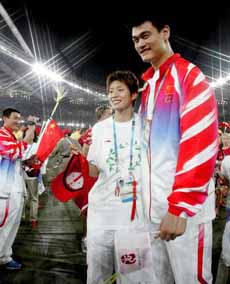 Yao Ming and his girlfriend Ye Li - China's All Star
NBA centre Yao Ming will wed his teenage sweetheart from Shanghai in August,
after an eight-year courtship, state press reported Monday. Yao, who has kept
his love life closely guarded from the media, will marry Ye Li in a private
family ceremony possibly in Shanghai, the eastern metropolis where they were
born, met and began dating, the Titan Sports Weekly said. "This is a match based
on pure love," the paper said. The 2.26 metre (seven-foot-six-inch) centre first
met Ye in 1999 when he was playing for the Shanghai Sharks men's team and the
1.9 metre Ye was with the club's women's team. Ye has since gone on to play for
the national side, but has been plagued with injuries in recent years. The two
were seen walking hand-in-hand at the closing ceremony of the 2004 Athens
Olympics, when their courtship first became public. According to Titan Sports,
Ye, 25, has been a regular at Yao's home in Texas where he stars for the Houston
Rockets. She has also studied English at the University of Houston. Yao, 27, is
expected to return to China in July to train and will play matches with the
national team in September. The paper played down widespread rumors on the
Internet and in the Chinese media that Yao's wedding would be broadcast live on
television, with China's Olympic gold medal-winning hurdler Liu Xiang acting as
the master-of-ceremonies. "On that day there will be no media, basically it will
only be relatives from both sides attending," the paper said. "Yao Ming and Ye
Li are doing what they can to protect themselves. They do not want to see any
outside factors interfering."
Yao Ming and his girlfriend Ye Li - China's All Star
NBA centre Yao Ming will wed his teenage sweetheart from Shanghai in August,
after an eight-year courtship, state press reported Monday. Yao, who has kept
his love life closely guarded from the media, will marry Ye Li in a private
family ceremony possibly in Shanghai, the eastern metropolis where they were
born, met and began dating, the Titan Sports Weekly said. "This is a match based
on pure love," the paper said. The 2.26 metre (seven-foot-six-inch) centre first
met Ye in 1999 when he was playing for the Shanghai Sharks men's team and the
1.9 metre Ye was with the club's women's team. Ye has since gone on to play for
the national side, but has been plagued with injuries in recent years. The two
were seen walking hand-in-hand at the closing ceremony of the 2004 Athens
Olympics, when their courtship first became public. According to Titan Sports,
Ye, 25, has been a regular at Yao's home in Texas where he stars for the Houston
Rockets. She has also studied English at the University of Houston. Yao, 27, is
expected to return to China in July to train and will play matches with the
national team in September. The paper played down widespread rumors on the
Internet and in the Chinese media that Yao's wedding would be broadcast live on
television, with China's Olympic gold medal-winning hurdler Liu Xiang acting as
the master-of-ceremonies. "On that day there will be no media, basically it will
only be relatives from both sides attending," the paper said. "Yao Ming and Ye
Li are doing what they can to protect themselves. They do not want to see any
outside factors interfering."
Shares in China COSCO Holdings more
than doubled in its Shanghai IPO on Tuesday, after attracting a record $214
billion in subscriptions.
Thailand, Southeast Asia's second- biggest economy, plans to buy electricity
from China for the first time starting in 2017 because the country is not
building its own plants fast enough to meet an expected surge in demand.
June 27, 2007
 Hong Kong:
A mass meeting was held in Hong Kong on Sunday to celebrate the 10th anniversary
of the People's Liberation Army (PLA) troops' stationing in the Hong Kong
Special Administrative Region (HKSAR). An order of commendation in honor of the
PLA troops in the HKSAR signed by Hu Jintao, chairman of the Central Military
Commission (CMC), was read at the meeting. On July 1, 1997, the day of Hong
Kong's historic return to the motherland, the PLA Hong Kong Garrison moved into
the HKSAR on the orders of the CMC. Over the past 10 years, the PLA Garrison has
firmly implemented decisions and orders of the Central Committee of the
Communist Party of China (CPC), the State Council and the CMC, and has always
observed the Basic Law of Hong Kong and the law governing the PLA garrison in
the HKSAR, the order of commendation said. The PLA Garrison, which has respected
the HKSAR Government and Hong Kong people, has made an outstanding contribution
to the prosperity and stability of Hong Kong, it said. Ge Zhenfeng, deputy chief
of the General Staff of the People's Liberation Army, said in his address that
the PLA garrison troops in Hong Kong firmly put into practice the principle of
"one country, two systems", and contributed substantially to Hong Kong's
prosperity and stability. In the past 10 years, the troops won wide support from
HKSAR government and Hong Kong people, who helped the garrison troops a lot to
fulfill its responsibility for Hong Kong's defense affairs, Ge added. On behalf
of the PLA's general headquarters, Ge expressed heartfelt thanks to the HKSAR
government, all social sectors and Hong Kong people. Chief Executive of HKSAR
Donald Tsang thanked the PLA garrison troops in Hong Kong for its contribution
to Hong Kong's prosperity and stability during the past 10 years. He said the
PLA garrison troops firmly implemented the principle of "one country, two
systems" in the last 10 years and created a grand image by their actions. "Your
efforts have won trust and admiration from Hong Kong people," Tsang said. Wang
Jitang, commander of PLA garrison troops in Hong Kong, said that on July 1,
1997, the PLA Hong Kong Garrison began to carry its defense responsibility in
Hong Kong, which opened a new page in the PLA history. Over the past 10 years,
PLA garrison troops successfully accomplished all important tasks, carried the
mission of safeguarding China's sovereignty over Hong Kong, while presented
itself as a mighty and civilized force. Hong Kong:
A mass meeting was held in Hong Kong on Sunday to celebrate the 10th anniversary
of the People's Liberation Army (PLA) troops' stationing in the Hong Kong
Special Administrative Region (HKSAR). An order of commendation in honor of the
PLA troops in the HKSAR signed by Hu Jintao, chairman of the Central Military
Commission (CMC), was read at the meeting. On July 1, 1997, the day of Hong
Kong's historic return to the motherland, the PLA Hong Kong Garrison moved into
the HKSAR on the orders of the CMC. Over the past 10 years, the PLA Garrison has
firmly implemented decisions and orders of the Central Committee of the
Communist Party of China (CPC), the State Council and the CMC, and has always
observed the Basic Law of Hong Kong and the law governing the PLA garrison in
the HKSAR, the order of commendation said. The PLA Garrison, which has respected
the HKSAR Government and Hong Kong people, has made an outstanding contribution
to the prosperity and stability of Hong Kong, it said. Ge Zhenfeng, deputy chief
of the General Staff of the People's Liberation Army, said in his address that
the PLA garrison troops in Hong Kong firmly put into practice the principle of
"one country, two systems", and contributed substantially to Hong Kong's
prosperity and stability. In the past 10 years, the troops won wide support from
HKSAR government and Hong Kong people, who helped the garrison troops a lot to
fulfill its responsibility for Hong Kong's defense affairs, Ge added. On behalf
of the PLA's general headquarters, Ge expressed heartfelt thanks to the HKSAR
government, all social sectors and Hong Kong people. Chief Executive of HKSAR
Donald Tsang thanked the PLA garrison troops in Hong Kong for its contribution
to Hong Kong's prosperity and stability during the past 10 years. He said the
PLA garrison troops firmly implemented the principle of "one country, two
systems" in the last 10 years and created a grand image by their actions. "Your
efforts have won trust and admiration from Hong Kong people," Tsang said. Wang
Jitang, commander of PLA garrison troops in Hong Kong, said that on July 1,
1997, the PLA Hong Kong Garrison began to carry its defense responsibility in
Hong Kong, which opened a new page in the PLA history. Over the past 10 years,
PLA garrison troops successfully accomplished all important tasks, carried the
mission of safeguarding China's sovereignty over Hong Kong, while presented
itself as a mighty and civilized force.
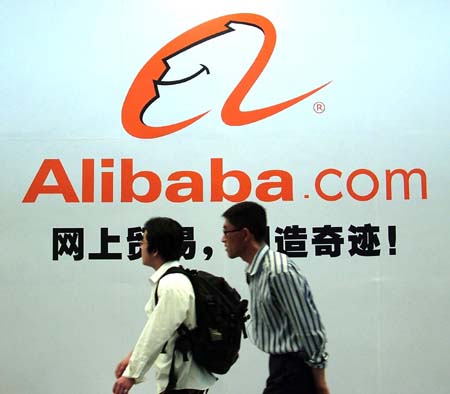 Alibaba.com, China's largest online business-to-business
(B2B) marketplace for global and domestic trade, plans what could be a $1
billion share sale in Hong Kong to help fuel growth, sources said. The company,
a subsidiary of the Alibaba Group and 40 percent owned by Yahoo, picked Hong
Kong over the New York and London stock markets for what would be the biggest
initial public offering for a mainland Internet company. Investment banks
Goldman Sachs and Morgan Stanley are arranging the impending public offering.
Alibaba.com, China's largest online business-to-business
(B2B) marketplace for global and domestic trade, plans what could be a $1
billion share sale in Hong Kong to help fuel growth, sources said. The company,
a subsidiary of the Alibaba Group and 40 percent owned by Yahoo, picked Hong
Kong over the New York and London stock markets for what would be the biggest
initial public offering for a mainland Internet company. Investment banks
Goldman Sachs and Morgan Stanley are arranging the impending public offering.
CEPA opens door to mainland securities brokers, fund
houses - China securities brokerage firms and fund houses will be able to apply
to set up in Hong Kong under the latest round of the Closer Economic Partnership
Arrangement (CEPA), to be signed in the next few days before the 10th
anniversary of the handover on July 1, according to sources. The agreement is
also likely to allow local securities brokers to apply to set up across the
border, although only a few big players will be qualified under the mainland's
high capital requirements. Allowing mainland brokerages and fund houses to apply
to the Securities and Futures Commission for Hong Kong trading licences will
help mop up some of the excess liquidity in the mainland markets, said one
source. At present, a number of mainland-owned securities firms are incorporated
in Hong Kong but they deal mainly with Hong Kong investors. The new CEPA deal
will allow mainland incorporated brokerages and fund houses to set up wholly
owned subsidiaries or joint ventures in Hong Kong to serve their mainland
clients. It is a timely move following last week's announcement by the China
Securities Regulatory Commission allowing mainland mutual funds and securities
houses to invest in overseas stock markets through the qualified domestic
institutional investor scheme from July 5.
The initial public offering scene
is set to heat up again this week with two eye- catching listing candidates, New
World Department Store and Shanghai Fosun Group, aiming to raise a total of more
than HK$13 billion.
Hang Seng Bank (0011) will pay
HK$2.4 billion to parent HSBC (0005) to acquire the 50 percent of Hang Seng Life
it does not already own.
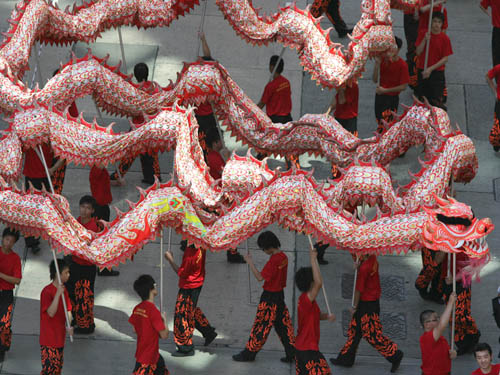 Tsim Sha Tsui roars into life as about 50 groups
perform a mega dragon and lion dance to mark the 10th anniversary of the
handover. More than 2,000 took part in the event, which attracted hundreds of
onlookers on the route from the Cultural Centre to Austin Road.
Tsim Sha Tsui roars into life as about 50 groups
perform a mega dragon and lion dance to mark the 10th anniversary of the
handover. More than 2,000 took part in the event, which attracted hundreds of
onlookers on the route from the Cultural Centre to Austin Road.
The Electronic Disclosure Project
is to be introduced by Hong Kong Exchanges and Clearing today. Under this
project, listed companies are only required to release their financial
information to the HKEx electronically, as opposed to the previous requirement
under which companies were mandated to publish their results in newspapers.
All 15 incumbent non-official
members of the Executive Council, along with outgoing Chief Secretary for
Administration Rafael Hui Si-yan, will remain in the chief executive's top
advisory team.
Hong Kong Jockey Club chairman John
Chan Cho-chak warned Sunday the club's long-standing role as a community donor
cannot be taken for granted in the years to come in the face of growing
challenges from other forms of leisure and entertainment.
The Hong Kong people's satisfaction
with the territory's overall development since the handover has reached a record
high of nearly 40 percent as the economy continues to improve, according to the
latest survey conducted by the Chinese University of Hong Kong's Institute of
Asia Pacific Studies.
Asia Pacific still key for HSBC,
says incoming chief Flockhart - HSBC Holdings (SEHK: 0005) intends to make up to
50 per cent its profit from the Asia Pacific over the next decade, countering
claims the bank is moving away from the region. Sandy Flockhart, the new chief
executive of HSBC's Asia-Pacific unit who replaced Michael Smith, said the bank
would continue to invest in the region, including in the mainland, India,
Indonesia, South Korea and Taiwan. The resignation of Mr Smith was described by
Goldman Sachs as evidence of tension within HSBC as it arguably expanded away
from Asia. The group made 39.5 per cent of its profit from the region last year.
Europe accounted for 31.5 per cent, North America 21.1 per cent and Latin
America 7.9 per cent. Mr Flockhart said Asia remained important for the bank
because of the tremendous growth potential. "We'll continue to invest in Asia as
it's part of our DNA," he added. He said the bank would continue to grow
"organically" and would expand through acquisitions if opportunities arose. The
bank said earlier that it had invested more than US$2 billion in the region in
the past three years as well as putting US$3.4 billion into associated
companies. Mr Flockhart did not say whether a similar amount or more could be
invested in Asia in the next three years. "If there are plans that show value to
us, we'll invest [in them]," he said. HSBC's senior management, including group
chairman Stephen Green, have said that they expect the Asia-Pacific region to
account for 45 to 50 per cent of earnings over the next decade. Mr Flockhart
said he would try to achieve that target and would prefer to "do it earlier
rather than later". A source said HSBC had appointed Mr Flockhart, described as
an emerging markets specialist, to reassure investors about its Asian operations
after the departure of Mr Smith, who is taking up a position as chief executive
of Australia & New Zealand Banking Group. Mr Flockhart admitted that finding
good talent in Asia would be a challenge as lenders sought growth in the region.
Mr Flockhart was president of HSBC's Latin American unit but previously served
12 years in Hong Kong.
 China: "China's
WTO accession is a win-win game", interview by People's Daily staff editor Liu
Chao recently had an exclusive interview with Pascal Lamy, WTO Director-general,
before his annual visit to China.
China: "China's
WTO accession is a win-win game", interview by People's Daily staff editor Liu
Chao recently had an exclusive interview with Pascal Lamy, WTO Director-general,
before his annual visit to China.
Construction will begin Thursday on
an inter-city subway linking two cities in south China's Guangdong
Province,heralding faster rail services in the Pearl River Delta area, one of
the country's economic engines. The 32.16-km-long subway line linking Guangzhou,
capital of Guangdong, with Foshan City, west of Guangzhou, will shorten travel
time between Foshan city and downtown Guangzhou to about 40 minutes, down from
50 minutes. At an estimated cost of 14.7 billion yuan (1.9 billion U.S.
dollars), the subway has 21 stops and will go into operation in 2012. The line
will be linked to four subway lines in Guangzhou. The inter-city subway is one
element of a planned fast rail service network along the Pearl River Delta area,
adjacent to Hong Kong and Macao. The network will have seven inter-city rail
lines with a total length of 588 kilometers, connecting Guangzhou with Dongguan,
Shenzhen, Zhuhai, Zhaoqing and Foshan. Four of them have been completed and all
the lines will be completed by 2020.
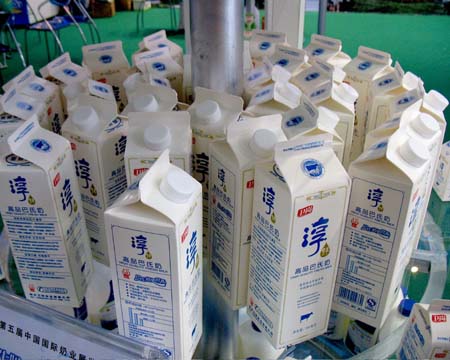 Bottles of milk exhibited at the World Dairy Expo & Summit/China 07 in Nanjing,
Jiangsu Province June 21-23. China ranks 3rd after India and the United States
in the production of dairy products in 2006.
Bottles of milk exhibited at the World Dairy Expo & Summit/China 07 in Nanjing,
Jiangsu Province June 21-23. China ranks 3rd after India and the United States
in the production of dairy products in 2006.
Mandatory national security checks
on foreign companies' acquisition of domestic players have been included to the
draft anti-monopoly law submitted yesterday to the top legislature for a second
reading. "Foreign mergers and acquisitions (M&As) of domestic companies or
foreign capital invested in domestic companies in other forms should be examined
if the cases are related to national security," said the draft submitted to the
28th session of the Standing Committee of the National People's Congress (NPC).
There is already a national-security check framework in place for foreign M&As,
but it has been included in draft legislation for the first time. According to a
regulation jointly issued by six government agencies late last year, foreign
investors have to apply for approvals from the Ministry of Commerce when their
purchases of domestic companies affect national economic security, are in key
sectors or lead to the transfer of operating rights of famous domestic brands.
The legislative move reflects the government's efforts at clarifying the legal
framework for foreign M&As, said Meng Jianbing, an expert with Seafront Law
Office in Beijing, adding that lawmakers are learning from other countries such
as the United States on how to protect national security. The requirement was
added to the long-awaited anti-monopoly law against the backdrop of a
fast-rising number of foreign M&As as well as foreign companies acquiring major
State-owned enterprises or companies with famous brands. One case which has
drawn widespread attention is US private equity firm Carlyle Group's attempted
takeover of Xugong Construction Machinery, which did not pass regulatory hurdles
following fears that China is selling strategic companies to foreign investors.
According to official statistics, foreign M&As accounted for 5 percent of all
forms of foreign direct investment annually up to 2004 but increased
dramatically to 11 percent in 2004 and nearly 20 percent in 2005. Zhang Yansheng,
director of the International Economic Research Institute affiliated to the
National Development and Reform Commission, said it is crucial that foreign
purchases of domestic firms go through security as well as anti-monopoly checks.
But "the situation needs to be spelt out in more detail. For example, what kind
of merger cases are related to national security"? The draft anti-monopoly law,
which aims to provide for fair competition, was submitted for first review in
June 2006.
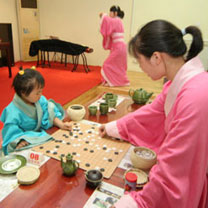 Customers dressed in the traditional Han
costumes have fun at a Han culture-themed restaurat in Beijing June 25, 2006.
The Han culture has become a hit in the capital. Customers dressed in the traditional Han
costumes have fun at a Han culture-themed restaurat in Beijing June 25, 2006.
The Han culture has become a hit in the capital.
 Teahouses become especially popular in the summer, as drinking tea can help you
beat the heat. In China, tea is a traditional drink, that's not only good for
your health but also can also cultivate your mind. Teahouses become especially
popular in the summer, as drinking tea can help you beat the heat.
Teahouses become especially popular in the summer, as drinking tea can help you
beat the heat. In China, tea is a traditional drink, that's not only good for
your health but also can also cultivate your mind. Teahouses become especially
popular in the summer, as drinking tea can help you beat the heat.
 Wu Jingguo, chairman of Chinese Taipei
Olympic Committee (CTOC), said he would let Taipei deal with the controversial
torch relay issue after Beijing Games organizers restated their firm standing on
the plan. Wu Jingguo, chairman of Chinese Taipei
Olympic Committee (CTOC), said he would let Taipei deal with the controversial
torch relay issue after Beijing Games organizers restated their firm standing on
the plan.
Chna property
giant Hopson Development Holdings (0754) will shell out HK$6 billion to buy a
Beijing project owned by chairman Chu Mang-yee.
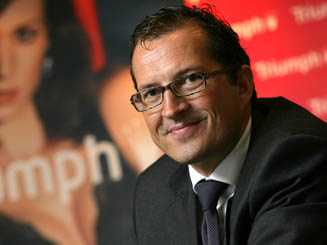 Triumph International, the
Germany-based lingerie firm, aims to double revenue from the mainland in five
years, increasing its number of mainland outlets from 800 to 1,600.
Triumph International, the
Germany-based lingerie firm, aims to double revenue from the mainland in five
years, increasing its number of mainland outlets from 800 to 1,600.
June 26, 2007
 Hong Kong:
The world-acclaimed Chinese painting "Along the River During the Qingming
Festival," and a batch of painting and calligraphy masterpieces arrived at the
Hong Kong Museum of Art from Beijing Friday evening. These national treasures
will be put on display in an exhibition entitled "The Pride of China:
Masterpieces of Chinese Painting and Calligraphy of the Jin, Tang, Song and Yuan
Dynasties from the Palace Museum" at the Museum of Art to celebrate the 10th
anniversary of the establishment of the Hong Kong Special Administrative Region.
Over the past three months, staff from the Museum of Art and the Palace Museum
in Beijing worked out a detailed plan to ensure the utmost security for the
delivery and display of the exhibits, which date back more than 1,000 years and
are graded as first-class cultural relics. The success of the delivery Friday is
also attributed to the assistance and special arrangements rendered by airports
of Beijing and Hong Kong, and the tight security escort provided by the Beijing
Municipal Public Security Bureau and Hong Kong Police, said an official with the
Museum of Art. Highlight exhibits include Zhang Zeduan's "Along the River During
the Qingming Festival" of the Northern Song dynasty, Feng Chengsu's "Copy after
Preface to the Orchid Pavilion Gathering" of the Tang dynasty, Wang Shen's
"Light Snow over a Fishing Village" of Northern Song dynasty, and Zhao Ji
(Emperor Huizong of the Song Dynasty)'s "Auspicious Dragon Rock" of the Northern
Song Dynasty. Hong Kong:
The world-acclaimed Chinese painting "Along the River During the Qingming
Festival," and a batch of painting and calligraphy masterpieces arrived at the
Hong Kong Museum of Art from Beijing Friday evening. These national treasures
will be put on display in an exhibition entitled "The Pride of China:
Masterpieces of Chinese Painting and Calligraphy of the Jin, Tang, Song and Yuan
Dynasties from the Palace Museum" at the Museum of Art to celebrate the 10th
anniversary of the establishment of the Hong Kong Special Administrative Region.
Over the past three months, staff from the Museum of Art and the Palace Museum
in Beijing worked out a detailed plan to ensure the utmost security for the
delivery and display of the exhibits, which date back more than 1,000 years and
are graded as first-class cultural relics. The success of the delivery Friday is
also attributed to the assistance and special arrangements rendered by airports
of Beijing and Hong Kong, and the tight security escort provided by the Beijing
Municipal Public Security Bureau and Hong Kong Police, said an official with the
Museum of Art. Highlight exhibits include Zhang Zeduan's "Along the River During
the Qingming Festival" of the Northern Song dynasty, Feng Chengsu's "Copy after
Preface to the Orchid Pavilion Gathering" of the Tang dynasty, Wang Shen's
"Light Snow over a Fishing Village" of Northern Song dynasty, and Zhao Ji
(Emperor Huizong of the Song Dynasty)'s "Auspicious Dragon Rock" of the Northern
Song Dynasty.
A Memorandum of Understanding (MOU)
aimed at strengthening co-operation and exchanges in health and medical areas
between the Chinese mainland and the Hong Kong Special Administrative Region (HKSAR)
was signed Friday. The MOU was signed by visiting Chinese Minister of Health Gao
Qiang and Secretary for Health, Welfare and Food of the HKSAR government York
Chow. Under the MOU, the two sides agreed to foster co-operation in various
areas including strengthening the flow of health and medical information as well
as the notification and contingency co- operation system on infectious disease
outbreaks and public health emergencies. In addition, the two sides would
encourage medical and health professional groups and relevant institutions in
the mainland and Hong Kong to share experience through seminars and training
programs. Speaking at the signing ceremony, Chow said that close co- operation
between the health authorities of the mainland and Hong Kong was vital in
meeting the numerous new challenges in public health. "The signing of the MOU
today marks a major milestone in public health development and medical
co-operation between the Ministry of Health and the Health, Welfare and Food
Bureau of the HKSAR government," he said.
The central
government will announce Hong Kong's new team of principal officials for the
next term Saturday morning through the official Xinhua News Agency before Chief
Executive Donald Tsang Yam-kuen and his 15 ministers meet the media to outline
governance plans for the next five years.
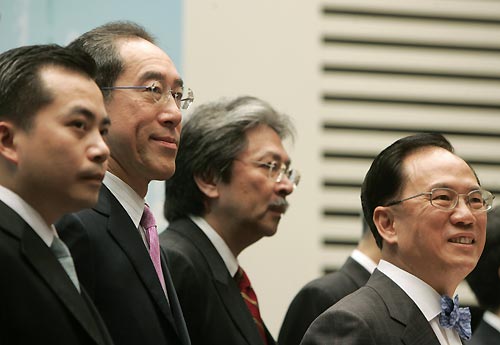 Hong Kong Chief Executive Donald
Tsang (R), standing beside Secretary for Justice Wong Tan Lung (L), Chief
Secretary for Administration Henry Tang (2nd L) and Financial Secretary John
Tsang, announces the new team of the Hong Kong government's principal officials
during a news conference in Hong Kong June 23, 2007.
Hong Kong Chief Executive Donald
Tsang (R), standing beside Secretary for Justice Wong Tan Lung (L), Chief
Secretary for Administration Henry Tang (2nd L) and Financial Secretary John
Tsang, announces the new team of the Hong Kong government's principal officials
during a news conference in Hong Kong June 23, 2007.
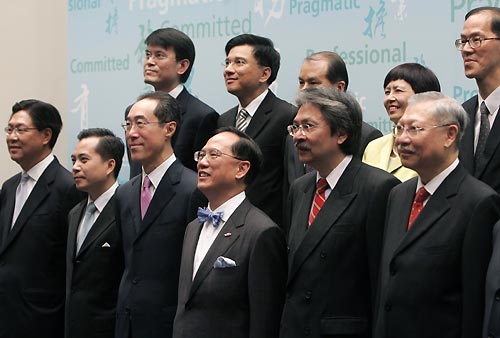 Front row L-R) Secretary for
Commerce and Economic Development Frederick Ma, Secretary for Justice Wong Yan
Lung, Chief Secretary for Administration Henry Tang, Hong Kong Chief Executive
Donald Tsang, Financial Secretary John Tsang, Secretary for Education Michael
Suen, (Back row L-R) Secretary for the Environment Edward Yau, Secretary for
Financial Services and the Treasury K C Chan, Secretary for Labour and Welfare
Matthew Cheung, Secretary for the Civil Service Denise Yue and Secretary for
Home Affairs Tsang Tak-sing attend a news conference to announce the new team of
principal officials appointed in Hong Kong June 23, 2007.
Front row L-R) Secretary for
Commerce and Economic Development Frederick Ma, Secretary for Justice Wong Yan
Lung, Chief Secretary for Administration Henry Tang, Hong Kong Chief Executive
Donald Tsang, Financial Secretary John Tsang, Secretary for Education Michael
Suen, (Back row L-R) Secretary for the Environment Edward Yau, Secretary for
Financial Services and the Treasury K C Chan, Secretary for Labour and Welfare
Matthew Cheung, Secretary for the Civil Service Denise Yue and Secretary for
Home Affairs Tsang Tak-sing attend a news conference to announce the new team of
principal officials appointed in Hong Kong June 23, 2007.
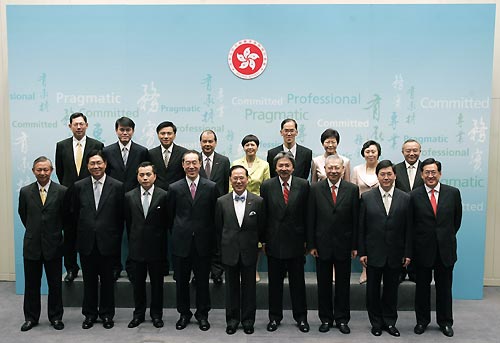 (Front row L-R) Secretary for Security Ambrose Lee, Secretary for
Commerce and Economic Development Frederick Ma, Secretary for Justice Wong Yan
Lung, Chief Secretary for Administration Henry Tang, Hong Kong Chief Executive
Donald Tsang, Financial Secretary John Tsang, Secretary for Education Michael
Suen, Secretary for Constitutional and Mainland Affairs Stephen Lam and
Secretary for Food and Health York Chow, (back row L-R) Director of the Chief
Executive's Office Norman Chan, Secretary for the Environment Edward Yau,
Secretary for Financial Services and the Treasury K C Chan, Secretary for Labour
and Welfare Matthew Cheung, Secretary for the Civil Service Denise Yue,
Secretary for Home Affairs Tsang Tak-sing, Secretary for Development Carrie Lam,
Secretary for Transport and Housing Eva Cheng and Head of the Central Policy
Unit Lau Siu-kai attend a news conference to announce the new team of principal
officials appointed in Hong Kong June 23, 2007.
(Front row L-R) Secretary for Security Ambrose Lee, Secretary for
Commerce and Economic Development Frederick Ma, Secretary for Justice Wong Yan
Lung, Chief Secretary for Administration Henry Tang, Hong Kong Chief Executive
Donald Tsang, Financial Secretary John Tsang, Secretary for Education Michael
Suen, Secretary for Constitutional and Mainland Affairs Stephen Lam and
Secretary for Food and Health York Chow, (back row L-R) Director of the Chief
Executive's Office Norman Chan, Secretary for the Environment Edward Yau,
Secretary for Financial Services and the Treasury K C Chan, Secretary for Labour
and Welfare Matthew Cheung, Secretary for the Civil Service Denise Yue,
Secretary for Home Affairs Tsang Tak-sing, Secretary for Development Carrie Lam,
Secretary for Transport and Housing Eva Cheng and Head of the Central Policy
Unit Lau Siu-kai attend a news conference to announce the new team of principal
officials appointed in Hong Kong June 23, 2007.
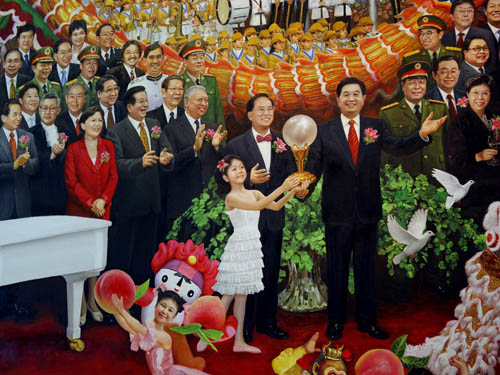 Hong Kong's largest
painting was unveiled yesterday to mark the 10th anniversary of the handover.
Measuring 7.1 metres by 2.8 metres, Halcyon Days Pearl is seen as a sister work
to Festive Day, another epic oil painting that fetched HK$23 million in 1997 -
then a record for contemporary Chinese art. The painting features state leaders
and Hong Kong's movers and shakers. It was painted by renowned artist Liu Yuyi
and his daughter, Liu Haomei. At the heart of the painting is President Hu
Jintao , who is handing a huge pearl to Chief Executive Donald Tsang Yam-kuen as
other state leaders and top Hong Kong officials look on. "Festive Day was more
solemnly themed when people still held doubts about Hong Kong's future," said
Liu. "Now Pearl has harmony and happiness in the air." He said he included
people of different political views. Near the edge of the painting stand such
figures as Cardinal Joseph Zen Ze-kiun, former chief secretary Anson Chan Fang
On-sang and Civic Party legislator Alan Leong Kah-kit. Tycoons Li Ka-shing and
Stanley Ho Hung-sun were among the closest to the state leaders in the canvas.
Some key members of the Democratic Alliance for the Betterment and Progress of
Hong Kong and the Liberal Party were also close to the action. Liu, who has
lived in Hong Kong since 1991, said he had not yet decided whether to auction
the painting, although some interested buyers had contacted him in recent days.
"I may just give it to the state," he said. "And I don't rule out the
possibility of giving it to the Hong Kong government." In the background of the
painting are Hong Kong's landmark skyscrapers and tourist attractions. Mount
Everest sits in the deeper background to symbolise the support of the mainland. Hong Kong's largest
painting was unveiled yesterday to mark the 10th anniversary of the handover.
Measuring 7.1 metres by 2.8 metres, Halcyon Days Pearl is seen as a sister work
to Festive Day, another epic oil painting that fetched HK$23 million in 1997 -
then a record for contemporary Chinese art. The painting features state leaders
and Hong Kong's movers and shakers. It was painted by renowned artist Liu Yuyi
and his daughter, Liu Haomei. At the heart of the painting is President Hu
Jintao , who is handing a huge pearl to Chief Executive Donald Tsang Yam-kuen as
other state leaders and top Hong Kong officials look on. "Festive Day was more
solemnly themed when people still held doubts about Hong Kong's future," said
Liu. "Now Pearl has harmony and happiness in the air." He said he included
people of different political views. Near the edge of the painting stand such
figures as Cardinal Joseph Zen Ze-kiun, former chief secretary Anson Chan Fang
On-sang and Civic Party legislator Alan Leong Kah-kit. Tycoons Li Ka-shing and
Stanley Ho Hung-sun were among the closest to the state leaders in the canvas.
Some key members of the Democratic Alliance for the Betterment and Progress of
Hong Kong and the Liberal Party were also close to the action. Liu, who has
lived in Hong Kong since 1991, said he had not yet decided whether to auction
the painting, although some interested buyers had contacted him in recent days.
"I may just give it to the state," he said. "And I don't rule out the
possibility of giving it to the Hong Kong government." In the background of the
painting are Hong Kong's landmark skyscrapers and tourist attractions. Mount
Everest sits in the deeper background to symbolise the support of the mainland.
Beijing twice considered taking back Hong Kong by force in
the decades running up to the handover, according to a retired mainland official
formerly in charge of Hong Kong affairs. In 1967, Huang Yongsheng , the then
commander of the Guangzhou military region, had suggested a military invasion to
quell rioting in the city, Lu Ping said in an interview with mainland satellite
broadcaster Dragon TV that aired yesterday. "When premier Zhou Enlai learned of
it, he gave an instruction late in the evening against [the PLA] proceeding," Mr
Lu said. The second occasion on which the possibility had come up was during the
visit of the then British prime minister, Margaret Thatcher, to Beijing in 1982.
Late paramount leader Deng Xiaoping told her that mainland authorities would
rethink the timing and means of restoring Chinese sovereignty over Hong Kong if
there was major unrest once the July 1, 1997, handover was announced, Mr Lu
recalled. "The [new] `method' referred to was its requisition by force," said
the former director of the State Council's Hong Kong and Macau Affairs Office.
Mr Lu's interview was part of a Dragon TV series to mark the 10th anniversary of
the handover. The retired official is best remembered in the city for his
trenchant criticism of its last governor, Lord Patten, whom he once called a
"sinner for a thousand years" for trying to foster greater democracy in Hong
Kong. Mr Lu is not the only former senior mainland official to have offered
insights in the lead-up to the handover anniversary into what went on behind the
scenes in the diplomatic battles between London and Beijing. Pro-Beijing
newspaper Wen Wei Po published excerpts of a forthcoming book of memoirs by Zhou
Nan , Xinhua's former Hong Kong director, in which he was quoted as saying
Beijing had considered using "non-peaceful means" to get back Hong Kong when
considering its reunification.
 Cast member Maggie Q who was
born and raised in Hawaii made his movie career in Hong Kong arrives for the
film premiere of the film "Live Free or Die Hard" in New York, June 22, 2007.
Cast member Maggie Q who was
born and raised in Hawaii made his movie career in Hong Kong arrives for the
film premiere of the film "Live Free or Die Hard" in New York, June 22, 2007.
New
York-listed units in Blackstone Group jumped 21 percent in the first few hours
after their debut, giving the mainland's state investment agency US$789.94
million (HK$6.16 billion) in gains on the US$3 billion stake it bought in the
private-equity behemoth as China seeks to diversify its foreign reserve holdings
and improve returns.
More than
1,000 public hospital doctors are expected to stage a sit-in at the Queen
Elizabeth Hospital Saturday to fight for better pay and working hours. They are
also calling on the Hospital Authority to restore the wage scales of new
recruits to the levels they were eight years ago and for a pay rise similar to
the 4.96 percent proposed for civil servants. Authority chairman Anthony Wu
Ting-yuk, while calling on the doctors to be patient during the negotiations,
assured the public services at hospitals would not be affected. Hong Kong Public
Doctors' Association's president Paul Shea Tat-ming said previous salary cuts
had affected morale and, subsequently, the quality of medical services. "Doctors
used to be the creme de la creme of society, but now they don't even rank
alongside professionals in the civil service," Shea said, adding: "We want to be
paid a salary comparable to a professional in the civil service."
 China: Hawaiian
Airlines has decided against applying for one of the new air routes being opened
up to China, a destination it had sought unsuccessfully two years ago. "Hawaiian
remains interested in serving China and helping to develop its enormous
potential as a visitor market for Hawaii, but the current difficulty for
citizens of China to get tourist visas from the U.S. government has led us to
conclude that a daily service between Hawaii and China is not commercially
viable today," spokesman Keoni Wagner said yesterday. State Department figures
released earlier this year indicated that visitors from the southern Chinese
city of Guangzhou must wait an average of 22 days to obtain a visa to visit the
United States. Hawaiian is one of the carriers that would be eligible to compete
for the latest group of U.S.-China routes, which the U.S. Department of
Transportation has reserved for airlines that don't already fly to China. Delta
Air Lines Inc. and US Airways Group Inc. have already said they will compete for
the new routes. Hawaiian tried for permission in 2005 to fly to China --
proposing a route connecting San Diego, Honolulu and Shanghai -- but lost out to
Continental Airlines and American Airlines.
China: Hawaiian
Airlines has decided against applying for one of the new air routes being opened
up to China, a destination it had sought unsuccessfully two years ago. "Hawaiian
remains interested in serving China and helping to develop its enormous
potential as a visitor market for Hawaii, but the current difficulty for
citizens of China to get tourist visas from the U.S. government has led us to
conclude that a daily service between Hawaii and China is not commercially
viable today," spokesman Keoni Wagner said yesterday. State Department figures
released earlier this year indicated that visitors from the southern Chinese
city of Guangzhou must wait an average of 22 days to obtain a visa to visit the
United States. Hawaiian is one of the carriers that would be eligible to compete
for the latest group of U.S.-China routes, which the U.S. Department of
Transportation has reserved for airlines that don't already fly to China. Delta
Air Lines Inc. and US Airways Group Inc. have already said they will compete for
the new routes. Hawaiian tried for permission in 2005 to fly to China --
proposing a route connecting San Diego, Honolulu and Shanghai -- but lost out to
Continental Airlines and American Airlines.
Chinese
Vice Premier Zeng Peiyan on Friday warned people against cheating in the second
national land survey that is to be launched on July 1st. Every organization and
individual should provide or gather accurate land data, and the central
government will tolerate no cheating or changing data, Zeng said during a
teleconference in Beijing. He told ministries and local governments that
up-to-date and accurate land data will help the government make tough land
control measures and promote sound and rapid economic growth and social
development. China conducted the first national land survey between 1984 and
1996. Given the huge changes that have taken place in urban and rural areas, the
data are now out of date, the vice premier said. The primary task of the survey
is to obtain information on the acreage, quality and distribution of the arable
and basic farmland in the country, he told the meeting. This will help ensure no
decline in the 1.8 billion mu (120 million hectares) of arable land, including
the 1.6 million mu of basic farmland that is widely seen as critical to the
country's food security, he noted. Local authorities should finish the survey
before the end of June 2009 and report the new land data to the Ministry of Land
and Resources on Oct. 31, 2009, said a circular issued by the State Council on
Thursday. The circular said China will use advanced remote imaging technologies
to survey land used for different functions including farmland, forests, land
used by industry and infrastructure and development parks. Acreages and their
distributions will be mapped and recorded nationwide. China will build an
electronic database for all the survey findings and devise statistical and
monitoring methods to track changes in land resources, and also set up a system
to update the information quickly, said the circular. The survey will help the
government ensure national food security and better protect farmers' interests
and thereby bolster social stability, the circular stated.
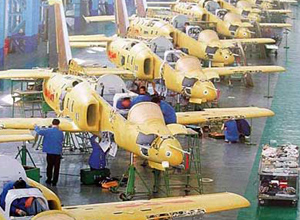 China encourages
share-holding reform for some of its weapons makers in a bid to expand financial
and technical support, according to the recently issued government guidelines. China encourages
share-holding reform for some of its weapons makers in a bid to expand financial
and technical support, according to the recently issued government guidelines.
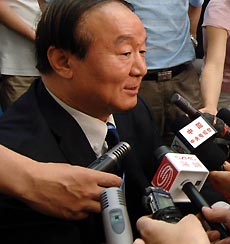 BOCOG vice
president Jiang Xiaoyu talks to media on Saturday. Beijing insists that Taiwan
will only be included in the 2008 Olympic torch relay under the terms of the
written agreement reached with the island's Olympic Committee earlier this year.
When the route was announced in late April, the Taiwan government said it could
not accept the torch because Taipei's position on the relay -- after Ho Chi Minh
City and before Hong Kong. The inclusion of Taiwan is important to the Beijing
government, but hopes of a negotiated compromise look bleak. "As far as BOCOG is
concerned, the passing of the Olympic flame through Taipei has been defined by
BOCOG and the Chinese Taipei Olympic Committee," Jiang Xiaoyu, executive vice
president of the Beijing Organising Committee for the Olympic Games (BOCOG),
told a news conference on Saturday. "We hope they will stay free from artificial
factors and return to the written agreement made by both sides, and validated by
the International Olympic Committee. "If the CTOC can return to the agreement
already made, the selection of the 120 torch bearers for Taipei will kick off
after that." Jiang would not say whether BOCOG would consider negotiations with
Taipei but an approach from the other side of the Taiwan strait looks unlikely.
A spokeswoman for the Taiwan government Mainland Affairs Council said this week
that BOCOG had described Taiwan as "China Taiwan" on its official Web site, not
the Olympic name "Chinese Taipei". Although it had been changed back, the usage
was picked up by the Chinese media and Taiwan was waiting for Beijing to suggest
renegotiating the torch route "to express sincerity", the spokeswoman said. The
130-day, 137,000km torch relay, due to stop over in Taipei in late April 2008,
will require 21,880 torch bearers, organisers said on Saturday. The Games start
next August. BOCOG vice
president Jiang Xiaoyu talks to media on Saturday. Beijing insists that Taiwan
will only be included in the 2008 Olympic torch relay under the terms of the
written agreement reached with the island's Olympic Committee earlier this year.
When the route was announced in late April, the Taiwan government said it could
not accept the torch because Taipei's position on the relay -- after Ho Chi Minh
City and before Hong Kong. The inclusion of Taiwan is important to the Beijing
government, but hopes of a negotiated compromise look bleak. "As far as BOCOG is
concerned, the passing of the Olympic flame through Taipei has been defined by
BOCOG and the Chinese Taipei Olympic Committee," Jiang Xiaoyu, executive vice
president of the Beijing Organising Committee for the Olympic Games (BOCOG),
told a news conference on Saturday. "We hope they will stay free from artificial
factors and return to the written agreement made by both sides, and validated by
the International Olympic Committee. "If the CTOC can return to the agreement
already made, the selection of the 120 torch bearers for Taipei will kick off
after that." Jiang would not say whether BOCOG would consider negotiations with
Taipei but an approach from the other side of the Taiwan strait looks unlikely.
A spokeswoman for the Taiwan government Mainland Affairs Council said this week
that BOCOG had described Taiwan as "China Taiwan" on its official Web site, not
the Olympic name "Chinese Taipei". Although it had been changed back, the usage
was picked up by the Chinese media and Taiwan was waiting for Beijing to suggest
renegotiating the torch route "to express sincerity", the spokeswoman said. The
130-day, 137,000km torch relay, due to stop over in Taipei in late April 2008,
will require 21,880 torch bearers, organisers said on Saturday. The Games start
next August.
China has 80m middle class members - The number of Chinese
officially described as "middle class" has risen by almost 15 million people in
the last two years to 80 million in total, according to official sources. About
6.15 percent of the population were middle class, and the number was still
rising, Hou Yunchun, director of the Research Office of the State Council, told
a conference on wealth management, the Shanghai Securities News reported
recently. Hou's estimate was based on the criterion of the National Bureau of
Statistics (NBS), which defined middle-income households as having an annual
income between 60,000 and 500,000 yuan (7,792 and 65,790 U.S. dollars). A study
by the NBS in January 2005 showed about 5.04 percent of Chinese, or 65.5 million
people, fell into this category. By January 2007, China still had 23.65 million
people below the government poverty line, earning less than 85 U.S. dollars a
year. The figure had fallen by more than 100 million since the government
launched its campaign against rural poverty in 1986. The expanding middle class
indicated China was entering "a sound cycle of development", said Shi Jianping,
president of Beijing-based Central University of Finance and Economics. As
personal wealth increases, Chinese commercial institutions are improving their
wealth management services to customers with different needs, said Shi. A market
survey from the Bank of China shows the Chinese private banking market is
growing at an annual rate of 12 percent.
Telecom equipment maker Huawei Technologies has won a $700
million contract for China Mobile Communications Corp.
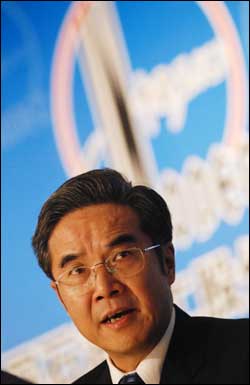 Chen Tonghai,
chairman of China Petroleum & Chemical Corp (0386), better known as Sinopec, and
president of parent Sinopec Group, surprised the market by resigning from the
positions with immediate effect. The news was announced in an unusual manner by
the State-owned Assets Supervision and Administration Commission, not by the
company itself, and without giving exact reasons. In Beijing, rumors were rife
that Chen has been detained, having "seriously violated party discipline." Web
site NetEase 163 Friday said "Chen has resigned due to seriously violating party
discipline, and will be replaced by SASAC Liaoning employee Su Shulin." Sinopec,
Asia's largest oil refiner, said: "Chen Tonghai has resigned as a director and
chairman of the board of Sinopec for personal reasons, with effect from June
22." Sinopec did not elaborate on what the "personal reasons" were, and the
spokesman for the company could not be reached for comment. Chen, 58, was
appointed chairman in April 2003, and has been president of Sinopec Group since
March 2003, according to Sinopec's Web site. Vice chairman Zhou Yuan will be
acting chairman until a replacement is elected. Su was appointed deputy general
manager of China National Petroleum Corp - China's largest oil and gas producer
- after explosion disasters at the Jilin chemical plant in 2005. After quitting
his position with PetroChina (0857) last year, Su served as a party organizing
chief in Liaoning province. Supported by robust economic growth in the mainland,
together with the soaring demand for oil and oil products, shares of Sinopec
have gained 25 percent this year, outpacing an 8.32 percent rise in the
benchmark Hang Seng Index. Sinopec shares closed Friday at HK$9.05, a drop of
1.42 percent, before the announcement of Chen's resignation. Chen Tonghai,
chairman of China Petroleum & Chemical Corp (0386), better known as Sinopec, and
president of parent Sinopec Group, surprised the market by resigning from the
positions with immediate effect. The news was announced in an unusual manner by
the State-owned Assets Supervision and Administration Commission, not by the
company itself, and without giving exact reasons. In Beijing, rumors were rife
that Chen has been detained, having "seriously violated party discipline." Web
site NetEase 163 Friday said "Chen has resigned due to seriously violating party
discipline, and will be replaced by SASAC Liaoning employee Su Shulin." Sinopec,
Asia's largest oil refiner, said: "Chen Tonghai has resigned as a director and
chairman of the board of Sinopec for personal reasons, with effect from June
22." Sinopec did not elaborate on what the "personal reasons" were, and the
spokesman for the company could not be reached for comment. Chen, 58, was
appointed chairman in April 2003, and has been president of Sinopec Group since
March 2003, according to Sinopec's Web site. Vice chairman Zhou Yuan will be
acting chairman until a replacement is elected. Su was appointed deputy general
manager of China National Petroleum Corp - China's largest oil and gas producer
- after explosion disasters at the Jilin chemical plant in 2005. After quitting
his position with PetroChina (0857) last year, Su served as a party organizing
chief in Liaoning province. Supported by robust economic growth in the mainland,
together with the soaring demand for oil and oil products, shares of Sinopec
have gained 25 percent this year, outpacing an 8.32 percent rise in the
benchmark Hang Seng Index. Sinopec shares closed Friday at HK$9.05, a drop of
1.42 percent, before the announcement of Chen's resignation.
Financial service provider and
mainland property investor First Shanghai Investment (0227) said the China
Securities Regulatory Commission's announcement allowing mutual funds and
securities houses to invest in overseas stock markets via the QDII scheme has
spurred significant interest from investors.
Widespread fraud is hampering the
development of China's public pensions system, which is ill adapted to meet the
needs of a huge population that will soon be aging rapidly, according to a new
Organization for Economic Cooperation and Development report.
The mainland's secretive military
industries will be opened up to private investors - both domestic and foreign -
as part of modernisation efforts by Beijing. Weapons makers would be allowed to
raise money through initial public offerings at home and abroad, the Commission
of Science, Technology and Industry for National Defence said yesterday. A few
"key military enterprises with national strategic security concerns" would
remain solely in state hands, the commission said. But it did not identify any
specific enterprises or define exactly what strategic security concerns were
involved. Mainland officials have dropped hints in the past few years that they
would open up the ordnance industry to foreign and private investment. But
yesterday's announcement and release of guidelines for the move was the first
official confirmation and the first time details have been given of the extent
of foreign and private investment. The government has set an ambitious target
for reform of the military firms, with the guidelines saying the reform of the
"qualified" weapon makers should be completed in the "next few years". The
guidelines say companies engaged in the design, assembly and manufacture of
weapons systems will be eligible for investment from both domestic and foreign
companies and funds. The degree of openness to private capital would depend on
the importance of the weapons systems a company produced, the commission's
announcement said, without elaborating. The move aimed to modernise the
shareholding of the companies that make the mainland's military hardware as well
as upgrade the defence industries' capabilities and technology, the statement
said. The commission is responsible for developing policies for defence-related
industries and implementing the restructuring of military industrial enterprises
and institutions. It is headed by Zhang Yunchuan, a member of the Communist
Party Central Committee. In a strong indication of Beijing's intention to build
up its own military conglomerates, the document said the government would also
encourage the military industrial firms to undertake cross-shareholdings. Both
the State-owned Assets Supervision and Administration Commission, which oversees
the reform of state-owned companies, and the National Development and Reform
Commission, which oversees the mainland's economic development, would contribute
to the reform programme, the statement said. Although the scope and size of
mainland's military industry has remained unclear, the central government has
tried to reduce it over the past 20 years by forcing many underproducing firms
to make goods for civilian use. The China Weapon Industries Group Corporation,
the mainland's largest weapons-manufacturing group, owns 140 companies involved
in research, distribution and manufacturing. By the end of last year, the
corporation had total assets close to 140 billion yuan and revenue from its core
business exceeded 100 billion yuan, according to its website. The corporation,
formerly known as the China North Industries Group Corporation, makes amphibious
assault equipment, anti-aircraft missiles and night vision equipment for the
army, navy, and air force. One of its units, Mongolia First Machinery Group
Corporation, is a tank manufacturer with total assets of 4.65 billion yuan. The
China Weapons Equipment Group Corporation owns more than 50 companies that make
both military equipment and civil vehicles including motorcycles and cars. The
company's total assets and revenue both exceed 100 billion yuan. Beijing has
officially budgeted US$45 billion for defence spending this year, but many
experts believe real spending will be higher.
June 25, 2007
 Hong Kong:
The Chinese Mainland and Hong Kong Closer Economic Partnership Arrangement
(CEPA) is functioning smoothly, said the Vice Minister of Commerce Liao Xiaoqi
on Thursday. Liao said the two sides had cooperated successfully in services,
trade, finance, tourism and human resource since the CEPA was signed four years
ago. The vice minister said the mainland has imported Hong Kong-made products
worth one billion U.S. dollars, waiving 91 million U.S. dollars of tariffs. As
of January 2006, the mainland scrapped all tariffs on products manufactured in
Hong Kong. A total of 1,753 Hong Kong-based enterprises have invested in the
mainland on favorable terms offered by the CEPA, said Liao. The terms include
relaxed restrictions on shareholding and lower capital requirements for
registering ventures, he added. There are 38 banks in Hong Kong which operate
RMB business and RMB deposits in the special administrative region have reached
25.5 billion yuan (3.3 billion U.S. dollars), said Liao. The mutual recognition
of professional qualifications is advancing quickly, said Liao, noting that
1,400 architects had recently been recognized by both sides. The vice minister
also mentioned the tourism sector, saying 49 cities had been opened to Hong Kong
tourists, drawing 19.7 million individual tourists. Hong Kong:
The Chinese Mainland and Hong Kong Closer Economic Partnership Arrangement
(CEPA) is functioning smoothly, said the Vice Minister of Commerce Liao Xiaoqi
on Thursday. Liao said the two sides had cooperated successfully in services,
trade, finance, tourism and human resource since the CEPA was signed four years
ago. The vice minister said the mainland has imported Hong Kong-made products
worth one billion U.S. dollars, waiving 91 million U.S. dollars of tariffs. As
of January 2006, the mainland scrapped all tariffs on products manufactured in
Hong Kong. A total of 1,753 Hong Kong-based enterprises have invested in the
mainland on favorable terms offered by the CEPA, said Liao. The terms include
relaxed restrictions on shareholding and lower capital requirements for
registering ventures, he added. There are 38 banks in Hong Kong which operate
RMB business and RMB deposits in the special administrative region have reached
25.5 billion yuan (3.3 billion U.S. dollars), said Liao. The mutual recognition
of professional qualifications is advancing quickly, said Liao, noting that
1,400 architects had recently been recognized by both sides. The vice minister
also mentioned the tourism sector, saying 49 cities had been opened to Hong Kong
tourists, drawing 19.7 million individual tourists.
The government of the Macao Special
Administrative Region has collected 11.24 billion patacas (1.4 billion U.S.
dollars) in direct gaming taxes in the first five months of this year, seeing a
remarkable year-on-year rise of 45.4 percent. The statistics issued Friday by
the Finance Services Bureau ( FSB) showed that the gaming taxes accounted for
73.9 percent of the government total revenue in the period. Macao's 26 casinos
pay 35 percent of their gross receipts as direct tax to the government. The
region, with a population of 508,000, has a 150-year history of gaming industry
and is the only part of China where casino gaming is legitimate.
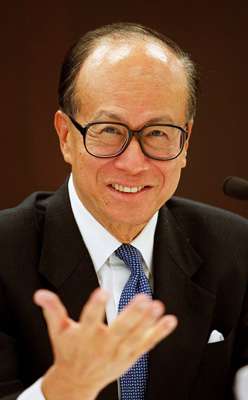 "I'm very confident in Hong Kong's promising future under the principle of 'one
country, two systems' created by Deng Xiaoping with his foresight and sagacity
and my belief in Hong Kong's future will never change," tycoon Li Ka-shing said.
Recalling the ten years of Hong Kong's return to its motherland, Li Ka-shing, a
local grown legend and a world famous tycoon, perhaps is the best example of
Hong Kong dream. His secret of making fortunes, as hundreds of his stories tell,
is hard work plus deeply connecting his roots with the fortune of Hong Kong.
Looking back the decade, Li's rule of belief in Hong Kong's future again has
done its magic. As the chairman for both Cheung Kong Holdings and Hutchison
Whampoa, Li has an empire of 240,000 staff, operating business in 55 countries
and regions. His business is fast growing during the decade and the way to his
enlarging riches is still his unshakable belief in Hong Kong. When some Hong
Kong people worried about the return and fled away, Li just kept his hope in
Hong Kong as always. Hong Kong's return to the motherland is a great achievement
of the principle of "one country, two systems", a framework to show China's
sovereignty over Hong Kong but keep Hong Kong's social and economic scheme,
including people's living style and that guarantees Hong Kong's peaceful return
and its social stability, Li told Xinhua last week as Hong Kong is preparing a
grand celebration for its tenth anniversary of return to the motherland. Hong
Kong did have a tough time as the newly established Hong Kong Special
Administrative Region received a severe stroke during the financial turmoil in
1997 followed by fearful plague of SARS in 2003, an ordeal that made Hong Kong
people lost their fortunes, even lives. Now, talking about the difficulties and
sad moments Hong Kong has experienced, Li again said his belief in Hong Kong's
future has never changed, especially when Hong Kong's future is in Hong Kong
people's hands with the strong support of its motherland. "Hong Kong does not
need to share any expense of the country, yet whenever Hong Kong meets any
difficulties, the central government will exert its most to help. Hong Kong
should remember the tough moments that we went through with our motherland side
byside," Li said. Looking forward to the future of Hong Kong, the tycoon, who
has been living in Hong Kong for over 60 years, said no matter what moment it
is, his belief and hope in Hong Kong are always the same. "Hong Kong's economy
is now on a right track and the economic development of Chinese mainland is
bringing Hong Kong great chances. If a person in my age is still working hard,
young people should work even harder for Hong Kong's future development," He
added.
"I'm very confident in Hong Kong's promising future under the principle of 'one
country, two systems' created by Deng Xiaoping with his foresight and sagacity
and my belief in Hong Kong's future will never change," tycoon Li Ka-shing said.
Recalling the ten years of Hong Kong's return to its motherland, Li Ka-shing, a
local grown legend and a world famous tycoon, perhaps is the best example of
Hong Kong dream. His secret of making fortunes, as hundreds of his stories tell,
is hard work plus deeply connecting his roots with the fortune of Hong Kong.
Looking back the decade, Li's rule of belief in Hong Kong's future again has
done its magic. As the chairman for both Cheung Kong Holdings and Hutchison
Whampoa, Li has an empire of 240,000 staff, operating business in 55 countries
and regions. His business is fast growing during the decade and the way to his
enlarging riches is still his unshakable belief in Hong Kong. When some Hong
Kong people worried about the return and fled away, Li just kept his hope in
Hong Kong as always. Hong Kong's return to the motherland is a great achievement
of the principle of "one country, two systems", a framework to show China's
sovereignty over Hong Kong but keep Hong Kong's social and economic scheme,
including people's living style and that guarantees Hong Kong's peaceful return
and its social stability, Li told Xinhua last week as Hong Kong is preparing a
grand celebration for its tenth anniversary of return to the motherland. Hong
Kong did have a tough time as the newly established Hong Kong Special
Administrative Region received a severe stroke during the financial turmoil in
1997 followed by fearful plague of SARS in 2003, an ordeal that made Hong Kong
people lost their fortunes, even lives. Now, talking about the difficulties and
sad moments Hong Kong has experienced, Li again said his belief in Hong Kong's
future has never changed, especially when Hong Kong's future is in Hong Kong
people's hands with the strong support of its motherland. "Hong Kong does not
need to share any expense of the country, yet whenever Hong Kong meets any
difficulties, the central government will exert its most to help. Hong Kong
should remember the tough moments that we went through with our motherland side
byside," Li said. Looking forward to the future of Hong Kong, the tycoon, who
has been living in Hong Kong for over 60 years, said no matter what moment it
is, his belief and hope in Hong Kong are always the same. "Hong Kong's economy
is now on a right track and the economic development of Chinese mainland is
bringing Hong Kong great chances. If a person in my age is still working hard,
young people should work even harder for Hong Kong's future development," He
added.
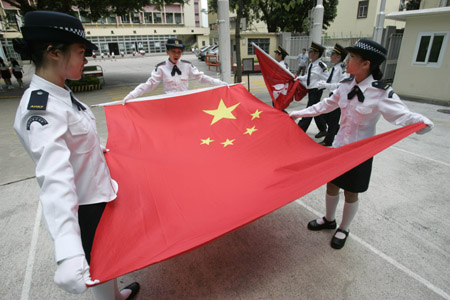 Flag-guards of C.C.C. Heep Woh Primary School (A.M.)
rehearse a flag raising ceremony in Hong Kong June 22, 2007. The school will
hold an event to celebrate the 10th anniversary of Hong Kong's handover to China
on July 1.
Flag-guards of C.C.C. Heep Woh Primary School (A.M.)
rehearse a flag raising ceremony in Hong Kong June 22, 2007. The school will
hold an event to celebrate the 10th anniversary of Hong Kong's handover to China
on July 1.
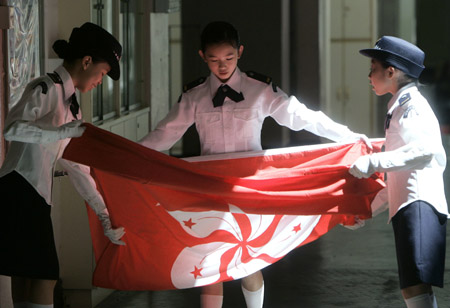 Flag-guards of C.C.C. Heep Woh Primary School (A.M.)
rehearse a flag raising ceremony in Hong Kong June 22, 2007. The school will
hold an event to celebrate the 10th anniversay of Hong Kong's handover to China
on July 1.
Flag-guards of C.C.C. Heep Woh Primary School (A.M.)
rehearse a flag raising ceremony in Hong Kong June 22, 2007. The school will
hold an event to celebrate the 10th anniversay of Hong Kong's handover to China
on July 1.
Hong Kong's gross domestic product
(GDP) rose 5.6 percent in real terms in the first quarter this year over the
same period last year, compared with the 7.3 percent growth in the previous
quarter, official figures released Friday indicated. Analyzed by sector and on a
year-on-year comparison, net output in all service sectors taken together rose
7.6 percent in real terms, after 9.6 percent growth a quarter earlier, said the
Census and Statistics Department of the Hong Kong Special Administrative Region
government. Net output in the wholesale, retail and import and export trades,
restaurants and hotels grew 7.7 percent in real terms, compared with the 10
percent rise in the previous quarter. Growth in local consumer demand, robust
external trade and the expansion of offshore trade and inbound tourism all
contributed to the rise, said the department. The financing, insurance, real
estate and business services sector's net output rose 15.2 percent in real terms
compared with the 17.4 percent increase in the fourth quarter. The growth
impetus came mainly from banking services, on the back of a substantial rise in
commission and service income. Also relevant was a leap in net output of the
stock brokerage companies, underpinned by a significant rise in stock market
turnover, said the department.
The bullish
stock market has brought a bonanza not only for investors, but also for Hong
Kong's 2.3 million employees, as the net average return from equity investment
under the Mandatory Provident Fund has surged to a record 8 percent this year,
compared with 6.99 percent last year.
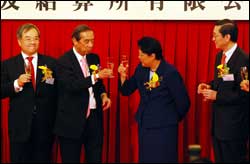 Shares of Hong Kong Exchanges and Clearing (0388) hit a record high as
the market operator celebrated the seventh anniversary of its listing, largely
thanks to the inflow of funds under the qualified domestic institutional
investor scheme. HKEx shares jumped 7.2 percent Thursday to close at HK$110.20,
on strong turnover that exceeded HK$2 billion. HKEx has a market capitalization
of more than HK$117 billion. The market operator made its trading debut June 27,
2000 and on its first day the shares closed at HK$8.25, more than double the
HK$3.88 cash alternative offer available to existing shareholders before the
listing. Analysts are upbeat on the prospects for the stock. Tung Tai Securities
associate director Kenny Tang Sing-hing said robust turnover in the equities and
derivatives market will continue to boost HKEx's income and share price. "QDII
funds can help increase turnover in the stock market." He expects average daily
turnover on the bourse this year to nearly double to more than HK$60 billion
from HK$33.9 billion last year. HKEx's turnover-related fees, including trading
fees and tariff, and clearing and settlement fees, climbed by two-thirds last
year driven by rising turnover amid market rallies. Net income almost doubled to
a record HK$922.5 million in the first quarter this year from HK$478.8 million
in the same period last year, HKEx reported last month. It attributed the strong
growth to the buoyant cash and derivatives markets. Average daily turnover on
the Hong Kong exchange in the first quarter jumped 70 percent to HK$52.9 billion
from HK$31.2 billion a year earlier.
Shares of Hong Kong Exchanges and Clearing (0388) hit a record high as
the market operator celebrated the seventh anniversary of its listing, largely
thanks to the inflow of funds under the qualified domestic institutional
investor scheme. HKEx shares jumped 7.2 percent Thursday to close at HK$110.20,
on strong turnover that exceeded HK$2 billion. HKEx has a market capitalization
of more than HK$117 billion. The market operator made its trading debut June 27,
2000 and on its first day the shares closed at HK$8.25, more than double the
HK$3.88 cash alternative offer available to existing shareholders before the
listing. Analysts are upbeat on the prospects for the stock. Tung Tai Securities
associate director Kenny Tang Sing-hing said robust turnover in the equities and
derivatives market will continue to boost HKEx's income and share price. "QDII
funds can help increase turnover in the stock market." He expects average daily
turnover on the bourse this year to nearly double to more than HK$60 billion
from HK$33.9 billion last year. HKEx's turnover-related fees, including trading
fees and tariff, and clearing and settlement fees, climbed by two-thirds last
year driven by rising turnover amid market rallies. Net income almost doubled to
a record HK$922.5 million in the first quarter this year from HK$478.8 million
in the same period last year, HKEx reported last month. It attributed the strong
growth to the buoyant cash and derivatives markets. Average daily turnover on
the Hong Kong exchange in the first quarter jumped 70 percent to HK$52.9 billion
from HK$31.2 billion a year earlier.
Hong Kong
Airlines has signed a preliminary agreement to purchase 51 Airbus jets valued at
about US$5.6 billion (HK$43.68 billion) to enable it to challenge larger rival
Cathay Pacific Airways (0293) on long-haul routes.
 Abuse of the party
drug ketamine can lead to permanent organ damage, doctors have warned. According
to doctors at Tuen Mun and Princess Margaret hospitals, abuse of ketamine - the
second-most abused drug in Hong Kong - may cause severe bladder dysfunction or
even kidney failure. It is the first time the drug has been linked to severe
damage in vital organs, and it is also the first time such damage has been
recorded anywhere in the world. The doctors' report, to be published in the
August issue of the Hong Kong Medical Journal, said they have detected severe
bladder and kidney damage among 10 Hong Kong young adults, aged 21 to 30, who
have abused ketamine for up to four years. In certain cases, damage was so
serious that patients could hold no more than 15 milliliters - or one tablespoon
- of urine and needed to urinate every 15 minutes. One of the abusers also
experienced acute kidney failure, where the kidneys cannot concentrate urine
without losing vital electrolytes. Such failure is potentially life-threatening
and requires intensive treatment. Abuse of the party
drug ketamine can lead to permanent organ damage, doctors have warned. According
to doctors at Tuen Mun and Princess Margaret hospitals, abuse of ketamine - the
second-most abused drug in Hong Kong - may cause severe bladder dysfunction or
even kidney failure. It is the first time the drug has been linked to severe
damage in vital organs, and it is also the first time such damage has been
recorded anywhere in the world. The doctors' report, to be published in the
August issue of the Hong Kong Medical Journal, said they have detected severe
bladder and kidney damage among 10 Hong Kong young adults, aged 21 to 30, who
have abused ketamine for up to four years. In certain cases, damage was so
serious that patients could hold no more than 15 milliliters - or one tablespoon
- of urine and needed to urinate every 15 minutes. One of the abusers also
experienced acute kidney failure, where the kidneys cannot concentrate urine
without losing vital electrolytes. Such failure is potentially life-threatening
and requires intensive treatment.
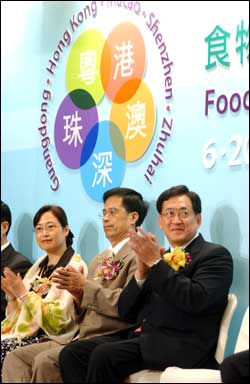 Measures to
combat bird flu are being stepped up, including a crackdown on the smuggling of
birds into Hong Kong from the mainland, health chief York Chow Yat-ngok said.
Speaking at a two-day meeting among Hong Kong, Guangdong, Shenzhen, Zhuhai and
Macau officials to discuss health, animal and plant quarantine and food safety
controls, Chow said there have been 10 cases of birds dying from the deadly H5N1
virus in the territory so far this year. He said customs officials have been
taking further steps to deal with bird smuggling as Hong Kong is now facing a
bigger threat from avian flu. The secretary for health, welfare and food urged
authorities in the five regions to strengthen cooperation on this front. To
prohibit pet bird traders from selling birds of unknown sources, the
Agriculture, Fisheries and Conservation Department has decided to introduce a
number of new licensing conditions. Thomas Sit Hon-chung, the department's
assistant director (inspection and quarantine), said the new conditions would
ensure that all the birds kept on the premises of licensed animal traders were
from approved sources. The birds should either be legally imported to Hong Kong
accompanied by valid health certificates or acquired from other licensed animal
traders and covered by documentation, such as invoices and sale receipts,
detailing the species, quantity, date of transaction and source. Under the new
licensing conditions, only birds free from infectious diseases are allowed to be
sold. Measures to
combat bird flu are being stepped up, including a crackdown on the smuggling of
birds into Hong Kong from the mainland, health chief York Chow Yat-ngok said.
Speaking at a two-day meeting among Hong Kong, Guangdong, Shenzhen, Zhuhai and
Macau officials to discuss health, animal and plant quarantine and food safety
controls, Chow said there have been 10 cases of birds dying from the deadly H5N1
virus in the territory so far this year. He said customs officials have been
taking further steps to deal with bird smuggling as Hong Kong is now facing a
bigger threat from avian flu. The secretary for health, welfare and food urged
authorities in the five regions to strengthen cooperation on this front. To
prohibit pet bird traders from selling birds of unknown sources, the
Agriculture, Fisheries and Conservation Department has decided to introduce a
number of new licensing conditions. Thomas Sit Hon-chung, the department's
assistant director (inspection and quarantine), said the new conditions would
ensure that all the birds kept on the premises of licensed animal traders were
from approved sources. The birds should either be legally imported to Hong Kong
accompanied by valid health certificates or acquired from other licensed animal
traders and covered by documentation, such as invoices and sale receipts,
detailing the species, quantity, date of transaction and source. Under the new
licensing conditions, only birds free from infectious diseases are allowed to be
sold.
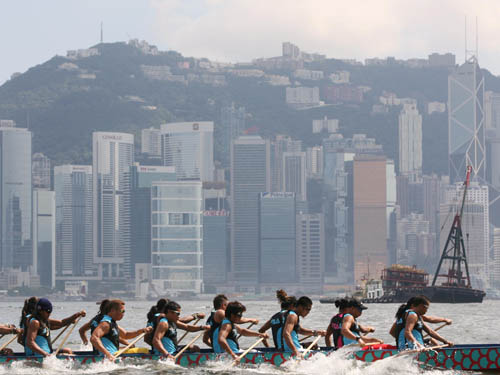 Paddlers prepare for the annual Hong Kong
International Dragon Boat Race, to be held off the Tsim Sha Tsui East waterfront
tomorrow and on Sunday. Crews from South Africa, Australia, the Philippines and
two local teams were among those who practised yesterday.
Paddlers prepare for the annual Hong Kong
International Dragon Boat Race, to be held off the Tsim Sha Tsui East waterfront
tomorrow and on Sunday. Crews from South Africa, Australia, the Philippines and
two local teams were among those who practised yesterday.
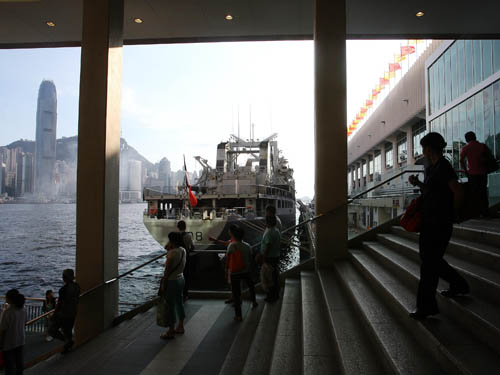 The French supply vessel and flagship FNS Var was in Hong Kong this week to
shore up strategic exercises with the PLA Navy and to show the city's increasing
French population that their nation was behind them. This was the message
yesterday from Rear Admiral Jacques Launay after a series of high-profile
meetings with Hong Kong and mainland officers and officials. Admiral Launay said
there had been few exercises between the two navies in the past, but several
ships from the mainland would be arriving in the Mediterranean in September and
the French hoped to return later in the year to return the favour. But he
refused to be drawn on the political implications of the visit or the desire to
increase military exercises between the two nations. "I am a military man, not a
politician," the admiral said in response to questions on whether the French
navy had conducted exercises with Taiwan. "I cannot really answer these
questions for you. "But I can say we have a good relationship with the navy of
China and there is growing co-operation between the two countries." The admiral,
returning from a meeting with a senior official in the security bureau, said the
navy played a key role in showing the French community it was behind them. "The
French community is very big in Hong Kong now and the consulate is one of the
more developed ones we have. We want to show the community we are there behind
them and out there in the region. We want to show them we have an interest in
their security and co-operation in the region." Admiral Launay hailed the ship's
food, saying the head chef had previously worked for a cabinet minister. He said
one of his and the crew's biggest disappointments was they would not be in town
for celebrations marking the 10th anniversary of the handover.
The French supply vessel and flagship FNS Var was in Hong Kong this week to
shore up strategic exercises with the PLA Navy and to show the city's increasing
French population that their nation was behind them. This was the message
yesterday from Rear Admiral Jacques Launay after a series of high-profile
meetings with Hong Kong and mainland officers and officials. Admiral Launay said
there had been few exercises between the two navies in the past, but several
ships from the mainland would be arriving in the Mediterranean in September and
the French hoped to return later in the year to return the favour. But he
refused to be drawn on the political implications of the visit or the desire to
increase military exercises between the two nations. "I am a military man, not a
politician," the admiral said in response to questions on whether the French
navy had conducted exercises with Taiwan. "I cannot really answer these
questions for you. "But I can say we have a good relationship with the navy of
China and there is growing co-operation between the two countries." The admiral,
returning from a meeting with a senior official in the security bureau, said the
navy played a key role in showing the French community it was behind them. "The
French community is very big in Hong Kong now and the consulate is one of the
more developed ones we have. We want to show the community we are there behind
them and out there in the region. We want to show them we have an interest in
their security and co-operation in the region." Admiral Launay hailed the ship's
food, saying the head chef had previously worked for a cabinet minister. He said
one of his and the crew's biggest disappointments was they would not be in town
for celebrations marking the 10th anniversary of the handover.
Chief Executive Donald Tsang
Yam-kuen will lead three ministers and a top aide on a three-day visit to
Beijing on Tuesday before the start of his new term on July 1. During the visit,
which precedes one by President Hu Jintao to Hong Kong, Mr Tsang will open an
exhibition on Wednesday marking Hong Kong's 10 years as a special administrative
region. The exhibition will be held at the Capital Museum from next Thursday to
July 17. Mr Tsang will be accompanied by Financial Secretary Henry Tang
Ying-yen, Secretary for Housing, Planning and Lands Michael Suen Ming-yeung,
Secretary for Civil Service Denise Yue Chung-yee and director of the Chief
Executive's Office John Tsang Chun-wah. All four officials are expected to serve
in Mr Tsang's new term as ministers, with Mr Tang expected to replace Rafael Hui
Si-yan as chief secretary. Mr Hui will be Acting Chief Executive while Mr Tsang
is in Beijing. It is not known if Mr Tsang will meet state leaders during his
visit to the capital, the second this month. He attended a forum early this
month marking the 10th anniversary of the implementation of the Basic Law. Mr
Tsang's visit to the capital next week forms part of a series of frequent
high-level exchanges between officials in Beijing and Hong Kong. Mr Hu is due to
arrive in Hong Kong next Friday to take part in handover anniversary
celebrations. Apart from attending the swearing-in ceremony of the new Hong Kong
government, he will open the border checkpoint for the Western Corridor.
 China: Chinese
police have put 35 people under criminal detention and are hunting for 20 others
involved in the forced labor scandal in northern Shanxi Province.
China: Chinese
police have put 35 people under criminal detention and are hunting for 20 others
involved in the forced labor scandal in northern Shanxi Province.
China will substantially forgive debt owed by Iraq and
also help with the reconstruction of the war-torn country. That was the pledge
made by President Hu Jintao when he met his Iraqi counterpart Jalal Talabani in
Beijing yesterday. No specific figure was available but Talabani was quoted as
saying ahead of the trip that he would like to have $8 billion in debt
cancelled. Hu said China respects the rights and choices of the Iraqi people,
and will continue to support and participate in the reconstruction of Iraq. The
government will encourage domestic enterprises to invest in Iraq and help with
training of personnel. Foreign Minister Yang Jiechi said last month that China
will grant 50 million yuan ($6.5 million) to Iraq this year to help with public
health and education programs. Hu lauded Talabani's visit - the first by an
Iraqi president since the two nations established diplomatic relations in 1958 -
and said the six-day trip shows that Iraq's new government "pays great attention
to relations with China". Talabani said Iraq treasures the traditional
friendship between the two countries. Baghdad welcomes Chinese firms to join
other international firms in bidding for oil-exploration contracts, and hopes to
revive a frozen oil deal after a domestic oil law is adopted, the Iraqi
ambassador to China said earlier. He was referring to a 1997 deal struck by
China National Petroleum Corp to develop the billion-barrel Al-Ahdab field. The
$1.2 billion contract was signed by the company and the government of former
Iraqi leader Saddam Hussein.
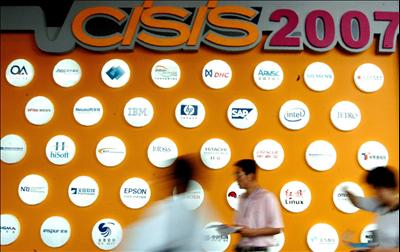 The
Fifth China International Software and Information Service Fair opened on
Thursday in Dalian, a port city in northeast China's Liaoning Province. More
than 700 IT businesses, including Lenovo, Intel, Siemens and Toshiba are
demonstrating consumer electronics, integrated circuits, IT outsourcing and
consultancy, digital entertainment and other services and products at the fair. The
Fifth China International Software and Information Service Fair opened on
Thursday in Dalian, a port city in northeast China's Liaoning Province. More
than 700 IT businesses, including Lenovo, Intel, Siemens and Toshiba are
demonstrating consumer electronics, integrated circuits, IT outsourcing and
consultancy, digital entertainment and other services and products at the fair.
China will spend 20 billion yuan ($2.6 billion) to add 1.7
million hectares of arable land by 2020, a senior official of the Ministry of
Land and Resources (MLR) has said.
China's policy not to use basic food crops, especially
corn, to make biofuel as a substitute for petroleum is a "sound decision", a
Food and Agriculture Organization (FAO) official said yesterday.
The Blackstone Group will sell part of its shares to
China's state foreign exchange investment company at its initial public offering
(IPO) scheduled for Friday, the group announced Thursday. Blackstone, one of the
largest private equity firms in the U.S., announced the IPO of 133,333,334
common units priced at 31 U.S. dollars each, with a total value of 4.1 billion
dollars. Its common units are slated to begin trading on Friday on the New York
Stock Exchange, marking the biggest U.S. IPO in five years. For such general
corporate purposes as purchasing interests in its business from its existing
owners, to repay short-term borrowings, to provide capital to invest in its
existing businesses and to expand into new and complementary businesses,
Blackstone said it is to implement the agreement with China's state foreign
exchange investment company by selling its non-voting common units worth 3
billion dollars to the latter. Blackstone and China's state foreign exchange
investment company, the latter still in process of establishment, reached an
agreement on May 20. Under the agreement, the Chinese company will buy the
shares at 95.5 percent of Blackstone's IPO price and hold them for at least four
years while the deal will be closed concurrently with Blackstone's IPO. Although
the deal has been widely welcomed by Wall Street, some U.S. lawmakers, in a
throwback to the Cold War, urged the U.S. Security and Exchange Commission
(SEC), the Department of Treasury and the Department of Homeland Security to
delay Blackstone's IPO due to what they called national security reasons. In a
letter to the SEC and the other two departments, Democratic senator Jim Webb
said "in making this request, I express my concern regarding the enormity of
this public offering and the large investment from a foreign government."
However, the SEC ignored his proposal and approved Blackstone's IPO, saying an
IPO may be delayed only if a company had issued "material misstatements or
omissions." The Blackstone Group, a leading global alternative asset manager and
provider of financial advisory services, deals with such businesses as the
management of corporate private equity funds, real estate opportunity funds,
hedge funds, mezzanine funds, senior debt funds, proprietary hedge funds and
closed-end mutual funds. It also provides financial advisory services on mergers
and acquisitions, restructuring, reorganization and fund placement services.
 Taiwan
singer-actor Jay Chou (R) and Taiwan actress Guey Lun-mei pose during the news
conference of Jay Chou's new self-directed film "Secret" in Shanghai June 21,
2007. Taiwan
singer-actor Jay Chou (R) and Taiwan actress Guey Lun-mei pose during the news
conference of Jay Chou's new self-directed film "Secret" in Shanghai June 21,
2007.
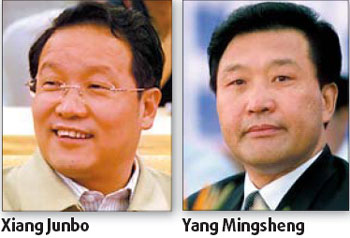 Agricultural Bank of China 's restructuring is expected to accelerate after
Xiang Junbo's appointment as president. Xiang, the former deputy governor of
People's Bank of China, the country's central bank, will replace Yang Mingsheng
as president, sources close to the bank confirmed. Yang will become
vice-chairman of the China Insurance Regulatory Commission , the sources said.
Xiang's experience in the central bank and the National Audit Office will help
bring credibility to the bank's long-awaited reform, experts said. Xiang, 55,
joined the National Audit Office in 1996 and was appointed as the central bank's
deputy governor in 2004. "The detailed reform scheme is likely to come out after
Xiang's appointment," said Zhao Xijun, a professor at Renmin University of
China. Issues like whether to introduce strategic investors will be resolved
soon, he said.
Agricultural Bank of China 's restructuring is expected to accelerate after
Xiang Junbo's appointment as president. Xiang, the former deputy governor of
People's Bank of China, the country's central bank, will replace Yang Mingsheng
as president, sources close to the bank confirmed. Yang will become
vice-chairman of the China Insurance Regulatory Commission , the sources said.
Xiang's experience in the central bank and the National Audit Office will help
bring credibility to the bank's long-awaited reform, experts said. Xiang, 55,
joined the National Audit Office in 1996 and was appointed as the central bank's
deputy governor in 2004. "The detailed reform scheme is likely to come out after
Xiang's appointment," said Zhao Xijun, a professor at Renmin University of
China. Issues like whether to introduce strategic investors will be resolved
soon, he said.
Crackdown on bribes given to TV censors - Spotlight falls
on 'fees' paid to get shows aired. China's media watchdog has vowed to fight
corruption in television drama approvals after a prominent writer blew the
whistle on censors taking bribes. "TV production companies can report to the
administration if censors collected unwarranted fees. If proved true, we will
strictly deal with it," Li Jingsheng , the State Administration of Radio, Film
and Television's (Sarft) director of TV drama, said in an online forum last
week. Mr Li's remarks came amid heated discussion over a letter to the
administration by prominent novelist Wang Shuo , published on his blog last
week, claiming that a drama's broadcast depended on bribes given to a small
group of censors. Wang, who used to write TV dramas and had one of his novels
adapted into a series, said the group, usually comprising retired or senior
artists, had "absolute power" to demand bribes from production companies in the
name of censorship fees and had done so since the 1990s. TV drama director Ye
Jing agreed with Wang's claims and was quoted in the Beijing News as saying he
paid more than 100,000 yuan in "censorship fees" for a show he made in the
1990s, which despite being censored three times did not end up getting a green
light because of its "vulgar taste and wrong direction". Sarft and its
provincial subordinates decide which dramas are suitable for mainland audiences
and expenses incurred in the censorship process are covered by their
administrative budget. Mr Li admitted a few provincial agencies failed to follow
the rules, partly because there were so few TV dramas produced in their region,
and they had not yet established censorship panels or a budget. Their expenses
usually included venue rental, accommodation, food and wages paid to censors, he
said. He said some programs involved special or sensitive issues such as
religion, ethnic minorities and foreign affairs, and required expert
examination. The cost of these added expenses would normally be passed on to the
production company. Mr Li said a Sarft circular issued in September demanded its
provincial subordinates improve their censorship budget systems.
Google has won preliminary approval from the central
government to provide internet content in the mainland, the company said
yesterday, potentially allowing it to offer news in the world's second-largest
internet market. The licence from the Ministry of Information and Industry could
also help Google attract more advertising revenue, analysts said. "We have made
very positive progress on the ICP [internet content provider] application and
have received preliminary approval," spokeswoman Marsha Wang said. She declined
to say what further procedures may be required for final approval to offer news
in the mainland, although analysts said the move helped to add legitimacy to its
operations in the country. "It's definitely a very positive move for Google,"
said Edward Yu, the president of researcher Analysys International. "The licence
to provide content to audiences is critical to attract big advertisers, and also
helps them try to have more content." The mainland's web search market leader,
Baidu.com, received a licence at the beginning of this year to provide news.
Baidu had 21 per cent of the country's 1.37 billion yuan online advertising
market in the first quarter, compared with 7 per cent for Google China, Analyst
said. Google yesterday said it had more visitors to its mainland website from
January to April than the whole of last year, after the company increased
investments and services. "Our traffic is up," said Sukhinder Singh Cassidy, a
vice-president for Asia-Pacific and Latin America. "Google is closing the gap
with Baidu on advertisers."
June 23 - 24, 2007
 Hong Kong:
The late Chinese leader Deng Xiaoping pledged to keep Hong Kong's three
capitalistic characteristics - horse racing, dancing and stock exchanges -
intact for at least 50 years after its return. This pledge is being upheld as
the Special Administrative Region marks the 10th anniversary of its return to
the motherland. Today, more Chinese mainland residents are playing the Hong Kong
stock markets, attending its horse races and visiting Lan Kwai Fong, Hong Kong's
top entertainment center. For over a century, horseracing has thrilled Hong Kong
people. Race days are held on most Wednesdays and weekends from September to
June. During the season, many can be seen burying their heads in newspapers at
teahouses studying the form of horses. "After Hong Kong's return, horse racing
has not only been retained, but has grown with the support of the central
government and Hong Kong people," said Kim K.W. Mak, executive director of the
corporate development department of the Hong Kong Jockey Club. Mak said the
jockey club is now striving to provide its best facilities for the coming 2008
Beijing Olympic Games. It will host the equestrian events. The club manages two
racecourses - Happy Valley and Sha Tin - attracting more than 2 million
racegoers each racing season. The club's betting turnover, exceeds HK$16.3
billion every fiscal year. It contributes 1.3 percent to GDP, and 10 percent of
the government's tax revenue. It is also one of the 10 biggest employers in Hong
Kong, employing more than 5,000 full-time workers and 20,000 part-time staff on
race days. As the largest charity organization in Hong Kong, the club was a
major donor to the anti-SARS campaign in the spring of 2003. Today, the people
of Hong Kong enjoy stability in every aspect of their lives. "We don't see any
difference in our way of life after 1997," said Wong Yim-fat, a fishmonger in
Hong Kong. "Though there have been hard times, we have come through it,
believing things can only get better." Wong now plays the stock markets and has
had some luck with the Hang Seng Index rising from 15,196 points in July 1997 to
about 21,685 today. "Actually, as masters of our own society, we feel there is
more freedom and opportunities following Hong Kong's return," Wong said. Wong
said he is happy with his decision to remain in Hong Kong after its return and
not seek to emigrate as some of his friends and relatives did. "Many of my
friends who have emigrated have come back, after finding out that things have
not changed," Wong said. Before 1997, many Hong Kong people were uncertain about
its future and left for other countries. Official figures from Hong Kong Customs
show that more than 300,000 people moved to America, Australia and Canada
between 1990 and 1997. Ten years later, many returned because of Hong Kong's
stability and prosperity. Renee Chu, an assistant computer officer at the
Chinese University of Hong Kong, was one of those who left before 1997.
Following her parent's wishes, Renee left for Australia in 1990 when she was
still a middle school student. "At that time, they were concerned about Hong
Kong's future and wanted us to receive a better education abroad," she told
Xinhua News Agency in a recent interview. After graduating from university,
Renee returned to Hong Kong in 2000 as it offered better job opportunities. Hong
Kong was hit by an economic downturn and an outbreak of SARS after 1997, but
that did not stop the Chu family from returning. "There are always good and bad
times for a place," Renee said. "My parents return to Australia from time to
time," Renee said, "but their stays have become shorter. They now spend more
time in Hong Kong and the mainland." Most Hong Kong people were able to gain
residency abroad because of their technological skills and investments. While
Hong Kong has retained its attraction for locals, it has also lured more people
to its shores. Official statistics show that the number of overseas people in
Hong Kong - Indians, Filipinos and British - account for 71,000 out of a
population of 6.9 million. The culture of tolerance can be seen in the busy
streets. There are restaurants and shops from all nations. "Hong Kong is really
a very tolerant and free-spirited city. The cultural tolerance and perfect
mixture is reflected in the diversity of our international visitors," said B.C.
Lo, vice-president of public affairs, Hong Kong Disneyland. Hong Kong, however,
has undergone some subtle changes too. This is evident in the choice of
passport. Ten years after Hong Kong's return to the motherland, many Hong Kong
people have abandoned their British National (Overseas) or BNO passports in
favor of the Hong Kong Special Administrative Region (HKSAR) passport. According
to Hong Kong Immigration Department sources, in the past 10 years, as many as 4
million, or 60 percent of Hong Kong's population of permanent residents, have
applied for HKSAR passports, and the number is growing. The HKSAR government has
managed to obtain visa-free access to as many as 134 countries or regions. BNO
passports enjoyed visa-free access to only 114 countries. The passports are
still valid. The safety ensured by Chinese embassies and consulates as well as a
sense of nationalism have also been key factors in the popularity of HKSAR
passports. Wong Yim-fat is of those who think HKSAR passports are not only more
convenient, but also offer consular or embassy protection from the Chinese
government in times of distress. "While holding a BNO passport, you felt like a
second-class citizen," Wong said. "But a HKSAR passport gives you all the
privilege that a Chinese citizen enjoys." According to Lu Xinhua, commissioner
of the Ministry of Foreign Affairs in the HKSAR, not only Hongkongers have
enjoyed an uplift in their international status, but also the HKSAR government.
During the past 10 years, the HKSAR government has joined more than 50
international, intra-government organizations and 200 international treaties
with the proper identity of Hong Kong, China. "Under the Basic Law, we have
tried our best to help exchanges between the HKSAR government and the
international community, in order to forge its long-term prosperity and
stability," Lu said. Hong Kong:
The late Chinese leader Deng Xiaoping pledged to keep Hong Kong's three
capitalistic characteristics - horse racing, dancing and stock exchanges -
intact for at least 50 years after its return. This pledge is being upheld as
the Special Administrative Region marks the 10th anniversary of its return to
the motherland. Today, more Chinese mainland residents are playing the Hong Kong
stock markets, attending its horse races and visiting Lan Kwai Fong, Hong Kong's
top entertainment center. For over a century, horseracing has thrilled Hong Kong
people. Race days are held on most Wednesdays and weekends from September to
June. During the season, many can be seen burying their heads in newspapers at
teahouses studying the form of horses. "After Hong Kong's return, horse racing
has not only been retained, but has grown with the support of the central
government and Hong Kong people," said Kim K.W. Mak, executive director of the
corporate development department of the Hong Kong Jockey Club. Mak said the
jockey club is now striving to provide its best facilities for the coming 2008
Beijing Olympic Games. It will host the equestrian events. The club manages two
racecourses - Happy Valley and Sha Tin - attracting more than 2 million
racegoers each racing season. The club's betting turnover, exceeds HK$16.3
billion every fiscal year. It contributes 1.3 percent to GDP, and 10 percent of
the government's tax revenue. It is also one of the 10 biggest employers in Hong
Kong, employing more than 5,000 full-time workers and 20,000 part-time staff on
race days. As the largest charity organization in Hong Kong, the club was a
major donor to the anti-SARS campaign in the spring of 2003. Today, the people
of Hong Kong enjoy stability in every aspect of their lives. "We don't see any
difference in our way of life after 1997," said Wong Yim-fat, a fishmonger in
Hong Kong. "Though there have been hard times, we have come through it,
believing things can only get better." Wong now plays the stock markets and has
had some luck with the Hang Seng Index rising from 15,196 points in July 1997 to
about 21,685 today. "Actually, as masters of our own society, we feel there is
more freedom and opportunities following Hong Kong's return," Wong said. Wong
said he is happy with his decision to remain in Hong Kong after its return and
not seek to emigrate as some of his friends and relatives did. "Many of my
friends who have emigrated have come back, after finding out that things have
not changed," Wong said. Before 1997, many Hong Kong people were uncertain about
its future and left for other countries. Official figures from Hong Kong Customs
show that more than 300,000 people moved to America, Australia and Canada
between 1990 and 1997. Ten years later, many returned because of Hong Kong's
stability and prosperity. Renee Chu, an assistant computer officer at the
Chinese University of Hong Kong, was one of those who left before 1997.
Following her parent's wishes, Renee left for Australia in 1990 when she was
still a middle school student. "At that time, they were concerned about Hong
Kong's future and wanted us to receive a better education abroad," she told
Xinhua News Agency in a recent interview. After graduating from university,
Renee returned to Hong Kong in 2000 as it offered better job opportunities. Hong
Kong was hit by an economic downturn and an outbreak of SARS after 1997, but
that did not stop the Chu family from returning. "There are always good and bad
times for a place," Renee said. "My parents return to Australia from time to
time," Renee said, "but their stays have become shorter. They now spend more
time in Hong Kong and the mainland." Most Hong Kong people were able to gain
residency abroad because of their technological skills and investments. While
Hong Kong has retained its attraction for locals, it has also lured more people
to its shores. Official statistics show that the number of overseas people in
Hong Kong - Indians, Filipinos and British - account for 71,000 out of a
population of 6.9 million. The culture of tolerance can be seen in the busy
streets. There are restaurants and shops from all nations. "Hong Kong is really
a very tolerant and free-spirited city. The cultural tolerance and perfect
mixture is reflected in the diversity of our international visitors," said B.C.
Lo, vice-president of public affairs, Hong Kong Disneyland. Hong Kong, however,
has undergone some subtle changes too. This is evident in the choice of
passport. Ten years after Hong Kong's return to the motherland, many Hong Kong
people have abandoned their British National (Overseas) or BNO passports in
favor of the Hong Kong Special Administrative Region (HKSAR) passport. According
to Hong Kong Immigration Department sources, in the past 10 years, as many as 4
million, or 60 percent of Hong Kong's population of permanent residents, have
applied for HKSAR passports, and the number is growing. The HKSAR government has
managed to obtain visa-free access to as many as 134 countries or regions. BNO
passports enjoyed visa-free access to only 114 countries. The passports are
still valid. The safety ensured by Chinese embassies and consulates as well as a
sense of nationalism have also been key factors in the popularity of HKSAR
passports. Wong Yim-fat is of those who think HKSAR passports are not only more
convenient, but also offer consular or embassy protection from the Chinese
government in times of distress. "While holding a BNO passport, you felt like a
second-class citizen," Wong said. "But a HKSAR passport gives you all the
privilege that a Chinese citizen enjoys." According to Lu Xinhua, commissioner
of the Ministry of Foreign Affairs in the HKSAR, not only Hongkongers have
enjoyed an uplift in their international status, but also the HKSAR government.
During the past 10 years, the HKSAR government has joined more than 50
international, intra-government organizations and 200 international treaties
with the proper identity of Hong Kong, China. "Under the Basic Law, we have
tried our best to help exchanges between the HKSAR government and the
international community, in order to forge its long-term prosperity and
stability," Lu said.
 A baby dressed as a
panda rests on stage during a promotional event at a shopping mall in Hong Kong
June 21, 2007, to celebrate the 10th anniversary of Hong Kong's return to
Chinese sovereignty on July 1. A baby dressed as a
panda rests on stage during a promotional event at a shopping mall in Hong Kong
June 21, 2007, to celebrate the 10th anniversary of Hong Kong's return to
Chinese sovereignty on July 1.
Efforts by Hong Kong Exchanges and
Clearing (HKEx) to attract more foreign companies will not cause harm to
mainland companies already listed or considering listing on the bourse, Chairman
Ronald Arculli said. Instead, the move will help enhance Hong Kong's image as an
international bourse and will benefit mainland companies on the exchange, the
head of operator of the world's second largest listed exchange told China Daily.
"We are widening listing sources from emerging markets. Our senior staff
recently traveled to countries like Russia and South Korea to promote the Hong
Kong exchange among local businesspeople," he said. As the world's
seventh-largest exchange in terms of capitalization, Hong Kong sees an urgent
need to cast its net outside the mainland. Many of the mainland's largest firms
have already listed in Hong Kong, but the central government now actively
encourages blue-chip firms to list on the mainland.
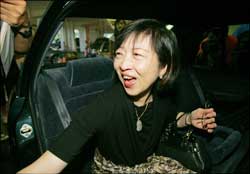 Independent Commission Against Corruption commissioner Fanny Law Fan Chui-fun
resigned Wednesday after a commission of inquiry found she had interfered in the
freedom of two academics when she was permanent secretary for education. But, in
an open letter distributed after the announcement of her resignation - which
takes effect July 1 - Law insisted she had not interfered with academic freedom
and suggested the situation in which she was placed was due to "the unhealthy
political situation in Hong Kong." She said: "I do not believe I have interfered
with academic freedom. I therefore regret, and am disappointed with, the
commission's conclusion. "Clearly, there are serious and irreconcilable
differences between me and the commission over the boundary of academic freedom.
"To safeguard the dignity of a civil servant in the implementation of government
policies and in the discharge of duties, I have decided not to remain in the
public service. I have no regret about leaving the public service, but I do have
concerns. If my departure could stimulate discussion and reflection on the
unhealthy political situation in Hong Kong, this would be my last contribution
as a civil servant." Law's resignation was announced after the commission which
had been looking into allegations of government meddling into the affairs of the
Hong Kong Institute of Education had cleared Secretary for Education and
Manpower Arthur Li Kwok-cheung of all charges but said Law had acted improperly
with regard to two academics.
Independent Commission Against Corruption commissioner Fanny Law Fan Chui-fun
resigned Wednesday after a commission of inquiry found she had interfered in the
freedom of two academics when she was permanent secretary for education. But, in
an open letter distributed after the announcement of her resignation - which
takes effect July 1 - Law insisted she had not interfered with academic freedom
and suggested the situation in which she was placed was due to "the unhealthy
political situation in Hong Kong." She said: "I do not believe I have interfered
with academic freedom. I therefore regret, and am disappointed with, the
commission's conclusion. "Clearly, there are serious and irreconcilable
differences between me and the commission over the boundary of academic freedom.
"To safeguard the dignity of a civil servant in the implementation of government
policies and in the discharge of duties, I have decided not to remain in the
public service. I have no regret about leaving the public service, but I do have
concerns. If my departure could stimulate discussion and reflection on the
unhealthy political situation in Hong Kong, this would be my last contribution
as a civil servant." Law's resignation was announced after the commission which
had been looking into allegations of government meddling into the affairs of the
Hong Kong Institute of Education had cleared Secretary for Education and
Manpower Arthur Li Kwok-cheung of all charges but said Law had acted improperly
with regard to two academics.
Sandy Flockhart, an experienced
banker with a broad understanding of emerging markets, is returning to Hong Kong
to head up the Asian operations of Hongkong and Shanghai Banking Corp.
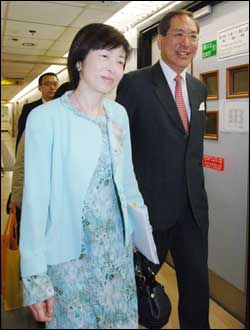 The commission of inquiry Wednesday dismissed allegations senior government
officials had interfered with the institutional autonomy of the Hong Kong
Institute of Education but said there was improper interference in academic
freedom by Fanny Law Fan Chiu-fun, the anti-graft chief who immediately
announced her early retirement. Secretary for Education and Manpower Arthur Li
Kwok-cheung said he welcomed the findings and that he was "naturally pleased to
have been exonerated of any wrongdoing or misdeeds by the commission of
inquiry." The commission found the allegation Li had tried to force the
institute's president Paul Morris to merge HKIEd with the Chinese University of
Hong Kong was not established. In addition, the allegation by former institute
vice president Bernard Luk Hung-kay he was told by Li he would have to "pay" for
refusing Li's demand was also not established. But Law, then permanent secretary
for education and manpower, was found to have acted improperly when she asked
Morris to try to curb criticism of the government's education reforms by the
institute's academics. Although the commission cleared Li of wrongdoing, it
concluded "it was more likely than not that Professor Li used the word `rape' in
connection with the proposed merger of HKIEd and CUHK."
The commission of inquiry Wednesday dismissed allegations senior government
officials had interfered with the institutional autonomy of the Hong Kong
Institute of Education but said there was improper interference in academic
freedom by Fanny Law Fan Chiu-fun, the anti-graft chief who immediately
announced her early retirement. Secretary for Education and Manpower Arthur Li
Kwok-cheung said he welcomed the findings and that he was "naturally pleased to
have been exonerated of any wrongdoing or misdeeds by the commission of
inquiry." The commission found the allegation Li had tried to force the
institute's president Paul Morris to merge HKIEd with the Chinese University of
Hong Kong was not established. In addition, the allegation by former institute
vice president Bernard Luk Hung-kay he was told by Li he would have to "pay" for
refusing Li's demand was also not established. But Law, then permanent secretary
for education and manpower, was found to have acted improperly when she asked
Morris to try to curb criticism of the government's education reforms by the
institute's academics. Although the commission cleared Li of wrongdoing, it
concluded "it was more likely than not that Professor Li used the word `rape' in
connection with the proposed merger of HKIEd and CUHK."
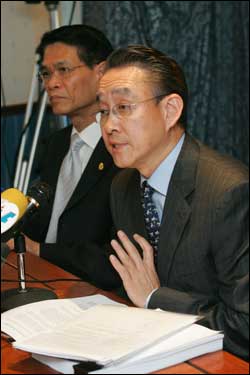 The Hong Kong
Institute of Education's council has strongly defended outgoing anti-graft chief
Fanny Law Fan Chiu- fun, describing her departure as a "loss to both the
education sector and Hong Kong." Council member Anthony Chow Wing-kin said the
commission of inquiry's report did not produce adequate evidence that Law had
interfered with the institute's academic freedom and autonomy. "She has made
lots of contributions to Hong Kong. She has contributed not only to the
education sector, but also to other sectors in Hong Kong as well. It's a pity to
lose her," Chow said. Another council member, Ma Shiu- leung, said although Law
had interfered with academic freedom, she had launched many initiatives for the
good of local education. Chow admitted there "seemed to be" some communication
gaps between the institute and the government. The council, he said, will study
the commission's report thoroughly and try to find ways of bridging those gaps.
He also said the institute had taken steps, on the advice of its legal advisors,
to remove an article written and posted on the institute's intranet by former
institute vice president Bernard Luk Hung-kay. "The HKIEd storm was triggered by
that article. If any article posted on the intranet is found to be inaccurate,
it should be removed," Chow said. Asked if there will be any changes to the
council's membership, Chow stressed there "would not" and "should not" be any
changes. "The incident is a lesson for the council to improve our management,
especially when it comes to communication between the institute and the
government," Chow said, adding they still have a lot of work to do, including
the preparation of a blueprint to be submitted to the government in applying for
university status for the institute at the end of this month. James Sung
Lap-kung, a professor of politics at the City University of Hong Kong, said he
was surprised that the report chided Law, while Secretary for Education and
Manpower Arthur Li Kwok-cheung was found not guilty. In his view, Law should not
step down. The Hong Kong
Institute of Education's council has strongly defended outgoing anti-graft chief
Fanny Law Fan Chiu- fun, describing her departure as a "loss to both the
education sector and Hong Kong." Council member Anthony Chow Wing-kin said the
commission of inquiry's report did not produce adequate evidence that Law had
interfered with the institute's academic freedom and autonomy. "She has made
lots of contributions to Hong Kong. She has contributed not only to the
education sector, but also to other sectors in Hong Kong as well. It's a pity to
lose her," Chow said. Another council member, Ma Shiu- leung, said although Law
had interfered with academic freedom, she had launched many initiatives for the
good of local education. Chow admitted there "seemed to be" some communication
gaps between the institute and the government. The council, he said, will study
the commission's report thoroughly and try to find ways of bridging those gaps.
He also said the institute had taken steps, on the advice of its legal advisors,
to remove an article written and posted on the institute's intranet by former
institute vice president Bernard Luk Hung-kay. "The HKIEd storm was triggered by
that article. If any article posted on the intranet is found to be inaccurate,
it should be removed," Chow said. Asked if there will be any changes to the
council's membership, Chow stressed there "would not" and "should not" be any
changes. "The incident is a lesson for the council to improve our management,
especially when it comes to communication between the institute and the
government," Chow said, adding they still have a lot of work to do, including
the preparation of a blueprint to be submitted to the government in applying for
university status for the institute at the end of this month. James Sung
Lap-kung, a professor of politics at the City University of Hong Kong, said he
was surprised that the report chided Law, while Secretary for Education and
Manpower Arthur Li Kwok-cheung was found not guilty. In his view, Law should not
step down.
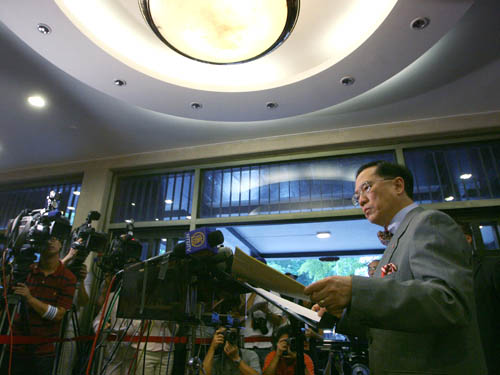 The chief executive has been urged
by a top academic to take the lesson of the HKIEd seriously and reflect on
weaknesses of the ministerial system.
Officials and academics yesterday
expressed concern about the possibility of growing distrust between the
government and the agencies they oversee in the wake of the HKIEd controversy.
The judicial hearing into allegations of official pressure for a merger of the
HKIEd and the Chinese University of Hong Kong, as well as attempts to curb
dissent, revealed distrust between the Education and Manpower Bureau and the
teacher training institute. HKIEd president Paul Morris even recorded a
conversation with education minister Arthur Li Kwok-cheung in November 2005 - a
tape which was played at the hearing. Some government officials have said the
relationship with the agencies was at times fragile. Poon Wai-ming, chairman of
the Senior Government Officers' Association, believed that former permanent
secretary for education and manpower Fanny Law Fan Chiu-fun's experience would
not affect morale in the civil service and bureaucrats should not be asked to
think twice before offering their "objective views". "In this age there is
nothing off-the-record. We should take responsibility for our words. As long as
what we say is reasonable when debating with people, we should have no problem
because we are doing our jobs," Mr Poon said. James Sung Lap-kung, a political
scientist of the City University, feared officials would revert to their
bureaucratic practice of being "ambiguous" when faced with questions. Academics
also voiced concern that they may be reluctant to publicly criticise the
government, citing other experiences of tampering by officials. Chairman of the
Federation of Hong Kong Higher Education Staff Associations, Shum Kar-ping, said
academics would exercise greater care before criticising the government for fear
of losing their jobs. Professor Shum said academics had lost confidence in the
government after it was alleged that Mrs Law had demanded dismissals.
The chief executive has been urged
by a top academic to take the lesson of the HKIEd seriously and reflect on
weaknesses of the ministerial system.
Officials and academics yesterday
expressed concern about the possibility of growing distrust between the
government and the agencies they oversee in the wake of the HKIEd controversy.
The judicial hearing into allegations of official pressure for a merger of the
HKIEd and the Chinese University of Hong Kong, as well as attempts to curb
dissent, revealed distrust between the Education and Manpower Bureau and the
teacher training institute. HKIEd president Paul Morris even recorded a
conversation with education minister Arthur Li Kwok-cheung in November 2005 - a
tape which was played at the hearing. Some government officials have said the
relationship with the agencies was at times fragile. Poon Wai-ming, chairman of
the Senior Government Officers' Association, believed that former permanent
secretary for education and manpower Fanny Law Fan Chiu-fun's experience would
not affect morale in the civil service and bureaucrats should not be asked to
think twice before offering their "objective views". "In this age there is
nothing off-the-record. We should take responsibility for our words. As long as
what we say is reasonable when debating with people, we should have no problem
because we are doing our jobs," Mr Poon said. James Sung Lap-kung, a political
scientist of the City University, feared officials would revert to their
bureaucratic practice of being "ambiguous" when faced with questions. Academics
also voiced concern that they may be reluctant to publicly criticise the
government, citing other experiences of tampering by officials. Chairman of the
Federation of Hong Kong Higher Education Staff Associations, Shum Kar-ping, said
academics would exercise greater care before criticising the government for fear
of losing their jobs. Professor Shum said academics had lost confidence in the
government after it was alleged that Mrs Law had demanded dismissals.
 China: PetroChina
Company Limited, a subsidiary of China's largest oil producer China National
Petroleum Corporation (CNPC), on Wednesday announced plans for a public offering
of up to 4 billion A shares on the Shanghai Stock Exchange.
China: PetroChina
Company Limited, a subsidiary of China's largest oil producer China National
Petroleum Corporation (CNPC), on Wednesday announced plans for a public offering
of up to 4 billion A shares on the Shanghai Stock Exchange.
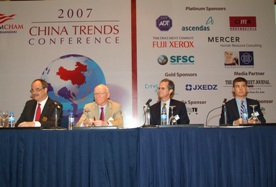 AmCham
Shanghai holds 2007 China Trends Conference - Against the backdrop of being
located in arguably the hottest business market in the world, Phil Branham,
president of B&L Group, and past AmCham Shanghai Chairman, noted, There is a
great deal of confusion about China's future, in his opening remarks for AmCham
Shanghai's first annual China Trends Conference. Our guest speakers today will
offer us on an outlook. He added: No one has a crystal ball. His comment framed
the mission of the day-long event, held in the Pudong Shangri-La Hotel on June 8
and attended by nearly 300 business executives. Expert panelists reviewed hot
topics such as expansion into 2nd and 3rd tier cities, legal and investment
trends, government relations and human resources. The keynote address featured a
lively presentation about the upcoming 2010 Shanghai Expo by Zhou Hanmin, deputy
director general for the Bureau of Shanghai World Expo Coordination. It's not an
Expo for the city, it's an Expo for the world, he said. The conference concluded
with a panel of journalists including members of the Pulitzer Prize-winning team
from The Wall Street Journal. AmCham
Shanghai holds 2007 China Trends Conference - Against the backdrop of being
located in arguably the hottest business market in the world, Phil Branham,
president of B&L Group, and past AmCham Shanghai Chairman, noted, There is a
great deal of confusion about China's future, in his opening remarks for AmCham
Shanghai's first annual China Trends Conference. Our guest speakers today will
offer us on an outlook. He added: No one has a crystal ball. His comment framed
the mission of the day-long event, held in the Pudong Shangri-La Hotel on June 8
and attended by nearly 300 business executives. Expert panelists reviewed hot
topics such as expansion into 2nd and 3rd tier cities, legal and investment
trends, government relations and human resources. The keynote address featured a
lively presentation about the upcoming 2010 Shanghai Expo by Zhou Hanmin, deputy
director general for the Bureau of Shanghai World Expo Coordination. It's not an
Expo for the city, it's an Expo for the world, he said. The conference concluded
with a panel of journalists including members of the Pulitzer Prize-winning team
from The Wall Street Journal.
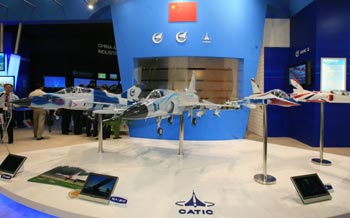 Aircraft models are displayed at the
booth of China National Aero-Technology Import and Export Corporation (CATIC)
during the 47th Paris Air Show in Paris, France, June 20, 2007. Five Chinese
aero corporations, including China Aviation Industry Corporation I (AVIC I) and
CATIC, attended this year's air show.
Aircraft models are displayed at the
booth of China National Aero-Technology Import and Export Corporation (CATIC)
during the 47th Paris Air Show in Paris, France, June 20, 2007. Five Chinese
aero corporations, including China Aviation Industry Corporation I (AVIC I) and
CATIC, attended this year's air show.
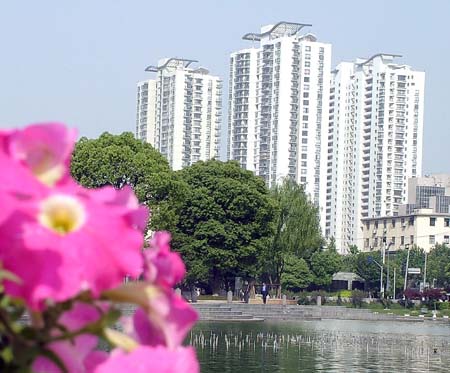 Buildings in Shanghai. According to the statistics released by the National
Bureau of Statistics on Tuesday, the national real estate climate index in May
was 103.32, up by 0.67 points as compared with that in the previous month, 1.45
points higher than that was in the same period last year. The real estate market
remains picking up amid the country's cooling down measures.
Buildings in Shanghai. According to the statistics released by the National
Bureau of Statistics on Tuesday, the national real estate climate index in May
was 103.32, up by 0.67 points as compared with that in the previous month, 1.45
points higher than that was in the same period last year. The real estate market
remains picking up amid the country's cooling down measures.
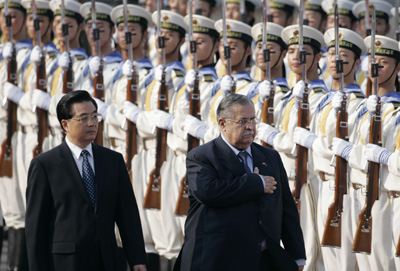 China's President Hu Jintao (L)
and Iraq's President Jalal Talabani review the honor guard during a welcoming
ceremony outside the Great Hall of the People in Beijing June 21, 2007. Talabani
is on a week-long trip to China.
China's President Hu Jintao (L)
and Iraq's President Jalal Talabani review the honor guard during a welcoming
ceremony outside the Great Hall of the People in Beijing June 21, 2007. Talabani
is on a week-long trip to China.
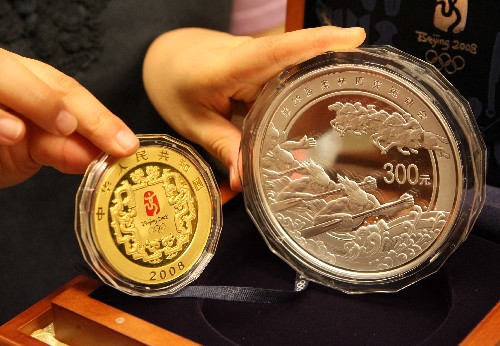 China's central bank unveiled on Wednesday a second set of
gold and silver coins to commemorate the 2008 Beijing Olympics. The second set
consists of eight commemorative coins, two made with a third ounce of gold, one
with five ounces of gold, four with an ounce of silver, and one with a full
kilogram of silver. The brass-alloy coins, which are legal tender and can be
used as normal currency, were put on the market by the China Gold Coin
Incorporation the same day. All the coins carry the logo of the Beijing Olympics
on one side. Images on the other sides vary from Olympic mascots, dragons, the
Great Wall to the Summer Palace, as well as martial arts scenes and dragon boat
racing. China released the first set of Beijing Olympics gold and silver
commemorative coins in September 2006, and a third set will be issued in 2008.
Finland began the practice of Olympic Game hosts issuing commemorative coins
back in 1952 .
China's central bank unveiled on Wednesday a second set of
gold and silver coins to commemorate the 2008 Beijing Olympics. The second set
consists of eight commemorative coins, two made with a third ounce of gold, one
with five ounces of gold, four with an ounce of silver, and one with a full
kilogram of silver. The brass-alloy coins, which are legal tender and can be
used as normal currency, were put on the market by the China Gold Coin
Incorporation the same day. All the coins carry the logo of the Beijing Olympics
on one side. Images on the other sides vary from Olympic mascots, dragons, the
Great Wall to the Summer Palace, as well as martial arts scenes and dragon boat
racing. China released the first set of Beijing Olympics gold and silver
commemorative coins in September 2006, and a third set will be issued in 2008.
Finland began the practice of Olympic Game hosts issuing commemorative coins
back in 1952 .
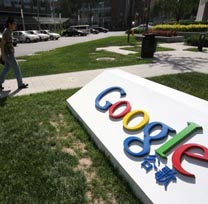 Google's China
headquarters in Tsinghua Science Park, Beijing. The company denied the report
that Google Inc has won approval from the Chinese gov't to provide Internet
content in China. Google's China
headquarters in Tsinghua Science Park, Beijing. The company denied the report
that Google Inc has won approval from the Chinese gov't to provide Internet
content in China.
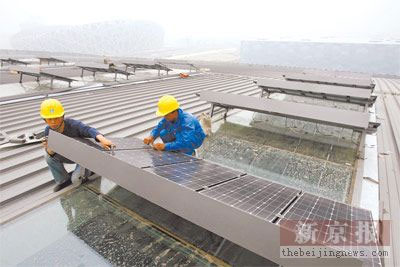 Two workers install solar panels over the curved
roof of Beijing's National Indoor Stadium, dubbed with 'Bird's Nest', June 19,
2007. Beijing News reported that the host city has finished the installation of
a total of 1,124 solar panels, with a lifespan of about 25 years. 1,100 of them
have been installed atop the roof, each spanning 1.2 meters long and 0.8 meters
wide. The other 24 replace the glass curtain wall on the stadium's southern
face. When the solar modules are put into use, they are expected to save 904.8
tons of standard coal in their lifetime.
Two workers install solar panels over the curved
roof of Beijing's National Indoor Stadium, dubbed with 'Bird's Nest', June 19,
2007. Beijing News reported that the host city has finished the installation of
a total of 1,124 solar panels, with a lifespan of about 25 years. 1,100 of them
have been installed atop the roof, each spanning 1.2 meters long and 0.8 meters
wide. The other 24 replace the glass curtain wall on the stadium's southern
face. When the solar modules are put into use, they are expected to save 904.8
tons of standard coal in their lifetime.
June 22, 2007
 Hong Kong:
Hong Kong Jockey Club Institute of Chinese Medicine Limited (HKJCICM) announced
today that it had signed a collaboration and services agreement with Phynova
Group PLC in the United Kingdom ("Phynova") (AIM: PYN), a developer of
pharmaceuticals derived from Chinese botanical drugs targeting viral and
metabolic diseases and cancer, on 5 February 2007 to develop novel anti-cancer
drugs based on Chinese medicines. Hong Kong:
Hong Kong Jockey Club Institute of Chinese Medicine Limited (HKJCICM) announced
today that it had signed a collaboration and services agreement with Phynova
Group PLC in the United Kingdom ("Phynova") (AIM: PYN), a developer of
pharmaceuticals derived from Chinese botanical drugs targeting viral and
metabolic diseases and cancer, on 5 February 2007 to develop novel anti-cancer
drugs based on Chinese medicines.
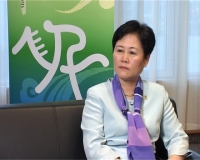 The Equestrian
Marketing Programme in Hong Kong is part of the marketing programme of the
Beijing Olympics that aims to give Hong Kong enterprises a platform on which to
further build their corporate and product image, says Yuan Bin, Director of
Marketing Department of BOCOG. The marketing programme will target at the
service sector in Hong Kong.
The Equestrian
Marketing Programme in Hong Kong is part of the marketing programme of the
Beijing Olympics that aims to give Hong Kong enterprises a platform on which to
further build their corporate and product image, says Yuan Bin, Director of
Marketing Department of BOCOG. The marketing programme will target at the
service sector in Hong Kong.
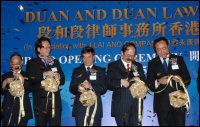 Duan Qi-hua, a partner in Duan and
Duan (2nd from right) and InvestHK's Philip Kung (2nd from left) officiating at
the ribbon-cutting ceremony with other guests - Chinese mainland law firm, Duan
and Duan, recently opened its first office in the city. This is one of many
firsts for this innovative legal practice. It was the first independent
partnership law firm to establish itself in China and one of the first to launch
into the international market, with offices in Seattle, United States. With its
new office in Hong Kong, the company will provide advice in corporate law,
international investments and trade, finance, mergers and acquisitions,
arbitration and litigation. With its proven track record within the mainland
market and legal system, the company aims to guide clients through the cultural,
linguistic and legal complexities of doing business in China. They have
partnered with J. Lai and Company, an established Hong Kong law firm to further
enhance their cross-border strengths and connections. Duan Qi-hua, a partner in
Duan and Duan said the company would focus on the legal needs of the local,
mainland and international communities. "Hong Kong is the ideal base to set up
operations. The city provides a platform for the international community to gain
access to opportunities in China. Equally Chinese companies are able to use Hong
Kong to launch themselves globally," he said. Mr Duan, observed that since
China’s accession to the World Trade Organisation a greater number of foreign
companies were looking to invest in the Mainland. The country’s new found
confidence was also reflected in the number of Chinese companies looking to
expand on to the international stage. "There is a huge demand from Hong Kong’s
international business community for legal services which advise on successfully
expanding into the Mainland. This is an ideal time for Duan and Duan to bring
its experience to the Hong Kong market," said Mr Philip Kung, the Acting
Associate-Director General of Investment Promotion at Invest Hong Kong. "Hong
Kong has a strong legal community, which offers new companies in the city the
chance for networking and referrals," he added.
Duan Qi-hua, a partner in Duan and
Duan (2nd from right) and InvestHK's Philip Kung (2nd from left) officiating at
the ribbon-cutting ceremony with other guests - Chinese mainland law firm, Duan
and Duan, recently opened its first office in the city. This is one of many
firsts for this innovative legal practice. It was the first independent
partnership law firm to establish itself in China and one of the first to launch
into the international market, with offices in Seattle, United States. With its
new office in Hong Kong, the company will provide advice in corporate law,
international investments and trade, finance, mergers and acquisitions,
arbitration and litigation. With its proven track record within the mainland
market and legal system, the company aims to guide clients through the cultural,
linguistic and legal complexities of doing business in China. They have
partnered with J. Lai and Company, an established Hong Kong law firm to further
enhance their cross-border strengths and connections. Duan Qi-hua, a partner in
Duan and Duan said the company would focus on the legal needs of the local,
mainland and international communities. "Hong Kong is the ideal base to set up
operations. The city provides a platform for the international community to gain
access to opportunities in China. Equally Chinese companies are able to use Hong
Kong to launch themselves globally," he said. Mr Duan, observed that since
China’s accession to the World Trade Organisation a greater number of foreign
companies were looking to invest in the Mainland. The country’s new found
confidence was also reflected in the number of Chinese companies looking to
expand on to the international stage. "There is a huge demand from Hong Kong’s
international business community for legal services which advise on successfully
expanding into the Mainland. This is an ideal time for Duan and Duan to bring
its experience to the Hong Kong market," said Mr Philip Kung, the Acting
Associate-Director General of Investment Promotion at Invest Hong Kong. "Hong
Kong has a strong legal community, which offers new companies in the city the
chance for networking and referrals," he added.
YouTube goes multilingual -
Literally, it might be known as Voustube, Voitubo or Vocetubo, but the world's
most popular video-sharing site introduced local-language sites in nine
countries yesterday that will all just go by YouTube. Chad Hurley and Steve
Chen, the co-founders of YouTube, which was acquired by Internet search leader
Google for $1.76 billion last year, told a news conference that the nine country
sites will eventually feature locally popular content. Until now, while
user-generated videos and comments could be posted in any language, the
YouTube.com site framework and navigation menus have been in English only, while
the featured pages users first see are heavily skewed to US tastes. The site's
US-slant was incongruous with more than half of YouTube's audience coming from
outside the United States, Chen said. He said expanding overseas had always been
part of his plan, but didn't become viable until Google bought YouTube. YouTube
unveiled national sites for Brazil (http://www.youtube.com.br), Britain (http://youtube.co.uk),
France (youtube.fr), Ireland (youtube.ie), Italy (http://it.youtube.com), Japan
(youtube.jp), the Netherlands (youtube.nl), Poland (youtube.pl) and Spain (youtube.es).
During the first stage of the international move, each site will offer fully
translated local homepages and video search functions. Over time, each national
site will have an entirely "local" feel that will allow for country-specific
video rankings and comments in various sections, YouTube said.
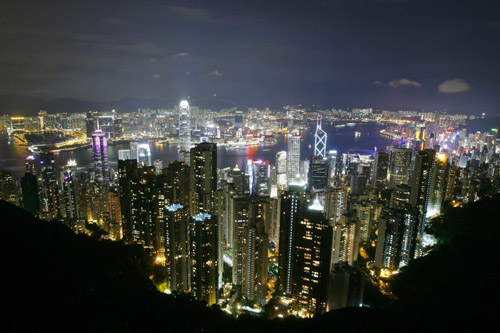 A general view of Hong Kong skyline
seen from the Peak in Hong Kong in the evening of June 16, 2007, about two weeks
before the 10th anniversary of Hong Kong's handover to China.
A general view of Hong Kong skyline
seen from the Peak in Hong Kong in the evening of June 16, 2007, about two weeks
before the 10th anniversary of Hong Kong's handover to China.
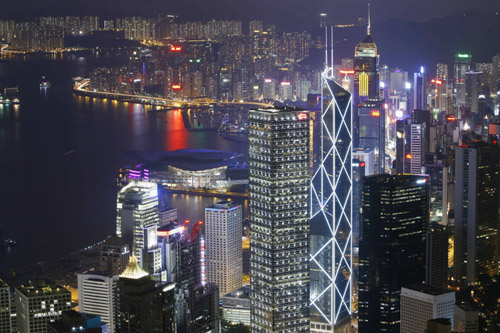 A general view of the Hong Kong Island skyline is
seen from the Peak in Hong Kong in the evening of June 16, 2007, two weeks
before the 10th anniversary of its handover to Chinese rule.
A general view of the Hong Kong Island skyline is
seen from the Peak in Hong Kong in the evening of June 16, 2007, two weeks
before the 10th anniversary of its handover to Chinese rule.
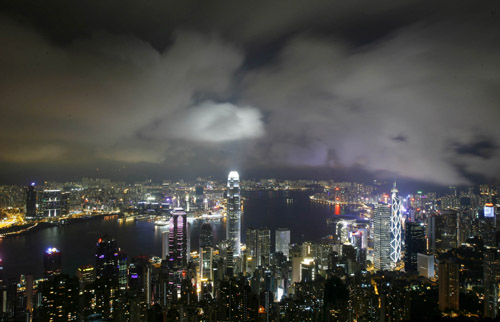 A general view of the Hong Kong skyline is seen from
the Peak in Hong Kong in the evening of June 16, 2007, two weeks before the 10th
anniversary of its handover to Chinese rule.
A general view of the Hong Kong skyline is seen from
the Peak in Hong Kong in the evening of June 16, 2007, two weeks before the 10th
anniversary of its handover to Chinese rule.
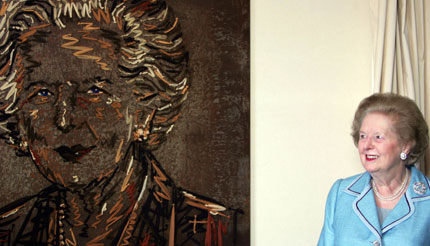 Former Prime Minister Margaret
Thatcher has said her fears that Hong Kong's economy could not prosper after the
handover have proved to be largely groundless. She said she has not been
disappointed by Hong Kong's development since Britain handed over the former
colony to China a decade ago. "I think we must be realistic," Thatcher said in a
rare interview broadcast Tuesday by British Broadcasting Corp. radio. "Let's
think over a moment how great our private worries were about what would happen
in Hong Kong after the handover. Now those worries have largely proved
groundless." Thatcher, an ardent advocate of free markets, said she believed
that economic freedom could not thrive without political freedom. "But the pace
at which this occurs will depend on what happens within China itself," she said.
Britain formally withdrew from Hong Kong on June 30, 1997. Former Prime Minister Margaret
Thatcher has said her fears that Hong Kong's economy could not prosper after the
handover have proved to be largely groundless. She said she has not been
disappointed by Hong Kong's development since Britain handed over the former
colony to China a decade ago. "I think we must be realistic," Thatcher said in a
rare interview broadcast Tuesday by British Broadcasting Corp. radio. "Let's
think over a moment how great our private worries were about what would happen
in Hong Kong after the handover. Now those worries have largely proved
groundless." Thatcher, an ardent advocate of free markets, said she believed
that economic freedom could not thrive without political freedom. "But the pace
at which this occurs will depend on what happens within China itself," she said.
Britain formally withdrew from Hong Kong on June 30, 1997.
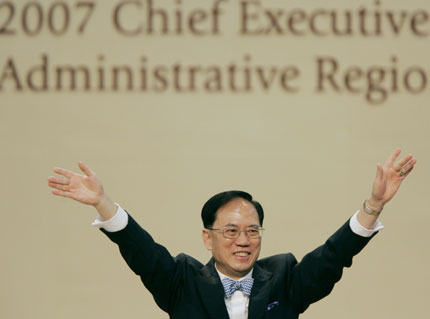 Hong Kong Special
Administrative Region (HKSAR) Chief Executive Donald Tsang said on Monday that
the implementation of 'One Country, Two Systems' has been a success in Hong
Kong. Tsang said in a letter named "Hong Kong Letter - Just because you are
here", which was broadcast on Radio Television Hong Kong ( RTHK) on Monday
morning, that the ten years since 1997 was a significant period of time for Hong
Kong. "Looking back over the past decade, Hong Kong people will have different
thoughts and recount different experiences." "My feelings are a mix of joy and
grief, " he said. Tsang said the past decade has been full of challenges. Since
its return to the motherland 10 years ago, Hong Kong people have encountered
unprecedented difficulties, including the Asian financial turmoil, avian
influenza and SARS. But ultimately Hong Kong people weathered all these crises.
"I remember the stress, the sadness and, at times, the total exhaustion brought
about by these challenges. But, I also remember our society overcoming these
difficulties, and the maturity of Hong Kong people in dealing with them," Tsang
said. Tsang reviewed that many Hong Kongers were rather skeptical about the
concept of "One Country, Two Systems." But at present Hong Kong enjoys a closer
relationship with the Chinese mainland. Hong Kong people communicate and
co-operate with the Chinese mainland every day for business, travel and cultural
exchanges. "Surveys have shown our sense of national identity is the strongest
it has been," Tsang added. "we can truly say that the implementation of 'One
Country, Two Systems' has been a success." "We can certainly strive to do even
better; but we can also say that our achievements in implementing this
unprecedented undertaking have been truly remarkable," he said. At the end of
the letter, Tsang stressed that "Never settle for mediocrity, strive for
excellence" is a mantra he holds for himself, and his administration. He
promised to build a more open government and lift the economy to new heights in
his new term in the next five years. Hong Kong Special
Administrative Region (HKSAR) Chief Executive Donald Tsang said on Monday that
the implementation of 'One Country, Two Systems' has been a success in Hong
Kong. Tsang said in a letter named "Hong Kong Letter - Just because you are
here", which was broadcast on Radio Television Hong Kong ( RTHK) on Monday
morning, that the ten years since 1997 was a significant period of time for Hong
Kong. "Looking back over the past decade, Hong Kong people will have different
thoughts and recount different experiences." "My feelings are a mix of joy and
grief, " he said. Tsang said the past decade has been full of challenges. Since
its return to the motherland 10 years ago, Hong Kong people have encountered
unprecedented difficulties, including the Asian financial turmoil, avian
influenza and SARS. But ultimately Hong Kong people weathered all these crises.
"I remember the stress, the sadness and, at times, the total exhaustion brought
about by these challenges. But, I also remember our society overcoming these
difficulties, and the maturity of Hong Kong people in dealing with them," Tsang
said. Tsang reviewed that many Hong Kongers were rather skeptical about the
concept of "One Country, Two Systems." But at present Hong Kong enjoys a closer
relationship with the Chinese mainland. Hong Kong people communicate and
co-operate with the Chinese mainland every day for business, travel and cultural
exchanges. "Surveys have shown our sense of national identity is the strongest
it has been," Tsang added. "we can truly say that the implementation of 'One
Country, Two Systems' has been a success." "We can certainly strive to do even
better; but we can also say that our achievements in implementing this
unprecedented undertaking have been truly remarkable," he said. At the end of
the letter, Tsang stressed that "Never settle for mediocrity, strive for
excellence" is a mantra he holds for himself, and his administration. He
promised to build a more open government and lift the economy to new heights in
his new term in the next five years.
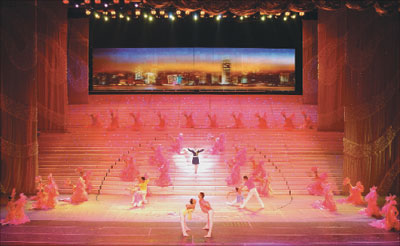 The People's
Liberation Army (PLA) troupe is performing in town to celebrate the 10th
anniversary of Hong Kong's reunification with its motherland and the army
garrison in the SAR. The show will also be held today. With its theme "Holy" and
its unique blend of music, dance, poetry and paintings, the show depicts the ten
years the garrison has spent in Hong Kong, and the city's achievements under the
"One Country, Two Systems". "I've been most impressed with the stability and
prosperity of Hong Kong in the last decade, as well as the love Hong Kong people
show towards the country," said Xiong Yan, director-in-chief of the troupe.
Premiered in 2004 on the mainland, the show "Holy" has won various artists' and
actors' awards, notably the special jury's prize at the national contest held by
the Ministry of Culture last year. To establish a further connection between the
troupe and the audience, the show has been modified to highlight the historical
moments of Hong Kong in the past decade and the love of PLA towards local
people. "I'm confident the Hong Kong audience will embrace the themes, since
they show the best of our Chinese culture and our patriotic sentiments," said
executive director of the troupe Su Yuguang. Comprising a prelude, a prologue
and three movements, "Holy" will feature the national flag-raising ceremony that
symbolizes the handover ceremony and relive the holy moments for the Hong Kong
audience. The second movement, with songs entitled "Hong Kong, I stand by you"
and "A soldier's heart", shows slices of life and work of PLA in Hong Kong, and
their dedication to protecting the city. Love runs through the third movement,
as the troupe sings "Love in Hong Kong", "Calls of love" and "The romance of
thinking of you". The songs touch on their yearning for their loved ones at
home, as well as their passion for Hong Kong. With its expanded themes, the
number of actors of "Holy" has also been increased from 100 to 260 for this
special performance at the Hong Kong Coliseum, including nationally renowned
performers as well as junior artistes in PLA. "Some of our crew came to live in
Hong Kong in 2004, to have real glimpses of the life of PLA in this city," said
Su. "We're confident that our performers can make the passion and joy come to
live and deliver it to our fellows in Hong Kong." One of the lead singers of
"Holy", the award-winning Tan Jing, expressed her excitement for sharing the joy
of the anniversary of reunification with the Hong Kong people. The People's
Liberation Army (PLA) troupe is performing in town to celebrate the 10th
anniversary of Hong Kong's reunification with its motherland and the army
garrison in the SAR. The show will also be held today. With its theme "Holy" and
its unique blend of music, dance, poetry and paintings, the show depicts the ten
years the garrison has spent in Hong Kong, and the city's achievements under the
"One Country, Two Systems". "I've been most impressed with the stability and
prosperity of Hong Kong in the last decade, as well as the love Hong Kong people
show towards the country," said Xiong Yan, director-in-chief of the troupe.
Premiered in 2004 on the mainland, the show "Holy" has won various artists' and
actors' awards, notably the special jury's prize at the national contest held by
the Ministry of Culture last year. To establish a further connection between the
troupe and the audience, the show has been modified to highlight the historical
moments of Hong Kong in the past decade and the love of PLA towards local
people. "I'm confident the Hong Kong audience will embrace the themes, since
they show the best of our Chinese culture and our patriotic sentiments," said
executive director of the troupe Su Yuguang. Comprising a prelude, a prologue
and three movements, "Holy" will feature the national flag-raising ceremony that
symbolizes the handover ceremony and relive the holy moments for the Hong Kong
audience. The second movement, with songs entitled "Hong Kong, I stand by you"
and "A soldier's heart", shows slices of life and work of PLA in Hong Kong, and
their dedication to protecting the city. Love runs through the third movement,
as the troupe sings "Love in Hong Kong", "Calls of love" and "The romance of
thinking of you". The songs touch on their yearning for their loved ones at
home, as well as their passion for Hong Kong. With its expanded themes, the
number of actors of "Holy" has also been increased from 100 to 260 for this
special performance at the Hong Kong Coliseum, including nationally renowned
performers as well as junior artistes in PLA. "Some of our crew came to live in
Hong Kong in 2004, to have real glimpses of the life of PLA in this city," said
Su. "We're confident that our performers can make the passion and joy come to
live and deliver it to our fellows in Hong Kong." One of the lead singers of
"Holy", the award-winning Tan Jing, expressed her excitement for sharing the joy
of the anniversary of reunification with the Hong Kong people.
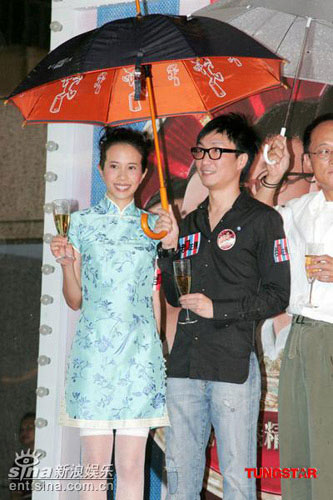 Cast members, Karen Mok (left) and Ronald Cheng, attend
the premiere for "Mr. Cinema" in Hong Kong, on Wednesday, June 13, 2007.
Cast members, Karen Mok (left) and Ronald Cheng, attend
the premiere for "Mr. Cinema" in Hong Kong, on Wednesday, June 13, 2007.
Safeguarded by the Basic Law, residents in Hong Kong
enjoyed more freedom and rights after it returned to the motherland, said Elsie
Leung Oi-Sie, vice chairwoman of the Commission for the Basic Law of the Hong
Kong Special Administrative Region (HKSAR) of the Standing Committee of the
National People's Congress of China. Leung, former secretary for justice of the
HKSAR, said during an interview with Xinhua recently that the principle of "one
country, two systems" has been successfully implemented in Hong Kong during the
past 10 years.
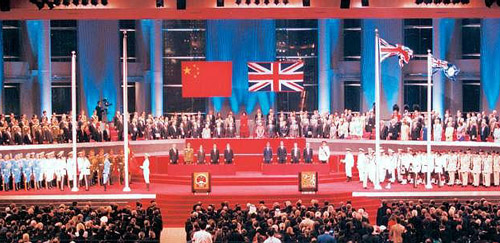 A view of the Hong Kong Handover
Ceremony held in Hong Kong on the night of June 30, 1997. The ceremony marked
the restoration of Hong Kong from the United Kingdom to the People's Republic of
China.
A view of the Hong Kong Handover
Ceremony held in Hong Kong on the night of June 30, 1997. The ceremony marked
the restoration of Hong Kong from the United Kingdom to the People's Republic of
China.
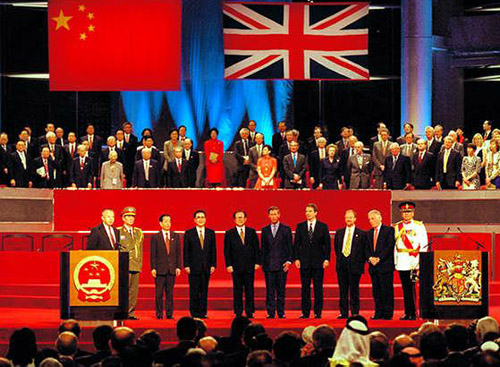 Chinese and British national leaders
pose for a group photo at the end of the Hong Kong Handover Ceremony held in
Hong Kong on the night of June 30, 1997. The ceremony marked the restoration of
Hong Kong from the United Kingdom to the People's Republic of China.
Chinese and British national leaders
pose for a group photo at the end of the Hong Kong Handover Ceremony held in
Hong Kong on the night of June 30, 1997. The ceremony marked the restoration of
Hong Kong from the United Kingdom to the People's Republic of China.
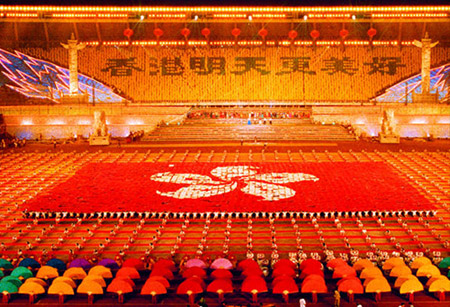 Performers put on a show in Beijing
to celebrate the handover of Hong Kong to China on the night of June 30, 1997.
Characters on the screen read "Hong Kong has a better tomorrow. Performers put on a show in Beijing
to celebrate the handover of Hong Kong to China on the night of June 30, 1997.
Characters on the screen read "Hong Kong has a better tomorrow.
MTR Corp
(0066) has won its first contract outside the Greater China region, announcing a
50-50 joint venture with the UK's Laing Rail has been selected to operate an
upgraded overground railway in east and north London for a minimum seven years.
Former permanent secretary Fanny
Law Fan Chiu-fun on Wednesday resigned her position as head of the ICAC. Her
resignation came after a commission of inquiry investigating alleged government
interference in the Hong Kong Institute of Education’s affairs on Wednesday
submitted a report on its findings to the chief executive. The report found that
Mrs Law had improperly requested the institute to curb two academics who had
criticised education reforms. Chief Executive Donald Tsang Yam-kuen said on
Wednesday afternoon he had accepted Mrs Law’s resignation. Mrs Law had been
appointed as Commissioner of the Independent Commission Against Corruption on
October 31, 2006. Previously, she had been Secretary for Education and Manpower
until 2002, when the Principal Officials Accountability System was introduced in
Hong Kong by former chief executive Tung Chee-hwa. Mrs Law has a reputation for
outspokenness. In early January 2006, she sparked a heated public controversy
when she rejected causal connections between the deaths of two teachers who had
committed suicides within four days in the first week of January and pressure
imposed by education reforms. Mrs Law had said: “If the prime reason [for the
deaths] is education reforms, why has there been only two teachers who have
committed suicide?” Her comments greatly angered teachers and Mrs Law later
apologised. However, on January 22, 2006 between 7,500-15,000 teachers launched
a public protest against Mrs Law and the educational reforms.
 China: China
would cut or eliminate export tax rebates for 2,831 commodities representing 37%
of the total number of items listed on customs tax regulations.
China: China
would cut or eliminate export tax rebates for 2,831 commodities representing 37%
of the total number of items listed on customs tax regulations.
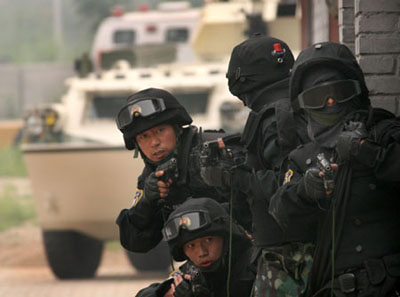 China held a
state-level anti-terrorist exercise for the 2008 Beijing Olympic Games on June
19, 2007. The exercise, dubbed "Great Wall No. 4", focused on security work for
the Beijing Olympic Games and tested Chinese police's capacity to handle a
hostage-taking incident during the Olympics. China held a
state-level anti-terrorist exercise for the 2008 Beijing Olympic Games on June
19, 2007. The exercise, dubbed "Great Wall No. 4", focused on security work for
the Beijing Olympic Games and tested Chinese police's capacity to handle a
hostage-taking incident during the Olympics.
China on Tuesday called for less pressure on agriculture
issue as the World Trade Organization (WTO) Director-General Pascal Lamy was
visiting Beijing in an effort to revive the stalled Doha trade talks. "The Doha
round of trade talks should not exert more pressure on China on agriculture
issue as China has already taken the lead in liberalizing the trade," Chinese
Agriculture Minister Sun Zhengcai was quoted by a statement posted on the Web
site of Ministry of Agriculture. On Monday and Tuesday, Lamy met with Chinese
officials from the ministries of finance, agriculture, and the central bank.
"The pressure on China in the agricultural trade talks should be eased since the
country, with nearly 900 million rural people, has made hefty cuts to import
tariffs on farm produce and has a long-standing trade deficit in farm produce,"
Finance Minister Jin Renqing told Lamy. China's tariff duties on farm produce
have been cut to 15.3 percent this year from 54 percent in 2001, according to
the statistics of the Finance Ministry. Globally, tariffs on agricultural
products currently average 62 percent. Jin also said that China will make
further contributions to the Doha Round talks, and that the country has honored
commitments made before it joined the WTO in 2001 by slashing tariffs and
further opening its markets.
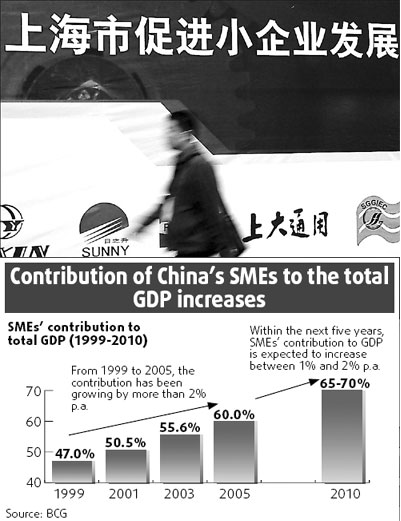 The curtain rises, and a new breed of companies comes to the center stage. This
time it is not the well-known behemoths of Chinese industry, it is tens of
thousands of smaller and nimbler companies: the small- and medium-sized
enterprises (SMEs). These companies will soon represent two-thirds of China's
gross domestic product, and three-quarters of its GDP growth: nobody can
overlook them any more. Conquering those Chinese SMEs is increasingly high on
the priority of many companies - foreign as well as domestic, for banks as well
as for IT companies and industrial goods players. Companies are fighting for SME-experienced
sales teams, forging new partnerships with local distributors and dealers, and
launching new "SME products". But making business with those SMEs is very
difficult: price levels tend to be very low and distribution depends on
expensive and dense sales networks. No surprise then that the SME market
generally appears underserved. The Boston Consulting Group has researched the
SMEs in China and found three fundamental patterns: While SMEs are a huge factor
especially in China's industrial sectors, most of them still are "sweatshops"
with very low labor productivity. There is no such thing as the typical Chinese
SME. Segmenting them intelligently and then going after the most promising
segments is vital. Success with SMEs depends on executing a "four-point
program": adapted value propositions, local reach, innovative sales and
distribution systems, and low-cost operational models. The share of SMEs in the
Chinese GDP grows from year to year. They are mostly industrial, wholesale and
retail companies, entrepreneur-driven and privately owned, and strongly
concentrated in the eastern and southern boom provinces. But while they are the
powerhouses of the economy, most of them share a similar problem: very low
productivity. While labor productivity has already reached much more than 50,000
yuan per employee/year in large enterprises, it's still about 30,000 yuan for
the SMEs - with an ever-widening gap.
The curtain rises, and a new breed of companies comes to the center stage. This
time it is not the well-known behemoths of Chinese industry, it is tens of
thousands of smaller and nimbler companies: the small- and medium-sized
enterprises (SMEs). These companies will soon represent two-thirds of China's
gross domestic product, and three-quarters of its GDP growth: nobody can
overlook them any more. Conquering those Chinese SMEs is increasingly high on
the priority of many companies - foreign as well as domestic, for banks as well
as for IT companies and industrial goods players. Companies are fighting for SME-experienced
sales teams, forging new partnerships with local distributors and dealers, and
launching new "SME products". But making business with those SMEs is very
difficult: price levels tend to be very low and distribution depends on
expensive and dense sales networks. No surprise then that the SME market
generally appears underserved. The Boston Consulting Group has researched the
SMEs in China and found three fundamental patterns: While SMEs are a huge factor
especially in China's industrial sectors, most of them still are "sweatshops"
with very low labor productivity. There is no such thing as the typical Chinese
SME. Segmenting them intelligently and then going after the most promising
segments is vital. Success with SMEs depends on executing a "four-point
program": adapted value propositions, local reach, innovative sales and
distribution systems, and low-cost operational models. The share of SMEs in the
Chinese GDP grows from year to year. They are mostly industrial, wholesale and
retail companies, entrepreneur-driven and privately owned, and strongly
concentrated in the eastern and southern boom provinces. But while they are the
powerhouses of the economy, most of them share a similar problem: very low
productivity. While labor productivity has already reached much more than 50,000
yuan per employee/year in large enterprises, it's still about 30,000 yuan for
the SMEs - with an ever-widening gap.
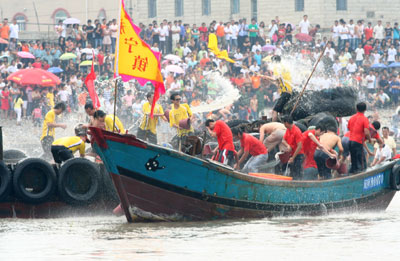 Residents spray water at each other on boats
during a dragon boats race to celebrate the Duanwu Festival (Dragon Boat
Festival) in Shishi, South China's Fujian Province June 19, 2007. The festival
is to commemorate China's patriotic poet Qu Yuan (340 BC - 278 BC), who drowned
himself to protest against the corrupt government.
Residents spray water at each other on boats
during a dragon boats race to celebrate the Duanwu Festival (Dragon Boat
Festival) in Shishi, South China's Fujian Province June 19, 2007. The festival
is to commemorate China's patriotic poet Qu Yuan (340 BC - 278 BC), who drowned
himself to protest against the corrupt government.
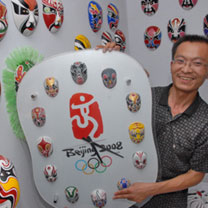 Wu Hua, a
resident from central China's Henan Province, displays his works combining
Chinese traditional Peking opera masks with Olympic elements at his home June
19, 2997. Wu said he is willing to present his works to athletes from home and
abroad as goodwill gifts.
Wu Hua, a
resident from central China's Henan Province, displays his works combining
Chinese traditional Peking opera masks with Olympic elements at his home June
19, 2997. Wu said he is willing to present his works to athletes from home and
abroad as goodwill gifts.
Three
"unsound" bridges have been found in Foshan city in south China's Guangdong
province after one collapsed after being hit by a sand barge last week.
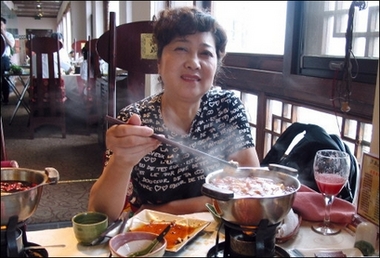 China's uncrowned hotpot queen, He Yongzhi, 54, with
her pot of sizzling, bubbling specialty that has put her home -- the mega-city
of Chongqing in the southwest -- on the culinary map of China, in the
municipality of Chongqing, 16 June 2007.
China's uncrowned hotpot queen has spiced up
the lives of her compatriots for 25 years and now she wants to take the strong
flavours of her native cuisine to the rest of the world.
China's uncrowned hotpot queen, He Yongzhi, 54, with
her pot of sizzling, bubbling specialty that has put her home -- the mega-city
of Chongqing in the southwest -- on the culinary map of China, in the
municipality of Chongqing, 16 June 2007.
China's uncrowned hotpot queen has spiced up
the lives of her compatriots for 25 years and now she wants to take the strong
flavours of her native cuisine to the rest of the world.
 US Deputy Secretary of Treasury Robert
Kimmitt visits a Home Depot store in Beijing yesterday. Kimmitt is on a tour of
China to reassure that the US remains open to foreign investments.
US Deputy Secretary of Treasury Robert
Kimmitt visits a Home Depot store in Beijing yesterday. Kimmitt is on a tour of
China to reassure that the US remains open to foreign investments.
A Guangzhou court has sentenced
three Chongqing men to up to three years in jail for manufacturing thousands of
fake Louis Vuitton purses valued at more than 10 million yuan.
Beijing's first envoy to Costa Rica in six decades has
taken up his post, sealing the Central American nation's switch in allegiance.
The mainland sent Wang Xiaoyuan to Costa Rica as its business attach� and is
likely to install him as ambassador following the establishment of diplomatic
relations between the two countries on June 1. After presenting his paperwork to
Costa Rican officials on Monday and meeting Foreign Minister Bruno Stagno, Mr
Wang said the mainland would be patient over restoring ties with other nations
that currently side with Taiwan. "China is a fact that nobody can close their
eyes to. Some have their reasons for not recognising China and we can wait for
them," he said. Mr Wang, 52, a diplomat since the 1970s, is Beijing's first
envoy to Costa Rica since Mao Zedong's communist forces defeated Chiang Kai-shek
in 1949 and forced him to flee to Taiwan. Costa Rica's change of sides left
Taiwan with just 24 allies, most of them small, poor nations in Central America,
the South Pacific and Africa. In comparison, more than 170 countries have
diplomatic ties with Beijing. Costa Rican President Oscar Arias has said the
move, ending decades of Taiwanese patronage for politicians' pet projects in
Costa Rica, would increase business opportunities for his country. Other Central
American nations have said they will not follow Costa Rica's move for now, but
Guatemala Foreign Minister Gert Rosenthal has warned countries could be forced
to examine their positions. Perfect World, a Beijing-based online game
developer, aims to join Nasdaq-listed mainland rivals such as Shanda Interactive
and NetEase with a listing on the United States exchange as early as next month,
sources said. Perfect World, which seeks to expand overseas and strengthen its
research and development team, is expected to apply for a listing on Nasdaq
shortly and aims to complete the initial public offering as early as next month,
the sources said. Online game player The9 is also listed on the exchange. Credit
Suisse and Morgan Stanley are the co-sponsors of the deal, according to sources.
The two firms declined to comment. Perfect World's share sale will come as the
mainland online gaming market is catching the interest of institutional
investors. Shanda shares have gained 42 per cent this year, closing at US$28.50
on Friday, while The9 shares are up 38 per cent, ending at US$44.56. "We believe
the Chinese gaming market will continue to grow at a robust pace," SIG analyst
Guo Haiya said. "The market is more resilient than the saturated Korean and
Taiwanese markets, giving rise to [a few] recent hits, including Zheng Tu, Wen
Dao, Mo Yu, Popcart and Sun." Perfect World has developed and introduced four
massive multi-player online role-playing games - Perfect World, Perfect World
International Edition, Legend of Martial Arts and Zhu Xin - since it was set up
in 2004 by Chi Fu-feng and is expected to launch two more games this year. It
has also licensed its games to companies in Taiwan, Japan, Malaysia, Vietnam and
the Philippines. "The games launched by the company have quickly gained
popularity in the mainland," a market source said. Perfect World, in which Hong
Kong private equity firm SAIF Partner bought a 20 per cent stake for US$8
million last year, said its first game Perfect World, launched in 2005, had
attracted more than 20 million registered users after costing 200 million yuan
in development. The Legend of Martial Arts, developed at a similar cost, drew
more than 300,000 peak concurrent users in October last year. Launched last
year, Legend of Martial Arts, ranked third and Perfect World International
Edition fourth in a poll this month of the top 10 popular online games by game
industry portal 17173.com. The mainland's most popular game, Fantasy Westward
Journey by NetEase, drew peak concurrent users of more than 1.5 million this
month. Perfect World has more than 600 staff in Beijing, most of whom are
responsible developing the new game. The company has put "enormous effort" into
the Perfect World game in the past two years, a market source said. "The game's
three-dimensional graphics, innovative player interface, rich cultural content
and excellent operation helped build a strong foundation for the company."
In-game advertising is also gaining a presence in casual games with the
potential of being built into other online games and boosting revenue. Perfect
World founder Mr Chi is also the founder and owner of education software
developer Beijing Golden Human Computer.
China Telecom (SEHK: 0728), the country's largest
fixed-line telecommunications network operator, has signed a landmark
interconnection deal with Cable & Wireless Group that will extend the British
carrier's reach inside the corporate markets of 200 cities across the mainland.
The new link recently went live and involved the MultiProtocol Label Switching (MPLS)
networks of China Telecom and C&W's standalone Europe, Asia and United States
business division. The financial terms were not disclosed. Stuart Dobbin, head
of Asia for the C&W unit, said the deal expanded the British firm's capability
on the mainland by delivering managed internet protocol services through CN2,
China Telecom's MPLS network. "China Telecom also extends its own service
capability worldwide through Cable & Wireless' global network," Mr Dobbin said.
MPLS is a network setup used to speed up data transmission over combined
internet protocol and traditional circuit-switched communications networks. Mr
Dobbin said the interconnection with China Telecom's CN2 infrastructure provided
more resiliency, security and diversity to C&W corporate customers. More than
100 of the global carrier's 3,000 customers worldwide have each been doing
business, preparing to expand or about to set up shop at various locations in
the mainland. For the past seven years, the company only dealt with China Netcom
(SEHK: 0906), the smaller of the mainland's two nationwide fixed-line
telecommunications network operators, to provide customers with advanced data
communications links to the main cities of Beijing, Shanghai and Guangzhou. "As
manufacturing and other industries move from tier-one to tier-two and tier-three
cities in China, it becomes increasingly important for service providers to
extend service throughout the various regions in the country," said Tim Dillon,
a vice-president at research firm International Data Corp. "Interconnection
agreements and good relationships with the [mainland] carriers are absolutely
essential to offer true end-to-end MPLS service capability to customers with
Chinese affiliates." Mr Dobbin said talks between C&W and China Telecom followed
soon after the British firm completed a US$40 million network and capacity
upgrade of its network across Asia. That was carried out in direct response to
rapid growth in demand for its internet protocol virtual private network managed
services in Asia. "As always, we are led by and responding to customers'
requirements. Customers are crying out for a global provider that understands
the differing business needs across disparate geographic locations," Mr Dobbin
said. The six-month-long upgrade, which was completed at the end of the first
quarter, involved deploying 36 incremental MPLS nodes across 13 countries in the
region. No comment from China Telecom was received as of press time. According
to a report from CLSA Asia-Pacific Markets, broadband infrastructure investments
will account for 36 per cent of China Telecom's capital expenditure this year as
its broadband service subscriptions continue to grow. C&W has been present in
the mainland since the mid-1990s, although its heritage in the country dates
back to the laying of the first telegraph cable connecting Singapore, Hong Kong
and Shanghai in the 1870s.
June 21, 2007
 Hong Kong:
Donald Tsang supports cross-border trading - Donald Tsang, Chief Executive of
the Hong Kong Special Administrative Region said in a recent interview that he
supports exchanges in Shanghai and Hong Kong trading stocks listed on each
other's markets. Relevant issues are under negotiation, he said. Tsang is the
highest official who publicly supports the cross-border share trading plan and
confirms its on-going negotiation. A source close to the securities regulator
told the Shanghai-based Oriental Morning Post that at present, regulators are
encouraging Hong Kong-listed companies to make public offerings in the mainland
market. Other than that, issuing a China Depositary Receipt is thought to be a
feasible way to achieve cross-border trading. Insiders believe that cross-border
trading may face problems of settlement or foreign exchange control, and so it
will be hard to achieve in the short term. Professor Hua Sheng, head of Yanjing
Overseas Chinese University, said the adoption of cross-border trading might
divert arbitrage fund to the relatively cheaper Hong Kong market from the
Shanghai and Shenzhen bourses. But in the long run, it could help squeeze
bubbles in the mainland market and is conducive to the healthy development of
China's A-share market. Hong Kong:
Donald Tsang supports cross-border trading - Donald Tsang, Chief Executive of
the Hong Kong Special Administrative Region said in a recent interview that he
supports exchanges in Shanghai and Hong Kong trading stocks listed on each
other's markets. Relevant issues are under negotiation, he said. Tsang is the
highest official who publicly supports the cross-border share trading plan and
confirms its on-going negotiation. A source close to the securities regulator
told the Shanghai-based Oriental Morning Post that at present, regulators are
encouraging Hong Kong-listed companies to make public offerings in the mainland
market. Other than that, issuing a China Depositary Receipt is thought to be a
feasible way to achieve cross-border trading. Insiders believe that cross-border
trading may face problems of settlement or foreign exchange control, and so it
will be hard to achieve in the short term. Professor Hua Sheng, head of Yanjing
Overseas Chinese University, said the adoption of cross-border trading might
divert arbitrage fund to the relatively cheaper Hong Kong market from the
Shanghai and Shenzhen bourses. But in the long run, it could help squeeze
bubbles in the mainland market and is conducive to the healthy development of
China's A-share market.
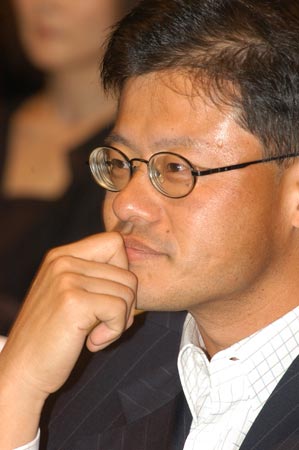 Yahoo Inc. Chairman Terry Semel stepped down as chief
executive in a surprise move Monday, ending his increasingly ineffectual pursuit
of online search leader Google Inc.-- a a losing battle that had demoralized
Yahoo's shareholders and employees. The Sunnyvale-based company appointed
co-founder Jerry Yang as its new CEO and named Susan Decker as its president.
Decker, who had been touted as Semel's heir apparent, was recently promoted from
Yahoo's chief financial officer to oversee the company's advertising operations.
Semel, 64, will remain chairman in a non-executive role after spending the past
six years running the company. "I saw myself as more of a coach than a player
going forward," Semel told analysts and media during a Monday conference call.
Signaling Semel's decision was voluntary, Yahoo said he will not receive a
severance package. The former movie studio executive already has made a fortune
since joining Yahoo in May 2001, having realized nearly $450 million in gains by
exercising some of the stock options that he received during his tenure. Despite
Yahoo's recent struggles, Semel received another big bundle of stock options
last year that boosted the value of his 2006 compensation package to $71.7
million. That was more than any other CEO among 386 publicly held companies
covered in an Associated Press analysis of executive compensation using new
rules dictated by the Securities and Exchange Commission. In Monday's conference
call, an emotional Yang hailed Semel as "a role model and mentor" and then
sought to defuse recent speculation that Yahoo might be sold to Microsoft Corp.
or another suitor hoping to exploit the recent turmoil at the company. "I am
totally excited and energized about assuming the leadership of this great
company," Yang said. "We have a long and prosperous future if we execute
correctly." Yang, 38, still owns a 4 percent stake in the company. Fellow
co-founder David Filo, who is helping to run Yahoo's technology group after the
sudden retirement of the department's leader earlier this month, owns a 6
percent stake. Monday's shake-up unfolded less than a week after Semel faced off
with shareholders disillusioned with a nearly 30 percent drop in Yahoo's stock
price during the past 18 months as its financial growth fell further behind
Google's torrid pace. Mountain View-based Google now makes more money in a
single quarter than Yahoo does in an entire year. The contrast represents a
startling comedown for Yahoo, which was the larger of the two companies when
Google went public in August 2004. Since then, Google has steadily expanded upon
the Internet's largest advertising network to create nearly $140 billion in
shareholder wealth as its stock price increased by more than six-fold. Yahoo's
stock, meanwhile, is worth a little bit less than when Google went public.
Yahoo Inc. Chairman Terry Semel stepped down as chief
executive in a surprise move Monday, ending his increasingly ineffectual pursuit
of online search leader Google Inc.-- a a losing battle that had demoralized
Yahoo's shareholders and employees. The Sunnyvale-based company appointed
co-founder Jerry Yang as its new CEO and named Susan Decker as its president.
Decker, who had been touted as Semel's heir apparent, was recently promoted from
Yahoo's chief financial officer to oversee the company's advertising operations.
Semel, 64, will remain chairman in a non-executive role after spending the past
six years running the company. "I saw myself as more of a coach than a player
going forward," Semel told analysts and media during a Monday conference call.
Signaling Semel's decision was voluntary, Yahoo said he will not receive a
severance package. The former movie studio executive already has made a fortune
since joining Yahoo in May 2001, having realized nearly $450 million in gains by
exercising some of the stock options that he received during his tenure. Despite
Yahoo's recent struggles, Semel received another big bundle of stock options
last year that boosted the value of his 2006 compensation package to $71.7
million. That was more than any other CEO among 386 publicly held companies
covered in an Associated Press analysis of executive compensation using new
rules dictated by the Securities and Exchange Commission. In Monday's conference
call, an emotional Yang hailed Semel as "a role model and mentor" and then
sought to defuse recent speculation that Yahoo might be sold to Microsoft Corp.
or another suitor hoping to exploit the recent turmoil at the company. "I am
totally excited and energized about assuming the leadership of this great
company," Yang said. "We have a long and prosperous future if we execute
correctly." Yang, 38, still owns a 4 percent stake in the company. Fellow
co-founder David Filo, who is helping to run Yahoo's technology group after the
sudden retirement of the department's leader earlier this month, owns a 6
percent stake. Monday's shake-up unfolded less than a week after Semel faced off
with shareholders disillusioned with a nearly 30 percent drop in Yahoo's stock
price during the past 18 months as its financial growth fell further behind
Google's torrid pace. Mountain View-based Google now makes more money in a
single quarter than Yahoo does in an entire year. The contrast represents a
startling comedown for Yahoo, which was the larger of the two companies when
Google went public in August 2004. Since then, Google has steadily expanded upon
the Internet's largest advertising network to create nearly $140 billion in
shareholder wealth as its stock price increased by more than six-fold. Yahoo's
stock, meanwhile, is worth a little bit less than when Google went public.
Turnover on the stock market broke
the HK$100 billion threshold for the first time in history Monday, boosted by
window-dressing at investment funds before the end of the month and by
speculative switching out of small-cap stocks by funds, sending the blue-chip
and H-share indexes to fresh records.
 The system of pegging the Hong Kong dollar
to the US dollar is still the most appropriate arrangement for the near future,
said Hong Kong Monetary Authority chief executive Joseph Yam Chi- kwong. The
local currency's future has been hotly debated in recent weeks. Antony Leung
Kam-chung, the former financial secretary, has suggested the government consider
pegging the Hong Kong dollar to the yuan when the mainland currency becomes
fully convertible. A Bank of China (SEHK: 3988) (Hong Kong) internal report also
suggested it was time to review the peg mechanism and explore ways to
"accommodate" the yuan's growing importance in the local economy. And former
chief executive Tung Chee-hwa revealed that he and top aides including Mr Leung
had contemplated scrapping the peg in August 2002. Mr Yam said: "The US dollar
will continue to be the appropriate anchor for the Hong Kong dollar for the
foreseeable future." Speaking in an interview about financial developments since
the handover, he said although Hong Kong was now more integrated with the
mainland than in 1997, the city's business cycle was still more in line with
that of the United States than the mainland's. Mr Yam stressed the strength of
the currency's peg to the US dollar, saying it had passed several tests since
being set up in October 1983, from the world stock market crash in 1987 to the
Asian financial crisis of 1997 and 1998. He said the Monetary Authority had
refined the peg mechanism to ensure it was sound, and noted that the Hong Kong
dollar had not been affected when the yuan breached the psychological level of
7.80 to the US dollar early this year, effectively attaining parity with the
local currency. It has since strengthened further. Looking back, Mr Yam said the
government's intervention in the stock market in 1998 to support the Hang Seng
Index as a way of fending off currency speculators had been a last resort. It
had been done to prevent financial markets becoming too volatile. If the
government had not acted, the consequences could have been very serious. r Yam
was part of the team, along with the then financial secretary, Donald Tsang Yam-kuen,
and the then secretary for financial services, Rafael Hui Si-yan, that
orchestrated the government's purchase of HK$118 billion in Hong Kong-quoted
shares to foil a speculative attack by hedge funds betting that the dollar peg
would be scrapped. Instead of dropping the peg and allowing the currency to
devalue, the government intervened, driving away the speculators but attracting
criticism that it had flouted the free-market ethos of Hong Kong. "It was
difficult for us and we experienced very mixed feelings: on the one hand, we
believed - and still believe - very strongly in free markets. "On the other
hand, we did not want to see foreign capital manipulating Hong Kong's free
market." Looking forward, he said greater use of the yuan outside the mainland
was inevitable. "Hong Kong is the ideal testing ground to help the yuan enter
the international market," he said. Developing yuan business was an important
part of the city's quest to strengthen its status as an international financial
centre, he said. The system of pegging the Hong Kong dollar
to the US dollar is still the most appropriate arrangement for the near future,
said Hong Kong Monetary Authority chief executive Joseph Yam Chi- kwong. The
local currency's future has been hotly debated in recent weeks. Antony Leung
Kam-chung, the former financial secretary, has suggested the government consider
pegging the Hong Kong dollar to the yuan when the mainland currency becomes
fully convertible. A Bank of China (SEHK: 3988) (Hong Kong) internal report also
suggested it was time to review the peg mechanism and explore ways to
"accommodate" the yuan's growing importance in the local economy. And former
chief executive Tung Chee-hwa revealed that he and top aides including Mr Leung
had contemplated scrapping the peg in August 2002. Mr Yam said: "The US dollar
will continue to be the appropriate anchor for the Hong Kong dollar for the
foreseeable future." Speaking in an interview about financial developments since
the handover, he said although Hong Kong was now more integrated with the
mainland than in 1997, the city's business cycle was still more in line with
that of the United States than the mainland's. Mr Yam stressed the strength of
the currency's peg to the US dollar, saying it had passed several tests since
being set up in October 1983, from the world stock market crash in 1987 to the
Asian financial crisis of 1997 and 1998. He said the Monetary Authority had
refined the peg mechanism to ensure it was sound, and noted that the Hong Kong
dollar had not been affected when the yuan breached the psychological level of
7.80 to the US dollar early this year, effectively attaining parity with the
local currency. It has since strengthened further. Looking back, Mr Yam said the
government's intervention in the stock market in 1998 to support the Hang Seng
Index as a way of fending off currency speculators had been a last resort. It
had been done to prevent financial markets becoming too volatile. If the
government had not acted, the consequences could have been very serious. r Yam
was part of the team, along with the then financial secretary, Donald Tsang Yam-kuen,
and the then secretary for financial services, Rafael Hui Si-yan, that
orchestrated the government's purchase of HK$118 billion in Hong Kong-quoted
shares to foil a speculative attack by hedge funds betting that the dollar peg
would be scrapped. Instead of dropping the peg and allowing the currency to
devalue, the government intervened, driving away the speculators but attracting
criticism that it had flouted the free-market ethos of Hong Kong. "It was
difficult for us and we experienced very mixed feelings: on the one hand, we
believed - and still believe - very strongly in free markets. "On the other
hand, we did not want to see foreign capital manipulating Hong Kong's free
market." Looking forward, he said greater use of the yuan outside the mainland
was inevitable. "Hong Kong is the ideal testing ground to help the yuan enter
the international market," he said. Developing yuan business was an important
part of the city's quest to strengthen its status as an international financial
centre, he said.
The government is still studying
whether the West Kowloon Cultural District can support itself financially, an
official said yesterday, warning that the number of arts facilities might have
to be reduced to minimise the funding gap. Home Affairs Bureau Permanent
Secretary Carrie Lam Cheng Yuet-ngor told lawmakers that all revenue generated
by the 40-hectare development would be used for cultural development. Her
comment came after a government financial assessment found that the revenue from
commercial and residential land use on the site, under the current height and
gross floor area restrictions, would not cover the capital cost and recurrent
deficit of the arts and cultural facilities within 50 years. The government's
financial adviser also recommended that the bureau outsource the construction
and operation of the facilities, and avoid using land sales to subsidize the
development directly. "The government cannot use endless sums of public money to
support cultural development, and we are now studying how to minimize the
significant funding gap," Mrs Lam said at a meeting of the Legco subcommittee
studying the development. She added that the government would unveil the
financial arrangements together with the concept plans for the troubled project
next month. According to suggestions by panels advising the government about the
museums and performing arts and tourism aspects of the development, the first
phase of 12 theatres, including a large performance venue, would start operating
in 2016. The museums and exhibition centre in phase two would not begin
operating until 2026 and 2031. Members of the Legco subcommittee criticized the
slow pace of development of the cultural hub. They urged the government to
announce details of its design as early as possible. "We don't want to see
another cultural centre with no windows standing next to the harbour," said
Emily Lau Wai-hing, in a reference to the Tsim Sha Tsui arts complex. Mrs Lam
said the authority that would oversee the project was expected to be set up by
the end of next year, but the design competitions for at least three landmarks
had prolonged the preparations.
 China: China's
banking regulator has punished eight bank branches involved in two cases of
State-owned enterprises illicitly using loans for stock market and property
market investment.
China: China's
banking regulator has punished eight bank branches involved in two cases of
State-owned enterprises illicitly using loans for stock market and property
market investment.
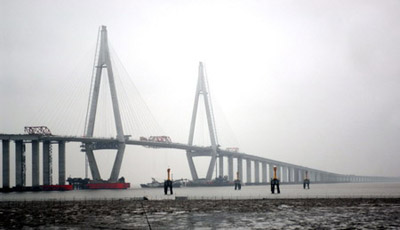 The Hangzhou
Bay Trans-sea Bridge, the world's longest of its kind in east China's Zhejiang
Province, has been linked up successfully at 3:00 p.m. on June 14, 2007. The
gigantic bridge strides across Hangzhou Gulf and links up the Haiyan County of
Jiaxing and Cixi, a city of Ningbo. It runs a full length of 36 kilometers. The Hangzhou
Bay Trans-sea Bridge, the world's longest of its kind in east China's Zhejiang
Province, has been linked up successfully at 3:00 p.m. on June 14, 2007. The
gigantic bridge strides across Hangzhou Gulf and links up the Haiyan County of
Jiaxing and Cixi, a city of Ningbo. It runs a full length of 36 kilometers.
China, the world's second-largest energy consumer, will
this year begin offering corporate income tax preferences to overseas investors
in natural gas processing, marketing and construction of urban gas pipelines in
a move to use more of the clean energy source.
Seven-tenths of China's rural areas do not have any more
young laborers to transfer out - The Chinese Academy of Social Sciences (CASS)
released a green paper on population and laborers in 2007. The green paper
pointed out that three-fourths of all villages in China did not have young and
strong laborers to transfer out. The rate of increase in laborers has been
dropping year by year. It is expected that the supply exceeding the demand of
labors will be reversed during the period of the 11th "Five-Year Plan". The
Development Research Center of State Council took a survey on the utilization of
the rural labor force. This survey covered 2,749 administrative villages in
seventeen provinces and autonomous regions. We learn from the survey that
laborers in 74.3 percent of all villages in China left their home to work in
urban areas. Only one-fourth of villages had laborers to transfer out. The
proportions of this survey were as follows: 71.6 percent in eastern regions, 76
percent in central regions and 76.4 percent in western regions. The reduction in
the numbers of labors who move away suggested that wages of rural workers have
increased year by year. The green paper pointed out that since more rural
workers are needed in coastal areas, wages of rural workers have increased
gradually. From 2003 to 2006, the per capita monthly income of rural workers
increased from 781 Yuan to 953 Yuan.
Data published by Ministry of Commerce of China show that,
from January to May of this year, China's high-tech product imports and exports
exceeded US$200 billion to reach US$232.49 billion, up by 20.2 percent more than
in the same period last year, and making up 29 percent of the total value of
foreign trade. The value of exports is US$125.76 billion, up 24.3 percent over
the same period of last year, and the value of imports is US$106.73 billion, up
15.8 percent.
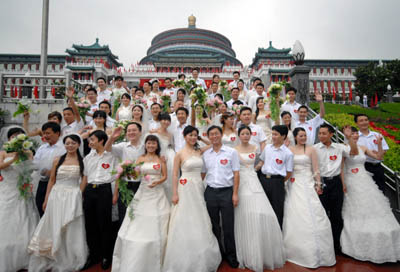 Thirty couples gather at the
People's Square in Chongqing for a group wedding ceremony Monday, June 18, 2007.
The city is this year celebrating its 10th anniversary as a municipality.
Thirty couples gather at the
People's Square in Chongqing for a group wedding ceremony Monday, June 18, 2007.
The city is this year celebrating its 10th anniversary as a municipality.
 A young girl dressed in a Red Army costume does the
splits in the water during the Kong Zhu Piao contest, or single bamboo rafting,
in which competitors must get across the water on a bamboo pole while striking
difficult poses, in Zunyi, South China's Guizhou Province, June 18, 2007.
A young girl dressed in a Red Army costume does the
splits in the water during the Kong Zhu Piao contest, or single bamboo rafting,
in which competitors must get across the water on a bamboo pole while striking
difficult poses, in Zunyi, South China's Guizhou Province, June 18, 2007.
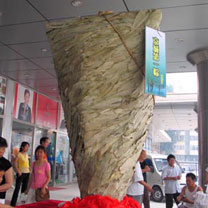 Residents stop to catch a look at a 2-meter-high "Zongzi", also known as
glutinous rice dumpling, in front of a department store in Beijing on June 18,
2007 for the traditional Dragon Boat Festival.
Residents stop to catch a look at a 2-meter-high "Zongzi", also known as
glutinous rice dumpling, in front of a department store in Beijing on June 18,
2007 for the traditional Dragon Boat Festival.
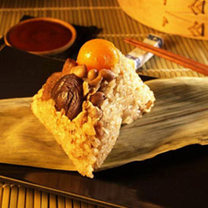 The annual Duanwujie
(Dragon Boat Festival) is coming. Chinese people traditionally eat zongzi
(glutinous rice dumplings) to celebrate it. So here we give you some places to
get zongzi. The annual Duanwujie
(Dragon Boat Festival) is coming. Chinese people traditionally eat zongzi
(glutinous rice dumplings) to celebrate it. So here we give you some places to
get zongzi.
Defending champion Yan Zi is to compete in the women's
doubles event at the upcoming Wimbledon Open with new partner Peng Shuai, an ace
single who just recovered from injury. The new formation came after Yan's former
partner, Zheng Jie, withdrew from the Grand Slam tournament because of injury,
according to website Sina.com. The other Chinese duo in the event is Sun
Shengnan and Ji Chunmei, while remaining compatriots, Sun Tiantian, Li Na and
Yuan Meng, will join foreign players to compete. Yan Zi and Zheng Jie became the
first Chinese crowned Grand Slams last year after pocketing both women's doubles
titles in the Australian Open and Wimbledon Open. This year's Wimbledon Open
will kick off on June 25.
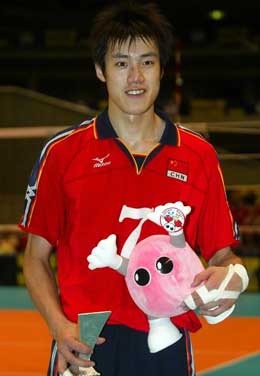 A week after
15-year-old gymnast Wang Yan broke her neck at the national championships in
Shanghai, a similar tragedy has struck another Olympic hopeful. Tang Miao, a key
player on the men's national volleyball team, broke his neck while warming up
for a training session in St Petersburg, Russia. Volleyball star Tang Miao is
facing permanent paralysis after he broke his neck while warming up for a
training session on Wednesday in Russia. Tang's injury will not only be a huge
blow to the men's national team but also to the women's team, as his wife Zhou
Suhong (left in inset picture) is captain. Zhong Ti The 25-year-old, who was
approaching the peak of his career, could be paralyzed for life after the
accident. The accident happened on Wednesday when Tang's local Shanghai team was
tuning up for a friendly with a local team as part of celebrations for the "Year
of China in Russia." A consular official said Tang's head collided with the wall
when he went to save a ball, which increased the damage in his lumbar and
cervical vertebrae. A week after
15-year-old gymnast Wang Yan broke her neck at the national championships in
Shanghai, a similar tragedy has struck another Olympic hopeful. Tang Miao, a key
player on the men's national volleyball team, broke his neck while warming up
for a training session in St Petersburg, Russia. Volleyball star Tang Miao is
facing permanent paralysis after he broke his neck while warming up for a
training session on Wednesday in Russia. Tang's injury will not only be a huge
blow to the men's national team but also to the women's team, as his wife Zhou
Suhong (left in inset picture) is captain. Zhong Ti The 25-year-old, who was
approaching the peak of his career, could be paralyzed for life after the
accident. The accident happened on Wednesday when Tang's local Shanghai team was
tuning up for a friendly with a local team as part of celebrations for the "Year
of China in Russia." A consular official said Tang's head collided with the wall
when he went to save a ball, which increased the damage in his lumbar and
cervical vertebrae.
China Mobile (0941) will become the
first red-chip firm in the mainland when it launches a Shanghai offering as
early as next month, raising up to 80 billion yuan (HK$82 billion) in what will
be the mainland's largest-ever equity offering, sources said Monday.
NPC deputy takes up cause of persecuted Shanxi
whistleblowers - A National People's Congress deputy from Shandong has taken up
the fight against the persecution of three government officials in Jishan
county, Shanxi , who exposed the county party secretary's alleged corruption.
Wang Quanjie said he had written to NPC Standing Committee calling for an
inquiry into the suspended jail terms meted out to three low-level county
officials after exposing government irregularities last year. Yang Qinyu said
yesterday he and two colleagues, Nan Huirong and Xue Zhijing, who worked for the
Jishan county government had become concerned about administrative
irregularities under party secretary Li Runshan. Mr Yang said the trio, all in
their early 50s, compiled a report in March last year accusing Mr Li of
wrongdoings such as land-use abuses and posted 37 copies to various government
departments, including the office of Yuncheng's mayor. They were detained for up
to 100 days before two were found guilty of defamation in August and a third was
found guilty last month. They were sentenced to a year's jail, suspended for
three years. Whistleblowers have often met with retribution. Mr Wang said
yesterday the criminal proceedings against the three civil servants were "a
typical case of a reprisal orchestrated by local leadership that gives little
regard to democracy". Mr Yang, the director of Jishan's legislative affairs
committee and a member of the county people's congress, said he was arrested
without the approval of the county congress. He said he had held on to a job but
had been demoted and his salary cut by a fifth. The men have lodged appeals with
the Yuncheng Intermediate People's Court. "We've done nothing wrong," Mr Yang
said. Mr Wang said people should not face charges for faulty tip-offs unless the
leak was intended to be malicious. "Even if their accusations were defamatory,
they should be tried - but not in the same jurisdiction so as to avoid conflicts
of interest," he said. Mr Wang said the NPC Standing Committee had confirmed
that it had passed his proposals on to the Shanxi government and the authorities
would have to come up with some form of redress within three months.
June 20, 2007
 Hong Kong:
RMB bonds good for China, Hong Kong - Earlier this month, the People's Bank of
China (the central bank) and the State Development and Reform Commission
promulgated provisions involving issuing renminbi bonds in the Hong Kong Special
Administrative Region. Ready to make this major move toward financial reform,
China Construction Bank, Bank of China and Import-Export Bank of China published
their plans to float renminbi bonds in Hong Kong. Back in 2003, the Chiangmai
(Thailand) Declaration, in the wake of the Asian financial crisis in the late
1990s, urged that regional financial cooperation be reinforced to stave off
possible future financial catastrophes. The declaration placed development of
the Asian bond market at the core of regional financial integration. China holds
a particularly important place in regional monetary cooperation. But its
backward bond market brings uncertainties for the Asian bond market and
financial cooperation. As a result, it is difficult for the country to get
involved in overall financial cooperation with other countries. However, it is
desirable to make the best use of Hong Kong's advantageous position as an
international financial center and as a bridge between the Chinese mainland and
the rest of the world. Cooperation between the mainland and Hong Kong may offer
a channel for China to participate in future Asian financial cooperation. As a
matter of fact, issuing renminbi bonds in Hong Kong was much talked about back
in 2004. But at the time, the volume of renminbi circulating in Hong Kong and
renminbi deposits in the special administrative region were limited. Moreover, a
significant portion of renminbi in Hong Kong was circulating through underground
avenues. All taken, the time was not right for floating renminbi bonds in the
special administrative region. Things are different now. The channels through
which the mainland and Hong Kong conduct financial cooperation are fairly
developed and the renminbi deposits in Hong Kong reached 25.5 billion yuan ($3.2
billion) at the end of April. All this indicates that the time is ripe for
floating the renminbi. Issuing renminbi bonds is of great significance for Hong
Kong. First, Hong Kong's position as an international monetary hub has been
challenged since the Asian financial crisis. In addition, the weak local bond
market erodes the monetary stability of Hong Kong. Seizing the opportunity of
floating renminbi bonds, Hong Kong is expected to promote a set of monetary
facilities covering payment and clearance, which facilitates the development of
the local bond market. In turn, some of its structural defects as an
international financial hub will be removed. Second, floating renminbi bonds
will help reduce the risks evolving from rising stock prices and also provide
Hong Kong residents with a new monetary product. Finally, Hong Kong's
institutional and technical infrastructures relevant to floating renminbi bonds
will be improved. The financial cooperation between the mainland and Hong Kong
will grow. All this combines to provide more powerful support for overall
economic cooperation between the two. Issuing renminbi bonds in Hong Kong is
equally important to the mainland because the undertaking helps quicken the pace
of the renminbi's internationalization and convertibility. In Hong Kong, a free
capital market, the price of renminbi bonds will fully mirror international
investors' expectations of the renminbi's revaluation. This is of reference
value for the foreign-exchange reform of the Chinese currency. In addition, the
floating of renminbi bonds will give China more say in pricing renminbi
derivatives. Monetary products such as renminbi bonds are expected to strengthen
Hong Kong's status as the center of renminbi offshore derivatives. Also,
floating renminbi bonds in Hong Kong indicates that the opening of the Chinese
mainland's capital market has taken another step forward. With this as a
starting point, a richer variety of bonds and securities is expected to be
issued in the future by many more institutions. Floating renminbi bonds in Hong
Kong will in turn spur the development of the bond market on the mainland. At
present, the mainland bond market still falls short of the needs of the
country's rapid economic development, though this market has made impressive
advances in recent years. In addition, this bond market needs to be
standardized. Floating renminbi bonds in Hong Kong helps in this respect,
stimulating the buildup of the mainland bond market's infrastructure and
creating progress in transaction rules. Hong Kong:
RMB bonds good for China, Hong Kong - Earlier this month, the People's Bank of
China (the central bank) and the State Development and Reform Commission
promulgated provisions involving issuing renminbi bonds in the Hong Kong Special
Administrative Region. Ready to make this major move toward financial reform,
China Construction Bank, Bank of China and Import-Export Bank of China published
their plans to float renminbi bonds in Hong Kong. Back in 2003, the Chiangmai
(Thailand) Declaration, in the wake of the Asian financial crisis in the late
1990s, urged that regional financial cooperation be reinforced to stave off
possible future financial catastrophes. The declaration placed development of
the Asian bond market at the core of regional financial integration. China holds
a particularly important place in regional monetary cooperation. But its
backward bond market brings uncertainties for the Asian bond market and
financial cooperation. As a result, it is difficult for the country to get
involved in overall financial cooperation with other countries. However, it is
desirable to make the best use of Hong Kong's advantageous position as an
international financial center and as a bridge between the Chinese mainland and
the rest of the world. Cooperation between the mainland and Hong Kong may offer
a channel for China to participate in future Asian financial cooperation. As a
matter of fact, issuing renminbi bonds in Hong Kong was much talked about back
in 2004. But at the time, the volume of renminbi circulating in Hong Kong and
renminbi deposits in the special administrative region were limited. Moreover, a
significant portion of renminbi in Hong Kong was circulating through underground
avenues. All taken, the time was not right for floating renminbi bonds in the
special administrative region. Things are different now. The channels through
which the mainland and Hong Kong conduct financial cooperation are fairly
developed and the renminbi deposits in Hong Kong reached 25.5 billion yuan ($3.2
billion) at the end of April. All this indicates that the time is ripe for
floating the renminbi. Issuing renminbi bonds is of great significance for Hong
Kong. First, Hong Kong's position as an international monetary hub has been
challenged since the Asian financial crisis. In addition, the weak local bond
market erodes the monetary stability of Hong Kong. Seizing the opportunity of
floating renminbi bonds, Hong Kong is expected to promote a set of monetary
facilities covering payment and clearance, which facilitates the development of
the local bond market. In turn, some of its structural defects as an
international financial hub will be removed. Second, floating renminbi bonds
will help reduce the risks evolving from rising stock prices and also provide
Hong Kong residents with a new monetary product. Finally, Hong Kong's
institutional and technical infrastructures relevant to floating renminbi bonds
will be improved. The financial cooperation between the mainland and Hong Kong
will grow. All this combines to provide more powerful support for overall
economic cooperation between the two. Issuing renminbi bonds in Hong Kong is
equally important to the mainland because the undertaking helps quicken the pace
of the renminbi's internationalization and convertibility. In Hong Kong, a free
capital market, the price of renminbi bonds will fully mirror international
investors' expectations of the renminbi's revaluation. This is of reference
value for the foreign-exchange reform of the Chinese currency. In addition, the
floating of renminbi bonds will give China more say in pricing renminbi
derivatives. Monetary products such as renminbi bonds are expected to strengthen
Hong Kong's status as the center of renminbi offshore derivatives. Also,
floating renminbi bonds in Hong Kong indicates that the opening of the Chinese
mainland's capital market has taken another step forward. With this as a
starting point, a richer variety of bonds and securities is expected to be
issued in the future by many more institutions. Floating renminbi bonds in Hong
Kong will in turn spur the development of the bond market on the mainland. At
present, the mainland bond market still falls short of the needs of the
country's rapid economic development, though this market has made impressive
advances in recent years. In addition, this bond market needs to be
standardized. Floating renminbi bonds in Hong Kong helps in this respect,
stimulating the buildup of the mainland bond market's infrastructure and
creating progress in transaction rules.
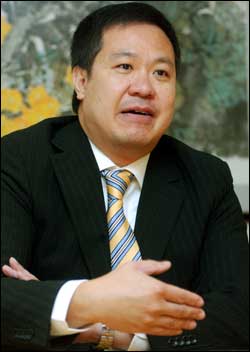 Mainland authorities may not open the door soon for mainland investors to
directly invest in Hong Kong shares, according to a top securities brokerage.
Sun Hung Kai & Company (0086), which operates as Sun Hung Kai Financial, said
mainland authorities may want A-share investors become more mature first by
investing through the qualified domestic institutional investors scheme. The
China Banking Regulatory Commission has granted US$14.7 billion (HK$114.66
billion) in QDII quotas. In mid-May, commercial banks were allowed to invest
US$13.9 billion overseas, half of this in Hong Kong, the only exchange approved
for such funds. Joseph Tong Tang, chief executive of wealth management, capital
markets and brokerage at Sun Hung Kai Financial, said Beijing will take a
gradual approach to mainlanders investing overseas through mutual funds. "If the
government eases all restrictions, too many uncertainties will be created in the
fund flows," he said. Sun Hung Kai Financial maintains a close relationship with
mainland securities firms as it bides its time until authorities review
requirements on foreign acquisitions of domestic brokers in the fourth quarter.
"We have done a lot of preparation in every aspect of business including
securities, futures, forex, and mutual funds," Tong said. "We monitor mainland
policies closely. As soon as policies allow further opening up of the market, we
shall make our move." Foreign investors are only allowed to acquire up to 33
percent of a mainland brokerage. Two years ago, China Securities Regulatory
Commission halted applications for stake acquisitions. Tong said officials
recently said they will start accepting applications again before year's end.
Mainland authorities may not open the door soon for mainland investors to
directly invest in Hong Kong shares, according to a top securities brokerage.
Sun Hung Kai & Company (0086), which operates as Sun Hung Kai Financial, said
mainland authorities may want A-share investors become more mature first by
investing through the qualified domestic institutional investors scheme. The
China Banking Regulatory Commission has granted US$14.7 billion (HK$114.66
billion) in QDII quotas. In mid-May, commercial banks were allowed to invest
US$13.9 billion overseas, half of this in Hong Kong, the only exchange approved
for such funds. Joseph Tong Tang, chief executive of wealth management, capital
markets and brokerage at Sun Hung Kai Financial, said Beijing will take a
gradual approach to mainlanders investing overseas through mutual funds. "If the
government eases all restrictions, too many uncertainties will be created in the
fund flows," he said. Sun Hung Kai Financial maintains a close relationship with
mainland securities firms as it bides its time until authorities review
requirements on foreign acquisitions of domestic brokers in the fourth quarter.
"We have done a lot of preparation in every aspect of business including
securities, futures, forex, and mutual funds," Tong said. "We monitor mainland
policies closely. As soon as policies allow further opening up of the market, we
shall make our move." Foreign investors are only allowed to acquire up to 33
percent of a mainland brokerage. Two years ago, China Securities Regulatory
Commission halted applications for stake acquisitions. Tong said officials
recently said they will start accepting applications again before year's end.
The Mainland & Hong Kong Closer
Economic Partnership Arrangement (CEPA) has created 36,000 new jobs for Hong
Kong people from 2004 to 2006, and 1,000 more for those working on the Mainland.
These are the findings of the Hong Kong SAR Government's second study on CEPA's
economic impact, submitted to the Legislative Council. It forecasts another
3,600 jobs will be created in Hong Kong this year. For trade in goods, it said
89 percent of responding companies considered CEPA beneficial to the economy,
and 77 percent felt the preferential trade arrangement was beneficial to the
manufacturing sector. CEPA induced additional capital investment in the
manufacturing industry, amounting to 305 million HK dollars in 2005 and 2006,
and a planned investment of 240 million dollars in 2007 and beyond. Moreover,
mainland people using the Individual Visit Scheme had made 17.2 million trips to
Hong Kong as at the end of 2006, accounting for 39 percent of all the Mainland
visitors. They generated an additional 9.3 billion HK dollars in tourist
spending in 2006, almost 38 percent higher than in 2004.
Nanyang Commercial Bank (NCB), a
subsidiary of the Bank of China Hong Kong (BOCHK), is likely to become the first
overseas bank to directly transform into a mainland corporate bank. The Hong
Kong-incorporated NCB has applied to the China Banking Regulatory Commission (CBRC)
to become a mainland-registered corporate bank and it will move its headquarters
to Shanghai after CBRC grants its approval. BOCHK executive Wang Yumin revealed
that NCB will focus on high-end Renminbi business after gaining mainland
corporate bank status.
The EcoPark occupies 20 hectares of
land in Tuen Mun Area 38 and will be developed in two phases. The EcoPark is a
key Government initiative to promote recycling industry in Hong Kong and
jump-start a circular economy by providing long term land for the environmental
and recycling industry. The EcoPark invites overseas and local companies to
submit 'Expression of Interest' from 18 March 2006 to 20 April 2006. Please
refer to the EcoPark website at
http://www.epd.gov.hk/epd/ecopark for more information.
The gap between the rich and the
poor in Hong Kong has widened in the past decade, according to government
statistics released on Monday. The Census and Statistics Department figures
showed the Gini Coefficient for individuals’ employment income increased to 0.5
last year from 0.483 in 1996. The co-efficient measures income disparity on a
scale from zero to one. Zero represents a high degree of equality and one shows
a large degree of inequality. Commissioner for Census and Statistics Fung
Hing-wang said the figures indicated a widening gap in employment income. “The
increased dispersion in the distribution of employment income from 1996 to 2006
was associated with the changes in the demographics of the population and the
structure of the economy over the period, including the income differentials due
to gender, life cycle and education,” he said. Mr Fung said this was the first
time the department had used data collected from the latest population
census-by-census in the study of the territory’s income distribution. Employment
remained the main source of income for Hong Kong people, with 78.6 per cent of
people with income in jobs last year, compared with 82.1 per cent a decade ago.
The median monthly income of the working population increased 5.3 per cent, from
HK$9,500 in 1996 to HK$10,000 in 2006. In real terms, that was an increase from
HK$9,348 to HK$10,000. Mr Fung said the figures showed Hong Kong had more
households at both ends of the income distribution last year than 10 years ago.
The percentage share of households with monthly income at current prices below
HK$4,000 increased from 6.7 per cent in 1996 to 9.2 per cent in 2006, while
those with monthly household income at HK$40,000 or above grew from 15.0 per
cent to 17.0 per cent. “One of the reasons for the increase in the former was
the increasing number of older-person households, and the increase in the latter
was mainly associated with the growth of two-earner households and improvement
in educational attainment of the population,” he said. Between 1996 and 2006,
the median monthly household income edged down slightly, from HK$17,500 to
HK$17,250. In real terms, the median monthly household income in 1996 and 2006
were broadly stable, at HK$17,220 and HK$17,250 respectively. Mr Fung said a
comparison of Hong Kong’s income disparity with foreign countries could help to
have better understanding of the income distribution in Hong Kong. But he said
caution must be taken when interpreting results of such a comparison. “Amongst
all the selected economies, Hong Kong has a higher Gini co-efficient comparable
to those of United Kingdom and Canada. Hong Kong is an open, city economy with a
strong agglomeration of service sector activities which are highly developed and
well diversified, employing workers with multifarious experience and skills,” he
said. “Given this nature, income disparity in Hong Kong tends to be greater than
in those places with a preponderance of manufacturing and agricultural
activities. Moreover, there is a common trend towards greater income disparity
in many economies. Hong Kong is not unique in moving in this direction,” he
added. The figures are contained in Thematic Report: Household Income
Distribution in Hong Kong. It is available at:
http://www.censtatd.gov.hk/products_and_services/products/publications/index.jsp
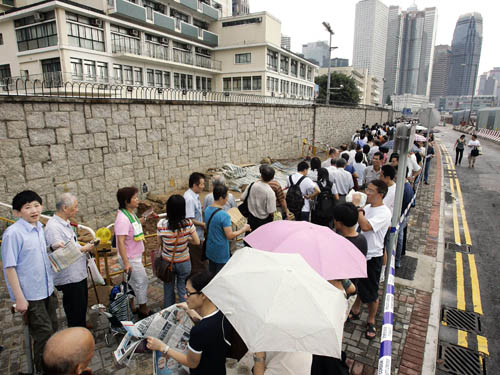
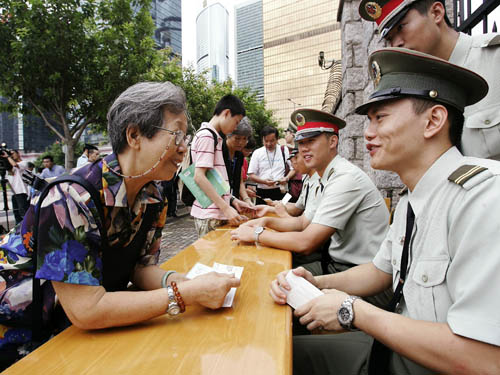 Tickets to a PLA cultural show marking the 10th anniversary of the handover were
snapped up in just over an hour yesterday morning. More than 1,000 people queued
up outside the PLA headquarters at Tamar for free tickets to the show well
before officers started handing them out at 8.30am. Each person was entitled to
a maximum of three tickets and all 4,500 had gone in about 75 minutes.
Tickets to a PLA cultural show marking the 10th anniversary of the handover were
snapped up in just over an hour yesterday morning. More than 1,000 people queued
up outside the PLA headquarters at Tamar for free tickets to the show well
before officers started handing them out at 8.30am. Each person was entitled to
a maximum of three tickets and all 4,500 had gone in about 75 minutes.
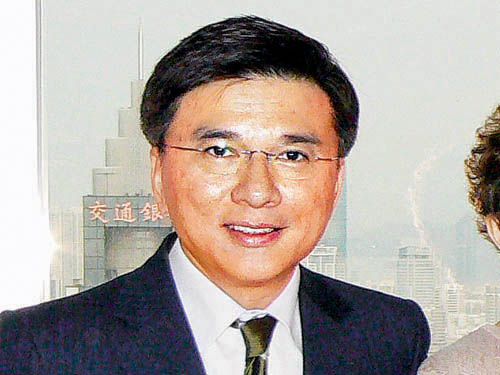 Chan Ka-keung, the dean of Hong Kong University of Science
and Technology's school of business and management, who has experience with the
government and Chief Executive Donald Tsang Yam-kuen, has laid the pathway to be
a member of Mr Tsang's cabinet team. Professor Chan, 50, tipped to take over
from Frederick Ma Si-hang as secretary for financial services and the treasury,
was invited with nine other academics to join a brainstorming session in
November 1997 to discuss methods for defending the peg to the US dollar without
reducing its impact on the economy. The Hong Kong dollar had been under
speculative pressure since October flowing from the East Asia financial crisis,
which started in Thailand on July 2. Then-financial secretary, Mr Tsang, chaired
the meeting. Democrat Sin Chung-kai, who sat on the HKUST Council and the
Competitive Policy Review Committee with Professor Chan, said he had a good
academic background in finance and intimate market knowledge but lacked
experience as a minister. "A good person in academics does not necessarily make
a good minister," Mr Sin said. But a senior government official offered a vote
of confidence to Mr Tsang that Professor Chan would be a good minister, saying
he is a gentleman with a clear mind and good skill in handling personnel issues.
It is not difficult to find Professor Chan's influence in the government. He has
similar views to the administration on economic and financial issues. He says
Hong Kong should play a greater role in mainland economic development and
supports a fair-competition law. As a panellist at the mainland's 11th Five-Year
Programme summit, Professor Chan said that while the mainland was the main
driver for Hong Kong's initial public offering market, the city should attract
more Asian companies, particularly from India. In the past five years, he has
sat on about 15 government advisory bodies, including the Economic Relaunch
Strategy Group, Securities and Futures Appeals Tribunal, and the Civil Service
Training and Development Advisory Board. Professor Chan is a low-profile person
despite his many contributions in the public sector. But he is outspoken in his
role as chairman of the Consumer Council. A council member said Professor Chan
has good connections with participants in the market through his work on several
panels.
Chan Ka-keung, the dean of Hong Kong University of Science
and Technology's school of business and management, who has experience with the
government and Chief Executive Donald Tsang Yam-kuen, has laid the pathway to be
a member of Mr Tsang's cabinet team. Professor Chan, 50, tipped to take over
from Frederick Ma Si-hang as secretary for financial services and the treasury,
was invited with nine other academics to join a brainstorming session in
November 1997 to discuss methods for defending the peg to the US dollar without
reducing its impact on the economy. The Hong Kong dollar had been under
speculative pressure since October flowing from the East Asia financial crisis,
which started in Thailand on July 2. Then-financial secretary, Mr Tsang, chaired
the meeting. Democrat Sin Chung-kai, who sat on the HKUST Council and the
Competitive Policy Review Committee with Professor Chan, said he had a good
academic background in finance and intimate market knowledge but lacked
experience as a minister. "A good person in academics does not necessarily make
a good minister," Mr Sin said. But a senior government official offered a vote
of confidence to Mr Tsang that Professor Chan would be a good minister, saying
he is a gentleman with a clear mind and good skill in handling personnel issues.
It is not difficult to find Professor Chan's influence in the government. He has
similar views to the administration on economic and financial issues. He says
Hong Kong should play a greater role in mainland economic development and
supports a fair-competition law. As a panellist at the mainland's 11th Five-Year
Programme summit, Professor Chan said that while the mainland was the main
driver for Hong Kong's initial public offering market, the city should attract
more Asian companies, particularly from India. In the past five years, he has
sat on about 15 government advisory bodies, including the Economic Relaunch
Strategy Group, Securities and Futures Appeals Tribunal, and the Civil Service
Training and Development Advisory Board. Professor Chan is a low-profile person
despite his many contributions in the public sector. But he is outspoken in his
role as chairman of the Consumer Council. A council member said Professor Chan
has good connections with participants in the market through his work on several
panels.
 Alibaba, the mainland's leading e-commerce company, has
chosen a Hong Kong initial public offering later this year rather than selling
shares in New York in a deal that could be worth up to US$1 billion, according
to sources. A decision by Alibaba founder Jack Ma to bring to Hong Kong what
could be the biggest initial public offering for a mainland internet company
contrasts with other leading players in the sector, which have listed or are
seeking a listing in the Nasdaq. Goldman Sachs and Morgan Stanley are arranging
the public offering. The two banks and a spokesman at Alibaba declined to
comment. "Jack Ma is a Sarbanes-Oxley hater and doesn't feel it's necessary to
do a US listing," said source. Sarbanes-Oxley was a piece of US legislation
implemented five years ago in the wake of corporate scandals including Enron,
Arthur Andersen and WorldCom. It tightened accounting practices for publicly
listed companies and holds corporate chiefs more accountable to investors. Many
companies complain that compliance with the law is prohibitively expensive and
critics say it has convinced many foreign companies to seek initial public
offerings in jurisdictions such as London or Hong Kong where regulators have a
lighter touch. The US securities regulator last year started a series of changes
to the more onerous parts of the law. Technology companies have favoured New
York listings because of the higher valuations they can garner there. Even so,
that may not be true for Alibaba. "The investor base will be a bit different
because there will be more retail involvement in Hong Kong but I don't think
listing in Hong Kong will make that much difference in terms of valuation
because it's a concept stock similar to Baidu and there'll be a lot of frenzy
and hype," said a source. Baidu.com, the most-used internet search engine in the
mainland, listed on the Nasdaq in August 2005. Its shares have risen five times
above its offer price and traded at US$143.07 on Friday. There are other reasons
why Hong Kong, which is Alibaba's official headquarters and a centre for global
trading, is a better alternative for Alibaba. Alibaba, the mainland's leading e-commerce company, has
chosen a Hong Kong initial public offering later this year rather than selling
shares in New York in a deal that could be worth up to US$1 billion, according
to sources. A decision by Alibaba founder Jack Ma to bring to Hong Kong what
could be the biggest initial public offering for a mainland internet company
contrasts with other leading players in the sector, which have listed or are
seeking a listing in the Nasdaq. Goldman Sachs and Morgan Stanley are arranging
the public offering. The two banks and a spokesman at Alibaba declined to
comment. "Jack Ma is a Sarbanes-Oxley hater and doesn't feel it's necessary to
do a US listing," said source. Sarbanes-Oxley was a piece of US legislation
implemented five years ago in the wake of corporate scandals including Enron,
Arthur Andersen and WorldCom. It tightened accounting practices for publicly
listed companies and holds corporate chiefs more accountable to investors. Many
companies complain that compliance with the law is prohibitively expensive and
critics say it has convinced many foreign companies to seek initial public
offerings in jurisdictions such as London or Hong Kong where regulators have a
lighter touch. The US securities regulator last year started a series of changes
to the more onerous parts of the law. Technology companies have favoured New
York listings because of the higher valuations they can garner there. Even so,
that may not be true for Alibaba. "The investor base will be a bit different
because there will be more retail involvement in Hong Kong but I don't think
listing in Hong Kong will make that much difference in terms of valuation
because it's a concept stock similar to Baidu and there'll be a lot of frenzy
and hype," said a source. Baidu.com, the most-used internet search engine in the
mainland, listed on the Nasdaq in August 2005. Its shares have risen five times
above its offer price and traded at US$143.07 on Friday. There are other reasons
why Hong Kong, which is Alibaba's official headquarters and a centre for global
trading, is a better alternative for Alibaba.
 China: Air
Canada will double its daily Beijing-Vancouver service and increase its
Shanghai-Toronto non-stop flights in July, the carrier's Beijing Office said on
Sunday. "These added flights represent an increased capacity of nearly 50
percent for the growing Chinese market, which continues to thrive due to
strength in both leisure and business travel," said Daniel Shurz, vice president
of Network Planning of Air Canada. "With these enhancements Air Canada
strengthens its position as the carrier with the most frequent flights between
China and Vancouver and the only airline with non-stop service from eastern
Canada to China." The added Beijing-Vancouver daily flight will operate between
July 2 and October 1, using a 211-seat Boeing 767-300 plane. Effective on July
1, The Shanghai-Toronto service will increase to daily service starting for the
summer peak and continue as a three-day-a-week service for the 2007-2008 winter
schedule. In total, Air Canada will operate five daily non-stops between China
and Canada this summer, the most of any airline. Montreal-based Air Canada
provides scheduled and charter air transportation for passengers and cargo to
more than 150 destinations on five continents.
China: Air
Canada will double its daily Beijing-Vancouver service and increase its
Shanghai-Toronto non-stop flights in July, the carrier's Beijing Office said on
Sunday. "These added flights represent an increased capacity of nearly 50
percent for the growing Chinese market, which continues to thrive due to
strength in both leisure and business travel," said Daniel Shurz, vice president
of Network Planning of Air Canada. "With these enhancements Air Canada
strengthens its position as the carrier with the most frequent flights between
China and Vancouver and the only airline with non-stop service from eastern
Canada to China." The added Beijing-Vancouver daily flight will operate between
July 2 and October 1, using a 211-seat Boeing 767-300 plane. Effective on July
1, The Shanghai-Toronto service will increase to daily service starting for the
summer peak and continue as a three-day-a-week service for the 2007-2008 winter
schedule. In total, Air Canada will operate five daily non-stops between China
and Canada this summer, the most of any airline. Montreal-based Air Canada
provides scheduled and charter air transportation for passengers and cargo to
more than 150 destinations on five continents.
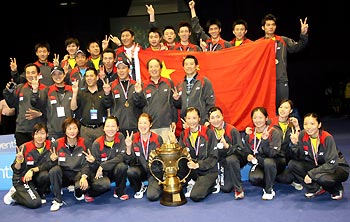 Members of
China's badminton team pose for photos after the awarding ceremony for Sudirman
Cup World Team Badminton Championships in Glasgow, Scotland, June 17, 2007.
China claimed the Sudirman Cup for a record sixth time after beating Indonesia
3-0. Members of
China's badminton team pose for photos after the awarding ceremony for Sudirman
Cup World Team Badminton Championships in Glasgow, Scotland, June 17, 2007.
China claimed the Sudirman Cup for a record sixth time after beating Indonesia
3-0.
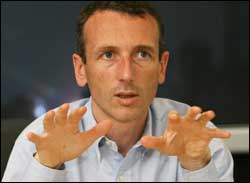 Rogue companies. Secret
profits. Legal threats. Allegations of evil deeds and tyranny. It may sound like
an overwrought corporate thriller, but all are elements in a dispute between
French firm Danone and its mainland partner which has underlined the lingering
risks of doing business in China. The case has seen a successful Sino- foreign
joint venture devolve into a catfight of charges and recriminations. For many,
it's a cautionary tale about getting into bed with a mainland partner. "In my
mind, there is no reason to have a [mainland] partner anymore," said Mic
Mittasch, an Australian who was involved in joint ventures but now runs a wholly
foreign-owned business in Beijing creating production lines for manufacturing
firms. "A lot of firms that have them are now looking to cut down on the
partner's influence." The French maker of Danone yogurt and Evian water is now
trying to do just that with its estranged partner Wahaha, China's biggest drinks
company. Since joining forces in 1996, Danone has injected tens of millions of
dollars to gain access to Wahaha's China distribution network in a venture run
by Zong Qinghou, one of China's most successful businessmen. But Danone this
month filed a suit in the United States accusing Zong of setting up dozens of
rogue companies that sold the joint venture's drinks, but with none of those
profits going to the French firm. Danone said the underhand dealings have cost
it US$100 million (HK$780 million). Zong has since resigned, but not without
fighting back with accusations that Danone was attempting a "hostile takeover"
of their various joint venture companies. His loyalists in the company vowed to
resist Danone's control with increasingly angry rhetoric, including allegations
of "evil deeds," quotes from revolutionary leader Mao Zedong and protests from
local staff. The case seems ripped from the pages of the 2002 book Mr China, a
frequently hilarious real-life business memoir by Tim Clissold, a representative
in 1990s China for the Wall Street investment fund Asimco. The book recounts one
battle after another with a series of duplicitous mainland partners who used
Asimco's money to build rogue factories making competing products or to pay off
debts. Clissold and his team eventually lost hundreds of millions of dollars.
But other Western companies in China today continue to experience such problems.
"With our Chinese partner, if you gave them a finger, they would take the whole
arm," said Anders Maltesen, general manager of Tianjin Alstom Hydro, which makes
turbines for the Three Gorges hydroelectric project. Alstom, the French
engineering group, has steadily bought out its mainland partner since the
venture was formed in 1995 due to repeated squabbling. "In China, a signature on
a contract is often viewed as merely the start of negotiations," he said. Zong
has threatened to pull out of the venture and sue his estranged partner, while
the new Danone-appointed chairman Emmanuel Faber has vowed to stand firm while
leaving the door open to a settlement. Whatever the outcome, experts say the
affair underlines the risks of joint ventures. Formerly required by mainland
law, they were a way for companies to gain access to overseas cash while
providing foreign investors immediate market share and a guide through an alien
business, legal, and cultural environment. But with China's market and legal
systems more developed today, the risk of a joint venture going sour once the
mainland party no longer needs money often outweighs the benefits, said Edward
Smith, director of Beijing Consulting Group. "The bottom line is, a joint
venture can often be more work than just going it alone," said Smith, who steers
clients toward wholly foreign-owned arrangements. "There are some very
well-trained Chinese professionals around today, so most of the services a
partner would bring can now just be bought in the marketplace." Rogue companies. Secret
profits. Legal threats. Allegations of evil deeds and tyranny. It may sound like
an overwrought corporate thriller, but all are elements in a dispute between
French firm Danone and its mainland partner which has underlined the lingering
risks of doing business in China. The case has seen a successful Sino- foreign
joint venture devolve into a catfight of charges and recriminations. For many,
it's a cautionary tale about getting into bed with a mainland partner. "In my
mind, there is no reason to have a [mainland] partner anymore," said Mic
Mittasch, an Australian who was involved in joint ventures but now runs a wholly
foreign-owned business in Beijing creating production lines for manufacturing
firms. "A lot of firms that have them are now looking to cut down on the
partner's influence." The French maker of Danone yogurt and Evian water is now
trying to do just that with its estranged partner Wahaha, China's biggest drinks
company. Since joining forces in 1996, Danone has injected tens of millions of
dollars to gain access to Wahaha's China distribution network in a venture run
by Zong Qinghou, one of China's most successful businessmen. But Danone this
month filed a suit in the United States accusing Zong of setting up dozens of
rogue companies that sold the joint venture's drinks, but with none of those
profits going to the French firm. Danone said the underhand dealings have cost
it US$100 million (HK$780 million). Zong has since resigned, but not without
fighting back with accusations that Danone was attempting a "hostile takeover"
of their various joint venture companies. His loyalists in the company vowed to
resist Danone's control with increasingly angry rhetoric, including allegations
of "evil deeds," quotes from revolutionary leader Mao Zedong and protests from
local staff. The case seems ripped from the pages of the 2002 book Mr China, a
frequently hilarious real-life business memoir by Tim Clissold, a representative
in 1990s China for the Wall Street investment fund Asimco. The book recounts one
battle after another with a series of duplicitous mainland partners who used
Asimco's money to build rogue factories making competing products or to pay off
debts. Clissold and his team eventually lost hundreds of millions of dollars.
But other Western companies in China today continue to experience such problems.
"With our Chinese partner, if you gave them a finger, they would take the whole
arm," said Anders Maltesen, general manager of Tianjin Alstom Hydro, which makes
turbines for the Three Gorges hydroelectric project. Alstom, the French
engineering group, has steadily bought out its mainland partner since the
venture was formed in 1995 due to repeated squabbling. "In China, a signature on
a contract is often viewed as merely the start of negotiations," he said. Zong
has threatened to pull out of the venture and sue his estranged partner, while
the new Danone-appointed chairman Emmanuel Faber has vowed to stand firm while
leaving the door open to a settlement. Whatever the outcome, experts say the
affair underlines the risks of joint ventures. Formerly required by mainland
law, they were a way for companies to gain access to overseas cash while
providing foreign investors immediate market share and a guide through an alien
business, legal, and cultural environment. But with China's market and legal
systems more developed today, the risk of a joint venture going sour once the
mainland party no longer needs money often outweighs the benefits, said Edward
Smith, director of Beijing Consulting Group. "The bottom line is, a joint
venture can often be more work than just going it alone," said Smith, who steers
clients toward wholly foreign-owned arrangements. "There are some very
well-trained Chinese professionals around today, so most of the services a
partner would bring can now just be bought in the marketplace."
 Actress Maggie Cheung walks on the red carpet in Shanghai
Grand Theater on Saturday night, June 16, 2007, before the opening ceremony of
the 10th Shanghai International Film Festival.
Actress Maggie Cheung walks on the red carpet in Shanghai
Grand Theater on Saturday night, June 16, 2007, before the opening ceremony of
the 10th Shanghai International Film Festival.
 Chinese actress Chen
Hao walks on the red carpet in Shanghai Grand Theater on Saturday night, June
16, 2007, before the opening ceremony of the 10th Shanghai International Film
Festival. Chinese actress Chen
Hao walks on the red carpet in Shanghai Grand Theater on Saturday night, June
16, 2007, before the opening ceremony of the 10th Shanghai International Film
Festival.
 Chinese actress Zhou Xun walks on the red carpet in
Shanghai Grand Theater on Saturday night, June 16, 2007, before the opening
ceremony of the 10th Shanghai International Film Festival.
Chinese actress Zhou Xun walks on the red carpet in
Shanghai Grand Theater on Saturday night, June 16, 2007, before the opening
ceremony of the 10th Shanghai International Film Festival.
 Korean actor Lee
JunKi walks on the red carpet in Shanghai Grand Theater on Saturday night, June
16, 2007, before the opening ceremony of the 10th Shanghai International Film
Festival. Korean actor Lee
JunKi walks on the red carpet in Shanghai Grand Theater on Saturday night, June
16, 2007, before the opening ceremony of the 10th Shanghai International Film
Festival.
 Hot air balloons cross the Qiongzhou Strait - Hot air
balloons float during a contest over the Qiongzhou Strait between Guangdong and
Hainan provinces in south China, June 17, 2007.
Hot air balloons cross the Qiongzhou Strait - Hot air
balloons float during a contest over the Qiongzhou Strait between Guangdong and
Hainan provinces in south China, June 17, 2007.
Director-General of the World Trade Organization (WTO)
Pascal Lamy on Monday hailed China's performance since its entry into WTO in
2001. "Lamy fully appreciates China's overall performance since it entered the
WTO in 2001".
 Celebrate
Dragon Boat Festival with rice dumplings - The annual traditional Chinese
festival Duanwujie (Dragon Boat Festival) falls on June 19 this year.
Traditionally, Chinese people make zongzi (glutinous rice dumplings) and eat
them at home to celebrate this festival. Yet for office workers, tight work
schedules makes it almost impossible to make zongzi themselves. So here are some
recommended places to buy zongzi in Beijing and Shanghai. Zongzi is a kind of
rice dumpling wrapped in bamboo or reed leaves to form a pyramid. The stuffing
is mostly made of glutinous rice and complemented with Chinese dates, red beans,
and salty meats. Generally speaking, zongzi is divided into two categories,
salty zongzi which is popular in South China, and the sweet ones in North China. Celebrate
Dragon Boat Festival with rice dumplings - The annual traditional Chinese
festival Duanwujie (Dragon Boat Festival) falls on June 19 this year.
Traditionally, Chinese people make zongzi (glutinous rice dumplings) and eat
them at home to celebrate this festival. Yet for office workers, tight work
schedules makes it almost impossible to make zongzi themselves. So here are some
recommended places to buy zongzi in Beijing and Shanghai. Zongzi is a kind of
rice dumpling wrapped in bamboo or reed leaves to form a pyramid. The stuffing
is mostly made of glutinous rice and complemented with Chinese dates, red beans,
and salty meats. Generally speaking, zongzi is divided into two categories,
salty zongzi which is popular in South China, and the sweet ones in North China.
China remains popular destination of overseas capital -
China approved fewer joint ventures but attracted more foreign direct investment
in the first five months, indicating the country is still a popular destination
of overseas capital, Yao Shenhong, spokesman with the Ministry of Commerce said
on Wednesday. A total of 15,072 joint ventures were approved by the ministry
from January to May, down 3.75 percent year-on-year, bringing in US$25.28
billion, up 9.87 percent from a year earlier, Yao said.
June 19, 2007
 Hong Kong:
More than 1,000 Canadian community, business and political leaders on Friday
shared the message of "One Country, Two Systems" in Toronto at a gala that marks
the 10th anniversary of Hong Kong's handover to China. Speaking at the opening
ceremony of Bauhinia Gala held at the Metro Toronto Convention Center, Bassanio
So, Director of the Hong Kong Economic and Trade Office (HKETO), told the
participants that the Fortune magazine had made a prediction before the handover
that "it's over" for Hong Kong, and the Time magazine had also said at that time
that Hong Kong "is bleeding." "Today, we have bowled over the world with our
stellar economic dynamism and resilience, thanks to the entrepreneurship of the
Hong Kong people," So said. Hong Kong's economy, riding on the booming economy
on China's mainland, is now "on its best-ever shape" since the handover, So
noted. With spearheading by the Center for Information and Community Services of
Ontario, a leading community organization providing settlement services for new
immigrants, the gala was supported by almost 30 community and business
associations in the Greater Toronto Area, as well as the HKETO and Hong Kong
Tourism Board in Canada. Chinese Ambassador Lu Shumin, Ontario Premier Dalton
McGuinty, Chinese-Canadian Senator Vivienne Poy, federal government
representative, member of Parliament Michael Chong and Chinese Consul General in
Toronto Zhu Taoying were present at the event. Hong Kong:
More than 1,000 Canadian community, business and political leaders on Friday
shared the message of "One Country, Two Systems" in Toronto at a gala that marks
the 10th anniversary of Hong Kong's handover to China. Speaking at the opening
ceremony of Bauhinia Gala held at the Metro Toronto Convention Center, Bassanio
So, Director of the Hong Kong Economic and Trade Office (HKETO), told the
participants that the Fortune magazine had made a prediction before the handover
that "it's over" for Hong Kong, and the Time magazine had also said at that time
that Hong Kong "is bleeding." "Today, we have bowled over the world with our
stellar economic dynamism and resilience, thanks to the entrepreneurship of the
Hong Kong people," So said. Hong Kong's economy, riding on the booming economy
on China's mainland, is now "on its best-ever shape" since the handover, So
noted. With spearheading by the Center for Information and Community Services of
Ontario, a leading community organization providing settlement services for new
immigrants, the gala was supported by almost 30 community and business
associations in the Greater Toronto Area, as well as the HKETO and Hong Kong
Tourism Board in Canada. Chinese Ambassador Lu Shumin, Ontario Premier Dalton
McGuinty, Chinese-Canadian Senator Vivienne Poy, federal government
representative, member of Parliament Michael Chong and Chinese Consul General in
Toronto Zhu Taoying were present at the event.
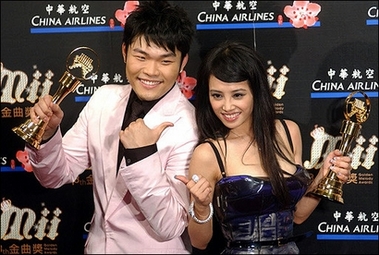 South
Korean singer Nicky Lee(L) and Taiwan's Jolin Tsai pose after winning the Best
Male/Female Vocalist-Mandarin awards during the 18th Golden Melody Awards in
Taipei.
South
Korean singer Nicky Lee(L) and Taiwan's Jolin Tsai pose after winning the Best
Male/Female Vocalist-Mandarin awards during the 18th Golden Melody Awards in
Taipei.
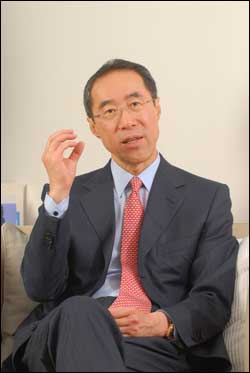 There is an
urgent need to deal with the price differential between H shares and A shares,
Financial Secretary Henry Tang Ying-yen has warned. In an interview with The
Standard and its sister publications Sing Tao Daily and Eastweek, he said Hong
Kong has been exchanging views with the mainland on the hot topic. "But it would
be inconvenient for us to disclose what we have been discussing," he said "As
you understand, we don't want to see the mainland stock markets affected by our
comments. "My feeling is that the central government is aware of the problem ...
They have indeed taken some measures like the launch of QDII [qualified domestic
institutional investors scheme]. "Increasing their scale and coverage will, to a
certain degree, allow capital to flow into Hong Kong in an orderly manner."
Since February, Tang, with Hong Kong Monetary Authority chief executive Joseph
Yam Chi-kwong, has suggested more than once that an arbitrage mechanism be set
up between Hong Kong and the mainland to solve the wide differential between
mainland- listed A shares and Hong Kong-listed H shares. An arbitrage system
would allow investors to buy A shares and sell them in the H-share market, or
vice versa, narrowing the price gap between the two classes of shares. In March,
the State Administration of Foreign Exchange, the foreign exchange watchdog,
said it was studying a Hong Kong government proposal to reduce the price
differential between A shares and H shares through an arbitrage mechanism. But
no further information was disclosed. Tang said the share-price difference will
become a cause for concern when a market correction takes place. "Investors
wouldn't mind the difference if they can make profits in a surging market," he
said. "But they will question why they should pay a premium [in the mainland
markets] when the same stocks are available in Hong Kong. At this point, there's
the problem. When it happens, my feeling is the [central] government will have
to respond to it properly ... This is a question of great urgency." Tang
cautioned individual investors to be prepared for upheavals in the stock markets
this year, recalling a similar warning he made late last year that "the
volatility in the markets would be huge and Joseph Yam had also made such
warnings on a couple of occasions." He said the SAR government will make sure
the Hong Kong stock market operates in an open, stable manner and be properly
monitored by the authorities. Declaring that it is not for the administration to
say whether the market has become too hot or not, Tang urged investors to
understand all risks involved amid rising market volatility. In remarks before
blue chips rallied to a new record Friday, Tang said: "You must ask yourself how
much risk you can bear." The Hang Seng Index closed at an all-time high of
21,017.05 points Friday, while the Hang Seng China Enterprises Index, which
tracks the H shares of 41 mainland companies, ended up 2.35 per cent to close at
11,443.91 points, its best closing since December last year. Turnover soared to
HK$83.36 billion - the second-largest in history after the HK$94.99 billion
record set on May 14. Analysts attributed the bull run that raised total market
capitalization to HK$15.39 trillion to QDII funds streaming into Hong Kong,
chasing big caps listed here. Many believe that with the inflow of funds
expected to continue, blue chips may test further highs. There is an
urgent need to deal with the price differential between H shares and A shares,
Financial Secretary Henry Tang Ying-yen has warned. In an interview with The
Standard and its sister publications Sing Tao Daily and Eastweek, he said Hong
Kong has been exchanging views with the mainland on the hot topic. "But it would
be inconvenient for us to disclose what we have been discussing," he said "As
you understand, we don't want to see the mainland stock markets affected by our
comments. "My feeling is that the central government is aware of the problem ...
They have indeed taken some measures like the launch of QDII [qualified domestic
institutional investors scheme]. "Increasing their scale and coverage will, to a
certain degree, allow capital to flow into Hong Kong in an orderly manner."
Since February, Tang, with Hong Kong Monetary Authority chief executive Joseph
Yam Chi-kwong, has suggested more than once that an arbitrage mechanism be set
up between Hong Kong and the mainland to solve the wide differential between
mainland- listed A shares and Hong Kong-listed H shares. An arbitrage system
would allow investors to buy A shares and sell them in the H-share market, or
vice versa, narrowing the price gap between the two classes of shares. In March,
the State Administration of Foreign Exchange, the foreign exchange watchdog,
said it was studying a Hong Kong government proposal to reduce the price
differential between A shares and H shares through an arbitrage mechanism. But
no further information was disclosed. Tang said the share-price difference will
become a cause for concern when a market correction takes place. "Investors
wouldn't mind the difference if they can make profits in a surging market," he
said. "But they will question why they should pay a premium [in the mainland
markets] when the same stocks are available in Hong Kong. At this point, there's
the problem. When it happens, my feeling is the [central] government will have
to respond to it properly ... This is a question of great urgency." Tang
cautioned individual investors to be prepared for upheavals in the stock markets
this year, recalling a similar warning he made late last year that "the
volatility in the markets would be huge and Joseph Yam had also made such
warnings on a couple of occasions." He said the SAR government will make sure
the Hong Kong stock market operates in an open, stable manner and be properly
monitored by the authorities. Declaring that it is not for the administration to
say whether the market has become too hot or not, Tang urged investors to
understand all risks involved amid rising market volatility. In remarks before
blue chips rallied to a new record Friday, Tang said: "You must ask yourself how
much risk you can bear." The Hang Seng Index closed at an all-time high of
21,017.05 points Friday, while the Hang Seng China Enterprises Index, which
tracks the H shares of 41 mainland companies, ended up 2.35 per cent to close at
11,443.91 points, its best closing since December last year. Turnover soared to
HK$83.36 billion - the second-largest in history after the HK$94.99 billion
record set on May 14. Analysts attributed the bull run that raised total market
capitalization to HK$15.39 trillion to QDII funds streaming into Hong Kong,
chasing big caps listed here. Many believe that with the inflow of funds
expected to continue, blue chips may test further highs.
Beijing's
endorsement of veteran leftist Tsang Tak-sing as head of the Home Affairs Bureau
in the chief executive's new team, expected to be announced later this week,
shows the central government's eagerness to build up a patriotic base in the
territory - 10 years after reunification with the motherland.
Former RTHK chief Cheung Man-yee
has launched an attack on the review committee on public broadcasting, saying it
misled the public when explaining its opposition to turning the station into an
independent public broadcaster. The panel, headed by veteran journalist Raymond
Roy Wong, recommended creating an independent broadcaster but said RTHK could
not be transformed into such a broadcaster because it was a government
department and the staff wanted to remain civil servants. Ms Cheung said that
was an oversimplification. "The panel is very smart and put up some very clever
reasons why RTHK does not fit with the new body, but people should not reduce
this issue to a `rice bowl matter' for a few hundred staff members. This is
misleading," Ms Cheung said. "Some support staff want to remain civil servants,
but a plan to resolve this problem has been in place for 20 years." She said the
panel should not use these technical problems to obscure the bigger picture.
"One of the panel members, Mathias Woo, was frank enough to state it was because
of RTHK's political stance that it is not suited to the new structure. The issue
is press freedom and the principle of `one country, two systems'." Ms Cheung
said she agreed with the general perception that RTHK would shrink to a small
department under direct government control. "If the government kills RTHK, it
will be a very unwise and provocative action," she said. "The image of the
government will be severely undermined and they will leave Hongkongers with a
bad memory. RTHK is one of the remaining yardsticks of Hong Kong's `one country,
two systems'." Ms Cheung acknowledged RTHK was facing an "uphill battle" for
survival. "We are now in a very passive situation. There is not much that we can
do, but we have to work on it." The former director said the government had
decided to make RTHK independent as early as in 1986 in a review of its future,
but the plan, including the transfer of staff from civil service, had been
delayed when it was decided to give priority to the setting up of the Hospital
Authority. The scheme was shelved in 1989 because of the Tiananmen Square
crackdown and again in the 1990s because of the controversy over political
reform. "It was agreed a long, long time ago that there should be an independent
broadcaster which should be free from political and commercial interests and
that RTHK should be transformed into such a body," Ms Cheung said. "We have been
waiting for this for over 20 years." She said some of the criticisms of RTHK
were unfair. "People always argue over a government-funded broadcaster
continually criticizing the government," she said. "This concept is wrong. This
is taxpayers' money, so what's wrong with a publicly funded body monitoring the
government's performance? It is just like the Audit Department checking on
official accounts. "Hong Kong has had a public broadcaster for decades and it
has contributed so much to press freedom. We should let it go on." She again
urged the government to conduct a public consultation over the future of RTHK as
soon as possible and "not to leave a knife hanging over" its head. The
government has promised to consult the public on the issue for three months, but
did not say when it would begin. "We cannot keep waiting. There is an ageing
problem within RTHK, both in the terms of equipment and general programs," she
said.
If there's any international sport
in which Hong Kong could dominate, it would be mahjong. Hongkongers have
clinched 15 of the 32 second-round seats yesterday at the first annual World
Series of Mahjong in Macau. The top three among the 32 all came from Hong Kong.
More than 360 mahjong experts from across the world have gathered in Asia's
gambling capital to chase a US$500,000 grand prize. To enter the tournament,
they defeated tens of thousands of contestants in online qualifying matches last
month. Unsurprisingly, a majority of competitors have come from the greater
China region. Players from Japan, America, Britain, Denmark, the Philippines and
Malaysia have also taken part at Wynn Macau casino-hotel. "I was ranking quite
low but caught up on a bit of luck," said Lau Lai-fun, a Hong Kong player who
ranked No1 last night. "I must win." The second-round contestants also included
13 mainlanders, two Taiwanese, one Dane and one Macau resident. The three-day
competition organised by World Mahjong Limited ends today. It has the largest
cash prize ever for a mahjong tournament with a total of US$1 million. Among the
256 players who entered the second round yesterday, 104 were from Hong Kong. The
battles were to continue early today with contestants fighting to be world
champion. Taiwan's Hsu Nai-lin, who hosts a variety TV show featuring gambling,
secured a seat.
 China: China
investors sold more US Treasury securities in April than any time in at least
seven years in a signal the nation may be diversifying the world's largest
foreign-exchange reserves. The mainland, which owns more US debt than any
foreign nation except Japan, sold a net US$5.8 billion of US Treasuries, the
first drop in holdings since October 2005, according to Treasury Department
figures that go back to 2000. The central government held US$414 billion of the
US$4.4 trillion in marketable US Treasuries in April, according to a US Treasury
report released on Friday. The mainland, whose foreign-exchange reserves reached
US$1.2 trillion in March, is seeking to lift returns on its investments. That
may push up yields on US Treasuries, traditionally among the top investments for
reserves, and erode demand for the US dollar. The central government announced
in March it would establish an agency modelled on Singapore's Temasek Holdings
to manage part of its foreign-exchange reserves. Analysts estimate the State
Investment Company may start with US$200 billion in capital. Marc Chandler,
global head of currency strategy at Brown Brothers Harriman in New York,
cautioned against conclusions based on one month, saying the figures were
revised regularly. "There's no clear sign they are going to dump treasuries," Mr
Chandler said, noting that mainland officials had said they had no intention of
doing anything that would devalue their holdings. Greg Anderson, director of
currency strategy at ABN Amro Bank in Chicago, said he was unconcerned about the
decline in the mainland's holdings of Treasuries because the country was still
buying US assets, providing support for the US dollar. The central government
agreed last month to invest US$3 billion in New York-based buyout firm
Blackstone Group through the soon-to-be-formed State Investment Company. US
Treasury Secretary Henry Paulson and Federal Reserve chairman Ben Bernanke have
repeatedly played down fears of a treasuries sell-off by foreign investors.
China: China
investors sold more US Treasury securities in April than any time in at least
seven years in a signal the nation may be diversifying the world's largest
foreign-exchange reserves. The mainland, which owns more US debt than any
foreign nation except Japan, sold a net US$5.8 billion of US Treasuries, the
first drop in holdings since October 2005, according to Treasury Department
figures that go back to 2000. The central government held US$414 billion of the
US$4.4 trillion in marketable US Treasuries in April, according to a US Treasury
report released on Friday. The mainland, whose foreign-exchange reserves reached
US$1.2 trillion in March, is seeking to lift returns on its investments. That
may push up yields on US Treasuries, traditionally among the top investments for
reserves, and erode demand for the US dollar. The central government announced
in March it would establish an agency modelled on Singapore's Temasek Holdings
to manage part of its foreign-exchange reserves. Analysts estimate the State
Investment Company may start with US$200 billion in capital. Marc Chandler,
global head of currency strategy at Brown Brothers Harriman in New York,
cautioned against conclusions based on one month, saying the figures were
revised regularly. "There's no clear sign they are going to dump treasuries," Mr
Chandler said, noting that mainland officials had said they had no intention of
doing anything that would devalue their holdings. Greg Anderson, director of
currency strategy at ABN Amro Bank in Chicago, said he was unconcerned about the
decline in the mainland's holdings of Treasuries because the country was still
buying US assets, providing support for the US dollar. The central government
agreed last month to invest US$3 billion in New York-based buyout firm
Blackstone Group through the soon-to-be-formed State Investment Company. US
Treasury Secretary Henry Paulson and Federal Reserve chairman Ben Bernanke have
repeatedly played down fears of a treasuries sell-off by foreign investors.
Singapore Airlines plans to increase
its transport capacity on the Shanghai-to-Singapore route by 25 percent before
July 1 this year in preparation for China's outbound travel peak in summer. From
June 17, Singapore Airlines will offer three more direct flights a week from
Shanghai to Singapore, the China office of Singaporean Airlines announced here
on Saturday. The airline company will add another four direct flights a week
beginning July 1, bringing the number of direct flights on the route from 28 to
35 a week. In total, the airline will offer 69 flights a week from Beijing,
Shanghai, Guangzhou and Nanjing to Singapore. "East China has always been an
important market for us and the increased capacity will offer our customers more
choices," said Ho Yik Wing, general manager of Singapore Airlines China.
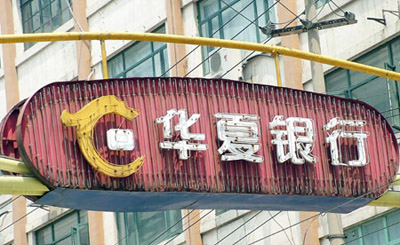 Beijing-based Huaxia Bank announced
on June 15 that it has obtained approval from the People's Bank of China and the
China Banking Regulatory Commission to issue up to 15 billion yuan (US$1.98
billion) worth of bonds in the domestic inter-bank market.
Beijing-based Huaxia Bank announced
on June 15 that it has obtained approval from the People's Bank of China and the
China Banking Regulatory Commission to issue up to 15 billion yuan (US$1.98
billion) worth of bonds in the domestic inter-bank market.
China will need at least 240,000
civil aviation personnel over the next 20 years, according to the latest report
from China Academy of Personnel Science.
The General Administration of Civil
Aviation of China (CAAC) and France-based Thales Group have agreed on the
purchase of a flight simulator in Beijing. CAAC and China Aviation Supplies
Import and Export Group Corporation (CASC) signed a contract to buy a set of
fully-operational Airbus A320 flight simulator from Thales Group, an
international electronic and systematic solution provider. The first flight
simulator CAAC purchased will be used to facilitate training for its own
supervisors. They will decide whether a domestically-made simulator meets the
requirements for A320 flight simulation. The simulator has two components: an
A320 1.5.0-standard D grade full-operational flight simulator and an A320 flight
maintenance exerciser. The flight maintenance exerciser is a low-level training
device, which can simulate the piloting environment in a classroom. With the
assistance of the aviation electronic supply software and reality piloting
model, it creates an authentic effect that is very similar to the full
simulator. The A320 full simulator and exerciser will be installed at the
Sino-Europe Training and Support Center. The center will operate and maintain
the A320 simulator set for CAAC.
A plane of China Southern Airlines
left Guangzhou Saturday morning for Taipei to undertake the charter flight
program for the Duanwu Festival. An Airbus-319, carrying 44 passengers, took off
from Guangzhou at 10:34 a.m. Saturday. Another flight is scheduled to take off
on June 21. Passengers aboard the flight include people returning home for
family reunions, businessmen and tourists. The plane flies via Hong Kong before
it enters Taiwan air space. Zongzi, the festival food for Duanwu, were offered
to passengers. Five mainland airlines and six Taiwan airlines will make 21
round-trip flights from June 15 to June 22, according to the Civil Aviation
Administration of China. The cities involved are Beijing, Shanghai, Guangzhou
and Xiamen on the mainland, and Taipei and Kaohsiung in Taiwan. The first
non-stop charter flights across the Taiwan Strait were launched during the
Chinese Spring Festival period in 2005. Before that there had not been direct
air links across the Taiwan Strait for more than five decades. In June 2006, the
mainland and Taiwan agreed to open charter flights for other traditional
festivals, including Qingming, Duanwu, and the Mid-Autumn Festival. Duanwu, also
known as the Dragon Boat Festival, falls on the fifth day of the fifth month of
the Chinese lunar calendar, or June 19 this year. It is for commemorating a
patriotic Chinese poet over 2,000 years ago. During the festival, boat races are
held and people eat Zongzi. Wrapped up with bamboo leaves and with glutinous
rice inside, Zongzi has various fillings ranging from meaty to confectionary.
Director-General of the World Trade
Organization (WTO) Pascal Lamy arrived in Beijing on Sunday as he tries to
revive the stalled Doha trade talks .
China Communications Services Corp
is acquiring from its parent company, China Telecommunications, network
maintenance and construction businesses in six provinces, sources said
yesterday. The network construction, maintenance, design and operation company,
which was spun off from China Telecom (SEHK: 0728) in a HK$3.27 billion initial
public offering in December, will take over operations covering Jiangsu, Guizhou,
Hunan, Anhui, Jiangxi and Sichuan, doubling the number of provinces it serves in
southern China. Shares in China Communications surged yesterday to close up 5.12
per cent at HK$5.75 on speculation about the injection. In the initial public
offering prospectus, the company budgeted about HK$935 million in cash for the
acquisition of its parent's network construction and maintenance operations in
15 provinces in the 18 months from December. In April, it reported a better than
expected net profit rise of 17 per cent, to 696 million yuan, for last year.
"The company will benefit from the proposed TD-SCDMA 3G network trial by China
Mobile (SEHK: 0941, announcements, news) Communications later this year for the
network design and construction contract," said Wong Chi-man, an analyst at
Everbright Securities. Separately, international accounting firm Ernst & Young
yesterday said foreign telecommunications operators were eyeing entry into the
mainland after Beijing issues 3G licences. "European operators like France
Telecom are all hungry to get into the China market, as they are facing slow
growth in their home market and turn to high growth in emerging markets such as
China and India," said Richard Ireland, a partner of E&Y's telecommunications
sector. China Telecom is the only one of the four mainland telecommunications
players listed in Hong Kong not to already have a foreign partner. Separately,
China Telecom would acquire two overseas companies and one mainland firm from
the parent for 1.41 billion yuan, it said yesterday.
June 18, 2007
 Hong Kong:
An environmental friendly polymer bank note with anti-counterfeit measures will
be launched in Hong Kong next month, said Financial Secretary Henry Tang Friday.
Besides the distinctive anti-counterfeit measures, the new 10- Hong Kong-dollar
bill, which is to be launched on July 9, has two other favorable features,
according to the authority. The first polymer bill in Hong Kong is suppose to be
cleaner than paper bill, since polymer substrate is much less porous than paper.
And also the polymer can be recycled after use which fits the environmental
concern of the public. Henry Tang said the first 50 million new 10 dollar bills
will be gradually in circulation next month and the issue of polymer notes with
different values will be considered if the new bill is well accepted by the
public. Hong Kong:
An environmental friendly polymer bank note with anti-counterfeit measures will
be launched in Hong Kong next month, said Financial Secretary Henry Tang Friday.
Besides the distinctive anti-counterfeit measures, the new 10- Hong Kong-dollar
bill, which is to be launched on July 9, has two other favorable features,
according to the authority. The first polymer bill in Hong Kong is suppose to be
cleaner than paper bill, since polymer substrate is much less porous than paper.
And also the polymer can be recycled after use which fits the environmental
concern of the public. Henry Tang said the first 50 million new 10 dollar bills
will be gradually in circulation next month and the issue of polymer notes with
different values will be considered if the new bill is well accepted by the
public.
A joint venture by the Hong Kong
Productivity Council, the special administrative region's major industry support
service provider, and the Productivity Promotion Center of Shenzhen government
is expected to be operational this October. The aim of the joint venture is "to
further support the development of manufacturing and science and technology
enterprises in the Pearl River Delta area", said Wilson Fung, executive director
of Hong Kong Productivity Council. "We believe that such a joint venture will
provide an ideal platform for enterprises stationed in Shenzhen as well as the
rest of the Pearl River Delta to obtain their required services promptly," Fung
said. According to Fung, the joint venture, called the Shenzhen and Hong Kong
Productivity Foundation, will soon house six service and supporting centers.
They include: an environmental protection technology center, electronics and
automotive technology center, software and digital entertainment industry
center, technology transfer center, management consultation center and
intellectual property and brand-building center. The services provided will
include technology commercialization and business matching, product development
and technology consultancy, standards and quality testing, training, business
consultancy as well as the promotion of Hong Kong's professional services. "We
will further diversify our services later to cope with the market need then ...
There is just a huge demand (for such support and services) from enterprises
operating in the Pearl River Delta area," Fung said. Over 80,000 Hong Kong
enterprises now have businesses in the Delta region and the new foundation will
allow the Hong Kong Productivity Council to provide prompt support and services
to them, Fung said "We hope to expand to other major cities but our priority now
is to serve the enterprises in the Pearl River Delta area," he added. With a
total investment of HK$1.54 million, the Shenzhen and Hong Kong Productivity
Foundation is 65 percent owned by Hong Kong Productivity Council while its
Shenzhen counterpart owns the remaining 35 percent. It is located in the heart
of Shenzhen Advanced New Technology Zone and covers an area of 2,100 square
meters. "It can very conveniently and effectively provide the support services
required by both local and multinational hi-tech companies stationed in the
zone," Fung said. He stressed that the foundation was established mainly to help
both local and Hong Kong enterprises.
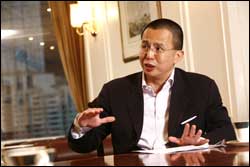 In a stunning
outburst just two weeks ahead of the handover anniversary, PCCW chairman Richard
Li Tzar-kai claimed the SAR government is losing its nerve over the need to
consistently carry out the best and most stable policies for Hong Kong - a
failing he says might deter investment and harm the economy. "I was disappointed
that the courage that the prior [colonial] government had has been lost since
the handover, and that the new government has not stood firm concerning policies
that will ensure a consistent business environment," Li - the youngest son of
tycoon Li Ka- shing - told The Standard, and sister publications Sing Tao News
and Eastweek in an exclusive interview. Li is the first businessman to have
spoken out over the deteriorating local business environment since the 1997
handover, saying it was his biggest disappointment of the past 10 years. "High
profit return is one of the main considerations in attracting funds," Li said.
"However, investors will also consider seriously whether policies can be
consistently executed and a stable running environment ensured." Li said that
during his seven-year tenure at PCCW (0008) he had had many opportunities to
participate in government policy discussions but that his experiences were
totally different to those he had before 1997. He claimed that current
government officials were not sufficiently responsible and lacked the courage to
carry out consistent policies. "They seem to have adopted the old Chinese saying
that `doing less is better,' lacking the courage to face any changes," he said.
"If the government bends toward certain pressure groups at one time and to
others at another time, the inconsistency will be a negative factor for the
business world." Li used the example of the funds that flowed out of Hong Kong
around the 1997 handover period to show how bad such political risks can be, as
an uncertain investment environment could have affected the economy. Using the
controversial Cyberport as an example to illustrate his unhappiness over the
need for consistency, Li said he was disappointed by the government's approach.
Former chief executive Tung Chee- hwa intended to use Cyberport to promote Hong
Kong as the regional technology hub to attract investment in 2002. However, PCCW
was assigned the development and management rights without proper tenders,
sparking widespread criticism among local developers. The government finally
gave in and separated management rights between residential and nonresidential
blocks, with PCCW handling only the residential sites. "I cannot say Cyberport's
performance has been bad, as the profit return it has made was above our
expectations," Li said. "But from a broader perspective, the Hong Kong economy
benefited less because the government has not implemented policies accordingly
to make sure the well-intentioned aim of gathering foreign high-quality
technology companies has been in place." Despite the fact that PCCW was deprived
of the right to manage the nonresidential blocks as originally planned due to
complaints over conflicts of interest, Li said the government should have hired
other experts to take charge to make sure the aims were well taken care of and
that policies were consistent. "Of course, the current tenants of Cyberport all
are innovative technology firms, but if you ask me whether the government has
done a good job in attracting top technology firms from overseas, I would say it
has done too little." Compared with the promotions the Hong Kong Trade
Development Council had mounted before the handover, Li said he would score the
government fewer than two marks and the TDC a full 10. Li contrasted the
Cyberport episode with the successful bid against former Thai premier Thaksin
Shinawatra for the satellite broadcasting frequency for Star TV. "During the
bidding process, the then British Department of Trade and Industry really helped
us beat our competitor." In a stunning
outburst just two weeks ahead of the handover anniversary, PCCW chairman Richard
Li Tzar-kai claimed the SAR government is losing its nerve over the need to
consistently carry out the best and most stable policies for Hong Kong - a
failing he says might deter investment and harm the economy. "I was disappointed
that the courage that the prior [colonial] government had has been lost since
the handover, and that the new government has not stood firm concerning policies
that will ensure a consistent business environment," Li - the youngest son of
tycoon Li Ka- shing - told The Standard, and sister publications Sing Tao News
and Eastweek in an exclusive interview. Li is the first businessman to have
spoken out over the deteriorating local business environment since the 1997
handover, saying it was his biggest disappointment of the past 10 years. "High
profit return is one of the main considerations in attracting funds," Li said.
"However, investors will also consider seriously whether policies can be
consistently executed and a stable running environment ensured." Li said that
during his seven-year tenure at PCCW (0008) he had had many opportunities to
participate in government policy discussions but that his experiences were
totally different to those he had before 1997. He claimed that current
government officials were not sufficiently responsible and lacked the courage to
carry out consistent policies. "They seem to have adopted the old Chinese saying
that `doing less is better,' lacking the courage to face any changes," he said.
"If the government bends toward certain pressure groups at one time and to
others at another time, the inconsistency will be a negative factor for the
business world." Li used the example of the funds that flowed out of Hong Kong
around the 1997 handover period to show how bad such political risks can be, as
an uncertain investment environment could have affected the economy. Using the
controversial Cyberport as an example to illustrate his unhappiness over the
need for consistency, Li said he was disappointed by the government's approach.
Former chief executive Tung Chee- hwa intended to use Cyberport to promote Hong
Kong as the regional technology hub to attract investment in 2002. However, PCCW
was assigned the development and management rights without proper tenders,
sparking widespread criticism among local developers. The government finally
gave in and separated management rights between residential and nonresidential
blocks, with PCCW handling only the residential sites. "I cannot say Cyberport's
performance has been bad, as the profit return it has made was above our
expectations," Li said. "But from a broader perspective, the Hong Kong economy
benefited less because the government has not implemented policies accordingly
to make sure the well-intentioned aim of gathering foreign high-quality
technology companies has been in place." Despite the fact that PCCW was deprived
of the right to manage the nonresidential blocks as originally planned due to
complaints over conflicts of interest, Li said the government should have hired
other experts to take charge to make sure the aims were well taken care of and
that policies were consistent. "Of course, the current tenants of Cyberport all
are innovative technology firms, but if you ask me whether the government has
done a good job in attracting top technology firms from overseas, I would say it
has done too little." Compared with the promotions the Hong Kong Trade
Development Council had mounted before the handover, Li said he would score the
government fewer than two marks and the TDC a full 10. Li contrasted the
Cyberport episode with the successful bid against former Thai premier Thaksin
Shinawatra for the satellite broadcasting frequency for Star TV. "During the
bidding process, the then British Department of Trade and Industry really helped
us beat our competitor."
PCCW (0008) chairman Richard Li Tzar-kai says he is
waiting for "opportunities to overcome the hurdles" beyond his control. "I tried
my best to control the variables which were under my control, and I can only
wait for chances to overcome those beyond my control," Li said when asked the
reasons for his failure to sell his stakes in the company last year and whether
that had anything to do with the pressure applied by the "mainland side." He
declined to elaborate further. Plans by Li to sell his large stake in PCCW to a
consortium assembled by former investment banker Francis Leung Pak-to - a man
with close ties to Beijing and to Li's father, Li Ka- shing - were scuttled in
November following public personality clashes between Li and the buyers. The
younger Li had previously tried to exit the company by selling PCCW's assets to
a foreign private equity group at a premium price, a move that was vetoed by
Beijing. "I have no plans that need to be announced at this stage [about any
plan to sell his stakes] but we will continue maximizing the shareholders'
return in terms of profit and stock price," Li said. Meanwhile, he said he is
very confident in the position of pay-TV unit Now TV as it has already secured
more than half the market. "We have already got more than 50 percent market
share, according to the latest figures on hand," Li said. "I believe the ARPU
[average revenue per user] will continue to increase, not by lifting the
subscription fees but by enriching the TV content." Li said he is keeping his
eye on a TV market which has a "higher population than Hong Kong's" and the
company will be involved in the actual management rather than just offering
consultancy services. "But it won't be China. We already have about 500,000
pay-TV subscribers [in the mainland]." PCCW joined one of the consortia bidding
for one or more of the fixed- line licenses being offered in Saudi Arabia in
March. The company said Wednesday its Hong Kong fixed-line division will launch
an interactive multimedia service platform called "eye" which local households
can use to play music, pay bills or buy movie tickets. The company predicts
there will be 300,000 new subscribers within three years. "The `eye' service is
very definitive and the United States and some European countries will follow
suit [in launching the service]," Li said. He also clarified that the largest
shareholder of the Hong Kong Economic Journal is a consortium and that he is
only the consortium's "satellite." Li secured a 50 percent stake in the
Chinese-language financial newspaper for HK$280 million in August.
Vinda International Holding is
seeking listing committee approval for its HK$1 billion initial public offering
on the Hong Kong bourse.
HSBC Holdings (0005), which has
been following a strategy of earnings diversification, is eager to secure up to
a 7 percent share of all markets in which it operates, group chief executive
Michael Geoghegan said.
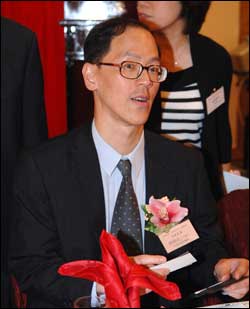 A jailed former
student activist has been selected by Chief Executive Donald Tsang Yam-kuen to
become the next secretary for home affairs, an informed source said. If
confirmed, Tsang Tak-sing, a full- time adviser to the Central Policy Unit and
the former Tai Kung Pao editor-in- chief, will become the first convicted person
to become a minister in Hong Kong. Tsang, who is also a local deputy to the
National People's Congress, was an 18-year-old St Paul's College student in 1967
when he was sentenced to two years in jail for breaching the Public Order
Ordinance by distributing leaflets denouncing "colonial education" and the opium
war. According to his brother, Jasper Tsang Yok-sing, an Executive Council
member and Democratic Alliance for the Betterment and Progress of Hong Kong
founder, Tsang was a timid boy. He declined to comment further, saying he would
wait until the names of the ministers were announced. Tsang's youngest sister
Wai-yu, a 15-year-old student in 1967, was also arrested and jailed for one
month for a similar offense. After their release in 1969, the siblings were
denied the opportunity to continue their education and barred from entry into
local universities. They then joined pro-Beijing newspapers. In 1998 Tsang was
recruited by the government think-tank and in 1999 he became the first Justice
of the Peace with a criminal record when appointed by former chief executive
Tung Chee-hwa. Tsang was out of town Thursday night and not available for
comment. A jailed former
student activist has been selected by Chief Executive Donald Tsang Yam-kuen to
become the next secretary for home affairs, an informed source said. If
confirmed, Tsang Tak-sing, a full- time adviser to the Central Policy Unit and
the former Tai Kung Pao editor-in- chief, will become the first convicted person
to become a minister in Hong Kong. Tsang, who is also a local deputy to the
National People's Congress, was an 18-year-old St Paul's College student in 1967
when he was sentenced to two years in jail for breaching the Public Order
Ordinance by distributing leaflets denouncing "colonial education" and the opium
war. According to his brother, Jasper Tsang Yok-sing, an Executive Council
member and Democratic Alliance for the Betterment and Progress of Hong Kong
founder, Tsang was a timid boy. He declined to comment further, saying he would
wait until the names of the ministers were announced. Tsang's youngest sister
Wai-yu, a 15-year-old student in 1967, was also arrested and jailed for one
month for a similar offense. After their release in 1969, the siblings were
denied the opportunity to continue their education and barred from entry into
local universities. They then joined pro-Beijing newspapers. In 1998 Tsang was
recruited by the government think-tank and in 1999 he became the first Justice
of the Peace with a criminal record when appointed by former chief executive
Tung Chee-hwa. Tsang was out of town Thursday night and not available for
comment.
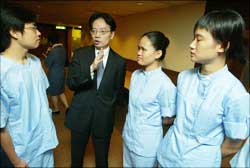 Tuen Mun
Hospital will be used as a teaching hospital in a Hospital Authority deal
expected to turn out at least 120 nurses a year. Officials hope the choice of
the regional hospital in the western New Territories can help ease the worsening
shortage of nurses in Hong Kong as well as alleviate the unemployment situation
in the area and reduce the youth crime rate. The agreement to use Tuen Mun
Hospital for nurse training was signed Thursday by the Hospital Authority and
the Hong Kong Institute of Technology. Present at the ceremony were Hong Kong
Institute of Technology president Joy Shi Mei-chun, HA Network Service director
Cheung Wai-lun and Australian professors Jarlath Ronayne, Carol Morse and Lorna
Moxham. A program to train nurses has been ongoing since 2005 in the wake of the
SARS epidemic but will now be stepped up, according to hospital officials. The
program aims to combat youth crime by attracting students to the hospitals where
they can "serve the people of Hong Kong," Shi said. Tuen Mun
Hospital will be used as a teaching hospital in a Hospital Authority deal
expected to turn out at least 120 nurses a year. Officials hope the choice of
the regional hospital in the western New Territories can help ease the worsening
shortage of nurses in Hong Kong as well as alleviate the unemployment situation
in the area and reduce the youth crime rate. The agreement to use Tuen Mun
Hospital for nurse training was signed Thursday by the Hospital Authority and
the Hong Kong Institute of Technology. Present at the ceremony were Hong Kong
Institute of Technology president Joy Shi Mei-chun, HA Network Service director
Cheung Wai-lun and Australian professors Jarlath Ronayne, Carol Morse and Lorna
Moxham. A program to train nurses has been ongoing since 2005 in the wake of the
SARS epidemic but will now be stepped up, according to hospital officials. The
program aims to combat youth crime by attracting students to the hospitals where
they can "serve the people of Hong Kong," Shi said.
The independence of Hong Kong's judiciary cannot be
compromised, the chief justice has said, dismissing fears that a speech by the
National People's Congress chairman last week suggests it is under threat. But
the top judge warned that vigilance had to be exercised to ensure that this
"pillar of Hong Kong's society" was maintained. In a rare interview, to mark the
10th anniversary of the handover, Andrew Li Kwok-nang asserted the power of the
courts to rule freely, including in sensitive cases involving the Basic Law. He
said Beijing's power to make interpretations of Hong Kong's constitution that
were binding on the courts had to be recognised, but that such interpretations
should be delivered only in "very exceptional circumstances". "The independence
of the judiciary is fully guaranteed in the Basic Law and is a pillar of Hong
Kong's society. The exercise of judicial power by the courts is not subject to
any interference by the executive, by the legislature or by anybody else," he
said. "What is spelled out is an independent judiciary ... there is no doubt
that judicial independence and its separation from the branches of government
are fully guaranteed by the Basic Law. No one has questioned this."
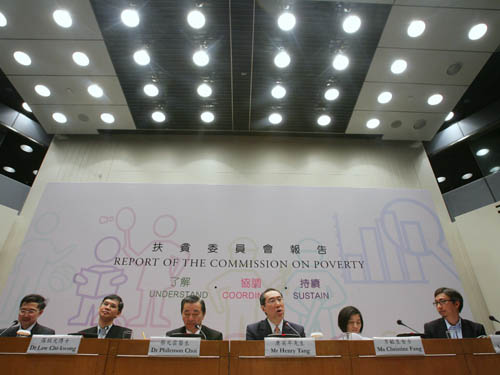 A high-level
panel set up to ease Hong Kong's worsening poverty yesterday completed its
two-year study with a call for a "one-stop shop" for job seekers and better
co-ordination on existing services. The Commission on Poverty also suggested
relaxing the asset limit for elderly people applying for welfare and setting up
a children's development fund to help needy youngsters. The current asset limit
for a single elderly applicant is HK$34,000. But the panel stopped short of
suggesting a time limit on Comprehensive Social Security Assistance (CSSA)
payments, despite fears that an indefinite subsidy would discourage recipients
from seeking work. Releasing the 127-page final report, Financial Secretary
Henry Tang Ying-yen said the commission, which he chaired, had laid a good
foundation for the next government to follow up. "This report does not mark the
end of the commission's work. It just signifies the beginning of the next stage
of work," he said in response to concerns the commission would be disbanded. He
said it would be up to the next administration, which takes office on July 1, to
decide how to carry forward the recommendations. Government figures show the
numbers of those below the age of 59 living in households with income below
average CSSA payments fell from 692,800 in 2005 to 618,600 last year. The number
of elderly poor people remained unchanged at 204,000. About 128,200 CSSA
recipients are considered able to work, or 2.6 per cent of the population aged
15 to 59. Eighty-eight per cent of the recipients have been receiving welfare
payments for more than a year. Mr Tang said members agreed there was no need to
draw a poverty line to identify who would need help. A high-level
panel set up to ease Hong Kong's worsening poverty yesterday completed its
two-year study with a call for a "one-stop shop" for job seekers and better
co-ordination on existing services. The Commission on Poverty also suggested
relaxing the asset limit for elderly people applying for welfare and setting up
a children's development fund to help needy youngsters. The current asset limit
for a single elderly applicant is HK$34,000. But the panel stopped short of
suggesting a time limit on Comprehensive Social Security Assistance (CSSA)
payments, despite fears that an indefinite subsidy would discourage recipients
from seeking work. Releasing the 127-page final report, Financial Secretary
Henry Tang Ying-yen said the commission, which he chaired, had laid a good
foundation for the next government to follow up. "This report does not mark the
end of the commission's work. It just signifies the beginning of the next stage
of work," he said in response to concerns the commission would be disbanded. He
said it would be up to the next administration, which takes office on July 1, to
decide how to carry forward the recommendations. Government figures show the
numbers of those below the age of 59 living in households with income below
average CSSA payments fell from 692,800 in 2005 to 618,600 last year. The number
of elderly poor people remained unchanged at 204,000. About 128,200 CSSA
recipients are considered able to work, or 2.6 per cent of the population aged
15 to 59. Eighty-eight per cent of the recipients have been receiving welfare
payments for more than a year. Mr Tang said members agreed there was no need to
draw a poverty line to identify who would need help.
 China: Chinese
travelers changing the world's tourism pattern - In 2006, the number of Chinese
tourists who traveled abroad reached 34.52 million, a record high in history.
From January to March of this year, the number already reached 9.7 million,
14.5% higher than in the same period last year. Wu Wenxue, vice chairman of the
China Tourism Association, said at a forum on tourism in Beijing, that China has
become the fastest growing source of tourists in Asia. The fast growth of
Chinese travelers going abroad has gained much attention from many destination
countries throughout the world. Chinese tourists traveling abroad are changing
the tourism pattern in the Asia-Pacific region, as well as the pattern
throughout the world. The history of Chinese tourists traveling abroad is quite
short. A decade or so before, people only traveled to Hong Kong and Macau to see
their relatives. In 1992, only 2.93 million Chinese travelers went abroad, and
most of them were part of government delegations. Civilians began traveling
abroad just ten years ago and the rate of travel has been growing rapidly.
Whenever golden weeks between May 1st and 7th and October 1st and 7th occur,
there have been more people who want to travel abroad, according to a manager in
the China International Tourism Agency.
China: Chinese
travelers changing the world's tourism pattern - In 2006, the number of Chinese
tourists who traveled abroad reached 34.52 million, a record high in history.
From January to March of this year, the number already reached 9.7 million,
14.5% higher than in the same period last year. Wu Wenxue, vice chairman of the
China Tourism Association, said at a forum on tourism in Beijing, that China has
become the fastest growing source of tourists in Asia. The fast growth of
Chinese travelers going abroad has gained much attention from many destination
countries throughout the world. Chinese tourists traveling abroad are changing
the tourism pattern in the Asia-Pacific region, as well as the pattern
throughout the world. The history of Chinese tourists traveling abroad is quite
short. A decade or so before, people only traveled to Hong Kong and Macau to see
their relatives. In 1992, only 2.93 million Chinese travelers went abroad, and
most of them were part of government delegations. Civilians began traveling
abroad just ten years ago and the rate of travel has been growing rapidly.
Whenever golden weeks between May 1st and 7th and October 1st and 7th occur,
there have been more people who want to travel abroad, according to a manager in
the China International Tourism Agency.
 The
photo taken on June 14, 2007 shows the National Stadium in Beijing. The
bowl-shaped stands of the National Stadium, dubbed the "Bird's Nest" have been
completed recently after an eight-month installation process. The stands are
composed of a total of 14,700 slabs in different size and form, with the biggest
piece weighing 18 tons and being 11-meter long. The
photo taken on June 14, 2007 shows the National Stadium in Beijing. The
bowl-shaped stands of the National Stadium, dubbed the "Bird's Nest" have been
completed recently after an eight-month installation process. The stands are
composed of a total of 14,700 slabs in different size and form, with the biggest
piece weighing 18 tons and being 11-meter long.
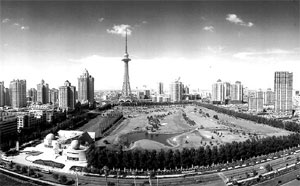 Harbin, the host city of
the 18th Harbin Fair, is an attractive investment destination in Heilongjiang
Province.Expanded exhibition scale, cooperation with neighboring countries,
revitalization of traditional industrial bases in Northeast China and other
economic and cultural activities will be the highlights of this year's 18th
China Harbin Fair for Trade and Economic Cooperation (Harbin Fair). Harbin, the host city of
the 18th Harbin Fair, is an attractive investment destination in Heilongjiang
Province.Expanded exhibition scale, cooperation with neighboring countries,
revitalization of traditional industrial bases in Northeast China and other
economic and cultural activities will be the highlights of this year's 18th
China Harbin Fair for Trade and Economic Cooperation (Harbin Fair).
China's biggest shipping firm, Cosco Holdings, is hoping
to raise at least 13.5 billion yuan (1.78 billion U.S. dollars) when it launches
1.78 billion yuan-denominated shares on the Shanghai Stock Exchange this month.
A statement from the company said it was offering the shares at an indicative
price of 7.60 to 8.48 yuan each, cheaper than its Thursday closing price on the
Hong Kong Exchange of 9.64 Hong Kong dollars. It is a rare example of a Chinese
company returning to the mainland market, said securities brokers, who
anticipated that the price would rise to 15 yuan by June 19. The company would
use the capital raised to buy 51 percent of Cosco Logistics Co. and 12 new
container ships, according to its listing prospectus. The funds will also be
used to build new quays and for other logistics projects, it said. The company
said 30 percent of the offering will be made available to strategic investors,
25 percent to institutional investors and the rest to retail investors. Online
purchases of the shares will begin on June 18, said the statement. The company
is scheduled to make its trading debut on the Shanghai Stock Exchange on June
26, said a U.S.-based news agency. However, a woman who works with lead
underwriter China International Capital Corp. said that the trading date has not
been fixed and the State Securities Regulatory Commission will issue a statement
later to inform investors of the date. On June 4, China's securities regulatory
body approved COSCO's IPO in Shanghai and said the company's entire capital
stocks should not exceed 8.9 billion shares.
 A section of the Jiujiang Bridge over the Xijiang
River in Guangdong Province is seen collapsed after being hit by a boat laden
with sand on June 15, 2007. The boat hit a pier of the bridge connecting Foshan
to the neighbor city of Heshan, and at least 150 meters of the 1,600-metre
bridge structure collapsed. The number of casualties were still unknown.
A section of the Jiujiang Bridge over the Xijiang
River in Guangdong Province is seen collapsed after being hit by a boat laden
with sand on June 15, 2007. The boat hit a pier of the bridge connecting Foshan
to the neighbor city of Heshan, and at least 150 meters of the 1,600-metre
bridge structure collapsed. The number of casualties were still unknown.
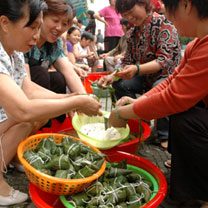 Residents wrap Zongzi (Chinese rice
dumplings), a traditional Chinese food made of glutinous rice stuffed with
different fillings and wrapped in bamboo leaves, in Taizhou, East China's
Jiangsu Province June 15, 2007. Residents wrap Zongzi (Chinese rice
dumplings), a traditional Chinese food made of glutinous rice stuffed with
different fillings and wrapped in bamboo leaves, in Taizhou, East China's
Jiangsu Province June 15, 2007.
Beijing
has criticized the United States for a "Cold War" mentality after US President
George W Bush attended the opening of a memorial for those killed in communist
regimes.
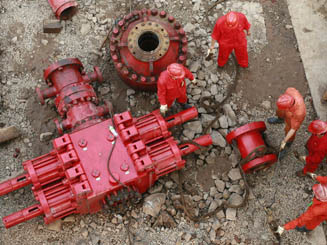 The mainland's industrial output rebounded last month,
growing 18.1 per cent year on year and strengthening the case for further
macroeconomic tightening measures amid speculation that another interest rate
increase is imminent. Last month's growth rate exceeded the 17.4 per cent in
April and surprised economists. Most had forecast a slowdown after an 18.5 per
cent peak in January and February. The output figures were released just a day
after the State Council issued a report warning of the need for further
tightening measures. Industrial output rose 18.1 per cent year on year in the
first five months of the year, up from 16.6 per cent growth for all of last
year, the National Bureau of Statistics said on its website yesterday. Booming
exports were a key factor in the rapid growth of industrial output. Xinhua said
the mainland exported 6.17 million tonnes of rolled steel last month, a decline
of 13.8 per cent from the 7.16 million tonnes in April, but representing
year-on-year growth of 76.8 per cent. Net imports of crude oil jumped 11.5 per
cent, to 65.83 million tonnes, in the first five months of this year, largely a
result of accelerating industrial production. A State Council report on
Wednesday warned of risks facing the economy, indicating the government was
considering measures to prevent it from overheating. The cabinet meeting,
chaired by Premier Wen Jiabao , highlighted the "overly fast" growth of
industrial production and the need to prevent a rebound in investment growth.
Timothy Condon, chief economist with ING's Singapore-based Asia unit, said the
latest data showed the economy was booming. "Premier Wen said recently that
monetary policy needs tightening, which we believe indicates an imminent
interest rate hike," Mr Condon said. He expected a 27 basis-point rate increase
in the third quarter. Hong Liang, chief China economist with Goldman Sachs, said
she believed industrial production growth would remain robust in the near
future. "Strong activity growth and rising inflationary pressures highlight the
need for further policy adjustments."
The mainland's industrial output rebounded last month,
growing 18.1 per cent year on year and strengthening the case for further
macroeconomic tightening measures amid speculation that another interest rate
increase is imminent. Last month's growth rate exceeded the 17.4 per cent in
April and surprised economists. Most had forecast a slowdown after an 18.5 per
cent peak in January and February. The output figures were released just a day
after the State Council issued a report warning of the need for further
tightening measures. Industrial output rose 18.1 per cent year on year in the
first five months of the year, up from 16.6 per cent growth for all of last
year, the National Bureau of Statistics said on its website yesterday. Booming
exports were a key factor in the rapid growth of industrial output. Xinhua said
the mainland exported 6.17 million tonnes of rolled steel last month, a decline
of 13.8 per cent from the 7.16 million tonnes in April, but representing
year-on-year growth of 76.8 per cent. Net imports of crude oil jumped 11.5 per
cent, to 65.83 million tonnes, in the first five months of this year, largely a
result of accelerating industrial production. A State Council report on
Wednesday warned of risks facing the economy, indicating the government was
considering measures to prevent it from overheating. The cabinet meeting,
chaired by Premier Wen Jiabao , highlighted the "overly fast" growth of
industrial production and the need to prevent a rebound in investment growth.
Timothy Condon, chief economist with ING's Singapore-based Asia unit, said the
latest data showed the economy was booming. "Premier Wen said recently that
monetary policy needs tightening, which we believe indicates an imminent
interest rate hike," Mr Condon said. He expected a 27 basis-point rate increase
in the third quarter. Hong Liang, chief China economist with Goldman Sachs, said
she believed industrial production growth would remain robust in the near
future. "Strong activity growth and rising inflationary pressures highlight the
need for further policy adjustments."
Shanghai Media Group aims to more than triple its internet
protocol television subscribers by the end of the year to more than 1.6 million,
a move that will also benefit network partners China Telecom (SEHK: 0728) and
China Netcom, according to industry sources. The group had 400,000 to 500,000
internet protocol television users in the first four months of this year with
operations in Shanghai, Guangzhou and the northeastern part of the country, such
as Heilongjiang province. Shanghai is the single-largest market with more than
200,000 users while in the northeast the number exceeds 150,000. "Shanghai Media
will expand the coverage of its IPTV service this year to more than 20 cities,
which will make China the largest IPTV market by the end of this year,
surpassing Hong Kong," the source said. PCCW (SEHK: 0008), which runs Now TV in
Hong Kong, has claimed it is the world largest IPTV operator with more than
808,000 subscribers. Growth in IPTV business as a new revenue stream is
especially important for China Telecom and China Netcom (SEHK: 0906), which
lease infrastructure networks for Shanghai Media's services as their fixed-line
phone users have been switching to mobile phones. The telecommunications firms
have to rely on Shanghai Media because they still have not secured a licence
from the State Administration of Radio, File and Television, the media industry
regulator. Shanghai Media expected to expand into coastal regions in the
southeastern, northeastern and central parts of the mainland including Quanzhou
in Fujian province, Chongqing and the Xinjiang Uygur autonomous region.
"Shanghai Media has reported to the regulator on the proposed IPTV service
expansion," said the source. Shanghai Media Group could not be reached for
comment yesterday. The group is hoping that as another licence holder, China
Central Television, was busy preparing for the Beijing Olympic Games, it could
establish a stronghold in those untapped regions, another source said.
June 16 - 17, 2007
 Hong Kong:
Shoemaker Stella
International and networking equipment manufacturer Delta Networks will raise a
combined US$650 million (HK$5.07 billion), following approval for a public
float, market sources said. Hong Kong:
Shoemaker Stella
International and networking equipment manufacturer Delta Networks will raise a
combined US$650 million (HK$5.07 billion), following approval for a public
float, market sources said.
Three technology companies
operating in the mainland plan to raise a combined HK$1.6 billion from initial
public offerings in Hong Kong by the middle of next month. Centron Telecom
International Holdings, a mainland wireless telecommunications network firm,
plans to raise as much as HK$844.9 million later this month. The company and
shareholders will sell 238 million shares and are marketing the deal at between
HK$2.96 and HK$3.55 a share. That represents 10 to 12 times the forecast
earnings for this year. The new shares, which account for 75 per cent of the
float, represent 34 per cent of the company's enlarged share capital. Its
existing shareholders, including Cathay Mobile, Magicgrand Worldwide and
Gainable Enterprise, will offer 25 per cent of the total shares in the deal,
which is being arranged by JP Morgan. Revenue at Fujian-based Centron will
increase 35 per cent to 1.05 billion yuan next year, according to a JP Morgan
report. Regent Manner International, a Taiwanese assembler of printed circuit
boards, plans to raise between HK$377.5 million and HK$470 million from an
initial public offering later this month. The company, the mainland unit of
Taiwan Surface Mounting Technology, would sell 250 million new shares at HK$1.51
to HK$1.88 per share, a market source said. "Two venture funds, Value Partners
and Citic Capital, will subscribe to 2.5 per cent stakes each in the company
while TSMT will keep 75 per cent," said Patrick Chen, the executive director and
chief financial officer. Regent is seeking an initial public offering in Hong
Kong as the Taiwan government restricts mainland investment in any local firm to
40 per cent of its asset value. The company, which has 76 production lines in
the mainland, plans to spend about US$240 million to add 55 more lines by next
year. Regent's profit increased 160 per cent to US$24 million last year as sales
rose 40 per cent to US$300 million. Meanwhile, China Automation Group, a
Beijing-based company, plans to raise about HK$200 million through a Hong Kong
initial public offering next month. The company provides safety and critical
control systems to chemical and railway companies. The deal will be arranged by
First Shanghai Group.
Macao is expecting a new casino
business boom as Las Vegas Sands Corp. announced Thursday to open a new
mega-casino complex in the city's Cotai island on Aug. 28. The international
gaming giant said in a statement that the Venetian Macao project will be the
second largest casino building in the world and the largest in Asia. "This is
truly a defining moment for Las Vegas Sands Corp. as our work to open Macao's
first multi-use integrated resort comes to fruition and our vision of creating
Asia's Las Vegas comes one step closer to reality," the statement quoted Sheldon
G. Adelson, chairman and chief executive officer of the company, as saying. The
new gaming complex will feature 3,000 all-suite rooms, 1.2 million square feet
of meeting, convention and exhibition space, an 1,800-seat theater, a
15,000-seat arena and a 350-stall shopping space, according to the statement.
The statement said the launch of the mega-complex will mark the opening of the
first gaming project on the Cotai Strip, adding that upon completion, the strip
will feature 20,000 hotel rooms, over 3 million square feet of retail space, and
over 2.5 million square feet of meeting and convention facilities. The entire
Cotai Strip development is reportedly budgeted to cost 11 billion U.S. dollars.
Las Vegas Sands Corp. will build and own each of the properties on the strip
that will, however, be operated by other companies including Four Seasons,
Sheraton, St. Regis, Shangri-La, Traders, Hilton, Conrad, Fairmont, Raffles,
Swiss Hotel, Inter-continental, Holiday Inn and Cosmopolitan, according to the
statement. The strip will also be home to six Las Vegas-style showrooms and a
large arena for a sports and entertainment events, offering a total of 20,000
seats for live entertainment, it said. Las Vegas Sands Corp., the world largest
gambling company by market value, was the first U.S. casino owner to enter Macao
with the Sands Macao project in 2004, ending the 40-year gaming monopoly of the
local casino magnate Stanley Ho Hung Sun. The company is also investing 2
billion U.S. dollars in hotels and condominiums in the neighboring mainland city
of Zhuhai. Shares of Las Vegas Sands Corp. recently rose two cents to 78. 40
U.S. dollars in New York Stock Exchange composite trading.
 A student passes a billboard of Hong Kong in Hong
Kong June 12, 2007. The mainland is poised to expand its free trade pact with
Hong Kong in a bid to link the two economies more closely. The mainland is
poised to expand its free trade pact with Hong Kong in a bid to link the two
economies more closely. The fourth supplement to the Closer Economic Partnership
Agreement, or CEPA, will be released by the end of this month to mark the 10th
anniversary of Hong Kong's return to the motherland, Ministry of Commerce
spokesman Yao Shenhong said at a press conference yesterday. The new
supplementary agreement will mainly cover service industries, such as the
finance sector, Yao said, without elaborating. He said the two sides are now
finalizing the text. The mainland signed the first CEPA agreements with Hong
Kong in 2003. Three supplements have been added to the basic agreement since
then. Under CEPA, products originating from Hong Kong do not face tariffs when
they enter the mainland, and Hong Kong-based companies are granted greater
access to mainland markets. "The agreements will play a part in boosting the
economic and trade exchanges between the mainland and Hong Kong as well as
promote economic growth in Hong Kong," Yao said. According to a study released
by the government of the Hong Kong Special Administrative Region, the CEPA has
boosted Hong Kong's economy by increasing trade, creating jobs, attracting
investment and unleashing tourism. By the end of last month, more than 23,000
certificates of origin had been issued, involving HK$8.3 billion ($1.06 billion)
worth of exports. CEPA also helped create 36,000 new jobs in Hong Kong from 2004
to 2006, and the government forecasts another 3,600 jobs will be created this
year. Of the 2,600 enterprises taking part in the government study, 89 percent
said the CEPA has benefited the economy, and 77 percent said the preferential
trade arrangement was beneficial to the manufacturing sector. CEPA brought
HK$305 million worth of investment to the manufacturing industry in 2005 and
2006, and further HK$239 million is expected for this year. The agreement
allowed for the injection of HK$4.8 billion worth of investment into the
services sector last year, representing a rise of 380 percent over 2004. The
number for this year is expected to be HK$2.4 billion.
A student passes a billboard of Hong Kong in Hong
Kong June 12, 2007. The mainland is poised to expand its free trade pact with
Hong Kong in a bid to link the two economies more closely. The mainland is
poised to expand its free trade pact with Hong Kong in a bid to link the two
economies more closely. The fourth supplement to the Closer Economic Partnership
Agreement, or CEPA, will be released by the end of this month to mark the 10th
anniversary of Hong Kong's return to the motherland, Ministry of Commerce
spokesman Yao Shenhong said at a press conference yesterday. The new
supplementary agreement will mainly cover service industries, such as the
finance sector, Yao said, without elaborating. He said the two sides are now
finalizing the text. The mainland signed the first CEPA agreements with Hong
Kong in 2003. Three supplements have been added to the basic agreement since
then. Under CEPA, products originating from Hong Kong do not face tariffs when
they enter the mainland, and Hong Kong-based companies are granted greater
access to mainland markets. "The agreements will play a part in boosting the
economic and trade exchanges between the mainland and Hong Kong as well as
promote economic growth in Hong Kong," Yao said. According to a study released
by the government of the Hong Kong Special Administrative Region, the CEPA has
boosted Hong Kong's economy by increasing trade, creating jobs, attracting
investment and unleashing tourism. By the end of last month, more than 23,000
certificates of origin had been issued, involving HK$8.3 billion ($1.06 billion)
worth of exports. CEPA also helped create 36,000 new jobs in Hong Kong from 2004
to 2006, and the government forecasts another 3,600 jobs will be created this
year. Of the 2,600 enterprises taking part in the government study, 89 percent
said the CEPA has benefited the economy, and 77 percent said the preferential
trade arrangement was beneficial to the manufacturing sector. CEPA brought
HK$305 million worth of investment to the manufacturing industry in 2005 and
2006, and further HK$239 million is expected for this year. The agreement
allowed for the injection of HK$4.8 billion worth of investment into the
services sector last year, representing a rise of 380 percent over 2004. The
number for this year is expected to be HK$2.4 billion.
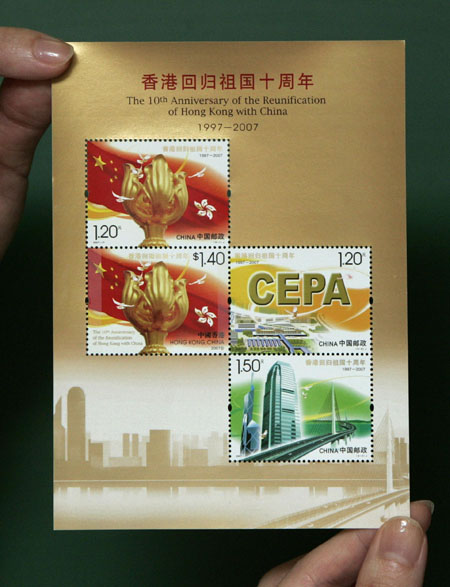 An employee holds new stamps jointly issued by China Post
and Hongkong Post during a news conference in Hong Kong June 11, 2007. The
mainland is poised to expand its free trade pact with Hong Kong in a bid to link
the two economies more closely.
An employee holds new stamps jointly issued by China Post
and Hongkong Post during a news conference in Hong Kong June 11, 2007. The
mainland is poised to expand its free trade pact with Hong Kong in a bid to link
the two economies more closely.
The government proposes to
drastically amend the Domestic Violence Ordinance which, for the first time,
will give minors the right to protect themselves from abuse and allow a court to
direct an abuser to receive anti-violence treatment, a source said Wednesday.
Skyrail-ITM has ruled out
"operational problems" as the cause of the crash of a gondola at the Ngong Ping
360 attraction on Lantau Monday, and insisted that the ropeway tests carried out
on the cable car system just before the accident were in accordance with the
instructions of the Austria-based manufacturer.
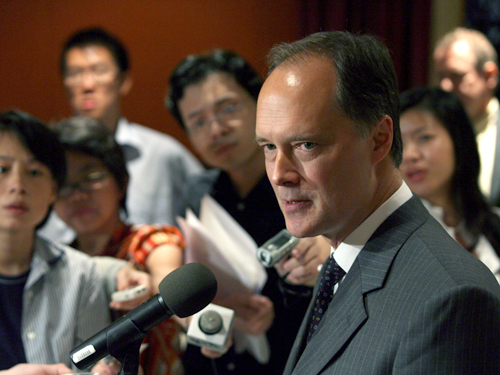 Intervention by Beijing in Hong Kong affairs, such as interpretations of the
Basic Law, could undermine local and international confidence in the city's
autonomy and competitiveness, the United States' consul-general said yesterday.
At a lunch organised by the Better Hong Kong Foundation, James Cunningham said
such interventions, while infrequent, were troubling precedents and could
undermine the high degree of autonomy promised in Hong Kong's Basic Law and the
1984 Sino-British Joint Declaration. He said it was not up to his government to
specify a timetable for universal suffrage but said the US administration had
"felt for a long time that Hong Kong is ready, not just for political reform but
for universal suffrage", and that the sooner it was implemented the better. Mr
Cunningham's remarks come a week after Wu Bangguo , the chairman of the National
People's Congress, told a Basic Law conference in Beijing that "the provisions
for the high degree of autonomy for the HKSAR are mandated by the central
government ...The HKSAR only has as much power as is authorised by the central
government". In what appeared to be a stern reminder of Beijing's authority on
political reform issues, Mr Wu said it would not be appropriate to copy the US
system of separation of powers between the executive, legislature and judiciary,
or the British parliamentary system, directly to Hong Kong. Public figures from
the pan-democratic camp feared Mr Wu's words suggested that freedoms granted
could be withdrawn, and that Hong Kong did not practise the concept of
separation of powers. Mr Cunningham did not comment on specifics of the speech,
but said points raised, and the reaction it generated, interested him. "I think
the speech itself and the reaction to it in Hong Kong and other places is
interesting and shows there's a good discussion to be had over some of the
points raised. I think it's better if people in Hong Kong discuss themselves the
implications and the meaning of the speech than if I do," he said. Mr Cunningham
noted that Executive Council convenor Leung Chun-ying begins a trip to the US on
Sunday with a Better Hong Kong Foundation delegation. "Mr Leung has said [he
could] provide some explanation or amplification to those remarks. So I think
it's better the discussion takes place in that context," he said. The Standing
Committee of the National People's Congress has interpreted the Basic Law three
times since the handover - over the right of abode, political reform and the
length of the chief executive's term. In 2004, anticipating Beijing's
interpretation of the scope for political reform, Mr Cunningham's predecessor,
James Keith expressed grave concern. "We believe that an open society with the
highest possible degree of autonomy and governed by the rule of law is essential
to maintaining stability and prosperity in Hong Kong," Mr Keith said. Mr
Cunningham expressed optimism for Hong Kong's future, but reiterated that
"political reform is an important and necessary component in maintaining
competitiveness in the future".
Intervention by Beijing in Hong Kong affairs, such as interpretations of the
Basic Law, could undermine local and international confidence in the city's
autonomy and competitiveness, the United States' consul-general said yesterday.
At a lunch organised by the Better Hong Kong Foundation, James Cunningham said
such interventions, while infrequent, were troubling precedents and could
undermine the high degree of autonomy promised in Hong Kong's Basic Law and the
1984 Sino-British Joint Declaration. He said it was not up to his government to
specify a timetable for universal suffrage but said the US administration had
"felt for a long time that Hong Kong is ready, not just for political reform but
for universal suffrage", and that the sooner it was implemented the better. Mr
Cunningham's remarks come a week after Wu Bangguo , the chairman of the National
People's Congress, told a Basic Law conference in Beijing that "the provisions
for the high degree of autonomy for the HKSAR are mandated by the central
government ...The HKSAR only has as much power as is authorised by the central
government". In what appeared to be a stern reminder of Beijing's authority on
political reform issues, Mr Wu said it would not be appropriate to copy the US
system of separation of powers between the executive, legislature and judiciary,
or the British parliamentary system, directly to Hong Kong. Public figures from
the pan-democratic camp feared Mr Wu's words suggested that freedoms granted
could be withdrawn, and that Hong Kong did not practise the concept of
separation of powers. Mr Cunningham did not comment on specifics of the speech,
but said points raised, and the reaction it generated, interested him. "I think
the speech itself and the reaction to it in Hong Kong and other places is
interesting and shows there's a good discussion to be had over some of the
points raised. I think it's better if people in Hong Kong discuss themselves the
implications and the meaning of the speech than if I do," he said. Mr Cunningham
noted that Executive Council convenor Leung Chun-ying begins a trip to the US on
Sunday with a Better Hong Kong Foundation delegation. "Mr Leung has said [he
could] provide some explanation or amplification to those remarks. So I think
it's better the discussion takes place in that context," he said. The Standing
Committee of the National People's Congress has interpreted the Basic Law three
times since the handover - over the right of abode, political reform and the
length of the chief executive's term. In 2004, anticipating Beijing's
interpretation of the scope for political reform, Mr Cunningham's predecessor,
James Keith expressed grave concern. "We believe that an open society with the
highest possible degree of autonomy and governed by the rule of law is essential
to maintaining stability and prosperity in Hong Kong," Mr Keith said. Mr
Cunningham expressed optimism for Hong Kong's future, but reiterated that
"political reform is an important and necessary component in maintaining
competitiveness in the future".
 Ocean Park
expects new pandas to lift summer crowd numbers - As the countdown continues to
the July 1 public debut of the city's new bamboo-munching darlings, Le Le and
Ying Ying, Ocean Park says it is confident the two giant panda cubs will boost
attendances. The two adorable pandas are a gift from the central government to
celebrate the 10th anniversary of the handover. The park's chairman, Allan Zeman,
said he expects summer attendance to surge past last year's million mark,
particularly with the arrival of the panda cubs. The pandas, considered national
treasures, would foster closer ties between the Hong Kong and the mainland, he
said. "They symbolise the gesture from the mainland. It is a gift from the heart
and draws the relationship closer." The pandas, which arrived in the city at the
end of April, are acclimatising to the new surroundings and are growing
healthily. Both have gained weight, with Le Le weighing in at 74kg and Ying Ying
hitting 70kg. The cubs will spend the next 18 months in the refurbished Giant
Panda Habitat before they are relocated to the "Astounding Asia" animal kingdom,
which will open by the end of next year. The park is to launch a "Panda Channel"
on Now Broadband TV. Fans of the city's four pandas - until now An An, a
20-year-old male, and Jia Jia, a 28-year-old female have been the stars at the
park's Giant Panda Habitat - will be able to monitor their activities on
television, the internet and on mobile phones. The park will also put on sale
more than 300 types of panda souvenirs after the launch. Ocean Park
expects new pandas to lift summer crowd numbers - As the countdown continues to
the July 1 public debut of the city's new bamboo-munching darlings, Le Le and
Ying Ying, Ocean Park says it is confident the two giant panda cubs will boost
attendances. The two adorable pandas are a gift from the central government to
celebrate the 10th anniversary of the handover. The park's chairman, Allan Zeman,
said he expects summer attendance to surge past last year's million mark,
particularly with the arrival of the panda cubs. The pandas, considered national
treasures, would foster closer ties between the Hong Kong and the mainland, he
said. "They symbolise the gesture from the mainland. It is a gift from the heart
and draws the relationship closer." The pandas, which arrived in the city at the
end of April, are acclimatising to the new surroundings and are growing
healthily. Both have gained weight, with Le Le weighing in at 74kg and Ying Ying
hitting 70kg. The cubs will spend the next 18 months in the refurbished Giant
Panda Habitat before they are relocated to the "Astounding Asia" animal kingdom,
which will open by the end of next year. The park is to launch a "Panda Channel"
on Now Broadband TV. Fans of the city's four pandas - until now An An, a
20-year-old male, and Jia Jia, a 28-year-old female have been the stars at the
park's Giant Panda Habitat - will be able to monitor their activities on
television, the internet and on mobile phones. The park will also put on sale
more than 300 types of panda souvenirs after the launch.
 China: Chinese
Commerce Minister Bo Xilai and EU Trade Commissioner Peter Mandelson reached
consensus on a number of issues, including textiles, during Tuesday's annual
China-EU trade talks.
China: Chinese
Commerce Minister Bo Xilai and EU Trade Commissioner Peter Mandelson reached
consensus on a number of issues, including textiles, during Tuesday's annual
China-EU trade talks.
 The skeletal
remains of a gigantic, surprisingly bird-like dinosaur, which has been classed
as a new species and genus, is the largest of its kind known to the world. Eight
metres long and standing at twice the height of a man at the shoulder, the
fossil of the feathered but flightless Gigantoraptor erlianensis was found in
the Erlian basin in Inner Mongolia, researchers wrote in the latest issue of
Nature. The skeletal
remains of a gigantic, surprisingly bird-like dinosaur, which has been classed
as a new species and genus, is the largest of its kind known to the world. Eight
metres long and standing at twice the height of a man at the shoulder, the
fossil of the feathered but flightless Gigantoraptor erlianensis was found in
the Erlian basin in Inner Mongolia, researchers wrote in the latest issue of
Nature.
A deputy director of the Federal Bureau of Investigation
(FBI) of the United States on Wednesday hailed its cooperation with China on
terrorism. "I am satisfied with the level of cooperation on terrorism with
China," Thomas Fuentes, assistant director of the FBI, told a briefing on
Wednesday. He said the FBI is working with Chinese public security officials to
track the role of "East Turkistan" groups in China's northwest in terrorist
activities and their possible links with al Qaeda. The hour-long briefing took
place in U.S. Embassy in Beijing and came one day ahead of the sixth meeting of
Joint Liaison Group between China and the United States on law enforcement
cooperation. Fuentes said the two-day meeting will address law-enforcement
issues concerning the fight against corruption, cyber crime, fugitive matters,
human smuggling, intellectual property, mutual legal assistance and
repatriation.
China's Ministry of Commerce listed a number of measures
to ensure control over direct investment of foreign fund in the real estate
sector, as the country strives to avoid international speculative money to
create bubbles in the sector.
The construction of a new high-speed railway connecting
Guangzhou, the largest city in south China, and Nanning, capital of Guangxi
Zhuang Autonomous Region, will start within the year. The railway, with a length
of 560 km, will require an investment of 29.5 billion yuan which will be shared
by the Chinese Ministry of Railways, Guangdong Province and Guangxi, said an
official from Guangxi autonomous regional commission of development and reform.
The Guangzhou-Nanning railway will have two electrified routes capable of
accommodating passenger trains running at speeds of up to 250 km per hour,
according to the official. "The line will help cut the travel time from Nanning
to Guangzhou from the present 12 and a half hours to three hours and a half,"
said the official, who added that the railway would form a high-speed transport
link connecting southeast China coast to members of the Association of Southeast
Asian Nations (ASEAN). China launched new high-speed rail services on April 18
linking Beijing to Harbin, Beijing to Shanghai and Beijing to Guangzhou.
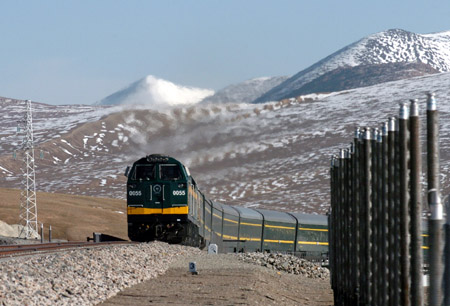 A train travels along the
Qinghai-Tibet Railway in Golmud, Northwest China's Qinghai Province, June 13,
2007. The landscape, lakes and the frozen earth on the Tibetan Plateau have
been well preserved and the wildlife's migration remained unchanged since the
world's highest railway was put to use, the State Environmental Protection
Administration says in a survey report.
A train travels along the
Qinghai-Tibet Railway in Golmud, Northwest China's Qinghai Province, June 13,
2007. The landscape, lakes and the frozen earth on the Tibetan Plateau have
been well preserved and the wildlife's migration remained unchanged since the
world's highest railway was put to use, the State Environmental Protection
Administration says in a survey report.
Iraqi President Jalal Talabani will
visit China later this month for meetings with top officials, the Foreign
Ministry announced Thursday.
In the wake
of accelerating inflation and renewed frenzy in the share market, the State
Council said Wednesday the government will introduce further policy initiatives
to mop up excess liquidity, signaling imminent tightening measures to temper
economic growth and hold consumer prices in check.
Mainland
retail sales last month grew at the fastest pace in three years as increasing
incomes, and the wealth effect from stock market investment, allowed households
to spend more.
June 15, 2007
 Hong Kong:
Hong Kong's international investment position remained strong and sound last
year, with net external financial assets amounting to HK$4.2 trillion (US$538
billion), the Census and Statistics Department of the government of Hong Kong
Special Administrative Region said on Monday. The net external financial assets
of 2006 accounted for 282 percent of gross domestic product, significantly
higher than that of 159 percent in 2001, according to the international
investment position statistics issued Monday. The city's external financial
assets amounted to 15.3 trillion HK dollars last year, with direct investment as
the largest component, accounting for 34.9 percent. This was followed by
portfolio investment, accounting for 30.1 percent. Comparing 2006 with 2005,
total external financial assets rose 32.3 percent, while direct investment grew
46.6 percent and portfolio investment 36.3 percent. Last year saw Hong Kong's
external financial liabilities at 11.2 trillion HK dollars, with 53.5 percent in
the form of direct investment. Compared with 2005, total external financial
liabilities surged 36.7 percent. Direct investment went up 47.4 percent while
portfolio investment rose 47.6 percent. The ratios of both Hong Kong's external
financial assets and liabilities last year to gross domestic product remained
substantial, at 1,040 percent and 759 percent. This shows Hong Kong is a highly
externally-oriented economy with considerable cross-territory investment and
also a major financial center in the region with considerable cross-territory
fund positions. Hong Kong:
Hong Kong's international investment position remained strong and sound last
year, with net external financial assets amounting to HK$4.2 trillion (US$538
billion), the Census and Statistics Department of the government of Hong Kong
Special Administrative Region said on Monday. The net external financial assets
of 2006 accounted for 282 percent of gross domestic product, significantly
higher than that of 159 percent in 2001, according to the international
investment position statistics issued Monday. The city's external financial
assets amounted to 15.3 trillion HK dollars last year, with direct investment as
the largest component, accounting for 34.9 percent. This was followed by
portfolio investment, accounting for 30.1 percent. Comparing 2006 with 2005,
total external financial assets rose 32.3 percent, while direct investment grew
46.6 percent and portfolio investment 36.3 percent. Last year saw Hong Kong's
external financial liabilities at 11.2 trillion HK dollars, with 53.5 percent in
the form of direct investment. Compared with 2005, total external financial
liabilities surged 36.7 percent. Direct investment went up 47.4 percent while
portfolio investment rose 47.6 percent. The ratios of both Hong Kong's external
financial assets and liabilities last year to gross domestic product remained
substantial, at 1,040 percent and 759 percent. This shows Hong Kong is a highly
externally-oriented economy with considerable cross-territory investment and
also a major financial center in the region with considerable cross-territory
fund positions.
 Ocean Park Chairman Allan Zeman, dressed in a
panda costume, announces activities to celebrate the 10th anniversary of Hong
Kong's handover on July 1, during a news conference in Hong Kong June 13, 2007.
Two giant pandas given by the Chinese mainland to Hong Kong in April, christened
Le Le and Ying Ying, are staying in Hong Kong's Ocean Park and will be shown to
the public a few weeks later.
Ocean Park Chairman Allan Zeman, dressed in a
panda costume, announces activities to celebrate the 10th anniversary of Hong
Kong's handover on July 1, during a news conference in Hong Kong June 13, 2007.
Two giant pandas given by the Chinese mainland to Hong Kong in April, christened
Le Le and Ying Ying, are staying in Hong Kong's Ocean Park and will be shown to
the public a few weeks later.
More
extensive cooperation in the service sector should be established between
Shanghai and Hong Kong, government officials, academics and business leaders
from the two cities said on Friday in Shanghai. Further and deeper cooperation
is good for both Hong Kong, whose flourishing service sector is hampered by
space constraints, and Shanghai, which is keen to focus its development on the
sector, Wang Ronghua, vice-chairman of Shanghai People's Political Consultative
Conference, said. He was speaking at a forum on the opportunities for
cooperation between the two cities. Wang said the two cities complemented each
other in many ways and have great potential for working together. "Hong Kong has
a long history of developing its service industry and has accumulated abundant
experience and talent in the field," Wang said. "Shanghai is building itself
into an international hub for finance and shipping, and is also working on the
economic integration of the Yangtze River Delta. "Shanghai has a lot to learn
from Hong Kong and at the same time can provide plenty of opportunities and
serve as a platform for Hong Kong to expand its business in other mainland
cities," he said. Leung Chun-ying, a member of the Executive Council of Hong
Kong Special Administrative Region, said there was also competition between the
two cities and that has to be faced. "We have to find an effective way to avoid
unhealthy competition and increase cooperation," he said. Cai Laixing, chairman
of Shanghai Industrial Investment (Holdings) Co Ltd, said that cooperation was
the only way to help both cities bloom. Wang said: "We should encourage more
service businesses from Hong Kong to set up in Shanghai as well as more
state-owned or private enterprises in Shanghai to list in Hong Kong and expand
their business abroad in that way." Wang said that cooperation on exhibitions,
international merchandising and finance would be particularly encouraged.
 China: The
Bush administration on Wednesday refused to cite China as a country that
manipulates its currency to gain unfair trade advantages.
China: The
Bush administration on Wednesday refused to cite China as a country that
manipulates its currency to gain unfair trade advantages.
China IT needs to develop as brand
for global firms to reach it - The Indian software industry knows little about
the Chinese IT and does not compete with the latter, Indian software giant
Wipro's Chief Marketing Officer Jessie Paul told Xinhua in an interview on
Wednesday. China, according to Paul, needs to portray itself as a brand in the
software sector, like India for global firms to start reaching out to China for
IT business. "Brand is harder to build. India has taken 25 years to build the
brand," Paul said. "China is working harder at it than it was 10 years ago and
the (Chinese) government is providing all the support which is good," Paul said.
However, Paul added that China was excellent in manufacturing, an area India is
not so good at. Speaking of software, Paul said the clients the Chinese firms
target may be different from those of Indian firms. Indian firms get over 95
percent of business from global market. Communication, Paul said, is another
area that China can work on for Chinese software firms to go global. "Language
is something China needs to work on," Paul said. Wipro, which has now set up
offices in Shanghai and Beijing, has about 150 staff members in China but at the
same time has no Chinese clients. Its clients in China are the global firms that
have their offices there. One third of Wipro's business comes from Research and
Development (R and D) and happens to be the world's largest R and D support
provider. Indian IT exports, she said, are valued at 30 billion U.S. dollars
today. Explaining reasons for strong software industry in India, Paul said India
has a strong base in education, invests a lot in engineering and Indians have
always excelled in it. Wipro is expanding and understands that it needs to make
its clients feel at home with the Indian firm staff. While it plans to hire
staff in countries it plans expansion in, Wipro is also following a technique
called Immersion, wherein it trains its Indian staff about the culture of the
country they are expected to visit. Wipro plans expansion in Europe and the U.S.
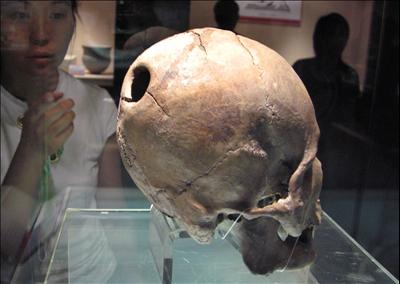 A skull, on
which a real craniotomy operation was carried 5,000 years ago, has been
displayed in Shandong Museum recently. Regarded as the earliest evidence of a
successful craniotomy practice in China, the skull was unearthed from a site of
ancient cultural relics named Fujia Dawenkou in Guangrao, a county of east
China's Shandong Province, in 1995. A skull, on
which a real craniotomy operation was carried 5,000 years ago, has been
displayed in Shandong Museum recently. Regarded as the earliest evidence of a
successful craniotomy practice in China, the skull was unearthed from a site of
ancient cultural relics named Fujia Dawenkou in Guangrao, a county of east
China's Shandong Province, in 1995.
 Customers
walk in a supermarket in Shenyang, in northeastern China's Liaoning Province
June 12, 2007. The National Bureau of Statistics on Tuesday announced that the
consumer price index (CPI) for May reached 3.4 percent. The figure well beats
the three percent target set by the People's Bank of China for this year and
triggers a new round of debates on the possibility of another interest rate
hike. Customers
walk in a supermarket in Shenyang, in northeastern China's Liaoning Province
June 12, 2007. The National Bureau of Statistics on Tuesday announced that the
consumer price index (CPI) for May reached 3.4 percent. The figure well beats
the three percent target set by the People's Bank of China for this year and
triggers a new round of debates on the possibility of another interest rate
hike.
China is taking a close interest in
the IPO about to be launched in the United States by the Blackstone Group, the
world's second largest private equity fund -- because a Chinese national
investment company is poised to take a stake. The IPO could turn out to be the
largest in the United States in the last five years. Company sources said
Wednesday that the preliminary price range for the IPO had been set between 29
and 31 U.S. dollars per share. With 20 million common units available to cover
over-allotment, the IPO will likely involve 238 million shares and raise as much
as 7.75 billion U.S. dollars. According to the prospectus the company has filed
with the U.S. Securities and Exchange Commission, 105 million shares will be
sold at a 4.5 percent discount to China's state foreign exchange investment
company SIC, which is being formed to manage a part of China's huge forex
reserves. By the end of March, China's foreign exchange reserves had jumped 37
percent on a year earlier to exceed 1.2 trillion U.S. dollars, mainly invested
in low-yielding dollar bonds. The SIC will have a 9.7 percent stake in
Blackstone. Public shareholdings will account for 12.3 percent to 14.1 percent,
and veteran shareholders, including Blackstone Group executives, 76.2 percent to
78 percent. The sources said the IPO price will be finalized in the last week of
June. The company will list on the New York Stock Exchange at the end of June.
Morgan Stanley and Citigroup Global Markets will act as the leading underwriters
of the IPO. Other underwriters include Merrill Lynch, Lehman Brothers, Deutsche
Bank Securities and Goldman Sachs. As of May 1, Blackstone Group managed 88.4
billion U.S. dollars worth of assets, up from 14.1 billion U.S. dollars worth at
the end of 2001.
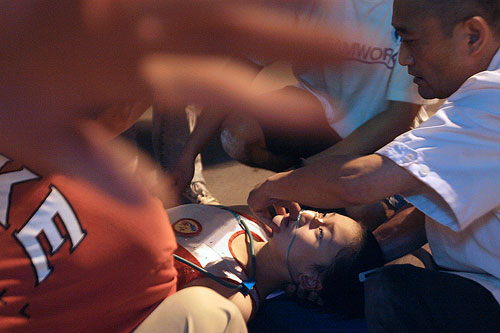 15-year-old Chinese gymnast Wang
Yan falls into coma after she broke her neck in
15-year-old Chinese gymnast Wang
Yan falls into coma after she broke her neck in
an accidental falldown from uneven bars at the national championship in
Shanghai, June 10, 2007. Wang may suffer a paralysis said an insider from the
diagnosis group.
Telecoms network firm Ericsson on
Sunday signed a framework agreement to provide US$1 billion worth of networking
equipment to China Mobile Communications Corp. Ericsson Chief Executive Carl-Henric
Svanberg signed the deal in Stockholm during a state visit by China's President
Hu Jintao, the first by a Chinese leader to Sweden. "The most important thing
was that we signed a contract today for deliveries of US$1 billion worth of
telecoms equipment. We have a third of the telecom market in China so this was
another significant step in that development," Svanberg told reporters at the
ceremony. Ericsson said the new framework agreement would see it supply core and
radio network equipment, along with related technical support and services, to
China Mobile as it expands GSM coverage in 19 regions of China. The Swedish
company said deliveries had already started.
The 2008 Beijing Olympic Games are
expected to attract four billion viewers of TV relay around the globe, a top
Olympics TV relay official has said. "The figure will be one billion more than
that of the 2004 Athens Olympics, and I believe we can achieve that goal," Ma
Guoli, Chief Operation Officer of Beijing Olympics Dissemination Corporation
Ltd., told a forum at an on-going TV festival in Shanghai on Tuesday. Ma said
that the company will use about 65 High Definition relay vehicles and 1,000
video cameras, build a broadcasting center with an area of up to 80,000 square
meters, and produce live TV signals of 3,800 hours in 2008. The company has
signed contracts with 45 TV producers and more than 50 equipment suppliers from
across the world, Ma said. "High Definition signals will be used for TV relays
for all 28 Olympics events," he said. The company has 180 staff members for now,
and one third of them are from 15 other countries and regions, according to Ma.
"By 2008, the number will increase to 4,000 and half of them will be from all
over the world," he said.
 Sharon Stone will be among
celebrities who take a turn on the red carpet at Saturday's opening of the
Shanghai International Film Festival. The "Basic Instinct" actress arrived in
China's commercial hub late Tuesday, with local newspapers showing her stepping
from a Mercedes Sedan into the lobby of the downtown Marriott hotel wearing
white slacks and a dark, long-sleeved top. The festival's organizers said Stone,
a star of last year's ensemble piece "Bobby," would be joined at Saturday's
opening by Marion Cotillard, the star of the Edith Piaf biopic "La Vie en Rose,"
"Memoirs of a Geisha" actress Kaori Momoi, and Taiwanese singer-actor Jay Chou,
along with a host of Chinese and South Korean stars. Acclaimed Chinese director
Chen Kaige heads the multinational jury at this year's festival that also
includes Luc Jacquet, director of the 2006 Academy Award winning documentary
"March of the Penguins." The June 16-24 festival, now in its 10th year, features
lectures, screenings, and a marketplace for films, as well as the awarding of
its top prize, the Jin Jue, or "Golden Goblet" prize. Sharon Stone will be among
celebrities who take a turn on the red carpet at Saturday's opening of the
Shanghai International Film Festival. The "Basic Instinct" actress arrived in
China's commercial hub late Tuesday, with local newspapers showing her stepping
from a Mercedes Sedan into the lobby of the downtown Marriott hotel wearing
white slacks and a dark, long-sleeved top. The festival's organizers said Stone,
a star of last year's ensemble piece "Bobby," would be joined at Saturday's
opening by Marion Cotillard, the star of the Edith Piaf biopic "La Vie en Rose,"
"Memoirs of a Geisha" actress Kaori Momoi, and Taiwanese singer-actor Jay Chou,
along with a host of Chinese and South Korean stars. Acclaimed Chinese director
Chen Kaige heads the multinational jury at this year's festival that also
includes Luc Jacquet, director of the 2006 Academy Award winning documentary
"March of the Penguins." The June 16-24 festival, now in its 10th year, features
lectures, screenings, and a marketplace for films, as well as the awarding of
its top prize, the Jin Jue, or "Golden Goblet" prize.
June 14, 2007
 Hong Kong:
We got it wrong on HK, Time admits - Ten years ago, Time's sister magazine,
Fortune, predicted that the return of Hong Kong to the motherland would sound
the death knell for the Pearl of the East. But in a cover story on its latest
issue entitled "Hong Kong's future: Sunshine, with clouds", Time admits it made
a mistake. The following are excerpts of the article. These days, 10 is
practically the new teen - as knowing, and as confused, an age. You think you
understand who you are, but you don't, not really. You want to be independent,
but you still need adult supervision. You are developing a sense of
righteousness, but find it runs up against a pragmatic world where compromise is
a necessity. Ten is a neat number, but a messy stage in life. So it is with Hong
Kong. At just past midnight on July 1, 1997, in a glittering and poignant
ceremony, Hong Kong passed from being the last jewel of an old empire to a
component of a new global power. Hong Kong matters not only because it is a
vital driveshaft of the global economy, transmitting the raw power of China's
(the mainland) manufacturing capability into a worldwide system for distributing
consumer goods. The city matters because it is a unique experiment that will
probably succeed but could possibly fail: the creation of a free, international
city within China. In the short period since a collection of fishing villages
were turned into a modern metropolis, Hong Kong has survived war, waves of
refugees, pestilence, drought and economic near-implosions, consistently defying
the doomsayers, repeatedly rebounding. In the past 10 years alone, Hong Kong has
lived through a crippling regional financial crisis, bird flu, SARS... The
city's run of luck has often seemed near the end; Time's sister magazine Fortune
once infamously, and incorrectly, predicted that its return to China would bring
about its death. Yet Hong Kong is more alive than ever. On the eve of the
handover, the stock market index, a key barometer of Hong Kong's health, stood
at the then record of 15,200; today it hovers near the 21,000 mark. Property
prices - in many ways the best measure of the territory's success because they
are followed so closely by the man (and woman) on the Kowloon minibus - dipped
after the handover and again after SARS, but are now once again rising to
stratospheric levels. "Things did not come to a grinding halt in 1997," says Sir
David Akers-Jones, 80, a former acting governor who stayed on in Hong Kong after
retiring. "Things continued Life went on." But not, of course, in the way it
had. Neither China (the mainland) nor its SAR has stood still in the past 10
years. Once, Hong Kong's preeminent preoccupation was the pursuit of wealth, and
the place remains obsessed with money. (Only in Hong Kong would the website for
an investment seminar be www.icanrich.hk.) As it becomes ever richer, however,
Hong Kong has realized that there's more to life than making a fortune. A
civil-society movement has come into being, agitating about everything from the
filthy air (though it is probably the cleanest of all China's cities) to
preserving old buildings to helping the poor... Hong Kong is a pulsating
organism made up of the most enterprising conglomeration of humanity the world
has ever known. That will never change. Identity crisis or no, Hong Kong
understands that it's damned lucky to have become a part of China at so
fortuitous a time, when the mainland is becoming ever freer and more open and in
a position to give its hybrid, somewhat alien, child more opportunity than it
could possibly have dreamed of. "I can't see what reason people in Hong Kong
have to be pessimistic," says economist David O'Rear. Hong Kong:
We got it wrong on HK, Time admits - Ten years ago, Time's sister magazine,
Fortune, predicted that the return of Hong Kong to the motherland would sound
the death knell for the Pearl of the East. But in a cover story on its latest
issue entitled "Hong Kong's future: Sunshine, with clouds", Time admits it made
a mistake. The following are excerpts of the article. These days, 10 is
practically the new teen - as knowing, and as confused, an age. You think you
understand who you are, but you don't, not really. You want to be independent,
but you still need adult supervision. You are developing a sense of
righteousness, but find it runs up against a pragmatic world where compromise is
a necessity. Ten is a neat number, but a messy stage in life. So it is with Hong
Kong. At just past midnight on July 1, 1997, in a glittering and poignant
ceremony, Hong Kong passed from being the last jewel of an old empire to a
component of a new global power. Hong Kong matters not only because it is a
vital driveshaft of the global economy, transmitting the raw power of China's
(the mainland) manufacturing capability into a worldwide system for distributing
consumer goods. The city matters because it is a unique experiment that will
probably succeed but could possibly fail: the creation of a free, international
city within China. In the short period since a collection of fishing villages
were turned into a modern metropolis, Hong Kong has survived war, waves of
refugees, pestilence, drought and economic near-implosions, consistently defying
the doomsayers, repeatedly rebounding. In the past 10 years alone, Hong Kong has
lived through a crippling regional financial crisis, bird flu, SARS... The
city's run of luck has often seemed near the end; Time's sister magazine Fortune
once infamously, and incorrectly, predicted that its return to China would bring
about its death. Yet Hong Kong is more alive than ever. On the eve of the
handover, the stock market index, a key barometer of Hong Kong's health, stood
at the then record of 15,200; today it hovers near the 21,000 mark. Property
prices - in many ways the best measure of the territory's success because they
are followed so closely by the man (and woman) on the Kowloon minibus - dipped
after the handover and again after SARS, but are now once again rising to
stratospheric levels. "Things did not come to a grinding halt in 1997," says Sir
David Akers-Jones, 80, a former acting governor who stayed on in Hong Kong after
retiring. "Things continued Life went on." But not, of course, in the way it
had. Neither China (the mainland) nor its SAR has stood still in the past 10
years. Once, Hong Kong's preeminent preoccupation was the pursuit of wealth, and
the place remains obsessed with money. (Only in Hong Kong would the website for
an investment seminar be www.icanrich.hk.) As it becomes ever richer, however,
Hong Kong has realized that there's more to life than making a fortune. A
civil-society movement has come into being, agitating about everything from the
filthy air (though it is probably the cleanest of all China's cities) to
preserving old buildings to helping the poor... Hong Kong is a pulsating
organism made up of the most enterprising conglomeration of humanity the world
has ever known. That will never change. Identity crisis or no, Hong Kong
understands that it's damned lucky to have become a part of China at so
fortuitous a time, when the mainland is becoming ever freer and more open and in
a position to give its hybrid, somewhat alien, child more opportunity than it
could possibly have dreamed of. "I can't see what reason people in Hong Kong
have to be pessimistic," says economist David O'Rear.
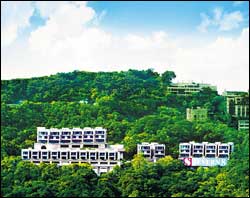 Thaksin
Shinawatra, the ousted prime minister of Thailand, was the purchaser of the
luxury townhouse on The Peak recently sold by Sun Hung Kai Properties (0016) - a
property whose price tag of HK$41,000 per square foot set a record in Asia's
luxury property market, sources told The Standard. A source close to the deal
said it was billionaire Thaksin who paid an astounding HK$210 million for the
5,100 sq ft townhouse, referred to as House 1 at Severn 8, The Peak. Two other
sources also named Thaksin as the buyer, whose identity was previously unknown.
"It is obvious the seller is pushing the price to the limit," said a source who
has been in the property industry for more than 30 years. "It would require
someone who either loves the property very much or who does not care about money
at all to make the call of buying it for more than HK$41,000 per square foot."
The Severn 8 development is considered one of the biggest projects in Hong Kong
in terms of size and luxury. Thaksin's townhouse - complete with swimming pool -
does not stand on its own but is connected to other units and, therefore, was
considered unlikely to fetch such a premium price. Local media had previously
reported only that the property was sold to an unnamed "businessman." Thaksin
Shinawatra, the ousted prime minister of Thailand, was the purchaser of the
luxury townhouse on The Peak recently sold by Sun Hung Kai Properties (0016) - a
property whose price tag of HK$41,000 per square foot set a record in Asia's
luxury property market, sources told The Standard. A source close to the deal
said it was billionaire Thaksin who paid an astounding HK$210 million for the
5,100 sq ft townhouse, referred to as House 1 at Severn 8, The Peak. Two other
sources also named Thaksin as the buyer, whose identity was previously unknown.
"It is obvious the seller is pushing the price to the limit," said a source who
has been in the property industry for more than 30 years. "It would require
someone who either loves the property very much or who does not care about money
at all to make the call of buying it for more than HK$41,000 per square foot."
The Severn 8 development is considered one of the biggest projects in Hong Kong
in terms of size and luxury. Thaksin's townhouse - complete with swimming pool -
does not stand on its own but is connected to other units and, therefore, was
considered unlikely to fetch such a premium price. Local media had previously
reported only that the property was sold to an unnamed "businessman."
Sun Hung Kai Properties (0016)
bagged a prime seaview site in West Kowloon for HK$5.56 billion as it threw
caution to the wind amid sluggish bidding from developers concerned about the
high reserve price and the prospect of a judicial review related to the site.
Hongkong and Shanghai Banking Corp
chief executive Michael Smith will leave HSBC Friday to become chief executive
of Australia and New Zealand Banking Group, which will give him a total
remuneration package of up to A$12 million (HK$79.1 million) per annum.
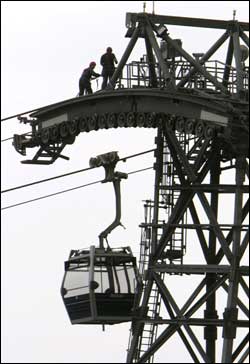 Skyrail-ITM - the
Australian firm behind the Ngong Ping 360 cable car system on Lantau - will be
asked to replace its entire management team if it is found to be responsible for
the incident Monday in which a cabin plunged 50 meters to the ground after
becoming detached from the cable. The warning came from Secretary for Economic
Development and Labour Stephen Ip Shu-kwan Tuesday as he announced a thorough
investigation will be launched with the help of overseas experts. The probe is
expected to be completed within a month. The incident was the first of its kind
at the Lantau tourist attraction since the trouble-plagued cable car system
began operation in September last year. Ip said the investigation will cover not
only the mishap itself, but also the overall management and maintenance of the
system. Skyrail-ITM - the
Australian firm behind the Ngong Ping 360 cable car system on Lantau - will be
asked to replace its entire management team if it is found to be responsible for
the incident Monday in which a cabin plunged 50 meters to the ground after
becoming detached from the cable. The warning came from Secretary for Economic
Development and Labour Stephen Ip Shu-kwan Tuesday as he announced a thorough
investigation will be launched with the help of overseas experts. The probe is
expected to be completed within a month. The incident was the first of its kind
at the Lantau tourist attraction since the trouble-plagued cable car system
began operation in September last year. Ip said the investigation will cover not
only the mishap itself, but also the overall management and maintenance of the
system.
Commuters caught using foul
language on MTR and KCR trains will not be jailed, as proposed earlier by the
MTRC. The company has decided to withdraw the proposal calling for imprisonment
and replace it with another that called for a HK$5,000 fine.
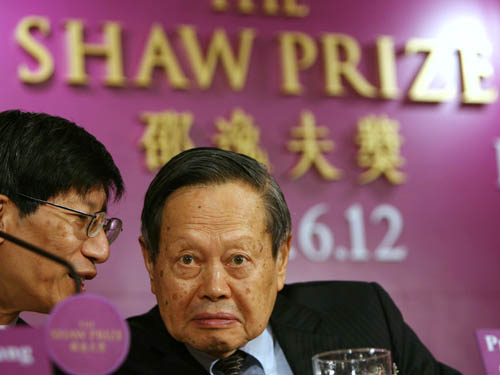 Hong Kong paid tribute to four world-scientific grandees
yesterday with the announcement of this year's Shaw Prize, the city's version of
the Nobel Prize. The winners are an astronomer who helped explain why so many
galaxies look like spiralling discs; two mathematicians who found deep
connections between prime numbers and the mathematical principle of symmetry;
and a professor of medicine who made fundamental discoveries on how cell
receptors mediate the body's responses to drugs. "The advancement of society and
the prosperity of civilisations can be attributed to the contribution of great
talents of past and present,' said Ma Lin, Shaw Prize council member and former
Chinese University vice-chancellor, at the announcement ceremony yesterday.
"Their achievements enable us to enjoy the advantages of modern civilization."
This is the fourth year that the prize - worth US$1 million in each category -
has been awarded and a presentation ceremony will be held on September 11. Peter
Goldreich, of the California Institute of Technology and Princeton University,
was awarded the astronomy prize for his lifetime achievements in theoretical
astrophysics and planetary sciences, which range from the structure of galaxies
to the low radio-frequency effects of one of Jupiter's moons on its planet. The
life sciences and medicine award goes to Robert Lefkowitz, a professor of
medicine and biochemistry at Duke University in North Carolina, whose research
underlies much of contemporary understanding of drug treatment. Robert Langlands,
of Princeton University, and Harvard University mathematician Richard Taylor
will share the maths prize for their work in what has come to be known as the
Langlands programme. This is a complex series of conjectures linking
contemporary number theory to another important branch of mathematics called
representation theory. A conjecture of Professor Langlands was used by
British-American mathematician Andrew Wiles in his celebrated proof of the
centuries-old Fermat's Last Theorem. Professor Taylor studied under Wiles and
helped him complete his proof.
Hong Kong paid tribute to four world-scientific grandees
yesterday with the announcement of this year's Shaw Prize, the city's version of
the Nobel Prize. The winners are an astronomer who helped explain why so many
galaxies look like spiralling discs; two mathematicians who found deep
connections between prime numbers and the mathematical principle of symmetry;
and a professor of medicine who made fundamental discoveries on how cell
receptors mediate the body's responses to drugs. "The advancement of society and
the prosperity of civilisations can be attributed to the contribution of great
talents of past and present,' said Ma Lin, Shaw Prize council member and former
Chinese University vice-chancellor, at the announcement ceremony yesterday.
"Their achievements enable us to enjoy the advantages of modern civilization."
This is the fourth year that the prize - worth US$1 million in each category -
has been awarded and a presentation ceremony will be held on September 11. Peter
Goldreich, of the California Institute of Technology and Princeton University,
was awarded the astronomy prize for his lifetime achievements in theoretical
astrophysics and planetary sciences, which range from the structure of galaxies
to the low radio-frequency effects of one of Jupiter's moons on its planet. The
life sciences and medicine award goes to Robert Lefkowitz, a professor of
medicine and biochemistry at Duke University in North Carolina, whose research
underlies much of contemporary understanding of drug treatment. Robert Langlands,
of Princeton University, and Harvard University mathematician Richard Taylor
will share the maths prize for their work in what has come to be known as the
Langlands programme. This is a complex series of conjectures linking
contemporary number theory to another important branch of mathematics called
representation theory. A conjecture of Professor Langlands was used by
British-American mathematician Andrew Wiles in his celebrated proof of the
centuries-old Fermat's Last Theorem. Professor Taylor studied under Wiles and
helped him complete his proof.
The number of Hong Kong teenagers identifying themselves
as Chinese Hongkongers has risen in the past decade, a poll has found. Today's
young people also agreed that China was a stronger economic power than Hong Kong
but many said they were not willing to build good relations with mainlanders.
The survey, conducted by the University of Hong Kong, interviewed 3,993 young
people after a similar poll was conducted in 1996 of 9,226 students, where the
average age was 15. Pollsters say that 22 per cent of the teenagers called
themselves Chinese Hongkongers, up from 16 per cent in 1996. The number of
people calling themselves Hongkongers also dropped from 34 to 29 per cent. But
the number of teenagers who claimed to be Hong Kong Chinese has remained
constant at 40 per cent. "The result shows a significant change in terms of
national identification," said Lam Shui-fong, Hong Kong University's associate
psychology professor, who headed the study. "More people give themselves a dual
identity - Chinese Hongkonger. They include those who were born in Hong Kong and
the mainland too." Dr Lam said there were several reasons for the stronger
acceptance of a national identity, such as civic education in schools. "The
survey did not ask them what has contributed to the change," she said. "[But]
the national flag raising ceremony and national anthem being sung at school
would also have enhanced the sense of belonging." The poll has also revealed
that fewer teenagers would publicly criticise the mainland, while more said they
were proud to be Chinese.
Hong Kong ranks as the world's top "business centre" and
fifth in the world among cities in global commerce, according to the latest
results of the 2007 MasterCard Worldwide Centres of Commerce Index. But the
researchers said Hong Kong must strive to improve its environment if it wants to
attract talented professionals. A business centre is measured by the ease of
starting and closing a business, employing workers, international air passengers
and air cargo traffic, and the number of five-star hotels. In turn, the
dimension of "business centre" is one of six key measurements used to assess
each city's ability to link with international markets. Economic stability and
legal and political framework are two of the others. Danny Cheung, MasterCard
worldwide vice-president and business manager for Hong Kong and Macau, said the
city's high-quality facilities and high volume of airport cargo and passenger
traffic were also significant. "Every little thing counts, and these things help
Hong Kong, shape Hong Kong and make Hong Kong one of the best places for people
to do business," he said. On the list of the 50 top Centres of Commerce, London
was No1, followed by New York and Tokyo. Then came Chicago, Hong Kong and
Singapore. The ranking, which is the first Centre of Commerce index compiled by
MasterCard, highlights Hong Kong's leadership in commercial real estate
development and control of the world's second-busiest port. Yuwa Hedrick-Wong,
economic adviser to MasterCard Worldwide and the study's lead researcher, said
air pollution subtracts from Hong Kong's quality of life indicators, a large
part of the liveability index. "Unfortunately, it's not an issue that Hong Kong
itself can address. It is a country-wide issue for China," he said in a
statement for yesterday's press conference.
Mission to US hopes to rekindle interest in HK - Executive
Council convenor Leung Chun-ying said yesterday he hoped a delegation from the
Better Hong Kong Foundation, which starts a tour to the United States on Sunday,
could rekindle Americans' interest in Hong Kong. While noting concerns voiced by
the US on Hong Kong's future when he first visited the country to talk about the
city's situation 12 years ago, Mr Leung said Americans now had a deeper
understanding of the city and implementation of the Basic Law 10 years after the
handover. "What they worried about in 1997 has not materialised," Mr Leung, a
delegation member, said. "Ten years on, their reports on Hong Kong's affairs are
much fairer, yet their curiosity level for Hong Kong has dwindled. In fact,
their dwindling curiosity may not be a good thing for Hong Kong ... I hope that
this trip can rekindle their interest." Mr Leung said he would talk about the
implementation of the Basic Law and the economic integration between Hong Kong
and the mainland, as well as the challenges stemming from this. He also said he
was willing to clarify remarks last week by National People's Congress chairman
Wu Bangguo on the limits to Hong Kong's autonomy, if anyone questioned them, and
added that Hong Kong actually had more autonomy since the handover than in
colonial days. The theme of the foundation's annual delegation this year is
"Hong Kong in the past 10 years and the road ahead". The delegation will be led
by the foundation's executive director, Karen Tang Shuk-tak, and will also
include executive and legislative councillor Bernard Chan and a chair professor
of finance at City University, Stephen Cheung Yan-leung. They will meet leaders
from the government, Congress, academic and business sectors, think-tanks and
NGOs in Washington and New York, during their week-long trip. Professor Cheung
said while many people had feared Hong Kong might become marginalised after the
handover, and some regarded Beijing as a potential threat to the world as well
as to Hong Kong, developments in the past 10 years proved the handover had had a
positive impact on the city.
 China: A
Chinese investor's acquisition of a German airport hits a stumbling block after
the transaction did not get approval from Ministry of Commerce, reported the
China Economic Weekly on Monday. The deal grabbed headlines in late May, when
LinkGlobal Logistics bought Parchim Airport in Germany and was hailed as an
unprecedented transaction that opened a new investment chapter in Chinese
aviation history. Chairman of LinkGlobal Logistics Pang Yuliang, the main
player, was in the media spotlight after beating out 10 other global competitors
for this airport, which has an annual capacity of 180,000 flights and can handle
all kinds of civil aircrafts. But now, the Ministry of Commerce has halted the
transaction because the deal hasn't been filed with relevant authorities, which
prevents LinkGlobal from completing the financial part of the deal. When the
media tried to contact Pang about the setback, he refused to comment. Brought up
in the poverty-stricken Shangcai County, Central China's Henan Province, Pang's
logistics business currently covers more than 800 cities in mainland China and
some 90 countries worldwide. When the transaction to buy Parchim Airport was
announced, Pang said: "There will be no need for my fellow-villagers heading
towards Germany to transfer in Beijing or Shanghai once a charter flight is
organized." At the time, he is already in negotiations with aviation officials
to link Zhengzhou, the capital of Henan Province to Parchim Airport. Pang
diverted his global logistics business from Beijing, Shanghai and Shenzhen to
Zhengzhou, and invested 300 million yuan (US$39.2 million) in 2006 to set up an
international logistics center that provides global sea port, airport logistics,
global express, bonded processing, and international trade services. A banner in
front of Pang's company reads "If you only have a hammer, you always see
problems as nails", perhaps Pang has already got a hammer to pound the pending
issue.
China: A
Chinese investor's acquisition of a German airport hits a stumbling block after
the transaction did not get approval from Ministry of Commerce, reported the
China Economic Weekly on Monday. The deal grabbed headlines in late May, when
LinkGlobal Logistics bought Parchim Airport in Germany and was hailed as an
unprecedented transaction that opened a new investment chapter in Chinese
aviation history. Chairman of LinkGlobal Logistics Pang Yuliang, the main
player, was in the media spotlight after beating out 10 other global competitors
for this airport, which has an annual capacity of 180,000 flights and can handle
all kinds of civil aircrafts. But now, the Ministry of Commerce has halted the
transaction because the deal hasn't been filed with relevant authorities, which
prevents LinkGlobal from completing the financial part of the deal. When the
media tried to contact Pang about the setback, he refused to comment. Brought up
in the poverty-stricken Shangcai County, Central China's Henan Province, Pang's
logistics business currently covers more than 800 cities in mainland China and
some 90 countries worldwide. When the transaction to buy Parchim Airport was
announced, Pang said: "There will be no need for my fellow-villagers heading
towards Germany to transfer in Beijing or Shanghai once a charter flight is
organized." At the time, he is already in negotiations with aviation officials
to link Zhengzhou, the capital of Henan Province to Parchim Airport. Pang
diverted his global logistics business from Beijing, Shanghai and Shenzhen to
Zhengzhou, and invested 300 million yuan (US$39.2 million) in 2006 to set up an
international logistics center that provides global sea port, airport logistics,
global express, bonded processing, and international trade services. A banner in
front of Pang's company reads "If you only have a hammer, you always see
problems as nails", perhaps Pang has already got a hammer to pound the pending
issue.

 Contest show names Red Chamber cast,
sparks debate - The 10-month televised marathon audition looking for actors for
the new adaptation of A Dream of Red Chamber, is over, but the debate has just
begun. Li Xudan bets other hopefuls to win the role of Lin Daiyu in the new
television adaptation of the story. Li Xudan and Yao Di beat other hopefuls to
win the leading female roles of Lin Daiyu and Xue Baochai amid much controversy
over the weekend during the four-hour final televised casting call. But who will
play the leading male role of Jia Baoyu is still unknown, since the jury and
audience felt the pool of candidates were not good enough, according to Hu Mei,
the director of the new television series. Some of the actors who were screened
out will have minor roles. However, there were heated debates on the Internet,
with many netizens raising suspicions over how Li got the role of Lin Daiyu. Hu
was reportedly furious after Li, then a promising candidate, was surprisingly
eliminated during the audition process. The director threatened to quit if the
talent selected by the jury and audience did not meet her expectations. As part
of the audition process, if an actor is screened out, they can still "survive"
but playing a "revival game," giving the ousted candidates a second chance. Li
managed to win the game and in the end was given the leading role. But many
netizens doubt the fairness of the contest.
Contest show names Red Chamber cast,
sparks debate - The 10-month televised marathon audition looking for actors for
the new adaptation of A Dream of Red Chamber, is over, but the debate has just
begun. Li Xudan bets other hopefuls to win the role of Lin Daiyu in the new
television adaptation of the story. Li Xudan and Yao Di beat other hopefuls to
win the leading female roles of Lin Daiyu and Xue Baochai amid much controversy
over the weekend during the four-hour final televised casting call. But who will
play the leading male role of Jia Baoyu is still unknown, since the jury and
audience felt the pool of candidates were not good enough, according to Hu Mei,
the director of the new television series. Some of the actors who were screened
out will have minor roles. However, there were heated debates on the Internet,
with many netizens raising suspicions over how Li got the role of Lin Daiyu. Hu
was reportedly furious after Li, then a promising candidate, was surprisingly
eliminated during the audition process. The director threatened to quit if the
talent selected by the jury and audience did not meet her expectations. As part
of the audition process, if an actor is screened out, they can still "survive"
but playing a "revival game," giving the ousted candidates a second chance. Li
managed to win the game and in the end was given the leading role. But many
netizens doubt the fairness of the contest.
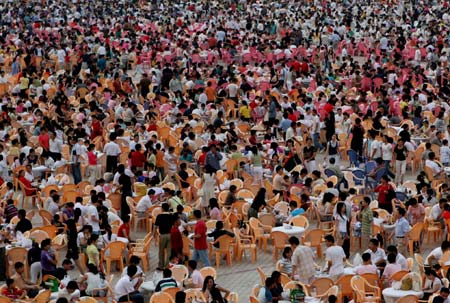 People get together to eat lobster during a feast in
Xuyi County, East China's Jiangsu Province, June 12, 2007. Some 15,000 people
devoured nearly ten tons of lobster made by about 500 cooks during the feast.
People get together to eat lobster during a feast in
Xuyi County, East China's Jiangsu Province, June 12, 2007. Some 15,000 people
devoured nearly ten tons of lobster made by about 500 cooks during the feast.
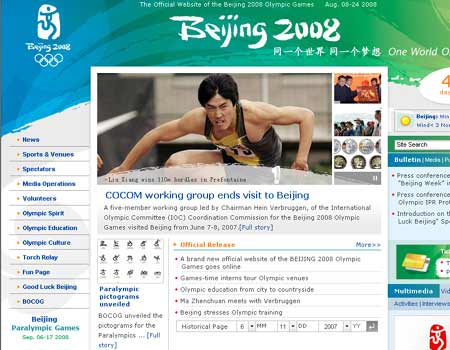 A brand
new official website of the BEIJING 2008 Olympic Games was launched on Tuesday.
The new site is based on a solid foundation of quick Games-time turnaround
making use of mature, mainstream technology, an elegant color scheme and
tasteful design, and clear and simply organization for ease of use. Since 2001,
the official website of the BEIJING 2008 Olympic Games has undergone numerous
facelifts, from the modest website used solely for reporting news at the onset
gradually evolving into a comprehensive platform for news about the preparation
for the Games, society and sports news, as well as for interaction with web
users. The volume of official website visitors surpassed 1.3 million visitors
the day the official mascots were released. The changes in the official website
of the BEIJING 2008 reflects the continual progress with the preparations for
the Games. The new official website combines insight from the multiple
discussions among various groups, including the design team for the new website,
professionals from the IOC, professionals from internet project groups, and the
contractor Sohu.com Inc. It fully takes into consideration the browsing
experience of visitors. From a design angle, the new official website adheres to
the BEIJING 2008 image and look using green-blue and Chinese scholar tree green
as its main colors. The overall design has perfectly balanced, aesthetically
pleasing look, representing a green and humanistic Olympics and possesses
lasting representative Chinese characteristics and essence. In terms of content
design, the new official website places more emphasis on the visitor's
experience as well as service functions. The organization of the website is
simple, with a more intuitive layout. The new official website uses page code
technology, various media and mature technologies, giving users a whole new
reading experience, with a range of interactive products and newly added service
functions, thereby adding to the website's level of appeal and service
standards. Currently, the official website of the BEIJING 2008 Olympic Games is
offered in three languages -- Chinese, English, and French. The specific
requirements for language group were fully considered in designing every part of
the website, from column placement to subject schemes. "The site [new site] is
going to be a more complete reflection of what BOCOG has grown into." An expert
expressed his optimism about the brand new official website. "I congratulate the
[design] team on the work that's been done and know that this will be an
important next step to achieving the best Games-time website ever because the
entire world will be coming to visit, and I'm sure that it will set every record
for visitors to a website that's ever happened during the Olympic Games." A brand
new official website of the BEIJING 2008 Olympic Games was launched on Tuesday.
The new site is based on a solid foundation of quick Games-time turnaround
making use of mature, mainstream technology, an elegant color scheme and
tasteful design, and clear and simply organization for ease of use. Since 2001,
the official website of the BEIJING 2008 Olympic Games has undergone numerous
facelifts, from the modest website used solely for reporting news at the onset
gradually evolving into a comprehensive platform for news about the preparation
for the Games, society and sports news, as well as for interaction with web
users. The volume of official website visitors surpassed 1.3 million visitors
the day the official mascots were released. The changes in the official website
of the BEIJING 2008 reflects the continual progress with the preparations for
the Games. The new official website combines insight from the multiple
discussions among various groups, including the design team for the new website,
professionals from the IOC, professionals from internet project groups, and the
contractor Sohu.com Inc. It fully takes into consideration the browsing
experience of visitors. From a design angle, the new official website adheres to
the BEIJING 2008 image and look using green-blue and Chinese scholar tree green
as its main colors. The overall design has perfectly balanced, aesthetically
pleasing look, representing a green and humanistic Olympics and possesses
lasting representative Chinese characteristics and essence. In terms of content
design, the new official website places more emphasis on the visitor's
experience as well as service functions. The organization of the website is
simple, with a more intuitive layout. The new official website uses page code
technology, various media and mature technologies, giving users a whole new
reading experience, with a range of interactive products and newly added service
functions, thereby adding to the website's level of appeal and service
standards. Currently, the official website of the BEIJING 2008 Olympic Games is
offered in three languages -- Chinese, English, and French. The specific
requirements for language group were fully considered in designing every part of
the website, from column placement to subject schemes. "The site [new site] is
going to be a more complete reflection of what BOCOG has grown into." An expert
expressed his optimism about the brand new official website. "I congratulate the
[design] team on the work that's been done and know that this will be an
important next step to achieving the best Games-time website ever because the
entire world will be coming to visit, and I'm sure that it will set every record
for visitors to a website that's ever happened during the Olympic Games."
China has beefed up its laws
against terrorist financing, describing it as an important step toward becoming
a member of a global anti-money laundering task force.
June 13, 2007
 Hong Kong:
Families may have to pay for
excessive storage time in public hospital mortuaries if interim measures fail to
ease an acute shortage of space, Deputy Secretary for Health, Welfare and Food
Patrick Nip Tak-kuen said Monday. Hong Kong:
Families may have to pay for
excessive storage time in public hospital mortuaries if interim measures fail to
ease an acute shortage of space, Deputy Secretary for Health, Welfare and Food
Patrick Nip Tak-kuen said Monday.
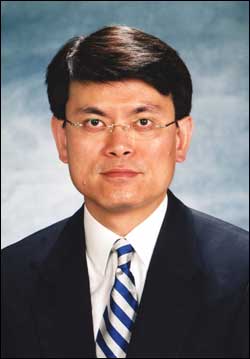
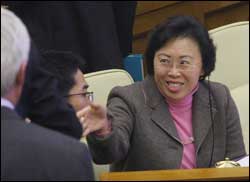  Six for Tsang team - Four new faces and two incumbents
will be among Chief Executive Donald Tsang Yam-kuen's new team of ministers to
be sworn in July 1, while five members of his old guard will step down.
Six for Tsang team - Four new faces and two incumbents
will be among Chief Executive Donald Tsang Yam-kuen's new team of ministers to
be sworn in July 1, while five members of his old guard will step down.
Professor Ceajer Chan Ka-keung, dean of the Business School at the Hong Kong
University of Science and Technology, will be the new secretary for financial
services and the treasury. Chan, 50, will be one of the two outsiders appointed.
The other is banker Norman Chan Tak-lam, who will become director of the Chief
Executive Office, as reported exclusively by The Standard two weeks ago. Three
top administrative officers will quit the civil service to accept the political
appointments. Incumbent Director of Information Services Edward Yau Tang-wah,
47, will fill the hot seat of secretary for the environment, transport and
works, Eva Cheng Yu-wah, 47, Permanent Secretary for Economic Development and
Labour, will become secretary for housing and transport, and 50-year-old Carrie
Lam Cheng Yuet-ngor, Permanent Secretary for Home Affairs, will take up the post
of secretary for development. Ceajer Chan was one of the staunchest supporters
of the SAR government's decision in 1998 to intervene in the stock market in a
successful attempt to fend off speculators. He is an incumbent member of the
Exchange Fund Advisory Committee, chairman of the Consumer Council and a member
of the Committee on Economic Development and Economic Cooperation with the
Mainland under the Commission on Strategic Development. The Hong Kong-born
finance professor joined HKUST in 1993 after working at Ohio State University in
the United States. He graduated from Wesleyan University and gained his MBA and
PhD degrees at the University of Chicago. According to a well-informed source,
the four new faces in the Cabinet will add vitality and new dynamics to Tsang's
governance as he has vowed to recruit more like-minded, talented and dedicated
people who can work with him cordially to help him deliver the policy
initiatives he pledged during his re-election campaign. "Yau, Cheng and Lam are
shining examples of Tsang's ideal ministers. Tsang has found them to be
dedicated, like-minded, capable and able to work with him very well. Unlike some
other potential candidates who have declined Tsang's offers, they're willing to
risk their job security with the civil service and plunge themselves into the
rough sea of politics," another senior government source said. "Both Yau and
Cheng, at 47, are the youngest ministers-to-be in Tsang's new team, They are
appreciated by their boss and colleagues for their receptiveness,
quick-wittedness, good articulation and proficiency in bilingualism." Despite
Yau's lack of an environmental track record, he beat pan- democrat candidate,
the Civic Exchange's executive director, Christine Loh Kung-wai, for the post.
"His extensive past portfolios in trade, education and, most importantly, his
experience gathered in Washington have helped him develop the political and
interpersonal skills to cope with contingencies and diverging concerns of
environmental groups and growing public aspirations," one source said. Tsang
lobbied hard for Lam to return to the government early last year from her trade
office post in London. "She is strongly applauded by Tsang as the most
formidable senior administrative officer in the government in handling lawmakers
and the media, and she appeals to the public. Lam's outstanding performance in
organizing and coordinating the activities to celebrate the 10th anniversary of
the handover has won her praise from mainland officials," the source said. The
two incumbent ministers who will stay on for another five-year term are
Secretary for Housing, Planning and Lands Michael Suen Ming-yeung, 63, who will
replace Arthur Li Kwok- cheung as secretary for education and manpower; and
Secretary for Financial Services and the Treasury Frederick Ma Si-hang, who will
take over as secretary for commerce and economic development after the
retirement of Secretary for Economic Development and Labour Stephen Ip Shu-kwan.
Ip, 56, informed Tsang of his wish to retire after 34 years of public service.
He is tipped to join the business sector. Chief Secretary for Administration
Rafael Hui Si-yan is also due to retire by the end of this month. The other four
ministers on the way out are Secretary for Commerce, Industry and Technology
Joseph Wong Wing-ping, Secretary for Education and Manpower Arthur Li Kwok-cheung,
Secretary for the Environment, Transport and Works Sarah Liao Sau-tung and
Secretary for Home Affairs Patrick Ho Chi-ping.
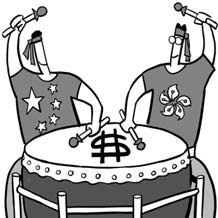 Expanded QDII good news
for HK (Hong Liang) One of the most encouraging news items for the Hong Kong
financial market in recent months must have been the expanded scope of
investment by mainland banks for their clients under the QDII (qualified
domestic institutional investors) scheme. The benefits that this new decree by
China Banking Regulatory Commission (CBRC) can bring to Hong Kong are seen by
policymakers and economists to extend far beyond the various investment markets.
Helping to reaffirm Hong Kong's importance as a financial center to the
mainland, the CBRC's decision has greatly bolstered Hong Kong people's
confidence at a time of growing doubt about the city's relevance to China's
economic development. In a column published on the website of Hong Kong Monetary
Authority (HKMA), the de facto central bank, Joseph Yam, HKMA's chief executive,
eloquently declared that the CBRC's "decision has longer-term, strategic
significance" to the mainland in monetary management and to Hong Kong in
financial market development. Yam and other economists in Hong Kong believe that
the decision was an integral part of the capital account liberalization process
which encourages the outflow of funds under a framework of effective regulation
and control. Such an outflow can help relieve some of the pressures on the
exchange rate of the renminbi and on monetary management brought about by the
rising current account surplus, strong capital inflow and the rapid accumulation
of foreign reserves. The latest expansion of the QDII scheme also offers
mainland investors a welcome alternative to diversify their enormous savings
from low-yielding bank deposits. The strong desire by mainland investors for
other investment channels has been forcefully demonstrated by the flood of cash
into the stock market from bank deposits in the past 18 months of so. At current
price levels, the risk-return profile of the Chinese equity market may have
become increasingly unpalatable to a growing number of mainland investors. The
newly created opportunity to invest in the Hong Kong equity market under the
QDII scheme would seem most welcome despite the inherent foreign exchange risks,
which should remain small. Further expansion of investment flow from the
mainland to Hong Kong under the QDII scheme and from Hong Kong to the mainland
under the QFII (qualified foreign institutional investment) scheme could go a
long way in addressing the nagging anomaly arising from the persistent price
difference between the Hong Kong-listed H shares and mainland-listed A shares of
the mainland enterprises. The price differential between these two classes of
shares, which are entitled to the same rights, is a symptom of market
segregation which is understandable but unhealthy, and, as Yam noted, "should be
addressed in an orderly way before the market springs a surprise on everyone".
The CBRC's decision must be seen as a move in achieving the objective to allow
domestic supply and demand on the mainland to interact with the
internationalized market forces in Hong Kong. Such interaction is seen as
essential for making the market more structurally stable and price discovery
more efficient. Some market participants may feel disappointed by the
limitations of the QDII quota, which restricts the equity component to 50
percent and the investment in any one individual share to 5 percent. But as Yam
said: "It is more important for us to appreciate what the mainland authorities
are trying to achieve and the role the financial system of Hong Kong can play in
helping to bring it about." Expanded QDII good news
for HK (Hong Liang) One of the most encouraging news items for the Hong Kong
financial market in recent months must have been the expanded scope of
investment by mainland banks for their clients under the QDII (qualified
domestic institutional investors) scheme. The benefits that this new decree by
China Banking Regulatory Commission (CBRC) can bring to Hong Kong are seen by
policymakers and economists to extend far beyond the various investment markets.
Helping to reaffirm Hong Kong's importance as a financial center to the
mainland, the CBRC's decision has greatly bolstered Hong Kong people's
confidence at a time of growing doubt about the city's relevance to China's
economic development. In a column published on the website of Hong Kong Monetary
Authority (HKMA), the de facto central bank, Joseph Yam, HKMA's chief executive,
eloquently declared that the CBRC's "decision has longer-term, strategic
significance" to the mainland in monetary management and to Hong Kong in
financial market development. Yam and other economists in Hong Kong believe that
the decision was an integral part of the capital account liberalization process
which encourages the outflow of funds under a framework of effective regulation
and control. Such an outflow can help relieve some of the pressures on the
exchange rate of the renminbi and on monetary management brought about by the
rising current account surplus, strong capital inflow and the rapid accumulation
of foreign reserves. The latest expansion of the QDII scheme also offers
mainland investors a welcome alternative to diversify their enormous savings
from low-yielding bank deposits. The strong desire by mainland investors for
other investment channels has been forcefully demonstrated by the flood of cash
into the stock market from bank deposits in the past 18 months of so. At current
price levels, the risk-return profile of the Chinese equity market may have
become increasingly unpalatable to a growing number of mainland investors. The
newly created opportunity to invest in the Hong Kong equity market under the
QDII scheme would seem most welcome despite the inherent foreign exchange risks,
which should remain small. Further expansion of investment flow from the
mainland to Hong Kong under the QDII scheme and from Hong Kong to the mainland
under the QFII (qualified foreign institutional investment) scheme could go a
long way in addressing the nagging anomaly arising from the persistent price
difference between the Hong Kong-listed H shares and mainland-listed A shares of
the mainland enterprises. The price differential between these two classes of
shares, which are entitled to the same rights, is a symptom of market
segregation which is understandable but unhealthy, and, as Yam noted, "should be
addressed in an orderly way before the market springs a surprise on everyone".
The CBRC's decision must be seen as a move in achieving the objective to allow
domestic supply and demand on the mainland to interact with the
internationalized market forces in Hong Kong. Such interaction is seen as
essential for making the market more structurally stable and price discovery
more efficient. Some market participants may feel disappointed by the
limitations of the QDII quota, which restricts the equity component to 50
percent and the investment in any one individual share to 5 percent. But as Yam
said: "It is more important for us to appreciate what the mainland authorities
are trying to achieve and the role the financial system of Hong Kong can play in
helping to bring it about."
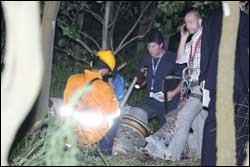 A two-tonne
cable car plunged more than 50 meters from the troubled Ngong Ping 360 line on
Lantau Island Monday night. The popular tourist attraction was closed for the
night and there were no injuries. The incident has sparked fears over the safety
of the system that began operation last September and services have been
suspended. Officials from the government, emergency services, MTR Corp and
operators were still investigating early today. A source said an emergency drill
was being conducted at around 8pm when the mishap occurred. "Cable cars were
being moved at about seven meters per second to perform emergency brakes. But
one of the cars broke loose from a height of about 13 to 14 stories. The alarm
system revealed there was a problem at Tower 2B," the source said. The cable car
landed on a slope beneath a support tower close to the Chek Lap Kok South Road
turnaround area near the Tung Chung bus terminal. A two-tonne
cable car plunged more than 50 meters from the troubled Ngong Ping 360 line on
Lantau Island Monday night. The popular tourist attraction was closed for the
night and there were no injuries. The incident has sparked fears over the safety
of the system that began operation last September and services have been
suspended. Officials from the government, emergency services, MTR Corp and
operators were still investigating early today. A source said an emergency drill
was being conducted at around 8pm when the mishap occurred. "Cable cars were
being moved at about seven meters per second to perform emergency brakes. But
one of the cars broke loose from a height of about 13 to 14 stories. The alarm
system revealed there was a problem at Tower 2B," the source said. The cable car
landed on a slope beneath a support tower close to the Chek Lap Kok South Road
turnaround area near the Tung Chung bus terminal.
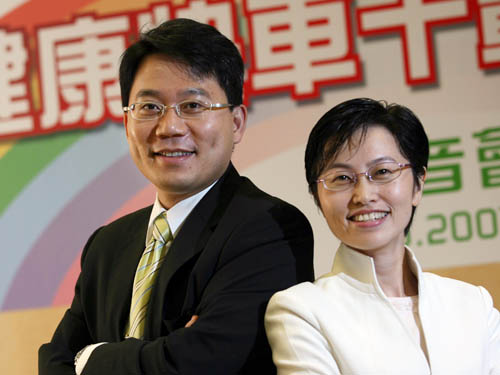 About 100
cataract sufferers in Tibet are to receive free surgery on a converted train to
cure their blindness during a mission that will also act as an exchange between
Hong Kong and mainland doctors. The Lifeline Express train, one of three taking
doctors across the mainland to carry out the operations, has arrived in Lhasa on
its first visit. The doctors will help Tibetans living in and around the
provincial capital. "We have already made plans for [patients] and families to
travel to the station where the train stops," said Medea Yip Wai-shan, general
manager of Lifeline Express Hong Kong Foundation, which has operated the service
for the past 10 years. Volunteer doctor Joan Ng said the trip would not only
help the patients but also act as an exchange between doctors from Hong Kong and
the mainland. "We will exchange views with each other during the operations. We
will also bring along some of our new apparatus and teach them how to use it,"
she said. Lifeline Express has visited 22 cities and provinces, and a fourth eye
train is expected to be in service by the middle of next year. While one train
is in Tibet, another has just travelled to Hunan province. The foundation
expects about 2,000 patients to have received free surgery by the time it leaves
next week. Cataracts, a film that grows on the eye lens, mainly affect children
and old people. In Hong Kong, a two-day exhibition will be staged on the third
eye train at the Kowloon-Canton Railway Corporation's Fo Tan depot from June 23.
About 20 cataract sufferers in the city will receive free surgery aboard the
train in the two days before the exhibition starts. About 100
cataract sufferers in Tibet are to receive free surgery on a converted train to
cure their blindness during a mission that will also act as an exchange between
Hong Kong and mainland doctors. The Lifeline Express train, one of three taking
doctors across the mainland to carry out the operations, has arrived in Lhasa on
its first visit. The doctors will help Tibetans living in and around the
provincial capital. "We have already made plans for [patients] and families to
travel to the station where the train stops," said Medea Yip Wai-shan, general
manager of Lifeline Express Hong Kong Foundation, which has operated the service
for the past 10 years. Volunteer doctor Joan Ng said the trip would not only
help the patients but also act as an exchange between doctors from Hong Kong and
the mainland. "We will exchange views with each other during the operations. We
will also bring along some of our new apparatus and teach them how to use it,"
she said. Lifeline Express has visited 22 cities and provinces, and a fourth eye
train is expected to be in service by the middle of next year. While one train
is in Tibet, another has just travelled to Hunan province. The foundation
expects about 2,000 patients to have received free surgery by the time it leaves
next week. Cataracts, a film that grows on the eye lens, mainly affect children
and old people. In Hong Kong, a two-day exhibition will be staged on the third
eye train at the Kowloon-Canton Railway Corporation's Fo Tan depot from June 23.
About 20 cataract sufferers in the city will receive free surgery aboard the
train in the two days before the exhibition starts.
Hong Kong should explore other ways to broaden the tax
base after the public failed to agree on the controversial goods and services
tax (GST), Financial Secretary Henry Tang Ying-yen said on Tuesday.
 China: China
is hoping to boost its chances of becoming a member of the Financial Action Task
Force (FATF), an international anti-money laundering organization, with a set of
tough new regulations which were released by the People's Bank of China (PBOC)
on Monday. The regulations require financial institutions in China to
immediately report suspected terrorist financing deals and to improve customer
data collection and security measures. financial institutions are required to
report suspect financing deals to the China Anti-Money Laundering Monitoring and
Analysis Center (CAMLMAC) which is affiliated to the central bank. The
regulations came into effect on Monday. Foreign owned financial institutions
that operate in China are also required to abide by the regulations. The FATF is
scheduled to vote on China's entry into the organization this month. The United
States said last month it would support China's application for FATF membership.
China: China
is hoping to boost its chances of becoming a member of the Financial Action Task
Force (FATF), an international anti-money laundering organization, with a set of
tough new regulations which were released by the People's Bank of China (PBOC)
on Monday. The regulations require financial institutions in China to
immediately report suspected terrorist financing deals and to improve customer
data collection and security measures. financial institutions are required to
report suspect financing deals to the China Anti-Money Laundering Monitoring and
Analysis Center (CAMLMAC) which is affiliated to the central bank. The
regulations came into effect on Monday. Foreign owned financial institutions
that operate in China are also required to abide by the regulations. The FATF is
scheduled to vote on China's entry into the organization this month. The United
States said last month it would support China's application for FATF membership.
China's trade surplus in May soared to US$22.45 billion,
up 73% from the same period of last year, said the General Administration of
Customs.
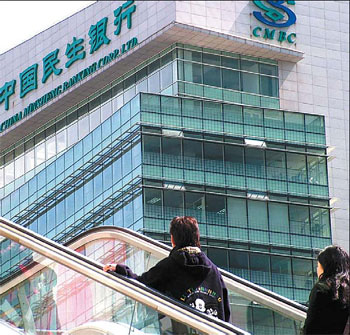 A China Minsheng Banking Corp office in Shanghai. China
Life Insurance Co and Ping An Insurance (Group) Co, the country's two largest
insurers, said they will each pay 5.45 billion yuan for shares (a respective
stake of 4.93 percent) of China Minsheng Banking Corp.
A China Minsheng Banking Corp office in Shanghai. China
Life Insurance Co and Ping An Insurance (Group) Co, the country's two largest
insurers, said they will each pay 5.45 billion yuan for shares (a respective
stake of 4.93 percent) of China Minsheng Banking Corp.
French food giant Danone said in Shanghai on Tuesday that
it still believes an amicable resolution to the dispute with Wahaha is possible.
Emmanuel Faber, who was appointed the new interim chairman of Wahaha by Danone
last week, said Danone hopes to reach an amicable resolution "with government
support." Faber said the next step was to hold a board meeting with Chinese
directors to discuss operations and management. The dispute did not interrupt
the operation of Wahaha but will affect the company's development, Faber said.
The feud between Danone and Wahaha, China's drink giant, began last year but was
made public in April. Danone has accused Hangzhou-based Wahaha of violating
their 1996 agreement by illegally setting up companies outside their joint
venture. Danone is demanding a 51-percent stake in the companies. Wahaha says
the joint venture agreement was never approved by China's trademark office and
so is invalid and unenforceable. Danone has filed a lawsuit in the United States
against the companies it says are using the Wahaha name to sell products outside
the scope of the original joint venture agreement. Zong Qinghou, founder of
Wahaha Group, resigned from his post as chairman of its 39 joint ventures with
its French partner Group Danone after the lawsuit began in the United States.
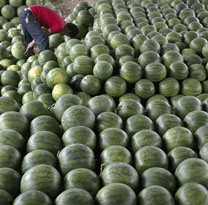 A vendor arranges watermelons at a
market in Nanjing June 12, 2007. The inflation in May hit the highest level in
27 months on rising pork and food stuff prices. A vendor arranges watermelons at a
market in Nanjing June 12, 2007. The inflation in May hit the highest level in
27 months on rising pork and food stuff prices.
China and the United States will
hold their fourth round of strategic dialogue in Washington from June 20 to 21,
Chinese Foreign Ministry spokesman Qin Gang announced here Tuesday. Chinese Vice
Foreign Minister Dai Bingguo and US Deputy Secretary of State John Negroponte
will co-chair the dialogue, Qin said. This dialogue mechanism, which is built in
accordance with the consensus reached by Chinese and US state leaders, is an
important platform for the two countries to communicate on strategic and
political level, the spokesman said. He said both sides will have an in-depth
exchange of views on major issues concerning China-US relations on the basis of
previous three rounds of dialogue.
Chairman and Chief Executive Officer
of the U.S.-based W. W. Grainger Inc. Richard L. Keyser on Tuesday was given the
Marco Polo Award, which honors American business people who support American
volunteer professionals working in China. Ji Yunshi, director of the State
Administration of Foreign Experts Affairs (SAFEA), presented Keyser with the
award in recognition of his contribution to exchanges of Sino-U.S. experts and
friendship between the two peoples. The SAFEA highly values cooperation with the
United States and hopes the Marco Polo Award to serve as a bridge linking the
two nations, said Zhang Jianguo, vice chairman of the SBFEA. According to
statistics from China Customs, 2.5 million foreign experts have worked in China
since 1978. At present, more than 240,000 come each year. "Grainger has a long
tradition of supporting the community where we do business, and now we are in
China ready to support the work of dedicated volunteers in economic development
and scientific work," said Keyser. The award, named after Marco Polo, the
Italian traveler who arrived in China in the 13th century and then introduced
Chinese civilization to western nations, was initiated by the China Project of
the Volunteers of America, a project that dispatches about 30 volunteers to work
in China every year in areas such as finance, securities, auditing, scientific
research, medicine, agriculture, industry, education, and business. Grainger, a
leading North America provider of facility maintenance products, established its
presence in China in 1995 and opened its first product distribution center in
China's financial hub of Shanghai in September 2006.
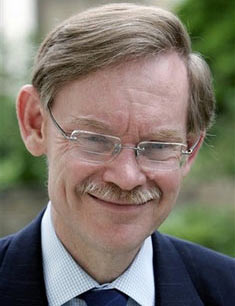 Robert
Zoellick, the U.S.'s nominee for the presidency of the World Bank, poses for a
photographer during a break in an international tour in London, June 11, 2007.
Zoellick, a vice chairman at Goldman Sachs and a former U.S. trade
representative, said his first priority as president would be to soothe the
wounded feelings of the institution's nearly 8,000 staff when he will succeed
outgoing president Paul Wolfowitz, who is to step down on June 30. Zoellick
defends China loans - Robert Zoellick, the next president of the World Bank,
defended lending to China in spite of the country's record currency reserves and
the fastest economic growth of any major economy. "China has grown a tremendous
degree, but if you get out in the countryside you still see there's an awful lot
of poverty," Zoellick said in his first interview since President George W. Bush
nominated him for the post on May 30. He added that aid to Africa will be his
top priority. In an hour-long discussion in Pretoria, South Africa, Zoellick
struck a conciliatory note, stressing the need to consult with employees and
member countries. Hostility from staff helped topple Paul Wolfowitz, who faced a
rebellion over his management style and a pay increase for a bank employee with
whom he was romantically involved. "It's been a period of turmoil," said
Zoellick, 53, wrapping up the African leg of a three-continent tour. "There's a
time now to sort of try to calm the waters and get people back on track."
Zoellick takes the helm as the World Bank seeks to raise more than $28 billion
from rich countries to help the poorest. The leadership change has also renewed
questions over whether the bank should lend to countries such as China, India
and Mexico, which can easily tap capital markets.
Robert
Zoellick, the U.S.'s nominee for the presidency of the World Bank, poses for a
photographer during a break in an international tour in London, June 11, 2007.
Zoellick, a vice chairman at Goldman Sachs and a former U.S. trade
representative, said his first priority as president would be to soothe the
wounded feelings of the institution's nearly 8,000 staff when he will succeed
outgoing president Paul Wolfowitz, who is to step down on June 30. Zoellick
defends China loans - Robert Zoellick, the next president of the World Bank,
defended lending to China in spite of the country's record currency reserves and
the fastest economic growth of any major economy. "China has grown a tremendous
degree, but if you get out in the countryside you still see there's an awful lot
of poverty," Zoellick said in his first interview since President George W. Bush
nominated him for the post on May 30. He added that aid to Africa will be his
top priority. In an hour-long discussion in Pretoria, South Africa, Zoellick
struck a conciliatory note, stressing the need to consult with employees and
member countries. Hostility from staff helped topple Paul Wolfowitz, who faced a
rebellion over his management style and a pay increase for a bank employee with
whom he was romantically involved. "It's been a period of turmoil," said
Zoellick, 53, wrapping up the African leg of a three-continent tour. "There's a
time now to sort of try to calm the waters and get people back on track."
Zoellick takes the helm as the World Bank seeks to raise more than $28 billion
from rich countries to help the poorest. The leadership change has also renewed
questions over whether the bank should lend to countries such as China, India
and Mexico, which can easily tap capital markets.
Sea World, a popular recreational centre in
southwest Shenzhen which is teeming with bars, restaurants and trendy shops, was
flooded by heavy rain early yesterday morning. "It's frightening - the whole
area now looks like a big swimming pool," said Philip McMaster, a visitor from
Hong Kong. No deaths or injuries were reported around Shenzhen. Torrential rain
fell on Shekou , the seaside district 20 minutes' drive from central Shenzhen
and 45 minutes by ferry from Kowloon, at around 2am yesterday morning. Shekou is
home to 80 per cent of the expatriates living in the Shenzhen area. "The speed
the water rose on the ground was staggering," said Mr McMaster. "Within 15
minutes it had risen to a metre." It took less than three hours to turn the
theme park, which includes a nine-deck ship and a 6 sq km plaza, into "a huge
reservoir", said Clara Li, a restaurant owner at the plaza. "I rushed here at
around 5am and what I saw was just too dramatic to be true," said Ms Li. "I
could see only the roof and the shop signs, and everything else was under the
water." The loss of her restaurant, Noble Tea House, would cost her 1.5 million
yuan, said Ms Li, who estimated losses of 1 million yuan for the owners of each
of the other bars and restaurants swamped by the floods. Most of the businesses
are owned by expatriates. "It only opened two months ago, and I've just
introduced several items for the coming dragon boat festival," she said.
June 12, 2007
 Hong Kong:
A survey made public on Monday by Hong Kong Continuing Professional Development
Alliance shows that more Hong Kong professionals than last year are having
duties related to mainland business and willing to seek opportunities in the
mainland. The alliance conducted a survey during April to May to study the trend
and intention of Hong Kong professionals working in or moving into the Chinese
mainland. More than 240 responses were received and most respondents mainly came
from marketing, accounting and finance, human resource and property management.
The survey revealed that 83 percent of the respondents currently have duties or
responsibilities related to business or operations in the mainland, which is 14
percent higher than last year's record. Respondents who reported to have a
higher proportion of business-related tasks in the mainland tend to be
professionals of the arbitration, accounting and marketing fields, with more
than 15 years of experience in their respective profession and at top managerial
level. About 73 percent of respondents told that they need to work in the
mainland and most of them, about 77 percent, worked in the first tier cities
like Beijing and Shanghai. The findings also show that more professionals have
moved to work in the second and third tier cities. For the coming two years,
nearly 70 percent of the respondents expected that the proportion of their
mainland business-related job contents will increase. According to the
chairperson of the alliance Virginia Choi, nearly half of the respondents said
they are actively seeking opportunities to develop career in the mainland due to
the more promising career prospect in the mainland, and that they want to
acquire experience in the mainland culture and practices for career development. Hong Kong:
A survey made public on Monday by Hong Kong Continuing Professional Development
Alliance shows that more Hong Kong professionals than last year are having
duties related to mainland business and willing to seek opportunities in the
mainland. The alliance conducted a survey during April to May to study the trend
and intention of Hong Kong professionals working in or moving into the Chinese
mainland. More than 240 responses were received and most respondents mainly came
from marketing, accounting and finance, human resource and property management.
The survey revealed that 83 percent of the respondents currently have duties or
responsibilities related to business or operations in the mainland, which is 14
percent higher than last year's record. Respondents who reported to have a
higher proportion of business-related tasks in the mainland tend to be
professionals of the arbitration, accounting and marketing fields, with more
than 15 years of experience in their respective profession and at top managerial
level. About 73 percent of respondents told that they need to work in the
mainland and most of them, about 77 percent, worked in the first tier cities
like Beijing and Shanghai. The findings also show that more professionals have
moved to work in the second and third tier cities. For the coming two years,
nearly 70 percent of the respondents expected that the proportion of their
mainland business-related job contents will increase. According to the
chairperson of the alliance Virginia Choi, nearly half of the respondents said
they are actively seeking opportunities to develop career in the mainland due to
the more promising career prospect in the mainland, and that they want to
acquire experience in the mainland culture and practices for career development.
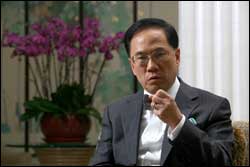 The stock market
would have collapsed and banks forced to raise interest rates by 50 percent had
the government not stepped in with HK$120 billion in 1998 to force speculators
to retreat, said Chief Executive Donald Tsang Yam-kuen. In an interview with The
Standard and its sister publications Sing Tao Daily and Eastweek, Tsang said he
informed then-premier Zhu Rongji of the move, which marked a turning point in
the Asian financial crisis. "I was pushed by [then-secretary for financial
services] Rafael Hui Si-yan and [former Monetary Authority deputy chief
executive] Norman Chan Tak-lam to make a quick decision as interest rates had
risen sharply and there was little time to hesitate," said Tsang, who was
financial secretary at the time. "With no loans and adequate fiscal reserves to
thwart a market collapse, we decided to go on the defensive. But the question
was when and how to retreat from the market and how to deal with the aftermath."
He said: "We briefed the then-chief executive [Tung Chee-hwa] on our proposal
for half an hour and received his staunch backing ... I launched the
intervention on August 13, 1998. The following day, I phoned then-premier Zhu
Rongji, who pledged his full support. "Fortunately, the battle lasted less than
two weeks - shorter than an anticipated two-month battle. As the global
speculative activities faded in Russia, we were better equipped with a stronger
stake in hand. We then turned to fight the speculators in the New York stock
market. "Many foreign speculators had expected us to fight till the Hang Seng
Index had climbed to 10,000 points, but we decided to make a sudden halt at
7,800, which was proposed by [Monetary Authority chief executive] Joseph Yam
Chi-kwong and Hui, who insisted such a move would give us good luck as the Hong
Kong dollar is pegged to the greenback at HK$7.80." The public listing of the
government's Tracker Fund was a rare opportunity. "The Tracker Fund turned a
crisis into opportunity. It benefited the entire community and cushioned the
impact of the government intervention in the stock market. We also introduced a
series of financial reforms, like merging the two exchanges and unifying the
clearing house system," Tsang said. Tsang said he was in anguish over the 1998
decision but that he had no choice. "We only intended to fight the vultures by
going back to step one. Norman Chan, Rafael Hui and I are all superstitious
about 7.8 as our lucky number, where our US peg-link stays and our index finally
hit rock bottom at 7,800. "The biggest headache was to find a way out of the
dire implications for the market as [the intervention] went against principles,
as well as [brought about] the political backlash. The Tracker Fund turned the
government into the biggest institutional investor in the market and we went for
a public launch to resolve the impasse. "The market intervention has been the
most agonizing experience in my 40-year career in public service, but it was
short-lived and less traumatic than the greatest challenge to Hong Kong - the
devastating SARS outbreak in 2003," Tsang said. Meanwhile, speaking in Hunan
Sunday, Tsang vowed that Hong Kong will continue to peg its currency to the US
dollar. He said Hong Kong has proved to the world it has the ability and the
resources to maintain the peg. The stock market
would have collapsed and banks forced to raise interest rates by 50 percent had
the government not stepped in with HK$120 billion in 1998 to force speculators
to retreat, said Chief Executive Donald Tsang Yam-kuen. In an interview with The
Standard and its sister publications Sing Tao Daily and Eastweek, Tsang said he
informed then-premier Zhu Rongji of the move, which marked a turning point in
the Asian financial crisis. "I was pushed by [then-secretary for financial
services] Rafael Hui Si-yan and [former Monetary Authority deputy chief
executive] Norman Chan Tak-lam to make a quick decision as interest rates had
risen sharply and there was little time to hesitate," said Tsang, who was
financial secretary at the time. "With no loans and adequate fiscal reserves to
thwart a market collapse, we decided to go on the defensive. But the question
was when and how to retreat from the market and how to deal with the aftermath."
He said: "We briefed the then-chief executive [Tung Chee-hwa] on our proposal
for half an hour and received his staunch backing ... I launched the
intervention on August 13, 1998. The following day, I phoned then-premier Zhu
Rongji, who pledged his full support. "Fortunately, the battle lasted less than
two weeks - shorter than an anticipated two-month battle. As the global
speculative activities faded in Russia, we were better equipped with a stronger
stake in hand. We then turned to fight the speculators in the New York stock
market. "Many foreign speculators had expected us to fight till the Hang Seng
Index had climbed to 10,000 points, but we decided to make a sudden halt at
7,800, which was proposed by [Monetary Authority chief executive] Joseph Yam
Chi-kwong and Hui, who insisted such a move would give us good luck as the Hong
Kong dollar is pegged to the greenback at HK$7.80." The public listing of the
government's Tracker Fund was a rare opportunity. "The Tracker Fund turned a
crisis into opportunity. It benefited the entire community and cushioned the
impact of the government intervention in the stock market. We also introduced a
series of financial reforms, like merging the two exchanges and unifying the
clearing house system," Tsang said. Tsang said he was in anguish over the 1998
decision but that he had no choice. "We only intended to fight the vultures by
going back to step one. Norman Chan, Rafael Hui and I are all superstitious
about 7.8 as our lucky number, where our US peg-link stays and our index finally
hit rock bottom at 7,800. "The biggest headache was to find a way out of the
dire implications for the market as [the intervention] went against principles,
as well as [brought about] the political backlash. The Tracker Fund turned the
government into the biggest institutional investor in the market and we went for
a public launch to resolve the impasse. "The market intervention has been the
most agonizing experience in my 40-year career in public service, but it was
short-lived and less traumatic than the greatest challenge to Hong Kong - the
devastating SARS outbreak in 2003," Tsang said. Meanwhile, speaking in Hunan
Sunday, Tsang vowed that Hong Kong will continue to peg its currency to the US
dollar. He said Hong Kong has proved to the world it has the ability and the
resources to maintain the peg.
 Hong Kong stock market investors need not be unduly
worried about adverse effects of possible A-share turmoil as the two markets
operate pretty much independently of each other, according to a former chairman
of the Hong Kong stock exchange, Charles Lee Yeh- kwong.
Hong Kong stock market investors need not be unduly
worried about adverse effects of possible A-share turmoil as the two markets
operate pretty much independently of each other, according to a former chairman
of the Hong Kong stock exchange, Charles Lee Yeh- kwong.
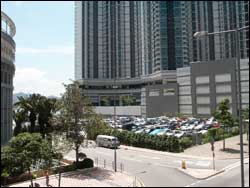 Leading
developers are set to take center stage in tomorrow's auction of a waterfront
residential site in West Kowloon, which analysts expect may fetch as much as
HK$6.2 billion. The auction results are expected to be a benchmark for the
housing market in the district, market watchers said. Located at Hoi Fai Road,
the 122,204-square-foot site adjacent to One SilverSea - which was developed by
Sino Land (0083) - is likely to draw bids from key developers and consortiums.
Those include Cheung Kong (Holdings) (0001), New World Development (0017), Sun
Hung Kai Properties (0016), Sino Land, Wheelock Properties (0049) and K Wah
International (0173), which have all indicated interest in the site. The Hoi Fai
Road auction was triggered by Wheelock Properties with a bid of HK$4.2 billion.
NWD managing director Henry Cheng Kar-shun said the company has yet to decide
whether to bid for the site solely or on a joint-venture basis. "However, we
will take a prudent approach in order to lower potential risk," Cheng said. CB
Richard Ellis' executive director of valuation and advisory services in Asia, Yu
Kam-hung, reckoned the site would sell for HK$5.8 billion, or HK$6,338 per
square foot. Leading
developers are set to take center stage in tomorrow's auction of a waterfront
residential site in West Kowloon, which analysts expect may fetch as much as
HK$6.2 billion. The auction results are expected to be a benchmark for the
housing market in the district, market watchers said. Located at Hoi Fai Road,
the 122,204-square-foot site adjacent to One SilverSea - which was developed by
Sino Land (0083) - is likely to draw bids from key developers and consortiums.
Those include Cheung Kong (Holdings) (0001), New World Development (0017), Sun
Hung Kai Properties (0016), Sino Land, Wheelock Properties (0049) and K Wah
International (0173), which have all indicated interest in the site. The Hoi Fai
Road auction was triggered by Wheelock Properties with a bid of HK$4.2 billion.
NWD managing director Henry Cheng Kar-shun said the company has yet to decide
whether to bid for the site solely or on a joint-venture basis. "However, we
will take a prudent approach in order to lower potential risk," Cheng said. CB
Richard Ellis' executive director of valuation and advisory services in Asia, Yu
Kam-hung, reckoned the site would sell for HK$5.8 billion, or HK$6,338 per
square foot.
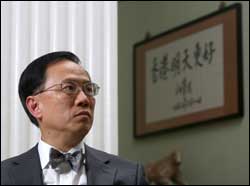 Chief Executive
Donald Tsang Yam- kuen has called for a greater sense of political realism in
the community to enable Hong Kong to step forward without allowing political
squabbles to threaten its status as an international financial center. Making
the appeal in an interview with The Standard and its sister publications Sing
Tao Daily and Eastweek, Tsang said most people in Hong Kong do not want to see
the SAR's economic success stagger because of the row. But he remains hopeful
there will be a breakthrough in the decade-long push for constitutional reform. Chief Executive
Donald Tsang Yam- kuen has called for a greater sense of political realism in
the community to enable Hong Kong to step forward without allowing political
squabbles to threaten its status as an international financial center. Making
the appeal in an interview with The Standard and its sister publications Sing
Tao Daily and Eastweek, Tsang said most people in Hong Kong do not want to see
the SAR's economic success stagger because of the row. But he remains hopeful
there will be a breakthrough in the decade-long push for constitutional reform.
China Export-Import Bank (EximBank) is set to issue 2 billion yuan (US$261
million) in yuan-denominated bonds in Hong Kong this month, making it the first
Chinese lender to do so, sources told Reuters on Monday. Exim Bank is to sell
the 3-year bonds only to institutional investors, an investment banking source
said, adding that the bank would decide on the yield later. A regulatory source
confirmed the details of the sale. China published rules on Friday governing
mainland financial institutions' issuance of yuan bonds in Hong Kong, fleshing
out a nod it gave in principle in January. Banking sources told Reuters in April
that five Chinese banks were each planning to issue about 2 billion yuan of
bonds in Hong Kong and that the first might happen in early summer. The banks
are EximBank, China Development Bank, Industrial and Commercial Bank of China
Ltd, Bank of China and Construction Bank of China, the sources said.
Nanyang Commercial Bank (NCB), a subsidiary of the Bank of China Hong Kong (BOCHK),
is likely to become the first overseas bank to directly transform into a
mainland corporate bank. The Hong Kong-incorporated NCB has applied to the China
Banking Regulatory Commission (CBRC) to become a mainland-registered corporate
bank and it will move its headquarters to Shanghai after CBRC grants its
approval. BOCHK executive Wang Yumin revealed that NCB will focus on high-end
Renminbi business after gaining mainland corporate bank status.
 Shanghai, Hong Kong, Singapore, NYSE, NASDAQ, London, Frankfurt... the list of
suitors for Chinese companies these days is just endless when it comes to
picking the right exchange to list. As the A-share market swings between an
ultra-wide band - and analysts are saying the market will continue to be like
this until 2008 - and overseas exchanges ease their rules to cozy up to new
listing candidates, Chinese companies suddenly find themselves swamped with
choices. In the last few months, NYSE has weaned away a few Chinese companies
that are believed to have been originally planning to head for NASDAQ. The
latest was Qiao Xing Mobile Communications Co Ltd, which controls CEC Telecom Co
Ltd (CECT), the fourth-biggest Chinese mobile phone maker. It made its debut on
the NYSE on May 3. The company was rumored to have been torn between NASDAQ and
Hong Kong Stock Exchange until it fell for NYSE. These days it's not uncommon
for Chinese companies in search of a home for its shares to be approached by
representatives of the two exchanges at the same time. And the results are
showing. Last year, six Chinese companies listed in NASDAQ and four in NYSE. In
just the first five months of this year, 10 companies have listed in NASDAQ and
five in NYSE. As the Chinese government clearly wants its large State-owned
enterprises to list at home, the NYSE, the largest bourse in the world, has been
chasing smaller - but perhaps more entrepreneurial - Chinese companies. Among
the 99 overseas IPOs last year, 86 came from the private sector. NASDAQ,
meanwhile, hasn't been sitting idle either. Going beyond its traditional focus
on the technology industry, it's been actively courting companies from
increasingly diverse trades, including services, manufacturing, healthcare and
media. On April 3, Bob Greifeld, president and CEO of NASDAQ, flew to Beijing.
Soon after landing, he rang a ceremonial bell in downtown Orient Plaza,
announcing the opening of the electronic market for the first time in China, and
then went off to release a NASDAQ China Index to track the performance of the 30
largest Chinese companies listed in the United States. Greifeld was like a man
on a mission. And a mission it was, of revenge. Almost on the same day, NASDAQ's
rival, the New York Stock Exchange Group, was celebrating its merger with
Euronext - thus leading to the creation of the first transatlantic bourse -
while NASDAQ failed to acquire the London Stock Exchange (LSE). "We focus with
great intensity on competition with NYSE. We are in the process of taking a part
of the floor of the NYSE 'board by board'," Greifeld said in Beijing. He was
trying to avenge losing Europe to his rival by securing China.
Shanghai, Hong Kong, Singapore, NYSE, NASDAQ, London, Frankfurt... the list of
suitors for Chinese companies these days is just endless when it comes to
picking the right exchange to list. As the A-share market swings between an
ultra-wide band - and analysts are saying the market will continue to be like
this until 2008 - and overseas exchanges ease their rules to cozy up to new
listing candidates, Chinese companies suddenly find themselves swamped with
choices. In the last few months, NYSE has weaned away a few Chinese companies
that are believed to have been originally planning to head for NASDAQ. The
latest was Qiao Xing Mobile Communications Co Ltd, which controls CEC Telecom Co
Ltd (CECT), the fourth-biggest Chinese mobile phone maker. It made its debut on
the NYSE on May 3. The company was rumored to have been torn between NASDAQ and
Hong Kong Stock Exchange until it fell for NYSE. These days it's not uncommon
for Chinese companies in search of a home for its shares to be approached by
representatives of the two exchanges at the same time. And the results are
showing. Last year, six Chinese companies listed in NASDAQ and four in NYSE. In
just the first five months of this year, 10 companies have listed in NASDAQ and
five in NYSE. As the Chinese government clearly wants its large State-owned
enterprises to list at home, the NYSE, the largest bourse in the world, has been
chasing smaller - but perhaps more entrepreneurial - Chinese companies. Among
the 99 overseas IPOs last year, 86 came from the private sector. NASDAQ,
meanwhile, hasn't been sitting idle either. Going beyond its traditional focus
on the technology industry, it's been actively courting companies from
increasingly diverse trades, including services, manufacturing, healthcare and
media. On April 3, Bob Greifeld, president and CEO of NASDAQ, flew to Beijing.
Soon after landing, he rang a ceremonial bell in downtown Orient Plaza,
announcing the opening of the electronic market for the first time in China, and
then went off to release a NASDAQ China Index to track the performance of the 30
largest Chinese companies listed in the United States. Greifeld was like a man
on a mission. And a mission it was, of revenge. Almost on the same day, NASDAQ's
rival, the New York Stock Exchange Group, was celebrating its merger with
Euronext - thus leading to the creation of the first transatlantic bourse -
while NASDAQ failed to acquire the London Stock Exchange (LSE). "We focus with
great intensity on competition with NYSE. We are in the process of taking a part
of the floor of the NYSE 'board by board'," Greifeld said in Beijing. He was
trying to avenge losing Europe to his rival by securing China.
 China: AmCham:
Stop pressuring China to revalue renminbi - The American Chamber of Commerce in
China (AmCham) on Friday urged the US government to stop putting pressure on
China to revalue the renminbi. The US-China trade balance issue could not be
addressed by forcing Chinese currency revaluation, said a White Paper presented
by AmCham to the 2007 China Trends Conference in Shanghai. China's steady reform
of its banking and overall financial infrastructure is considered key to the
full integration of China's currency globally, said the paper. The full global
integration of China's financial sector and the enforcement of protection of
intellectual property rights are also believed to be crucial factors
contributing to the long-term and sustainable growth of the two countries'
economies, the chamber noted. The chamber believes that the large and growing US
trade deficit with China should not serve as the definite measure of US-China
trade. AmCham members agreed that effective implementation of existing laws and
regulations, and the skillful and targeted use of WTO dispute mechanism are the
best means of dealing with shortcomings in the commercial relationship between
the two countries. The paper pointed to the important progress China has made in
reforming its capital market. It noted that the deepening of the reforms to
further open the capital market in China would allow for the removal of capital
controls and enable China to adopt a market-driven, flexible rate regime. AmCham
supports current efforts under the US-China Strategic Economic Dialogue (SED) to
encourage the greater participation of US financial sector firms, which is an
indispensable part of helping China build a stronger financial service sector.
In the past year, IPR enforcement was a key concern of AmCham members. The White
Paper shows that most US companies in China appreciate China's sustained efforts
in IPR protection. AmCham urges both sides to take the opportunities presented
by the SED and the US-China Joint Commission on Commerce and Trade later this
year to map out efforts to beef up China's IPR enforcement. AmCham also advised
the US government to offer overall coordination and support for US companies'
efforts to capture more opportunities in China. "China's rapidly expanding
economy and liberalizing markets have revolutionized international business,"
said an AmCham spokesman. "Businesspeople from all corners are looking to take
advantage of the ever-growing number of opportunities here."
China: AmCham:
Stop pressuring China to revalue renminbi - The American Chamber of Commerce in
China (AmCham) on Friday urged the US government to stop putting pressure on
China to revalue the renminbi. The US-China trade balance issue could not be
addressed by forcing Chinese currency revaluation, said a White Paper presented
by AmCham to the 2007 China Trends Conference in Shanghai. China's steady reform
of its banking and overall financial infrastructure is considered key to the
full integration of China's currency globally, said the paper. The full global
integration of China's financial sector and the enforcement of protection of
intellectual property rights are also believed to be crucial factors
contributing to the long-term and sustainable growth of the two countries'
economies, the chamber noted. The chamber believes that the large and growing US
trade deficit with China should not serve as the definite measure of US-China
trade. AmCham members agreed that effective implementation of existing laws and
regulations, and the skillful and targeted use of WTO dispute mechanism are the
best means of dealing with shortcomings in the commercial relationship between
the two countries. The paper pointed to the important progress China has made in
reforming its capital market. It noted that the deepening of the reforms to
further open the capital market in China would allow for the removal of capital
controls and enable China to adopt a market-driven, flexible rate regime. AmCham
supports current efforts under the US-China Strategic Economic Dialogue (SED) to
encourage the greater participation of US financial sector firms, which is an
indispensable part of helping China build a stronger financial service sector.
In the past year, IPR enforcement was a key concern of AmCham members. The White
Paper shows that most US companies in China appreciate China's sustained efforts
in IPR protection. AmCham urges both sides to take the opportunities presented
by the SED and the US-China Joint Commission on Commerce and Trade later this
year to map out efforts to beef up China's IPR enforcement. AmCham also advised
the US government to offer overall coordination and support for US companies'
efforts to capture more opportunities in China. "China's rapidly expanding
economy and liberalizing markets have revolutionized international business,"
said an AmCham spokesman. "Businesspeople from all corners are looking to take
advantage of the ever-growing number of opportunities here."
Chinese and Russian companies on Sunday inked a series of
contracts, ranging from agriculture to car-making, which are valued at about
US$2 billion.
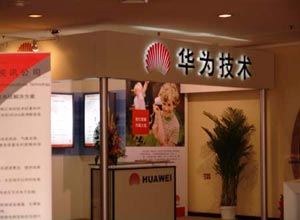 China's leading telecom
provider, Huawei Technologies Co. Ltd., will increase investment in Russia,
senior management officials said on Saturday. Huawei has set up jointly-funded
factories and labs in Russia with a total sales volume of 1.2 billion U.S.
dollars till 2006 and some 1,000 local employees. China's leading telecom
provider, Huawei Technologies Co. Ltd., will increase investment in Russia,
senior management officials said on Saturday. Huawei has set up jointly-funded
factories and labs in Russia with a total sales volume of 1.2 billion U.S.
dollars till 2006 and some 1,000 local employees.
China may entirely switch to non-food materials such as
cassva, sweet potato, sorgo and cellulose in producing ethanol fuel as a
substitute for petroleum, said a government official.
Silting in the Three Gorges Project has proved to be less
of a problem than anticipated, according to a project official. A dozen
hydrological stations collect data from the Three Gorges Reservoir. The data
shows that the amount of silt carried into the reservoir from the upper reaches
of the Yangtze River has averaged 200 million tons a year since June 2003, the
year when the Three Gorges Project first began to retain water. This is 50
percent less than anticipated, said Cao Guangjing, deputy general manager of
China Three Gorges Project Corporation. "The amount of silt washed into the
Three Gorges Reservoir last year was less than 100 million tons, 40 percent of
which was flushed downstream via the 23 low-set sluices in the dam, and this has
helped extend the life span of the reservoir," said Cai. Silting is one of the
key technical problems the Three Gorges Project builders had to conquer. Silting
directly affects the life span of the Three Gorges Reservoir, the servicing of
the navigable sections and the operation of turbines generating power.
Scientists, backed by serious funding, have been assigned to work on or monitor
the problem of silting in the Three Gorges Project. Zheng Shouren, a member of
the Chinese Academy of Engineering who was in charge of overall designs of the
Three Gorges Project, said the Three Gorges Reservoir could preserve its water
storage capacity by following the practice of discharging muddy water downstream
during the summer flood season on the Yangtze and retaining water after the
flood season is over each year. Data monitored by the Yangtze River Hydrological
Bureau show the amount of silt from the Jialing River, a main tributary of the
Yangtze on the upper reaches, has gone down by 60 percent. "A number of factors
explain why less silt is being swept into the reservoir: the construction of so
many hydropower stations on the upper mainstream of the Yangtze and its
tributaries, water and soil conservation projects, the reversion of farmland to
forest, and sand dredging in the upper reaches of the Yangtze," said Zheng, who
predicted silt inflows would continue to decline. The Three Gorges Project, the
world's largest water control facility launched in 1993, is located on the
middle reaches of the Yangtze River. It boasts a 185-meter-high dam, completed
in June 2006, and a five-tier ship lock, and necessitated the resettlement of at
least 1.2 million people. Electricity generation now spans the two banks, with
the first turbine generator on the right bank of the river going into operation
on Monday after a 72-hour trial. The 14 turbines on the left bank of the Gorges
began operation in September 2005. The very first turbine started producing
electricity almost four years ago, in July 2003. The installation of the 12
turbines on the right bank -- eight domestically made ones and four imported
turbines -- began last June and is expected to be completed next year. The
hydroelectric project plans to produce 370 billion kwh of electricity in the
2006-2010 period, according to Cao. The electricity will be transmitted to power
grids in central, eastern and southern China. The dam, 2,309 meters long and 185
meters high, was completed in May last year and the water level in the reservoir
was raised to 156 meters from 135 meters in October. The dam had been designed
to help minimize damage caused by floods that might occur only once every 1,000
years.
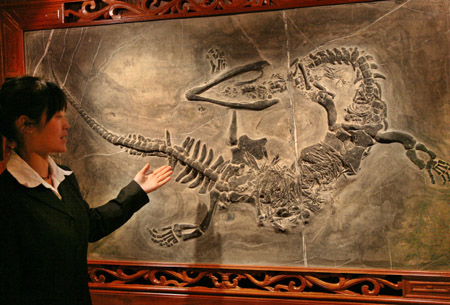 An interpreter introduces the fossil
of a Keichousaurus which measures 2.7 meters long and has two horns at a museum
in Anshun, east China's Anhui Province, June 10, 2007. The limestone also shows
three other small dinosaurs which is rare to find.
An interpreter introduces the fossil
of a Keichousaurus which measures 2.7 meters long and has two horns at a museum
in Anshun, east China's Anhui Province, June 10, 2007. The limestone also shows
three other small dinosaurs which is rare to find.
China's trade surplus soared 73
percent in May from a year earlier to US$22.45 billion, Xinhua reported, citing
data from the customs bureau.
Chinese stocks laddered up toward
the 4,000-point psychological mark today. The Shanghai Composite Index closed at
3,995.68, up 2.11 percent from previous closing.
June 11, 2007
 Hong Kong:
More than half of the scenes featuring Hong Kong star Chow Yun-fat in "Pirates
of the Caribbean III" have been cut for its Chinese mainland release on June 12,
including his recitation of a poem in Cantonese, Youth Daily reported today.
Chow plays the role as Captain Sao Feng, a Singapore's pirate, who saves Jack
Sparrow (Johnny Depp) from the world of the dead. Chow's performance lasts for
20 to 30 minutes in the version released around the world but in the domestic
version, it has been cut to at most 10 minutes. In the Hollywood version, the
captain recites a poem by Tang dynasty poet Li Bai (701¡ª762), the greatest of
the romantic poets of ancient China, in one scene in which he appears with
co-star Keira Knightly. The poem "Guan Shan Yue" (The Moon Shining over the
Mountain on the Border) tells of the lonely life of an expat, which accords with
the mood of the captain who is wandering far from his hometown. Chow recites the
poem in Cantonese while the words are seen in English. The scene impressed the
audience when the movie was shown at the Cannes Film Festival earlier this year.
But this scene was cut from the domestic version, a reporter based in Beijing
who saw the movie's media screening told the newspaper. Chow plays as a key
figure in two scenes in the original version. The domestic version has cut the
first one which reveals the background of Captain Sao Feng. The sudden debut of
the captain confused the audience at the Beijing screening. The captain is
quickly killed and the loss of the introduction weakens the role, the report
said. Another scene with huge Chinese constructions at the beginning of the
movie has also been cut. China's film watchdog had said earlier that the cut
scenes involved too much violence and horror, the report said. Hong Kong:
More than half of the scenes featuring Hong Kong star Chow Yun-fat in "Pirates
of the Caribbean III" have been cut for its Chinese mainland release on June 12,
including his recitation of a poem in Cantonese, Youth Daily reported today.
Chow plays the role as Captain Sao Feng, a Singapore's pirate, who saves Jack
Sparrow (Johnny Depp) from the world of the dead. Chow's performance lasts for
20 to 30 minutes in the version released around the world but in the domestic
version, it has been cut to at most 10 minutes. In the Hollywood version, the
captain recites a poem by Tang dynasty poet Li Bai (701¡ª762), the greatest of
the romantic poets of ancient China, in one scene in which he appears with
co-star Keira Knightly. The poem "Guan Shan Yue" (The Moon Shining over the
Mountain on the Border) tells of the lonely life of an expat, which accords with
the mood of the captain who is wandering far from his hometown. Chow recites the
poem in Cantonese while the words are seen in English. The scene impressed the
audience when the movie was shown at the Cannes Film Festival earlier this year.
But this scene was cut from the domestic version, a reporter based in Beijing
who saw the movie's media screening told the newspaper. Chow plays as a key
figure in two scenes in the original version. The domestic version has cut the
first one which reveals the background of Captain Sao Feng. The sudden debut of
the captain confused the audience at the Beijing screening. The captain is
quickly killed and the loss of the introduction weakens the role, the report
said. Another scene with huge Chinese constructions at the beginning of the
movie has also been cut. China's film watchdog had said earlier that the cut
scenes involved too much violence and horror, the report said.
US Treasuries dropped for a second
straight day Friday on expectations that accelerating economic growth and
inflation will encourage central banks around the world to raise interest rates,
causing the 10-year Treasury yield to surge to the highest since July and
triggering a global equity sell-off.
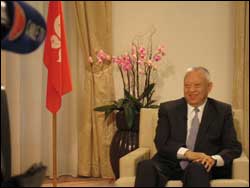 Former chief executive Tung Chee-hwa has
revealed he considered unpegging the exchange rate system with the US dollar
during the financial crisis in 2002, but could not do it because it contradicted
the government's "commitment to the peg." In an interview with Cable TV, Tung
said he had to make a very tough decision - between increasing taxes and
unpegging the exchange rate - at the end of 2002. "At that time, then-financial
secretary Antony Leung Kam-chung and chief executive of the Hong Kong Monetary
Authority, Joseph Yam Chi- kwong, came to me and said there were some financial
sharks attacking the linked exchange rate system. There were two choices - unpeg
the linked exchange rate or raise taxes. I had considered unpegging it," Tung
said. But, eventually, he chose to increase taxes and cut government
expenditure. "There were other problems - SARS and a high unemployment rate. The
only way out was to cut or redress the government budget. I know the public
might not accept higher taxes, but that had to be the way." He said history
would decide whether the decision was right or wrong. The HKMA has repeatedly
reiterated the territory's commitment to maintaining the currency link with the
United States in spite of the appreciation of the yuan. Chief Executive Donald
Tsang Yam-kuen has even said the peg should last until at least 2047, and the
government has no intention of giving up the peg. Yam also said last November in
his online column Viewpoint that the government is firmly committed to
maintaining the linkage system that has helped stabilize the monetary system
since its adoption in 1983. "It's quite clear to me that market participants
well understand that the Hong Kong government remains committed to the linked
exchange rate system and that there is no logical reason why appreciation in the
renminbi exchange rate should lead to any change." Tung also said SARS gave him
the hardest time during his eight-year rule. "During the epidemic, I read about
the number of deaths and the number of people who got infected every day. I
thought I was the chief of Hong Kong. It was my responsibility. I was under a
lot of pressure at that time." But when asked if he ever regretted taking up the
top post, Tung said he would take up the job again if he was offered. He also
said he was not worried about Hong Kong's financial growth or the economic
threat from the mainland. "We don't have any such problem. The mainland economy
and ours will work together. "It's a win-win situation. For example, QDII
[Qualified Domestic Institutional Investor scheme] is another proof of the
support from the mainland government. It ensures our financial growth and
development." But Tung said Hong Kong must have a strong financial system to
ensure healthy economic growth as it is facing competition from other countries.
"The central government is in support of Hong Kong, but there're a lot of
competitors like New York, Singapore and London. They would like to take the job
of listing Chinese companies from Hong Kong." Former chief executive Tung Chee-hwa has
revealed he considered unpegging the exchange rate system with the US dollar
during the financial crisis in 2002, but could not do it because it contradicted
the government's "commitment to the peg." In an interview with Cable TV, Tung
said he had to make a very tough decision - between increasing taxes and
unpegging the exchange rate - at the end of 2002. "At that time, then-financial
secretary Antony Leung Kam-chung and chief executive of the Hong Kong Monetary
Authority, Joseph Yam Chi- kwong, came to me and said there were some financial
sharks attacking the linked exchange rate system. There were two choices - unpeg
the linked exchange rate or raise taxes. I had considered unpegging it," Tung
said. But, eventually, he chose to increase taxes and cut government
expenditure. "There were other problems - SARS and a high unemployment rate. The
only way out was to cut or redress the government budget. I know the public
might not accept higher taxes, but that had to be the way." He said history
would decide whether the decision was right or wrong. The HKMA has repeatedly
reiterated the territory's commitment to maintaining the currency link with the
United States in spite of the appreciation of the yuan. Chief Executive Donald
Tsang Yam-kuen has even said the peg should last until at least 2047, and the
government has no intention of giving up the peg. Yam also said last November in
his online column Viewpoint that the government is firmly committed to
maintaining the linkage system that has helped stabilize the monetary system
since its adoption in 1983. "It's quite clear to me that market participants
well understand that the Hong Kong government remains committed to the linked
exchange rate system and that there is no logical reason why appreciation in the
renminbi exchange rate should lead to any change." Tung also said SARS gave him
the hardest time during his eight-year rule. "During the epidemic, I read about
the number of deaths and the number of people who got infected every day. I
thought I was the chief of Hong Kong. It was my responsibility. I was under a
lot of pressure at that time." But when asked if he ever regretted taking up the
top post, Tung said he would take up the job again if he was offered. He also
said he was not worried about Hong Kong's financial growth or the economic
threat from the mainland. "We don't have any such problem. The mainland economy
and ours will work together. "It's a win-win situation. For example, QDII
[Qualified Domestic Institutional Investor scheme] is another proof of the
support from the mainland government. It ensures our financial growth and
development." But Tung said Hong Kong must have a strong financial system to
ensure healthy economic growth as it is facing competition from other countries.
"The central government is in support of Hong Kong, but there're a lot of
competitors like New York, Singapore and London. They would like to take the job
of listing Chinese companies from Hong Kong."
The yuan might become a reserve currency in "the fullness
of time," with its growing importance as a global currency and the mainland's
policy of gradually moving towards full and free convertibility, the Hong Kong
Monetary Authority said Thursday.
Most of the amendments put forward by pan-democratic
members of the Legislative Council in the past few days to the planned merger of
the Mass Transit Railway and the Kowloon-Canton Railway have been voted down as
debate continued into Thursday night.
Tom Online (8282) , a media company controlled by
billionaire Li Ka-shing, will seek shareholder approval today to postpone the
vote on its delisting proposal because it expects only a few American depositary
receipt holders to participate.
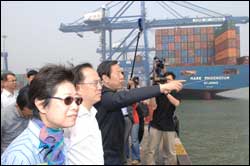 National People's Congress chairman Wu
Bangguo and other mainland law experts are not attempting to set up a new
framework for discussion on Hong Kong's political advancement, Chief Executive
Donald Tsang Yam-kuen said Thursday. Wu, he said, was merely pointing out the
rationale behind the Basic Law. But former chief secretary Anson Chan Fang
On-sang, a former colleague of Tsang, was worried by Wu's comments Wednesday.
Tsang, who was rounding off an official tour of Tianjin, was pressed by
journalists to respond to the comments by the NPC chairman at a Basic Law
seminar in Beijing, in which the second- ranked Politburo state leader bluntly
noted that the territory has only as much power as the central government
authorizes. The remarks sent shock waves through political parties and pundits
alike that Beijing may be taking a tougher line in the continuing row over the
democratic development of the SAR. "The issues concerning residual powers and
the separation of powers have already been discussed at the Joint Declaration
discussions more than 10 years ago. China owns our sovereignty and our autonomy
is granted by the central government, as clearly stated in the Basic Law. I
don't think these should be matters of discussion nowadays," Tsang said. He
stressed the Judiciary in Hong Kong has always been independent and effective.
"The independence [of the Judiciary] has been apparent in the 10 years since the
handover and is to continue in the future, and I believe there is no reason for
the public to worry," he said, adding that both the central and Hong Kong
governments have always abided by the laws. The chief executive also reiterated
that various sectors of Hong Kong must be willing to compromise and accommodate
to reach the final goal of achieving universal suffrage. After spending the day
visiting the northeastern city, including stops at Tianjin Port where he was
accompanied by Tianjin mayor Dai Xianglong, Tsang will continue his study tour
in the Hunan city of Changsha today before returning to Hong Kong. However, Chan
said she was personally worried about the stern comments made by Wu, who
emphasized that, with an executive-led government, Hong Kong should not blindly
follow US or British models. "The separation of three powers is greatly
effective in checking and monitoring each other, and is also the guiding
principle behind the idea of `one country, two systems' and our high degree of
autonomy," Chan said after attending an inauguration ceremony for the
Professional Commons, a 50-strong pan-democratic group chaired by Civic Party
vice chairman Albert Lai Kwong-tak, which is concerned with issues such as
achieving full democracy in 2012. "I think both the central and the SAR
governments should clarify soon whether the Judiciary is independent from
government interference," Chan said. National People's Congress chairman Wu
Bangguo and other mainland law experts are not attempting to set up a new
framework for discussion on Hong Kong's political advancement, Chief Executive
Donald Tsang Yam-kuen said Thursday. Wu, he said, was merely pointing out the
rationale behind the Basic Law. But former chief secretary Anson Chan Fang
On-sang, a former colleague of Tsang, was worried by Wu's comments Wednesday.
Tsang, who was rounding off an official tour of Tianjin, was pressed by
journalists to respond to the comments by the NPC chairman at a Basic Law
seminar in Beijing, in which the second- ranked Politburo state leader bluntly
noted that the territory has only as much power as the central government
authorizes. The remarks sent shock waves through political parties and pundits
alike that Beijing may be taking a tougher line in the continuing row over the
democratic development of the SAR. "The issues concerning residual powers and
the separation of powers have already been discussed at the Joint Declaration
discussions more than 10 years ago. China owns our sovereignty and our autonomy
is granted by the central government, as clearly stated in the Basic Law. I
don't think these should be matters of discussion nowadays," Tsang said. He
stressed the Judiciary in Hong Kong has always been independent and effective.
"The independence [of the Judiciary] has been apparent in the 10 years since the
handover and is to continue in the future, and I believe there is no reason for
the public to worry," he said, adding that both the central and Hong Kong
governments have always abided by the laws. The chief executive also reiterated
that various sectors of Hong Kong must be willing to compromise and accommodate
to reach the final goal of achieving universal suffrage. After spending the day
visiting the northeastern city, including stops at Tianjin Port where he was
accompanied by Tianjin mayor Dai Xianglong, Tsang will continue his study tour
in the Hunan city of Changsha today before returning to Hong Kong. However, Chan
said she was personally worried about the stern comments made by Wu, who
emphasized that, with an executive-led government, Hong Kong should not blindly
follow US or British models. "The separation of three powers is greatly
effective in checking and monitoring each other, and is also the guiding
principle behind the idea of `one country, two systems' and our high degree of
autonomy," Chan said after attending an inauguration ceremony for the
Professional Commons, a 50-strong pan-democratic group chaired by Civic Party
vice chairman Albert Lai Kwong-tak, which is concerned with issues such as
achieving full democracy in 2012. "I think both the central and the SAR
governments should clarify soon whether the Judiciary is independent from
government interference," Chan said.
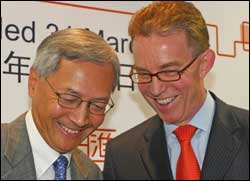 The Link REIT (0823),
which runs former government shopping malls, has exceeded its initial public
offering forecast for its 2007 total distribution per unit by 9.2 percent,
thanks to higher rental income. The real estate investment trust squeezed out
total distributable income of HK$1.44 billion for the financial year ended March
31, compared to HK$467 million for the period from listing in November 2005 to
March 2006. It declared a final distribution per unit of 34.62 HK cents.
Together with the interim DPU of 32.81 HK cents, final DPU is 67.43 HK cents,
bettering its IPO estimate by 9.2 percent, and representing a distribution yield
of 6.55 percent based on its final IPO price of HK$10.30. Total revenues,
including retail and carpark rents, for the fiscal year was HK$3.95 billion.
Average base unit rent at March 31 was HK$23.6 per square foot, compared to
HK$23 last year. Its composite reversion rate or rent increase was 9.87 percent
for the year. Occupancy rate was 90.3 percent, up from 91.2 percent last year.
Its retention rate fell from 93.4 percent to 78.7 percent which chief executive
Victor So Hing-woh attributed to renovations at its malls, which meant some
tenants had to close and leave. Director for project and planning Ball Wong
Kim-wing said The Link will spend HK$600 million in capital expenditures in
2007-08 in its ongoing mall renovation plan, double the nearly HK$300 million
spent the year before. The Link REIT (0823),
which runs former government shopping malls, has exceeded its initial public
offering forecast for its 2007 total distribution per unit by 9.2 percent,
thanks to higher rental income. The real estate investment trust squeezed out
total distributable income of HK$1.44 billion for the financial year ended March
31, compared to HK$467 million for the period from listing in November 2005 to
March 2006. It declared a final distribution per unit of 34.62 HK cents.
Together with the interim DPU of 32.81 HK cents, final DPU is 67.43 HK cents,
bettering its IPO estimate by 9.2 percent, and representing a distribution yield
of 6.55 percent based on its final IPO price of HK$10.30. Total revenues,
including retail and carpark rents, for the fiscal year was HK$3.95 billion.
Average base unit rent at March 31 was HK$23.6 per square foot, compared to
HK$23 last year. Its composite reversion rate or rent increase was 9.87 percent
for the year. Occupancy rate was 90.3 percent, up from 91.2 percent last year.
Its retention rate fell from 93.4 percent to 78.7 percent which chief executive
Victor So Hing-woh attributed to renovations at its malls, which meant some
tenants had to close and leave. Director for project and planning Ball Wong
Kim-wing said The Link will spend HK$600 million in capital expenditures in
2007-08 in its ongoing mall renovation plan, double the nearly HK$300 million
spent the year before.
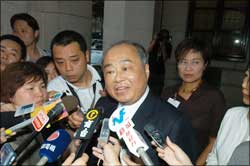 Hong Kong's
controversial rail merger is back on track after lawmakers gave the go-ahead
following a marathon debate. The proposed tie-up between the MTR Corp and
Kowloon-Canton Railway Corp, which had been blocked many times by government
opponents fearing monopolization, was finally endorsed by 30 to 17 votes in the
Legislative Council Friday after 24 hours of debate over the past three days.
There was only one abstention. All 11 amendments to the Rail Merger Bill, mostly
proposed by government critics, were rejected. The bill was backed by
pro-government parties, including the Democratic Alliance for the Betterment and
Progress of Hong Kong and the business-oriented Liberal Party. The merger is
expected to be completed by the end of the year, subject to approval by minority
shareholders of MTRC, in which the government has a controlling 76 percent
stake. Critics of the merger and legislators from the pro-Beijing camp engaged
in a war of words before the bill was passed, with both sides accusing each
other of ignoring the public's welfare. Democrat Andrew Cheng Kar-foo condemned
the DAB for keeping silent throughout the debate and failing to explain why it
supported the merger plan although the deal would not include fare cuts for the
Light Rail and there would be no public toilets at stations. "They chose to
remain silent, and they supported the government blindly," Cheng said, while
expressing appreciation for independent lawmaker Chim Pui-chung's call on
members to vote with conscience. Tam Yiu-chung of the DAB hit back, saying their
silence was because they did not want to follow other parties in using tactics
to stall the bill. Fellow DAB member Lau Kong- wah hailed the passage of the
bill, saying it will benefit the public, which will enjoy immediate fare
reductions and a two-year fare freeze. Democratic Party chief Albert Ho Chun-yan
said it was a shame that some kept silent. Mandy Tam Heung-man of the Civic
Party said passage of the bill will mean the government and the Legislative
Council will lose power to monitor railway fares in future. Secretary for the
Environment, Transport and Works Sarah Liao Sau- tung said the merger will
create synergy which, in turn, will create an opportunity for fare cuts. A
spokesman for the Environment, Transport and Works Bureau said: "With the
passage of the Rail Merger Bill today, we will submit the relevant subsidiary
legislation to the Legislative Council, which has already set up the
Subcommittee to Study the Draft Subsidiary Legislation Relating to the Rail
Merger. "We hope the legislative procedures for approving the subsidiary
legislation can be completed before the current Legislative Council session ends
on July 11. "MTR Corporation will then immediately proceed with the necessary
steps required under the listing rules and convene an extraordinary general
meeting. If the merger proposal is approved by the minority shareholders of MTRC,
the two railway companies will prepare for merger implementation. "These
procedures are expected to be completed within a few months after completion of
the legislative process." The spokesman said merging the two rail systems can
create synergy, which creates an opportunity for fare reduction. A total of 2.8
million daily rail passenger trips will benefit from reduced fares from day one
of the merger. MTRC has also said there would be no fare increase up to June
2009. MTRC chief executive Chow Chung-kong said the corporation will call for an
extraordinary shareholders' meeting in September, and he is confident the
company will get support from minority shareholders. If more than half of the
shareholders vote for the merger, it will take place by the end of this year.
Chow said he understood the public's petition for fare cuts in the Light Rail
and assured that the new rail company will study the issue. Ko Pak-kwan,
chairman of the KCRC Workers' Union, said the staff look forward to the merger,
saying they have been assured their jobs are safe and they will be treated
fairly. KCRC Operating Staff Association chairperson Rainbow Lau Choi-hung hopes
the new company will communicate with staff to help cope with changes. But MTR
staff union chief Chan Sin-wo expressed concern over their staff's future since
many details have yet to be thrashed out, particularly job arrangements. All the
proposals put forward by democrats, included setting up a railway development
fund, and installing automatic platform screens at all MTR stations, were voted
down Thursday. Legco debated Friday for more than six hours on three amendments
on the installation of public toilets, noise and future development rights
Friday. All amendments were vetoed. Cheng, who proposed installing toilets in
all underground MTR stations, said they were for the the public. Independent
"Long Hair" Leung Kwok- hung also questioned why there are staff toilets at MTR
stations but no public toilets, saying the public's interest should come first.
Liao argued that installing public toilets in underground stations would involve
construction difficulties, adding the MTRC will build toilets inside or near
stations when they build new ones. Democrat Lee Wing-tat suggested open tenders
for property development rights at MTR stations. He said the current practice of
not having an open tender on land the MTR develops property is not fair. He said
it provides a form of indirect subsidy to private developers since the MTRC
develops property with private developers, with the land sold to MTR below
market prices. Transport chief Liao said the current financing of railway
development is an effective way for railway and property management. Hong Kong's
controversial rail merger is back on track after lawmakers gave the go-ahead
following a marathon debate. The proposed tie-up between the MTR Corp and
Kowloon-Canton Railway Corp, which had been blocked many times by government
opponents fearing monopolization, was finally endorsed by 30 to 17 votes in the
Legislative Council Friday after 24 hours of debate over the past three days.
There was only one abstention. All 11 amendments to the Rail Merger Bill, mostly
proposed by government critics, were rejected. The bill was backed by
pro-government parties, including the Democratic Alliance for the Betterment and
Progress of Hong Kong and the business-oriented Liberal Party. The merger is
expected to be completed by the end of the year, subject to approval by minority
shareholders of MTRC, in which the government has a controlling 76 percent
stake. Critics of the merger and legislators from the pro-Beijing camp engaged
in a war of words before the bill was passed, with both sides accusing each
other of ignoring the public's welfare. Democrat Andrew Cheng Kar-foo condemned
the DAB for keeping silent throughout the debate and failing to explain why it
supported the merger plan although the deal would not include fare cuts for the
Light Rail and there would be no public toilets at stations. "They chose to
remain silent, and they supported the government blindly," Cheng said, while
expressing appreciation for independent lawmaker Chim Pui-chung's call on
members to vote with conscience. Tam Yiu-chung of the DAB hit back, saying their
silence was because they did not want to follow other parties in using tactics
to stall the bill. Fellow DAB member Lau Kong- wah hailed the passage of the
bill, saying it will benefit the public, which will enjoy immediate fare
reductions and a two-year fare freeze. Democratic Party chief Albert Ho Chun-yan
said it was a shame that some kept silent. Mandy Tam Heung-man of the Civic
Party said passage of the bill will mean the government and the Legislative
Council will lose power to monitor railway fares in future. Secretary for the
Environment, Transport and Works Sarah Liao Sau- tung said the merger will
create synergy which, in turn, will create an opportunity for fare cuts. A
spokesman for the Environment, Transport and Works Bureau said: "With the
passage of the Rail Merger Bill today, we will submit the relevant subsidiary
legislation to the Legislative Council, which has already set up the
Subcommittee to Study the Draft Subsidiary Legislation Relating to the Rail
Merger. "We hope the legislative procedures for approving the subsidiary
legislation can be completed before the current Legislative Council session ends
on July 11. "MTR Corporation will then immediately proceed with the necessary
steps required under the listing rules and convene an extraordinary general
meeting. If the merger proposal is approved by the minority shareholders of MTRC,
the two railway companies will prepare for merger implementation. "These
procedures are expected to be completed within a few months after completion of
the legislative process." The spokesman said merging the two rail systems can
create synergy, which creates an opportunity for fare reduction. A total of 2.8
million daily rail passenger trips will benefit from reduced fares from day one
of the merger. MTRC has also said there would be no fare increase up to June
2009. MTRC chief executive Chow Chung-kong said the corporation will call for an
extraordinary shareholders' meeting in September, and he is confident the
company will get support from minority shareholders. If more than half of the
shareholders vote for the merger, it will take place by the end of this year.
Chow said he understood the public's petition for fare cuts in the Light Rail
and assured that the new rail company will study the issue. Ko Pak-kwan,
chairman of the KCRC Workers' Union, said the staff look forward to the merger,
saying they have been assured their jobs are safe and they will be treated
fairly. KCRC Operating Staff Association chairperson Rainbow Lau Choi-hung hopes
the new company will communicate with staff to help cope with changes. But MTR
staff union chief Chan Sin-wo expressed concern over their staff's future since
many details have yet to be thrashed out, particularly job arrangements. All the
proposals put forward by democrats, included setting up a railway development
fund, and installing automatic platform screens at all MTR stations, were voted
down Thursday. Legco debated Friday for more than six hours on three amendments
on the installation of public toilets, noise and future development rights
Friday. All amendments were vetoed. Cheng, who proposed installing toilets in
all underground MTR stations, said they were for the the public. Independent
"Long Hair" Leung Kwok- hung also questioned why there are staff toilets at MTR
stations but no public toilets, saying the public's interest should come first.
Liao argued that installing public toilets in underground stations would involve
construction difficulties, adding the MTRC will build toilets inside or near
stations when they build new ones. Democrat Lee Wing-tat suggested open tenders
for property development rights at MTR stations. He said the current practice of
not having an open tender on land the MTR develops property is not fair. He said
it provides a form of indirect subsidy to private developers since the MTRC
develops property with private developers, with the land sold to MTR below
market prices. Transport chief Liao said the current financing of railway
development is an effective way for railway and property management.
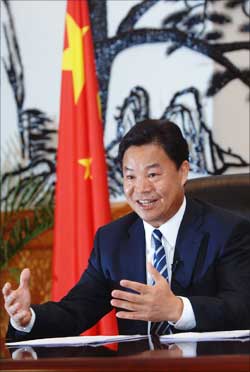 Beijing and Hong Kong have moved to contain the fallout
from remarks on the SAR's autonomy by National People's Congress chief Wu
Bangguo, and to forestall plans by the pro- democratic camp to stage a massive
protest during the visit of President Hu Jintao July 1. Lu Xinhua, commissioner
of the Foreign Ministry in Hong Kong, denied Friday that the central government
is extending a tighter grip on the territory. On the contrary, he told local
journalists, all decisions made by central leaders are for the good of Hong
Kong. "How can state leaders not care for Hong Kong? These worries are
unnecessary," Lu said. At a Basic Law seminar in Beijing Tuesday, attended by
top Hong Kong officials, including Chief Executive Donald Tsang Yam-kuen, Wu
said the SAR could not hope to get more autonomy than what is granted to it by
the central government. Former chief secretary for administration Anson Chan
Fang On-sang joined in the controversy, urging central leaders to alleviate
local fears that Beijing is tightening its grip on Hong Kong. Lu also assured
foreign investors they need not fear about Hong Kong's autonomy and its future
as the central government has been supporting the territory's development on all
fronts. A well-informed pro-Beijing source said the central government is aware
that some pan- democrats have been trying to take advantage of the backlash over
Wu's comments, and stir a row in order to fuel a big rally they have planned
during the forthcoming visit of Hu, who will preside over the inauguration of
Tsang's new administration. "Unlike the hands-off stance over the controversial
Article 23 legislation, Beijing leaders have now clearly stated their position -
that Hong Kong's political reform should fall within the orbit of the Basic Law
to avert a possible confrontation over universal suffrage," the source said.
Executive Council convener Leung Chun- ying, a former secretary-general of the
Basic Law Consultative Committee, said Friday constitutional reform is far more
complicated than picking a date for universal suffrage. In an article published
in the Chinese- language daily Ming Pao, he said: "Political reform involves the
Hong Kong leader's dual accountability - to Hong Kong and the central
government, a two-part election as stipulated in the Basic Law, starting with
nominations by consultation or election before universal suffrage polling,
followed by appointment by the central government. "Universal suffrage is one of
the three steps in the process. "The political structure, as stipulated in the
Basic Law, is an intact and well-thought design. Besides the well-defined
universal suffrage process, one should bear in mind the accountability of the
chief executive as well as Hong Kong's autonomy are limited by the central
government." Leung defended Wu's remarks that Hong Kong is unique with its high
degree of autonomy and election arrangements, and is not a carbon copy of the
format of other countries. "Unlike London mayor Ken Livingstone, mayor Michael
Bloomberg of New York City and Tokyo governor Shintaro Ishihara who are returned
on a one-man-one-vote basis, the mandate of Hong Kong's leader is authorized by
the central government under its high degree of autonomy. "Should the content of
our democratic development and electoral arrangements differ from other cities
in the world? "Should universal suffrage for the chief executive election be a
matter of timing?" the veteran Basic Law adviser asked.
Beijing and Hong Kong have moved to contain the fallout
from remarks on the SAR's autonomy by National People's Congress chief Wu
Bangguo, and to forestall plans by the pro- democratic camp to stage a massive
protest during the visit of President Hu Jintao July 1. Lu Xinhua, commissioner
of the Foreign Ministry in Hong Kong, denied Friday that the central government
is extending a tighter grip on the territory. On the contrary, he told local
journalists, all decisions made by central leaders are for the good of Hong
Kong. "How can state leaders not care for Hong Kong? These worries are
unnecessary," Lu said. At a Basic Law seminar in Beijing Tuesday, attended by
top Hong Kong officials, including Chief Executive Donald Tsang Yam-kuen, Wu
said the SAR could not hope to get more autonomy than what is granted to it by
the central government. Former chief secretary for administration Anson Chan
Fang On-sang joined in the controversy, urging central leaders to alleviate
local fears that Beijing is tightening its grip on Hong Kong. Lu also assured
foreign investors they need not fear about Hong Kong's autonomy and its future
as the central government has been supporting the territory's development on all
fronts. A well-informed pro-Beijing source said the central government is aware
that some pan- democrats have been trying to take advantage of the backlash over
Wu's comments, and stir a row in order to fuel a big rally they have planned
during the forthcoming visit of Hu, who will preside over the inauguration of
Tsang's new administration. "Unlike the hands-off stance over the controversial
Article 23 legislation, Beijing leaders have now clearly stated their position -
that Hong Kong's political reform should fall within the orbit of the Basic Law
to avert a possible confrontation over universal suffrage," the source said.
Executive Council convener Leung Chun- ying, a former secretary-general of the
Basic Law Consultative Committee, said Friday constitutional reform is far more
complicated than picking a date for universal suffrage. In an article published
in the Chinese- language daily Ming Pao, he said: "Political reform involves the
Hong Kong leader's dual accountability - to Hong Kong and the central
government, a two-part election as stipulated in the Basic Law, starting with
nominations by consultation or election before universal suffrage polling,
followed by appointment by the central government. "Universal suffrage is one of
the three steps in the process. "The political structure, as stipulated in the
Basic Law, is an intact and well-thought design. Besides the well-defined
universal suffrage process, one should bear in mind the accountability of the
chief executive as well as Hong Kong's autonomy are limited by the central
government." Leung defended Wu's remarks that Hong Kong is unique with its high
degree of autonomy and election arrangements, and is not a carbon copy of the
format of other countries. "Unlike London mayor Ken Livingstone, mayor Michael
Bloomberg of New York City and Tokyo governor Shintaro Ishihara who are returned
on a one-man-one-vote basis, the mandate of Hong Kong's leader is authorized by
the central government under its high degree of autonomy. "Should the content of
our democratic development and electoral arrangements differ from other cities
in the world? "Should universal suffrage for the chief executive election be a
matter of timing?" the veteran Basic Law adviser asked.
 China: In
what is being widely seen as a major step in globalizing the Shanghai gold
market, the People's Bank of China yesterday admitted five major foreign banks
as members of Shanghai Gold Exchange (SGE).
China: In
what is being widely seen as a major step in globalizing the Shanghai gold
market, the People's Bank of China yesterday admitted five major foreign banks
as members of Shanghai Gold Exchange (SGE).
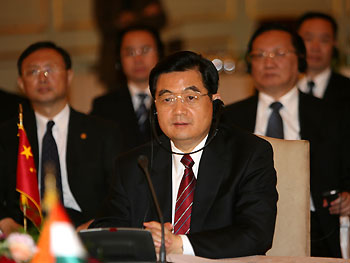 Chinese
President Hu Jintao (Front) attends a group meeting with leaders of Brazil,
India, Mexico and South Africa in Berlin, capital of Germany, June 7, 2007. Hu
on Thursday called for upholding the principle of "common but differentiated
responsibilities" for developing countries in tackling climate change. Chinese
President Hu Jintao (Front) attends a group meeting with leaders of Brazil,
India, Mexico and South Africa in Berlin, capital of Germany, June 7, 2007. Hu
on Thursday called for upholding the principle of "common but differentiated
responsibilities" for developing countries in tackling climate change.
Quality inspection officials from nine southern Chinese provinces pledged on
Friday to cooperate in the supervision of food exports and their processing
factories. Officials from the export-oriented provinces agreed to cooperate in
the supervision of the raw materials for exported food products, farm produce,
pet food and as well as in food safety testing technologies. Last year, the nine
southern provinces exported five billion U.S. dollars worth of farm produce,
accounting for one sixth of the country's total. China's exported food products
have raised safety concerns some countries following a series of alleged or
confirmed quality issues. In May, China's quality control watchdog confirmed two
domestic companies had exported melamine-contaminated wheat gluten and rice
protein blamed for the deaths of dogs and cats in the United States.
   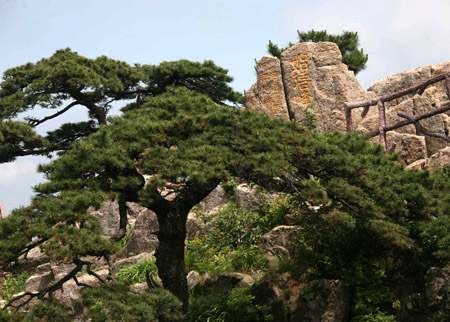 A view of Shixin Peak on Mount Huangshan (Yellow
Mountain) of East China's Anhui Province on June 7, 2007. Shixin Peak will
reopen to tourists on July 1 this year after restoring trees and shrubs on the
mountain. In the meantime, another peak called Danxia will be closed for regular
maintenance.
A view of Shixin Peak on Mount Huangshan (Yellow
Mountain) of East China's Anhui Province on June 7, 2007. Shixin Peak will
reopen to tourists on July 1 this year after restoring trees and shrubs on the
mountain. In the meantime, another peak called Danxia will be closed for regular
maintenance.
China, the world's third-largest gold producer, is likely to surpass the United
States to become the second-largest producer of the precious metal in 2007, a
senior Chinese industry official said on Friday. China plans to raise its gold
production by 8.3 percent to 260 tones in 2007 amid strong international
prices. Gold prices hit a 25-year high last year. Domestic demand was seen in
line with production at 260 tons this year, supported by the jewelry sector, Wu
Junyun, vice general manager of the international trading arm of the China
National Gold Group Corp., told reporters on the sidelines of a conference in
Shanghai. China's gold output rose 14 percent in the first four months of this
year to 77.75 tons, extending a 7 percent increase in 2006 when it hit a record
of 240 tones, data from the China Gold Association showed. The World Gold
Council has put China's gold consumption at about 240 tons in 2006. The
state-owned China National Gold Group, one of the country's leading gold
producers, produces about 20 percent of the country's total. Wu said the company
was interested in gold mining in neighboring countries, including Myanmar and
Vietnam as well as in Russia and other central Asian countries, although he gave
no details.
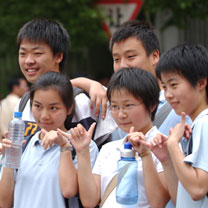 Exam-takers pose for a photo after they
finish the two-day national college entrance exams, or Gaokao, outside a high
school in Changhai, Central China's Hunan Province June 8, 2007. Exam-takers pose for a photo after they
finish the two-day national college entrance exams, or Gaokao, outside a high
school in Changhai, Central China's Hunan Province June 8, 2007.
Asia Pulp and Paper, one of the world's biggest paper
makers, plans to invest US$4.3 billion (HK$33.54 billion) in the second phase of
a pulp-and-paper project in Guangxi Zhuang region, China Business News reported.
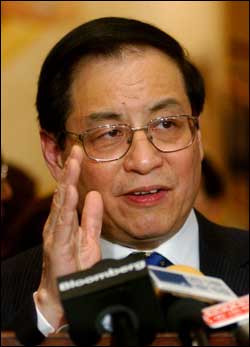 China's stock market frenzy has sparked concerns that bank
loans might be misused to fund speculation. China Banking Regulatory Commission
chairman Liu Mingkang said the regulator is actively monitoring whether bank
loans have been inappropriately channeled into the capital market. Speaking at a
seminar at Oxford University, Liu said Beijing fully supports the development of
healthy equity markets in order to put the large accumulation of private savings
to effective use. "Any market has got to be healthy and so we are carefully
monitoring possible malpractice in the banking industry, in their customers
using loans to possibly channel funds to capital markets," Liu said. "The
capital markets are so important for China to channel high savings to productive
uses. That is the reason why we are very supportive and stress the importance.
So far, we haven't found any concrete instances of huge amounts of funds being
channeled to the equity market." He gave a cautious endorsement to the
development of private equity in China. "Private equity is a good means to
nourish the market and allocate resources in a very effective and efficient
way," Liu said. "The flip side of the coin is the risk attached, so we will be
carefully monitoring the activity and we have got to have sound and solid
regulations." The sizzling mainland stock market had raised fears of a bubble,
which prompted Beijing to implement a series of austerity measures to cool the
frenzy. In the most recent move, the government tripled the stamp duty on shares
trading, sending shockwaves across the mainland bourses. Despite occasional
spurts, the country's main index, the Shanghai Composite Index, has dropped
about 5 percent since the introduction of the higher stamp duty.
China's stock market frenzy has sparked concerns that bank
loans might be misused to fund speculation. China Banking Regulatory Commission
chairman Liu Mingkang said the regulator is actively monitoring whether bank
loans have been inappropriately channeled into the capital market. Speaking at a
seminar at Oxford University, Liu said Beijing fully supports the development of
healthy equity markets in order to put the large accumulation of private savings
to effective use. "Any market has got to be healthy and so we are carefully
monitoring possible malpractice in the banking industry, in their customers
using loans to possibly channel funds to capital markets," Liu said. "The
capital markets are so important for China to channel high savings to productive
uses. That is the reason why we are very supportive and stress the importance.
So far, we haven't found any concrete instances of huge amounts of funds being
channeled to the equity market." He gave a cautious endorsement to the
development of private equity in China. "Private equity is a good means to
nourish the market and allocate resources in a very effective and efficient
way," Liu said. "The flip side of the coin is the risk attached, so we will be
carefully monitoring the activity and we have got to have sound and solid
regulations." The sizzling mainland stock market had raised fears of a bubble,
which prompted Beijing to implement a series of austerity measures to cool the
frenzy. In the most recent move, the government tripled the stamp duty on shares
trading, sending shockwaves across the mainland bourses. Despite occasional
spurts, the country's main index, the Shanghai Composite Index, has dropped
about 5 percent since the introduction of the higher stamp duty.
Mainland sports shoes maker and retailer Anta China has
won approval from the Hong Kong Exchanges & Clearing listing committee for its
HK$2.5 billion initial public offering. The company is expected to start
pre-marketing next week, with trading set for mid-July. The IPO is sponsored by
Morgan Stanley, which is also involved in the share sales of small mainland
property developer KWG Property Holding and wind gearbox manufacturer China High
Speed Transmission. Both of them started pre-marketing this week, with trading
debuts by mid-July. Meanwhile, RREEF China Commercial Trust, which is seeking to
raise US$300 million (HK$2.34 billion), will open its retail offering Monday in
a deal arranged by Deutsche Bank and HSBC. Centron Telecom will start its
roadshow next week, aiming to raise up to US$100 million. The deal is led by
JPMorgan. Centron is a mainland wireless telecommunications network firm mainly
involved in mobile- related products for firms such as China Mobile (0941) and
China Unicom (0762). Other firms waiting to float shares include New World
Department Stores, an affiliate of New World Development (0017), which plans to
raise more than HK$2 billion. Shares of silicone rubber keypad maker Ta Yang
(1991) debuted Friday, gaining 7 percent over the offering price of HK$3.50, on
trading volume of HK$449 million. "The increase was in line with expectations,
with the retail tranche only 70 times oversubscribed," said Cherrie Yan at
Phillip Securities.
June 9 - 10, 2007
 Hong Kong:
The Census and Statistics Department of Hong Kong announced on Thursday that the
total port cargo throughput fell to 54.9 million tons in the first quarter of
2007, down 2 percent on the same period last year. The inward port cargo fell 7
percent to 32.4 million tons and outward grew 6 percent to 22.5 million tons. On
a seasonally adjusted quarter-to-quarter comparison, total port cargo throughput
fell 5 percent. Within this total, inward port cargo fell 9 percent and outward
port cargo fell 1 percent. Within port cargo, seaborne cargo grew 1 percent over
a year earlier to 39.3 million tons, and river cargo fell 9 percent to 15. 7
million tons. Within inward port cargo, imports fell 16 percent over a year
earlier to 17.4 million tons, and inward transshipment grew 5 percent to 15
million tons. For outward port cargo, exports (including domestic exports and
re-exports) fell 11 percent to 7.7 million tons, while outward transshipment
rose 18 percent to 14.9 million tons. In the first quarter, the port of Hong
Kong handled 5.4 million containers. Within this total, laden containers rose 1
percent to 4.5 million, while empty containers fell 5% to 900,000. Among laden
containers, inward containers fell 2 percent to 2.2 million, while outward
containers grew 5 percent to 2.3 million. Hong Kong:
The Census and Statistics Department of Hong Kong announced on Thursday that the
total port cargo throughput fell to 54.9 million tons in the first quarter of
2007, down 2 percent on the same period last year. The inward port cargo fell 7
percent to 32.4 million tons and outward grew 6 percent to 22.5 million tons. On
a seasonally adjusted quarter-to-quarter comparison, total port cargo throughput
fell 5 percent. Within this total, inward port cargo fell 9 percent and outward
port cargo fell 1 percent. Within port cargo, seaborne cargo grew 1 percent over
a year earlier to 39.3 million tons, and river cargo fell 9 percent to 15. 7
million tons. Within inward port cargo, imports fell 16 percent over a year
earlier to 17.4 million tons, and inward transshipment grew 5 percent to 15
million tons. For outward port cargo, exports (including domestic exports and
re-exports) fell 11 percent to 7.7 million tons, while outward transshipment
rose 18 percent to 14.9 million tons. In the first quarter, the port of Hong
Kong handled 5.4 million containers. Within this total, laden containers rose 1
percent to 4.5 million, while empty containers fell 5% to 900,000. Among laden
containers, inward containers fell 2 percent to 2.2 million, while outward
containers grew 5 percent to 2.3 million.
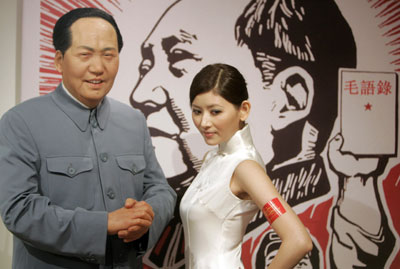 A model poses with a new wax figure of the former
chairman Mao Zedong at Madame Tussauds in Hong Kong June 7, 2007. The figure was
unveiled for the media in the run-up to the 10th anniversary of the July 1, 1997
handover of Hong Kong to the Chinese mainland.
A model poses with a new wax figure of the former
chairman Mao Zedong at Madame Tussauds in Hong Kong June 7, 2007. The figure was
unveiled for the media in the run-up to the 10th anniversary of the July 1, 1997
handover of Hong Kong to the Chinese mainland.
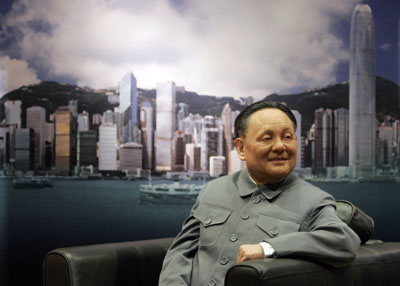 A new wax figure of the late leader Deng Xiaoping
is seen in front of a picture of the Hong Kong skyline at Madame Tussauds in
Hong Kong June 7, 2007. The figure was unveiled for the media in the run-up to
the 10th anniversary of the July 1, 1997 handover of Hong Kong to the Chinese
mainland.
A new wax figure of the late leader Deng Xiaoping
is seen in front of a picture of the Hong Kong skyline at Madame Tussauds in
Hong Kong June 7, 2007. The figure was unveiled for the media in the run-up to
the 10th anniversary of the July 1, 1997 handover of Hong Kong to the Chinese
mainland.
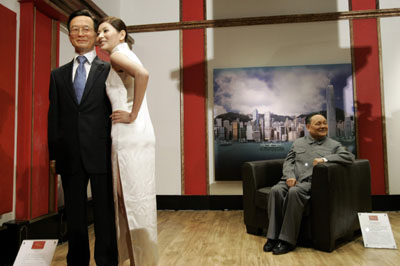 A model poses beside a wax figure of the Chinese
premier Wen Jiabao (L) as a wax figure of the late Chinese leader Deng Xiaoping
sits in the background at Madame Tussauds in Hong Kong June 7, 2007. The figures
were unveiled for the media in the run-up to the 10th anniversary of the July 1,
1997 handover of Hong Kong to the Chinese mainland.
A model poses beside a wax figure of the Chinese
premier Wen Jiabao (L) as a wax figure of the late Chinese leader Deng Xiaoping
sits in the background at Madame Tussauds in Hong Kong June 7, 2007. The figures
were unveiled for the media in the run-up to the 10th anniversary of the July 1,
1997 handover of Hong Kong to the Chinese mainland.
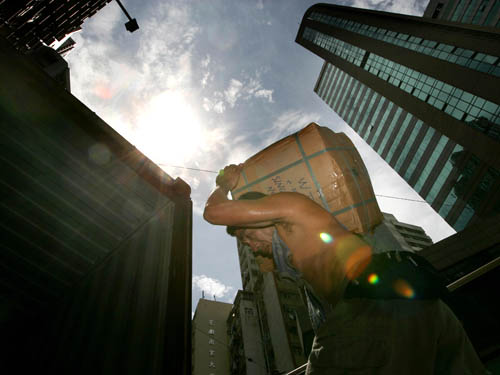 Summer evenings that
once provided some respite from the heat of the day are now hotter than ever,
according to research that found minimum temperatures have risen steadily over
the past 40 years. The reason, according to Yan Yuk-yee, professor of geography
at Baptist University, is the city's transformation into a high-rise concrete
jungle that traps heat during the day and releases it at night. Analysing
Observatory temperature data from 1965 to 2003, Professor Yan found the average
minimum temperature had increased by 0.02 degrees Celsius a year on average. The
average minimum temperatures were calculated using the daily minimum
temperatures from May 1 to October 15. Her study also showed the average maximum
temperature over the same period had decreased by 0.014 degrees every year. Summer evenings that
once provided some respite from the heat of the day are now hotter than ever,
according to research that found minimum temperatures have risen steadily over
the past 40 years. The reason, according to Yan Yuk-yee, professor of geography
at Baptist University, is the city's transformation into a high-rise concrete
jungle that traps heat during the day and releases it at night. Analysing
Observatory temperature data from 1965 to 2003, Professor Yan found the average
minimum temperature had increased by 0.02 degrees Celsius a year on average. The
average minimum temperatures were calculated using the daily minimum
temperatures from May 1 to October 15. Her study also showed the average maximum
temperature over the same period had decreased by 0.014 degrees every year.
Old China hands salute HK - People in Hong Kong should value the experience they
gained under British rule, former British prime minister Baroness Thatcher said
yesterday. In a special lunch gathering in London to mark the 10th anniversary
of Hong Kong's handover, leading British politicians with links to the city said
the transition had been a success and attributed this to the efforts of the Hong
Kong public. Speaking before the lunch, hosted by the Hong Kong Association,
Lady Thatcher - who negotiated and signed the Sino-British Joint Declaration,
sealing Hong Kong's fate in 1984 - said she was glad to see Hong Kong's success
10 years after the handover in 1997. "The handover was something that had to
happen," she said. "I hope the people of Hong Kong would remember what they have
learned from the British." It was Lady Thatcher's first public comment about
Hong Kong since her retirement from active politics in 1990. Prime Minister Tony
Blair sent a message praising Hong Kong's success and rebuffing doomsayers'
predictions that Hong Kong would go down after the handover. In a speech
praising the late patriarch Deng Xiaoping , former premier Zhao Ziyang and also
Lady Thatcher for their visions, former foreign secretary Lord Howe, who was
considered a main architect of the Joint Declaration, said people in Hong Kong
had earned their success due to their own efforts. "None of the impressive Hong
Kong history of the last 10, 20, 30 years could possibly have happened had it
not been for the qualities of the people of Hong Kong themselves," he said.
"This showplace of energetic enterprise and dynamic self-discipline has been the
child of two parents, Britain and China." Baroness Dunn, an executive councillor
under the colonial government, and now chairwoman of the Hong Kong Association,
said although the city had gone through challenges such as the financial crisis
and Sars, it had remained as prosperous and energetic as before. Hong Kong's
last governor, Lord Patten, who did not attend the lunch due to a clash of
engagements, also garnered his share of the praise. Lady Dunn said: "He held the
reins in the final run-up to the handover. He instilled in Hong Kong people a
fresh confidence in their ability to run their own affairs." It was the first
time such a large number of the so-called "old China hands" had met since 1997.
Requirements for Russians to apply
for multiple-visit visas to Hong Kong may be relaxed after the government
rejected Russia's request for its nationals to visit the territory visa free.
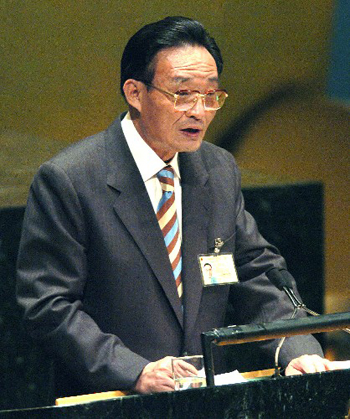
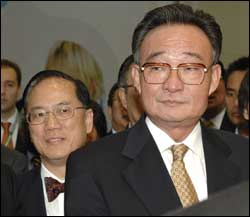 HK Basic Law 'guarantees democracy
- Wu Bangguo,chairman of the Standing Committee of the National People's
Congress,delivers a speech during the seminar marking the 10th anniversary of
implementing the Basic Law in Beijing June 6, 2007. The central government will
continue to support Hong Kong in developing a democratic system that suits its
conditions, but any reform must be gradual and in accordance with the Basic Law,
top legislator Wu Bangguo said yesterday in Beijing. Wu, chairman of the
Standing Committee of the National People's Congress, the top legislature, made
the remarks at a seminar marking the 10th anniversary of implementing the Basic
Law. The Basic Law is the constitutional document for the Hong Kong Special
Administrative Region (SAR). It enshrines the key concepts of "one country, two
systems", "Hong Kong people governing Hong Kong" and "a high degree of
autonomy". Wu said events have proved, and will continue to prove, that the
principle of "one country, two systems" is workable and feasible and the Basic
Law is a sound law able to withstand the test of time. He emphasized that Hong
Kong must uphold State sovereignty and ensure prosperity and stability while
enjoying a high degree of autonomy. Being an SAR directly under the central
government, "Hong Kong's high degree of autonomy is not intrinsic, but
authorized by the central government". "It only has as much power as authorized
by the central government. There is no so-called residual power." But Wu said
the central government will never interfere in affairs within the purview of the
autonomy of the SAR. Hong Kong Chief Executive Donald Tsang said at the seminar
that the SAR has retained its international features, rule by law and various
kinds of freedoms guaranteed by the Basic Law after its return to the
motherland. "With State care and assistance, we have strived to display our
unique advantages and made significant achievements widely recognized by the
international community," Tsang said. The Basic Law has laid a solid foundation
for Hong Kong's economic and social development and the improvement of people's
livelihood, he added. Former secretary of justice Elsie Leung added that to
achieve the ultimate goal of universal suffrage, and maintain prosperity and
stability in Hong Kong, it is necessary to have a clear understanding of the
relationship between the central government and Hong Kong. Being an SAR directly
under the central government, "Hong Kong's high degree of autonomy is not
intrinsic, but authorized by the central government". Leung said Hong Kong has
made gradual progress in democracy in accordance with the Basic Law over the
years. Since its return to the motherland in 1997, the number of members in the
Election Committee, which elects the chief executive, has grown from 400 to 800;
and they are from different social strata and sectors. In the Legislative
Council, the number of directly elected seats has also increased from one-third
in the first term to half in the third term. The Basic Law itself is a result of
broad participation of Hong Kong citizens as well, Wu said, pointing out that 23
of the 59 members of the drafting committee were from Hong Kong. The full text
of the draft law was made public twice for public comments. Different social
strata, sectors and groups in Hong Kong came up with nearly 80,000 comments and
proposals. "In other words, each and every article of the Basic Law represents
the broad consensus of Hong Kong society," Wu said.
HK Basic Law 'guarantees democracy
- Wu Bangguo,chairman of the Standing Committee of the National People's
Congress,delivers a speech during the seminar marking the 10th anniversary of
implementing the Basic Law in Beijing June 6, 2007. The central government will
continue to support Hong Kong in developing a democratic system that suits its
conditions, but any reform must be gradual and in accordance with the Basic Law,
top legislator Wu Bangguo said yesterday in Beijing. Wu, chairman of the
Standing Committee of the National People's Congress, the top legislature, made
the remarks at a seminar marking the 10th anniversary of implementing the Basic
Law. The Basic Law is the constitutional document for the Hong Kong Special
Administrative Region (SAR). It enshrines the key concepts of "one country, two
systems", "Hong Kong people governing Hong Kong" and "a high degree of
autonomy". Wu said events have proved, and will continue to prove, that the
principle of "one country, two systems" is workable and feasible and the Basic
Law is a sound law able to withstand the test of time. He emphasized that Hong
Kong must uphold State sovereignty and ensure prosperity and stability while
enjoying a high degree of autonomy. Being an SAR directly under the central
government, "Hong Kong's high degree of autonomy is not intrinsic, but
authorized by the central government". "It only has as much power as authorized
by the central government. There is no so-called residual power." But Wu said
the central government will never interfere in affairs within the purview of the
autonomy of the SAR. Hong Kong Chief Executive Donald Tsang said at the seminar
that the SAR has retained its international features, rule by law and various
kinds of freedoms guaranteed by the Basic Law after its return to the
motherland. "With State care and assistance, we have strived to display our
unique advantages and made significant achievements widely recognized by the
international community," Tsang said. The Basic Law has laid a solid foundation
for Hong Kong's economic and social development and the improvement of people's
livelihood, he added. Former secretary of justice Elsie Leung added that to
achieve the ultimate goal of universal suffrage, and maintain prosperity and
stability in Hong Kong, it is necessary to have a clear understanding of the
relationship between the central government and Hong Kong. Being an SAR directly
under the central government, "Hong Kong's high degree of autonomy is not
intrinsic, but authorized by the central government". Leung said Hong Kong has
made gradual progress in democracy in accordance with the Basic Law over the
years. Since its return to the motherland in 1997, the number of members in the
Election Committee, which elects the chief executive, has grown from 400 to 800;
and they are from different social strata and sectors. In the Legislative
Council, the number of directly elected seats has also increased from one-third
in the first term to half in the third term. The Basic Law itself is a result of
broad participation of Hong Kong citizens as well, Wu said, pointing out that 23
of the 59 members of the drafting committee were from Hong Kong. The full text
of the draft law was made public twice for public comments. Different social
strata, sectors and groups in Hong Kong came up with nearly 80,000 comments and
proposals. "In other words, each and every article of the Basic Law represents
the broad consensus of Hong Kong society," Wu said.
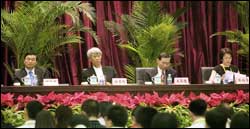 The Hong Kong Monetary Authority warned Wednesday of the "obvious signs" of the
overheating stock markets in the mainland and alerted investors to a further
correction in the domestic bourses. But the city's de facto central bank
predicted the frenzy is unlikely to rattle equities in Hong Kong or elsewhere.
Speaking at a conference with Chinese bankers in Beijing, HKMA chief executive
Joseph Yam Chi-kwong urged financial institutions to hold steady their risk
management during a volatile period like this. Beijing's decision last week to
triple the tax charged on stock trading initially slashed more than 600 points
off the Shanghai Composite Index. The Chinese markets, however, regained
momentum in the last two trading days as speculators say the government might
issue policies to stabilize the market. "Markets go up and down and if you look
at numbers like [price-earnings ratios] and all that, obviously there are signs
of overheating in those markets, and if there were adjustments, then it would be
an adjustment in a downward direction, hurting quite a lot of people, including
small investors," Yam told Reuters. However, he said China's volatility would
not affect the SAR that much, citing the fact that Hong Kong stocks still rose
recently despite mainland shares plunging. Some analysts, however, say the high
price-earnings ratio of Chinese stocks could actually be "more justifiable" in
the medium term if these companies' earnings are to rise a further 10 to 13
percent, which is quite likely given China's robust economic growth. "The
Chinese markets should be able to find their troughs within this week and we
shall expect marked rebounds in the near term," said a Shenzhen-based analyst.
"When QFII [qualified foreign institutional investor] players tap into more
quota of the scheme, the markets would also be able to gain firmer support from
this influx of capital."
The Hong Kong Monetary Authority warned Wednesday of the "obvious signs" of the
overheating stock markets in the mainland and alerted investors to a further
correction in the domestic bourses. But the city's de facto central bank
predicted the frenzy is unlikely to rattle equities in Hong Kong or elsewhere.
Speaking at a conference with Chinese bankers in Beijing, HKMA chief executive
Joseph Yam Chi-kwong urged financial institutions to hold steady their risk
management during a volatile period like this. Beijing's decision last week to
triple the tax charged on stock trading initially slashed more than 600 points
off the Shanghai Composite Index. The Chinese markets, however, regained
momentum in the last two trading days as speculators say the government might
issue policies to stabilize the market. "Markets go up and down and if you look
at numbers like [price-earnings ratios] and all that, obviously there are signs
of overheating in those markets, and if there were adjustments, then it would be
an adjustment in a downward direction, hurting quite a lot of people, including
small investors," Yam told Reuters. However, he said China's volatility would
not affect the SAR that much, citing the fact that Hong Kong stocks still rose
recently despite mainland shares plunging. Some analysts, however, say the high
price-earnings ratio of Chinese stocks could actually be "more justifiable" in
the medium term if these companies' earnings are to rise a further 10 to 13
percent, which is quite likely given China's robust economic growth. "The
Chinese markets should be able to find their troughs within this week and we
shall expect marked rebounds in the near term," said a Shenzhen-based analyst.
"When QFII [qualified foreign institutional investor] players tap into more
quota of the scheme, the markets would also be able to gain firmer support from
this influx of capital."
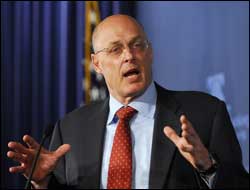 China should step up market-opening and
currency reforms to help avert a "protectionist tide" in the United States, US
Treasury Secretary Henry Paulson said. Paulson, in a Washington speech,
reiterated that Beijing is moving too slowly in its currency and economic
reforms at a time when the US public and lawmakers are increasingly impatient.
"We who believe in open economies are swimming against a strong protectionist
tide these days," Paulson said in his remarks prepared for delivery at the
Heritage Foundation, a conservative think-tank. "As I explained to the Chinese,
a large section of the American public doesn't believe that the benefits of
trade are being shared equally between or within our two countries, and Congress
reflects that view." Some critics of China accuse Beijing of keeping its yuan
currency grossly undervalued to make its exports to the United States cheaper -
a key factor cited for the snowballing US trade deficit with the Asian giant
that hit US$232.5 billion (HK$1.81 trillion) last year. Paulson argued that
China needs to accelerate the pace of reform. "The Chinese have taken some
steps, and they can do more," he said Tuesday. "While currency reform is not
going to eliminate our trade deficit, a market-determined exchange rate that
reflects the underlying fundamentals of the Chinese economy is one component of
the actions needed to address imbalances." Paulson said competition and market
principles would "spread the benefits of China's robust growth to all of China's
people" and that Beijing should take more steps to reform an economy that is
still partly state- controlled. "Americans are impatient to see real change," he
said. "Today, China is part-way between an administered economy and a
market-based one. I think that the greater risk for China is in moving too
slowly, not in moving too quickly, and I have tried to impress that upon the
Chinese at every opportunity." Paulson's comments came two weeks after the
"strategic economic dialogue" talks in Washington, the second in a series of
high-level discussions on economic ties between the US and Chinese governments.
Paulson said the discussions produced a new civil aviation agreement and accords
for cooperation on energy, the environment, and financial services. But Vice
Premier Wu Yi said elasticity of the yuan exchange rate will be determined in an
"orderly" manner, despite threats by US lawmakers of punitive tariffs on
Beijing. Some analysts say Washington is too soft on China. "Offering China
major power status by engaging it in multilateral dialogue will accomplish
little, because the Communist Party is much more concerned about maintaining its
grasp on power than becoming a respected stakeholder in the global community,"
said economist Peter Morici of the University of Maryland in a recent
commentary, arguing the yuan currency effectively gives Chinese products a 24
percent subsidy. "Western democracies must recognize this unpleasant reality and
deal with China differently than they do one another." China should step up market-opening and
currency reforms to help avert a "protectionist tide" in the United States, US
Treasury Secretary Henry Paulson said. Paulson, in a Washington speech,
reiterated that Beijing is moving too slowly in its currency and economic
reforms at a time when the US public and lawmakers are increasingly impatient.
"We who believe in open economies are swimming against a strong protectionist
tide these days," Paulson said in his remarks prepared for delivery at the
Heritage Foundation, a conservative think-tank. "As I explained to the Chinese,
a large section of the American public doesn't believe that the benefits of
trade are being shared equally between or within our two countries, and Congress
reflects that view." Some critics of China accuse Beijing of keeping its yuan
currency grossly undervalued to make its exports to the United States cheaper -
a key factor cited for the snowballing US trade deficit with the Asian giant
that hit US$232.5 billion (HK$1.81 trillion) last year. Paulson argued that
China needs to accelerate the pace of reform. "The Chinese have taken some
steps, and they can do more," he said Tuesday. "While currency reform is not
going to eliminate our trade deficit, a market-determined exchange rate that
reflects the underlying fundamentals of the Chinese economy is one component of
the actions needed to address imbalances." Paulson said competition and market
principles would "spread the benefits of China's robust growth to all of China's
people" and that Beijing should take more steps to reform an economy that is
still partly state- controlled. "Americans are impatient to see real change," he
said. "Today, China is part-way between an administered economy and a
market-based one. I think that the greater risk for China is in moving too
slowly, not in moving too quickly, and I have tried to impress that upon the
Chinese at every opportunity." Paulson's comments came two weeks after the
"strategic economic dialogue" talks in Washington, the second in a series of
high-level discussions on economic ties between the US and Chinese governments.
Paulson said the discussions produced a new civil aviation agreement and accords
for cooperation on energy, the environment, and financial services. But Vice
Premier Wu Yi said elasticity of the yuan exchange rate will be determined in an
"orderly" manner, despite threats by US lawmakers of punitive tariffs on
Beijing. Some analysts say Washington is too soft on China. "Offering China
major power status by engaging it in multilateral dialogue will accomplish
little, because the Communist Party is much more concerned about maintaining its
grasp on power than becoming a respected stakeholder in the global community,"
said economist Peter Morici of the University of Maryland in a recent
commentary, arguing the yuan currency effectively gives Chinese products a 24
percent subsidy. "Western democracies must recognize this unpleasant reality and
deal with China differently than they do one another."
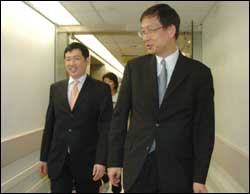 The marathon probe into alleged government meddling in the affairs of the Hong
Kong Institute of Education ended Wednesday with the counsel for the commission
of inquiry insisting that senior government officials did interfere in the
institute's autonomy and academic freedom. The 35-day hearing concluded with the
oral closing submissions by Benjamin Yu Yuk-hoi, SC, who said there could be no
doubt that Secretary for Education and Manpower Arthur Li Kwok-cheung did say at
a lunch in July 2002 that the HKIEd would be "raped" if it did not agree to
merge with the Chinese University of Hong Kong, of which Li was a former vice
chancellor. Yu said, in that situation, Li did interfere with institutional
autonomy.
The marathon probe into alleged government meddling in the affairs of the Hong
Kong Institute of Education ended Wednesday with the counsel for the commission
of inquiry insisting that senior government officials did interfere in the
institute's autonomy and academic freedom. The 35-day hearing concluded with the
oral closing submissions by Benjamin Yu Yuk-hoi, SC, who said there could be no
doubt that Secretary for Education and Manpower Arthur Li Kwok-cheung did say at
a lunch in July 2002 that the HKIEd would be "raped" if it did not agree to
merge with the Chinese University of Hong Kong, of which Li was a former vice
chancellor. Yu said, in that situation, Li did interfere with institutional
autonomy.
 China: China
and Costa Rica Thursday announced that the two countries signed a joint
communique on establishment of diplomatic ties at ambassadorial level as of June
1. The joint communique was inked by Chinese Foreign Minister Yang Jiechi and
Costa Rican Minister of Foreign Affairs Bruno Stagno Ugarte in Beijing on June
1.
China: China
and Costa Rica Thursday announced that the two countries signed a joint
communique on establishment of diplomatic ties at ambassadorial level as of June
1. The joint communique was inked by Chinese Foreign Minister Yang Jiechi and
Costa Rican Minister of Foreign Affairs Bruno Stagno Ugarte in Beijing on June
1.
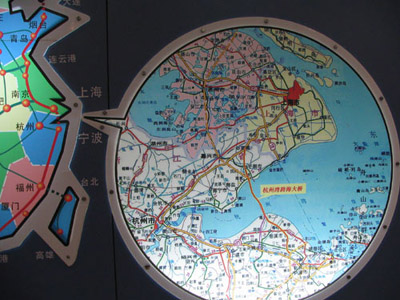 Map of the
Hangzhou Bay Bridge. The bridge, which starts in Cixi, a county-level city under
the jurisdiction of Ningbo, a sub-provincial city, and ends at Zhapu port in
Jiaxing, another city in Zhejiang Province, will span a total length of 36
kilometers, making it the longest cross-sea bridge in the world. Map of the
Hangzhou Bay Bridge. The bridge, which starts in Cixi, a county-level city under
the jurisdiction of Ningbo, a sub-provincial city, and ends at Zhapu port in
Jiaxing, another city in Zhejiang Province, will span a total length of 36
kilometers, making it the longest cross-sea bridge in the world.
China's trade deficit in farm produce reached 100 million
U.S. dollars in the first four months of 2007, the Ministry of Commerce (MOC)
said in Beijing on Thursday. The country's exports of farm produce hit 11.48
billion dollars, up 23.9 percent year-on-year, while imports were 11.58 billion
dollars, up 10.4 percent year-on-year. China's farm produce exports to the
European Union hit 1.64 billion dollars, South Korea 1.37 billion dollars, the
United States 1.39 billion dollars and ASEAN 1.17 billion dollars, according to
MOC figures. Of the total, private enterprises exported 3.67 billion dollars,
foreign-funded companies 4.68 billion dollars and state-owned firms 2.67 billion
dollars. China's trade deficit in farm produce in 2006 stood at 670 million
dollars, a decrease of 41.3 percent from the 2005 level of 1.14 billion dollars,
according to official figures.
India and China have agreed to hold their first ever joint
army exercise as part of a wider effort to improve ties between the one-time
Asian enemies, military officials said Thursday. The manoeuvers are slated for
October and will see 100 Indian troops sent to China for a workout in
anti-terrorism tactics, the Indian army chief, General J.J. Singh, was quoted as
saying by the Indian Express newspaper. "We had a small thing earlier -- not an
exercise but a mountaineering expedition -- two years ago," army spokesman
Colonel S.K. Sakhuja told AFP. The agreement comes after the army chief visited
China at the end of May, which the defense ministry said had led to a decision
on "engagement and mutual confidence building" including more joint training
exercises. The two nations -- who fought a brief but bloody border war in 1962
-- conducted joint naval exercises in the East China Sea in 2003, but otherwise
cooperation between two of the world's largest armed forces has been scant.
 Visitors look
at a series of contemporary jalopies on display at an auto exhibition in
Southwest China's Chongqing Municipality June 7, 2007. Fifty auto manufacturers
from home and abroad presented their some 300-model products at the exhibition. Visitors look
at a series of contemporary jalopies on display at an auto exhibition in
Southwest China's Chongqing Municipality June 7, 2007. Fifty auto manufacturers
from home and abroad presented their some 300-model products at the exhibition.
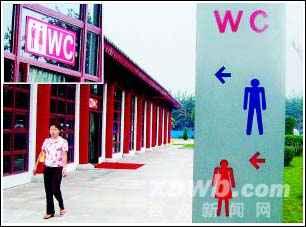 Hello toilet,
goodbye WC for Beijing Games - Beijing's battle to standardize and correct
English-language signs ahead of the 2008 Olympics has claimed another head --
"WC." By the end of the year, all public conveniences in the city will be called
"toilets" instead of the venerable, Victorian-era sounding abbreviation for
"water closet," the Beijing Morning Post reported on Wednesday. "In many Western
countries they don't use the term WC at all," the report said. "Because in
English, it's equivalent to what we would call in China an outhouse, and is a
rather crude slang term," it added, without explaining how it had got this
impression. Also on the list are road signs. Use of the romanized form of
Chinese, known as "pinyin," will be replaced by the actual English word, except
for proper names, the newspaper added. Out will go Dong Changan Jie and in will
come East Changan Avenue. But a rather more vexing question has been what to do
about menus to help the hundreds of thousands of tourists, athletes and
reporters expected to flood the city, many of whom will not speak a word of
Chinese, let alone understand Chinese characters. An initial list had been
formulated and sent to experts for approval, the Beijing News said. All
restaurants and hotels rated three star and above will have to use the standard
names once they come out, it added. Linguists are struggling about the best way
to translate popular dishes like "ants climbing the tree" -- spicy fried
vermicelli with finely chopped pork -- into English accurately yet preserving
the original meaning, officials have said. They are hoping to avoid confusing
visitors with the mish-mash of translations now on offer. One well-known Beijing
restaurant chain has dishes called "It is small to fry the chicken
miscellaneous" and "mixed elbow with garlic mud." Hello toilet,
goodbye WC for Beijing Games - Beijing's battle to standardize and correct
English-language signs ahead of the 2008 Olympics has claimed another head --
"WC." By the end of the year, all public conveniences in the city will be called
"toilets" instead of the venerable, Victorian-era sounding abbreviation for
"water closet," the Beijing Morning Post reported on Wednesday. "In many Western
countries they don't use the term WC at all," the report said. "Because in
English, it's equivalent to what we would call in China an outhouse, and is a
rather crude slang term," it added, without explaining how it had got this
impression. Also on the list are road signs. Use of the romanized form of
Chinese, known as "pinyin," will be replaced by the actual English word, except
for proper names, the newspaper added. Out will go Dong Changan Jie and in will
come East Changan Avenue. But a rather more vexing question has been what to do
about menus to help the hundreds of thousands of tourists, athletes and
reporters expected to flood the city, many of whom will not speak a word of
Chinese, let alone understand Chinese characters. An initial list had been
formulated and sent to experts for approval, the Beijing News said. All
restaurants and hotels rated three star and above will have to use the standard
names once they come out, it added. Linguists are struggling about the best way
to translate popular dishes like "ants climbing the tree" -- spicy fried
vermicelli with finely chopped pork -- into English accurately yet preserving
the original meaning, officials have said. They are hoping to avoid confusing
visitors with the mish-mash of translations now on offer. One well-known Beijing
restaurant chain has dishes called "It is small to fry the chicken
miscellaneous" and "mixed elbow with garlic mud."
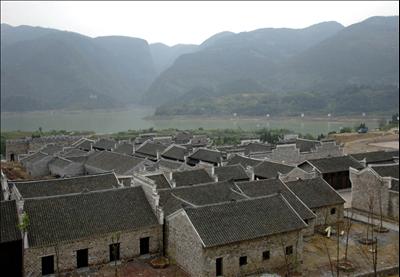 A 1700-year-old town named "Dachang"
has been rebuilt at the side of the Dachang Lake in the region of Three Gorges
in southwest China's Chongqing Municipality. The ancient town, covering an area
about 48.7 square kilometers, will open on October 1, 2007. It has 35 rebuilt
old buildings, which will make it a new tourism attraction in the region of
Three Gorges.
A 1700-year-old town named "Dachang"
has been rebuilt at the side of the Dachang Lake in the region of Three Gorges
in southwest China's Chongqing Municipality. The ancient town, covering an area
about 48.7 square kilometers, will open on October 1, 2007. It has 35 rebuilt
old buildings, which will make it a new tourism attraction in the region of
Three Gorges.
Following its successful initial
public offering (IPO) in October, the Industrial and Commercial Bank of China (ICBC)
has reclaimed first spot in this year's Top 100 Chinese Banks. Bank of China was
ranked second in terms of capital strength, according to The Banker, a British
magazine known for its annual publication ranking the top 1,000 global banks.
China Construction Bank, which topped last year's list after its 2005 IPO,
dropped to third. The Agricultural Bank of China, the last State bank to undergo
restructuring, claimed fourth place. The Big Four had an aggregated core capital
of 1.29 trillion yuan at the end of 2006, an increase of 69.7 percent over the
previous year, accounting for 77.7 percent of the total held by the top 100
banks, the report said. The big banks' pre-tax profit totaled 217.9 billion yuan
last year, a year-on-year increase of 115.1 percent, accounting for 74.7 percent
of the total. "This shows the extraordinary growth of the Chinese banking
sector," said Stephen Timewell, editor-in-chief of The Banker. Chinese banks'
aggregate profit ratio jumped to 16.9 percent, compared with 15 percent in last
year's listing. The ratio for the world's top 1,000 banks was 22.7 percent, he
said. The second-largest group on the list were the 11 joint-stock banks, led by
Bank of Communications in fifth spot. They accounted for 15.1 percent of core
capital, 19.2 percent of assets and 19 percent pre-tax profits. The list did not
include Guangdong Development Bank and China Everbright Bank, which have not
produced full financial results since 2003, Timewell said. A few new banks made
their way toward the top of the list, including Beijing Rural Commercial Bank
and Bohai Bank, which finished 14th and 19th respectively. City commercial banks
composed the largest group on the list with 65, but accounted for just 5.4
percent of core capital, 5.6 percent of assets and 4.6 percent of pre-tax
profits. "The latest listing demonstrates the dynamism and growing
sophistication of China's banking sector, which is definitely needed if the
economy is to maintain the current high levels of growth," said Timewell. "The
ranking also represents an important step forward in the level of disclosure and
transparency of the entire Chinese banking system," Timewell said.
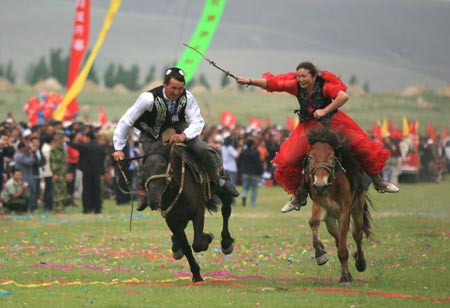 Two riders compete in the
"Girl's chase" game during the opening ceremony of the Ethnic Cultures and
Tourism Festival in Huocheng County, Northwest China's Xinjiang Uygur Autonomous
Region, June 6, 2007. Traditional sports in ethnic minority groups Kazakh and
Uygur, such as catching the goat, camel race, donkey race, and girls' chase,
were performed during the festival amid local government's efforts to develop
the tourism.
Two riders compete in the
"Girl's chase" game during the opening ceremony of the Ethnic Cultures and
Tourism Festival in Huocheng County, Northwest China's Xinjiang Uygur Autonomous
Region, June 6, 2007. Traditional sports in ethnic minority groups Kazakh and
Uygur, such as catching the goat, camel race, donkey race, and girls' chase,
were performed during the festival amid local government's efforts to develop
the tourism.
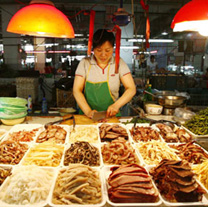 A vendor sells cooked food at a
market in Shenyang, Liaoning Province June 6, 2007. China will launch a sweeping
offensive against dangerous medicines and bad food. A vendor sells cooked food at a
market in Shenyang, Liaoning Province June 6, 2007. China will launch a sweeping
offensive against dangerous medicines and bad food.
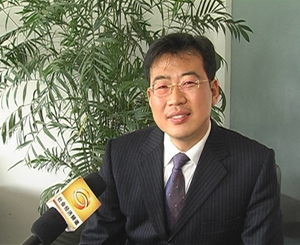 Gao Menzhong's office overlooks an arched
stone bridge with intricate sculpture spanning a canal in Suzhou. The
1,000-year-old waterway was before part of the Grand Canal that linked the
eastern city with the capital of ancient China. Inside the lobby of his company,
some 400 young people, sitting elbow to elbow, are working on recruitment tests.
Another 50 to 70 people in their early 20s are still queuing outside. They are
waiting for job offers at factories producing cellphones, LCDs, hard drives -
and cookies. "Every year more than 100 million Chinese migrate around the
country for employment. I want to be the bridge, linking labor-abundant regions
with the booming coastal areas that need labor," says Gao, general manager of
Humanpool Human Resources Co Ltd. Humanpool is one of the largest blue-collar
labor outsourcing companies for the Yangtze River Delta, a manufacturing power
in East China. With subsidiaries in seven cities, the six-year-old company
provides about 6,000 workers every month to more than 200 companies, mostly from
the United States, Japan and Europe. Workers sign a labor contract with
Humanpool and are then hired by its clients as temporary workers. Companies pay
their salaries and insurance through Humanpool, which also provides housing and
training. Humanpool's profit comes from commissions paid by companies, usually
about 80 yuan per worker per month. About 20,000 workers now have signed
contracts with the company. The service is popular among employers who need only
seasonal or project-based workers. As demand changes, opening a new production
line could require hundreds of workers quickly immediately. Gao Menzhong's office overlooks an arched
stone bridge with intricate sculpture spanning a canal in Suzhou. The
1,000-year-old waterway was before part of the Grand Canal that linked the
eastern city with the capital of ancient China. Inside the lobby of his company,
some 400 young people, sitting elbow to elbow, are working on recruitment tests.
Another 50 to 70 people in their early 20s are still queuing outside. They are
waiting for job offers at factories producing cellphones, LCDs, hard drives -
and cookies. "Every year more than 100 million Chinese migrate around the
country for employment. I want to be the bridge, linking labor-abundant regions
with the booming coastal areas that need labor," says Gao, general manager of
Humanpool Human Resources Co Ltd. Humanpool is one of the largest blue-collar
labor outsourcing companies for the Yangtze River Delta, a manufacturing power
in East China. With subsidiaries in seven cities, the six-year-old company
provides about 6,000 workers every month to more than 200 companies, mostly from
the United States, Japan and Europe. Workers sign a labor contract with
Humanpool and are then hired by its clients as temporary workers. Companies pay
their salaries and insurance through Humanpool, which also provides housing and
training. Humanpool's profit comes from commissions paid by companies, usually
about 80 yuan per worker per month. About 20,000 workers now have signed
contracts with the company. The service is popular among employers who need only
seasonal or project-based workers. As demand changes, opening a new production
line could require hundreds of workers quickly immediately.
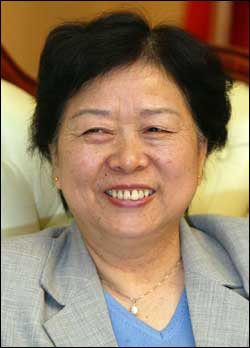 In the latest
remarks by a senior mainland official aimed at restoring confidence in the
A-share market, People's Bank of China deputy governor Wu Xiaoling urged
investors to keep faith in equities, saying share rallies are "inevitable" as
the economy remains in "good shape." "Investors should have confidence in the
country's economy," Wu said on the sidelines of a conference in Tianjin. "In a
situation where the economy is growing, the stock market's advance is inevitable
and long-term gains in the Chinese market are inevitable." Wu's comments came
following earlier assurances by government officials and state-owned media this
week to restore investor confidence in the equity markets, after share prices
fell sharply following the government's decision last week to triple stamp duty
on stock transactions from 0.1 percent to 0.3 percent. "Markets are always
fluctuating," Wu said, referring to the recent plunge. "Short-term ups and downs
in the market are inevitable. You are always going to get swings. How long those
swings last does not matter. What really counts is the fundamental trend." Gao
Xiqing, vice chairman of China's National Social Security Fund, also expressed
optimism about the A-share market, saying that the long- term outlook is
positive, in remarks that contrasted with his previous concerns about the pace
of the share rally. The Shanghai Composite Index rose 0.24 percent Wednesday to
end at 3,776.32 points, as equities clawed back. The Shenzhen Composite Index
was up 1.89 percent to close at 1,086.22. In the five trading days to Tuesday,
the market tumbled 21 percent as investors exited in panic. In the latest
remarks by a senior mainland official aimed at restoring confidence in the
A-share market, People's Bank of China deputy governor Wu Xiaoling urged
investors to keep faith in equities, saying share rallies are "inevitable" as
the economy remains in "good shape." "Investors should have confidence in the
country's economy," Wu said on the sidelines of a conference in Tianjin. "In a
situation where the economy is growing, the stock market's advance is inevitable
and long-term gains in the Chinese market are inevitable." Wu's comments came
following earlier assurances by government officials and state-owned media this
week to restore investor confidence in the equity markets, after share prices
fell sharply following the government's decision last week to triple stamp duty
on stock transactions from 0.1 percent to 0.3 percent. "Markets are always
fluctuating," Wu said, referring to the recent plunge. "Short-term ups and downs
in the market are inevitable. You are always going to get swings. How long those
swings last does not matter. What really counts is the fundamental trend." Gao
Xiqing, vice chairman of China's National Social Security Fund, also expressed
optimism about the A-share market, saying that the long- term outlook is
positive, in remarks that contrasted with his previous concerns about the pace
of the share rally. The Shanghai Composite Index rose 0.24 percent Wednesday to
end at 3,776.32 points, as equities clawed back. The Shenzhen Composite Index
was up 1.89 percent to close at 1,086.22. In the five trading days to Tuesday,
the market tumbled 21 percent as investors exited in panic.
Shanghai
prosecutors have charged a brother and sister with producing and selling
millions of yuan worth of fake health-food products in dozens of cities across
China, local media reported Wednesday.
June 8, 2007
 Hong Kong:
The quota for live chicken import from the Chinese mainland will be raised on
June 16-18 to meet the surge in demand for Dragon Boat Festival, the Health,
Welfare and Food Bureau of Hong Kong said Tuesday. The Bureau said that the
daily limit will rise from 20,000 to 50,000. But the move will be suspended if
human or poultry avian influenza infections are found in Guangdong Province or
Hong Kong during the period. The government cautiously decided to adopt last
year's arrangement again in view of bird flu cases in the area, rather than
lifting the quota further. The bureau reminded the trade and public to continue
observing measures strictly to prevent bird flu during the festive period. Hong Kong:
The quota for live chicken import from the Chinese mainland will be raised on
June 16-18 to meet the surge in demand for Dragon Boat Festival, the Health,
Welfare and Food Bureau of Hong Kong said Tuesday. The Bureau said that the
daily limit will rise from 20,000 to 50,000. But the move will be suspended if
human or poultry avian influenza infections are found in Guangdong Province or
Hong Kong during the period. The government cautiously decided to adopt last
year's arrangement again in view of bird flu cases in the area, rather than
lifting the quota further. The bureau reminded the trade and public to continue
observing measures strictly to prevent bird flu during the festive period.
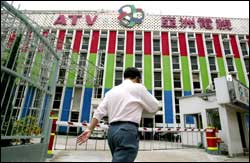 Asia
Television received a fresh injection of capital and management expertise in a
new deal as it prepares to transform itself from a two-channel broadcaster into
a platform with a greater number of program offerings. A group of investors that
includes Mingly Corp chairman Payson Cha Mou-sing, his brother Johnson Cha
Mou-daid, ABN AMRO (Hong Kong) and former TVB managing director Louis Rajkumar
Page obtained government approval Tuesday to take a 47.6 percent stake in ATV.
Mainland cable network operator CITIC Guoan, owned by CITIC Group, will also
secure a 14.8 percent interest. The total investment amount was not disclosed.
Payson Cha will become the new chairman of ATV. Page and former TVB group
general manager Ho Ting- kwan will become directors. Founded in 1957, ATV has
failed to challenge the dominance of Television Broadcasts (0511) as the station
lacked sufficient funds to expand. But new working capital and experience could
help rejuvenate the broadcaster. "This would allow the new shareholders to
invest substantially in ATV and raise the level of competition in Hong Kong's
free television market," a government source said. "Given the financial capacity
of CITIC Guoan Group, funds to be injected into ATV will help the station roll
out digital terrestrial television and introduce diversified programming to
narrow the gap with its larger rival." Analysts said TVB grabs more than 70
percent of advertising revenue every year, while the remainder is shared by ATV
and pay-TV network Cable TV. ATV agreed to sell a 22.2 percent stake to CITIC
Guoan in May last year. But under the Broadcasting Ordinance, a sound
broadcasting licensee in Hong Kong is not allowed to control or own media and
advertising companies either in the city or outside Hong Kong unless approval is
granted by the government. The station said in April it agreed to sell a "major
stake" to Mingly Corp, controlled by the family of the late property magnate Cha
Chi-ming. A source in ATV had said earlier Mingly Corp would buy a combined 58
percent of ATV. Six proposed shareholders from CITIC Guoan and Mingly had to
seek approval since they were deemed "disqualified persons" under the
Broadcasting Ordinance. Page, for example, controls two mainland advertising
agencies. The government source said the authority approved the application for
the shareholding changes based on the financial benefits and licensee's
commitment to freedom of expression and editorial independence. ATV has
previously said it will spend HK$400 million on the roll-out of digital TV. At
present, ATV chief executive Chan Wing-kee controls 49.15 percent of ATV through
directly and indirectly held stakes. Liu Changle, chairman of Phoenix Satellite
Television, holds about 36.8 percent. Once the deal is completed, Payson Cha
will control about 58 percent of ATV through his stakes in Alnery No 112 Limited
and Panfair Holdings. The holdings of present major shareholders Chan and Liu
will be reduced to 26.85 percent. The remaining 14.8 percent will be held by
China Light Group, controlled by CITIC Group. ATV said in a statement it will
work with the new shareholders to lead the station into a new era. Asia
Television received a fresh injection of capital and management expertise in a
new deal as it prepares to transform itself from a two-channel broadcaster into
a platform with a greater number of program offerings. A group of investors that
includes Mingly Corp chairman Payson Cha Mou-sing, his brother Johnson Cha
Mou-daid, ABN AMRO (Hong Kong) and former TVB managing director Louis Rajkumar
Page obtained government approval Tuesday to take a 47.6 percent stake in ATV.
Mainland cable network operator CITIC Guoan, owned by CITIC Group, will also
secure a 14.8 percent interest. The total investment amount was not disclosed.
Payson Cha will become the new chairman of ATV. Page and former TVB group
general manager Ho Ting- kwan will become directors. Founded in 1957, ATV has
failed to challenge the dominance of Television Broadcasts (0511) as the station
lacked sufficient funds to expand. But new working capital and experience could
help rejuvenate the broadcaster. "This would allow the new shareholders to
invest substantially in ATV and raise the level of competition in Hong Kong's
free television market," a government source said. "Given the financial capacity
of CITIC Guoan Group, funds to be injected into ATV will help the station roll
out digital terrestrial television and introduce diversified programming to
narrow the gap with its larger rival." Analysts said TVB grabs more than 70
percent of advertising revenue every year, while the remainder is shared by ATV
and pay-TV network Cable TV. ATV agreed to sell a 22.2 percent stake to CITIC
Guoan in May last year. But under the Broadcasting Ordinance, a sound
broadcasting licensee in Hong Kong is not allowed to control or own media and
advertising companies either in the city or outside Hong Kong unless approval is
granted by the government. The station said in April it agreed to sell a "major
stake" to Mingly Corp, controlled by the family of the late property magnate Cha
Chi-ming. A source in ATV had said earlier Mingly Corp would buy a combined 58
percent of ATV. Six proposed shareholders from CITIC Guoan and Mingly had to
seek approval since they were deemed "disqualified persons" under the
Broadcasting Ordinance. Page, for example, controls two mainland advertising
agencies. The government source said the authority approved the application for
the shareholding changes based on the financial benefits and licensee's
commitment to freedom of expression and editorial independence. ATV has
previously said it will spend HK$400 million on the roll-out of digital TV. At
present, ATV chief executive Chan Wing-kee controls 49.15 percent of ATV through
directly and indirectly held stakes. Liu Changle, chairman of Phoenix Satellite
Television, holds about 36.8 percent. Once the deal is completed, Payson Cha
will control about 58 percent of ATV through his stakes in Alnery No 112 Limited
and Panfair Holdings. The holdings of present major shareholders Chan and Liu
will be reduced to 26.85 percent. The remaining 14.8 percent will be held by
China Light Group, controlled by CITIC Group. ATV said in a statement it will
work with the new shareholders to lead the station into a new era.
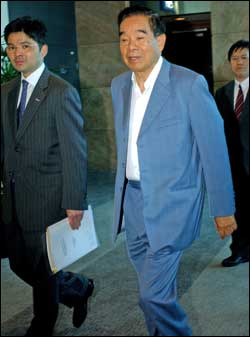 New World
Department Stores, an affiliate of New World Development (0017), is poised to
raise more than HK$2 billion through a separate listing, group chairman Cheng
Yu-tung disclosed Tuesday. It was the first time the Hong Kong tycoon has
revealed the size of the proposed spinoff. The affiliate operates 27 department
stores in mainland cities such as Beijing, Shanghai, Tianjin, Wuhan and Shenyang.
Market sources said the planned initial public offering may take place as early
as the end of this month after kicking off pre-marketing in Hong Kong later this
week. NWD's stake in the affiliate would fall to 75 percent from 100 percent on
completion of the separate listing. The share sale will be arranged by Deutsche
Bank and HSBC Holdings (0005). Apart from spinning off its department store
operation and management business in China, no similar plans for other
subsidiaries are being considered by the parent company at present, chairman
Cheng said following the group's extraordinary general meeting. NWD managing
director Henry Cheng Kar-shun said the planned IPO would provide fresh capital
for New World Department Stores for operations and business development in the
mainland. Details regarding the proposed share sale would be announced later, he
added. Meanwhile, Cheng Yu-tung dismissed bubble fears in China's stock market,
saying the recent correction is normal. "It's common to see an adjustment in the
market following a substantial rise," said the tycoon, adding that the market
volatility is unlikely to affect the SAR's economy and stock market. Cheng said
he will study whether to subscribe to shares of a couple of planned Hong Kong
IPOs from mainland property developers and real estate investment trusts. Those
include Guangdong-based KWG Property Holdings and RREEF China Commercial Trust.
Sources said Henderson Land Development (0012) chairman Lee Shau- kee, the Kwok
brothers of Sun Hung Kai Properties (0016), as well as other tycoons and
strategic investors intend to acquire stakes in KWG. KWG aims to almost double
its IPO to HK$4 billion from HK$2.3 billion. New World
Department Stores, an affiliate of New World Development (0017), is poised to
raise more than HK$2 billion through a separate listing, group chairman Cheng
Yu-tung disclosed Tuesday. It was the first time the Hong Kong tycoon has
revealed the size of the proposed spinoff. The affiliate operates 27 department
stores in mainland cities such as Beijing, Shanghai, Tianjin, Wuhan and Shenyang.
Market sources said the planned initial public offering may take place as early
as the end of this month after kicking off pre-marketing in Hong Kong later this
week. NWD's stake in the affiliate would fall to 75 percent from 100 percent on
completion of the separate listing. The share sale will be arranged by Deutsche
Bank and HSBC Holdings (0005). Apart from spinning off its department store
operation and management business in China, no similar plans for other
subsidiaries are being considered by the parent company at present, chairman
Cheng said following the group's extraordinary general meeting. NWD managing
director Henry Cheng Kar-shun said the planned IPO would provide fresh capital
for New World Department Stores for operations and business development in the
mainland. Details regarding the proposed share sale would be announced later, he
added. Meanwhile, Cheng Yu-tung dismissed bubble fears in China's stock market,
saying the recent correction is normal. "It's common to see an adjustment in the
market following a substantial rise," said the tycoon, adding that the market
volatility is unlikely to affect the SAR's economy and stock market. Cheng said
he will study whether to subscribe to shares of a couple of planned Hong Kong
IPOs from mainland property developers and real estate investment trusts. Those
include Guangdong-based KWG Property Holdings and RREEF China Commercial Trust.
Sources said Henderson Land Development (0012) chairman Lee Shau- kee, the Kwok
brothers of Sun Hung Kai Properties (0016), as well as other tycoons and
strategic investors intend to acquire stakes in KWG. KWG aims to almost double
its IPO to HK$4 billion from HK$2.3 billion.
If Hong Kong fails to take advantage
of its status as China's financial center and further develop its financial
markets, the yuan becoming a fully convertible currency in future will pose a
threat to the city, former financial secretary Antony Leung Kam-chung warned
Tuesday. "Hong Kong so far has three advantages right now: a fully convertible
currency, a separate set of laws and an individual taxation system," Leung said.
"Once China's currency becomes fully convertible, more foreign enterprises will
consider raising funds in the [mainland]. And if Hong Kong does not ride on its
current advantages, its status as an international financial center will be at
risk." Leung is currently chairman of the China division of Blackstone Group, a
US-based private equity firm. "China will definitely become the world's
second-largest economy in 10 to 15 years, if there is not a war." Four years
after his resignation as Hong Kong's finance chief, Leung is back in the
spotlight after being the key arranger of the deal between Blackstone and the
Chinese government, which has pledged to acquire a major stake in the initial
public offering of the US firm. Leung, who became financial secretary in 2001,
resigned two years later following his controversial purchase of a luxury Lexus
automobile several weeks before he announced a substantial increase in the first
registration tax of motor vehicles. The tax would have cost him HK$190,000.
Leung admitted he had been an aggressive government official. "Having slashed
salaries of our public servants in a bid to trim expenditures for the
government, the feedback I have obtained in general is that I made a correct
decision, which yet was politically incorrect," Leung said during a television
interview. Leung's decision was made because civil service spending had
accounted for 21 percent of the city's gross domestic product at the time - 4
percent higher than when the territory was under British rule. "Hong Kong had a
deficit of HK$63.3 billion, and its interest rates were slated to soar if this
problem was not resolved because the Hong Kong dollar was pegged to the [US
dollar]," Leung said.
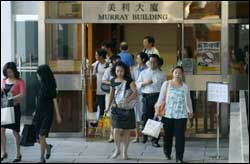 Hong Kong's 155,000 civil servants have
edged another step closer to receiving their first pay rise in six years after
the Executive Council approved a pay rise offer Tuesday. The biggest civil
servants' union, however, did not rule out calling for increases larger that
those proposed. The pay rises would cost the government HK$5.29 billion and lead
to an estimated HK$42 million increase in pension payments for retirees this
year, according to government documents presented to the Legislative Council.
Based on a government pay trend survey released last month, the offers stand at
4.62 percent for the lower- and middle-band workers, and 4.96 percent for the
upper-band civil servants. The offer for lower-band employees was adjusted to
match with the middle- tier and follows an existing practice adopted since 1989. Hong Kong's 155,000 civil servants have
edged another step closer to receiving their first pay rise in six years after
the Executive Council approved a pay rise offer Tuesday. The biggest civil
servants' union, however, did not rule out calling for increases larger that
those proposed. The pay rises would cost the government HK$5.29 billion and lead
to an estimated HK$42 million increase in pension payments for retirees this
year, according to government documents presented to the Legislative Council.
Based on a government pay trend survey released last month, the offers stand at
4.62 percent for the lower- and middle-band workers, and 4.96 percent for the
upper-band civil servants. The offer for lower-band employees was adjusted to
match with the middle- tier and follows an existing practice adopted since 1989.
 China: China
talk of the town across US - China Daily Newspaper - Since there are more
conflicts in a close relationship than a superficial one, the US' trade ties
with China will see more disputes. This seemed to be the message of a nationwide
program in the US to discuss its relationship with China. Sponsored by the
National Committee on US-China Relations (NCUSCR), the events featured
presentations by China specialists, as well as a discussion between Deputy
Assistant Secretary of State Thomas Christensen and committee president Stephen
Orlins, which was webcast live from Washington, D.C. The program, referred to as
China Town Hall, covered 30 cities across the US (the vast majority of which
held their events on Thursday night) and was designed to stimulate dialogue on
China across the US. Though NCUSCR, a non-profit group headquartered in New York
City, was the national sponsor of the program, each event was co-hosted by a
local organization involved in some way with China. In Boston, for instance, the
host was the Boston Children's Museum, which has several China-related programs
and events. It was Daniel Rosen, a visiting fellow of the Peterson Institute for
International Economics, who told the audience to be prepared for more trade
tension between the US and China in the years to come. To a great extent,
however, such tension is a sign of success and an inevitable by-product of the
two countries' economic ties getting closer, he said. Pointing out that the US
has had the most trade conflicts with Canada because of its close economic
relationship with it, Rosen said superficial relationships are marked by far
less conflict than close ones. So instead of wasting energy on drafting
legislation to punish China, Rosen suggested that the US accept China's strength
- its extraordinary endowment of labor - and stop trying to protect dying US
industries. It's better that Washington focus on its own advantages like its
high-tech industry. The bottom line, Rosen said, is that a successful US-China
relationship must be characterized by mutual trust and enthusiasm for one
another's growth. After Rosen's speech, the audience at the Boston Children's
Museum turned its attention to the live webcast of Christensen's conversation
with Orlins. Speaking from the nation's capital, Christensen, whose sole
responsibility is China, talked about the progress the US had made in its
relationship with China, as well as the challenges that lie ahead. Set up in
1966, the NCUSCR is a private, non-partisan, non-profit organization promoting
understanding and cooperation between the US and China. It believes that sound
and productive Sino-US relations serve vital American and world interests. In
1972, the NCUSCR sponsored the historic visit of China's ping-pong team to the
US. Since then, it has accumulated over four decades of experience developing
innovative programs between the two countries.
China: China
talk of the town across US - China Daily Newspaper - Since there are more
conflicts in a close relationship than a superficial one, the US' trade ties
with China will see more disputes. This seemed to be the message of a nationwide
program in the US to discuss its relationship with China. Sponsored by the
National Committee on US-China Relations (NCUSCR), the events featured
presentations by China specialists, as well as a discussion between Deputy
Assistant Secretary of State Thomas Christensen and committee president Stephen
Orlins, which was webcast live from Washington, D.C. The program, referred to as
China Town Hall, covered 30 cities across the US (the vast majority of which
held their events on Thursday night) and was designed to stimulate dialogue on
China across the US. Though NCUSCR, a non-profit group headquartered in New York
City, was the national sponsor of the program, each event was co-hosted by a
local organization involved in some way with China. In Boston, for instance, the
host was the Boston Children's Museum, which has several China-related programs
and events. It was Daniel Rosen, a visiting fellow of the Peterson Institute for
International Economics, who told the audience to be prepared for more trade
tension between the US and China in the years to come. To a great extent,
however, such tension is a sign of success and an inevitable by-product of the
two countries' economic ties getting closer, he said. Pointing out that the US
has had the most trade conflicts with Canada because of its close economic
relationship with it, Rosen said superficial relationships are marked by far
less conflict than close ones. So instead of wasting energy on drafting
legislation to punish China, Rosen suggested that the US accept China's strength
- its extraordinary endowment of labor - and stop trying to protect dying US
industries. It's better that Washington focus on its own advantages like its
high-tech industry. The bottom line, Rosen said, is that a successful US-China
relationship must be characterized by mutual trust and enthusiasm for one
another's growth. After Rosen's speech, the audience at the Boston Children's
Museum turned its attention to the live webcast of Christensen's conversation
with Orlins. Speaking from the nation's capital, Christensen, whose sole
responsibility is China, talked about the progress the US had made in its
relationship with China, as well as the challenges that lie ahead. Set up in
1966, the NCUSCR is a private, non-partisan, non-profit organization promoting
understanding and cooperation between the US and China. It believes that sound
and productive Sino-US relations serve vital American and world interests. In
1972, the NCUSCR sponsored the historic visit of China's ping-pong team to the
US. Since then, it has accumulated over four decades of experience developing
innovative programs between the two countries.
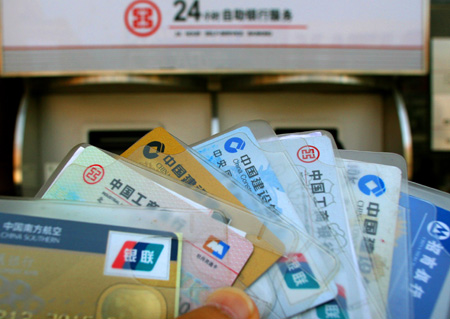 A citizen holds various bank cards on June 5. Chinese
banks have issued more than 1.23 billion bank cards, according to figures
released by the People's Bank of China. Bank card transaction volume reached
1.89 trillion yuan in 2006, up 97 percent year on year. The volume represents 17
percent of the total retail sales of consumer goods for the year, seven
percentage points higher than the previous year.
A citizen holds various bank cards on June 5. Chinese
banks have issued more than 1.23 billion bank cards, according to figures
released by the People's Bank of China. Bank card transaction volume reached
1.89 trillion yuan in 2006, up 97 percent year on year. The volume represents 17
percent of the total retail sales of consumer goods for the year, seven
percentage points higher than the previous year.
U.S. Treasury Secretary Henry Paulson said on Tuesday that
the second Strategic Economic Dialogue (SED) meeting with China produced
tangible results that have laid the groundwork for greater progress. "A
newspaper headline at the conclusion of the recent SED meeting said that it did
not 'resolve major issues.' This, in my opinion, misses the point," said Paulson
in his remarks prepared for delivery at the Heritage Foundation in Washington.
"The dialogue is an on-going process," said Paulson. "To get results, we must
build relationships, and take smaller, deliberate steps forward together to
create momentum for greater change." "Through candid discussions, we will ease,
rather than increase, tensions and get to solutions and action," said the U.S.
Treasure chief, who co-chaired the SED with Chinese Vice Premier Wu Yi last
month. He said both countries made notable progress on civil aviation, energy
and the environment, and financial services through the dialogue. "We announced
a new air services agreement that will make it easier, cheaper, and more
convenient to fly people and to ship goods between the U.S. and China," he said.
"Through the SED, we also collaborated on a series of policies to help promote
energy security and protect the environment, which will affect not only our two
countries but nations around the world," he added. Paulson also emphasized the
importance of the dialogue, saying the mechanism is important because both
countries "must get this relationship right." "An open, honest economic
relationship between our two countries is important to the future of the global
economy," he said.
Washington does not back the suggestion of a boycott of
the 2008 Olympic Games in Beijing to protest China's policy in Darfur, the US
State Department said yesterday. The boycott proposal "is a private effort that
is under way. Their perception of the ability of the Chinese government to
influence the behavior of the Sudanese government is not a US government effort;
is not something that we have supported", spokesman Sean McCormack said in
response to a query at a news conference.
 China Telecom and China
Netcom yesterday called for the deregulation of the IPTV (Internet Protocol TV)
market, which could give a major boost to the broadband Internet business of
these two fixed-line carriers. "There is an ongoing worldwide deregulation trend
in IPTV. However, it's not happening in China," said Wei Leping, China Telecom's
chief engineer. Wei complained that regulators so far allow China Telecom offer
IPTV commercial services in only six cities, preventing it from reaching
millions of potential customers across the country. Speaking on the sidelines of
the Broadband World Forum Asia 2007, which opened in Beijing yesterday, China
Netcom Chairman Zhang Chunjiang said he hopes to offer IPTV services "in every
city in China", but this can only happen when the government gives the green
light. China Telecom and China Netcom have both built trial IPTV networks in a
number of cities, but are unable to sign up commercial users without getting the
nod from regulators. The two firms hope that IPTV can provide them with a major
source of broadband revenue, but broadcasting authorities are concerned that
IPTV could hurt cable TV operators. In December 2005, the broadcasting
authorities in Quanzhou, in East China's Fujian Province, ordered the closure of
an IPTV service jointly run by China Telecom and Shanghai Media Group (SMG),
despite the fact that SMG had been granted a license to operate the service by
the State Administration of Radio, Film and Television. Wei said he expected to
see the further "convergence" of telephone, Internet and cable TV networks. But
this convergence has sparked conflicts of interest between broadcasting and
telecoms groups, which has also delayed the introduction of China's telecoms
law. The law, drafting of which started in the 1980s, is expected to offer a
regulatory framework for network convergence. Industry observers do not expect
the law to be passed before March next year. China Telecom and China
Netcom yesterday called for the deregulation of the IPTV (Internet Protocol TV)
market, which could give a major boost to the broadband Internet business of
these two fixed-line carriers. "There is an ongoing worldwide deregulation trend
in IPTV. However, it's not happening in China," said Wei Leping, China Telecom's
chief engineer. Wei complained that regulators so far allow China Telecom offer
IPTV commercial services in only six cities, preventing it from reaching
millions of potential customers across the country. Speaking on the sidelines of
the Broadband World Forum Asia 2007, which opened in Beijing yesterday, China
Netcom Chairman Zhang Chunjiang said he hopes to offer IPTV services "in every
city in China", but this can only happen when the government gives the green
light. China Telecom and China Netcom have both built trial IPTV networks in a
number of cities, but are unable to sign up commercial users without getting the
nod from regulators. The two firms hope that IPTV can provide them with a major
source of broadband revenue, but broadcasting authorities are concerned that
IPTV could hurt cable TV operators. In December 2005, the broadcasting
authorities in Quanzhou, in East China's Fujian Province, ordered the closure of
an IPTV service jointly run by China Telecom and Shanghai Media Group (SMG),
despite the fact that SMG had been granted a license to operate the service by
the State Administration of Radio, Film and Television. Wei said he expected to
see the further "convergence" of telephone, Internet and cable TV networks. But
this convergence has sparked conflicts of interest between broadcasting and
telecoms groups, which has also delayed the introduction of China's telecoms
law. The law, drafting of which started in the 1980s, is expected to offer a
regulatory framework for network convergence. Industry observers do not expect
the law to be passed before March next year.
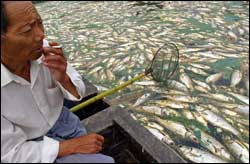 China should
see a "turning point" this year in its pollution problems, and will likely meet
its clean air and water goals in coming years, an environmental official said
Tuesday in an unusually optimistic assessment. Zhang Lijun, vice minister of the
State Environmental Protection Administration, said that while the amount of
ammonia and nitrates in waterways increased in 2006 and overall air quality
declined, protection measures such as pollution control facilities and stepped-
up enforcement would have an impact. "It is true that last year the total
discharge of pollutants was still rising," Zhang said. But he said that the
increase in pollution in 2006 was smaller than the increase the previous year.
"I'm confident that this year, the total pollutants discharged will come to a
turning point," said Zhang, adding he expected a decrease in the amount of
pollutants discharged, although he did not provide a specific figure. China has
some of the world's most polluted cities after more than two decades of high-
speed economic growth, and the government has been losing ground in recent years
in trying to balance environmental concerns with economic growth. While the
country's leaders have repeatedly promised a cleanup, they say they are
constrained by a desire to promote economic growth and by a lack of technology.
Last month, Zhang's agency reported that China's environmental situation was
deteriorating, with several major rivers and lakes clogged by industrial waste.
In February, it said China had failed to reach any of its pollution control
goals for 2006. Last year's pollution-reduction goals were part of an eight-step
plan to cut emissions of major pollutants by 10 percent in the five-year period
ending in 2010, but Zhang said he was "confident" the targets would still be
met. The measures include phasing out facilities or technologies that are heavy
polluters or energy consumers, speeding up the establishment of pollution
control facilities, and strengthening enforcement of environmental laws. He
pointed to first-quarter data reported by local authorities that showed sulfur
dioxide emissions were down 0.3 percent. Though chemical oxygen demand, a water
pollution index, had grown 0.4 percent, Zhang said further adjustments to
high-polluting industries would reduce both levels. Sulfur dioxide emissions are
chiefly caused by coal burning, and China is already the world's largest
producer and consumer of coal, depending heavily on coal-fired power plants for
electricity. Ammonia and nitrate in water supplies stem from industry emissions,
insufficient wastewater treatment plants, runoff from large-scale livestock
operations and overuse of fertilizers, Zhang said. China should
see a "turning point" this year in its pollution problems, and will likely meet
its clean air and water goals in coming years, an environmental official said
Tuesday in an unusually optimistic assessment. Zhang Lijun, vice minister of the
State Environmental Protection Administration, said that while the amount of
ammonia and nitrates in waterways increased in 2006 and overall air quality
declined, protection measures such as pollution control facilities and stepped-
up enforcement would have an impact. "It is true that last year the total
discharge of pollutants was still rising," Zhang said. But he said that the
increase in pollution in 2006 was smaller than the increase the previous year.
"I'm confident that this year, the total pollutants discharged will come to a
turning point," said Zhang, adding he expected a decrease in the amount of
pollutants discharged, although he did not provide a specific figure. China has
some of the world's most polluted cities after more than two decades of high-
speed economic growth, and the government has been losing ground in recent years
in trying to balance environmental concerns with economic growth. While the
country's leaders have repeatedly promised a cleanup, they say they are
constrained by a desire to promote economic growth and by a lack of technology.
Last month, Zhang's agency reported that China's environmental situation was
deteriorating, with several major rivers and lakes clogged by industrial waste.
In February, it said China had failed to reach any of its pollution control
goals for 2006. Last year's pollution-reduction goals were part of an eight-step
plan to cut emissions of major pollutants by 10 percent in the five-year period
ending in 2010, but Zhang said he was "confident" the targets would still be
met. The measures include phasing out facilities or technologies that are heavy
polluters or energy consumers, speeding up the establishment of pollution
control facilities, and strengthening enforcement of environmental laws. He
pointed to first-quarter data reported by local authorities that showed sulfur
dioxide emissions were down 0.3 percent. Though chemical oxygen demand, a water
pollution index, had grown 0.4 percent, Zhang said further adjustments to
high-polluting industries would reduce both levels. Sulfur dioxide emissions are
chiefly caused by coal burning, and China is already the world's largest
producer and consumer of coal, depending heavily on coal-fired power plants for
electricity. Ammonia and nitrate in water supplies stem from industry emissions,
insufficient wastewater treatment plants, runoff from large-scale livestock
operations and overuse of fertilizers, Zhang said.
June 7, 2007
 Hong Kong:
Move to breathe life into HK secondary board - Small and medium-sized
enterprises (SMEs) on the mainland may have a better overseas listing choice in
a few years as Hong Kong is beginning to take action to cure its ailing
secondary board. Hong Kong Exchanges and Clearing (HKEx), operator of the
world's second-largest listed bourse, proposed last week to allow only companies
with at least HK$100 million market capitalization and HK$20 million cash flow
to list on its Growth Enterprise Market (GEM). Though appearing to impose
hurdles for listing candidates, the proposals, analysts said, is in fact aimed
at revitalizing the lifeless board by introducing more quality listings. And
therefore, "listing candidates, including those from the mainland, will benefit
in the long term", said Kingston Lin, an analyst from Hong Kong-based Prudential
Brokerage. The new requirements, which will be put under consultation before
taking effect, do have some impact on listing candidates, said Castor Pang, a
strategist of Sun Hung Kai Financial Group. However, that impact would "only be
psychological". The new requirements would work better than the existing ones,
he said, adding that people have lost confidence in a market with too low an
entry barrier. Launched in 1999, the GEM was known for its low listing
threshold. Companies that have been in operation for only a year can apply for a
listing on the GEM, while Hong Kong's main board asks for at least a combined
HK$50 million profit over three years and a HK$200 million market value. The
loose regulations have resulted in a lack of quality listings, and as a result
the board has been plagued by low turnover and poor reputation for years. It has
not seen any new listings so far this year, while a number of quality companies
opted to switch to the main board in the past years. "If we let the GEM carry on
like this, the situation will get worse," said Prudential's Lin. An executive
from a GEM-listed mainland company told China Daily that the firm has been
trying to transfer to the main board regardless of costs. "People trust us when
they come to know that we are listed in Hong Kong. But that trust wanes when
they are told that we are listed on the GEM," said the executive, who did not
want to be named. Bank of China (Hong Kong) said in a research report last year
- when HKEx sought opinion to revamp the GEM - that the board could have a
bigger role as many mainland hi-tech companies are in great need of capital to
feed their growth. However, analysts believe more measures are needed to save
the GEM and it would take time for the board to regain its reputation and become
attractive again. Hong Kong:
Move to breathe life into HK secondary board - Small and medium-sized
enterprises (SMEs) on the mainland may have a better overseas listing choice in
a few years as Hong Kong is beginning to take action to cure its ailing
secondary board. Hong Kong Exchanges and Clearing (HKEx), operator of the
world's second-largest listed bourse, proposed last week to allow only companies
with at least HK$100 million market capitalization and HK$20 million cash flow
to list on its Growth Enterprise Market (GEM). Though appearing to impose
hurdles for listing candidates, the proposals, analysts said, is in fact aimed
at revitalizing the lifeless board by introducing more quality listings. And
therefore, "listing candidates, including those from the mainland, will benefit
in the long term", said Kingston Lin, an analyst from Hong Kong-based Prudential
Brokerage. The new requirements, which will be put under consultation before
taking effect, do have some impact on listing candidates, said Castor Pang, a
strategist of Sun Hung Kai Financial Group. However, that impact would "only be
psychological". The new requirements would work better than the existing ones,
he said, adding that people have lost confidence in a market with too low an
entry barrier. Launched in 1999, the GEM was known for its low listing
threshold. Companies that have been in operation for only a year can apply for a
listing on the GEM, while Hong Kong's main board asks for at least a combined
HK$50 million profit over three years and a HK$200 million market value. The
loose regulations have resulted in a lack of quality listings, and as a result
the board has been plagued by low turnover and poor reputation for years. It has
not seen any new listings so far this year, while a number of quality companies
opted to switch to the main board in the past years. "If we let the GEM carry on
like this, the situation will get worse," said Prudential's Lin. An executive
from a GEM-listed mainland company told China Daily that the firm has been
trying to transfer to the main board regardless of costs. "People trust us when
they come to know that we are listed in Hong Kong. But that trust wanes when
they are told that we are listed on the GEM," said the executive, who did not
want to be named. Bank of China (Hong Kong) said in a research report last year
- when HKEx sought opinion to revamp the GEM - that the board could have a
bigger role as many mainland hi-tech companies are in great need of capital to
feed their growth. However, analysts believe more measures are needed to save
the GEM and it would take time for the board to regain its reputation and become
attractive again.
Tickets for the 2008 Olympics will
go on sale on Tuesday in Hong Kong, said the China Travel Service (Hong Kong)
Ltd (CTS) on Monday. As the official ticket agent of the Beijing 2008 Olympic
Games, CTS said they will accept ticket reservation from 5 June, including
ticket reservation for Opening and Closing ceremonies and all other sports
session. According to CTS, all Hong Kong Identity Card holders are eligible to
reserve and purchase the tickets. Each applicant can only reserve one opening
and one closing ceremonies tickets. For other events, each applicant can reserve
up to four tickets per sessions. For Equestrian events in Hong Kong, each
applicant can reserve up to 10 tickets per session. Beside the face value of the
tickets, CTS is permitted by BOCOG to collect a handling fee. Details are
available from CTS website.
The Hong Kong Monetary Authority,
the city's de facto central bank, said Monday it is difficult to predict whether
China's economy would land softly and how the volatility of the mainland bourses
would impact on Hong Kong's equity markets. Hong Kong blue chips surged to a
triple-digit close Monday, shrugging off a sharp fall in mainland equities as
investors were encouraged by forecast- beating US economic data on job creation
and manufacturing activity Friday. Mainland retail investors who have already
hit the panic button after last week's tripling of stamp duty on stock
transactions are now experiencing further anxiety attacks worrying that the
central government will introduce a capital gains tax shortly to further curb
China's frenzied equity market.
An executive councillor and several
legislators have given the thumbs-up for the proposed new lineup of Chief
Executive Donald Tsang Yam-kuen's power center, describing Financial Secretary
Henry Tang Ying-yen as a suitable candidate for the post of chief secretary for
administration.
 China: Chinese
Foreign Ministry spokesman Liu Jianchao on Monday refuted a June 3 report by
Japan's Kyodo News Agency claiming that Premier Wen Jiabao would not seek a
second term. "This report is a sheer rumor," Liu said when asked to comment on
the report.
China: Chinese
Foreign Ministry spokesman Liu Jianchao on Monday refuted a June 3 report by
Japan's Kyodo News Agency claiming that Premier Wen Jiabao would not seek a
second term. "This report is a sheer rumor," Liu said when asked to comment on
the report.
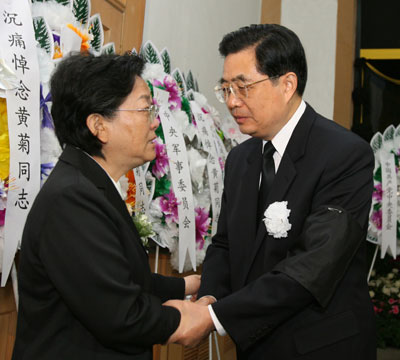 President Hu Jintao shakes hands
with Yu Huiwen, wife of late vice minister Huang Ju, while paying respects to
Huan at the Babaoshan Revolutionary Cementery in Beijing June 5, 2007. Huang's
remains were cremated on Tuesday. Top leaders Hu Jintao, Jiang Zemin, Wu Bangguo,
Wen Jiabao, Jia Qinglin, Zeng Qinghong, Wu Guanzheng, Li Changchun and Luo Gan
bid farewell to Huang who died of illness at 69 at the Cemetery.
President Hu Jintao shakes hands
with Yu Huiwen, wife of late vice minister Huang Ju, while paying respects to
Huan at the Babaoshan Revolutionary Cementery in Beijing June 5, 2007. Huang's
remains were cremated on Tuesday. Top leaders Hu Jintao, Jiang Zemin, Wu Bangguo,
Wen Jiabao, Jia Qinglin, Zeng Qinghong, Wu Guanzheng, Li Changchun and Luo Gan
bid farewell to Huang who died of illness at 69 at the Cemetery.
The securities regulator has
approved four new mutual funds, seen by analysts as an effort to stabilize the
volatile stock markets. The benchmark Shanghai Composite Index plunged 8.26
percent on Monday, falling for the third time in four trading sessions after the
country tripled tax on stock transactions to cool the market last Wednesday. The
index recorded the largest drop since February 27 when it slumped 8.84 percent
and triggered global stock sell-offs. Four mutual funds from the fund management
firms of INVESCO Great Wall, Guangfa, Fortune SGAM, and Yimin have been approved
by the China Securities Regulatory Commission (CSRC). The funds will mainly
invest in the stock markets. The move ended the CSRC's suspension of new fund
approvals in late May amid concerns the huge inflow of investors cash would
cause a bubble. Five mutual funds were launched in May, raising 35.5 billion
yuan (4.6 billion U.S. dollars), half of the 71.7 billion yuan raised by nine
funds in April, according to the Shanghai-based financial data provider Wind
Info. Analysts said the move would help to restore investor confidence after the
sharp plunge over the past few days.
 After having been involved in big-screen romances with
Takeshi Kaneshiro and Daniel Wu, Chinese actress Zhou Xun will again open her
heart on-screen, this time to another heartthrob - Vic Zhou. Shanghai Morning
Post says that "The Banquet" actress will take on the leading role as a cab
driver in the Huayi Brothers' unnamed love thriller, crazily searching for her
missing boyfriend, who will be played by Taiwan actor/singer Vic Zhou. Zhou Xun
was named best actress at the 2005 Hong Kong Film Critics Society Awards for her
performance in Peter Chan's "Perhaps Love," which also stars Takeshi Kaneshiro.
She worked with Daniel Wu in Feng Xiaogang's 2006 hit "The Banquet." The film
received the Future Film Festival Digital Award at that year's Venice Film
Festival. Sources from Zhou Xun's agent company, Huayi Brothers, say she has
been waiting for a good screenplay ever since "The Banquet," and was drawn by
the new thriller's interesting plot. Singaporean actress Fann Wong is also
expected to appear in the film. Shooting is set to start next month.
After having been involved in big-screen romances with
Takeshi Kaneshiro and Daniel Wu, Chinese actress Zhou Xun will again open her
heart on-screen, this time to another heartthrob - Vic Zhou. Shanghai Morning
Post says that "The Banquet" actress will take on the leading role as a cab
driver in the Huayi Brothers' unnamed love thriller, crazily searching for her
missing boyfriend, who will be played by Taiwan actor/singer Vic Zhou. Zhou Xun
was named best actress at the 2005 Hong Kong Film Critics Society Awards for her
performance in Peter Chan's "Perhaps Love," which also stars Takeshi Kaneshiro.
She worked with Daniel Wu in Feng Xiaogang's 2006 hit "The Banquet." The film
received the Future Film Festival Digital Award at that year's Venice Film
Festival. Sources from Zhou Xun's agent company, Huayi Brothers, say she has
been waiting for a good screenplay ever since "The Banquet," and was drawn by
the new thriller's interesting plot. Singaporean actress Fann Wong is also
expected to appear in the film. Shooting is set to start next month.
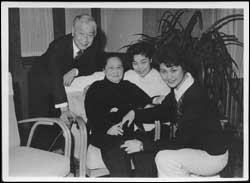 Sun Yat-sen's wife Soong Ching-
ling continues to be missed and remembered decades after her death. Her adopted
child explains why to Dinah Gardner. Time stands still at number 46 Houhai
Beiyan. For this is the home of Soong Ching-ling, the "mother of modern China,"
and the clocks have been stopped at 8.18pm and calendars stay fixed on May 29,
1981 - the moment and day she died.
Sun Yat-sen's wife Soong Ching-
ling continues to be missed and remembered decades after her death. Her adopted
child explains why to Dinah Gardner. Time stands still at number 46 Houhai
Beiyan. For this is the home of Soong Ching-ling, the "mother of modern China,"
and the clocks have been stopped at 8.18pm and calendars stay fixed on May 29,
1981 - the moment and day she died.
Puer tea has been relished for
centuries for its aged, aromatic infusions, but latter-day enthusiasts are
appreciating it more for its investment potential. And as more speculators look
to the tea as an alternative to shares and real estate, trouble may be brewing.
Not much data on the market is available but mainland media report that millions
of tea enthusiasts are buying up large stocks of puer tea and hoarding them as
an investment, giving better and quicker returns than the stock market. Interest
in puer tea has been on the rise in southern China since 2003 and reached a peak
in April. The growth in the puer market can also be seen in the expansion in
production in Yunnan province , where most puer tea is produced. In 2005, 50,000
tonnes was sold but last year that rose to 80,000 tonnes. Traditionally, puer
has been most popular in Guangdong and is renowned for being gentle on the
stomach. It has attracted more consumers in recent years with people believing
it can help them lose weight or even prevent and cure cancer. The tea has also
been called a drinkable antique because it can be stored for more than 20 years
and its value appreciates as its qualities improve over time. But the main
reason for puer's sudden rise in popularity is purely commercial - the idea that
the cheap tea can lead to big money. Zhou Yong runs the Nan Tian Tea Trading
Company which has exported puer from Yunnan to Hong Kong since 1985. He says
local governments have made great contributions to promoting the puer market.
"To generate interest in puer, most government departments in Yunnan have set up
offices to show tea etiquette to visitors," Mr Zhou said. "Well-packaged puer
has also become popular as high-class gifts among local officials and
businesspeople. "To build up good relationships with local governments, rich
businessmen have invested a lot in puer tea projects." In addition, frequent tea
auctions organised by authorities have fuelled speculative buying in puer tea.
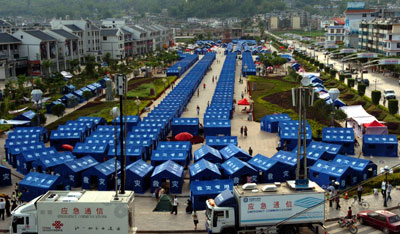 Makeshift tents
are built to serve as temporary shelters for seism-stricken residents in Ning'er,
Southwest China's Yunan Province June 4, 2006. The first batch of disaster
relief goods have been transported to Ning'er, where a magnitude 6.4 earth quake
took place on Sunday, killing three, injuring at least 300 and forcing the
evacuation of 120,000 people. Makeshift tents
are built to serve as temporary shelters for seism-stricken residents in Ning'er,
Southwest China's Yunan Province June 4, 2006. The first batch of disaster
relief goods have been transported to Ning'er, where a magnitude 6.4 earth quake
took place on Sunday, killing three, injuring at least 300 and forcing the
evacuation of 120,000 people.
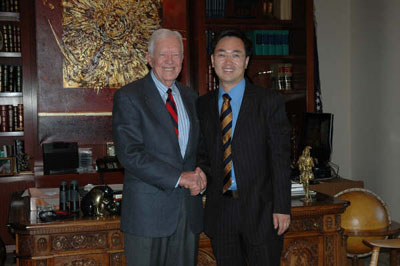 Jimmy Carter, the
39th President of the United States, has recently been interviewed by Yong Tang,
a Washington-based correspondent of People's Daily. His birthday is October 1, a
day every Chinese person will celebrate. He cut diplomatic ties with Taiwan and
established diplomatic relations with People's Republic of China. His
administration didn't fire a single bullet overseas. He was awarded Nobel Peace
Prize in 2002 for his contributions to world peace. He is still surprisingly
active both physically and spiritually at the age of nearly 83. He enjoys
working in his peanut field. He has so far written 21 books. He is The New York
Times' best selling author. His name is Jimmy Carter, the 39th President of the
United States. Recently he was interviewed in his office at the Carter Center in
Atlanta by Yong Tang, a Washington-based correspondent of People's Daily. I
first visited China in 1949 when I was a young naval officer. It was a year when
the Nationalist Chinese left Mainland China and went to Taiwan. Then on October
1, 1949, my birthday, the People's Republic of China was formed. I was very
excited and pleased when Nixon did go to China. But I was disappointed when they
announced there was only one China and didn't say which one. As you know, the
more conservative Americans, including particular Republicans, still looked upon
Taiwan as the only China. So when I became President, I thought it was time to
make a change. I saw the enormous need for better understanding, better
communication, better friendship and cooperation with China. So I decided that
would be one of my goals as President. So beginning in early 1978, Deng Xiaoping
and I had very secret negotiations. I didn't even use the State Department. All
of the messages went from the White House directly to China. I thought that it
was one of the most needed diplomatic goals in my country's life. And I think it
was the right thing to do and one of the best things I ever did. Well, it was
proven to be one of the best things that ever happened to my country, and I
think it has had a beneficial effect on China as well. When I went over in 1981
to visit China as the guest of Deng Xiaoping, he wanted me to see the first
phases of economic freedom moving toward a free enterprise. And I think that may
not have happened if we didn't have normal relations. Also his establishment of
the right of little villages to have local elections was another possible result
of the normalization. So I think that, in many ways, it has stabilized the
political and military situation in the East, in Asia and also in several other
countries. Well, the most remarkable changes in China have all been related to
economic change. I saw the original birth of free enterprise when Deng Xiaoping
would only permit small farmers to have one tiny project: buy chickens or repair
bicycles or make clay pots; they couldn't have two, only one. And later he
expanded that to villages, and then he expanded on up. So that has been the
primary change that I have seen and that has been impressive to me. It has been
profoundly noticeable to the whole world. I would say that in the field of
freedom, religious freedom, there has been great progress made. I had an
argument with him. I requested that he permit freedom of religion and that he
permit Bibles to come back into China. I'm a Christian, and he agreed to do both
of those things and did them. So in 1982 the Chinese National People's Congress
approved the guarantee of freedom of religion. There are still some restraints
on religion but progress has been made. And when I first visited China after I
left the White House, it was impossible for a person in China to move from one
place to another, except if the government ordered him to. Now there is more
freedom of movement, more freedom of religion, and more economic freedom. My
prayer and my hope are that the relation will always be friendly. But I think
there's going to be more competition between China and the United States, which
is already evident economically. I have seen your Premier Wen Jiabao making
great efforts in Latin America, Africa, and other places around the world to
expand the diplomatic and economic relationships with those countries. Some are
in competition with the United States. I think that's healthy, but that shows
what is going to happen in the future. I think the competition between the
United States and China is going to be increasingly important. If we can
maintain mutual respect and mutual trust, then that competition can be
beneficial. Well, I like the word competition better than confrontation. You
know, confrontation has the connation of possible military action. I don't
believe that, with any degree of wisdom in Beijing or Washington, we are going
to have a military confrontation. But it is inevitable that we are going to be
more competitive, even in space and military capabilities as well as economics
and politics. But if we retain our friendships then that competition can be
peaceful and maybe mutually beneficial. Jimmy Carter, the
39th President of the United States, has recently been interviewed by Yong Tang,
a Washington-based correspondent of People's Daily. His birthday is October 1, a
day every Chinese person will celebrate. He cut diplomatic ties with Taiwan and
established diplomatic relations with People's Republic of China. His
administration didn't fire a single bullet overseas. He was awarded Nobel Peace
Prize in 2002 for his contributions to world peace. He is still surprisingly
active both physically and spiritually at the age of nearly 83. He enjoys
working in his peanut field. He has so far written 21 books. He is The New York
Times' best selling author. His name is Jimmy Carter, the 39th President of the
United States. Recently he was interviewed in his office at the Carter Center in
Atlanta by Yong Tang, a Washington-based correspondent of People's Daily. I
first visited China in 1949 when I was a young naval officer. It was a year when
the Nationalist Chinese left Mainland China and went to Taiwan. Then on October
1, 1949, my birthday, the People's Republic of China was formed. I was very
excited and pleased when Nixon did go to China. But I was disappointed when they
announced there was only one China and didn't say which one. As you know, the
more conservative Americans, including particular Republicans, still looked upon
Taiwan as the only China. So when I became President, I thought it was time to
make a change. I saw the enormous need for better understanding, better
communication, better friendship and cooperation with China. So I decided that
would be one of my goals as President. So beginning in early 1978, Deng Xiaoping
and I had very secret negotiations. I didn't even use the State Department. All
of the messages went from the White House directly to China. I thought that it
was one of the most needed diplomatic goals in my country's life. And I think it
was the right thing to do and one of the best things I ever did. Well, it was
proven to be one of the best things that ever happened to my country, and I
think it has had a beneficial effect on China as well. When I went over in 1981
to visit China as the guest of Deng Xiaoping, he wanted me to see the first
phases of economic freedom moving toward a free enterprise. And I think that may
not have happened if we didn't have normal relations. Also his establishment of
the right of little villages to have local elections was another possible result
of the normalization. So I think that, in many ways, it has stabilized the
political and military situation in the East, in Asia and also in several other
countries. Well, the most remarkable changes in China have all been related to
economic change. I saw the original birth of free enterprise when Deng Xiaoping
would only permit small farmers to have one tiny project: buy chickens or repair
bicycles or make clay pots; they couldn't have two, only one. And later he
expanded that to villages, and then he expanded on up. So that has been the
primary change that I have seen and that has been impressive to me. It has been
profoundly noticeable to the whole world. I would say that in the field of
freedom, religious freedom, there has been great progress made. I had an
argument with him. I requested that he permit freedom of religion and that he
permit Bibles to come back into China. I'm a Christian, and he agreed to do both
of those things and did them. So in 1982 the Chinese National People's Congress
approved the guarantee of freedom of religion. There are still some restraints
on religion but progress has been made. And when I first visited China after I
left the White House, it was impossible for a person in China to move from one
place to another, except if the government ordered him to. Now there is more
freedom of movement, more freedom of religion, and more economic freedom. My
prayer and my hope are that the relation will always be friendly. But I think
there's going to be more competition between China and the United States, which
is already evident economically. I have seen your Premier Wen Jiabao making
great efforts in Latin America, Africa, and other places around the world to
expand the diplomatic and economic relationships with those countries. Some are
in competition with the United States. I think that's healthy, but that shows
what is going to happen in the future. I think the competition between the
United States and China is going to be increasingly important. If we can
maintain mutual respect and mutual trust, then that competition can be
beneficial. Well, I like the word competition better than confrontation. You
know, confrontation has the connation of possible military action. I don't
believe that, with any degree of wisdom in Beijing or Washington, we are going
to have a military confrontation. But it is inevitable that we are going to be
more competitive, even in space and military capabilities as well as economics
and politics. But if we retain our friendships then that competition can be
peaceful and maybe mutually beneficial.
The United States submitted on Monday a paper to the World
Trade Organization (WTO), proposing much tougher rules on trade-distorting
subsidies.
China's largest hydropower project, the Three Gorges
Project, is expected to start full operation three to four months ahead of
schedule as workers speed up the installation of the 12 turbines on the right
bank of the Gorges.
Customs officials in China and the United States will
regularly share information about seizures of pirated goods and encourage more
exchanges to better combat infringements of intellectual property rights (IPR),
a top official has said. To help them better select targets for IPR enforcement
and evaluate achievements, Chinese and US customs officials will every six
months exchange statistics concerning seizures of counterfeit and pirated goods
originating in or destined for the other side, Mu Xinsheng, minister of the
General Administration of Customs (GAC), said in an interview yesterday. The
statistics will include the number of seizures, quantity and value of goods,
transportation type and the main ports of transit used. To help track down IPR
violators and improve law enforcement, each side may also ask the other to
provide information on up to 10 specific IPR-related seizures each quarter, the
minister said. Measures aimed at increasing visits to each other's ports and
respective offices and encouraging exchanges of IPR enforcement experiences
among customs officers are also on the cards. Mu said all the new measures are
included in the Memorandum on Strengthened Cooperation in Border IPR Enforcement
between the GAC and the US Customs and Border Protection (CBP), which was signed
on May 22. He said the US has regularly criticized China for its failure to
prevent IPR infringements at its borders in recent years, while refusing to
provide enough information about seizures of pirated products. "The new
agreement will lead to more effective and efficient IPR enforcement in both
countries," the minister said. Mu said piracy and counterfeiting are global
problems that no country can solve on its own. "Instead of criticism and
confrontation, communication and cooperation are better ways to resolve
disputes," he said. The minister said China has made progress in preventing IPR
infringements at its borders and that the agreement offers Chinese customs
officers a chance to learn from their US counterparts. Having access to more
information about seizures could help Chinese customs identify pirated goods. To
better implement the agreement, the GAC and CBP have decided to open new
channels of communication. Each side will create a point of contact, about which
it will inform the other side in writing, according to the GAC. Official figures
show that Chinese customs uncovered 2,473 IPR infringement cases last year, or
double the amount in 2005. More than 200 million pirated or counterfeit goods
were seized during the period. Meanwhile, China and the US will today kick off a
four-day talks on the complaints Washington filed with the World Trade
Organization. The two sides will also touch on issues such as opening the
Chinese market to publications. The US filed formal complaints over copyright
piracy and restrictions on the sale of US movies, music and books in China in
April.
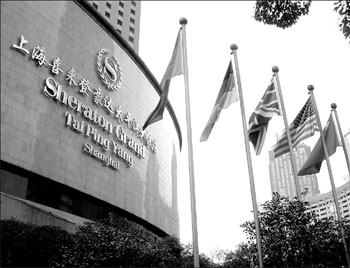 Hotel
investments will rise in Asia this year and China will be the driving force
along with Japan, says Scott Hetherington, managing director of Jones Lang
LaSalle Hotels. According to the latest report of the hotel investment services
firm, the global hotel transaction volume reached a historical peak in 2006,
surpassing $72 billion, since 2002, when the global market began to recover from
its lowest point. Although America and Europe are the two major regions where
the transactions have been and will continue to be the highest, "Asia-Pacific
would enjoy the highest growth by volume of transactions this year," said Arthur
de Haast, global CEO of Jones Lang. "This year, the global volume will slightly
fall to less than $70 billion. America would be flat, Europe, decrease, and
Asia, accelerate," he predicted. China is already seeing a lot of action on the
hotel investment front, said Hetherington. And the coming Olympics is acting as
the catalyst. Ever since Beijing was chosen as the next Olympics venue, hotel
investments have picked up rapidly in China. Despite the restrictions introduced
in mid-2006 by the government on acquisition and funding of real estate
investments by foreign entities on the mainland, investors look anything but
discouraged. The number of deals in 2006 crossed 16 and the hotel transaction
volume exceeded $1 billion, which is over one-sixth of the total volume in the
whole of Asia. Under the new policies, foreign investors are required to have at
least 50 percent of the total investment in registered capital, up from the
previous 33.3 percent, for investments over $30 million. In line with previous
years, sellers were private individuals, State-owned enterprises as well as
Japanese and Singaporean owners. Buyers were a mix of private equities,
owner-operators, venture funds and real estate investment trusts, the majority
of which are based in the Asia-Pacific region. There will be strong investor
demand across the mid- and upper-scale hotels in big cities like Beijing and
Shanghai and strategic secondary locations, said Andreas Flaig, executive
vice-president Jones Lang and head of its China business. Hotel
investments will rise in Asia this year and China will be the driving force
along with Japan, says Scott Hetherington, managing director of Jones Lang
LaSalle Hotels. According to the latest report of the hotel investment services
firm, the global hotel transaction volume reached a historical peak in 2006,
surpassing $72 billion, since 2002, when the global market began to recover from
its lowest point. Although America and Europe are the two major regions where
the transactions have been and will continue to be the highest, "Asia-Pacific
would enjoy the highest growth by volume of transactions this year," said Arthur
de Haast, global CEO of Jones Lang. "This year, the global volume will slightly
fall to less than $70 billion. America would be flat, Europe, decrease, and
Asia, accelerate," he predicted. China is already seeing a lot of action on the
hotel investment front, said Hetherington. And the coming Olympics is acting as
the catalyst. Ever since Beijing was chosen as the next Olympics venue, hotel
investments have picked up rapidly in China. Despite the restrictions introduced
in mid-2006 by the government on acquisition and funding of real estate
investments by foreign entities on the mainland, investors look anything but
discouraged. The number of deals in 2006 crossed 16 and the hotel transaction
volume exceeded $1 billion, which is over one-sixth of the total volume in the
whole of Asia. Under the new policies, foreign investors are required to have at
least 50 percent of the total investment in registered capital, up from the
previous 33.3 percent, for investments over $30 million. In line with previous
years, sellers were private individuals, State-owned enterprises as well as
Japanese and Singaporean owners. Buyers were a mix of private equities,
owner-operators, venture funds and real estate investment trusts, the majority
of which are based in the Asia-Pacific region. There will be strong investor
demand across the mid- and upper-scale hotels in big cities like Beijing and
Shanghai and strategic secondary locations, said Andreas Flaig, executive
vice-president Jones Lang and head of its China business.
China's stock market crashed Monday
as the benchmark index recorded its biggest one-day points plunge in history
after retail investors fled the market in panic selling.
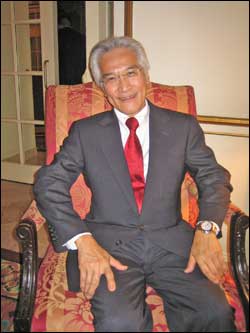 Singapore Airlines is confident of achieving synergy with
China Eastern Airlines (0670) and helping it maintain a strong market share in
its Shanghai home base after a proposed stake acquisition, chief executive Chew
Choon Seng told The Standard in Vancouver. The planned stake purchase by the
world's biggest airline by stock market value comes at a time when China Eastern
faces fierce competition from the strategic alliance of Air China (0753) and
Cathay Pacific Airways (0293). SIA "will work together with [China Eastern] to
share knowledge, operational and technological ideas," Chew said Monday on the
sidelines of an International Air Transport Association dinner. The
Singapore-listed company informed the Shanghai carrier last week of its interest
in a stake investment. "The aviation business is always too competitive. The
important thing is organization," he said. Beijing is opening up the market step
by step with the aim of giving domestic carriers a fast-track entry to
international markets.
Singapore Airlines is confident of achieving synergy with
China Eastern Airlines (0670) and helping it maintain a strong market share in
its Shanghai home base after a proposed stake acquisition, chief executive Chew
Choon Seng told The Standard in Vancouver. The planned stake purchase by the
world's biggest airline by stock market value comes at a time when China Eastern
faces fierce competition from the strategic alliance of Air China (0753) and
Cathay Pacific Airways (0293). SIA "will work together with [China Eastern] to
share knowledge, operational and technological ideas," Chew said Monday on the
sidelines of an International Air Transport Association dinner. The
Singapore-listed company informed the Shanghai carrier last week of its interest
in a stake investment. "The aviation business is always too competitive. The
important thing is organization," he said. Beijing is opening up the market step
by step with the aim of giving domestic carriers a fast-track entry to
international markets.
June 6, 2007
 Hong Kong:
Hong Kong police chief Tang King-shing has pledged strong measures to ensure
public security during the carnival period marking the 10th anniversary of the
region's return to its Chinese motherland. "Peace and order have prevailed in
Hong Kong since its return to the motherland 10 years ago, and we will make sure
that all the 10th anniversary celebration events will be held safely so that
people can enjoy themselves," said Tang King-shing, commissioner of Police of
the Hong Kong Special Administrative Region (HKSAR) government, in an recent
interview with Xinhua. "We have sufficient manpower to protect VIPs and the mass
public," he said, adding that he had ordered all regional police chiefs to step
up their efforts to maintain public security when various celebrations are
warming up. Hong Kong returned to the motherland on July 1, 1997, and the HKSAR
government has planned more than 460 events to celebrate the 10th anniversary.
It is reported that senior officials of the central government will also come to
Hong Kong to attend celebration events around July 1. This seems to have posed
the first major challenge to Tang after he was appointed police chief early this
year. However, Tang said that he was confident of fulfilling his duty as he had
experienced many major events over the past years such as the returning ceremony
on July 1, 1997 and the 6th Ministerial Conference of the World Trade
Organization held here in December 2005. Tang recalled that he was in charge of
on-site security at the returning ceremony in 1997 as the Chief Superintendent
of Police. "Everyone was focusing on the historic moment, but I had to ensure
that every detail of the ceremony went right. I only slept a little more than
one hour in two days," he said. As an international city, Hong Kong has hosted
many international conferences over the past years, but what impressed Tang most
was the successful convening of the 6th Ministerial Conference of the World
Trade Organization. "The security of the meeting posed a grave challenge to Hong
Kong police, but we finally managed to ensure the meeting to go on smoothly. We
are proud of it," he said. Tang said that comparing with other international
cities, Hong Kong still remains one of the safest ones in the world, citing the
city's crime rate standing only at 1,100 to 1,200 cases per 100, 000 people.
Talking about Hong Kong's hosting of the equestrian events of the 2008 Beijing
Olympic Games, Tang acknowledged Hong Kong police still lack enough experience
in dealing with major world sports events. "However, we are learning quickly,"
he said. Hong Kong police have, time and again, invited foreign experts to give
lectures on the issue, and have also sent officers to 2006 Torino Winter Olympic
Games and Doha Asian Games to learn their experience of security work, he said.
"The Beijing Olympic Games Organization Committee is satisfied with the security
plan we have mapped out, and we have also pledged to improve the plan whenever
it is needed," he said. To further ensure the security work, Hong Kong police
have also established close cooperation and friendly relationship with police in
the mainland and the Chinese People's Liberation Army (PLA) Garrison in Hong
Kong, he said. Hong Kong:
Hong Kong police chief Tang King-shing has pledged strong measures to ensure
public security during the carnival period marking the 10th anniversary of the
region's return to its Chinese motherland. "Peace and order have prevailed in
Hong Kong since its return to the motherland 10 years ago, and we will make sure
that all the 10th anniversary celebration events will be held safely so that
people can enjoy themselves," said Tang King-shing, commissioner of Police of
the Hong Kong Special Administrative Region (HKSAR) government, in an recent
interview with Xinhua. "We have sufficient manpower to protect VIPs and the mass
public," he said, adding that he had ordered all regional police chiefs to step
up their efforts to maintain public security when various celebrations are
warming up. Hong Kong returned to the motherland on July 1, 1997, and the HKSAR
government has planned more than 460 events to celebrate the 10th anniversary.
It is reported that senior officials of the central government will also come to
Hong Kong to attend celebration events around July 1. This seems to have posed
the first major challenge to Tang after he was appointed police chief early this
year. However, Tang said that he was confident of fulfilling his duty as he had
experienced many major events over the past years such as the returning ceremony
on July 1, 1997 and the 6th Ministerial Conference of the World Trade
Organization held here in December 2005. Tang recalled that he was in charge of
on-site security at the returning ceremony in 1997 as the Chief Superintendent
of Police. "Everyone was focusing on the historic moment, but I had to ensure
that every detail of the ceremony went right. I only slept a little more than
one hour in two days," he said. As an international city, Hong Kong has hosted
many international conferences over the past years, but what impressed Tang most
was the successful convening of the 6th Ministerial Conference of the World
Trade Organization. "The security of the meeting posed a grave challenge to Hong
Kong police, but we finally managed to ensure the meeting to go on smoothly. We
are proud of it," he said. Tang said that comparing with other international
cities, Hong Kong still remains one of the safest ones in the world, citing the
city's crime rate standing only at 1,100 to 1,200 cases per 100, 000 people.
Talking about Hong Kong's hosting of the equestrian events of the 2008 Beijing
Olympic Games, Tang acknowledged Hong Kong police still lack enough experience
in dealing with major world sports events. "However, we are learning quickly,"
he said. Hong Kong police have, time and again, invited foreign experts to give
lectures on the issue, and have also sent officers to 2006 Torino Winter Olympic
Games and Doha Asian Games to learn their experience of security work, he said.
"The Beijing Olympic Games Organization Committee is satisfied with the security
plan we have mapped out, and we have also pledged to improve the plan whenever
it is needed," he said. To further ensure the security work, Hong Kong police
have also established close cooperation and friendly relationship with police in
the mainland and the Chinese People's Liberation Army (PLA) Garrison in Hong
Kong, he said.
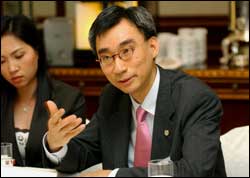 Ping An Insurance
(2318), which become the newest member of the Hang Seng Index today, said it
will diversify its portfolio by investing in financial and infrastructure
companies in the Asia- Pacific region once the regulator gives the go-ahead. The
move will allow the insurer to move away from over-reliance on mainland assets.
Chief executive Louis Cheung Chi- yan said the insurer will have US$7.5 billion
(HK$58.5 billion) available for overseas investment when new rules become
effective. The Shenzhen-based insurer has invested about US$2 billion in
American depositary receipts and fixed-income products. "We have been studying
the possibilities for almost 2 years and we are eyeing investments that offer at
least 3 to 5 years long-term stable returns, with high dividend yields," Cheung
said, adding that the return on investments would be greater than the current
level, which is more than the 4.5 percent risk- free rate. He also said Ping An
will join strategic partners such as Goldman Sachs, Morgan Stanley, or HSBC
(0005), which has a 17 percent stake in the insurer, in considering private
equity investments in India and eastern Europe. Ping An Insurance
(2318), which become the newest member of the Hang Seng Index today, said it
will diversify its portfolio by investing in financial and infrastructure
companies in the Asia- Pacific region once the regulator gives the go-ahead. The
move will allow the insurer to move away from over-reliance on mainland assets.
Chief executive Louis Cheung Chi- yan said the insurer will have US$7.5 billion
(HK$58.5 billion) available for overseas investment when new rules become
effective. The Shenzhen-based insurer has invested about US$2 billion in
American depositary receipts and fixed-income products. "We have been studying
the possibilities for almost 2 years and we are eyeing investments that offer at
least 3 to 5 years long-term stable returns, with high dividend yields," Cheung
said, adding that the return on investments would be greater than the current
level, which is more than the 4.5 percent risk- free rate. He also said Ping An
will join strategic partners such as Goldman Sachs, Morgan Stanley, or HSBC
(0005), which has a 17 percent stake in the insurer, in considering private
equity investments in India and eastern Europe.
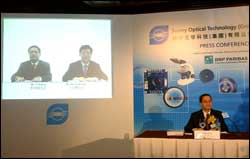 China maker of
optical components and optoelectronics and a Hong Kong-based pharmaceutical
company open their share offers to retail investors today as they target a
combined HK$1.856 billion. Sunny Optical Technology (Group) is seeking to raise
HK$1.031 billion by offering 270 million shares, 27 percent of its enlarged
issued share capital. Shares are being offered in a range between HK$3 and
HK$3.82. Proceeds will be used to expand capacity, pay off debt and for research
and development. Of the shares, 200 million are new and the rest existing
shares. The deal is led by BNP Paribas. The price range values Sunny at 15 to 19
times historical 2006 earnings. Net profit last year was 117 million yuan
(HK$119.49 million), up 42 percent from 2005. Revenue rose 53 percent to 900.7
million yuan. But the gross profit margin of its optoelectronic products fell to
16.3 percent last year from 27 percent in 2005, putting pressure on the overall
margins, which narrowed to 27.5 percent from 30.7 percent. The margins narrowed
as a result of a change in the product mix, with sales of low-margin
optoelectronic products rising. China maker of
optical components and optoelectronics and a Hong Kong-based pharmaceutical
company open their share offers to retail investors today as they target a
combined HK$1.856 billion. Sunny Optical Technology (Group) is seeking to raise
HK$1.031 billion by offering 270 million shares, 27 percent of its enlarged
issued share capital. Shares are being offered in a range between HK$3 and
HK$3.82. Proceeds will be used to expand capacity, pay off debt and for research
and development. Of the shares, 200 million are new and the rest existing
shares. The deal is led by BNP Paribas. The price range values Sunny at 15 to 19
times historical 2006 earnings. Net profit last year was 117 million yuan
(HK$119.49 million), up 42 percent from 2005. Revenue rose 53 percent to 900.7
million yuan. But the gross profit margin of its optoelectronic products fell to
16.3 percent last year from 27 percent in 2005, putting pressure on the overall
margins, which narrowed to 27.5 percent from 30.7 percent. The margins narrowed
as a result of a change in the product mix, with sales of low-margin
optoelectronic products rising.
The Import and Export Bank of China,
known as Exim Bank, announced on Monday that its board of directors has given
the bank a "go-ahead" to issue Renminbi bonds on the Hong Kong market. This
makes Exim Bank the third bank in less than two months to consider issuing
Renminbi bonds in Hong Kong. The Exim Bank said it was fully prepared for the
issuance but would not disclose specifics. "Once it is approved by the People's
Bank of China, we will start issuance procedures and file with Hong Kong
financial authorities," an Exim Bank statement said. The Bank of China announced
on May 28 that it plans to issue Renminbi bonds valued at no more than three
billion yuan in Hong Kong. The plan, however, has to be approved by its
shareholders on June 14, according to China Business News. One month earlier,
the China Construction Bank announced it was likely to issue Renminbi bonds in
Hong Kong valued at five billion yuan if market conditions were favorable. Local
banks' enthusiasm for Renminbi bond issuance in Hong Kong was kindled in January
by a circular from the People's Bank of China, which said that mainland
financial institutions, once approved, could issue Renminbi bonds on the Hong
Kong market. However, the capital raised must be handled by Hong Kong clearing
banks. Another factor piquing mainland banks' interest is the rising yuan.
Although Renminbi bank deposits in Hong Kong stood at only 24.9 billion yuan
(around 3.2 billion U.S. dollars) in February, equivalent to only five percent
of non-Renminbi bank deposits, the appreciation potential of the yuan is
regarded by many industrial analysts as a lure to investors in Hong Kong. The
Hong Kong dollar has been cheaper than the yuan for several months, with the
central parity rate of yuan against Hong Kong dollar standing at 0.97970 on
Monday. It remains unclear when and how China's central bank will kick off
Renminbi bond issuances in Hong Kong. But Hong Kong Financial Secretary Henry
Tang has said he hopes the administrative arrangements and legislative
procedures for the issuance could be introduced in the first half of the year.
Established in 1994 and solely owned by the central government, China Exim Bank
is a state export credit agency and an important element in the backup system
for China's foreign trade.
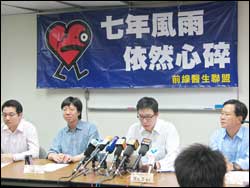 Frontline
public doctors are gearing up for industrial action, and have demanded that the
Hospital Authority resolve within two weeks what they see as an unfair pay scale
for some 2,000 doctors hired after year 2000. "We want a clear response from the
Hospital Authority along with a specific deadline for concrete measures to
equalize our wages," said Ernie Lo Chi- fung, chairman of the Frontline Doctors
Union. Lo Sunday said the morale of frontline doctors has suffered as a result
of an unfair pay system. "If the authority fails to provide a clear and
satisfactory answer, we won't rule out the possibility of taking to the streets
July 1 to voice our concerns. We might resort to industrial action without
affecting services to patients," he said. The union is collecting signatures and
the views of frontline doctors before making any decision, but Lo declined to
say if they will go on strike. The salary of a fresh medical school graduate
hired in 1999 was HK$41,965 a month, but a year later, doctors hired by both the
authority and the government were offered HK$33,355 a month. The government has
proposed raising their salaries, but the authority has yet to present a concrete
proposal. At present, a doctor with eight years' working experience and who was
hired by the authority before 2000 earns HK$72,135 a month. But those hired in
2000 with less than one year's experience get HK$43,940. Frontline
public doctors are gearing up for industrial action, and have demanded that the
Hospital Authority resolve within two weeks what they see as an unfair pay scale
for some 2,000 doctors hired after year 2000. "We want a clear response from the
Hospital Authority along with a specific deadline for concrete measures to
equalize our wages," said Ernie Lo Chi- fung, chairman of the Frontline Doctors
Union. Lo Sunday said the morale of frontline doctors has suffered as a result
of an unfair pay system. "If the authority fails to provide a clear and
satisfactory answer, we won't rule out the possibility of taking to the streets
July 1 to voice our concerns. We might resort to industrial action without
affecting services to patients," he said. The union is collecting signatures and
the views of frontline doctors before making any decision, but Lo declined to
say if they will go on strike. The salary of a fresh medical school graduate
hired in 1999 was HK$41,965 a month, but a year later, doctors hired by both the
authority and the government were offered HK$33,355 a month. The government has
proposed raising their salaries, but the authority has yet to present a concrete
proposal. At present, a doctor with eight years' working experience and who was
hired by the authority before 2000 earns HK$72,135 a month. But those hired in
2000 with less than one year's experience get HK$43,940.
Mr. Stephen Selby, director of Hong
Kong Intellectual Property Department, paid a visit to the Beijing Organizing
Committee for the Games of the XXIX Olympiad (BOCOG) on May 25, 2007 and
exchanged views with BOCOG Legal Affairs Department on the joint efforts to
protect the Olympic intellectual property rights in the Hong Kong Special
Administrative Region. Since Beijing won the rights to hold the 2008 Olympic
Games and especially since the Olympic equestrian events moved to Hong Kong, Mr.
Selby's department has done a lot to protect the Olympic IPR in Hong Kong. The
department has seen it as its routine work and set up a unit to supervise and
register cases of infringement of Olympic IPR in Hong Kong. BOCOG has attached
great importance to the Olympic IPR protection in Hong Kong and has maintained
very good relations with Hong Kong Intellectual Property Department. As 2008 is
drawing near, BOCOG will enhance cooperation with the department. As a statutory
body of HK SAR, the Intellectual Property Department is responsible for the
registration, publicity and management of the IPR in Hong Kong. It also makes
efforts to promote awareness of IPR among HK citizens. Mr. Selby has contributed
greatly to the work.
The recent rise in long-term
interest rates around the world - largely ignored by investors - is a bigger
threat to Asian equity markets than any potential crash in China, and could
trigger widespread corrections given stretched valuations in Asia, HSBC has
warned.
Hong Kong airport's new terminal
will help strengthen the city's position as an Asian and global transportation
hub, but competition from rivals in the region continues to grow, analysts said.
 China: China
issued a national plan on Monday to address climate change and show its
determination to reduce greenhouse gas (GHG) emissions in an all round way.
Under the National Climate Change Program, the first by a developing country,
China pledges to restructure its economy, promoting clean technologies and
improving energy efficiency. The plan is proof of China's determination to
reduce GHG emissions, said Ma Kai, minister in charge of the National
Development and Reform Commission. But the plan does not include any quantified
targets for carbon dioxide emission. "The absence of any quantified targets for
reducing greenhouse gas emissions does not mean China isn't serious about
reducing GHG emissions," the top economic planner told a press conference in
Beijing two days ahead of Chinese President Hu Jintao's visit to Germany for a
G8 meeting at which global warming will top the agenda. China has come under
increasing pressure from industrialized economies to reduce its carbon dioxide
emissions. With the new plan, the nation has opted not to hide behind the fact
that the Kyoto Protocol does not obligate developing nations to reduce GHG
emissions. According to the calculations by Xinhua, if all the objectives in the
program were achieved -- on hydro and nuclear power generation, upgrading of
thermal power generation, facilitation of coal-bed-gas development, the use of
renewable energy resources such as wind power, solar power and terrestrial heat,
forestation and energy-saving -- the world's most populous country would emit
1.5 billion tons less carbon dioxide and equivalent by 2010 while still
continuing to grow rapidly. Citing figures from the International Energy Agency,
Ma rebutted the argument that China is a "menace to the global environment". "I
don't see how China can be labeled a menace. Compared to the industrialized
countries, until recently China had low greenhouse gas emissions and its
emissions are still relatively low in per capita terms. Rises in gross domestic
product in China produce smaller hikes in carbon dioxide discharges than in
other countries. This kind of talk is grossly exaggerated and unfair," Ma said.
China prefers to calculate GHG emissions in per capita terms pointing out that,
in 2004, its per capita carbon dioxide emissions were 3.65 tons, compared to a
world average of 4.20 tons and an average of 10.95 tons for the Economic
Co-operation and Development (OECD) countries. More pertinently, China points
out that a one-percent rise in GDP leads to an average 0.6 percent increase in
carbon dioxide emissions worldwide, but the Chinese figure is only 0.38 percent.
"Even if China overtook the United States one day in total carbon dioxide
discharges, given that the former's population is five times as much as the
latter, China's per capita greenhouse gas emission would remain low compared
with the United States," Ma said. The minister advocated a more objective
methodology to evaluate carbon dioxide emissions, pointing out that
globalization had shifted a significant amount of production to developing
countries, forcing up their energy consumption. Ma urged the international
community to respect the developing countries right to develop, saying that
China was ready to cooperate closely with other nations to combat climate
change. The 62-page action plan details the policies and measures China will
take to mitigate and adapt itself to climate change. "By mitigation, we mean
curbing carbon dioxide emissions, emitting as little as possible. By adaptation,
we mean minimizing the negative impact of greenhouse gases by improving our
ability to forecast and prevent disasters," Ma said. The plan says that regional
cooperation on climate change should function as "a helpful complement" to the
United Nations Framework Convention on Climate Change and the Kyoto Protocol
rather than replacing or weakening them. The China Meteorological Administration
announced Friday that this year's Spring was the country's 11th warm Spring
since 1997, with the temperature averaging 10.6 degrees Celsius from March to
May, 1.2 degrees higher than normal years and the second highest since 1951. The
National Climate Change Program notes that the most significant temperature
increases have occurred in winter with 20 consecutive warm winters from 1986 to
2005. The sea level has risen by 2.5 mm annually along China's coasts over the
last 50 years, slightly faster than the global average. But the nation's
mountain glaciers are retreating much more rapidly. The program warns that the
risk of desertification will intensify. "Climate change is a challenge China
must cope with to realize sustainable development... Implementing a climate
change containment policy may cost a fortune, but the cost will be even higher
if we delay. Early action is imperative," Ma said.
China: China
issued a national plan on Monday to address climate change and show its
determination to reduce greenhouse gas (GHG) emissions in an all round way.
Under the National Climate Change Program, the first by a developing country,
China pledges to restructure its economy, promoting clean technologies and
improving energy efficiency. The plan is proof of China's determination to
reduce GHG emissions, said Ma Kai, minister in charge of the National
Development and Reform Commission. But the plan does not include any quantified
targets for carbon dioxide emission. "The absence of any quantified targets for
reducing greenhouse gas emissions does not mean China isn't serious about
reducing GHG emissions," the top economic planner told a press conference in
Beijing two days ahead of Chinese President Hu Jintao's visit to Germany for a
G8 meeting at which global warming will top the agenda. China has come under
increasing pressure from industrialized economies to reduce its carbon dioxide
emissions. With the new plan, the nation has opted not to hide behind the fact
that the Kyoto Protocol does not obligate developing nations to reduce GHG
emissions. According to the calculations by Xinhua, if all the objectives in the
program were achieved -- on hydro and nuclear power generation, upgrading of
thermal power generation, facilitation of coal-bed-gas development, the use of
renewable energy resources such as wind power, solar power and terrestrial heat,
forestation and energy-saving -- the world's most populous country would emit
1.5 billion tons less carbon dioxide and equivalent by 2010 while still
continuing to grow rapidly. Citing figures from the International Energy Agency,
Ma rebutted the argument that China is a "menace to the global environment". "I
don't see how China can be labeled a menace. Compared to the industrialized
countries, until recently China had low greenhouse gas emissions and its
emissions are still relatively low in per capita terms. Rises in gross domestic
product in China produce smaller hikes in carbon dioxide discharges than in
other countries. This kind of talk is grossly exaggerated and unfair," Ma said.
China prefers to calculate GHG emissions in per capita terms pointing out that,
in 2004, its per capita carbon dioxide emissions were 3.65 tons, compared to a
world average of 4.20 tons and an average of 10.95 tons for the Economic
Co-operation and Development (OECD) countries. More pertinently, China points
out that a one-percent rise in GDP leads to an average 0.6 percent increase in
carbon dioxide emissions worldwide, but the Chinese figure is only 0.38 percent.
"Even if China overtook the United States one day in total carbon dioxide
discharges, given that the former's population is five times as much as the
latter, China's per capita greenhouse gas emission would remain low compared
with the United States," Ma said. The minister advocated a more objective
methodology to evaluate carbon dioxide emissions, pointing out that
globalization had shifted a significant amount of production to developing
countries, forcing up their energy consumption. Ma urged the international
community to respect the developing countries right to develop, saying that
China was ready to cooperate closely with other nations to combat climate
change. The 62-page action plan details the policies and measures China will
take to mitigate and adapt itself to climate change. "By mitigation, we mean
curbing carbon dioxide emissions, emitting as little as possible. By adaptation,
we mean minimizing the negative impact of greenhouse gases by improving our
ability to forecast and prevent disasters," Ma said. The plan says that regional
cooperation on climate change should function as "a helpful complement" to the
United Nations Framework Convention on Climate Change and the Kyoto Protocol
rather than replacing or weakening them. The China Meteorological Administration
announced Friday that this year's Spring was the country's 11th warm Spring
since 1997, with the temperature averaging 10.6 degrees Celsius from March to
May, 1.2 degrees higher than normal years and the second highest since 1951. The
National Climate Change Program notes that the most significant temperature
increases have occurred in winter with 20 consecutive warm winters from 1986 to
2005. The sea level has risen by 2.5 mm annually along China's coasts over the
last 50 years, slightly faster than the global average. But the nation's
mountain glaciers are retreating much more rapidly. The program warns that the
risk of desertification will intensify. "Climate change is a challenge China
must cope with to realize sustainable development... Implementing a climate
change containment policy may cost a fortune, but the cost will be even higher
if we delay. Early action is imperative," Ma said.
Chinese shares plunged again on Monday, with the major
Shanghai Composite Index falling by 8.26 percent after heavy falls last week.
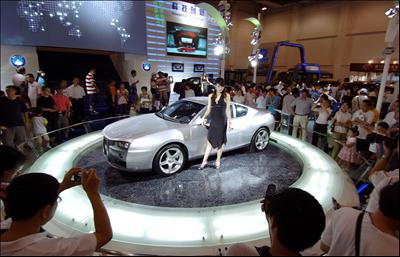 People crowd
around the Jeely booth at the West Coast Straits Auto Show 2007 in Xinmen, which
runs from June 1st to 4th. A total of 15 Chinese-made autos enter the show to
compete with the world brands. People crowd
around the Jeely booth at the West Coast Straits Auto Show 2007 in Xinmen, which
runs from June 1st to 4th. A total of 15 Chinese-made autos enter the show to
compete with the world brands.
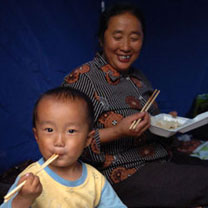 A boy and his granny
have their meal in a makeshift tent in quake-torn Ning'er, Southwest China's
Yunan Province June 4, 2006. The first batch of disaster relief goods have been
transported to Ning'er, where a magnitude 6.4 earth quake took place on Sunday,
killing three, injuring at least 300. A boy and his granny
have their meal in a makeshift tent in quake-torn Ning'er, Southwest China's
Yunan Province June 4, 2006. The first batch of disaster relief goods have been
transported to Ning'er, where a magnitude 6.4 earth quake took place on Sunday,
killing three, injuring at least 300.
June 5, 2007
 Hong Kong:
More extensive cooperation in the service sector should be established between
Shanghai and Hong Kong, government officials, academics and business leaders
from the two cities said on Friday in Shanghai. Further and deeper cooperation
is good for both Hong Kong, whose flourishing service sector is hampered by
space constraints, and Shanghai, which is keen to focus its development on the
sector, Wang Ronghua, vice-chairman of Shanghai People's Political Consultative
Conference, said. He was speaking at a forum on the opportunities for
cooperation between the two cities. Wang said the two cities complemented each
other in many ways and have great potential for working together. "Hong Kong has
a long history of developing its service industry and has accumulated abundant
experience and talent in the field," Wang said. "Shanghai is building itself
into an international hub for finance and shipping, and is also working on the
economic integration of the Yangtze River Delta. "Shanghai has a lot to learn
from Hong Kong and at the same time can provide plenty of opportunities and
serve as a platform for Hong Kong to expand its business in other mainland
cities," he said. Leung Chun-ying, a member of the Executive Council of Hong
Kong Special Administrative Region, said there was also competition between the
two cities and that has to be faced. "We have to find an effective way to avoid
unhealthy competition and increase cooperation," he said. Cai Laixing, chairman
of Shanghai Industrial Investment (Holdings) Co Ltd, said that cooperation was
the only way to help both cities bloom. Wang said: "We should encourage more
service businesses from Hong Kong to set up in Shanghai as well as more
state-owned or private enterprises in Shanghai to list in Hong Kong and expand
their business abroad in that way." Wang said that cooperation on exhibitions,
international merchandising and finance would be particularly encouraged. Hong Kong:
More extensive cooperation in the service sector should be established between
Shanghai and Hong Kong, government officials, academics and business leaders
from the two cities said on Friday in Shanghai. Further and deeper cooperation
is good for both Hong Kong, whose flourishing service sector is hampered by
space constraints, and Shanghai, which is keen to focus its development on the
sector, Wang Ronghua, vice-chairman of Shanghai People's Political Consultative
Conference, said. He was speaking at a forum on the opportunities for
cooperation between the two cities. Wang said the two cities complemented each
other in many ways and have great potential for working together. "Hong Kong has
a long history of developing its service industry and has accumulated abundant
experience and talent in the field," Wang said. "Shanghai is building itself
into an international hub for finance and shipping, and is also working on the
economic integration of the Yangtze River Delta. "Shanghai has a lot to learn
from Hong Kong and at the same time can provide plenty of opportunities and
serve as a platform for Hong Kong to expand its business in other mainland
cities," he said. Leung Chun-ying, a member of the Executive Council of Hong
Kong Special Administrative Region, said there was also competition between the
two cities and that has to be faced. "We have to find an effective way to avoid
unhealthy competition and increase cooperation," he said. Cai Laixing, chairman
of Shanghai Industrial Investment (Holdings) Co Ltd, said that cooperation was
the only way to help both cities bloom. Wang said: "We should encourage more
service businesses from Hong Kong to set up in Shanghai as well as more
state-owned or private enterprises in Shanghai to list in Hong Kong and expand
their business abroad in that way." Wang said that cooperation on exhibitions,
international merchandising and finance would be particularly encouraged.
Invest Hong Kong, an investment
promotion agency, kicked off a three-year major investment promotion campaign
here Friday, targeting private-owned enterprises in high-growth regions across
China's mainland. The campaign, named "On Your Marks, Get-set, Go!", will focus
on seven key economically developed provinces on China's mainland, including
Zhejiang, Jiangsu, Shandong, Liaoning, Sichuan, Guangdong and Fujian, and
provide private enterprises with the information and tools to expand
internationally using Hong Kong as their gateway, according to InvestHK.
Director-General of Investment Promotion Mike Rowse said the demand-driven
campaign would guide companies through the business-expansion process. "We're
raising the level of awareness of Hong Kong's role in helping local companies in
China's mainland go global, we're providing practical advice on developing an
expansion strategy -- and finally we're bringing these companies to Hong Kong to
experience the city first hand," he said. According to InvestHK's estimates,
more than 2,000 companies from China's mainland are operating business in Hong
Kong, with about 268 of these using the city as their regional office or
headquarters. Recent investors who have used Invest Hong Kong's free services
include Tong Ren Tang, Kingdee, Nuctech and Duan & Duan.
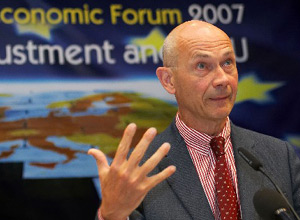 Direct-general of
the World Trade Organization (WTO) Pascal Lamy urged world economic powers on
Friday to take concrete action on the deadlocked Doha-round talks. As leaders
from the Group of Eight (G8) leading industrialized nations are ready to kick
off their annual gathering in Germany next week, Lamy said his message to the
summit was simply three words "just do it." Direct-general of
the World Trade Organization (WTO) Pascal Lamy urged world economic powers on
Friday to take concrete action on the deadlocked Doha-round talks. As leaders
from the Group of Eight (G8) leading industrialized nations are ready to kick
off their annual gathering in Germany next week, Lamy said his message to the
summit was simply three words "just do it."
 Hong Kong singer
and actress Sammi Cheung has asked her lawyer to send a letter to YouTube, a
popular video sharing website, requiring them to withdraw video clips of her
latest solo concert. Tom.com quoted a report from the Information Times on May
22. The pop queen last week kicked off her eight-day solo concert tour after two
years away from the stage. Some fans shot parts of the concert and uploaded them
on YouTube to share with other people. Sammi's agent says that they hope to
remind fans to protect copyright of the concerts. Hong Kong singer
and actress Sammi Cheung has asked her lawyer to send a letter to YouTube, a
popular video sharing website, requiring them to withdraw video clips of her
latest solo concert. Tom.com quoted a report from the Information Times on May
22. The pop queen last week kicked off her eight-day solo concert tour after two
years away from the stage. Some fans shot parts of the concert and uploaded them
on YouTube to share with other people. Sammi's agent says that they hope to
remind fans to protect copyright of the concerts.
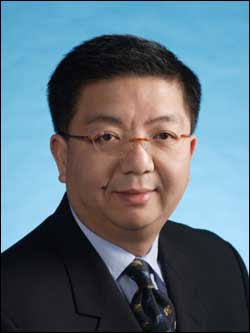 The Tourism Board has appointed a top man from the tobacco
industry as its executive director. "Experience in the travel industry is
important, but what is more important is their international experience, how
they can promote Hong Kong overseas," Tourism Board chairman James Tien Pei-chun
said. The new executive director is Anthony Lau Chun-hon, formerly general
manager of Philip Morris Singapore. Lau spent 20 years with the tobacco giant
after joining Philip Morris Asia in 1986. He has held senior positions at the
company, including director of sales and marketing and general manager for
different markets. He graduated from the University of Toronto in business
administration in 1985. Philip Morris Asia is one of the world's largest tobacco
producers with the world's best-selling cigarette brands such as Marlboro, 555,
Dunhill, Mild Seven and Salem. The Tourism Board also appointed Daisy Lam Lui
Wing-han as deputy executive director. Lam is currently Octopus Cards Limited's
operation director. Before joining Octopus in 2003, Lam worked for various
international corporations such as Cathay Pacific and Hongkong and Shanghai
Banking Corporation. Tien said the executive director and his deputy would take
up their posts on August 1 and September 1 respectively. He said they had a deep
knowledge of local and international markets and management skills, putting them
in a strong position to market and promote Hong Kong worldwide. The board, which
is a government- subsidized body, spends more than HK$100 million each year and
has been criticized as an "extravagant spender." Tien said Lau will also review
the board's expenditure. Financial Secretary Henry Tang Ying-yen hopes the new
appointees will do a good job at the board. "The most important thing is whether
the money is spent appropriately, as this is public money," Tang said. "Every
government department has this responsibility." However, Sin Chung-kai of the
Democratic Party said the two appointees did not have sufficient experience in
public service and the travel industry. "In the future, there should be a high
accountability in spending public money," Sin said. Former executive director
Clara Chong Ming-wah, whose six-year term expired last month, came under
criticism after it was revealed she was drawing an annual pay package of HK$4.56
million, which included bonuses and subsidies. The pay package of the new
executive director will be cut by 10 percent. Former deputy executive director
Grace Lee Chan Ka-yan resigned in October after 20 years with the board and its
predecessor, the Hong Kong Tourism Association.
The Tourism Board has appointed a top man from the tobacco
industry as its executive director. "Experience in the travel industry is
important, but what is more important is their international experience, how
they can promote Hong Kong overseas," Tourism Board chairman James Tien Pei-chun
said. The new executive director is Anthony Lau Chun-hon, formerly general
manager of Philip Morris Singapore. Lau spent 20 years with the tobacco giant
after joining Philip Morris Asia in 1986. He has held senior positions at the
company, including director of sales and marketing and general manager for
different markets. He graduated from the University of Toronto in business
administration in 1985. Philip Morris Asia is one of the world's largest tobacco
producers with the world's best-selling cigarette brands such as Marlboro, 555,
Dunhill, Mild Seven and Salem. The Tourism Board also appointed Daisy Lam Lui
Wing-han as deputy executive director. Lam is currently Octopus Cards Limited's
operation director. Before joining Octopus in 2003, Lam worked for various
international corporations such as Cathay Pacific and Hongkong and Shanghai
Banking Corporation. Tien said the executive director and his deputy would take
up their posts on August 1 and September 1 respectively. He said they had a deep
knowledge of local and international markets and management skills, putting them
in a strong position to market and promote Hong Kong worldwide. The board, which
is a government- subsidized body, spends more than HK$100 million each year and
has been criticized as an "extravagant spender." Tien said Lau will also review
the board's expenditure. Financial Secretary Henry Tang Ying-yen hopes the new
appointees will do a good job at the board. "The most important thing is whether
the money is spent appropriately, as this is public money," Tang said. "Every
government department has this responsibility." However, Sin Chung-kai of the
Democratic Party said the two appointees did not have sufficient experience in
public service and the travel industry. "In the future, there should be a high
accountability in spending public money," Sin said. Former executive director
Clara Chong Ming-wah, whose six-year term expired last month, came under
criticism after it was revealed she was drawing an annual pay package of HK$4.56
million, which included bonuses and subsidies. The pay package of the new
executive director will be cut by 10 percent. Former deputy executive director
Grace Lee Chan Ka-yan resigned in October after 20 years with the board and its
predecessor, the Hong Kong Tourism Association.
 A major fire at a mainland
plant operated by mobile phone battery manufacturer SCUD Group (1399) may have
caused as much as 250 million yuan (HK$255.3 million) in losses as the entire
inventory had been destroyed, the company said Friday. But the company, which
listed mid- December, said that much of the production lines were unaffected.
The fire was reported at its Fuzhou plant Thursday and production has been
disrupted. "Most, if not all, of the group's inventory has been destroyed while
most of the production lines were unaffected," chairman Fang Jin said in a
statement to the Hong Kong bourse after the market closed. SCUD had a net asset
value of HK$835.7 million as at the end of last year. It said losses could range
from 200 million to 250 million yuan before taking into account any compensation
from insurers. However, total losses - including inventory and some lost sales
pending resumption of normal production and possible claims from customers for
late deliveries - would not be completely covered by the insurer. The cover is
primarily for loss of inventory and products from fire, and not subsequent
business disruption or other losses, according to the statement. "As part of the
estimated loss, the portion attributable to the cost of inventory based on the
group's management accounts as at April 30, 2007 was about 190 million yuan,"
the company said. Fang said in March that a new plant would be built in Fuzhou
in the second quarter to centralize production. A major fire at a mainland
plant operated by mobile phone battery manufacturer SCUD Group (1399) may have
caused as much as 250 million yuan (HK$255.3 million) in losses as the entire
inventory had been destroyed, the company said Friday. But the company, which
listed mid- December, said that much of the production lines were unaffected.
The fire was reported at its Fuzhou plant Thursday and production has been
disrupted. "Most, if not all, of the group's inventory has been destroyed while
most of the production lines were unaffected," chairman Fang Jin said in a
statement to the Hong Kong bourse after the market closed. SCUD had a net asset
value of HK$835.7 million as at the end of last year. It said losses could range
from 200 million to 250 million yuan before taking into account any compensation
from insurers. However, total losses - including inventory and some lost sales
pending resumption of normal production and possible claims from customers for
late deliveries - would not be completely covered by the insurer. The cover is
primarily for loss of inventory and products from fire, and not subsequent
business disruption or other losses, according to the statement. "As part of the
estimated loss, the portion attributable to the cost of inventory based on the
group's management accounts as at April 30, 2007 was about 190 million yuan,"
the company said. Fang said in March that a new plant would be built in Fuzhou
in the second quarter to centralize production.
Hang Seng China, the mainland
incorporated subsidiary of Hang Seng Bank (0011), is set to widen its retail
footprint by increasing the number of outlets and taking more employees on
board.
The High Court has turned down an
appeal by PCCW (0008) for a judicial review of a ruling by the Office of the
Telecommunications Authority directing the dominant telco to allow an opening up
of its network to an Internet services provider.
Restaurant chain Tao Heung Holdings
will start its initial public offering pre- marketing next week after it won
approval from the Hong Kong stock exchange's listing committee Thursday.
Financial Secretary Henry Tang Ying-yen is the frontrunner
for the position of chief secretary in the new administration, after Rafael Hui
Si-yan decided not to stay in the job beyond the end of this month. According to
sources familiar with the situation, Mr Hui had made up his mind after months of
discussion with central government officials over whether he could stay in the
job for just two years, rather than serve a full five-year term. Media reports
have also cited the lineup of the next administration as another factor
influencing his decision. The sources said that in the light of Mr Hui's
decision, Chief Executive Donald Tsang Yam-kuen had put forward a nominee for
the post to Beijing on Thursday. The name of the nominee could not be confirmed
last night, but a source close to Beijing said he understood Mr Tang had been
named to the post, the second-highest ranking in the government. One source said
John Tsang Chun-wah, currently director of the Chief Executive's Office, had
been put forward for the post of financial secretary. Donald Tsang is known to
be keen to groom John Tsang for high office. Neither Mr Tang nor John Tsang
could be reached for comment last night. This source said the final list of
nominees for ministerial posts in the next administration had been tabled to
Beijing on Thursday. A Beijing loyalist said it was his understanding, from
talking to central government officials, that the list would be finalised when
the chief executive is in Beijing next week for a Basic Law forum. Donald Tsang
will be accompanied by Mr Hui and Secretary for Justice Wong Yan-lung on the
visit to the capital for the forum on Wednesday to mark the 10th anniversary of
the Basic Law's implementation. Since Mr Hui, who is 59, rejoined the government
in 2005, there has often been speculation about whether or not he would serve
beyond June 30. The sources said the past month had been crucial to Mr Hui's
decision about his future, since his discussions with Beijing about "the
condition" for him staying on had entered their final stage. Two different
sources attributed Mr Hui's decision to his reluctance to serve a full five-year
term.
 China: The
Chinese government will continue to pay great attention to exported food safety,
said an official with the country's quality control watchdog on Thursday. "Over
the past two years, 99 percent of food exported to the United States was up to
safety standards, which is a very high percentage," said Li Yuanping, senior
official in charge of imported and exported food safety in the General
Administration of Quality Supervision, Inspection and Quarantine (GAQSIQ). The
official said China has set up a complete monitoring system to ensure safety of
exported food. All plantations and cultivation bases for export purposes are
kept record for inspection and quarantine, he said. Companies exporting food
have to meet safety requirements before producing, processing and exporting food
and will receive regular inspection during production, Li said. Food that is up
to the standards will also be labeled for track in case of possible problems. On
May 8, the GAQSIQ announced that two Chinese companies exported
melamine-contaminated wheat gluten and rice protein blamed for the deaths of
dogs and cats in the United States. The watchdog said the two companies managed
to evade quality check-ups by labeling them as exports that are not subject to
quality inspection. It said it had ordered local branches to strengthen quality
inspection on all vegetable proteins and pledged to include all vegetable
proteins on the exports list subject for quality check-ups. The local public
security authorities had launched an investigation into the cases and had
detained related company officials, according to the GAQSIQ. The administration
said it had found no further melamine-contaminated products after checking 399
samples from 173exporters nationwide. The watchdog said it had notified the U.S.
Food and Drug Administration of the investigation results and proposed to set up
a cooperation mechanism on food safety with the United States. The Chinese
government will continue do its best to guarantee food safety for consumers
worldwide, Li said.
China: The
Chinese government will continue to pay great attention to exported food safety,
said an official with the country's quality control watchdog on Thursday. "Over
the past two years, 99 percent of food exported to the United States was up to
safety standards, which is a very high percentage," said Li Yuanping, senior
official in charge of imported and exported food safety in the General
Administration of Quality Supervision, Inspection and Quarantine (GAQSIQ). The
official said China has set up a complete monitoring system to ensure safety of
exported food. All plantations and cultivation bases for export purposes are
kept record for inspection and quarantine, he said. Companies exporting food
have to meet safety requirements before producing, processing and exporting food
and will receive regular inspection during production, Li said. Food that is up
to the standards will also be labeled for track in case of possible problems. On
May 8, the GAQSIQ announced that two Chinese companies exported
melamine-contaminated wheat gluten and rice protein blamed for the deaths of
dogs and cats in the United States. The watchdog said the two companies managed
to evade quality check-ups by labeling them as exports that are not subject to
quality inspection. It said it had ordered local branches to strengthen quality
inspection on all vegetable proteins and pledged to include all vegetable
proteins on the exports list subject for quality check-ups. The local public
security authorities had launched an investigation into the cases and had
detained related company officials, according to the GAQSIQ. The administration
said it had found no further melamine-contaminated products after checking 399
samples from 173exporters nationwide. The watchdog said it had notified the U.S.
Food and Drug Administration of the investigation results and proposed to set up
a cooperation mechanism on food safety with the United States. The Chinese
government will continue do its best to guarantee food safety for consumers
worldwide, Li said.
The
Chinese government has announced its first national action plan to respond to
climate change during a state council conference chaired by the premier Wen
Jiabao. The action plan describes climate change effects and outlines policies
and measures China will adopt, said a statement from the State Council without
describing specific policies and measures. Also in the plan, China clarified its
basic stance on global warming and called for international cooperation. China
would adhere to the principle of "common but differentiated responsibilities" in
the UN Framework Convention on Climate Change, the statement said. Climate
change should be dealt with under the framework of sustainable development, it
said. Global warming was affecting China's ecological system and natural
resources as well as life of the public. To cope with it, China had been taking
a series of measures, including changing the economic growth pattern by
adjusting economic structure and energy mix and controlling population growth.
The meeting emphasized joint efforts by international community to address this
issue. The meeting also urged governments and sectors at all levels to implement
the action plan and called for a public awareness campaign on environment
protection.
 Modern love story, "The Longest Night in Shanghai",
starring Chinese mainland actress Vicky Zhao and Japanese heartthrob Masahiro
Motoki, is scheduled for a public release on June 26. The film is about the
encounter of a Japanese hair designer with a Chinese woman taxi driver in the
modern metropolis of Shanghai. Longing for a break from the daily routine, they
spend a special night together in the modern city. Actress Vicky Zhao described
her own role as that of "a sweet heart concealed inside a tough appearance". For
her performance in the film, she was awarded the most popular actress at the
14th Beijing Student Film Festival in April. The film is expected to compete at
the box office this summer with other blockbusters like "Pirates of the
Caribbean III" and "Transformers".
Modern love story, "The Longest Night in Shanghai",
starring Chinese mainland actress Vicky Zhao and Japanese heartthrob Masahiro
Motoki, is scheduled for a public release on June 26. The film is about the
encounter of a Japanese hair designer with a Chinese woman taxi driver in the
modern metropolis of Shanghai. Longing for a break from the daily routine, they
spend a special night together in the modern city. Actress Vicky Zhao described
her own role as that of "a sweet heart concealed inside a tough appearance". For
her performance in the film, she was awarded the most popular actress at the
14th Beijing Student Film Festival in April. The film is expected to compete at
the box office this summer with other blockbusters like "Pirates of the
Caribbean III" and "Transformers".
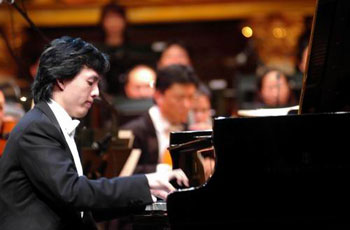 Young Chinese pianist
Li Yundi will work with Japanese conductor Seiji Ozawa on a one-hour documentary
detailing their performances together. Li Yundi revealed the plan in a phone
interview with the Beijing News.He said it was encouraging that the 72-year-old
conductor was willing to make a commercial film with him. He and Seiji Ozawa
just wrapped up their collaboration with the Berlin Philharmonic Orchestra.
Their performances have won rave reviews from local critics. Young Chinese pianist
Li Yundi will work with Japanese conductor Seiji Ozawa on a one-hour documentary
detailing their performances together. Li Yundi revealed the plan in a phone
interview with the Beijing News.He said it was encouraging that the 72-year-old
conductor was willing to make a commercial film with him. He and Seiji Ozawa
just wrapped up their collaboration with the Berlin Philharmonic Orchestra.
Their performances have won rave reviews from local critics.
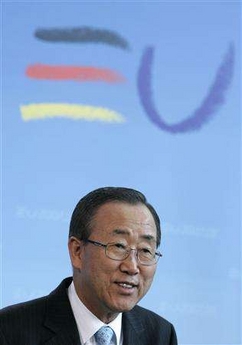 UN
Secretary-General Ban Ki- moon on Friday highly praised China's role in
improving situation in Darfur, and rebuffed threats of linking Beijing's
Olympics to the Darfur crisis. Ban told reporters at the UN Headquarters in New
York that "this is separate issue" regarding to attempts of politicizing Beijing
Olympic Games by some Western politicians. The UN chief also expressed his
appreciation towards the Chinese government for its continuous efforts to
improve the situation in the African country. "The Chinese government has been
always exerting their utmost efforts," he said. "As I understand, I appreciate
it." Meanwhile, Ban noted that he has been discussing this matter with the
Chinese government. China recently appointed a special envoy to work on Darfur
situation, and President Hu Jintao paid a visit last February, he said, adding
that China has also sent high-level officials to discuss this matter with the
Sudanese government. He finally clearly confirmed China's positive and helpful
role in Darfur, saying he appreciates such a role played by the Chinese
government. Ban expressed his optimism towards the future of Darfur issue,
stressing he has made some progress even though slow. "There was an agreement to
the second phase, heavy support package," he said, adding that "now we are
almost at the final stage of presenting our common and joint proposal to the
Sudanese government." The secretary-general said he had a telephone talk with
Sudanese President Bashir, and the president was committed to see early
resolution of this issue. He pointed out that the international community's
effort should be made in a reinforcing manner, and the whole international
community should cooperate fully in addressing these issues so as to find early
resolution on this matter. UN
Secretary-General Ban Ki- moon on Friday highly praised China's role in
improving situation in Darfur, and rebuffed threats of linking Beijing's
Olympics to the Darfur crisis. Ban told reporters at the UN Headquarters in New
York that "this is separate issue" regarding to attempts of politicizing Beijing
Olympic Games by some Western politicians. The UN chief also expressed his
appreciation towards the Chinese government for its continuous efforts to
improve the situation in the African country. "The Chinese government has been
always exerting their utmost efforts," he said. "As I understand, I appreciate
it." Meanwhile, Ban noted that he has been discussing this matter with the
Chinese government. China recently appointed a special envoy to work on Darfur
situation, and President Hu Jintao paid a visit last February, he said, adding
that China has also sent high-level officials to discuss this matter with the
Sudanese government. He finally clearly confirmed China's positive and helpful
role in Darfur, saying he appreciates such a role played by the Chinese
government. Ban expressed his optimism towards the future of Darfur issue,
stressing he has made some progress even though slow. "There was an agreement to
the second phase, heavy support package," he said, adding that "now we are
almost at the final stage of presenting our common and joint proposal to the
Sudanese government." The secretary-general said he had a telephone talk with
Sudanese President Bashir, and the president was committed to see early
resolution of this issue. He pointed out that the international community's
effort should be made in a reinforcing manner, and the whole international
community should cooperate fully in addressing these issues so as to find early
resolution on this matter.
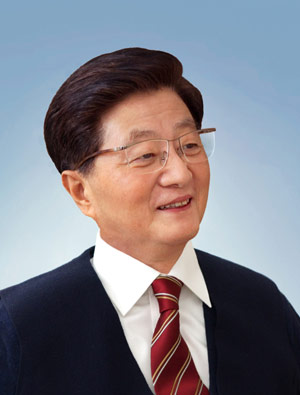 Huang Ju, member of
the Standing Committee of the Political Bureau of the Communist Party of China
(CPC) Central Committee and Vice-Premier of the State Council, died of illness
at 02:03 a.m. June 2 in Beijing at the age of 69. Huang Ju, member of
the Standing Committee of the Political Bureau of the Communist Party of China
(CPC) Central Committee and Vice-Premier of the State Council, died of illness
at 02:03 a.m. June 2 in Beijing at the age of 69.
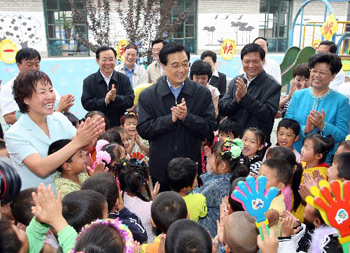 Chinese President Hu Jintao (C) talks with
children at the Tianyuan Kindergarten of Panggezhuang Town in the Daxing
District of Beijing, capital of China, June 1, 2007. Hu Jintao on Friday spent
the International Children's Day with the children at the Tianyuan Kindergarten
and No. 2 Central Primary School of Panggezhuang Town. Chinese President Hu Jintao (C) talks with
children at the Tianyuan Kindergarten of Panggezhuang Town in the Daxing
District of Beijing, capital of China, June 1, 2007. Hu Jintao on Friday spent
the International Children's Day with the children at the Tianyuan Kindergarten
and No. 2 Central Primary School of Panggezhuang Town.
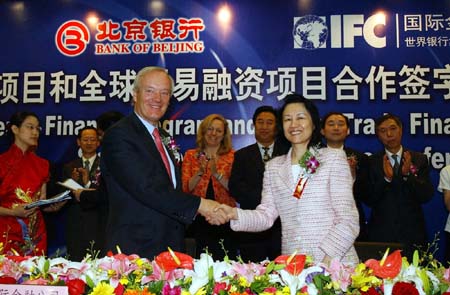 Lars Thunell (left), IFC's executive
vice president, shakes hand with Yan Xiaoyan, president of the Bank of Beijing,
at a signing ceremony in Beijing. The International Finance Corporation (IFC)
and Bank of Beijing on Friday signed cooperation agreements on financing energy
efficiency and global trade. These are the first cooperation pacts between the
two sides since the IFC made an equity investment in Bank of Beijing in May
2005, said Yan Bingzhu, chairman of the Beijing bank.
Lars Thunell (left), IFC's executive
vice president, shakes hand with Yan Xiaoyan, president of the Bank of Beijing,
at a signing ceremony in Beijing. The International Finance Corporation (IFC)
and Bank of Beijing on Friday signed cooperation agreements on financing energy
efficiency and global trade. These are the first cooperation pacts between the
two sides since the IFC made an equity investment in Bank of Beijing in May
2005, said Yan Bingzhu, chairman of the Beijing bank.
If you're a musician or an aspiring
one, you won't want to miss the chance to compose an Olympic theme song. A group
of four primary school children from Tianjin, 150-kilometer southeast to
Beijing, were the latest to present their composition to the Beijing Olympic
office. The students called themselves "20088", as all four kids are going to be
eight years-old next year. Formed a year ago, the four children were chosen by
their teacher Li Hongyu from a pool of 400 candidates from a local club in
Tianjin. The parents of the members of the youngest electronic band in China
said the trainer assured them their children would have enough time to study as
well as work on their song. If anyone ended up with poor marks, the students
would have to withdraw from entering. The Organizing Committee for the Beijing
Olympic Games made the call for entries, which is ongoing until March 2008, will
decide on the themes songs for both the Beijing Games and Paralympics, a song
for the volunteers, the torch relay, and the music for awards ceremonies.
American Giorgio Moroder, the theme song composer for the 1984, 1988 Olympic
Games and the 1990 World Cup submitted his work earlier in May after working
with Chinese pianist Kong Xiangdong. "Our composition will make it easy for
people to hum the song after listening to it three times so that everyone can
participate," Kong said. Former Chinese foreign minister Li Zhaoxing also had
tried his hand after a music school teacher composed a tune for his poem on the
Beijing Olympics. In his poem, "One World One Dream", Li writes, "Let war fires
end here/ Let feud reconciled here/ Let peace and friendship extending from
here/ Let the sun shines with seven-color light".
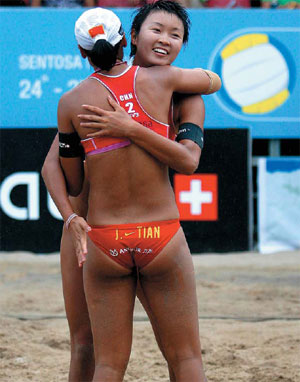 Within a year,
beach volleyball player Tian Jia has lifted herself to the top of the world
rankings with new partner Wang Jie. Now they have a bigger ambition - gold
medaling at the 2008 Beijing Games. Tian, 26, and Wang, 24, first teamed up last
May. A series of whirlwind victories in the 2006 World Tour then saw them
catapult to World No 1. Within a year,
beach volleyball player Tian Jia has lifted herself to the top of the world
rankings with new partner Wang Jie. Now they have a bigger ambition - gold
medaling at the 2008 Beijing Games. Tian, 26, and Wang, 24, first teamed up last
May. A series of whirlwind victories in the 2006 World Tour then saw them
catapult to World No 1.
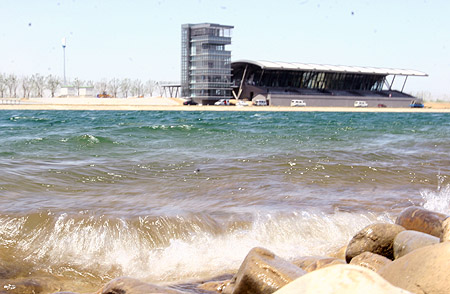 The Shunyi Olympic Rowing-Canoeing Park is ready for the 2007 World Junior
Rowing Championships, the first of the Good Luck Beijing events beginning in
August. The brand-new venue has been completed recently and some 90 percent of
its surroundings have been afforested. The 20km Baima Road linking the Park with
downtown Beijing has also been completed, making the site a 30-minute drive from
the city.
The Shunyi Olympic Rowing-Canoeing Park is ready for the 2007 World Junior
Rowing Championships, the first of the Good Luck Beijing events beginning in
August. The brand-new venue has been completed recently and some 90 percent of
its surroundings have been afforested. The 20km Baima Road linking the Park with
downtown Beijing has also been completed, making the site a 30-minute drive from
the city.
China has launched a
telecommunications satellite that aims to bring television signals to every home
in the nation, on the 100th flight of the homegrown Long March rocket series.
The satellite was launched from the Xichang Satellite Launch Center in
southwestern Sichuan province in the early hours of Friday. The Sino-Sat III
satellite will provide telecommunications, television broadcasting and digital
transmission services to commercial and state- enterprise clients. The satellite
had been originally slated to work with the Sino-Sat II telecommunications
satellite that was launched in October last year but was rendered inoperable
after its solar panels failed to deploy. A replacement for Sino-Sat II will take
another three years to build, operator Sino Satellite Communications said, at
which time China hopes to be able to send television signals to every home in
the nation, including those in remote mountainous regions. China has 12.6
million digital television subscribers and 400 million television sets, making
it potentially a large market for satellite television. It was the 100th launch
of the nation's Long March rocket series, the workhorse of China's space
program, which first flew into space in 1970. The Long March rocket was built by
China Aerospace Science and Technology, a key player in China's intercontinental
missile program. China's satellite capabilities aroused international concern
earlier this year, when it successfully destroyed one of its own aging weather
satellites with a missile, releasing debris into orbit. Last month China
launched a communications satellite for Nigeria, the first time a foreign buyer
has purchased both a mainland-made satellite and its launching service. Foreign
firms had previously used mainland rockets to launch satellites, which was
cheaper than launching them from the United States or Europe. In 2003, China
became only the third country - after the former Soviet Union and the United
States - to launch a man into space aboard its own rocket. It now plans a space
walk by next year and a lunar probe.
Work on a US
Senate bill aimed at pressuring China to raise the value of its currency should
be completed in the next few weeks, a spokeswoman for Senate Finance Committee
chairman Max Baucus said.
June 4, 2007
 Hong Kong:
Global demand for gold reached 17.4 billion U.S. dollars
in the first quarter of 2007, up 22 percent from the same period last year in
terms of value, or four percent in terms of quantity, a report released by the
World Gold Council (WGC) said here Thursday. Hong Kong:
Global demand for gold reached 17.4 billion U.S. dollars
in the first quarter of 2007, up 22 percent from the same period last year in
terms of value, or four percent in terms of quantity, a report released by the
World Gold Council (WGC) said here Thursday.
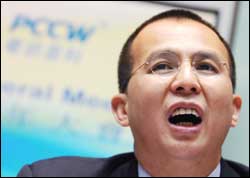 In a move believed
to be the first of its kind in Hong Kong, the remuneration committee of PCCW
(0008) has introduced new rules that will see senior executives' bonuses slashed
by at least 50 percent if shares in the company do not outperform the Hang Seng
Index. "Unless the share price outperforms the Hang Seng Index, executive
directors cannot receive more than half of their targeted bonus, regardless of
the financial performance of the company," PCCW chairman Richard Li Tzar-kai
told a shareholders' meeting Thursday. The new measures will affect executive
directors of the telecoms firm, including Li, group managing director Alex Arena
and Peter Allen. "PCCW has been one of the worst stocks among the index
constituent stocks since the year 2000," said Fulbright Securities general
manager Francis Lun Sheung-nim. Over the past 12 months, PCCW shares have inched
up 0.9 percent, while the benchmark HSI surged 30 percent. In March, deputy
chairman and group managing director Jack So Chak- kwong suddenly tendered his
resignation a day after the remuneration committee slashed his annual HK$8
million bonus by 70 percent, citing poor performance. "We are a very cold and
calculating and hard-numbered company," Arena told reporters after the new rule
was announced Thursday. Arena said PCCW would not name another deputy chairman
to fill the slot left by So's departure. Non-executive director Tian Suning will
continue as a deputy chairman, but the company will not appoint a second deputy
as had been past custom. Li declined to say whether he plans to put PCCW's
telecom assets on the block again, or whether he will attempt to sell his 28.06
percent stake in the firm. In a move believed
to be the first of its kind in Hong Kong, the remuneration committee of PCCW
(0008) has introduced new rules that will see senior executives' bonuses slashed
by at least 50 percent if shares in the company do not outperform the Hang Seng
Index. "Unless the share price outperforms the Hang Seng Index, executive
directors cannot receive more than half of their targeted bonus, regardless of
the financial performance of the company," PCCW chairman Richard Li Tzar-kai
told a shareholders' meeting Thursday. The new measures will affect executive
directors of the telecoms firm, including Li, group managing director Alex Arena
and Peter Allen. "PCCW has been one of the worst stocks among the index
constituent stocks since the year 2000," said Fulbright Securities general
manager Francis Lun Sheung-nim. Over the past 12 months, PCCW shares have inched
up 0.9 percent, while the benchmark HSI surged 30 percent. In March, deputy
chairman and group managing director Jack So Chak- kwong suddenly tendered his
resignation a day after the remuneration committee slashed his annual HK$8
million bonus by 70 percent, citing poor performance. "We are a very cold and
calculating and hard-numbered company," Arena told reporters after the new rule
was announced Thursday. Arena said PCCW would not name another deputy chairman
to fill the slot left by So's departure. Non-executive director Tian Suning will
continue as a deputy chairman, but the company will not appoint a second deputy
as had been past custom. Li declined to say whether he plans to put PCCW's
telecom assets on the block again, or whether he will attempt to sell his 28.06
percent stake in the firm.
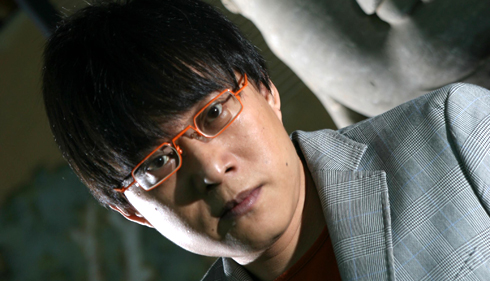 As a successful lyricist
with more than 3,000 songs to his name, it would be easy for Lin Xi to get stuck
in a groove. But the Canto-pop veteran is alert to the risk and takes pains to
stretch himself with offbeat projects. His latest challenge is a collaboration
with experimental theatre group Zuni Icosahedron on Hua-yen Sutra, a multi-media
production inspired by a Buddhist classic. The sutra is said to be the first
teachings of the Buddha after he gained enlightenment. However, the show takes a
more modern approach, combining installation, moving images, song and dance.
Even so, Lin says coming up with suitable lyrics for the electronic-influenced
theme song by composer Yu Yat-yiu tested his skills. "Using Cantonese to reflect
the wisdom of classical Buddhist scripture is a challenge," he says. "Buddhism
teaches us not to cling to things because everything is transient. You're the
one who decides whether you're happy or sad. You can live happily and peacefully
if you want to, regardless of the adverse environment." Keeping that in mind,
Lin has tried to convey ideas of spiritual peace and create a harmonious world
in the theme song. The 45-year-old songwriter has had some practice developing
such lyrics. Lin turned to Buddhism about 10 years ago after suffering a painful
break-up. "I wanted to write lyrics to comfort the broken-hearted and found that
most healing philosophies matched Buddhist beliefs. So I started reading about
Buddhism to find peace of mind," he says. However, it's only in recent years
that he's introduced Buddhist wisdom into his lyrics. Moon Water, Illusory
Flower, which was released by Miriam Yeung Chin-wah last year, is about letting
go of failed relationships, for example. There's no sermonising, he says. "I
don't use Buddhist jargon to avoid intimidating listeners. But I want to
encourage people to take a different perspective, especially when things aren't
going well." Although the teachings of relinquishing desire have enriched his
spiritual life, Lin concedes he hasn't been able to renounce his favourite
material pursuit - shopping. "I still can't do it. I like buying pretty things,"
he says, pointing to an oil painting by contemporary painter Yang Din. Like many
Hongkongers, Lin is also active in the stockmarket. "I'm in love with it," he
says with a grin, revealing that he derives most of his income from his
investments. "In showbiz, careers don't last long, especially being a lyricist.
I have to secure my future. As a successful lyricist
with more than 3,000 songs to his name, it would be easy for Lin Xi to get stuck
in a groove. But the Canto-pop veteran is alert to the risk and takes pains to
stretch himself with offbeat projects. His latest challenge is a collaboration
with experimental theatre group Zuni Icosahedron on Hua-yen Sutra, a multi-media
production inspired by a Buddhist classic. The sutra is said to be the first
teachings of the Buddha after he gained enlightenment. However, the show takes a
more modern approach, combining installation, moving images, song and dance.
Even so, Lin says coming up with suitable lyrics for the electronic-influenced
theme song by composer Yu Yat-yiu tested his skills. "Using Cantonese to reflect
the wisdom of classical Buddhist scripture is a challenge," he says. "Buddhism
teaches us not to cling to things because everything is transient. You're the
one who decides whether you're happy or sad. You can live happily and peacefully
if you want to, regardless of the adverse environment." Keeping that in mind,
Lin has tried to convey ideas of spiritual peace and create a harmonious world
in the theme song. The 45-year-old songwriter has had some practice developing
such lyrics. Lin turned to Buddhism about 10 years ago after suffering a painful
break-up. "I wanted to write lyrics to comfort the broken-hearted and found that
most healing philosophies matched Buddhist beliefs. So I started reading about
Buddhism to find peace of mind," he says. However, it's only in recent years
that he's introduced Buddhist wisdom into his lyrics. Moon Water, Illusory
Flower, which was released by Miriam Yeung Chin-wah last year, is about letting
go of failed relationships, for example. There's no sermonising, he says. "I
don't use Buddhist jargon to avoid intimidating listeners. But I want to
encourage people to take a different perspective, especially when things aren't
going well." Although the teachings of relinquishing desire have enriched his
spiritual life, Lin concedes he hasn't been able to renounce his favourite
material pursuit - shopping. "I still can't do it. I like buying pretty things,"
he says, pointing to an oil painting by contemporary painter Yang Din. Like many
Hongkongers, Lin is also active in the stockmarket. "I'm in love with it," he
says with a grin, revealing that he derives most of his income from his
investments. "In showbiz, careers don't last long, especially being a lyricist.
I have to secure my future.
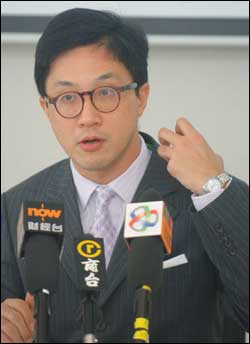 Strong corporate earnings will insulate blue chips from
any fallout from an A-share market tumble, UBS analyst Andrew Look said
Thursday, as he repeated his prediction that the benchmark index will hit 23,000
points by year's end. "Unless the A-share market plummets more than 30 percent,
the Hong Kong market is unlikely to suffer a correction as big as 10 percent,"
Look said. His comments came a day after Hong Kong blue chips fell 0.86 percent
to 20,293.76, dragged down by the A-share market's biggest dive since February
27 when mainland bourses slumped nearly 9 percent. The Hang Seng Index clawed
back Thursday, rising 1.68 percent to close at 20,634.47, although the mainland
benchmark slipped below 4,000 points in early trading, before bouncing back.
"China is like all emerging markets, it is difficult to engineer a soft landing.
You could deflate it, but soon it will rise again," Look said. But he believes
the A-share market will only burst when it reaches 60 to 70 times
price-earnings. "It is safe at the current 50 times." Earlier, Look had
accurately predicted the February fall of 1,500 points in the HSI. He attributes
weakness in the Hong Kong stock market to the high Hong Kong interbank offered
rate, or HIBOR, an indicator of interbank lending activity, and a weak economy.
Strong corporate earnings will insulate blue chips from
any fallout from an A-share market tumble, UBS analyst Andrew Look said
Thursday, as he repeated his prediction that the benchmark index will hit 23,000
points by year's end. "Unless the A-share market plummets more than 30 percent,
the Hong Kong market is unlikely to suffer a correction as big as 10 percent,"
Look said. His comments came a day after Hong Kong blue chips fell 0.86 percent
to 20,293.76, dragged down by the A-share market's biggest dive since February
27 when mainland bourses slumped nearly 9 percent. The Hang Seng Index clawed
back Thursday, rising 1.68 percent to close at 20,634.47, although the mainland
benchmark slipped below 4,000 points in early trading, before bouncing back.
"China is like all emerging markets, it is difficult to engineer a soft landing.
You could deflate it, but soon it will rise again," Look said. But he believes
the A-share market will only burst when it reaches 60 to 70 times
price-earnings. "It is safe at the current 50 times." Earlier, Look had
accurately predicted the February fall of 1,500 points in the HSI. He attributes
weakness in the Hong Kong stock market to the high Hong Kong interbank offered
rate, or HIBOR, an indicator of interbank lending activity, and a weak economy.
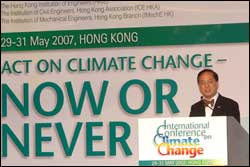 Poon chaired the
conference's organizing committee. The three-day conference was attended by
delegates from 26 countries and included academics, scientists and economists.
Poon described the coordination between the Environment, Transport and Works and
Economic Development and Labour bureaus, the two branches of government mainly
involved in negotiations with China Light and Power and Hongkong Electric over
greenhouse gases, as "unsmooth." He said "the two bureaus each have their own
priorities - one mainly with money and the other with environmental impact -
during negotiations. Coordination may not be good this way." The top-level
office does not necessarily have to be in the form of a bureau. Calls for action
by the government, business and individuals were made as the conference drew to
a close. The government was urged to set energy and climate policies which
incorporate sustainable development principles. "We hope the government will
seriously consider our call for action," Poon said, admitting the demands were
relatively general as the different countries participating in the conference
had to be accommodated. One suggestion made at the conference involved the
establishment of a community "climate change forum" in Hong Kong. "The forum
will provide us with the basic foundation for follow-up action, including a
continuing dialogue with the government, to ensure that what has been demanded
will hopefully be carried out," Poon said. Poon chaired the
conference's organizing committee. The three-day conference was attended by
delegates from 26 countries and included academics, scientists and economists.
Poon described the coordination between the Environment, Transport and Works and
Economic Development and Labour bureaus, the two branches of government mainly
involved in negotiations with China Light and Power and Hongkong Electric over
greenhouse gases, as "unsmooth." He said "the two bureaus each have their own
priorities - one mainly with money and the other with environmental impact -
during negotiations. Coordination may not be good this way." The top-level
office does not necessarily have to be in the form of a bureau. Calls for action
by the government, business and individuals were made as the conference drew to
a close. The government was urged to set energy and climate policies which
incorporate sustainable development principles. "We hope the government will
seriously consider our call for action," Poon said, admitting the demands were
relatively general as the different countries participating in the conference
had to be accommodated. One suggestion made at the conference involved the
establishment of a community "climate change forum" in Hong Kong. "The forum
will provide us with the basic foundation for follow-up action, including a
continuing dialogue with the government, to ensure that what has been demanded
will hopefully be carried out," Poon said.
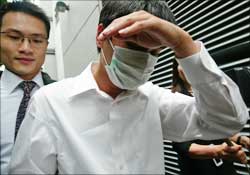 The government has
been urged to set up a top-level office to pinpoint action to be taken in the
fight against global warming and to wrestle with power companies to reduce
emissions. The call came Thursday from former Hong Kong Institution of Engineers
president Otto Poon Lok-to at the end of the International Conference on Climate
Change at the Hong Kong Convention and Exhibition Centre. A jewelry retailer has
been fined HK$100,000 and given a suspended six-month jail term for falsely
labeling jewelry made in China as Italian. Wan Chi-nang, manager of Silver
Jubilee International, had pleaded guilty in Kowloon City Magistrates' Court to
four charges of importing and possessing goods for sale with a false trading
description and with failing to display the required notice under the Trade
Descriptions Ordinance. He became the first person to be fined for selling
falsely labeled items since national broadcaster CCTV aired a report in April
about Hong Kong shops selling fake goods to mainland visitors. Principal
magistrate Ernest Lin Kam-hung said Thursday although the prosecutor did not
mention cases of mainland tourists being cheated during the hearing, he could
not ignore the media reports about dishonest businessmen arranging to sell fake
goods to mainland travelers. The magistrate also condemned all retailers who
took advantage of visitors who were not familiar with the prices and markets in
Hong Kong. He said ripping off visitors would give the city a bad image and
hamper its growth. Lin said it was necessary to pass a deterrent sentence to
curb similar incidents. However, since this was the first case following the
CCTV expose, he was prepared to suspend the six- month term for three years.
Future cases, he said, would lead to an immediate custodial sentence. The government has
been urged to set up a top-level office to pinpoint action to be taken in the
fight against global warming and to wrestle with power companies to reduce
emissions. The call came Thursday from former Hong Kong Institution of Engineers
president Otto Poon Lok-to at the end of the International Conference on Climate
Change at the Hong Kong Convention and Exhibition Centre. A jewelry retailer has
been fined HK$100,000 and given a suspended six-month jail term for falsely
labeling jewelry made in China as Italian. Wan Chi-nang, manager of Silver
Jubilee International, had pleaded guilty in Kowloon City Magistrates' Court to
four charges of importing and possessing goods for sale with a false trading
description and with failing to display the required notice under the Trade
Descriptions Ordinance. He became the first person to be fined for selling
falsely labeled items since national broadcaster CCTV aired a report in April
about Hong Kong shops selling fake goods to mainland visitors. Principal
magistrate Ernest Lin Kam-hung said Thursday although the prosecutor did not
mention cases of mainland tourists being cheated during the hearing, he could
not ignore the media reports about dishonest businessmen arranging to sell fake
goods to mainland travelers. The magistrate also condemned all retailers who
took advantage of visitors who were not familiar with the prices and markets in
Hong Kong. He said ripping off visitors would give the city a bad image and
hamper its growth. Lin said it was necessary to pass a deterrent sentence to
curb similar incidents. However, since this was the first case following the
CCTV expose, he was prepared to suspend the six- month term for three years.
Future cases, he said, would lead to an immediate custodial sentence.
Hong Kong International Airport is today set for the grand
opening of a new terminal built to meet increasing demand for passengers and
strengthen its role as a regional and international transportation hub. The
opening ceremony of the airport's Terminal 2 will be officiated by Chief
Executive Donald Tsang Yam-kuen and top officials of the Airport Authority,
which runs the facility. The opening is part of the celebration to mark the 10th
anniversary of the handover in 1997. "The new terminal will cater for future
expansion. We expect there will be a need to meet increased passenger demand
here," a spokeswoman for the authority said. "We see a strong upward trend in
the number of passengers." The 140,000-square-meter terminal, one-fourth the
size of Terminal 1, already began a phased opening in February. Some 130 retail
and catering outlets started opening during the month, while carriers Oasis and
Emirates were among the first batch of airlines moving into the new facility in
March. More carriers will progressively move to the terminal. The new terminal
is for departing passengers but not for arrivals. It serves 10-15 percent of the
total number of passengers using the airport.
A Hong Kong man who owns a six-floor house in a prime
location in Shenzhen's financial district has accused a mainland developer of
using underhand methods to try to force him to sell the property. Choi
Chu-cheung, whose high-profile court battle against developer Kingkey Group put
him in the media spotlight on the mainland, said yesterday he would hold his
ground for as long as he could. The developer wants to build Shenzhen's tallest
building - an 88-storey financial centre - on the site, but Mr Choi has refused
to sell. Mr Choi, 57, said the developer had tried to force him into leaving by
removing all security guards from the site - effectively turning the area into a
thieves' den. Unidentified people have been seen near his house at night,
digging holes and removing telephone cables. A telephone cable buried near Mr
Choi's house was cut on Tuesday. But it was later found that the cable was
linked to a nearby bank, and not his home. It was hurriedly repaired after
protests by the bank. Mr Choi and neighbours said rampant thieving and sabotage
was costing them dearly and posing a public-safety risk. There are more than 80
holes in a 500-metre-long stretch of road surrounding Mr Choi's house, none of
which are properly marked. One passer-by said: "We have to be very careful. It's
like walking past a minefield. It's irresponsible. They should at least put some
signs near the holes." Mr Choi and another homeowner who has also refused to
sell his property said they would not yield to the developer. "The situation is
getting worse. But we will fight to the last minute," Mr Choi said. "We did
nothing wrong. We should be protected by property law. No one can illegally
demolish a building without its owner's approval." Zhang Tao , the mainland
homeowner who lives nearby and has also refused to sell his flat, accused
Kingkey of trying to muscle them out.
The ICAC's power to compel people to deliver to it
documents held in other jurisdictions has been confirmed by the city's highest
court. The Court of Final Appeal ruled yesterday that special investigative
powers granted to the Independent Commission Against Corruption did extend to
forcing people involved in an investigation, even non-suspects, to retrieve
relevant documents that might be held outside Hong Kong. The ruling came after
an appeal by a woman (who cannot be named) into charges brought against her for
refusing a court-approved ICAC order to bring certain documents to the city that
the commission thought were being held at an office in Zhongshan on the
mainland. The woman was not a suspect in the investigation, which was into
alleged misconduct by several senior figures at a Hong Kong-listed company, one
of whom was her father. The corruption watchdog believed evidence of the alleged
wrongdoing was being kept at a subsidiary of the company in Zhongshan. As part
of the ICAC's special investigation powers, the commissioner is authorised to
obtain, with judicial permission, information from suspects and non-suspects.
Section 14 of the Prevention of Bribery Ordinance states that where a Court of
First Instance judge is satisfied corruption may have occurred they can issue an
order enabling the ICAC to require co-operation from people who it is believed
could help further the investigation. Failure to comply without a reasonable
excuse is a criminal offence punishable by a HK$250,000 fine and a one-year
prison term. The ICAC sought and obtained the required order but the woman
refused to comply with it on the grounds that she believed transporting the
documents from the mainland would be against mainland law. She was charged as a
result. The court noted that because Section 14 had an impact on rights central
to Hong Kong's way of life, the judge's role was to ensure there was sufficient
grounds for infringing on those rights. The judge must be satisfied of the
case's merits and even then, the power to issue the notice was discretionary. If
the judge believed the burden placed on the subject was too heavy, then the
bench could choose not to grant such a special power, it said.
 China: Most
Asian countries do not see China's military buildup or increased defense
spending as a threat to regional security, Singapore's prime minister said
Friday. "Most Asian countries assess the challenge from China to be more
economic than military," Prime Minister Lee Hsien Loong said in a speech to
inaugurate a three-day regional security conference. The Shangri-La Dialogue is
being attended by several defense ministers and top officials from 26 countries,
including US Secretary of Defense Robert Gates, Japanese Defense Minister Fumio
Kyuma, Indian Defense Minister A.K. Antony and the Chinese army's deputy chief
of the general staff, Lt. Gen. Zhang Qisheng. Lee noted that the US and Japan
have expressed concerns over China's military buildup, and sought more
information on its defense spending and intentions. China announced in March it
would boost military spending by 17.8 percent in 2007 to 350.92 billion yuan
(US$44.94 billion), the biggest jump in more than a decade. Lee warned of
negative consequences if Taiwan amends its Constitution and holds a referendum
on the amendments. "These actions ... could lead to unintended and dangerous
escalation of tensions between China and the US," he said. "Asian countries will
be forced to choose sides, which none want to do," Lee told the forum, organized
by the London-based International Institute for Strategic Studies. Lee also
touched upon nuclear-powered India's growing weight in regional and
international affairs. India's emerging relationship with the US has also
created "a new dynamic." However, the debate caused in India by those who oppose
closer relations with the US shows that that New Delhi "will not be a deputy
sheriff to the United States, but fully intends to maintain its own strategic
priorities," Lee said. The Shangri-La Dialogue, named after the hotel where it
is held every year, has grown in stature after six years of bringing together
defense ministers, army chiefs and other officials from countries that are
friends and adversaries. The aim is to allow them to hold talks in an informal
setting without political baggage. In a reflection of the conference's
importance, China's chief delegate this year is of vice-ministerial rank and the
highest ranking official ever sent to a regional forum of this level.
Singapore's Lee set the tone for the freewheeling talks over the next two days
with some frank comments of his own. Answering questions from the audience, he
acknowledged that the Association of Southeast Asian Nations, a 10-nation
grouping, had failed to make any progress in persuading fellow member Myanmar's
military junta to adopt democracy. "We have exercised our influence, persuaded,
encouraged, cajoled the authorities in Myanmar to move and adapt to the world
which is leaving them behind. The impact has been limited," he said. Lee also
urged the United States not to withdraw from Iraq without a clear victory,
saying it would embolden extremists in other places.
China: Most
Asian countries do not see China's military buildup or increased defense
spending as a threat to regional security, Singapore's prime minister said
Friday. "Most Asian countries assess the challenge from China to be more
economic than military," Prime Minister Lee Hsien Loong said in a speech to
inaugurate a three-day regional security conference. The Shangri-La Dialogue is
being attended by several defense ministers and top officials from 26 countries,
including US Secretary of Defense Robert Gates, Japanese Defense Minister Fumio
Kyuma, Indian Defense Minister A.K. Antony and the Chinese army's deputy chief
of the general staff, Lt. Gen. Zhang Qisheng. Lee noted that the US and Japan
have expressed concerns over China's military buildup, and sought more
information on its defense spending and intentions. China announced in March it
would boost military spending by 17.8 percent in 2007 to 350.92 billion yuan
(US$44.94 billion), the biggest jump in more than a decade. Lee warned of
negative consequences if Taiwan amends its Constitution and holds a referendum
on the amendments. "These actions ... could lead to unintended and dangerous
escalation of tensions between China and the US," he said. "Asian countries will
be forced to choose sides, which none want to do," Lee told the forum, organized
by the London-based International Institute for Strategic Studies. Lee also
touched upon nuclear-powered India's growing weight in regional and
international affairs. India's emerging relationship with the US has also
created "a new dynamic." However, the debate caused in India by those who oppose
closer relations with the US shows that that New Delhi "will not be a deputy
sheriff to the United States, but fully intends to maintain its own strategic
priorities," Lee said. The Shangri-La Dialogue, named after the hotel where it
is held every year, has grown in stature after six years of bringing together
defense ministers, army chiefs and other officials from countries that are
friends and adversaries. The aim is to allow them to hold talks in an informal
setting without political baggage. In a reflection of the conference's
importance, China's chief delegate this year is of vice-ministerial rank and the
highest ranking official ever sent to a regional forum of this level.
Singapore's Lee set the tone for the freewheeling talks over the next two days
with some frank comments of his own. Answering questions from the audience, he
acknowledged that the Association of Southeast Asian Nations, a 10-nation
grouping, had failed to make any progress in persuading fellow member Myanmar's
military junta to adopt democracy. "We have exercised our influence, persuaded,
encouraged, cajoled the authorities in Myanmar to move and adapt to the world
which is leaving them behind. The impact has been limited," he said. Lee also
urged the United States not to withdraw from Iraq without a clear victory,
saying it would embolden extremists in other places.
Since 1978, more than 70 percent of
all the Chinese who traveled abroad to study chose not to return home, a report
has said. The Report on the Development of Chinese Talent in 2006, published
yesterday by the Chinese Academy of Social Sciences, said that between 1978 and
2006, about 1.06 million Chinese went to study overseas. Of those just 275,000
returned home during the period, the report said. Of those who stayed overseas,
more than 200,000 went on to find jobs or were granted citizenship, it said.
About 300,000 people went abroad with the initial intention of visiting
relatives, but later enroled in higher education and stayed, the report said.
Yang Xiaojing, who helped draft the report, said: "This shows that Chinese
students overseas, especially those with extraordinary abilities, are a real hit
in the global tug war for talent. "While strictly controling the inflow of
foreign labor to protect the interests of its domestic workforce, most developed
countries spare no effort to attract the best talent from around the world," he
said. "Against the backdrop of economic globalization, an excessive brain drain
will inevitably threaten the human resources security and eventually the
national economic and social security of any country," he said. The lack of
first-class scientists and research pioneers is the main thing hindering China's
innovation capability, the report said. "Of the many reasons for the brain drain
of Chinese students, huge social and economic gaps in terms of personal income,
employment opportunities, working conditions, research facilities and living
standards are the main ones," the report said. The Ministry of Personnel has
enacted a plan to lure about 150,000 to 200,000 overseas-based students back to
China by 2010 by offering a series of preferential policies on income, welfare,
housing and education for their children. To solve the relentless outflow of
talent, the report urged the establishment of a talent security alarm system to
monitor the flow of domestic talent. The report stressed the importance of
implementing the promised preferential polices, as the main concern of many
talented people was finding a good and solid home and work environment. China's
backward management and lack of supervision of personnel recruitment, which is
also sometimes plagued by corruption and nepotism, were also blamed for driving
away talent, the report said.
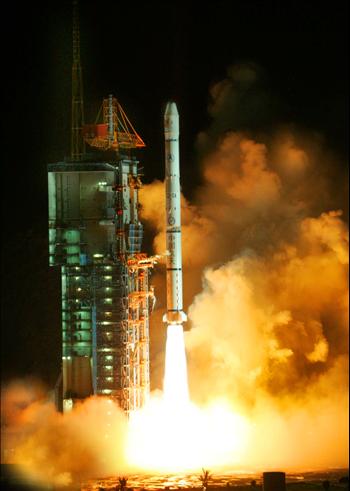 China launched "SinoSat-3", a
communications satellite for radio and television broadcasting, aboard a Long
March-3A carrier rocket on early morning of June 1, 2007, marking the 100th
flight of its Long March series.
China launched "SinoSat-3", a
communications satellite for radio and television broadcasting, aboard a Long
March-3A carrier rocket on early morning of June 1, 2007, marking the 100th
flight of its Long March series.
China's government on Thursday
pledged another 80 million yuan (10.4 million U.S. dollars) to help fight a
widespread and prolonged drought that has left nearly 9 million people short of
drinking water.
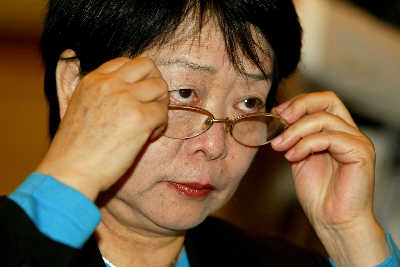 China plans to increase the ratio of Euros in its
foreign exchange holdings given the stability in the European Union (EU)
economic growth and in the value of the European single currency, central bank
vice governor Wu Xiaoling said Thursday in Brussels.
However, China has no plans yet
to reduce the proportion of US dollar assets in its coffers, Wu Xiaoling told an
economic forum in Brussels, the Shanghai-based Oriental Morning Post reported
Friday. Chinese stocks are rising too quickly and a market crash would undermine
investor and consumer confidence in the nation's economy, a Chinese deputy
central bank governor said Thursday. But if economic reforms succeed, the yuan
may strengthen against the US dollar - though China would ignore any external
pressure for its currency's appreciation, Wu Xiaoling told a Brussels seminar on
global imbalances. "In my view, every market develops in twists and turns. In my
view, the Chinese stock market is growing too rapidly. We hope it can grow in a
more steady manner," Wu said. The mainland's stocks rose Thursday, rebounding
from a rout Wednesday that wiped out US$161 billion (HK$1.25 trillion) of market
value. The CSI 300 Index gained 41.49, or 1.1 percent, to 3,927.95 at the close,
having lost as much as 5.2 percent. It plunged 6.8 percent Wednesday, the most
since February 27, after the finance ministry tripled the tax on share trades to
cool a rally that was drawing more than 300,000 new investors a day. "The
government definitely doesn't want to see a big correction," said Howard Wang,
who helps manage JF Asset Management's US$443 million JF China Pioneer A-Share
Fund in Hong Kong. "What it wants is for local investors to think of returns as
more symmetrical than they have been. If the market comes off 20 percent, then
you're looking at a social issue."
China plans to increase the ratio of Euros in its
foreign exchange holdings given the stability in the European Union (EU)
economic growth and in the value of the European single currency, central bank
vice governor Wu Xiaoling said Thursday in Brussels.
However, China has no plans yet
to reduce the proportion of US dollar assets in its coffers, Wu Xiaoling told an
economic forum in Brussels, the Shanghai-based Oriental Morning Post reported
Friday. Chinese stocks are rising too quickly and a market crash would undermine
investor and consumer confidence in the nation's economy, a Chinese deputy
central bank governor said Thursday. But if economic reforms succeed, the yuan
may strengthen against the US dollar - though China would ignore any external
pressure for its currency's appreciation, Wu Xiaoling told a Brussels seminar on
global imbalances. "In my view, every market develops in twists and turns. In my
view, the Chinese stock market is growing too rapidly. We hope it can grow in a
more steady manner," Wu said. The mainland's stocks rose Thursday, rebounding
from a rout Wednesday that wiped out US$161 billion (HK$1.25 trillion) of market
value. The CSI 300 Index gained 41.49, or 1.1 percent, to 3,927.95 at the close,
having lost as much as 5.2 percent. It plunged 6.8 percent Wednesday, the most
since February 27, after the finance ministry tripled the tax on share trades to
cool a rally that was drawing more than 300,000 new investors a day. "The
government definitely doesn't want to see a big correction," said Howard Wang,
who helps manage JF Asset Management's US$443 million JF China Pioneer A-Share
Fund in Hong Kong. "What it wants is for local investors to think of returns as
more symmetrical than they have been. If the market comes off 20 percent, then
you're looking at a social issue."
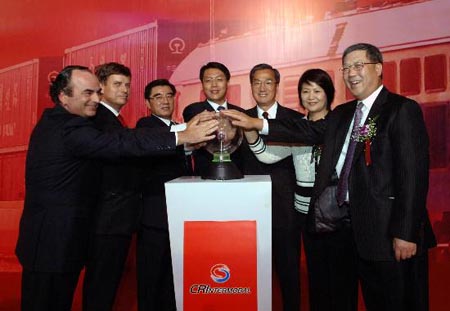 The Ministry of Railways announced yesterday that it had
found five overseas firms to invest in 18 railway container-distribution centers
in China, representing a major step forward for the financial reform of the
country's railway sector. The ministry also announced the formation of China
United International Rail Container Co Ltd, which is to build and operate the 18
centers. The centers will be located in regional economic centers throughout the
country. China Railway Container Transport Corp Ltd, an affiliate of the
ministry, will be the biggest shareholder in the new firm, with a 34 percent
stake. China International Marine Containers (Group) Co Ltd will hold 10
percent. As far as the overseas firms, the Hong Kong-listed NWS Service
Management Ltd will hold a 22 percent stake, while Hong Kong Promisky Investment
Ltd will hold 10 percent. The Israel-based Zim Integrated Shipping Services
Company, France-based CMA CGM Group and Germany-based Deutsche Bahn AG will each
take 8 percent stakes. Ministry spokesman Wang Yongping described the
establishment of the joint venture as "a milestone in the history of China's
railway development". "It also fully reflects our resolve to accelerate the
financial reform of the railway sector," Wang said. An initial assessment of the
plan to build the 18 centers forecast investments worth at least 12 billion yuan
($1.60 billion). The company will have $560 million in registered capital, or
about 35 percent of the total investment. The ministry said it hoped having
overseas investors on board would help introduce new management concepts and
sharpen railways' competitiveness in the container transport market. The
ministry has been seeking foreign investment since last year. Railways Minister
Liu Zhijun told a national conference earlier this year that local governments,
State-owned and private enterprises, social investment institutions and overseas
funds were all welcome to invest in the railways.
The Ministry of Railways announced yesterday that it had
found five overseas firms to invest in 18 railway container-distribution centers
in China, representing a major step forward for the financial reform of the
country's railway sector. The ministry also announced the formation of China
United International Rail Container Co Ltd, which is to build and operate the 18
centers. The centers will be located in regional economic centers throughout the
country. China Railway Container Transport Corp Ltd, an affiliate of the
ministry, will be the biggest shareholder in the new firm, with a 34 percent
stake. China International Marine Containers (Group) Co Ltd will hold 10
percent. As far as the overseas firms, the Hong Kong-listed NWS Service
Management Ltd will hold a 22 percent stake, while Hong Kong Promisky Investment
Ltd will hold 10 percent. The Israel-based Zim Integrated Shipping Services
Company, France-based CMA CGM Group and Germany-based Deutsche Bahn AG will each
take 8 percent stakes. Ministry spokesman Wang Yongping described the
establishment of the joint venture as "a milestone in the history of China's
railway development". "It also fully reflects our resolve to accelerate the
financial reform of the railway sector," Wang said. An initial assessment of the
plan to build the 18 centers forecast investments worth at least 12 billion yuan
($1.60 billion). The company will have $560 million in registered capital, or
about 35 percent of the total investment. The ministry said it hoped having
overseas investors on board would help introduce new management concepts and
sharpen railways' competitiveness in the container transport market. The
ministry has been seeking foreign investment since last year. Railways Minister
Liu Zhijun told a national conference earlier this year that local governments,
State-owned and private enterprises, social investment institutions and overseas
funds were all welcome to invest in the railways.
The US commerce department said it
was imposing additional preliminary duties of up to 99.65 percent on imports of
glossy paper from China, on top of earlier, much smaller duties that already
have caused friction.
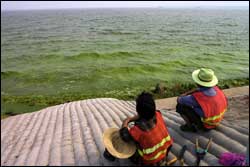
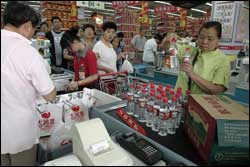 Authorities in a major mainland city
issued emergency orders Thursday to stem panic water-buying after heavy
pollution in a lake contaminated drinking supplies for millions of people. The
Wuxi city government said it was doing everything it could to rid the Tai Lake
of a huge algae bloom that was triggered by the pollution, but in the meantime
drastic measures were needed to supply residents with water. "To rid the water
of the odor and taste is a difficult problem for our water- treatment [plants],"
it said. Orders have been issued for more bottled water supplies to be brought
in to stop profiteering. Xinhua News Agency said the price of an 18-liter bottle
of water in Wuxi sold for 50 yuan (HK$51.03) Wednesday, more than six times
higher than the normal price of eight yuan. Officials have also ordered the
diversion of water from local rivers into Tai Lake, the main source of drinking
water for Wuxi, to help wash out the algae. Residents said the water coming out
of taps was green or yellow and left a slimy film on the hands and body when
used to wash. "The tap water is like waste water. It smells so bad that you want
to throw up," a downtown shop owner surnamed Li said. "This is the third day
that the water has been like this. If you wash with the water you end up
smelling like it." Stores in the city of five million people in Jiangsu province
began rationing sales of bottled water Wednesday, Li said. Authorities in a major mainland city
issued emergency orders Thursday to stem panic water-buying after heavy
pollution in a lake contaminated drinking supplies for millions of people. The
Wuxi city government said it was doing everything it could to rid the Tai Lake
of a huge algae bloom that was triggered by the pollution, but in the meantime
drastic measures were needed to supply residents with water. "To rid the water
of the odor and taste is a difficult problem for our water- treatment [plants],"
it said. Orders have been issued for more bottled water supplies to be brought
in to stop profiteering. Xinhua News Agency said the price of an 18-liter bottle
of water in Wuxi sold for 50 yuan (HK$51.03) Wednesday, more than six times
higher than the normal price of eight yuan. Officials have also ordered the
diversion of water from local rivers into Tai Lake, the main source of drinking
water for Wuxi, to help wash out the algae. Residents said the water coming out
of taps was green or yellow and left a slimy film on the hands and body when
used to wash. "The tap water is like waste water. It smells so bad that you want
to throw up," a downtown shop owner surnamed Li said. "This is the third day
that the water has been like this. If you wash with the water you end up
smelling like it." Stores in the city of five million people in Jiangsu province
began rationing sales of bottled water Wednesday, Li said.
June 2 - 3, 2007
 Hong Kong:
The total retail sales value in Hong Kong in April grew to a provisionally
estimated 19.2 billion HK dollars (2.4 billion U.S. dollars), up 3.4 percent
from the same month last year, official figures indicated Thursday. After
netting out the effect of price changes, the total retail sales volume rose 2
percent in April, according to data released by the Census and Statistics
Department of the Hong Kong Special Administrative Region. The revised estimate
of the total retail sales value in March grew 4.9 percent to 18.8 billion HK
dollars, while the total retail sales volume rose 3.4 percent. The department
said the moderate growth in retail sales volume was partly due to the especially
long holiday of adjacent Easter and Ching Ming Festival this year, which might
have induced more people to take longer vacations outside Hong Kong. Also
affecting retail business in April was the slow increase in incoming tourists,
and the decline in Mainland visitors in particular, said the department. Hong Kong:
The total retail sales value in Hong Kong in April grew to a provisionally
estimated 19.2 billion HK dollars (2.4 billion U.S. dollars), up 3.4 percent
from the same month last year, official figures indicated Thursday. After
netting out the effect of price changes, the total retail sales volume rose 2
percent in April, according to data released by the Census and Statistics
Department of the Hong Kong Special Administrative Region. The revised estimate
of the total retail sales value in March grew 4.9 percent to 18.8 billion HK
dollars, while the total retail sales volume rose 3.4 percent. The department
said the moderate growth in retail sales volume was partly due to the especially
long holiday of adjacent Easter and Ching Ming Festival this year, which might
have induced more people to take longer vacations outside Hong Kong. Also
affecting retail business in April was the slow increase in incoming tourists,
and the decline in Mainland visitors in particular, said the department.
The deposits of Renminbi, or Chinese
yuan, in Hong Kong grew one percent to 25.5 billion yuan ( 3.35 billion U.S.
dollars) in April, the Monetary Authority of Hong Kong said Thursday. In April,
foreign-currency deposits also rose 1.4 percent, and however, total deposits
with authorized institutions fell 0.7 percent, with Hong Kong dollar deposits
down 2.4 percent, said the authority. Total loans and advances fell 3.2 percent,
as the fall in Hong Kong dollar loans exceeded the rise in foreign-currency
loans. Loans for use in Hong Kong shrank 4.1 percent, while loans for use
outside Hong Kong grew 2.3 percent. Reflecting a larger contraction in loans
relative to deposits, the Hong Kong dollar loan-to-deposit ratio fell to 73.9
percent. On a seasonally-adjusted basis, Hong Kong dollar M1 fell 2.2 percent in
April but grew 9.4 percent on a year earlier. Unadjusted Hong Kong dollar M2 and
M3 both fell 2.3 percent during the month. On a year-on-year basis, Hong Kong
dollar M2 and M3 rose 14.9 percent and 14.8 percent, said the authority.
The total assets of Hong Kong's
Exchange Fund surged 30 billion HK dollars (3.8 billion U.S. dollars) to 1.253
trillion HK dollars in April, Hong Kong's Monetary Authority said Thursday. The
month also saw foreign-currency assets rise 15.1 billion HK dollars and Hong
Kong dollar assets grow by 14.9 billion HK dollars, said the authority. The
surge in foreign-currency assets was due mainly to valuation gains on
foreign-currency investments and interest and dividend income from
foreign-currency assets. The rise in Hong Kong dollar assets was due mainly to
valuation gains of Hong Kong equities held by the Exchange Fund, placements
received from fiscal reserves and a rise in Exchange Fund Bills and Notes issued
but not yet settled. The Monetary Base fell 900 million HK dollars, or 0.3
percent, to 298.2 billion HK dollars. The fall was due mainly to a decrease in
Certificates of Indebtedness. Backing Assets grew 800 million HK dollars, or 0.2
percent, to 332.6 billion HK dollars. The rise was attributable mainly to
interest from investments and revaluation gains, which were partly offset by the
redemption of Certificates of Indebtedness in the Monetary Base. Reflecting
this, the backing ratio rose to 111.53 percent from 110.93 percent. (One U.S.
dollar equals 7.8 HK dollars).
China's decision to raise stock
trading tax, which caused a big fall of A share market on the Chinese mainland
Wednesday may be a good news to most Hong Kong investors as they are expecting
more mainland capitals to flow in through Qualified Domestic Institutional
Investors (QDII) scheme to boost the sluggish Hong Kong market. Hong Kong stocks
suffered a consecutive three-day loss until Thursday, when the benchmark of Hang
Seng Index closed 340.71 points higher to 20634.47. However, most investors
thought the three-day's fall just as a short term reflection dragged by the fall
of A-share market due to the series of controlling policy, including the stamp
duty rise from 0.1 percent to 0.3 percent Wednesday. Analysts said on the
contrary to the previous containing policy issued by the government to cool down
the market, including reserve ratio rise, interest rise and the expansion of
exchange floating range, the stamp duty rise is interpreted by Hong Kong
investors as positive instead of negative. They believe the stamp duty rise may
promote more mainland investors to Hong Kong through QDII or through other
investing channels. Some brokers even predicted that China Banking Regulatory
Commission may further ease the investment volume of QDII by allowing Chinese
banks to invest more than 50 percent of its overseas investment in stocks, which
may attract more investors to put more money to overseas market instead of
A-shares and thus reduce the A-share bubbles. Hong Kong stock market, which is
an international investment platform yet getting more and more sensitive to the
movement of A- shares, used to follow the up and down of A-shares. However, the
pattern has changed this year into only following A-share's down trend but
remaining sluggish even if its A-share counterparts going sky high, which leads
to further price gap between H-shares and A-shares. Investors believe the money
flow in through QDII may focus on companies with both A-shares and H-shares
because the price gap between the two parts will attract investors to buy the
relatively cheaper H-shares hoping the latter's catching-up may bring them big
rewards. If that is the direction of Hong Kong stock market, analysts believe a
balance will be achieved between A-share and H-share and therefore investors in
Hong Kong market may not need to worry about further going down. Instead, they
need to buy and wait for QDII to bring money in.
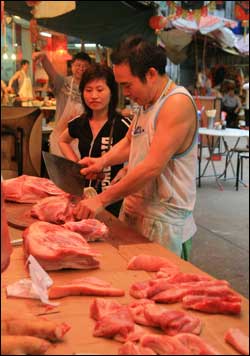 The rapid
increase in the price of pork in the mainland, which is causing concern in some
cities, has spilled over into Hong Kong with the city's sole fresh pork supplier
increasing the wholesale price by a hefty 7 percent, effective immediately. A
spokesman for the Ng Fung Hong company said the price was raised from HK$1,060
per 100 catties to HK$1,134. The industry estimates the increase to consumers
will be around HK$2 a catty. The spokesman said the adjustment was in response
to the increase in the price of pork in the mainland and the market demand. To
ensure a constant daily supply of about 4,000 live pigs to Hong Kong, Ministry
of Commerce spokesman Wang Xinpei said the central government will continue to
monitor the supply in Guangzhou and Shenzhen. The deputy chairman of the Pork
Traders General Association of Hong Kong, Hui Wai-kin, said the higher prices in
the mainland are the result of greater demand, the increased cost of rearing
pigs and the appreciation of the yuan. The rapid
increase in the price of pork in the mainland, which is causing concern in some
cities, has spilled over into Hong Kong with the city's sole fresh pork supplier
increasing the wholesale price by a hefty 7 percent, effective immediately. A
spokesman for the Ng Fung Hong company said the price was raised from HK$1,060
per 100 catties to HK$1,134. The industry estimates the increase to consumers
will be around HK$2 a catty. The spokesman said the adjustment was in response
to the increase in the price of pork in the mainland and the market demand. To
ensure a constant daily supply of about 4,000 live pigs to Hong Kong, Ministry
of Commerce spokesman Wang Xinpei said the central government will continue to
monitor the supply in Guangzhou and Shenzhen. The deputy chairman of the Pork
Traders General Association of Hong Kong, Hui Wai-kin, said the higher prices in
the mainland are the result of greater demand, the increased cost of rearing
pigs and the appreciation of the yuan.
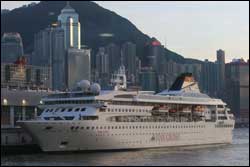 Hong Kong health authorities are
investigating an outbreak of gastroenteritis caused by norovirus that affected
92 people on a cruise ship that arrived in the SAR Wednesday. Star Cruises'
Gemini, carrying 1,106 passengers and crew, is on a 22-day voyage around Asia.
It departed from Singapore last Sunday, calling at ports in Thailand and Vietnam
before docking in Hong Kong at 9am Wednesday. There were no Hong Kong citizens
on board for the trip from Singapore. According to the Department of Health,
four crew members and 88 passengers - 44 males and 44 females - aged from three
to 83 years had probably contracted a norwalk-like virus with symptoms such as
diarrhea, vomiting and fever. Chief port health officer Henry Kong Wing-ming,
who boarded the ship to conduct an initial investigation, said he was satisfied
with the hygiene conditions in the kitchens and restaurants. He said none of the
92 people required hospitalization and 74 had fully recovered after treatment by
the ship's doctor. The others were in stable condition. Samples were collected
from several passengers and some of the high- risk foods such as salads,
sandwiches and cheese had been destroyed. Hong Kong health authorities are
investigating an outbreak of gastroenteritis caused by norovirus that affected
92 people on a cruise ship that arrived in the SAR Wednesday. Star Cruises'
Gemini, carrying 1,106 passengers and crew, is on a 22-day voyage around Asia.
It departed from Singapore last Sunday, calling at ports in Thailand and Vietnam
before docking in Hong Kong at 9am Wednesday. There were no Hong Kong citizens
on board for the trip from Singapore. According to the Department of Health,
four crew members and 88 passengers - 44 males and 44 females - aged from three
to 83 years had probably contracted a norwalk-like virus with symptoms such as
diarrhea, vomiting and fever. Chief port health officer Henry Kong Wing-ming,
who boarded the ship to conduct an initial investigation, said he was satisfied
with the hygiene conditions in the kitchens and restaurants. He said none of the
92 people required hospitalization and 74 had fully recovered after treatment by
the ship's doctor. The others were in stable condition. Samples were collected
from several passengers and some of the high- risk foods such as salads,
sandwiches and cheese had been destroyed.
Lawmakers,
including those from the opposition camp, will be invited to some of the
activities to be attended by state leaders during celebrations marking the 10th
anniversary of the handover, according to Secretary for Constitutional Affairs
Stephen Lam Sui- lung.
Christie's,
one of the world's largest auction houses, expects no letup in demand for
Chinese art this year, with Asian sales set to rise up to 20 percent despite
relatively flat global revenues.
Hutchison (SEHK: 0013) Telecom (SEHK:
2332) (Hong Kong), the city's second-largest mobile phone carrier, hopes the
introduction of Japan's popular i-mode service will spur demand for mobile data
transfers and attract more users of voice services to the company's 2.5 mobile
business. At least 20 per cent of the company's new registered users would
subscribe to the i-mode service, Hutchison's chief operating officer-mobile, Amy
Lung, said after the official launch of i-mode, a mobile data service designed
and founded by Japan's NTT DoCoMo. Having more innovative services such as i-mode
"can help us to grab more high-spending young users", Miss Lung said. "We will
make more of an effort to migrate traditional voice users to tap the data
service in a bid to boost total data contribution." NTT DoCoMo, which launched
its i-mode service in 1999, had registered 47 million users by the end of March,
accounting for 33 per cent of Japan's total population. The success of the i-mode
service is mainly due to its speedy links and range of content contributed by
third parties. It allows users to manage dedicated e-mail, e-banking or
securities accounts, or even buy train tickets.
Hong Kong is failing to reap the
potential benefits from a youth working holiday scheme it has entered into with
three other countries, a manpower expert warned yesterday. Lai Kam-tong,
president of the Hong Kong Institute of Human Resources Management, made his
remarks after it was disclosed that youngsters using the scheme to work overseas
outnumber those coming in from the other countries by almost three to one. The
scheme has attracted just 780 people from Australia, New Zealand and Ireland,
while 2,100 Hongkongers have gone there on working holidays. The scheme was
launched with Australia and New Zealand in 2001, with Ireland joining in 2005.
It allows people aged 18 to 30 to take temporary jobs for up to three months at
a time during a 12-month stay. The Labour Department said the scheme was largely
aimed at providing youngsters with an opportunity to broaden their horizons with
exposure to a different culture. But Mr Lai said the government should see the
scheme as a means to capture young talent. "We don't just want them to
experience our culture, we want them spread the good word about Hong Kong and
perhaps stay on to work if they prove to be a useful talent for the economy," he
said. The quota of working holiday visas for Australia and New Zealand was first
set at 200, but last year the Australians agreed to expand it to 1,000 following
strong demand from Hong Kong. In the second half of last year, applications for
Australia reached 502, five times the 93 applications from Australia for the
whole year, according to the Security Bureau. While Mr Lai said poor air quality
and small and costly flats might deter young foreigners from coming to Hong
Kong, Australian consulate-general spokeswoman Kirsty Boazman blamed the low
turnout on competition from other countries. "We have a lot of choices. The
United States is popular and there is also Singapore," Ms Boazman said. "Our
people will compare before picking the destination they like best."
 China: Cigarette-related
deaths in China will more than double by 2020 unless the government introduces
measures to curtail smoking.
China: Cigarette-related
deaths in China will more than double by 2020 unless the government introduces
measures to curtail smoking.
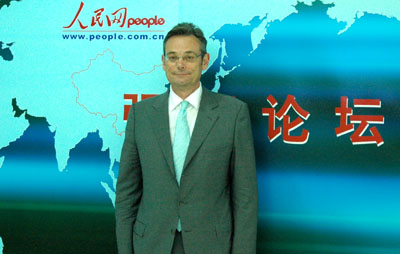 Cementing
and developing friendly Australia-China ties - China and Australia have
witnessed a rapid development in terms of bilateral ties such as in economic and
trade cooperation, in education, and in tourism since the establishment of
diplomatic relations between the two countries thirty-five years ago. At the
invitation of People's Daily Online, on May 29th, Australian ambassador to
China, Dr. Geoffrey William Raby, paid a visit to the Strong China Forum in
Beijing, during which he spoke freely about the current issues of common concern
and answered questions raised by netizens on the subject of "Cementing and
Developing Friendly Australian-China Relations." Australia and China great
cooperation partners - The ambassador regarded China and Australia as
complementary in terms of economic cooperation, and the economic partnership
between the two countries should be based on the availability of rich natural
resources in Australia, and the great demand of raw materials and resources from
China. Since the establishment of diplomatic relations thirty-five years ago,
the economic trade relationship between the two countries has witnessed
considerable development, particularly the volume of trade which has made great
strides forward. At present, Australia exports some 8 billion Australian dollars
worth iron ore to China annually, taking up a considerable share of the total
volume of trade between Australia and China. Apart from cooperation in the
above-mentioned sectors, there are also many new areas in which the two can
collaborate. For example, they can work together in the environmental arena,
particularly in the area of clean coal technology. China has great demand for
Australia's natural resources, and in 1998, China poured its initial batch of
foreign investment into the establishment of an iron mine in West Australia in
1998. The ambassador voiced his confidence in the collaborative efforts of
Australia and China in this area. Tourism brings Australia and China closer - In
the past ten years, more and more Chinese tourists have visited Australia. At
present, the number of Chinese tourists in Australia has hit 400,000, and is
growing steadily. Generally speaking, Chinese tourists stay much longer in
Australia than tourists visiting from other countries do. Currently, Chinese
tourists visit Australia mainly to go sightseeing, visiting such places as the
Sydney Harbour Bridge and Sydney Opera House, where they can enjoy sunshine, the
beach, fresh air, and other things typically Australian. Cementing
and developing friendly Australia-China ties - China and Australia have
witnessed a rapid development in terms of bilateral ties such as in economic and
trade cooperation, in education, and in tourism since the establishment of
diplomatic relations between the two countries thirty-five years ago. At the
invitation of People's Daily Online, on May 29th, Australian ambassador to
China, Dr. Geoffrey William Raby, paid a visit to the Strong China Forum in
Beijing, during which he spoke freely about the current issues of common concern
and answered questions raised by netizens on the subject of "Cementing and
Developing Friendly Australian-China Relations." Australia and China great
cooperation partners - The ambassador regarded China and Australia as
complementary in terms of economic cooperation, and the economic partnership
between the two countries should be based on the availability of rich natural
resources in Australia, and the great demand of raw materials and resources from
China. Since the establishment of diplomatic relations thirty-five years ago,
the economic trade relationship between the two countries has witnessed
considerable development, particularly the volume of trade which has made great
strides forward. At present, Australia exports some 8 billion Australian dollars
worth iron ore to China annually, taking up a considerable share of the total
volume of trade between Australia and China. Apart from cooperation in the
above-mentioned sectors, there are also many new areas in which the two can
collaborate. For example, they can work together in the environmental arena,
particularly in the area of clean coal technology. China has great demand for
Australia's natural resources, and in 1998, China poured its initial batch of
foreign investment into the establishment of an iron mine in West Australia in
1998. The ambassador voiced his confidence in the collaborative efforts of
Australia and China in this area. Tourism brings Australia and China closer - In
the past ten years, more and more Chinese tourists have visited Australia. At
present, the number of Chinese tourists in Australia has hit 400,000, and is
growing steadily. Generally speaking, Chinese tourists stay much longer in
Australia than tourists visiting from other countries do. Currently, Chinese
tourists visit Australia mainly to go sightseeing, visiting such places as the
Sydney Harbour Bridge and Sydney Opera House, where they can enjoy sunshine, the
beach, fresh air, and other things typically Australian.
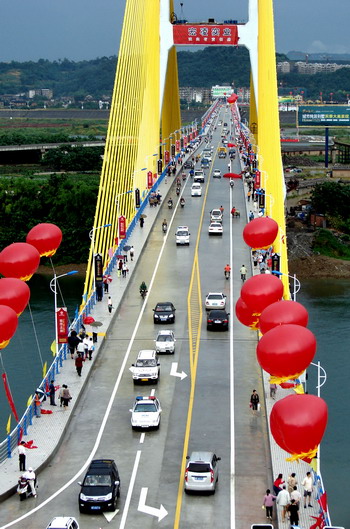 Jialing River Bridge at Shangzhong
Dam in Nachong city, southwest China's Sichuan province opened to traffic on May
30.
Jialing River Bridge at Shangzhong
Dam in Nachong city, southwest China's Sichuan province opened to traffic on May
30.
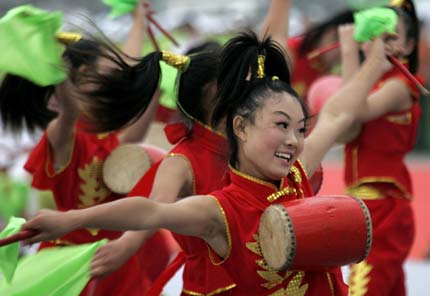 Girls play drums during a performance at Tiananmen
Square in Beijing May 31,2007. Thousands of participants took part in the
"Harmonious China, Welcome Olympics" event aimed at promoting the Beijing 2008
Olympics.
Girls play drums during a performance at Tiananmen
Square in Beijing May 31,2007. Thousands of participants took part in the
"Harmonious China, Welcome Olympics" event aimed at promoting the Beijing 2008
Olympics.
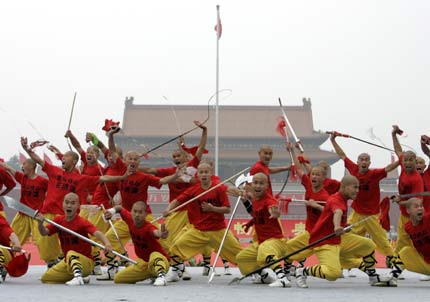 Monks perform Kung-fu at Tiananmen Square in Beijing
May 31,2007. Thousands of participants took part in the "Harmonious China,
Welcome Olympics" event aimed at promoting the Beijing 2008 Olympics.
Monks perform Kung-fu at Tiananmen Square in Beijing
May 31,2007. Thousands of participants took part in the "Harmonious China,
Welcome Olympics" event aimed at promoting the Beijing 2008 Olympics.
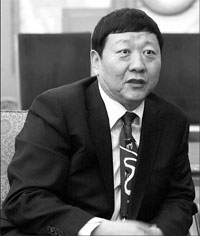 From milk bottle
washer to dairy industry king - Niu Gensheng began his career at Inner Mongolia
Yili Industrial Group Co Ltd (Yili) as a milk bottle washer in 1982. Because of
his hard work and intelligence, Niu rapidly ascended to general manager. But in
1999, Niu resigned because of irreconcilable differences with then boss, Zheng
Junhuai. That year, he founded Mengniu Dairy Industry (Group) Co Ltd (Mengniu).
In eight years, the 48-year-old has transformed the company from the 1116th
ranked dairy producer in China to number one. Mengniu has held the milk market
crown for four consecutive years, generating sales of 14.26 billion yuan in
2006, up 53.1 percent from the year before. Up until 2004, the overseas market
remained untapped for the dairy giant. Since then, Mengniu has made inroads into
Hong Kong and Taiwan and some Southeast Asian nations by joining forces with
overseas players like Danone, Arla Foods and Hong Kong Disneyland. Still, the
overseas market contributes just 10 percent of Mengniu's sales. From milk bottle
washer to dairy industry king - Niu Gensheng began his career at Inner Mongolia
Yili Industrial Group Co Ltd (Yili) as a milk bottle washer in 1982. Because of
his hard work and intelligence, Niu rapidly ascended to general manager. But in
1999, Niu resigned because of irreconcilable differences with then boss, Zheng
Junhuai. That year, he founded Mengniu Dairy Industry (Group) Co Ltd (Mengniu).
In eight years, the 48-year-old has transformed the company from the 1116th
ranked dairy producer in China to number one. Mengniu has held the milk market
crown for four consecutive years, generating sales of 14.26 billion yuan in
2006, up 53.1 percent from the year before. Up until 2004, the overseas market
remained untapped for the dairy giant. Since then, Mengniu has made inroads into
Hong Kong and Taiwan and some Southeast Asian nations by joining forces with
overseas players like Danone, Arla Foods and Hong Kong Disneyland. Still, the
overseas market contributes just 10 percent of Mengniu's sales.
The central government's newly found nerve to impose
serious measures to cool the mainland's overheated stock market has earned the
praise of economists for its determination to tackle the tricky issue. "This
kind of targeted measure for the domestic equity market should be more effective
in cooling off the A-share market than macro measures such as raising interest
rates or hiking the [banks'] reserve requirement ratio further," said Frank
Gong, an economist at JPMorgan. Gong is among those who steadfastly believes
that tax policy should be used to deal with the A-share problem. Dong Tao,
economist at Credit Suisse, said the Beijing government seems reluctant to make
overly aggressive moves - such as imposing a capital gains tax - because of the
risk of overkill. "The capital market is strategically important to the next
tightening measures," Tao said Wednesday. Both Tao and Gong, among others, agree
there will be more targeted measures in the future. They will be accompanied by
administrative measures such as an interest rate increase and another increase
in the reserve requirement. Since the recovery of the A-share market, especially
from July 2006 when the regulator approved new share listings again after a
one-year hiatus, the central government has been handling the equity market with
kid gloves, not wanting to impose measures to dampen the fragile but growing
confidence of domestic investors. "The government really has concerns on the
impact of imposing such stringent measures [such as a stamp duty adjustment],"
said Jason Chang, economist at Standard Chartered Bank. "It [an increase in
stamp duty] always ended a bull run in the past." But this time, the success of
share reform, coupled with implementation of more market infrastructure, had led
to a more stable market, which has served as a good foundation for Beijing to
act more decisively, analysts said. "It would be about right and it is a healthy
thing. It is good for people to not expect that markets will go up
continuously," Mark Mobius, managing director at Templeton Asset Management,
told Bloomberg. "If you get a real severe shock, where people give up hope
entirely, then it could be a bit more prolonged." Jerry Lou, China strategist at
Morgan Stanley, said the adjustment of the stamp duty has broken the perception
the government will leave asset prices to the market and will not interfere.
Despite the consensus that the latest move would be mild and not large enough to
push down the market, economists and strategists believe the psychological
effect should cause the market to become more self-disciplined.
Just a month after the discovery of
the Jidong Nanpu oilfield in Bohai Bay by PetroChina (0857), China Petroleum &
Chemical (0386) - better known as Sinopec - said it has found an oilfield in
northwest China with up to 1.47 billion barrels of oil equivalent in place.
Moody's Investors Service has
placed China's A2 rating on review for a possible upgrade, praising its strong
external payments position, continued success in reform and favorable fiscal
trends.
Disgraced drug chief Zheng Xiaoyu ,
the fourth senior official to be sentenced to death for corruption charges since
the Cultural Revolution, is planning an appeal, according to state media. But a
Beijing lawyer who has represented many victims of medical negligence said it
would be virtually impossible for Zheng to escape execution because of his
guilty plea and the size of the bribes he accepted. A Chengdu Shangbao report
carried by major official internet portals yesterday quoted a lawyer
representing Zheng, Liu Ning , as saying the former State Food and Drug
Administration (SFDA) director had decided to appeal. Zheng was sentenced to
death by a Beijing court on Tuesday for receiving bribes and gifts totaling 6.49
million yuan and dereliction of duty. Zhuo Xiaoqin , the Beijing lawyer who is
also a consultant to the Ministry of Health, said the prospects of a successful
appeal against the death sentence were slim. "The chances of him not dying are
zero. As far as I know, Zheng has pleaded guilty to accepting bribes, and the
litigation was mainly about the charge of dereliction of duty," he said. "The
court can sentence someone to death for accepting more than 100,000 yuan in
bribes and Zheng's case is particularly serious because his case is not just a
normal corruption case, but also because he was causing immense health hazards."
June 1, 2007
 Hong Kong:
The government of the Hong Kong Special Administrative Region announced
Wednesday that the relaxed immigration policy governing the entry of dependents
for residence in Hong Kong would take effect from June 1. Under the policy
announced on May 18, Chinese mainland spouses and unmarried dependent children
under the age of 18 of the following categories of persons will be allowed to
apply to reside in Hong Kong as the dependents of their sponsors: * persons
admitted for employment, investment and training under the General Employment
Policy; * persons admitted under the Capital Investment Entrant Scheme; *
foreigners and overseas Chinese admitted under the Quality Migrant Admission
Scheme; * overseas Chinese admitted for employment; and * overseas students
admitted for studying in full-time undergraduate or post-graduate programs in
local degree-awarding institutions. The length of stay of dependents is linked
to that of their sponsors. They are required to leave Hong Kong as and when the
sponsors leave. Hong Kong:
The government of the Hong Kong Special Administrative Region announced
Wednesday that the relaxed immigration policy governing the entry of dependents
for residence in Hong Kong would take effect from June 1. Under the policy
announced on May 18, Chinese mainland spouses and unmarried dependent children
under the age of 18 of the following categories of persons will be allowed to
apply to reside in Hong Kong as the dependents of their sponsors: * persons
admitted for employment, investment and training under the General Employment
Policy; * persons admitted under the Capital Investment Entrant Scheme; *
foreigners and overseas Chinese admitted under the Quality Migrant Admission
Scheme; * overseas Chinese admitted for employment; and * overseas students
admitted for studying in full-time undergraduate or post-graduate programs in
local degree-awarding institutions. The length of stay of dependents is linked
to that of their sponsors. They are required to leave Hong Kong as and when the
sponsors leave.
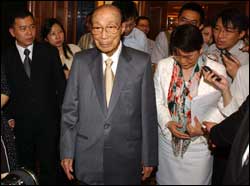 Run Run decides to retire in his
100th year - Television Broadcasts (0511) executive chairman Run Run Shaw is
planning to retire and is looking for a replacement, the company's deputy
chairman said Wednesday. Mona Fong Yat-wah, however, declined to comment on
whether Shaw will sell his stake in the company. Fong did not elaborate further
on Shaw's retirement plans.
Run Run decides to retire in his
100th year - Television Broadcasts (0511) executive chairman Run Run Shaw is
planning to retire and is looking for a replacement, the company's deputy
chairman said Wednesday. Mona Fong Yat-wah, however, declined to comment on
whether Shaw will sell his stake in the company. Fong did not elaborate further
on Shaw's retirement plans.
China's Macao Special Administrative
Region saw a GDP growth rate of 25.6 percent in the first quarter of this year,
according to official statistics issued Wednesday. The figures released by the
government-run Statistics and Census Service (SCS) showed that rising gaming
receipts and visitor expenditures in the quarter dedicated much to the two-
digit growth in gross domestic product (GDP). The city in the first quarter saw
year-on-year increase of 43.5 percent and 16 percent respectively in the above
two sectors, the figures showed.
Robert Zoellick, a Goldman Sachs
executive who has built contacts around the globe as President Bush's trade
chief, is the White House's choice to be the next World Bank president.
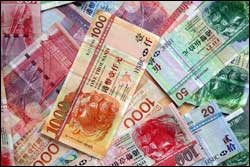 Research analysts flashed
out a HIBOR alert Tuesday, indicating banks may soon raise their interest rates
as funds continue to depart from Hong Kong while its currency continues to
weaken. The three-month Hong Kong interbank offered rate rose to 4.567 percent
Tuesday compared to the 3.9 percent average in January. This suggests a higher
funding cost for local lenders resulting from declining liquidity levels in the
banking industry. When HIBOR reaches 4.5 percent, banks may have to raise their
best lending rates to offset higher costs, Hang Seng Bank (0011) chief executive
Raymond Or Ching-fai has said. Citigroup predicts Hong Kong banks may raise the
prime rate by 25 basis points in one to three months to protect profit margins
amid rising cost of funds. "A headache for banks in Hong Kong is that they need
to keep lending rates low to boost loan growth," economist Joe Lo said in a
research report. "On the other hand, banks are facing a higher cost of funds and
lower net interest margins, particularly for mortgage loans on which interest
rates are based on the prime rate." Another tactic Hong Kong banks may adopt to
tackle the problem could be to raise savings rates paid to customers to attract
more deposits, therefore allowing banks to rely less on borrowings from other
banks. Margaret Leung Ko May-yee, HSBC's general manager and global co-head for
commercial banking, does not rule out the possibility of raising interest rates
in one to three months. "We could raise interest rates anytime, but we would
have to identify carefully whether the high HIBOR level is a persistent
situation or just temporary because of the three upcoming IPOs," Leung said
Tuesday. Market watchers say the need to raise interest rates this time is more
pressing than a few months ago, as the previous surge in HIBOR was due to
several large initial public offerings that sucked out funds from the banking
system. This time, the falling liquidity level could be due to fears of a bubble
forming in the A-share market, which has probably caused investors to pull out
their money from Hong Kong's equity market, which is 40 percent made up of
Chinese enterprises. The rising yuan has also highlighted the weakening of the
Hong Kong dollar. The mainland currency has risen past the 7.65 level against
the US dollar, trading Tuesday at 7.6495. "The three-month HIBOR has pushed up
to 4.6 percent, rising 20 basis points in the past 10 days, while the Hong Kong
dollar has weakened to just over 7.82 against the US dollar," CLSA Asia Pacific
said. Research analysts flashed
out a HIBOR alert Tuesday, indicating banks may soon raise their interest rates
as funds continue to depart from Hong Kong while its currency continues to
weaken. The three-month Hong Kong interbank offered rate rose to 4.567 percent
Tuesday compared to the 3.9 percent average in January. This suggests a higher
funding cost for local lenders resulting from declining liquidity levels in the
banking industry. When HIBOR reaches 4.5 percent, banks may have to raise their
best lending rates to offset higher costs, Hang Seng Bank (0011) chief executive
Raymond Or Ching-fai has said. Citigroup predicts Hong Kong banks may raise the
prime rate by 25 basis points in one to three months to protect profit margins
amid rising cost of funds. "A headache for banks in Hong Kong is that they need
to keep lending rates low to boost loan growth," economist Joe Lo said in a
research report. "On the other hand, banks are facing a higher cost of funds and
lower net interest margins, particularly for mortgage loans on which interest
rates are based on the prime rate." Another tactic Hong Kong banks may adopt to
tackle the problem could be to raise savings rates paid to customers to attract
more deposits, therefore allowing banks to rely less on borrowings from other
banks. Margaret Leung Ko May-yee, HSBC's general manager and global co-head for
commercial banking, does not rule out the possibility of raising interest rates
in one to three months. "We could raise interest rates anytime, but we would
have to identify carefully whether the high HIBOR level is a persistent
situation or just temporary because of the three upcoming IPOs," Leung said
Tuesday. Market watchers say the need to raise interest rates this time is more
pressing than a few months ago, as the previous surge in HIBOR was due to
several large initial public offerings that sucked out funds from the banking
system. This time, the falling liquidity level could be due to fears of a bubble
forming in the A-share market, which has probably caused investors to pull out
their money from Hong Kong's equity market, which is 40 percent made up of
Chinese enterprises. The rising yuan has also highlighted the weakening of the
Hong Kong dollar. The mainland currency has risen past the 7.65 level against
the US dollar, trading Tuesday at 7.6495. "The three-month HIBOR has pushed up
to 4.6 percent, rising 20 basis points in the past 10 days, while the Hong Kong
dollar has weakened to just over 7.82 against the US dollar," CLSA Asia Pacific
said.
Hutchison Whampoa's (0013) British
mobile operator has lodged a legal challenge to new rules by the United Kingdom
telecoms watchdog that will see the fees it charges to connect calls on its
network slashed by 45 percent.
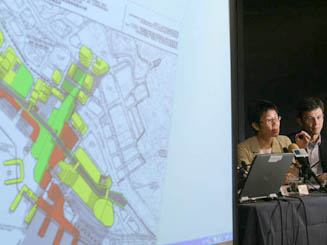 An urban planning
concern group has urged the government to rezone the Central waterfront to
improve the area's vibrancy and diversity. Designing Hong Kong, an alliance of
four individuals, has proposed fundamental changes to the government's zoning
plans for the Central waterfront. One of the four, Paul Zimmerman, said the
changes were based on a thorough study of different concern groups' opinions
over the past five years. "We are confident that the proposals have broad
support among many stakeholders," said Mr Zimmerman, convenor of Designing Hong
Kong Harbor District. Compared to the existing plans, the group has proposed
replacing big high-rises with smaller ones, for better views and air
ventilation, and introducing more developers to increase competition. It has
proposed extending the tram network to the waterfront and converting the Statue
Square "corridor" into a park, enabling the Star Ferry Clock Tower to be
returned to its original site. Other changes include reducing the width of the
major road across the area, as well as the maximum height of new buildings
between IFC and the ferry piers. The group also suggests turning half of the PLA
barracks into open space and moving the military berth 20 meters offshore to
free more harbourfront space. "We acknowledge that the proposals reduce the
overall gross floor area and premium income potential, and that the changes will
require the administration to revisit previous assumptions. However, this
short-term loss will be more than compensated for by the economic benefits of
the improved quality of life in the long term," said Mr Zimmerman. The group has
submitted its proposals to the Town Planning Board, which is scheduled to
discuss them in August. To further promote its idea, the group of four has
launched an international urban planning and design competition. Group member
Markus Shaw, chairman of the WWF in Hong Kong, said the design submissions were
expected to be innovative, yet practical and feasible, and had basically to be
based on the rezoning amendments put forward by the group. The submission
deadline is September 1 and the winners will receive HK$1 million in prize
money. In November, the winning entries will be proposed to the Planning
Department in support of the central reclamation urban design study the
department has been carrying out. An urban planning
concern group has urged the government to rezone the Central waterfront to
improve the area's vibrancy and diversity. Designing Hong Kong, an alliance of
four individuals, has proposed fundamental changes to the government's zoning
plans for the Central waterfront. One of the four, Paul Zimmerman, said the
changes were based on a thorough study of different concern groups' opinions
over the past five years. "We are confident that the proposals have broad
support among many stakeholders," said Mr Zimmerman, convenor of Designing Hong
Kong Harbor District. Compared to the existing plans, the group has proposed
replacing big high-rises with smaller ones, for better views and air
ventilation, and introducing more developers to increase competition. It has
proposed extending the tram network to the waterfront and converting the Statue
Square "corridor" into a park, enabling the Star Ferry Clock Tower to be
returned to its original site. Other changes include reducing the width of the
major road across the area, as well as the maximum height of new buildings
between IFC and the ferry piers. The group also suggests turning half of the PLA
barracks into open space and moving the military berth 20 meters offshore to
free more harbourfront space. "We acknowledge that the proposals reduce the
overall gross floor area and premium income potential, and that the changes will
require the administration to revisit previous assumptions. However, this
short-term loss will be more than compensated for by the economic benefits of
the improved quality of life in the long term," said Mr Zimmerman. The group has
submitted its proposals to the Town Planning Board, which is scheduled to
discuss them in August. To further promote its idea, the group of four has
launched an international urban planning and design competition. Group member
Markus Shaw, chairman of the WWF in Hong Kong, said the design submissions were
expected to be innovative, yet practical and feasible, and had basically to be
based on the rezoning amendments put forward by the group. The submission
deadline is September 1 and the winners will receive HK$1 million in prize
money. In November, the winning entries will be proposed to the Planning
Department in support of the central reclamation urban design study the
department has been carrying out.
 China: In
2006, the number of Chinese students studying abroad reached 134,000. Countries
are attracting students in different ways.
China: In
2006, the number of Chinese students studying abroad reached 134,000. Countries
are attracting students in different ways.
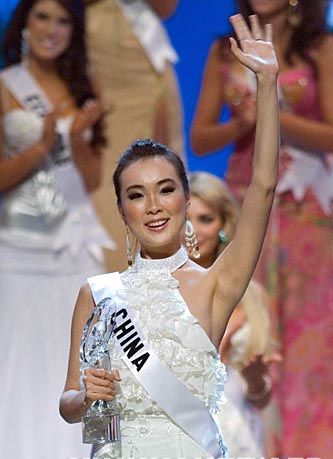 Ningning Zhang
waves after receiving the award as Miss Congeniality at the Miss Universe 2007
pageant at the National Auditorium in Mexico City May 28. Ningning Zhang
waves after receiving the award as Miss Congeniality at the Miss Universe 2007
pageant at the National Auditorium in Mexico City May 28.
China will raise the stamp tax on
securities trading from the current 0.1 percent to 0.3 percent beginning May 30,
the Ministry of Finance said Tuesday night. The Chinese stock market had a
"earthquake" today , caused by the stamp tax hike announced last night, and
failed to recover from the "one-shock" loss by closing time.
If the yuan rises by 5-10%, 3.5
million workers in non-agriculture sectors might lose their jobs and some 10
million farmers could be affected.
The World Bank raised its forecast
for China's economic growth this year to 10.4% from an earlier 9.6%.
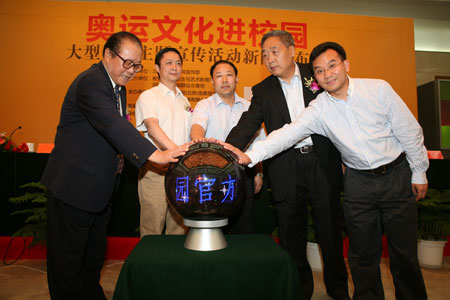 China's
leading web portal Sohu has opened a channel to bring college students'
attention to the Olympic Games. Based on the 28 Olympic sports, the website has
designed a number of delightful games entitled "Mini Olympics". Anyone who
registers with http://2008.sohu.com/campus can take part in the games and
interact through blogs.and other platforms. The website also provides the
students, numbering up to 20 million, an opportunity to make flash creations.
Classified in the drama and cartoon categories, the creations may display such
themes as Olympic charitable campaigns, host and co-host cities, messages to the
Olympics, the Olympics and my campus, and so on. From now on, subscribers can
upload their creations, which will go through appraisal of experts. The authors
of the final 20 entries will compete at the CCTV representation hall to produce
the top winner, who will be awarded a prize of 100,000 yuan. Under the auspices
of the Media and Communications Department of the Beijing Organizing Committee
for the Games of the XXIX Olympiad (BOCOG), the campaign was co-sponsored by the
Education Ministry, General Administration of Sport, and Sohu Company, internet
content services sponsor of the Beijing Olympic Games. "We run this campaign to
integrate the wisdom and passion of the students into the preparatory work for
the upcoming Olympics and inspire more people to spread the Olympic spirit,"
said Chen Luming, vice president of Sohu at the launching ceremony at the Great
Hall of the People on Tuesday. China's
leading web portal Sohu has opened a channel to bring college students'
attention to the Olympic Games. Based on the 28 Olympic sports, the website has
designed a number of delightful games entitled "Mini Olympics". Anyone who
registers with http://2008.sohu.com/campus can take part in the games and
interact through blogs.and other platforms. The website also provides the
students, numbering up to 20 million, an opportunity to make flash creations.
Classified in the drama and cartoon categories, the creations may display such
themes as Olympic charitable campaigns, host and co-host cities, messages to the
Olympics, the Olympics and my campus, and so on. From now on, subscribers can
upload their creations, which will go through appraisal of experts. The authors
of the final 20 entries will compete at the CCTV representation hall to produce
the top winner, who will be awarded a prize of 100,000 yuan. Under the auspices
of the Media and Communications Department of the Beijing Organizing Committee
for the Games of the XXIX Olympiad (BOCOG), the campaign was co-sponsored by the
Education Ministry, General Administration of Sport, and Sohu Company, internet
content services sponsor of the Beijing Olympic Games. "We run this campaign to
integrate the wisdom and passion of the students into the preparatory work for
the upcoming Olympics and inspire more people to spread the Olympic spirit,"
said Chen Luming, vice president of Sohu at the launching ceremony at the Great
Hall of the People on Tuesday.
Oil refiner China Petroleum &
Chemical Corp (0386), better known as Sinopec, got the green light from
shareholders Tuesday to issue 20 billion yuan (HK$20.45 billion) bonds to raise
capital for the Puguang gas field in Sichuan province.

*News information are obtained via various
sources deemed reliable, but not guaranteed

|
![]()
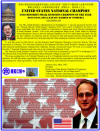 USA Small Business Administration (SBA)
Selected Johnson Choi/HKCHcc
2008 United States
National Champion
USA Small Business Administration (SBA)
Selected Johnson Choi/HKCHcc
2008 United States
National Champion![]()
![]() and follow us
on
and follow us
on
![]()

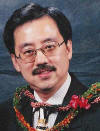
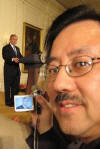
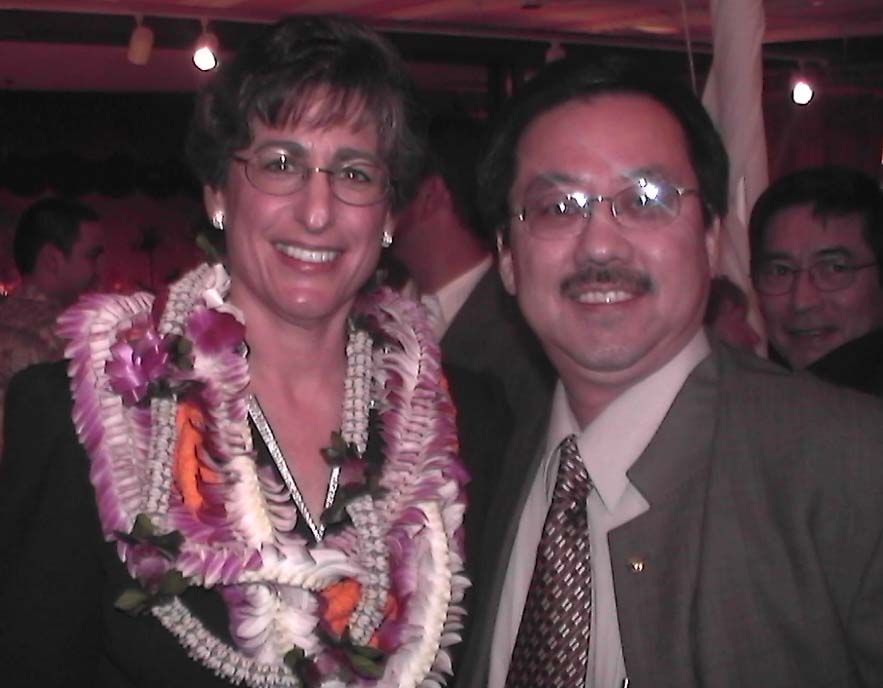
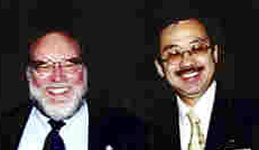
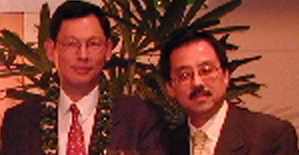
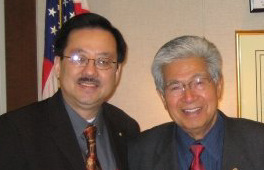


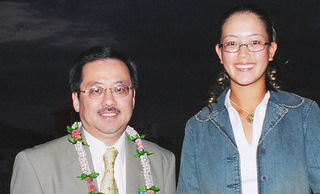
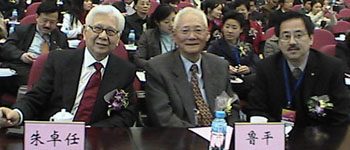
















 Chinese president Hu Jintao
Wednesday visits an exhibition in Beijing on Hong Kong's achievements in the
decade since its return. Hong Kong has remained as before a magnet since it
returned to China 10 years ago, and it will surely witness a "more splendid"
future in the embrace of the motherland, Chinese President Hu Jintao said
Wednesday.
Chinese president Hu Jintao
Wednesday visits an exhibition in Beijing on Hong Kong's achievements in the
decade since its return. Hong Kong has remained as before a magnet since it
returned to China 10 years ago, and it will surely witness a "more splendid"
future in the embrace of the motherland, Chinese President Hu Jintao said
Wednesday.

 Fashion retailer
Esprit Holdings Ltd, the best- performing stock in Hong Kong's benchmark index
in the past five years, plans to spend $1 billion to acquire an international
luxury brand by next year to boost sales of high-margin clothing. "I would like
to integrate such a brand as a better sister of Esprit and as a role model to
access good designers who normally wouldn't want to work for Esprit," Chief
Executive Officer Heinz Krogner said in Hong Kong. "It doesn't need to be a huge
company and it should not dilute earnings. We aim to buy knowledge of the luxury
segment, not revenue." A luxury brand may boost Hong Kong-based Esprit in
Europe, where it earns most of its revenue selling mass-market products such as
jeans for about 70 euros ($94) and T-shirts for 20 euros. Esprit sells clothes
in more than 40 nations and aims to open a new store, including franchised
outlets, every day in the year from July. "Buying a luxury brand makes sense
because Esprit wants to position itself in Germany at the higher end," said
Erica Poon Werkun, a Hong Kong-based analyst at UBS AG. "Although Esprit targets
the mass market, its products are more expensive than those of its competitors.'
Kroger has previously expressed interest in Donna Karan International Inc. LVMH
Moet Hennessy Louis Vuitton SA, the world's biggest luxury-goods company, bought
Donna Karan in 2001 for $243 million. Esprit's profit in the six months ended
Dec. 31 surged 28 percent to HK$2.4 billion ($307 million) on 25 percent more
sales from Europe. Of the Hang Seng Index's current 39 constituents, Esprit is
the best performing in the past 10 years. Since joining the benchmark in
December 2002, the company's shares have surged 1,660 percent.
Fashion retailer
Esprit Holdings Ltd, the best- performing stock in Hong Kong's benchmark index
in the past five years, plans to spend $1 billion to acquire an international
luxury brand by next year to boost sales of high-margin clothing. "I would like
to integrate such a brand as a better sister of Esprit and as a role model to
access good designers who normally wouldn't want to work for Esprit," Chief
Executive Officer Heinz Krogner said in Hong Kong. "It doesn't need to be a huge
company and it should not dilute earnings. We aim to buy knowledge of the luxury
segment, not revenue." A luxury brand may boost Hong Kong-based Esprit in
Europe, where it earns most of its revenue selling mass-market products such as
jeans for about 70 euros ($94) and T-shirts for 20 euros. Esprit sells clothes
in more than 40 nations and aims to open a new store, including franchised
outlets, every day in the year from July. "Buying a luxury brand makes sense
because Esprit wants to position itself in Germany at the higher end," said
Erica Poon Werkun, a Hong Kong-based analyst at UBS AG. "Although Esprit targets
the mass market, its products are more expensive than those of its competitors.'
Kroger has previously expressed interest in Donna Karan International Inc. LVMH
Moet Hennessy Louis Vuitton SA, the world's biggest luxury-goods company, bought
Donna Karan in 2001 for $243 million. Esprit's profit in the six months ended
Dec. 31 surged 28 percent to HK$2.4 billion ($307 million) on 25 percent more
sales from Europe. Of the Hang Seng Index's current 39 constituents, Esprit is
the best performing in the past 10 years. Since joining the benchmark in
December 2002, the company's shares have surged 1,660 percent.  China:
China:
 Beijing's
Silk Market (or Xiushui Street) recently expended almost 3 million Yuan (400,000
US dollars) from the "intellectual property rights (IPR) protection fund" to
dissuade 90 shops which may easily take part in infringement acts. This is to
ensure the quality of the top-notch specialized silk area. Picture displays an
old-fashioned brand shop in the Silk Market.
Beijing's
Silk Market (or Xiushui Street) recently expended almost 3 million Yuan (400,000
US dollars) from the "intellectual property rights (IPR) protection fund" to
dissuade 90 shops which may easily take part in infringement acts. This is to
ensure the quality of the top-notch specialized silk area. Picture displays an
old-fashioned brand shop in the Silk Market.
 A boy selects online game
software. China's online game market is seen growing 35% to hit $1.3 billion
this year amid strong growth in Internet users, launches of high-quality games
and yuan appreciation.
A boy selects online game
software. China's online game market is seen growing 35% to hit $1.3 billion
this year amid strong growth in Internet users, launches of high-quality games
and yuan appreciation.

 One of the thrills for visitors to Hong
Kong is one of its most popular sports--horse racing. Why does the sport hold
such a special place in the hearts of local residents? And how has horse racing
retained its characteristics over the many years? For over a century, horse
racing has thrilled Hong Kong people, providing first-class entertainment to a
highly enthusiastic public. Here at the Sha Tin race course, jockeys from
different countries are making the final preparations. With a seating capacity
of up to 85,000, Sha Tin is always packed during the race season. Mao Xuzhi, Sha
Tin racecourse, HK, said, "Gambling is illegal here in Hong Kong, except for
lotteries and horse racing. Their horse comes in first." This old punter, Mr.
Huo, has been betting on horses for over 3 decades. Like all his fellow punters
here, he enjoys studying the traits and performance of the horses. Mr. Huo says
he loves to watch the jockeys in action. Another horse racing fan, Mr. Lee, says
the sport has become a symbol of Hong Kong. That explains in part why
horse-racing has been a big industry for the past 150 years. Winfried
Engelbrecht-Bresges, CEO, the HK Jockey club, said, "Horse racing in Hong Kong
is a life style. People of HK are very competitive. They like things fast. They
like to be risky. Deng Xiaoping said horse-racing and dancing continue in HK.
This is definitely the way what has continued here." Behind these gambling-mad
crowds and the world-class horses and jockeys is the controller of all Hong Kong
horse racing, the Jockey Club. It's also the city's biggest tax payer and
charity donor. It gives about 1 billion Hong Kong dollars each year to
charitable causes. Thanks to the central government's commitment and support
after Hong Kong's return, the Jockey Club is still a winner after 10 years. And
it's convinced that Hong Kong's special system will provide a solid guarantee
for the future of the racing industry.
One of the thrills for visitors to Hong
Kong is one of its most popular sports--horse racing. Why does the sport hold
such a special place in the hearts of local residents? And how has horse racing
retained its characteristics over the many years? For over a century, horse
racing has thrilled Hong Kong people, providing first-class entertainment to a
highly enthusiastic public. Here at the Sha Tin race course, jockeys from
different countries are making the final preparations. With a seating capacity
of up to 85,000, Sha Tin is always packed during the race season. Mao Xuzhi, Sha
Tin racecourse, HK, said, "Gambling is illegal here in Hong Kong, except for
lotteries and horse racing. Their horse comes in first." This old punter, Mr.
Huo, has been betting on horses for over 3 decades. Like all his fellow punters
here, he enjoys studying the traits and performance of the horses. Mr. Huo says
he loves to watch the jockeys in action. Another horse racing fan, Mr. Lee, says
the sport has become a symbol of Hong Kong. That explains in part why
horse-racing has been a big industry for the past 150 years. Winfried
Engelbrecht-Bresges, CEO, the HK Jockey club, said, "Horse racing in Hong Kong
is a life style. People of HK are very competitive. They like things fast. They
like to be risky. Deng Xiaoping said horse-racing and dancing continue in HK.
This is definitely the way what has continued here." Behind these gambling-mad
crowds and the world-class horses and jockeys is the controller of all Hong Kong
horse racing, the Jockey Club. It's also the city's biggest tax payer and
charity donor. It gives about 1 billion Hong Kong dollars each year to
charitable causes. Thanks to the central government's commitment and support
after Hong Kong's return, the Jockey Club is still a winner after 10 years. And
it's convinced that Hong Kong's special system will provide a solid guarantee
for the future of the racing industry.  The first issuance of China's yuan-
denominated bonds in Hong Kong by China Development Bank will be available for
retail subscription starting today with the minimum investment set at HK$20,000.
As the coupon of the bonds is set at 3 percent - much higher than the typical
0.8 percent rate offered by local banks on yuan deposits - the response is
expected to be robust. The retail order book will be closed on July 6. Hong Kong
Monetary Authority chief executive Joseph Yam Chi-kwong said after the launch
ceremony Tuesday that the second issuance of yuan bonds may come soon. "The
management arrangement for issuing yuan bonds in Hong Kong by mainland financial
institutions is already in place. There is actually nothing to stop them from
coming," Yam told reporters. The Export-Import Bank of China, a fully
government-owned policy bank under the direct leadership of the State Council,
is believed to be the second mainland financial institution preparing to issue
yuan bonds in Hong Kong. The bank said earlier its board had approved the
issuance, and will proceed with the sale here after obtaining approval from the
People's Bank of China.
The first issuance of China's yuan-
denominated bonds in Hong Kong by China Development Bank will be available for
retail subscription starting today with the minimum investment set at HK$20,000.
As the coupon of the bonds is set at 3 percent - much higher than the typical
0.8 percent rate offered by local banks on yuan deposits - the response is
expected to be robust. The retail order book will be closed on July 6. Hong Kong
Monetary Authority chief executive Joseph Yam Chi-kwong said after the launch
ceremony Tuesday that the second issuance of yuan bonds may come soon. "The
management arrangement for issuing yuan bonds in Hong Kong by mainland financial
institutions is already in place. There is actually nothing to stop them from
coming," Yam told reporters. The Export-Import Bank of China, a fully
government-owned policy bank under the direct leadership of the State Council,
is believed to be the second mainland financial institution preparing to issue
yuan bonds in Hong Kong. The bank said earlier its board had approved the
issuance, and will proceed with the sale here after obtaining approval from the
People's Bank of China. 
 A
self-controlled train moves for a test run as it makes its debut at the Beijing
Capital Airport in Beijing, June 26, 2007. The passenger train will be running
between terminals of the airport after the third terminal is put to use before
the Olympic Games.
A
self-controlled train moves for a test run as it makes its debut at the Beijing
Capital Airport in Beijing, June 26, 2007. The passenger train will be running
between terminals of the airport after the third terminal is put to use before
the Olympic Games. China's Yan Zi gestures
during her singles match against Italy's Tathiana Garbin at the Wimbledon tennis
championships in London June 27, 2007.
China's Yan Zi gestures
during her singles match against Italy's Tathiana Garbin at the Wimbledon tennis
championships in London June 27, 2007. Theme song for Chow's
"Secret" debuts earlier than film - Taiwan pop king Jay Chow (L) promotes his
directorial debut "Secret Cannot Be Told" with his lead actress Guey Lun-mei.
Although the post-production work on pop king Jay Chow's directorial debut,
"Secret", is yet to be finished, the themed song of the film has been scheduled
for release in Asia on Thursday. The Beijing News reported on Wednesday. Chow's
long-time partner Vincent Fang took charge of the lyrics for the song, which has
been described by Chow as "a shining point" of the film. According to Chow, this
time he tried to emulate Britpop in composing the song - quite a different
approach from his other film music hits, such as "Ju Hua Tai", the theme song of
"Curse of Golden Flower" and another song he made for Jet Li's kungfu film "Huo
Yuan Jia".
Theme song for Chow's
"Secret" debuts earlier than film - Taiwan pop king Jay Chow (L) promotes his
directorial debut "Secret Cannot Be Told" with his lead actress Guey Lun-mei.
Although the post-production work on pop king Jay Chow's directorial debut,
"Secret", is yet to be finished, the themed song of the film has been scheduled
for release in Asia on Thursday. The Beijing News reported on Wednesday. Chow's
long-time partner Vincent Fang took charge of the lyrics for the song, which has
been described by Chow as "a shining point" of the film. According to Chow, this
time he tried to emulate Britpop in composing the song - quite a different
approach from his other film music hits, such as "Ju Hua Tai", the theme song of
"Curse of Golden Flower" and another song he made for Jet Li's kungfu film "Huo
Yuan Jia". Hollywood legend
Robert DeNiro, seen here in 2006, is the co-founder of the Tribeca film festival
which is heading to China despite strict movie censorship in the communist
nation. The Tribeca film festival, co-founded by Hollywood legend Robert DeNiro,
is heading to China next month despite strict movie censorship in the communist
nation. The festival, which was set up in New York in 2002 as a response to the
previous year's September 11 World Trade Center attacks, will appear in
Beijing's artistic 798 quarter on July 10-11, Xinhua news agency said. The
festival hopes to promote independent US and Chinese films, organisers said.
"With films from China having played a major role in the Tribeca Film Festival's
first six years -- and having won several of our major awards in the bargain --
we're happy to begin this new international collaboration," said Peter Scarlet,
artistic director of the Tribeca Film Festival. Tribeca has screened 18
feature-length and short films from Chinese filmmakers since 2002, four of which
have scooped festival awards, Xinhua said. The Beijing edition will open with an
outdoor screening of Planet B-Boy, a documentary by Korean-American director
Benson Lee about the resurgence of break-dancing. "Never in my wildest dreams
could I have predicted that we would be showing Planet B-boy to an audience of
7,000 people... at the World Trade Center area, let alone at another outdoor
screening on the other side of the world in Beijing," said Lee, according to
Xinhua. Tribeca, named after the area of New York where it is based, was set up
by De Niro, producer Jane Rosenthal and philanthropist Craig Hatkoff to try to
help breathe life back into the downtown area following the 2001 attacks. In
China, foreign and domestic movies often suffer at the hands of the government's
censors. Only a handful of international films make it to national distribution
each year, and those that do are often cut. China's film censors recently cut
out large sections of the latest "Pirates of the Caribbean" film, cutting in
half actor Chow Yun-Fat's role because it allegedly humiliated the Chinese
people. The Oscar-winning "The Departed" faced a ban on the mainland this year.
Hollywood legend
Robert DeNiro, seen here in 2006, is the co-founder of the Tribeca film festival
which is heading to China despite strict movie censorship in the communist
nation. The Tribeca film festival, co-founded by Hollywood legend Robert DeNiro,
is heading to China next month despite strict movie censorship in the communist
nation. The festival, which was set up in New York in 2002 as a response to the
previous year's September 11 World Trade Center attacks, will appear in
Beijing's artistic 798 quarter on July 10-11, Xinhua news agency said. The
festival hopes to promote independent US and Chinese films, organisers said.
"With films from China having played a major role in the Tribeca Film Festival's
first six years -- and having won several of our major awards in the bargain --
we're happy to begin this new international collaboration," said Peter Scarlet,
artistic director of the Tribeca Film Festival. Tribeca has screened 18
feature-length and short films from Chinese filmmakers since 2002, four of which
have scooped festival awards, Xinhua said. The Beijing edition will open with an
outdoor screening of Planet B-Boy, a documentary by Korean-American director
Benson Lee about the resurgence of break-dancing. "Never in my wildest dreams
could I have predicted that we would be showing Planet B-boy to an audience of
7,000 people... at the World Trade Center area, let alone at another outdoor
screening on the other side of the world in Beijing," said Lee, according to
Xinhua. Tribeca, named after the area of New York where it is based, was set up
by De Niro, producer Jane Rosenthal and philanthropist Craig Hatkoff to try to
help breathe life back into the downtown area following the 2001 attacks. In
China, foreign and domestic movies often suffer at the hands of the government's
censors. Only a handful of international films make it to national distribution
each year, and those that do are often cut. China's film censors recently cut
out large sections of the latest "Pirates of the Caribbean" film, cutting in
half actor Chow Yun-Fat's role because it allegedly humiliated the Chinese
people. The Oscar-winning "The Departed" faced a ban on the mainland this year.
 Hong Kong the best business partner
for Vietnam enterprises - Hong Kong is Vietnam's best partner for capturing
business opportunities arising from the country's recent accession to the World
Trade Organization, Mr Peter Woo, chairman of the Hong Kong Trade Development
Council, told more than 200 business executives in Ho Chi Minh City today. Mr.
Woo, who is leading a 17-member Hong Kong business delegation to Vietnam, said
that Hong Kong is an ideal conduit for Vietnamese businesses. Through Hong Kong,
they can get all the services support and contacts they need to connect with
world markets. The TDC delegation visited Hanoi, the Vietnamese capital, on
Monday and Tuesday before going on to Ho Chi Minh City. In Hanoi, the delegation
met with the Vietnamese Prime Minister, Mr. Nguyen Tan Dung, who welcomed Hong
Kong businesses to invest in Vietnam. Mr. Nguyen said that overseas investment
was an integral component of Vietnam's economic development. He added that his
government would provide favorable conditions to help Hong Kong investors do
more business in the country, particularly in the financial, banking, insurance,
securities, shipping and manufacturing sectors. The Prime Minister also agreed
that Hong Kong has the infrastructure, as well as the international experience
and contacts, to serve as a useful platform for Vietnamese companies looking to
connect with world markets. Earlier, the delegation was briefed by Minister of
Trade Mr Truong Dinh Tuyen and Vice-minister of Planning and Investment Mr
Nguyen Bich Dat on the latest developments in Vietnam, including laws recently
introduced to create a more effective business environment in the country.
Hong Kong the best business partner
for Vietnam enterprises - Hong Kong is Vietnam's best partner for capturing
business opportunities arising from the country's recent accession to the World
Trade Organization, Mr Peter Woo, chairman of the Hong Kong Trade Development
Council, told more than 200 business executives in Ho Chi Minh City today. Mr.
Woo, who is leading a 17-member Hong Kong business delegation to Vietnam, said
that Hong Kong is an ideal conduit for Vietnamese businesses. Through Hong Kong,
they can get all the services support and contacts they need to connect with
world markets. The TDC delegation visited Hanoi, the Vietnamese capital, on
Monday and Tuesday before going on to Ho Chi Minh City. In Hanoi, the delegation
met with the Vietnamese Prime Minister, Mr. Nguyen Tan Dung, who welcomed Hong
Kong businesses to invest in Vietnam. Mr. Nguyen said that overseas investment
was an integral component of Vietnam's economic development. He added that his
government would provide favorable conditions to help Hong Kong investors do
more business in the country, particularly in the financial, banking, insurance,
securities, shipping and manufacturing sectors. The Prime Minister also agreed
that Hong Kong has the infrastructure, as well as the international experience
and contacts, to serve as a useful platform for Vietnamese companies looking to
connect with world markets. Earlier, the delegation was briefed by Minister of
Trade Mr Truong Dinh Tuyen and Vice-minister of Planning and Investment Mr
Nguyen Bich Dat on the latest developments in Vietnam, including laws recently
introduced to create a more effective business environment in the country. M & A activity heats up in China -
Mergers and acquisitions in China has soared to a record high in the first half
of this year demonstrating the Mainland's budding affinity with investors and
bankers. According to Thomson Financial, M & A deals have witnessed a surge in
58.3% to US$39.1 billion, slightly more as compared to the second half of last
year. Despite a busy launch, the M&As in the first half of 2007 is still lagging
behind its highest ever semi-annual figures of US$44.7 billion that was
witnessed in the second half of 2000. Violet Chung, a senior portfolio manager
at Pacific Capital Management, speculated that the M&A rise and fall cycle will
be powered by a combination of low interest rates, especially in Japan, as well
as high liquidity. A combination of factors such as a thriving stock market and
a clamor for stakes in Chinese firms have made China into Asia's most dazzling
platform for investment banking. China also radiates a growing allure for share
sales, trailing behind the U.S. in global equity issuance in the first half of
this year. Some of the largest money-making deals this year include the Rowsley
purchase of solar energy company Perfect Field Investment, the Chinese
government's US$3 billion investment in Blackstone Group as well as Dongfang
Electrical Machine's US$2.8 billion offer for Dongfang Boiler. Marco Mak, the
head of research at Taifook Securities, expressed confidence that the situation
would remain upbeat for as long as companies are still in the process of
restructuring and purchasing assets from parent firms. It is revealed that the
technology sector is a haven for foreign investors, while the preferences of
Mainland companies lie with foreign operations in the business sector. Mainland
companies are also scrambling for IPOs. China CITIC Bank Corp's US$5.9 billion
dual listing in Hong Kong and Shanghai was the world's second-largest initial
public offering so far this year. This has propelled China to own 15.2% share of
the global market, runner-up to the US in terms of IPO activity. To top it off,
an icing on the cake is the number of Mainland firms going public on U.S.
exchanges. With 10 companies raising US$2.2 billion on the New York Stock
Exchange and Nasdaq Stock Market, a new record high has been set, doubling last
year's full-year total.
M & A activity heats up in China -
Mergers and acquisitions in China has soared to a record high in the first half
of this year demonstrating the Mainland's budding affinity with investors and
bankers. According to Thomson Financial, M & A deals have witnessed a surge in
58.3% to US$39.1 billion, slightly more as compared to the second half of last
year. Despite a busy launch, the M&As in the first half of 2007 is still lagging
behind its highest ever semi-annual figures of US$44.7 billion that was
witnessed in the second half of 2000. Violet Chung, a senior portfolio manager
at Pacific Capital Management, speculated that the M&A rise and fall cycle will
be powered by a combination of low interest rates, especially in Japan, as well
as high liquidity. A combination of factors such as a thriving stock market and
a clamor for stakes in Chinese firms have made China into Asia's most dazzling
platform for investment banking. China also radiates a growing allure for share
sales, trailing behind the U.S. in global equity issuance in the first half of
this year. Some of the largest money-making deals this year include the Rowsley
purchase of solar energy company Perfect Field Investment, the Chinese
government's US$3 billion investment in Blackstone Group as well as Dongfang
Electrical Machine's US$2.8 billion offer for Dongfang Boiler. Marco Mak, the
head of research at Taifook Securities, expressed confidence that the situation
would remain upbeat for as long as companies are still in the process of
restructuring and purchasing assets from parent firms. It is revealed that the
technology sector is a haven for foreign investors, while the preferences of
Mainland companies lie with foreign operations in the business sector. Mainland
companies are also scrambling for IPOs. China CITIC Bank Corp's US$5.9 billion
dual listing in Hong Kong and Shanghai was the world's second-largest initial
public offering so far this year. This has propelled China to own 15.2% share of
the global market, runner-up to the US in terms of IPO activity. To top it off,
an icing on the cake is the number of Mainland firms going public on U.S.
exchanges. With 10 companies raising US$2.2 billion on the New York Stock
Exchange and Nasdaq Stock Market, a new record high has been set, doubling last
year's full-year total. Regulator to ease
limits on domestic investments to HK - The China Banking Regulatory Commission
will soon relax existing regulations on overseas investments by domestic
investors, The Standard reported Monday, citing a mainland source. The Standard,
citing the source, said the mainland regulator will soon allow domestic
investors to invest about 70 percent of their funds in Hong Kong stocks, up from
the current limit of 50 percent, under the Qualified Domestic Institutional
Investor (QDII) program. Hong Kong is so far the only market approved for
overseas investments under the QDII scheme. The minimum amount of money required
for an investor to buy a product under the program will drop to less than
100,000 yuan (US$13,130) and could be as low as 10,000 yuan, the newspaper said.
The new minimum investment represents a dramatic drop from the previous entry
fee of 300,000 yuan for a single investment, it said. There have been
discussions to allow trust funds to be included in the scheme, the source told
the newspaper, without specifying the parties involved in the talks.
Regulator to ease
limits on domestic investments to HK - The China Banking Regulatory Commission
will soon relax existing regulations on overseas investments by domestic
investors, The Standard reported Monday, citing a mainland source. The Standard,
citing the source, said the mainland regulator will soon allow domestic
investors to invest about 70 percent of their funds in Hong Kong stocks, up from
the current limit of 50 percent, under the Qualified Domestic Institutional
Investor (QDII) program. Hong Kong is so far the only market approved for
overseas investments under the QDII scheme. The minimum amount of money required
for an investor to buy a product under the program will drop to less than
100,000 yuan (US$13,130) and could be as low as 10,000 yuan, the newspaper said.
The new minimum investment represents a dramatic drop from the previous entry
fee of 300,000 yuan for a single investment, it said. There have been
discussions to allow trust funds to be included in the scheme, the source told
the newspaper, without specifying the parties involved in the talks. Hospital
Authority chief executive Shane Solomon has apologized and retracted comments he
made hours earlier accusing frontline doctors and their unions of leaking
information on medical mishaps to bolster their demands for better pay. After
attending Monday's meeting of the Legislative Council's health services panel,
Solomon said: "I think the political purpose is to put pressure on the Hospital
Authority and say that we have a crisis in medical staffing." His comments
provoked an outcry from a legislator as well as the Frontline Doctors' Union,
forcing him to backtrack. "I would like to apologize for the confusion and
frustration that may have been caused to the parties concerned with my remarks
made after the health services panel this morning," he said. "I'd like to
clarify that the political motives which I mentioned were totally unrelated to
the recent request for salary adjustment by Hospital Authority doctors and their
unions. As these remarks may have created concerns on the legitimacy of their
intention and recent actions, I've decided to withdraw them."
Hospital
Authority chief executive Shane Solomon has apologized and retracted comments he
made hours earlier accusing frontline doctors and their unions of leaking
information on medical mishaps to bolster their demands for better pay. After
attending Monday's meeting of the Legislative Council's health services panel,
Solomon said: "I think the political purpose is to put pressure on the Hospital
Authority and say that we have a crisis in medical staffing." His comments
provoked an outcry from a legislator as well as the Frontline Doctors' Union,
forcing him to backtrack. "I would like to apologize for the confusion and
frustration that may have been caused to the parties concerned with my remarks
made after the health services panel this morning," he said. "I'd like to
clarify that the political motives which I mentioned were totally unrelated to
the recent request for salary adjustment by Hospital Authority doctors and their
unions. As these remarks may have created concerns on the legitimacy of their
intention and recent actions, I've decided to withdraw them." The controversy
over the Hong Kong Institute of Education has taken a fresh twist, with its
ruling council ordering Paul Morris to go on immediate leave as its president,
and deciding not to keep him on as a teacher when his term ends in September.
The council said yesterday's decision to send him on leave would enable the
institute to "turn a new leaf". Professor Morris condemned it as unnecessary.
Lawmakers, staff and student representatives called it unreasonable and
irrational. Some lawmakers called it revenge for his part in the recent
commission of inquiry into interference in the institute's autonomy, whose
findings led former chief education civil servant Fanny Law Fan Chiu-fun to quit
as anti-graft chief. Professor Morris said a council subcommittee had issued a
directive saying: "With the president becoming a central character in the
committee of inquiry, the committee has requested that the president be directed
to take leave immediately and that he be directed not to make any public
statement in relation to the HKIEd while on leave." He said: "I hope this
decision doesn't send the wrong message to the academic community about the
value the council places on academic freedom." The institute's ruling council
made the decision at a meeting to discuss whether or not to offer Professor
Morris a four-year professorship at the end of his term as president in
September. The body, which is dominated by political appointees, voted 13 to
five against offering him the job. Council vice-chairman Eddie Ng Hak-kim said
Professor Morris had been sent on leave to allow a new management team to take
over as soon as possible. Academic vice-president Lee Wing-on will serve as
acting president. Mr Ng said the professor's contract stated he would be offered
a professorship until 2011 if his performance as president was satisfactory.
Council members felt there was some room for improvement in the president's
performance, but said individual members had their own reasons for the decision.
Speaking in a personal capacity as he was about to fly to Britain, Professor
Morris said he was surprised the subcommittee set up to review the inquiry
findings had come to the conclusion he should be sent on immediate leave and not
be allowed to make any public statements.
The controversy
over the Hong Kong Institute of Education has taken a fresh twist, with its
ruling council ordering Paul Morris to go on immediate leave as its president,
and deciding not to keep him on as a teacher when his term ends in September.
The council said yesterday's decision to send him on leave would enable the
institute to "turn a new leaf". Professor Morris condemned it as unnecessary.
Lawmakers, staff and student representatives called it unreasonable and
irrational. Some lawmakers called it revenge for his part in the recent
commission of inquiry into interference in the institute's autonomy, whose
findings led former chief education civil servant Fanny Law Fan Chiu-fun to quit
as anti-graft chief. Professor Morris said a council subcommittee had issued a
directive saying: "With the president becoming a central character in the
committee of inquiry, the committee has requested that the president be directed
to take leave immediately and that he be directed not to make any public
statement in relation to the HKIEd while on leave." He said: "I hope this
decision doesn't send the wrong message to the academic community about the
value the council places on academic freedom." The institute's ruling council
made the decision at a meeting to discuss whether or not to offer Professor
Morris a four-year professorship at the end of his term as president in
September. The body, which is dominated by political appointees, voted 13 to
five against offering him the job. Council vice-chairman Eddie Ng Hak-kim said
Professor Morris had been sent on leave to allow a new management team to take
over as soon as possible. Academic vice-president Lee Wing-on will serve as
acting president. Mr Ng said the professor's contract stated he would be offered
a professorship until 2011 if his performance as president was satisfactory.
Council members felt there was some room for improvement in the president's
performance, but said individual members had their own reasons for the decision.
Speaking in a personal capacity as he was about to fly to Britain, Professor
Morris said he was surprised the subcommittee set up to review the inquiry
findings had come to the conclusion he should be sent on immediate leave and not
be allowed to make any public statements. 

 Hainan Eld's Deer are seen at a natural reserve in South China's Hainan
Province, June 1, 2007. Population of this species has
increased from bottom 26 to 1,785 in
efforts of the local government to protect wild animals.
Hainan Eld's Deer are seen at a natural reserve in South China's Hainan
Province, June 1, 2007. Population of this species has
increased from bottom 26 to 1,785 in
efforts of the local government to protect wild animals.
 Alibaba.com, China's largest online business-to-business
(B2B) marketplace for global and domestic trade, plans what could be a $1
billion share sale in Hong Kong to help fuel growth, sources said. The company,
a subsidiary of the Alibaba Group and 40 percent owned by Yahoo, picked Hong
Kong over the New York and London stock markets for what would be the biggest
initial public offering for a mainland Internet company. Investment banks
Goldman Sachs and Morgan Stanley are arranging the impending public offering.
Alibaba.com, China's largest online business-to-business
(B2B) marketplace for global and domestic trade, plans what could be a $1
billion share sale in Hong Kong to help fuel growth, sources said. The company,
a subsidiary of the Alibaba Group and 40 percent owned by Yahoo, picked Hong
Kong over the New York and London stock markets for what would be the biggest
initial public offering for a mainland Internet company. Investment banks
Goldman Sachs and Morgan Stanley are arranging the impending public offering.
 Bottles of milk exhibited at the World Dairy Expo & Summit/China 07 in Nanjing,
Jiangsu Province June 21-23. China ranks 3rd after India and the United States
in the production of dairy products in 2006.
Bottles of milk exhibited at the World Dairy Expo & Summit/China 07 in Nanjing,
Jiangsu Province June 21-23. China ranks 3rd after India and the United States
in the production of dairy products in 2006. Customers dressed in the traditional Han
costumes have fun at a Han culture-themed restaurat in Beijing June 25, 2006.
The Han culture has become a hit in the capital.
Customers dressed in the traditional Han
costumes have fun at a Han culture-themed restaurat in Beijing June 25, 2006.
The Han culture has become a hit in the capital. Teahouses become especially popular in the summer, as drinking tea can help you
beat the heat. In China, tea is a traditional drink, that's not only good for
your health but also can also cultivate your mind. Teahouses become especially
popular in the summer, as drinking tea can help you beat the heat.
Teahouses become especially popular in the summer, as drinking tea can help you
beat the heat. In China, tea is a traditional drink, that's not only good for
your health but also can also cultivate your mind. Teahouses become especially
popular in the summer, as drinking tea can help you beat the heat. Wu Jingguo, chairman of Chinese Taipei
Olympic Committee (CTOC), said he would let Taipei deal with the controversial
torch relay issue after Beijing Games organizers restated their firm standing on
the plan.
Wu Jingguo, chairman of Chinese Taipei
Olympic Committee (CTOC), said he would let Taipei deal with the controversial
torch relay issue after Beijing Games organizers restated their firm standing on
the plan.



 Hong Kong's largest
painting was unveiled yesterday to mark the 10th anniversary of the handover.
Measuring 7.1 metres by 2.8 metres, Halcyon Days Pearl is seen as a sister work
to Festive Day, another epic oil painting that fetched HK$23 million in 1997 -
then a record for contemporary Chinese art. The painting features state leaders
and Hong Kong's movers and shakers. It was painted by renowned artist Liu Yuyi
and his daughter, Liu Haomei. At the heart of the painting is President Hu
Jintao , who is handing a huge pearl to Chief Executive Donald Tsang Yam-kuen as
other state leaders and top Hong Kong officials look on. "Festive Day was more
solemnly themed when people still held doubts about Hong Kong's future," said
Liu. "Now Pearl has harmony and happiness in the air." He said he included
people of different political views. Near the edge of the painting stand such
figures as Cardinal Joseph Zen Ze-kiun, former chief secretary Anson Chan Fang
On-sang and Civic Party legislator Alan Leong Kah-kit. Tycoons Li Ka-shing and
Stanley Ho Hung-sun were among the closest to the state leaders in the canvas.
Some key members of the Democratic Alliance for the Betterment and Progress of
Hong Kong and the Liberal Party were also close to the action. Liu, who has
lived in Hong Kong since 1991, said he had not yet decided whether to auction
the painting, although some interested buyers had contacted him in recent days.
"I may just give it to the state," he said. "And I don't rule out the
possibility of giving it to the Hong Kong government." In the background of the
painting are Hong Kong's landmark skyscrapers and tourist attractions. Mount
Everest sits in the deeper background to symbolise the support of the mainland.
Hong Kong's largest
painting was unveiled yesterday to mark the 10th anniversary of the handover.
Measuring 7.1 metres by 2.8 metres, Halcyon Days Pearl is seen as a sister work
to Festive Day, another epic oil painting that fetched HK$23 million in 1997 -
then a record for contemporary Chinese art. The painting features state leaders
and Hong Kong's movers and shakers. It was painted by renowned artist Liu Yuyi
and his daughter, Liu Haomei. At the heart of the painting is President Hu
Jintao , who is handing a huge pearl to Chief Executive Donald Tsang Yam-kuen as
other state leaders and top Hong Kong officials look on. "Festive Day was more
solemnly themed when people still held doubts about Hong Kong's future," said
Liu. "Now Pearl has harmony and happiness in the air." He said he included
people of different political views. Near the edge of the painting stand such
figures as Cardinal Joseph Zen Ze-kiun, former chief secretary Anson Chan Fang
On-sang and Civic Party legislator Alan Leong Kah-kit. Tycoons Li Ka-shing and
Stanley Ho Hung-sun were among the closest to the state leaders in the canvas.
Some key members of the Democratic Alliance for the Betterment and Progress of
Hong Kong and the Liberal Party were also close to the action. Liu, who has
lived in Hong Kong since 1991, said he had not yet decided whether to auction
the painting, although some interested buyers had contacted him in recent days.
"I may just give it to the state," he said. "And I don't rule out the
possibility of giving it to the Hong Kong government." In the background of the
painting are Hong Kong's landmark skyscrapers and tourist attractions. Mount
Everest sits in the deeper background to symbolise the support of the mainland.

 China encourages
share-holding reform for some of its weapons makers in a bid to expand financial
and technical support, according to the recently issued government guidelines.
China encourages
share-holding reform for some of its weapons makers in a bid to expand financial
and technical support, according to the recently issued government guidelines. BOCOG vice
president Jiang Xiaoyu talks to media on Saturday. Beijing insists that Taiwan
will only be included in the 2008 Olympic torch relay under the terms of the
written agreement reached with the island's Olympic Committee earlier this year.
When the route was announced in late April, the Taiwan government said it could
not accept the torch because Taipei's position on the relay -- after Ho Chi Minh
City and before Hong Kong. The inclusion of Taiwan is important to the Beijing
government, but hopes of a negotiated compromise look bleak. "As far as BOCOG is
concerned, the passing of the Olympic flame through Taipei has been defined by
BOCOG and the Chinese Taipei Olympic Committee," Jiang Xiaoyu, executive vice
president of the Beijing Organising Committee for the Olympic Games (BOCOG),
told a news conference on Saturday. "We hope they will stay free from artificial
factors and return to the written agreement made by both sides, and validated by
the International Olympic Committee. "If the CTOC can return to the agreement
already made, the selection of the 120 torch bearers for Taipei will kick off
after that." Jiang would not say whether BOCOG would consider negotiations with
Taipei but an approach from the other side of the Taiwan strait looks unlikely.
A spokeswoman for the Taiwan government Mainland Affairs Council said this week
that BOCOG had described Taiwan as "China Taiwan" on its official Web site, not
the Olympic name "Chinese Taipei". Although it had been changed back, the usage
was picked up by the Chinese media and Taiwan was waiting for Beijing to suggest
renegotiating the torch route "to express sincerity", the spokeswoman said. The
130-day, 137,000km torch relay, due to stop over in Taipei in late April 2008,
will require 21,880 torch bearers, organisers said on Saturday. The Games start
next August.
BOCOG vice
president Jiang Xiaoyu talks to media on Saturday. Beijing insists that Taiwan
will only be included in the 2008 Olympic torch relay under the terms of the
written agreement reached with the island's Olympic Committee earlier this year.
When the route was announced in late April, the Taiwan government said it could
not accept the torch because Taipei's position on the relay -- after Ho Chi Minh
City and before Hong Kong. The inclusion of Taiwan is important to the Beijing
government, but hopes of a negotiated compromise look bleak. "As far as BOCOG is
concerned, the passing of the Olympic flame through Taipei has been defined by
BOCOG and the Chinese Taipei Olympic Committee," Jiang Xiaoyu, executive vice
president of the Beijing Organising Committee for the Olympic Games (BOCOG),
told a news conference on Saturday. "We hope they will stay free from artificial
factors and return to the written agreement made by both sides, and validated by
the International Olympic Committee. "If the CTOC can return to the agreement
already made, the selection of the 120 torch bearers for Taipei will kick off
after that." Jiang would not say whether BOCOG would consider negotiations with
Taipei but an approach from the other side of the Taiwan strait looks unlikely.
A spokeswoman for the Taiwan government Mainland Affairs Council said this week
that BOCOG had described Taiwan as "China Taiwan" on its official Web site, not
the Olympic name "Chinese Taipei". Although it had been changed back, the usage
was picked up by the Chinese media and Taiwan was waiting for Beijing to suggest
renegotiating the torch route "to express sincerity", the spokeswoman said. The
130-day, 137,000km torch relay, due to stop over in Taipei in late April 2008,
will require 21,880 torch bearers, organisers said on Saturday. The Games start
next August. Chen Tonghai,
chairman of China Petroleum & Chemical Corp (0386), better known as Sinopec, and
president of parent Sinopec Group, surprised the market by resigning from the
positions with immediate effect. The news was announced in an unusual manner by
the State-owned Assets Supervision and Administration Commission, not by the
company itself, and without giving exact reasons. In Beijing, rumors were rife
that Chen has been detained, having "seriously violated party discipline." Web
site NetEase 163 Friday said "Chen has resigned due to seriously violating party
discipline, and will be replaced by SASAC Liaoning employee Su Shulin." Sinopec,
Asia's largest oil refiner, said: "Chen Tonghai has resigned as a director and
chairman of the board of Sinopec for personal reasons, with effect from June
22." Sinopec did not elaborate on what the "personal reasons" were, and the
spokesman for the company could not be reached for comment. Chen, 58, was
appointed chairman in April 2003, and has been president of Sinopec Group since
March 2003, according to Sinopec's Web site. Vice chairman Zhou Yuan will be
acting chairman until a replacement is elected. Su was appointed deputy general
manager of China National Petroleum Corp - China's largest oil and gas producer
- after explosion disasters at the Jilin chemical plant in 2005. After quitting
his position with PetroChina (0857) last year, Su served as a party organizing
chief in Liaoning province. Supported by robust economic growth in the mainland,
together with the soaring demand for oil and oil products, shares of Sinopec
have gained 25 percent this year, outpacing an 8.32 percent rise in the
benchmark Hang Seng Index. Sinopec shares closed Friday at HK$9.05, a drop of
1.42 percent, before the announcement of Chen's resignation.
Chen Tonghai,
chairman of China Petroleum & Chemical Corp (0386), better known as Sinopec, and
president of parent Sinopec Group, surprised the market by resigning from the
positions with immediate effect. The news was announced in an unusual manner by
the State-owned Assets Supervision and Administration Commission, not by the
company itself, and without giving exact reasons. In Beijing, rumors were rife
that Chen has been detained, having "seriously violated party discipline." Web
site NetEase 163 Friday said "Chen has resigned due to seriously violating party
discipline, and will be replaced by SASAC Liaoning employee Su Shulin." Sinopec,
Asia's largest oil refiner, said: "Chen Tonghai has resigned as a director and
chairman of the board of Sinopec for personal reasons, with effect from June
22." Sinopec did not elaborate on what the "personal reasons" were, and the
spokesman for the company could not be reached for comment. Chen, 58, was
appointed chairman in April 2003, and has been president of Sinopec Group since
March 2003, according to Sinopec's Web site. Vice chairman Zhou Yuan will be
acting chairman until a replacement is elected. Su was appointed deputy general
manager of China National Petroleum Corp - China's largest oil and gas producer
- after explosion disasters at the Jilin chemical plant in 2005. After quitting
his position with PetroChina (0857) last year, Su served as a party organizing
chief in Liaoning province. Supported by robust economic growth in the mainland,
together with the soaring demand for oil and oil products, shares of Sinopec
have gained 25 percent this year, outpacing an 8.32 percent rise in the
benchmark Hang Seng Index. Sinopec shares closed Friday at HK$9.05, a drop of
1.42 percent, before the announcement of Chen's resignation.  "I'm very confident in Hong Kong's promising future under the principle of 'one
country, two systems' created by Deng Xiaoping with his foresight and sagacity
and my belief in Hong Kong's future will never change," tycoon Li Ka-shing said.
Recalling the ten years of Hong Kong's return to its motherland, Li Ka-shing, a
local grown legend and a world famous tycoon, perhaps is the best example of
Hong Kong dream. His secret of making fortunes, as hundreds of his stories tell,
is hard work plus deeply connecting his roots with the fortune of Hong Kong.
Looking back the decade, Li's rule of belief in Hong Kong's future again has
done its magic. As the chairman for both Cheung Kong Holdings and Hutchison
Whampoa, Li has an empire of 240,000 staff, operating business in 55 countries
and regions. His business is fast growing during the decade and the way to his
enlarging riches is still his unshakable belief in Hong Kong. When some Hong
Kong people worried about the return and fled away, Li just kept his hope in
Hong Kong as always. Hong Kong's return to the motherland is a great achievement
of the principle of "one country, two systems", a framework to show China's
sovereignty over Hong Kong but keep Hong Kong's social and economic scheme,
including people's living style and that guarantees Hong Kong's peaceful return
and its social stability, Li told Xinhua last week as Hong Kong is preparing a
grand celebration for its tenth anniversary of return to the motherland. Hong
Kong did have a tough time as the newly established Hong Kong Special
Administrative Region received a severe stroke during the financial turmoil in
1997 followed by fearful plague of SARS in 2003, an ordeal that made Hong Kong
people lost their fortunes, even lives. Now, talking about the difficulties and
sad moments Hong Kong has experienced, Li again said his belief in Hong Kong's
future has never changed, especially when Hong Kong's future is in Hong Kong
people's hands with the strong support of its motherland. "Hong Kong does not
need to share any expense of the country, yet whenever Hong Kong meets any
difficulties, the central government will exert its most to help. Hong Kong
should remember the tough moments that we went through with our motherland side
byside," Li said. Looking forward to the future of Hong Kong, the tycoon, who
has been living in Hong Kong for over 60 years, said no matter what moment it
is, his belief and hope in Hong Kong are always the same. "Hong Kong's economy
is now on a right track and the economic development of Chinese mainland is
bringing Hong Kong great chances. If a person in my age is still working hard,
young people should work even harder for Hong Kong's future development," He
added.
"I'm very confident in Hong Kong's promising future under the principle of 'one
country, two systems' created by Deng Xiaoping with his foresight and sagacity
and my belief in Hong Kong's future will never change," tycoon Li Ka-shing said.
Recalling the ten years of Hong Kong's return to its motherland, Li Ka-shing, a
local grown legend and a world famous tycoon, perhaps is the best example of
Hong Kong dream. His secret of making fortunes, as hundreds of his stories tell,
is hard work plus deeply connecting his roots with the fortune of Hong Kong.
Looking back the decade, Li's rule of belief in Hong Kong's future again has
done its magic. As the chairman for both Cheung Kong Holdings and Hutchison
Whampoa, Li has an empire of 240,000 staff, operating business in 55 countries
and regions. His business is fast growing during the decade and the way to his
enlarging riches is still his unshakable belief in Hong Kong. When some Hong
Kong people worried about the return and fled away, Li just kept his hope in
Hong Kong as always. Hong Kong's return to the motherland is a great achievement
of the principle of "one country, two systems", a framework to show China's
sovereignty over Hong Kong but keep Hong Kong's social and economic scheme,
including people's living style and that guarantees Hong Kong's peaceful return
and its social stability, Li told Xinhua last week as Hong Kong is preparing a
grand celebration for its tenth anniversary of return to the motherland. Hong
Kong did have a tough time as the newly established Hong Kong Special
Administrative Region received a severe stroke during the financial turmoil in
1997 followed by fearful plague of SARS in 2003, an ordeal that made Hong Kong
people lost their fortunes, even lives. Now, talking about the difficulties and
sad moments Hong Kong has experienced, Li again said his belief in Hong Kong's
future has never changed, especially when Hong Kong's future is in Hong Kong
people's hands with the strong support of its motherland. "Hong Kong does not
need to share any expense of the country, yet whenever Hong Kong meets any
difficulties, the central government will exert its most to help. Hong Kong
should remember the tough moments that we went through with our motherland side
byside," Li said. Looking forward to the future of Hong Kong, the tycoon, who
has been living in Hong Kong for over 60 years, said no matter what moment it
is, his belief and hope in Hong Kong are always the same. "Hong Kong's economy
is now on a right track and the economic development of Chinese mainland is
bringing Hong Kong great chances. If a person in my age is still working hard,
young people should work even harder for Hong Kong's future development," He
added. 


 Abuse of the party
drug ketamine can lead to permanent organ damage, doctors have warned. According
to doctors at Tuen Mun and Princess Margaret hospitals, abuse of ketamine - the
second-most abused drug in Hong Kong - may cause severe bladder dysfunction or
even kidney failure. It is the first time the drug has been linked to severe
damage in vital organs, and it is also the first time such damage has been
recorded anywhere in the world. The doctors' report, to be published in the
August issue of the Hong Kong Medical Journal, said they have detected severe
bladder and kidney damage among 10 Hong Kong young adults, aged 21 to 30, who
have abused ketamine for up to four years. In certain cases, damage was so
serious that patients could hold no more than 15 milliliters - or one tablespoon
- of urine and needed to urinate every 15 minutes. One of the abusers also
experienced acute kidney failure, where the kidneys cannot concentrate urine
without losing vital electrolytes. Such failure is potentially life-threatening
and requires intensive treatment.
Abuse of the party
drug ketamine can lead to permanent organ damage, doctors have warned. According
to doctors at Tuen Mun and Princess Margaret hospitals, abuse of ketamine - the
second-most abused drug in Hong Kong - may cause severe bladder dysfunction or
even kidney failure. It is the first time the drug has been linked to severe
damage in vital organs, and it is also the first time such damage has been
recorded anywhere in the world. The doctors' report, to be published in the
August issue of the Hong Kong Medical Journal, said they have detected severe
bladder and kidney damage among 10 Hong Kong young adults, aged 21 to 30, who
have abused ketamine for up to four years. In certain cases, damage was so
serious that patients could hold no more than 15 milliliters - or one tablespoon
- of urine and needed to urinate every 15 minutes. One of the abusers also
experienced acute kidney failure, where the kidneys cannot concentrate urine
without losing vital electrolytes. Such failure is potentially life-threatening
and requires intensive treatment. Measures to
combat bird flu are being stepped up, including a crackdown on the smuggling of
birds into Hong Kong from the mainland, health chief York Chow Yat-ngok said.
Speaking at a two-day meeting among Hong Kong, Guangdong, Shenzhen, Zhuhai and
Macau officials to discuss health, animal and plant quarantine and food safety
controls, Chow said there have been 10 cases of birds dying from the deadly H5N1
virus in the territory so far this year. He said customs officials have been
taking further steps to deal with bird smuggling as Hong Kong is now facing a
bigger threat from avian flu. The secretary for health, welfare and food urged
authorities in the five regions to strengthen cooperation on this front. To
prohibit pet bird traders from selling birds of unknown sources, the
Agriculture, Fisheries and Conservation Department has decided to introduce a
number of new licensing conditions. Thomas Sit Hon-chung, the department's
assistant director (inspection and quarantine), said the new conditions would
ensure that all the birds kept on the premises of licensed animal traders were
from approved sources. The birds should either be legally imported to Hong Kong
accompanied by valid health certificates or acquired from other licensed animal
traders and covered by documentation, such as invoices and sale receipts,
detailing the species, quantity, date of transaction and source. Under the new
licensing conditions, only birds free from infectious diseases are allowed to be
sold.
Measures to
combat bird flu are being stepped up, including a crackdown on the smuggling of
birds into Hong Kong from the mainland, health chief York Chow Yat-ngok said.
Speaking at a two-day meeting among Hong Kong, Guangdong, Shenzhen, Zhuhai and
Macau officials to discuss health, animal and plant quarantine and food safety
controls, Chow said there have been 10 cases of birds dying from the deadly H5N1
virus in the territory so far this year. He said customs officials have been
taking further steps to deal with bird smuggling as Hong Kong is now facing a
bigger threat from avian flu. The secretary for health, welfare and food urged
authorities in the five regions to strengthen cooperation on this front. To
prohibit pet bird traders from selling birds of unknown sources, the
Agriculture, Fisheries and Conservation Department has decided to introduce a
number of new licensing conditions. Thomas Sit Hon-chung, the department's
assistant director (inspection and quarantine), said the new conditions would
ensure that all the birds kept on the premises of licensed animal traders were
from approved sources. The birds should either be legally imported to Hong Kong
accompanied by valid health certificates or acquired from other licensed animal
traders and covered by documentation, such as invoices and sale receipts,
detailing the species, quantity, date of transaction and source. Under the new
licensing conditions, only birds free from infectious diseases are allowed to be
sold.

 The
Fifth China International Software and Information Service Fair opened on
Thursday in Dalian, a port city in northeast China's Liaoning Province. More
than 700 IT businesses, including Lenovo, Intel, Siemens and Toshiba are
demonstrating consumer electronics, integrated circuits, IT outsourcing and
consultancy, digital entertainment and other services and products at the fair.
The
Fifth China International Software and Information Service Fair opened on
Thursday in Dalian, a port city in northeast China's Liaoning Province. More
than 700 IT businesses, including Lenovo, Intel, Siemens and Toshiba are
demonstrating consumer electronics, integrated circuits, IT outsourcing and
consultancy, digital entertainment and other services and products at the fair. Taiwan
singer-actor Jay Chou (R) and Taiwan actress Guey Lun-mei pose during the news
conference of Jay Chou's new self-directed film "Secret" in Shanghai June 21,
2007.
Taiwan
singer-actor Jay Chou (R) and Taiwan actress Guey Lun-mei pose during the news
conference of Jay Chou's new self-directed film "Secret" in Shanghai June 21,
2007. Agricultural Bank of China 's restructuring is expected to accelerate after
Xiang Junbo's appointment as president. Xiang, the former deputy governor of
People's Bank of China, the country's central bank, will replace Yang Mingsheng
as president, sources close to the bank confirmed. Yang will become
vice-chairman of the China Insurance Regulatory Commission , the sources said.
Xiang's experience in the central bank and the National Audit Office will help
bring credibility to the bank's long-awaited reform, experts said. Xiang, 55,
joined the National Audit Office in 1996 and was appointed as the central bank's
deputy governor in 2004. "The detailed reform scheme is likely to come out after
Xiang's appointment," said Zhao Xijun, a professor at Renmin University of
China. Issues like whether to introduce strategic investors will be resolved
soon, he said.
Agricultural Bank of China 's restructuring is expected to accelerate after
Xiang Junbo's appointment as president. Xiang, the former deputy governor of
People's Bank of China, the country's central bank, will replace Yang Mingsheng
as president, sources close to the bank confirmed. Yang will become
vice-chairman of the China Insurance Regulatory Commission , the sources said.
Xiang's experience in the central bank and the National Audit Office will help
bring credibility to the bank's long-awaited reform, experts said. Xiang, 55,
joined the National Audit Office in 1996 and was appointed as the central bank's
deputy governor in 2004. "The detailed reform scheme is likely to come out after
Xiang's appointment," said Zhao Xijun, a professor at Renmin University of
China. Issues like whether to introduce strategic investors will be resolved
soon, he said.  A baby dressed as a
panda rests on stage during a promotional event at a shopping mall in Hong Kong
June 21, 2007, to celebrate the 10th anniversary of Hong Kong's return to
Chinese sovereignty on July 1.
A baby dressed as a
panda rests on stage during a promotional event at a shopping mall in Hong Kong
June 21, 2007, to celebrate the 10th anniversary of Hong Kong's return to
Chinese sovereignty on July 1. Independent Commission Against Corruption commissioner Fanny Law Fan Chui-fun
resigned Wednesday after a commission of inquiry found she had interfered in the
freedom of two academics when she was permanent secretary for education. But, in
an open letter distributed after the announcement of her resignation - which
takes effect July 1 - Law insisted she had not interfered with academic freedom
and suggested the situation in which she was placed was due to "the unhealthy
political situation in Hong Kong." She said: "I do not believe I have interfered
with academic freedom. I therefore regret, and am disappointed with, the
commission's conclusion. "Clearly, there are serious and irreconcilable
differences between me and the commission over the boundary of academic freedom.
"To safeguard the dignity of a civil servant in the implementation of government
policies and in the discharge of duties, I have decided not to remain in the
public service. I have no regret about leaving the public service, but I do have
concerns. If my departure could stimulate discussion and reflection on the
unhealthy political situation in Hong Kong, this would be my last contribution
as a civil servant." Law's resignation was announced after the commission which
had been looking into allegations of government meddling into the affairs of the
Hong Kong Institute of Education had cleared Secretary for Education and
Manpower Arthur Li Kwok-cheung of all charges but said Law had acted improperly
with regard to two academics.
Independent Commission Against Corruption commissioner Fanny Law Fan Chui-fun
resigned Wednesday after a commission of inquiry found she had interfered in the
freedom of two academics when she was permanent secretary for education. But, in
an open letter distributed after the announcement of her resignation - which
takes effect July 1 - Law insisted she had not interfered with academic freedom
and suggested the situation in which she was placed was due to "the unhealthy
political situation in Hong Kong." She said: "I do not believe I have interfered
with academic freedom. I therefore regret, and am disappointed with, the
commission's conclusion. "Clearly, there are serious and irreconcilable
differences between me and the commission over the boundary of academic freedom.
"To safeguard the dignity of a civil servant in the implementation of government
policies and in the discharge of duties, I have decided not to remain in the
public service. I have no regret about leaving the public service, but I do have
concerns. If my departure could stimulate discussion and reflection on the
unhealthy political situation in Hong Kong, this would be my last contribution
as a civil servant." Law's resignation was announced after the commission which
had been looking into allegations of government meddling into the affairs of the
Hong Kong Institute of Education had cleared Secretary for Education and
Manpower Arthur Li Kwok-cheung of all charges but said Law had acted improperly
with regard to two academics.
 The Hong Kong
Institute of Education's council has strongly defended outgoing anti-graft chief
Fanny Law Fan Chiu- fun, describing her departure as a "loss to both the
education sector and Hong Kong." Council member Anthony Chow Wing-kin said the
commission of inquiry's report did not produce adequate evidence that Law had
interfered with the institute's academic freedom and autonomy. "She has made
lots of contributions to Hong Kong. She has contributed not only to the
education sector, but also to other sectors in Hong Kong as well. It's a pity to
lose her," Chow said. Another council member, Ma Shiu- leung, said although Law
had interfered with academic freedom, she had launched many initiatives for the
good of local education. Chow admitted there "seemed to be" some communication
gaps between the institute and the government. The council, he said, will study
the commission's report thoroughly and try to find ways of bridging those gaps.
He also said the institute had taken steps, on the advice of its legal advisors,
to remove an article written and posted on the institute's intranet by former
institute vice president Bernard Luk Hung-kay. "The HKIEd storm was triggered by
that article. If any article posted on the intranet is found to be inaccurate,
it should be removed," Chow said. Asked if there will be any changes to the
council's membership, Chow stressed there "would not" and "should not" be any
changes. "The incident is a lesson for the council to improve our management,
especially when it comes to communication between the institute and the
government," Chow said, adding they still have a lot of work to do, including
the preparation of a blueprint to be submitted to the government in applying for
university status for the institute at the end of this month. James Sung
Lap-kung, a professor of politics at the City University of Hong Kong, said he
was surprised that the report chided Law, while Secretary for Education and
Manpower Arthur Li Kwok-cheung was found not guilty. In his view, Law should not
step down.
The Hong Kong
Institute of Education's council has strongly defended outgoing anti-graft chief
Fanny Law Fan Chiu- fun, describing her departure as a "loss to both the
education sector and Hong Kong." Council member Anthony Chow Wing-kin said the
commission of inquiry's report did not produce adequate evidence that Law had
interfered with the institute's academic freedom and autonomy. "She has made
lots of contributions to Hong Kong. She has contributed not only to the
education sector, but also to other sectors in Hong Kong as well. It's a pity to
lose her," Chow said. Another council member, Ma Shiu- leung, said although Law
had interfered with academic freedom, she had launched many initiatives for the
good of local education. Chow admitted there "seemed to be" some communication
gaps between the institute and the government. The council, he said, will study
the commission's report thoroughly and try to find ways of bridging those gaps.
He also said the institute had taken steps, on the advice of its legal advisors,
to remove an article written and posted on the institute's intranet by former
institute vice president Bernard Luk Hung-kay. "The HKIEd storm was triggered by
that article. If any article posted on the intranet is found to be inaccurate,
it should be removed," Chow said. Asked if there will be any changes to the
council's membership, Chow stressed there "would not" and "should not" be any
changes. "The incident is a lesson for the council to improve our management,
especially when it comes to communication between the institute and the
government," Chow said, adding they still have a lot of work to do, including
the preparation of a blueprint to be submitted to the government in applying for
university status for the institute at the end of this month. James Sung
Lap-kung, a professor of politics at the City University of Hong Kong, said he
was surprised that the report chided Law, while Secretary for Education and
Manpower Arthur Li Kwok-cheung was found not guilty. In his view, Law should not
step down. 
 AmCham
Shanghai holds 2007 China Trends Conference - Against the backdrop of being
located in arguably the hottest business market in the world, Phil Branham,
president of B&L Group, and past AmCham Shanghai Chairman, noted, There is a
great deal of confusion about China's future, in his opening remarks for AmCham
Shanghai's first annual China Trends Conference. Our guest speakers today will
offer us on an outlook. He added: No one has a crystal ball. His comment framed
the mission of the day-long event, held in the Pudong Shangri-La Hotel on June 8
and attended by nearly 300 business executives. Expert panelists reviewed hot
topics such as expansion into 2nd and 3rd tier cities, legal and investment
trends, government relations and human resources. The keynote address featured a
lively presentation about the upcoming 2010 Shanghai Expo by Zhou Hanmin, deputy
director general for the Bureau of Shanghai World Expo Coordination. It's not an
Expo for the city, it's an Expo for the world, he said. The conference concluded
with a panel of journalists including members of the Pulitzer Prize-winning team
from The Wall Street Journal.
AmCham
Shanghai holds 2007 China Trends Conference - Against the backdrop of being
located in arguably the hottest business market in the world, Phil Branham,
president of B&L Group, and past AmCham Shanghai Chairman, noted, There is a
great deal of confusion about China's future, in his opening remarks for AmCham
Shanghai's first annual China Trends Conference. Our guest speakers today will
offer us on an outlook. He added: No one has a crystal ball. His comment framed
the mission of the day-long event, held in the Pudong Shangri-La Hotel on June 8
and attended by nearly 300 business executives. Expert panelists reviewed hot
topics such as expansion into 2nd and 3rd tier cities, legal and investment
trends, government relations and human resources. The keynote address featured a
lively presentation about the upcoming 2010 Shanghai Expo by Zhou Hanmin, deputy
director general for the Bureau of Shanghai World Expo Coordination. It's not an
Expo for the city, it's an Expo for the world, he said. The conference concluded
with a panel of journalists including members of the Pulitzer Prize-winning team
from The Wall Street Journal. Aircraft models are displayed at the
booth of China National Aero-Technology Import and Export Corporation (CATIC)
during the 47th Paris Air Show in Paris, France, June 20, 2007. Five Chinese
aero corporations, including China Aviation Industry Corporation I (AVIC I) and
CATIC, attended this year's air show.
Aircraft models are displayed at the
booth of China National Aero-Technology Import and Export Corporation (CATIC)
during the 47th Paris Air Show in Paris, France, June 20, 2007. Five Chinese
aero corporations, including China Aviation Industry Corporation I (AVIC I) and
CATIC, attended this year's air show. Buildings in Shanghai. According to the statistics released by the National
Bureau of Statistics on Tuesday, the national real estate climate index in May
was 103.32, up by 0.67 points as compared with that in the previous month, 1.45
points higher than that was in the same period last year. The real estate market
remains picking up amid the country's cooling down measures.
Buildings in Shanghai. According to the statistics released by the National
Bureau of Statistics on Tuesday, the national real estate climate index in May
was 103.32, up by 0.67 points as compared with that in the previous month, 1.45
points higher than that was in the same period last year. The real estate market
remains picking up amid the country's cooling down measures.
 China's central bank unveiled on Wednesday a second set of
gold and silver coins to commemorate the 2008 Beijing Olympics. The second set
consists of eight commemorative coins, two made with a third ounce of gold, one
with five ounces of gold, four with an ounce of silver, and one with a full
kilogram of silver. The brass-alloy coins, which are legal tender and can be
used as normal currency, were put on the market by the China Gold Coin
Incorporation the same day. All the coins carry the logo of the Beijing Olympics
on one side. Images on the other sides vary from Olympic mascots, dragons, the
Great Wall to the Summer Palace, as well as martial arts scenes and dragon boat
racing. China released the first set of Beijing Olympics gold and silver
commemorative coins in September 2006, and a third set will be issued in 2008.
Finland began the practice of Olympic Game hosts issuing commemorative coins
back in 1952 .
China's central bank unveiled on Wednesday a second set of
gold and silver coins to commemorate the 2008 Beijing Olympics. The second set
consists of eight commemorative coins, two made with a third ounce of gold, one
with five ounces of gold, four with an ounce of silver, and one with a full
kilogram of silver. The brass-alloy coins, which are legal tender and can be
used as normal currency, were put on the market by the China Gold Coin
Incorporation the same day. All the coins carry the logo of the Beijing Olympics
on one side. Images on the other sides vary from Olympic mascots, dragons, the
Great Wall to the Summer Palace, as well as martial arts scenes and dragon boat
racing. China released the first set of Beijing Olympics gold and silver
commemorative coins in September 2006, and a third set will be issued in 2008.
Finland began the practice of Olympic Game hosts issuing commemorative coins
back in 1952 . Google's China
headquarters in Tsinghua Science Park, Beijing. The company denied the report
that Google Inc has won approval from the Chinese gov't to provide Internet
content in China.
Google's China
headquarters in Tsinghua Science Park, Beijing. The company denied the report
that Google Inc has won approval from the Chinese gov't to provide Internet
content in China.
 The Equestrian
Marketing Programme in Hong Kong is part of the marketing programme of the
Beijing Olympics that aims to give Hong Kong enterprises a platform on which to
further build their corporate and product image, says Yuan Bin, Director of
Marketing Department of BOCOG. The marketing programme will target at the
service sector in Hong Kong.
The Equestrian
Marketing Programme in Hong Kong is part of the marketing programme of the
Beijing Olympics that aims to give Hong Kong enterprises a platform on which to
further build their corporate and product image, says Yuan Bin, Director of
Marketing Department of BOCOG. The marketing programme will target at the
service sector in Hong Kong. Duan Qi-hua, a partner in Duan and
Duan (2nd from right) and InvestHK's Philip Kung (2nd from left) officiating at
the ribbon-cutting ceremony with other guests - Chinese mainland law firm, Duan
and Duan, recently opened its first office in the city. This is one of many
firsts for this innovative legal practice. It was the first independent
partnership law firm to establish itself in China and one of the first to launch
into the international market, with offices in Seattle, United States. With its
new office in Hong Kong, the company will provide advice in corporate law,
international investments and trade, finance, mergers and acquisitions,
arbitration and litigation. With its proven track record within the mainland
market and legal system, the company aims to guide clients through the cultural,
linguistic and legal complexities of doing business in China. They have
partnered with J. Lai and Company, an established Hong Kong law firm to further
enhance their cross-border strengths and connections. Duan Qi-hua, a partner in
Duan and Duan said the company would focus on the legal needs of the local,
mainland and international communities. "Hong Kong is the ideal base to set up
operations. The city provides a platform for the international community to gain
access to opportunities in China. Equally Chinese companies are able to use Hong
Kong to launch themselves globally," he said. Mr Duan, observed that since
China’s accession to the World Trade Organisation a greater number of foreign
companies were looking to invest in the Mainland. The country’s new found
confidence was also reflected in the number of Chinese companies looking to
expand on to the international stage. "There is a huge demand from Hong Kong’s
international business community for legal services which advise on successfully
expanding into the Mainland. This is an ideal time for Duan and Duan to bring
its experience to the Hong Kong market," said Mr Philip Kung, the Acting
Associate-Director General of Investment Promotion at Invest Hong Kong. "Hong
Kong has a strong legal community, which offers new companies in the city the
chance for networking and referrals," he added.
Duan Qi-hua, a partner in Duan and
Duan (2nd from right) and InvestHK's Philip Kung (2nd from left) officiating at
the ribbon-cutting ceremony with other guests - Chinese mainland law firm, Duan
and Duan, recently opened its first office in the city. This is one of many
firsts for this innovative legal practice. It was the first independent
partnership law firm to establish itself in China and one of the first to launch
into the international market, with offices in Seattle, United States. With its
new office in Hong Kong, the company will provide advice in corporate law,
international investments and trade, finance, mergers and acquisitions,
arbitration and litigation. With its proven track record within the mainland
market and legal system, the company aims to guide clients through the cultural,
linguistic and legal complexities of doing business in China. They have
partnered with J. Lai and Company, an established Hong Kong law firm to further
enhance their cross-border strengths and connections. Duan Qi-hua, a partner in
Duan and Duan said the company would focus on the legal needs of the local,
mainland and international communities. "Hong Kong is the ideal base to set up
operations. The city provides a platform for the international community to gain
access to opportunities in China. Equally Chinese companies are able to use Hong
Kong to launch themselves globally," he said. Mr Duan, observed that since
China’s accession to the World Trade Organisation a greater number of foreign
companies were looking to invest in the Mainland. The country’s new found
confidence was also reflected in the number of Chinese companies looking to
expand on to the international stage. "There is a huge demand from Hong Kong’s
international business community for legal services which advise on successfully
expanding into the Mainland. This is an ideal time for Duan and Duan to bring
its experience to the Hong Kong market," said Mr Philip Kung, the Acting
Associate-Director General of Investment Promotion at Invest Hong Kong. "Hong
Kong has a strong legal community, which offers new companies in the city the
chance for networking and referrals," he added. 


 Former Prime Minister Margaret
Thatcher has said her fears that Hong Kong's economy could not prosper after the
handover have proved to be largely groundless. She said she has not been
disappointed by Hong Kong's development since Britain handed over the former
colony to China a decade ago. "I think we must be realistic," Thatcher said in a
rare interview broadcast Tuesday by British Broadcasting Corp. radio. "Let's
think over a moment how great our private worries were about what would happen
in Hong Kong after the handover. Now those worries have largely proved
groundless." Thatcher, an ardent advocate of free markets, said she believed
that economic freedom could not thrive without political freedom. "But the pace
at which this occurs will depend on what happens within China itself," she said.
Britain formally withdrew from Hong Kong on June 30, 1997.
Former Prime Minister Margaret
Thatcher has said her fears that Hong Kong's economy could not prosper after the
handover have proved to be largely groundless. She said she has not been
disappointed by Hong Kong's development since Britain handed over the former
colony to China a decade ago. "I think we must be realistic," Thatcher said in a
rare interview broadcast Tuesday by British Broadcasting Corp. radio. "Let's
think over a moment how great our private worries were about what would happen
in Hong Kong after the handover. Now those worries have largely proved
groundless." Thatcher, an ardent advocate of free markets, said she believed
that economic freedom could not thrive without political freedom. "But the pace
at which this occurs will depend on what happens within China itself," she said.
Britain formally withdrew from Hong Kong on June 30, 1997. Hong Kong Special
Administrative Region (HKSAR) Chief Executive Donald Tsang said on Monday that
the implementation of 'One Country, Two Systems' has been a success in Hong
Kong. Tsang said in a letter named "Hong Kong Letter - Just because you are
here", which was broadcast on Radio Television Hong Kong ( RTHK) on Monday
morning, that the ten years since 1997 was a significant period of time for Hong
Kong. "Looking back over the past decade, Hong Kong people will have different
thoughts and recount different experiences." "My feelings are a mix of joy and
grief, " he said. Tsang said the past decade has been full of challenges. Since
its return to the motherland 10 years ago, Hong Kong people have encountered
unprecedented difficulties, including the Asian financial turmoil, avian
influenza and SARS. But ultimately Hong Kong people weathered all these crises.
"I remember the stress, the sadness and, at times, the total exhaustion brought
about by these challenges. But, I also remember our society overcoming these
difficulties, and the maturity of Hong Kong people in dealing with them," Tsang
said. Tsang reviewed that many Hong Kongers were rather skeptical about the
concept of "One Country, Two Systems." But at present Hong Kong enjoys a closer
relationship with the Chinese mainland. Hong Kong people communicate and
co-operate with the Chinese mainland every day for business, travel and cultural
exchanges. "Surveys have shown our sense of national identity is the strongest
it has been," Tsang added. "we can truly say that the implementation of 'One
Country, Two Systems' has been a success." "We can certainly strive to do even
better; but we can also say that our achievements in implementing this
unprecedented undertaking have been truly remarkable," he said. At the end of
the letter, Tsang stressed that "Never settle for mediocrity, strive for
excellence" is a mantra he holds for himself, and his administration. He
promised to build a more open government and lift the economy to new heights in
his new term in the next five years.
Hong Kong Special
Administrative Region (HKSAR) Chief Executive Donald Tsang said on Monday that
the implementation of 'One Country, Two Systems' has been a success in Hong
Kong. Tsang said in a letter named "Hong Kong Letter - Just because you are
here", which was broadcast on Radio Television Hong Kong ( RTHK) on Monday
morning, that the ten years since 1997 was a significant period of time for Hong
Kong. "Looking back over the past decade, Hong Kong people will have different
thoughts and recount different experiences." "My feelings are a mix of joy and
grief, " he said. Tsang said the past decade has been full of challenges. Since
its return to the motherland 10 years ago, Hong Kong people have encountered
unprecedented difficulties, including the Asian financial turmoil, avian
influenza and SARS. But ultimately Hong Kong people weathered all these crises.
"I remember the stress, the sadness and, at times, the total exhaustion brought
about by these challenges. But, I also remember our society overcoming these
difficulties, and the maturity of Hong Kong people in dealing with them," Tsang
said. Tsang reviewed that many Hong Kongers were rather skeptical about the
concept of "One Country, Two Systems." But at present Hong Kong enjoys a closer
relationship with the Chinese mainland. Hong Kong people communicate and
co-operate with the Chinese mainland every day for business, travel and cultural
exchanges. "Surveys have shown our sense of national identity is the strongest
it has been," Tsang added. "we can truly say that the implementation of 'One
Country, Two Systems' has been a success." "We can certainly strive to do even
better; but we can also say that our achievements in implementing this
unprecedented undertaking have been truly remarkable," he said. At the end of
the letter, Tsang stressed that "Never settle for mediocrity, strive for
excellence" is a mantra he holds for himself, and his administration. He
promised to build a more open government and lift the economy to new heights in
his new term in the next five years. The People's
Liberation Army (PLA) troupe is performing in town to celebrate the 10th
anniversary of Hong Kong's reunification with its motherland and the army
garrison in the SAR. The show will also be held today. With its theme "Holy" and
its unique blend of music, dance, poetry and paintings, the show depicts the ten
years the garrison has spent in Hong Kong, and the city's achievements under the
"One Country, Two Systems". "I've been most impressed with the stability and
prosperity of Hong Kong in the last decade, as well as the love Hong Kong people
show towards the country," said Xiong Yan, director-in-chief of the troupe.
Premiered in 2004 on the mainland, the show "Holy" has won various artists' and
actors' awards, notably the special jury's prize at the national contest held by
the Ministry of Culture last year. To establish a further connection between the
troupe and the audience, the show has been modified to highlight the historical
moments of Hong Kong in the past decade and the love of PLA towards local
people. "I'm confident the Hong Kong audience will embrace the themes, since
they show the best of our Chinese culture and our patriotic sentiments," said
executive director of the troupe Su Yuguang. Comprising a prelude, a prologue
and three movements, "Holy" will feature the national flag-raising ceremony that
symbolizes the handover ceremony and relive the holy moments for the Hong Kong
audience. The second movement, with songs entitled "Hong Kong, I stand by you"
and "A soldier's heart", shows slices of life and work of PLA in Hong Kong, and
their dedication to protecting the city. Love runs through the third movement,
as the troupe sings "Love in Hong Kong", "Calls of love" and "The romance of
thinking of you". The songs touch on their yearning for their loved ones at
home, as well as their passion for Hong Kong. With its expanded themes, the
number of actors of "Holy" has also been increased from 100 to 260 for this
special performance at the Hong Kong Coliseum, including nationally renowned
performers as well as junior artistes in PLA. "Some of our crew came to live in
Hong Kong in 2004, to have real glimpses of the life of PLA in this city," said
Su. "We're confident that our performers can make the passion and joy come to
live and deliver it to our fellows in Hong Kong." One of the lead singers of
"Holy", the award-winning Tan Jing, expressed her excitement for sharing the joy
of the anniversary of reunification with the Hong Kong people.
The People's
Liberation Army (PLA) troupe is performing in town to celebrate the 10th
anniversary of Hong Kong's reunification with its motherland and the army
garrison in the SAR. The show will also be held today. With its theme "Holy" and
its unique blend of music, dance, poetry and paintings, the show depicts the ten
years the garrison has spent in Hong Kong, and the city's achievements under the
"One Country, Two Systems". "I've been most impressed with the stability and
prosperity of Hong Kong in the last decade, as well as the love Hong Kong people
show towards the country," said Xiong Yan, director-in-chief of the troupe.
Premiered in 2004 on the mainland, the show "Holy" has won various artists' and
actors' awards, notably the special jury's prize at the national contest held by
the Ministry of Culture last year. To establish a further connection between the
troupe and the audience, the show has been modified to highlight the historical
moments of Hong Kong in the past decade and the love of PLA towards local
people. "I'm confident the Hong Kong audience will embrace the themes, since
they show the best of our Chinese culture and our patriotic sentiments," said
executive director of the troupe Su Yuguang. Comprising a prelude, a prologue
and three movements, "Holy" will feature the national flag-raising ceremony that
symbolizes the handover ceremony and relive the holy moments for the Hong Kong
audience. The second movement, with songs entitled "Hong Kong, I stand by you"
and "A soldier's heart", shows slices of life and work of PLA in Hong Kong, and
their dedication to protecting the city. Love runs through the third movement,
as the troupe sings "Love in Hong Kong", "Calls of love" and "The romance of
thinking of you". The songs touch on their yearning for their loved ones at
home, as well as their passion for Hong Kong. With its expanded themes, the
number of actors of "Holy" has also been increased from 100 to 260 for this
special performance at the Hong Kong Coliseum, including nationally renowned
performers as well as junior artistes in PLA. "Some of our crew came to live in
Hong Kong in 2004, to have real glimpses of the life of PLA in this city," said
Su. "We're confident that our performers can make the passion and joy come to
live and deliver it to our fellows in Hong Kong." One of the lead singers of
"Holy", the award-winning Tan Jing, expressed her excitement for sharing the joy
of the anniversary of reunification with the Hong Kong people.  Cast members, Karen Mok (left) and Ronald Cheng, attend
the premiere for "Mr. Cinema" in Hong Kong, on Wednesday, June 13, 2007.
Cast members, Karen Mok (left) and Ronald Cheng, attend
the premiere for "Mr. Cinema" in Hong Kong, on Wednesday, June 13, 2007. A view of the Hong Kong Handover
Ceremony held in Hong Kong on the night of June 30, 1997. The ceremony marked
the restoration of Hong Kong from the United Kingdom to the People's Republic of
China.
A view of the Hong Kong Handover
Ceremony held in Hong Kong on the night of June 30, 1997. The ceremony marked
the restoration of Hong Kong from the United Kingdom to the People's Republic of
China. Chinese and British national leaders
pose for a group photo at the end of the Hong Kong Handover Ceremony held in
Hong Kong on the night of June 30, 1997. The ceremony marked the restoration of
Hong Kong from the United Kingdom to the People's Republic of China.
Chinese and British national leaders
pose for a group photo at the end of the Hong Kong Handover Ceremony held in
Hong Kong on the night of June 30, 1997. The ceremony marked the restoration of
Hong Kong from the United Kingdom to the People's Republic of China. Performers put on a show in Beijing
to celebrate the handover of Hong Kong to China on the night of June 30, 1997.
Characters on the screen read "Hong Kong has a better tomorrow.
Performers put on a show in Beijing
to celebrate the handover of Hong Kong to China on the night of June 30, 1997.
Characters on the screen read "Hong Kong has a better tomorrow. China held a
state-level anti-terrorist exercise for the 2008 Beijing Olympic Games on June
19, 2007. The exercise, dubbed "Great Wall No. 4", focused on security work for
the Beijing Olympic Games and tested Chinese police's capacity to handle a
hostage-taking incident during the Olympics.
China held a
state-level anti-terrorist exercise for the 2008 Beijing Olympic Games on June
19, 2007. The exercise, dubbed "Great Wall No. 4", focused on security work for
the Beijing Olympic Games and tested Chinese police's capacity to handle a
hostage-taking incident during the Olympics. The curtain rises, and a new breed of companies comes to the center stage. This
time it is not the well-known behemoths of Chinese industry, it is tens of
thousands of smaller and nimbler companies: the small- and medium-sized
enterprises (SMEs). These companies will soon represent two-thirds of China's
gross domestic product, and three-quarters of its GDP growth: nobody can
overlook them any more. Conquering those Chinese SMEs is increasingly high on
the priority of many companies - foreign as well as domestic, for banks as well
as for IT companies and industrial goods players. Companies are fighting for SME-experienced
sales teams, forging new partnerships with local distributors and dealers, and
launching new "SME products". But making business with those SMEs is very
difficult: price levels tend to be very low and distribution depends on
expensive and dense sales networks. No surprise then that the SME market
generally appears underserved. The Boston Consulting Group has researched the
SMEs in China and found three fundamental patterns: While SMEs are a huge factor
especially in China's industrial sectors, most of them still are "sweatshops"
with very low labor productivity. There is no such thing as the typical Chinese
SME. Segmenting them intelligently and then going after the most promising
segments is vital. Success with SMEs depends on executing a "four-point
program": adapted value propositions, local reach, innovative sales and
distribution systems, and low-cost operational models. The share of SMEs in the
Chinese GDP grows from year to year. They are mostly industrial, wholesale and
retail companies, entrepreneur-driven and privately owned, and strongly
concentrated in the eastern and southern boom provinces. But while they are the
powerhouses of the economy, most of them share a similar problem: very low
productivity. While labor productivity has already reached much more than 50,000
yuan per employee/year in large enterprises, it's still about 30,000 yuan for
the SMEs - with an ever-widening gap.
The curtain rises, and a new breed of companies comes to the center stage. This
time it is not the well-known behemoths of Chinese industry, it is tens of
thousands of smaller and nimbler companies: the small- and medium-sized
enterprises (SMEs). These companies will soon represent two-thirds of China's
gross domestic product, and three-quarters of its GDP growth: nobody can
overlook them any more. Conquering those Chinese SMEs is increasingly high on
the priority of many companies - foreign as well as domestic, for banks as well
as for IT companies and industrial goods players. Companies are fighting for SME-experienced
sales teams, forging new partnerships with local distributors and dealers, and
launching new "SME products". But making business with those SMEs is very
difficult: price levels tend to be very low and distribution depends on
expensive and dense sales networks. No surprise then that the SME market
generally appears underserved. The Boston Consulting Group has researched the
SMEs in China and found three fundamental patterns: While SMEs are a huge factor
especially in China's industrial sectors, most of them still are "sweatshops"
with very low labor productivity. There is no such thing as the typical Chinese
SME. Segmenting them intelligently and then going after the most promising
segments is vital. Success with SMEs depends on executing a "four-point
program": adapted value propositions, local reach, innovative sales and
distribution systems, and low-cost operational models. The share of SMEs in the
Chinese GDP grows from year to year. They are mostly industrial, wholesale and
retail companies, entrepreneur-driven and privately owned, and strongly
concentrated in the eastern and southern boom provinces. But while they are the
powerhouses of the economy, most of them share a similar problem: very low
productivity. While labor productivity has already reached much more than 50,000
yuan per employee/year in large enterprises, it's still about 30,000 yuan for
the SMEs - with an ever-widening gap. 



 Yahoo Inc. Chairman Terry Semel stepped down as chief
executive in a surprise move Monday, ending his increasingly ineffectual pursuit
of online search leader Google Inc.-- a a losing battle that had demoralized
Yahoo's shareholders and employees. The Sunnyvale-based company appointed
co-founder Jerry Yang as its new CEO and named Susan Decker as its president.
Decker, who had been touted as Semel's heir apparent, was recently promoted from
Yahoo's chief financial officer to oversee the company's advertising operations.
Semel, 64, will remain chairman in a non-executive role after spending the past
six years running the company. "I saw myself as more of a coach than a player
going forward," Semel told analysts and media during a Monday conference call.
Signaling Semel's decision was voluntary, Yahoo said he will not receive a
severance package. The former movie studio executive already has made a fortune
since joining Yahoo in May 2001, having realized nearly $450 million in gains by
exercising some of the stock options that he received during his tenure. Despite
Yahoo's recent struggles, Semel received another big bundle of stock options
last year that boosted the value of his 2006 compensation package to $71.7
million. That was more than any other CEO among 386 publicly held companies
covered in an Associated Press analysis of executive compensation using new
rules dictated by the Securities and Exchange Commission. In Monday's conference
call, an emotional Yang hailed Semel as "a role model and mentor" and then
sought to defuse recent speculation that Yahoo might be sold to Microsoft Corp.
or another suitor hoping to exploit the recent turmoil at the company. "I am
totally excited and energized about assuming the leadership of this great
company," Yang said. "We have a long and prosperous future if we execute
correctly." Yang, 38, still owns a 4 percent stake in the company. Fellow
co-founder David Filo, who is helping to run Yahoo's technology group after the
sudden retirement of the department's leader earlier this month, owns a 6
percent stake. Monday's shake-up unfolded less than a week after Semel faced off
with shareholders disillusioned with a nearly 30 percent drop in Yahoo's stock
price during the past 18 months as its financial growth fell further behind
Google's torrid pace. Mountain View-based Google now makes more money in a
single quarter than Yahoo does in an entire year. The contrast represents a
startling comedown for Yahoo, which was the larger of the two companies when
Google went public in August 2004. Since then, Google has steadily expanded upon
the Internet's largest advertising network to create nearly $140 billion in
shareholder wealth as its stock price increased by more than six-fold. Yahoo's
stock, meanwhile, is worth a little bit less than when Google went public.
Yahoo Inc. Chairman Terry Semel stepped down as chief
executive in a surprise move Monday, ending his increasingly ineffectual pursuit
of online search leader Google Inc.-- a a losing battle that had demoralized
Yahoo's shareholders and employees. The Sunnyvale-based company appointed
co-founder Jerry Yang as its new CEO and named Susan Decker as its president.
Decker, who had been touted as Semel's heir apparent, was recently promoted from
Yahoo's chief financial officer to oversee the company's advertising operations.
Semel, 64, will remain chairman in a non-executive role after spending the past
six years running the company. "I saw myself as more of a coach than a player
going forward," Semel told analysts and media during a Monday conference call.
Signaling Semel's decision was voluntary, Yahoo said he will not receive a
severance package. The former movie studio executive already has made a fortune
since joining Yahoo in May 2001, having realized nearly $450 million in gains by
exercising some of the stock options that he received during his tenure. Despite
Yahoo's recent struggles, Semel received another big bundle of stock options
last year that boosted the value of his 2006 compensation package to $71.7
million. That was more than any other CEO among 386 publicly held companies
covered in an Associated Press analysis of executive compensation using new
rules dictated by the Securities and Exchange Commission. In Monday's conference
call, an emotional Yang hailed Semel as "a role model and mentor" and then
sought to defuse recent speculation that Yahoo might be sold to Microsoft Corp.
or another suitor hoping to exploit the recent turmoil at the company. "I am
totally excited and energized about assuming the leadership of this great
company," Yang said. "We have a long and prosperous future if we execute
correctly." Yang, 38, still owns a 4 percent stake in the company. Fellow
co-founder David Filo, who is helping to run Yahoo's technology group after the
sudden retirement of the department's leader earlier this month, owns a 6
percent stake. Monday's shake-up unfolded less than a week after Semel faced off
with shareholders disillusioned with a nearly 30 percent drop in Yahoo's stock
price during the past 18 months as its financial growth fell further behind
Google's torrid pace. Mountain View-based Google now makes more money in a
single quarter than Yahoo does in an entire year. The contrast represents a
startling comedown for Yahoo, which was the larger of the two companies when
Google went public in August 2004. Since then, Google has steadily expanded upon
the Internet's largest advertising network to create nearly $140 billion in
shareholder wealth as its stock price increased by more than six-fold. Yahoo's
stock, meanwhile, is worth a little bit less than when Google went public. The Hangzhou
Bay Trans-sea Bridge, the world's longest of its kind in east China's Zhejiang
Province, has been linked up successfully at 3:00 p.m. on June 14, 2007. The
gigantic bridge strides across Hangzhou Gulf and links up the Haiyan County of
Jiaxing and Cixi, a city of Ningbo. It runs a full length of 36 kilometers.
The Hangzhou
Bay Trans-sea Bridge, the world's longest of its kind in east China's Zhejiang
Province, has been linked up successfully at 3:00 p.m. on June 14, 2007. The
gigantic bridge strides across Hangzhou Gulf and links up the Haiyan County of
Jiaxing and Cixi, a city of Ningbo. It runs a full length of 36 kilometers.

 Residents stop to catch a look at a 2-meter-high "Zongzi", also known as
glutinous rice dumpling, in front of a department store in Beijing on June 18,
2007 for the traditional Dragon Boat Festival.
Residents stop to catch a look at a 2-meter-high "Zongzi", also known as
glutinous rice dumpling, in front of a department store in Beijing on June 18,
2007 for the traditional Dragon Boat Festival. The annual Duanwujie
(Dragon Boat Festival) is coming. Chinese people traditionally eat zongzi
(glutinous rice dumplings) to celebrate it. So here we give you some places to
get zongzi.
The annual Duanwujie
(Dragon Boat Festival) is coming. Chinese people traditionally eat zongzi
(glutinous rice dumplings) to celebrate it. So here we give you some places to
get zongzi. A week after
15-year-old gymnast Wang Yan broke her neck at the national championships in
Shanghai, a similar tragedy has struck another Olympic hopeful. Tang Miao, a key
player on the men's national volleyball team, broke his neck while warming up
for a training session in St Petersburg, Russia. Volleyball star Tang Miao is
facing permanent paralysis after he broke his neck while warming up for a
training session on Wednesday in Russia. Tang's injury will not only be a huge
blow to the men's national team but also to the women's team, as his wife Zhou
Suhong (left in inset picture) is captain. Zhong Ti The 25-year-old, who was
approaching the peak of his career, could be paralyzed for life after the
accident. The accident happened on Wednesday when Tang's local Shanghai team was
tuning up for a friendly with a local team as part of celebrations for the "Year
of China in Russia." A consular official said Tang's head collided with the wall
when he went to save a ball, which increased the damage in his lumbar and
cervical vertebrae.
A week after
15-year-old gymnast Wang Yan broke her neck at the national championships in
Shanghai, a similar tragedy has struck another Olympic hopeful. Tang Miao, a key
player on the men's national volleyball team, broke his neck while warming up
for a training session in St Petersburg, Russia. Volleyball star Tang Miao is
facing permanent paralysis after he broke his neck while warming up for a
training session on Wednesday in Russia. Tang's injury will not only be a huge
blow to the men's national team but also to the women's team, as his wife Zhou
Suhong (left in inset picture) is captain. Zhong Ti The 25-year-old, who was
approaching the peak of his career, could be paralyzed for life after the
accident. The accident happened on Wednesday when Tang's local Shanghai team was
tuning up for a friendly with a local team as part of celebrations for the "Year
of China in Russia." A consular official said Tang's head collided with the wall
when he went to save a ball, which increased the damage in his lumbar and
cervical vertebrae.  Mainland authorities may not open the door soon for mainland investors to
directly invest in Hong Kong shares, according to a top securities brokerage.
Sun Hung Kai & Company (0086), which operates as Sun Hung Kai Financial, said
mainland authorities may want A-share investors become more mature first by
investing through the qualified domestic institutional investors scheme. The
China Banking Regulatory Commission has granted US$14.7 billion (HK$114.66
billion) in QDII quotas. In mid-May, commercial banks were allowed to invest
US$13.9 billion overseas, half of this in Hong Kong, the only exchange approved
for such funds. Joseph Tong Tang, chief executive of wealth management, capital
markets and brokerage at Sun Hung Kai Financial, said Beijing will take a
gradual approach to mainlanders investing overseas through mutual funds. "If the
government eases all restrictions, too many uncertainties will be created in the
fund flows," he said. Sun Hung Kai Financial maintains a close relationship with
mainland securities firms as it bides its time until authorities review
requirements on foreign acquisitions of domestic brokers in the fourth quarter.
"We have done a lot of preparation in every aspect of business including
securities, futures, forex, and mutual funds," Tong said. "We monitor mainland
policies closely. As soon as policies allow further opening up of the market, we
shall make our move." Foreign investors are only allowed to acquire up to 33
percent of a mainland brokerage. Two years ago, China Securities Regulatory
Commission halted applications for stake acquisitions. Tong said officials
recently said they will start accepting applications again before year's end.
Mainland authorities may not open the door soon for mainland investors to
directly invest in Hong Kong shares, according to a top securities brokerage.
Sun Hung Kai & Company (0086), which operates as Sun Hung Kai Financial, said
mainland authorities may want A-share investors become more mature first by
investing through the qualified domestic institutional investors scheme. The
China Banking Regulatory Commission has granted US$14.7 billion (HK$114.66
billion) in QDII quotas. In mid-May, commercial banks were allowed to invest
US$13.9 billion overseas, half of this in Hong Kong, the only exchange approved
for such funds. Joseph Tong Tang, chief executive of wealth management, capital
markets and brokerage at Sun Hung Kai Financial, said Beijing will take a
gradual approach to mainlanders investing overseas through mutual funds. "If the
government eases all restrictions, too many uncertainties will be created in the
fund flows," he said. Sun Hung Kai Financial maintains a close relationship with
mainland securities firms as it bides its time until authorities review
requirements on foreign acquisitions of domestic brokers in the fourth quarter.
"We have done a lot of preparation in every aspect of business including
securities, futures, forex, and mutual funds," Tong said. "We monitor mainland
policies closely. As soon as policies allow further opening up of the market, we
shall make our move." Foreign investors are only allowed to acquire up to 33
percent of a mainland brokerage. Two years ago, China Securities Regulatory
Commission halted applications for stake acquisitions. Tong said officials
recently said they will start accepting applications again before year's end.
 Tickets to a PLA cultural show marking the 10th anniversary of the handover were
snapped up in just over an hour yesterday morning. More than 1,000 people queued
up outside the PLA headquarters at Tamar for free tickets to the show well
before officers started handing them out at 8.30am. Each person was entitled to
a maximum of three tickets and all 4,500 had gone in about 75 minutes.
Tickets to a PLA cultural show marking the 10th anniversary of the handover were
snapped up in just over an hour yesterday morning. More than 1,000 people queued
up outside the PLA headquarters at Tamar for free tickets to the show well
before officers started handing them out at 8.30am. Each person was entitled to
a maximum of three tickets and all 4,500 had gone in about 75 minutes. Chan Ka-keung, the dean of Hong Kong University of Science
and Technology's school of business and management, who has experience with the
government and Chief Executive Donald Tsang Yam-kuen, has laid the pathway to be
a member of Mr Tsang's cabinet team. Professor Chan, 50, tipped to take over
from Frederick Ma Si-hang as secretary for financial services and the treasury,
was invited with nine other academics to join a brainstorming session in
November 1997 to discuss methods for defending the peg to the US dollar without
reducing its impact on the economy. The Hong Kong dollar had been under
speculative pressure since October flowing from the East Asia financial crisis,
which started in Thailand on July 2. Then-financial secretary, Mr Tsang, chaired
the meeting. Democrat Sin Chung-kai, who sat on the HKUST Council and the
Competitive Policy Review Committee with Professor Chan, said he had a good
academic background in finance and intimate market knowledge but lacked
experience as a minister. "A good person in academics does not necessarily make
a good minister," Mr Sin said. But a senior government official offered a vote
of confidence to Mr Tsang that Professor Chan would be a good minister, saying
he is a gentleman with a clear mind and good skill in handling personnel issues.
It is not difficult to find Professor Chan's influence in the government. He has
similar views to the administration on economic and financial issues. He says
Hong Kong should play a greater role in mainland economic development and
supports a fair-competition law. As a panellist at the mainland's 11th Five-Year
Programme summit, Professor Chan said that while the mainland was the main
driver for Hong Kong's initial public offering market, the city should attract
more Asian companies, particularly from India. In the past five years, he has
sat on about 15 government advisory bodies, including the Economic Relaunch
Strategy Group, Securities and Futures Appeals Tribunal, and the Civil Service
Training and Development Advisory Board. Professor Chan is a low-profile person
despite his many contributions in the public sector. But he is outspoken in his
role as chairman of the Consumer Council. A council member said Professor Chan
has good connections with participants in the market through his work on several
panels.
Chan Ka-keung, the dean of Hong Kong University of Science
and Technology's school of business and management, who has experience with the
government and Chief Executive Donald Tsang Yam-kuen, has laid the pathway to be
a member of Mr Tsang's cabinet team. Professor Chan, 50, tipped to take over
from Frederick Ma Si-hang as secretary for financial services and the treasury,
was invited with nine other academics to join a brainstorming session in
November 1997 to discuss methods for defending the peg to the US dollar without
reducing its impact on the economy. The Hong Kong dollar had been under
speculative pressure since October flowing from the East Asia financial crisis,
which started in Thailand on July 2. Then-financial secretary, Mr Tsang, chaired
the meeting. Democrat Sin Chung-kai, who sat on the HKUST Council and the
Competitive Policy Review Committee with Professor Chan, said he had a good
academic background in finance and intimate market knowledge but lacked
experience as a minister. "A good person in academics does not necessarily make
a good minister," Mr Sin said. But a senior government official offered a vote
of confidence to Mr Tsang that Professor Chan would be a good minister, saying
he is a gentleman with a clear mind and good skill in handling personnel issues.
It is not difficult to find Professor Chan's influence in the government. He has
similar views to the administration on economic and financial issues. He says
Hong Kong should play a greater role in mainland economic development and
supports a fair-competition law. As a panellist at the mainland's 11th Five-Year
Programme summit, Professor Chan said that while the mainland was the main
driver for Hong Kong's initial public offering market, the city should attract
more Asian companies, particularly from India. In the past five years, he has
sat on about 15 government advisory bodies, including the Economic Relaunch
Strategy Group, Securities and Futures Appeals Tribunal, and the Civil Service
Training and Development Advisory Board. Professor Chan is a low-profile person
despite his many contributions in the public sector. But he is outspoken in his
role as chairman of the Consumer Council. A council member said Professor Chan
has good connections with participants in the market through his work on several
panels. Alibaba, the mainland's leading e-commerce company, has
chosen a Hong Kong initial public offering later this year rather than selling
shares in New York in a deal that could be worth up to US$1 billion, according
to sources. A decision by Alibaba founder Jack Ma to bring to Hong Kong what
could be the biggest initial public offering for a mainland internet company
contrasts with other leading players in the sector, which have listed or are
seeking a listing in the Nasdaq. Goldman Sachs and Morgan Stanley are arranging
the public offering. The two banks and a spokesman at Alibaba declined to
comment. "Jack Ma is a Sarbanes-Oxley hater and doesn't feel it's necessary to
do a US listing," said source. Sarbanes-Oxley was a piece of US legislation
implemented five years ago in the wake of corporate scandals including Enron,
Arthur Andersen and WorldCom. It tightened accounting practices for publicly
listed companies and holds corporate chiefs more accountable to investors. Many
companies complain that compliance with the law is prohibitively expensive and
critics say it has convinced many foreign companies to seek initial public
offerings in jurisdictions such as London or Hong Kong where regulators have a
lighter touch. The US securities regulator last year started a series of changes
to the more onerous parts of the law. Technology companies have favoured New
York listings because of the higher valuations they can garner there. Even so,
that may not be true for Alibaba. "The investor base will be a bit different
because there will be more retail involvement in Hong Kong but I don't think
listing in Hong Kong will make that much difference in terms of valuation
because it's a concept stock similar to Baidu and there'll be a lot of frenzy
and hype," said a source. Baidu.com, the most-used internet search engine in the
mainland, listed on the Nasdaq in August 2005. Its shares have risen five times
above its offer price and traded at US$143.07 on Friday. There are other reasons
why Hong Kong, which is Alibaba's official headquarters and a centre for global
trading, is a better alternative for Alibaba.
Alibaba, the mainland's leading e-commerce company, has
chosen a Hong Kong initial public offering later this year rather than selling
shares in New York in a deal that could be worth up to US$1 billion, according
to sources. A decision by Alibaba founder Jack Ma to bring to Hong Kong what
could be the biggest initial public offering for a mainland internet company
contrasts with other leading players in the sector, which have listed or are
seeking a listing in the Nasdaq. Goldman Sachs and Morgan Stanley are arranging
the public offering. The two banks and a spokesman at Alibaba declined to
comment. "Jack Ma is a Sarbanes-Oxley hater and doesn't feel it's necessary to
do a US listing," said source. Sarbanes-Oxley was a piece of US legislation
implemented five years ago in the wake of corporate scandals including Enron,
Arthur Andersen and WorldCom. It tightened accounting practices for publicly
listed companies and holds corporate chiefs more accountable to investors. Many
companies complain that compliance with the law is prohibitively expensive and
critics say it has convinced many foreign companies to seek initial public
offerings in jurisdictions such as London or Hong Kong where regulators have a
lighter touch. The US securities regulator last year started a series of changes
to the more onerous parts of the law. Technology companies have favoured New
York listings because of the higher valuations they can garner there. Even so,
that may not be true for Alibaba. "The investor base will be a bit different
because there will be more retail involvement in Hong Kong but I don't think
listing in Hong Kong will make that much difference in terms of valuation
because it's a concept stock similar to Baidu and there'll be a lot of frenzy
and hype," said a source. Baidu.com, the most-used internet search engine in the
mainland, listed on the Nasdaq in August 2005. Its shares have risen five times
above its offer price and traded at US$143.07 on Friday. There are other reasons
why Hong Kong, which is Alibaba's official headquarters and a centre for global
trading, is a better alternative for Alibaba.  Members of
China's badminton team pose for photos after the awarding ceremony for Sudirman
Cup World Team Badminton Championships in Glasgow, Scotland, June 17, 2007.
China claimed the Sudirman Cup for a record sixth time after beating Indonesia
3-0.
Members of
China's badminton team pose for photos after the awarding ceremony for Sudirman
Cup World Team Badminton Championships in Glasgow, Scotland, June 17, 2007.
China claimed the Sudirman Cup for a record sixth time after beating Indonesia
3-0. Rogue companies. Secret
profits. Legal threats. Allegations of evil deeds and tyranny. It may sound like
an overwrought corporate thriller, but all are elements in a dispute between
French firm Danone and its mainland partner which has underlined the lingering
risks of doing business in China. The case has seen a successful Sino- foreign
joint venture devolve into a catfight of charges and recriminations. For many,
it's a cautionary tale about getting into bed with a mainland partner. "In my
mind, there is no reason to have a [mainland] partner anymore," said Mic
Mittasch, an Australian who was involved in joint ventures but now runs a wholly
foreign-owned business in Beijing creating production lines for manufacturing
firms. "A lot of firms that have them are now looking to cut down on the
partner's influence." The French maker of Danone yogurt and Evian water is now
trying to do just that with its estranged partner Wahaha, China's biggest drinks
company. Since joining forces in 1996, Danone has injected tens of millions of
dollars to gain access to Wahaha's China distribution network in a venture run
by Zong Qinghou, one of China's most successful businessmen. But Danone this
month filed a suit in the United States accusing Zong of setting up dozens of
rogue companies that sold the joint venture's drinks, but with none of those
profits going to the French firm. Danone said the underhand dealings have cost
it US$100 million (HK$780 million). Zong has since resigned, but not without
fighting back with accusations that Danone was attempting a "hostile takeover"
of their various joint venture companies. His loyalists in the company vowed to
resist Danone's control with increasingly angry rhetoric, including allegations
of "evil deeds," quotes from revolutionary leader Mao Zedong and protests from
local staff. The case seems ripped from the pages of the 2002 book Mr China, a
frequently hilarious real-life business memoir by Tim Clissold, a representative
in 1990s China for the Wall Street investment fund Asimco. The book recounts one
battle after another with a series of duplicitous mainland partners who used
Asimco's money to build rogue factories making competing products or to pay off
debts. Clissold and his team eventually lost hundreds of millions of dollars.
But other Western companies in China today continue to experience such problems.
"With our Chinese partner, if you gave them a finger, they would take the whole
arm," said Anders Maltesen, general manager of Tianjin Alstom Hydro, which makes
turbines for the Three Gorges hydroelectric project. Alstom, the French
engineering group, has steadily bought out its mainland partner since the
venture was formed in 1995 due to repeated squabbling. "In China, a signature on
a contract is often viewed as merely the start of negotiations," he said. Zong
has threatened to pull out of the venture and sue his estranged partner, while
the new Danone-appointed chairman Emmanuel Faber has vowed to stand firm while
leaving the door open to a settlement. Whatever the outcome, experts say the
affair underlines the risks of joint ventures. Formerly required by mainland
law, they were a way for companies to gain access to overseas cash while
providing foreign investors immediate market share and a guide through an alien
business, legal, and cultural environment. But with China's market and legal
systems more developed today, the risk of a joint venture going sour once the
mainland party no longer needs money often outweighs the benefits, said Edward
Smith, director of Beijing Consulting Group. "The bottom line is, a joint
venture can often be more work than just going it alone," said Smith, who steers
clients toward wholly foreign-owned arrangements. "There are some very
well-trained Chinese professionals around today, so most of the services a
partner would bring can now just be bought in the marketplace."
Rogue companies. Secret
profits. Legal threats. Allegations of evil deeds and tyranny. It may sound like
an overwrought corporate thriller, but all are elements in a dispute between
French firm Danone and its mainland partner which has underlined the lingering
risks of doing business in China. The case has seen a successful Sino- foreign
joint venture devolve into a catfight of charges and recriminations. For many,
it's a cautionary tale about getting into bed with a mainland partner. "In my
mind, there is no reason to have a [mainland] partner anymore," said Mic
Mittasch, an Australian who was involved in joint ventures but now runs a wholly
foreign-owned business in Beijing creating production lines for manufacturing
firms. "A lot of firms that have them are now looking to cut down on the
partner's influence." The French maker of Danone yogurt and Evian water is now
trying to do just that with its estranged partner Wahaha, China's biggest drinks
company. Since joining forces in 1996, Danone has injected tens of millions of
dollars to gain access to Wahaha's China distribution network in a venture run
by Zong Qinghou, one of China's most successful businessmen. But Danone this
month filed a suit in the United States accusing Zong of setting up dozens of
rogue companies that sold the joint venture's drinks, but with none of those
profits going to the French firm. Danone said the underhand dealings have cost
it US$100 million (HK$780 million). Zong has since resigned, but not without
fighting back with accusations that Danone was attempting a "hostile takeover"
of their various joint venture companies. His loyalists in the company vowed to
resist Danone's control with increasingly angry rhetoric, including allegations
of "evil deeds," quotes from revolutionary leader Mao Zedong and protests from
local staff. The case seems ripped from the pages of the 2002 book Mr China, a
frequently hilarious real-life business memoir by Tim Clissold, a representative
in 1990s China for the Wall Street investment fund Asimco. The book recounts one
battle after another with a series of duplicitous mainland partners who used
Asimco's money to build rogue factories making competing products or to pay off
debts. Clissold and his team eventually lost hundreds of millions of dollars.
But other Western companies in China today continue to experience such problems.
"With our Chinese partner, if you gave them a finger, they would take the whole
arm," said Anders Maltesen, general manager of Tianjin Alstom Hydro, which makes
turbines for the Three Gorges hydroelectric project. Alstom, the French
engineering group, has steadily bought out its mainland partner since the
venture was formed in 1995 due to repeated squabbling. "In China, a signature on
a contract is often viewed as merely the start of negotiations," he said. Zong
has threatened to pull out of the venture and sue his estranged partner, while
the new Danone-appointed chairman Emmanuel Faber has vowed to stand firm while
leaving the door open to a settlement. Whatever the outcome, experts say the
affair underlines the risks of joint ventures. Formerly required by mainland
law, they were a way for companies to gain access to overseas cash while
providing foreign investors immediate market share and a guide through an alien
business, legal, and cultural environment. But with China's market and legal
systems more developed today, the risk of a joint venture going sour once the
mainland party no longer needs money often outweighs the benefits, said Edward
Smith, director of Beijing Consulting Group. "The bottom line is, a joint
venture can often be more work than just going it alone," said Smith, who steers
clients toward wholly foreign-owned arrangements. "There are some very
well-trained Chinese professionals around today, so most of the services a
partner would bring can now just be bought in the marketplace." Actress Maggie Cheung walks on the red carpet in Shanghai
Grand Theater on Saturday night, June 16, 2007, before the opening ceremony of
the 10th Shanghai International Film Festival.
Actress Maggie Cheung walks on the red carpet in Shanghai
Grand Theater on Saturday night, June 16, 2007, before the opening ceremony of
the 10th Shanghai International Film Festival. Chinese actress Chen
Hao walks on the red carpet in Shanghai Grand Theater on Saturday night, June
16, 2007, before the opening ceremony of the 10th Shanghai International Film
Festival.
Chinese actress Chen
Hao walks on the red carpet in Shanghai Grand Theater on Saturday night, June
16, 2007, before the opening ceremony of the 10th Shanghai International Film
Festival. Chinese actress Zhou Xun walks on the red carpet in
Shanghai Grand Theater on Saturday night, June 16, 2007, before the opening
ceremony of the 10th Shanghai International Film Festival.
Chinese actress Zhou Xun walks on the red carpet in
Shanghai Grand Theater on Saturday night, June 16, 2007, before the opening
ceremony of the 10th Shanghai International Film Festival. Korean actor Lee
JunKi walks on the red carpet in Shanghai Grand Theater on Saturday night, June
16, 2007, before the opening ceremony of the 10th Shanghai International Film
Festival.
Korean actor Lee
JunKi walks on the red carpet in Shanghai Grand Theater on Saturday night, June
16, 2007, before the opening ceremony of the 10th Shanghai International Film
Festival. Hot air balloons cross the Qiongzhou Strait - Hot air
balloons float during a contest over the Qiongzhou Strait between Guangdong and
Hainan provinces in south China, June 17, 2007.
Hot air balloons cross the Qiongzhou Strait - Hot air
balloons float during a contest over the Qiongzhou Strait between Guangdong and
Hainan provinces in south China, June 17, 2007. Celebrate
Dragon Boat Festival with rice dumplings - The annual traditional Chinese
festival Duanwujie (Dragon Boat Festival) falls on June 19 this year.
Traditionally, Chinese people make zongzi (glutinous rice dumplings) and eat
them at home to celebrate this festival. Yet for office workers, tight work
schedules makes it almost impossible to make zongzi themselves. So here are some
recommended places to buy zongzi in Beijing and Shanghai. Zongzi is a kind of
rice dumpling wrapped in bamboo or reed leaves to form a pyramid. The stuffing
is mostly made of glutinous rice and complemented with Chinese dates, red beans,
and salty meats. Generally speaking, zongzi is divided into two categories,
salty zongzi which is popular in South China, and the sweet ones in North China.
Celebrate
Dragon Boat Festival with rice dumplings - The annual traditional Chinese
festival Duanwujie (Dragon Boat Festival) falls on June 19 this year.
Traditionally, Chinese people make zongzi (glutinous rice dumplings) and eat
them at home to celebrate this festival. Yet for office workers, tight work
schedules makes it almost impossible to make zongzi themselves. So here are some
recommended places to buy zongzi in Beijing and Shanghai. Zongzi is a kind of
rice dumpling wrapped in bamboo or reed leaves to form a pyramid. The stuffing
is mostly made of glutinous rice and complemented with Chinese dates, red beans,
and salty meats. Generally speaking, zongzi is divided into two categories,
salty zongzi which is popular in South China, and the sweet ones in North China.

 There is an
urgent need to deal with the price differential between H shares and A shares,
Financial Secretary Henry Tang Ying-yen has warned. In an interview with The
Standard and its sister publications Sing Tao Daily and Eastweek, he said Hong
Kong has been exchanging views with the mainland on the hot topic. "But it would
be inconvenient for us to disclose what we have been discussing," he said "As
you understand, we don't want to see the mainland stock markets affected by our
comments. "My feeling is that the central government is aware of the problem ...
They have indeed taken some measures like the launch of QDII [qualified domestic
institutional investors scheme]. "Increasing their scale and coverage will, to a
certain degree, allow capital to flow into Hong Kong in an orderly manner."
Since February, Tang, with Hong Kong Monetary Authority chief executive Joseph
Yam Chi-kwong, has suggested more than once that an arbitrage mechanism be set
up between Hong Kong and the mainland to solve the wide differential between
mainland- listed A shares and Hong Kong-listed H shares. An arbitrage system
would allow investors to buy A shares and sell them in the H-share market, or
vice versa, narrowing the price gap between the two classes of shares. In March,
the State Administration of Foreign Exchange, the foreign exchange watchdog,
said it was studying a Hong Kong government proposal to reduce the price
differential between A shares and H shares through an arbitrage mechanism. But
no further information was disclosed. Tang said the share-price difference will
become a cause for concern when a market correction takes place. "Investors
wouldn't mind the difference if they can make profits in a surging market," he
said. "But they will question why they should pay a premium [in the mainland
markets] when the same stocks are available in Hong Kong. At this point, there's
the problem. When it happens, my feeling is the [central] government will have
to respond to it properly ... This is a question of great urgency." Tang
cautioned individual investors to be prepared for upheavals in the stock markets
this year, recalling a similar warning he made late last year that "the
volatility in the markets would be huge and Joseph Yam had also made such
warnings on a couple of occasions." He said the SAR government will make sure
the Hong Kong stock market operates in an open, stable manner and be properly
monitored by the authorities. Declaring that it is not for the administration to
say whether the market has become too hot or not, Tang urged investors to
understand all risks involved amid rising market volatility. In remarks before
blue chips rallied to a new record Friday, Tang said: "You must ask yourself how
much risk you can bear." The Hang Seng Index closed at an all-time high of
21,017.05 points Friday, while the Hang Seng China Enterprises Index, which
tracks the H shares of 41 mainland companies, ended up 2.35 per cent to close at
11,443.91 points, its best closing since December last year. Turnover soared to
HK$83.36 billion - the second-largest in history after the HK$94.99 billion
record set on May 14. Analysts attributed the bull run that raised total market
capitalization to HK$15.39 trillion to QDII funds streaming into Hong Kong,
chasing big caps listed here. Many believe that with the inflow of funds
expected to continue, blue chips may test further highs.
There is an
urgent need to deal with the price differential between H shares and A shares,
Financial Secretary Henry Tang Ying-yen has warned. In an interview with The
Standard and its sister publications Sing Tao Daily and Eastweek, he said Hong
Kong has been exchanging views with the mainland on the hot topic. "But it would
be inconvenient for us to disclose what we have been discussing," he said "As
you understand, we don't want to see the mainland stock markets affected by our
comments. "My feeling is that the central government is aware of the problem ...
They have indeed taken some measures like the launch of QDII [qualified domestic
institutional investors scheme]. "Increasing their scale and coverage will, to a
certain degree, allow capital to flow into Hong Kong in an orderly manner."
Since February, Tang, with Hong Kong Monetary Authority chief executive Joseph
Yam Chi-kwong, has suggested more than once that an arbitrage mechanism be set
up between Hong Kong and the mainland to solve the wide differential between
mainland- listed A shares and Hong Kong-listed H shares. An arbitrage system
would allow investors to buy A shares and sell them in the H-share market, or
vice versa, narrowing the price gap between the two classes of shares. In March,
the State Administration of Foreign Exchange, the foreign exchange watchdog,
said it was studying a Hong Kong government proposal to reduce the price
differential between A shares and H shares through an arbitrage mechanism. But
no further information was disclosed. Tang said the share-price difference will
become a cause for concern when a market correction takes place. "Investors
wouldn't mind the difference if they can make profits in a surging market," he
said. "But they will question why they should pay a premium [in the mainland
markets] when the same stocks are available in Hong Kong. At this point, there's
the problem. When it happens, my feeling is the [central] government will have
to respond to it properly ... This is a question of great urgency." Tang
cautioned individual investors to be prepared for upheavals in the stock markets
this year, recalling a similar warning he made late last year that "the
volatility in the markets would be huge and Joseph Yam had also made such
warnings on a couple of occasions." He said the SAR government will make sure
the Hong Kong stock market operates in an open, stable manner and be properly
monitored by the authorities. Declaring that it is not for the administration to
say whether the market has become too hot or not, Tang urged investors to
understand all risks involved amid rising market volatility. In remarks before
blue chips rallied to a new record Friday, Tang said: "You must ask yourself how
much risk you can bear." The Hang Seng Index closed at an all-time high of
21,017.05 points Friday, while the Hang Seng China Enterprises Index, which
tracks the H shares of 41 mainland companies, ended up 2.35 per cent to close at
11,443.91 points, its best closing since December last year. Turnover soared to
HK$83.36 billion - the second-largest in history after the HK$94.99 billion
record set on May 14. Analysts attributed the bull run that raised total market
capitalization to HK$15.39 trillion to QDII funds streaming into Hong Kong,
chasing big caps listed here. Many believe that with the inflow of funds
expected to continue, blue chips may test further highs. Beijing-based Huaxia Bank announced
on June 15 that it has obtained approval from the People's Bank of China and the
China Banking Regulatory Commission to issue up to 15 billion yuan (US$1.98
billion) worth of bonds in the domestic inter-bank market.
Beijing-based Huaxia Bank announced
on June 15 that it has obtained approval from the People's Bank of China and the
China Banking Regulatory Commission to issue up to 15 billion yuan (US$1.98
billion) worth of bonds in the domestic inter-bank market. In a stunning
outburst just two weeks ahead of the handover anniversary, PCCW chairman Richard
Li Tzar-kai claimed the SAR government is losing its nerve over the need to
consistently carry out the best and most stable policies for Hong Kong - a
failing he says might deter investment and harm the economy. "I was disappointed
that the courage that the prior [colonial] government had has been lost since
the handover, and that the new government has not stood firm concerning policies
that will ensure a consistent business environment," Li - the youngest son of
tycoon Li Ka- shing - told The Standard, and sister publications Sing Tao News
and Eastweek in an exclusive interview. Li is the first businessman to have
spoken out over the deteriorating local business environment since the 1997
handover, saying it was his biggest disappointment of the past 10 years. "High
profit return is one of the main considerations in attracting funds," Li said.
"However, investors will also consider seriously whether policies can be
consistently executed and a stable running environment ensured." Li said that
during his seven-year tenure at PCCW (0008) he had had many opportunities to
participate in government policy discussions but that his experiences were
totally different to those he had before 1997. He claimed that current
government officials were not sufficiently responsible and lacked the courage to
carry out consistent policies. "They seem to have adopted the old Chinese saying
that `doing less is better,' lacking the courage to face any changes," he said.
"If the government bends toward certain pressure groups at one time and to
others at another time, the inconsistency will be a negative factor for the
business world." Li used the example of the funds that flowed out of Hong Kong
around the 1997 handover period to show how bad such political risks can be, as
an uncertain investment environment could have affected the economy. Using the
controversial Cyberport as an example to illustrate his unhappiness over the
need for consistency, Li said he was disappointed by the government's approach.
Former chief executive Tung Chee- hwa intended to use Cyberport to promote Hong
Kong as the regional technology hub to attract investment in 2002. However, PCCW
was assigned the development and management rights without proper tenders,
sparking widespread criticism among local developers. The government finally
gave in and separated management rights between residential and nonresidential
blocks, with PCCW handling only the residential sites. "I cannot say Cyberport's
performance has been bad, as the profit return it has made was above our
expectations," Li said. "But from a broader perspective, the Hong Kong economy
benefited less because the government has not implemented policies accordingly
to make sure the well-intentioned aim of gathering foreign high-quality
technology companies has been in place." Despite the fact that PCCW was deprived
of the right to manage the nonresidential blocks as originally planned due to
complaints over conflicts of interest, Li said the government should have hired
other experts to take charge to make sure the aims were well taken care of and
that policies were consistent. "Of course, the current tenants of Cyberport all
are innovative technology firms, but if you ask me whether the government has
done a good job in attracting top technology firms from overseas, I would say it
has done too little." Compared with the promotions the Hong Kong Trade
Development Council had mounted before the handover, Li said he would score the
government fewer than two marks and the TDC a full 10. Li contrasted the
Cyberport episode with the successful bid against former Thai premier Thaksin
Shinawatra for the satellite broadcasting frequency for Star TV. "During the
bidding process, the then British Department of Trade and Industry really helped
us beat our competitor."
In a stunning
outburst just two weeks ahead of the handover anniversary, PCCW chairman Richard
Li Tzar-kai claimed the SAR government is losing its nerve over the need to
consistently carry out the best and most stable policies for Hong Kong - a
failing he says might deter investment and harm the economy. "I was disappointed
that the courage that the prior [colonial] government had has been lost since
the handover, and that the new government has not stood firm concerning policies
that will ensure a consistent business environment," Li - the youngest son of
tycoon Li Ka- shing - told The Standard, and sister publications Sing Tao News
and Eastweek in an exclusive interview. Li is the first businessman to have
spoken out over the deteriorating local business environment since the 1997
handover, saying it was his biggest disappointment of the past 10 years. "High
profit return is one of the main considerations in attracting funds," Li said.
"However, investors will also consider seriously whether policies can be
consistently executed and a stable running environment ensured." Li said that
during his seven-year tenure at PCCW (0008) he had had many opportunities to
participate in government policy discussions but that his experiences were
totally different to those he had before 1997. He claimed that current
government officials were not sufficiently responsible and lacked the courage to
carry out consistent policies. "They seem to have adopted the old Chinese saying
that `doing less is better,' lacking the courage to face any changes," he said.
"If the government bends toward certain pressure groups at one time and to
others at another time, the inconsistency will be a negative factor for the
business world." Li used the example of the funds that flowed out of Hong Kong
around the 1997 handover period to show how bad such political risks can be, as
an uncertain investment environment could have affected the economy. Using the
controversial Cyberport as an example to illustrate his unhappiness over the
need for consistency, Li said he was disappointed by the government's approach.
Former chief executive Tung Chee- hwa intended to use Cyberport to promote Hong
Kong as the regional technology hub to attract investment in 2002. However, PCCW
was assigned the development and management rights without proper tenders,
sparking widespread criticism among local developers. The government finally
gave in and separated management rights between residential and nonresidential
blocks, with PCCW handling only the residential sites. "I cannot say Cyberport's
performance has been bad, as the profit return it has made was above our
expectations," Li said. "But from a broader perspective, the Hong Kong economy
benefited less because the government has not implemented policies accordingly
to make sure the well-intentioned aim of gathering foreign high-quality
technology companies has been in place." Despite the fact that PCCW was deprived
of the right to manage the nonresidential blocks as originally planned due to
complaints over conflicts of interest, Li said the government should have hired
other experts to take charge to make sure the aims were well taken care of and
that policies were consistent. "Of course, the current tenants of Cyberport all
are innovative technology firms, but if you ask me whether the government has
done a good job in attracting top technology firms from overseas, I would say it
has done too little." Compared with the promotions the Hong Kong Trade
Development Council had mounted before the handover, Li said he would score the
government fewer than two marks and the TDC a full 10. Li contrasted the
Cyberport episode with the successful bid against former Thai premier Thaksin
Shinawatra for the satellite broadcasting frequency for Star TV. "During the
bidding process, the then British Department of Trade and Industry really helped
us beat our competitor."  A jailed former
student activist has been selected by Chief Executive Donald Tsang Yam-kuen to
become the next secretary for home affairs, an informed source said. If
confirmed, Tsang Tak-sing, a full- time adviser to the Central Policy Unit and
the former Tai Kung Pao editor-in- chief, will become the first convicted person
to become a minister in Hong Kong. Tsang, who is also a local deputy to the
National People's Congress, was an 18-year-old St Paul's College student in 1967
when he was sentenced to two years in jail for breaching the Public Order
Ordinance by distributing leaflets denouncing "colonial education" and the opium
war. According to his brother, Jasper Tsang Yok-sing, an Executive Council
member and Democratic Alliance for the Betterment and Progress of Hong Kong
founder, Tsang was a timid boy. He declined to comment further, saying he would
wait until the names of the ministers were announced. Tsang's youngest sister
Wai-yu, a 15-year-old student in 1967, was also arrested and jailed for one
month for a similar offense. After their release in 1969, the siblings were
denied the opportunity to continue their education and barred from entry into
local universities. They then joined pro-Beijing newspapers. In 1998 Tsang was
recruited by the government think-tank and in 1999 he became the first Justice
of the Peace with a criminal record when appointed by former chief executive
Tung Chee-hwa. Tsang was out of town Thursday night and not available for
comment.
A jailed former
student activist has been selected by Chief Executive Donald Tsang Yam-kuen to
become the next secretary for home affairs, an informed source said. If
confirmed, Tsang Tak-sing, a full- time adviser to the Central Policy Unit and
the former Tai Kung Pao editor-in- chief, will become the first convicted person
to become a minister in Hong Kong. Tsang, who is also a local deputy to the
National People's Congress, was an 18-year-old St Paul's College student in 1967
when he was sentenced to two years in jail for breaching the Public Order
Ordinance by distributing leaflets denouncing "colonial education" and the opium
war. According to his brother, Jasper Tsang Yok-sing, an Executive Council
member and Democratic Alliance for the Betterment and Progress of Hong Kong
founder, Tsang was a timid boy. He declined to comment further, saying he would
wait until the names of the ministers were announced. Tsang's youngest sister
Wai-yu, a 15-year-old student in 1967, was also arrested and jailed for one
month for a similar offense. After their release in 1969, the siblings were
denied the opportunity to continue their education and barred from entry into
local universities. They then joined pro-Beijing newspapers. In 1998 Tsang was
recruited by the government think-tank and in 1999 he became the first Justice
of the Peace with a criminal record when appointed by former chief executive
Tung Chee-hwa. Tsang was out of town Thursday night and not available for
comment. Tuen Mun
Hospital will be used as a teaching hospital in a Hospital Authority deal
expected to turn out at least 120 nurses a year. Officials hope the choice of
the regional hospital in the western New Territories can help ease the worsening
shortage of nurses in Hong Kong as well as alleviate the unemployment situation
in the area and reduce the youth crime rate. The agreement to use Tuen Mun
Hospital for nurse training was signed Thursday by the Hospital Authority and
the Hong Kong Institute of Technology. Present at the ceremony were Hong Kong
Institute of Technology president Joy Shi Mei-chun, HA Network Service director
Cheung Wai-lun and Australian professors Jarlath Ronayne, Carol Morse and Lorna
Moxham. A program to train nurses has been ongoing since 2005 in the wake of the
SARS epidemic but will now be stepped up, according to hospital officials. The
program aims to combat youth crime by attracting students to the hospitals where
they can "serve the people of Hong Kong," Shi said.
Tuen Mun
Hospital will be used as a teaching hospital in a Hospital Authority deal
expected to turn out at least 120 nurses a year. Officials hope the choice of
the regional hospital in the western New Territories can help ease the worsening
shortage of nurses in Hong Kong as well as alleviate the unemployment situation
in the area and reduce the youth crime rate. The agreement to use Tuen Mun
Hospital for nurse training was signed Thursday by the Hospital Authority and
the Hong Kong Institute of Technology. Present at the ceremony were Hong Kong
Institute of Technology president Joy Shi Mei-chun, HA Network Service director
Cheung Wai-lun and Australian professors Jarlath Ronayne, Carol Morse and Lorna
Moxham. A program to train nurses has been ongoing since 2005 in the wake of the
SARS epidemic but will now be stepped up, according to hospital officials. The
program aims to combat youth crime by attracting students to the hospitals where
they can "serve the people of Hong Kong," Shi said. A high-level
panel set up to ease Hong Kong's worsening poverty yesterday completed its
two-year study with a call for a "one-stop shop" for job seekers and better
co-ordination on existing services. The Commission on Poverty also suggested
relaxing the asset limit for elderly people applying for welfare and setting up
a children's development fund to help needy youngsters. The current asset limit
for a single elderly applicant is HK$34,000. But the panel stopped short of
suggesting a time limit on Comprehensive Social Security Assistance (CSSA)
payments, despite fears that an indefinite subsidy would discourage recipients
from seeking work. Releasing the 127-page final report, Financial Secretary
Henry Tang Ying-yen said the commission, which he chaired, had laid a good
foundation for the next government to follow up. "This report does not mark the
end of the commission's work. It just signifies the beginning of the next stage
of work," he said in response to concerns the commission would be disbanded. He
said it would be up to the next administration, which takes office on July 1, to
decide how to carry forward the recommendations. Government figures show the
numbers of those below the age of 59 living in households with income below
average CSSA payments fell from 692,800 in 2005 to 618,600 last year. The number
of elderly poor people remained unchanged at 204,000. About 128,200 CSSA
recipients are considered able to work, or 2.6 per cent of the population aged
15 to 59. Eighty-eight per cent of the recipients have been receiving welfare
payments for more than a year. Mr Tang said members agreed there was no need to
draw a poverty line to identify who would need help.
A high-level
panel set up to ease Hong Kong's worsening poverty yesterday completed its
two-year study with a call for a "one-stop shop" for job seekers and better
co-ordination on existing services. The Commission on Poverty also suggested
relaxing the asset limit for elderly people applying for welfare and setting up
a children's development fund to help needy youngsters. The current asset limit
for a single elderly applicant is HK$34,000. But the panel stopped short of
suggesting a time limit on Comprehensive Social Security Assistance (CSSA)
payments, despite fears that an indefinite subsidy would discourage recipients
from seeking work. Releasing the 127-page final report, Financial Secretary
Henry Tang Ying-yen said the commission, which he chaired, had laid a good
foundation for the next government to follow up. "This report does not mark the
end of the commission's work. It just signifies the beginning of the next stage
of work," he said in response to concerns the commission would be disbanded. He
said it would be up to the next administration, which takes office on July 1, to
decide how to carry forward the recommendations. Government figures show the
numbers of those below the age of 59 living in households with income below
average CSSA payments fell from 692,800 in 2005 to 618,600 last year. The number
of elderly poor people remained unchanged at 204,000. About 128,200 CSSA
recipients are considered able to work, or 2.6 per cent of the population aged
15 to 59. Eighty-eight per cent of the recipients have been receiving welfare
payments for more than a year. Mr Tang said members agreed there was no need to
draw a poverty line to identify who would need help. The
photo taken on June 14, 2007 shows the National Stadium in Beijing. The
bowl-shaped stands of the National Stadium, dubbed the "Bird's Nest" have been
completed recently after an eight-month installation process. The stands are
composed of a total of 14,700 slabs in different size and form, with the biggest
piece weighing 18 tons and being 11-meter long.
The
photo taken on June 14, 2007 shows the National Stadium in Beijing. The
bowl-shaped stands of the National Stadium, dubbed the "Bird's Nest" have been
completed recently after an eight-month installation process. The stands are
composed of a total of 14,700 slabs in different size and form, with the biggest
piece weighing 18 tons and being 11-meter long. Harbin, the host city of
the 18th Harbin Fair, is an attractive investment destination in Heilongjiang
Province.Expanded exhibition scale, cooperation with neighboring countries,
revitalization of traditional industrial bases in Northeast China and other
economic and cultural activities will be the highlights of this year's 18th
China Harbin Fair for Trade and Economic Cooperation (Harbin Fair).
Harbin, the host city of
the 18th Harbin Fair, is an attractive investment destination in Heilongjiang
Province.Expanded exhibition scale, cooperation with neighboring countries,
revitalization of traditional industrial bases in Northeast China and other
economic and cultural activities will be the highlights of this year's 18th
China Harbin Fair for Trade and Economic Cooperation (Harbin Fair).
 Residents wrap Zongzi (Chinese rice
dumplings), a traditional Chinese food made of glutinous rice stuffed with
different fillings and wrapped in bamboo leaves, in Taizhou, East China's
Jiangsu Province June 15, 2007.
Residents wrap Zongzi (Chinese rice
dumplings), a traditional Chinese food made of glutinous rice stuffed with
different fillings and wrapped in bamboo leaves, in Taizhou, East China's
Jiangsu Province June 15, 2007. The mainland's industrial output rebounded last month,
growing 18.1 per cent year on year and strengthening the case for further
macroeconomic tightening measures amid speculation that another interest rate
increase is imminent. Last month's growth rate exceeded the 17.4 per cent in
April and surprised economists. Most had forecast a slowdown after an 18.5 per
cent peak in January and February. The output figures were released just a day
after the State Council issued a report warning of the need for further
tightening measures. Industrial output rose 18.1 per cent year on year in the
first five months of the year, up from 16.6 per cent growth for all of last
year, the National Bureau of Statistics said on its website yesterday. Booming
exports were a key factor in the rapid growth of industrial output. Xinhua said
the mainland exported 6.17 million tonnes of rolled steel last month, a decline
of 13.8 per cent from the 7.16 million tonnes in April, but representing
year-on-year growth of 76.8 per cent. Net imports of crude oil jumped 11.5 per
cent, to 65.83 million tonnes, in the first five months of this year, largely a
result of accelerating industrial production. A State Council report on
Wednesday warned of risks facing the economy, indicating the government was
considering measures to prevent it from overheating. The cabinet meeting,
chaired by Premier Wen Jiabao , highlighted the "overly fast" growth of
industrial production and the need to prevent a rebound in investment growth.
Timothy Condon, chief economist with ING's Singapore-based Asia unit, said the
latest data showed the economy was booming. "Premier Wen said recently that
monetary policy needs tightening, which we believe indicates an imminent
interest rate hike," Mr Condon said. He expected a 27 basis-point rate increase
in the third quarter. Hong Liang, chief China economist with Goldman Sachs, said
she believed industrial production growth would remain robust in the near
future. "Strong activity growth and rising inflationary pressures highlight the
need for further policy adjustments."
The mainland's industrial output rebounded last month,
growing 18.1 per cent year on year and strengthening the case for further
macroeconomic tightening measures amid speculation that another interest rate
increase is imminent. Last month's growth rate exceeded the 17.4 per cent in
April and surprised economists. Most had forecast a slowdown after an 18.5 per
cent peak in January and February. The output figures were released just a day
after the State Council issued a report warning of the need for further
tightening measures. Industrial output rose 18.1 per cent year on year in the
first five months of the year, up from 16.6 per cent growth for all of last
year, the National Bureau of Statistics said on its website yesterday. Booming
exports were a key factor in the rapid growth of industrial output. Xinhua said
the mainland exported 6.17 million tonnes of rolled steel last month, a decline
of 13.8 per cent from the 7.16 million tonnes in April, but representing
year-on-year growth of 76.8 per cent. Net imports of crude oil jumped 11.5 per
cent, to 65.83 million tonnes, in the first five months of this year, largely a
result of accelerating industrial production. A State Council report on
Wednesday warned of risks facing the economy, indicating the government was
considering measures to prevent it from overheating. The cabinet meeting,
chaired by Premier Wen Jiabao , highlighted the "overly fast" growth of
industrial production and the need to prevent a rebound in investment growth.
Timothy Condon, chief economist with ING's Singapore-based Asia unit, said the
latest data showed the economy was booming. "Premier Wen said recently that
monetary policy needs tightening, which we believe indicates an imminent
interest rate hike," Mr Condon said. He expected a 27 basis-point rate increase
in the third quarter. Hong Liang, chief China economist with Goldman Sachs, said
she believed industrial production growth would remain robust in the near
future. "Strong activity growth and rising inflationary pressures highlight the
need for further policy adjustments."
 An employee holds new stamps jointly issued by China Post
and Hongkong Post during a news conference in Hong Kong June 11, 2007. The
mainland is poised to expand its free trade pact with Hong Kong in a bid to link
the two economies more closely.
An employee holds new stamps jointly issued by China Post
and Hongkong Post during a news conference in Hong Kong June 11, 2007. The
mainland is poised to expand its free trade pact with Hong Kong in a bid to link
the two economies more closely. Intervention by Beijing in Hong Kong affairs, such as interpretations of the
Basic Law, could undermine local and international confidence in the city's
autonomy and competitiveness, the United States' consul-general said yesterday.
At a lunch organised by the Better Hong Kong Foundation, James Cunningham said
such interventions, while infrequent, were troubling precedents and could
undermine the high degree of autonomy promised in Hong Kong's Basic Law and the
1984 Sino-British Joint Declaration. He said it was not up to his government to
specify a timetable for universal suffrage but said the US administration had
"felt for a long time that Hong Kong is ready, not just for political reform but
for universal suffrage", and that the sooner it was implemented the better. Mr
Cunningham's remarks come a week after Wu Bangguo , the chairman of the National
People's Congress, told a Basic Law conference in Beijing that "the provisions
for the high degree of autonomy for the HKSAR are mandated by the central
government ...The HKSAR only has as much power as is authorised by the central
government". In what appeared to be a stern reminder of Beijing's authority on
political reform issues, Mr Wu said it would not be appropriate to copy the US
system of separation of powers between the executive, legislature and judiciary,
or the British parliamentary system, directly to Hong Kong. Public figures from
the pan-democratic camp feared Mr Wu's words suggested that freedoms granted
could be withdrawn, and that Hong Kong did not practise the concept of
separation of powers. Mr Cunningham did not comment on specifics of the speech,
but said points raised, and the reaction it generated, interested him. "I think
the speech itself and the reaction to it in Hong Kong and other places is
interesting and shows there's a good discussion to be had over some of the
points raised. I think it's better if people in Hong Kong discuss themselves the
implications and the meaning of the speech than if I do," he said. Mr Cunningham
noted that Executive Council convenor Leung Chun-ying begins a trip to the US on
Sunday with a Better Hong Kong Foundation delegation. "Mr Leung has said [he
could] provide some explanation or amplification to those remarks. So I think
it's better the discussion takes place in that context," he said. The Standing
Committee of the National People's Congress has interpreted the Basic Law three
times since the handover - over the right of abode, political reform and the
length of the chief executive's term. In 2004, anticipating Beijing's
interpretation of the scope for political reform, Mr Cunningham's predecessor,
James Keith expressed grave concern. "We believe that an open society with the
highest possible degree of autonomy and governed by the rule of law is essential
to maintaining stability and prosperity in Hong Kong," Mr Keith said. Mr
Cunningham expressed optimism for Hong Kong's future, but reiterated that
"political reform is an important and necessary component in maintaining
competitiveness in the future".
Intervention by Beijing in Hong Kong affairs, such as interpretations of the
Basic Law, could undermine local and international confidence in the city's
autonomy and competitiveness, the United States' consul-general said yesterday.
At a lunch organised by the Better Hong Kong Foundation, James Cunningham said
such interventions, while infrequent, were troubling precedents and could
undermine the high degree of autonomy promised in Hong Kong's Basic Law and the
1984 Sino-British Joint Declaration. He said it was not up to his government to
specify a timetable for universal suffrage but said the US administration had
"felt for a long time that Hong Kong is ready, not just for political reform but
for universal suffrage", and that the sooner it was implemented the better. Mr
Cunningham's remarks come a week after Wu Bangguo , the chairman of the National
People's Congress, told a Basic Law conference in Beijing that "the provisions
for the high degree of autonomy for the HKSAR are mandated by the central
government ...The HKSAR only has as much power as is authorised by the central
government". In what appeared to be a stern reminder of Beijing's authority on
political reform issues, Mr Wu said it would not be appropriate to copy the US
system of separation of powers between the executive, legislature and judiciary,
or the British parliamentary system, directly to Hong Kong. Public figures from
the pan-democratic camp feared Mr Wu's words suggested that freedoms granted
could be withdrawn, and that Hong Kong did not practise the concept of
separation of powers. Mr Cunningham did not comment on specifics of the speech,
but said points raised, and the reaction it generated, interested him. "I think
the speech itself and the reaction to it in Hong Kong and other places is
interesting and shows there's a good discussion to be had over some of the
points raised. I think it's better if people in Hong Kong discuss themselves the
implications and the meaning of the speech than if I do," he said. Mr Cunningham
noted that Executive Council convenor Leung Chun-ying begins a trip to the US on
Sunday with a Better Hong Kong Foundation delegation. "Mr Leung has said [he
could] provide some explanation or amplification to those remarks. So I think
it's better the discussion takes place in that context," he said. The Standing
Committee of the National People's Congress has interpreted the Basic Law three
times since the handover - over the right of abode, political reform and the
length of the chief executive's term. In 2004, anticipating Beijing's
interpretation of the scope for political reform, Mr Cunningham's predecessor,
James Keith expressed grave concern. "We believe that an open society with the
highest possible degree of autonomy and governed by the rule of law is essential
to maintaining stability and prosperity in Hong Kong," Mr Keith said. Mr
Cunningham expressed optimism for Hong Kong's future, but reiterated that
"political reform is an important and necessary component in maintaining
competitiveness in the future". Ocean Park
expects new pandas to lift summer crowd numbers - As the countdown continues to
the July 1 public debut of the city's new bamboo-munching darlings, Le Le and
Ying Ying, Ocean Park says it is confident the two giant panda cubs will boost
attendances. The two adorable pandas are a gift from the central government to
celebrate the 10th anniversary of the handover. The park's chairman, Allan Zeman,
said he expects summer attendance to surge past last year's million mark,
particularly with the arrival of the panda cubs. The pandas, considered national
treasures, would foster closer ties between the Hong Kong and the mainland, he
said. "They symbolise the gesture from the mainland. It is a gift from the heart
and draws the relationship closer." The pandas, which arrived in the city at the
end of April, are acclimatising to the new surroundings and are growing
healthily. Both have gained weight, with Le Le weighing in at 74kg and Ying Ying
hitting 70kg. The cubs will spend the next 18 months in the refurbished Giant
Panda Habitat before they are relocated to the "Astounding Asia" animal kingdom,
which will open by the end of next year. The park is to launch a "Panda Channel"
on Now Broadband TV. Fans of the city's four pandas - until now An An, a
20-year-old male, and Jia Jia, a 28-year-old female have been the stars at the
park's Giant Panda Habitat - will be able to monitor their activities on
television, the internet and on mobile phones. The park will also put on sale
more than 300 types of panda souvenirs after the launch.
Ocean Park
expects new pandas to lift summer crowd numbers - As the countdown continues to
the July 1 public debut of the city's new bamboo-munching darlings, Le Le and
Ying Ying, Ocean Park says it is confident the two giant panda cubs will boost
attendances. The two adorable pandas are a gift from the central government to
celebrate the 10th anniversary of the handover. The park's chairman, Allan Zeman,
said he expects summer attendance to surge past last year's million mark,
particularly with the arrival of the panda cubs. The pandas, considered national
treasures, would foster closer ties between the Hong Kong and the mainland, he
said. "They symbolise the gesture from the mainland. It is a gift from the heart
and draws the relationship closer." The pandas, which arrived in the city at the
end of April, are acclimatising to the new surroundings and are growing
healthily. Both have gained weight, with Le Le weighing in at 74kg and Ying Ying
hitting 70kg. The cubs will spend the next 18 months in the refurbished Giant
Panda Habitat before they are relocated to the "Astounding Asia" animal kingdom,
which will open by the end of next year. The park is to launch a "Panda Channel"
on Now Broadband TV. Fans of the city's four pandas - until now An An, a
20-year-old male, and Jia Jia, a 28-year-old female have been the stars at the
park's Giant Panda Habitat - will be able to monitor their activities on
television, the internet and on mobile phones. The park will also put on sale
more than 300 types of panda souvenirs after the launch.  The skeletal
remains of a gigantic, surprisingly bird-like dinosaur, which has been classed
as a new species and genus, is the largest of its kind known to the world. Eight
metres long and standing at twice the height of a man at the shoulder, the
fossil of the feathered but flightless Gigantoraptor erlianensis was found in
the Erlian basin in Inner Mongolia, researchers wrote in the latest issue of
Nature.
The skeletal
remains of a gigantic, surprisingly bird-like dinosaur, which has been classed
as a new species and genus, is the largest of its kind known to the world. Eight
metres long and standing at twice the height of a man at the shoulder, the
fossil of the feathered but flightless Gigantoraptor erlianensis was found in
the Erlian basin in Inner Mongolia, researchers wrote in the latest issue of
Nature.

 A skull, on
which a real craniotomy operation was carried 5,000 years ago, has been
displayed in Shandong Museum recently. Regarded as the earliest evidence of a
successful craniotomy practice in China, the skull was unearthed from a site of
ancient cultural relics named Fujia Dawenkou in Guangrao, a county of east
China's Shandong Province, in 1995.
A skull, on
which a real craniotomy operation was carried 5,000 years ago, has been
displayed in Shandong Museum recently. Regarded as the earliest evidence of a
successful craniotomy practice in China, the skull was unearthed from a site of
ancient cultural relics named Fujia Dawenkou in Guangrao, a county of east
China's Shandong Province, in 1995. Customers
walk in a supermarket in Shenyang, in northeastern China's Liaoning Province
June 12, 2007. The National Bureau of Statistics on Tuesday announced that the
consumer price index (CPI) for May reached 3.4 percent. The figure well beats
the three percent target set by the People's Bank of China for this year and
triggers a new round of debates on the possibility of another interest rate
hike.
Customers
walk in a supermarket in Shenyang, in northeastern China's Liaoning Province
June 12, 2007. The National Bureau of Statistics on Tuesday announced that the
consumer price index (CPI) for May reached 3.4 percent. The figure well beats
the three percent target set by the People's Bank of China for this year and
triggers a new round of debates on the possibility of another interest rate
hike.
 Sharon Stone will be among
celebrities who take a turn on the red carpet at Saturday's opening of the
Shanghai International Film Festival. The "Basic Instinct" actress arrived in
China's commercial hub late Tuesday, with local newspapers showing her stepping
from a Mercedes Sedan into the lobby of the downtown Marriott hotel wearing
white slacks and a dark, long-sleeved top. The festival's organizers said Stone,
a star of last year's ensemble piece "Bobby," would be joined at Saturday's
opening by Marion Cotillard, the star of the Edith Piaf biopic "La Vie en Rose,"
"Memoirs of a Geisha" actress Kaori Momoi, and Taiwanese singer-actor Jay Chou,
along with a host of Chinese and South Korean stars. Acclaimed Chinese director
Chen Kaige heads the multinational jury at this year's festival that also
includes Luc Jacquet, director of the 2006 Academy Award winning documentary
"March of the Penguins." The June 16-24 festival, now in its 10th year, features
lectures, screenings, and a marketplace for films, as well as the awarding of
its top prize, the Jin Jue, or "Golden Goblet" prize.
Sharon Stone will be among
celebrities who take a turn on the red carpet at Saturday's opening of the
Shanghai International Film Festival. The "Basic Instinct" actress arrived in
China's commercial hub late Tuesday, with local newspapers showing her stepping
from a Mercedes Sedan into the lobby of the downtown Marriott hotel wearing
white slacks and a dark, long-sleeved top. The festival's organizers said Stone,
a star of last year's ensemble piece "Bobby," would be joined at Saturday's
opening by Marion Cotillard, the star of the Edith Piaf biopic "La Vie en Rose,"
"Memoirs of a Geisha" actress Kaori Momoi, and Taiwanese singer-actor Jay Chou,
along with a host of Chinese and South Korean stars. Acclaimed Chinese director
Chen Kaige heads the multinational jury at this year's festival that also
includes Luc Jacquet, director of the 2006 Academy Award winning documentary
"March of the Penguins." The June 16-24 festival, now in its 10th year, features
lectures, screenings, and a marketplace for films, as well as the awarding of
its top prize, the Jin Jue, or "Golden Goblet" prize. Thaksin
Shinawatra, the ousted prime minister of Thailand, was the purchaser of the
luxury townhouse on The Peak recently sold by Sun Hung Kai Properties (0016) - a
property whose price tag of HK$41,000 per square foot set a record in Asia's
luxury property market, sources told The Standard. A source close to the deal
said it was billionaire Thaksin who paid an astounding HK$210 million for the
5,100 sq ft townhouse, referred to as House 1 at Severn 8, The Peak. Two other
sources also named Thaksin as the buyer, whose identity was previously unknown.
"It is obvious the seller is pushing the price to the limit," said a source who
has been in the property industry for more than 30 years. "It would require
someone who either loves the property very much or who does not care about money
at all to make the call of buying it for more than HK$41,000 per square foot."
The Severn 8 development is considered one of the biggest projects in Hong Kong
in terms of size and luxury. Thaksin's townhouse - complete with swimming pool -
does not stand on its own but is connected to other units and, therefore, was
considered unlikely to fetch such a premium price. Local media had previously
reported only that the property was sold to an unnamed "businessman."
Thaksin
Shinawatra, the ousted prime minister of Thailand, was the purchaser of the
luxury townhouse on The Peak recently sold by Sun Hung Kai Properties (0016) - a
property whose price tag of HK$41,000 per square foot set a record in Asia's
luxury property market, sources told The Standard. A source close to the deal
said it was billionaire Thaksin who paid an astounding HK$210 million for the
5,100 sq ft townhouse, referred to as House 1 at Severn 8, The Peak. Two other
sources also named Thaksin as the buyer, whose identity was previously unknown.
"It is obvious the seller is pushing the price to the limit," said a source who
has been in the property industry for more than 30 years. "It would require
someone who either loves the property very much or who does not care about money
at all to make the call of buying it for more than HK$41,000 per square foot."
The Severn 8 development is considered one of the biggest projects in Hong Kong
in terms of size and luxury. Thaksin's townhouse - complete with swimming pool -
does not stand on its own but is connected to other units and, therefore, was
considered unlikely to fetch such a premium price. Local media had previously
reported only that the property was sold to an unnamed "businessman." Skyrail-ITM - the
Australian firm behind the Ngong Ping 360 cable car system on Lantau - will be
asked to replace its entire management team if it is found to be responsible for
the incident Monday in which a cabin plunged 50 meters to the ground after
becoming detached from the cable. The warning came from Secretary for Economic
Development and Labour Stephen Ip Shu-kwan Tuesday as he announced a thorough
investigation will be launched with the help of overseas experts. The probe is
expected to be completed within a month. The incident was the first of its kind
at the Lantau tourist attraction since the trouble-plagued cable car system
began operation in September last year. Ip said the investigation will cover not
only the mishap itself, but also the overall management and maintenance of the
system.
Skyrail-ITM - the
Australian firm behind the Ngong Ping 360 cable car system on Lantau - will be
asked to replace its entire management team if it is found to be responsible for
the incident Monday in which a cabin plunged 50 meters to the ground after
becoming detached from the cable. The warning came from Secretary for Economic
Development and Labour Stephen Ip Shu-kwan Tuesday as he announced a thorough
investigation will be launched with the help of overseas experts. The probe is
expected to be completed within a month. The incident was the first of its kind
at the Lantau tourist attraction since the trouble-plagued cable car system
began operation in September last year. Ip said the investigation will cover not
only the mishap itself, but also the overall management and maintenance of the
system. 

 Contest show names Red Chamber cast,
sparks debate - The 10-month televised marathon audition looking for actors for
the new adaptation of A Dream of Red Chamber, is over, but the debate has just
begun. Li Xudan bets other hopefuls to win the role of Lin Daiyu in the new
television adaptation of the story. Li Xudan and Yao Di beat other hopefuls to
win the leading female roles of Lin Daiyu and Xue Baochai amid much controversy
over the weekend during the four-hour final televised casting call. But who will
play the leading male role of Jia Baoyu is still unknown, since the jury and
audience felt the pool of candidates were not good enough, according to Hu Mei,
the director of the new television series. Some of the actors who were screened
out will have minor roles. However, there were heated debates on the Internet,
with many netizens raising suspicions over how Li got the role of Lin Daiyu. Hu
was reportedly furious after Li, then a promising candidate, was surprisingly
eliminated during the audition process. The director threatened to quit if the
talent selected by the jury and audience did not meet her expectations. As part
of the audition process, if an actor is screened out, they can still "survive"
but playing a "revival game," giving the ousted candidates a second chance. Li
managed to win the game and in the end was given the leading role. But many
netizens doubt the fairness of the contest.
Contest show names Red Chamber cast,
sparks debate - The 10-month televised marathon audition looking for actors for
the new adaptation of A Dream of Red Chamber, is over, but the debate has just
begun. Li Xudan bets other hopefuls to win the role of Lin Daiyu in the new
television adaptation of the story. Li Xudan and Yao Di beat other hopefuls to
win the leading female roles of Lin Daiyu and Xue Baochai amid much controversy
over the weekend during the four-hour final televised casting call. But who will
play the leading male role of Jia Baoyu is still unknown, since the jury and
audience felt the pool of candidates were not good enough, according to Hu Mei,
the director of the new television series. Some of the actors who were screened
out will have minor roles. However, there were heated debates on the Internet,
with many netizens raising suspicions over how Li got the role of Lin Daiyu. Hu
was reportedly furious after Li, then a promising candidate, was surprisingly
eliminated during the audition process. The director threatened to quit if the
talent selected by the jury and audience did not meet her expectations. As part
of the audition process, if an actor is screened out, they can still "survive"
but playing a "revival game," giving the ousted candidates a second chance. Li
managed to win the game and in the end was given the leading role. But many
netizens doubt the fairness of the contest.
 A brand
new official website of the BEIJING 2008 Olympic Games was launched on Tuesday.
The new site is based on a solid foundation of quick Games-time turnaround
making use of mature, mainstream technology, an elegant color scheme and
tasteful design, and clear and simply organization for ease of use. Since 2001,
the official website of the BEIJING 2008 Olympic Games has undergone numerous
facelifts, from the modest website used solely for reporting news at the onset
gradually evolving into a comprehensive platform for news about the preparation
for the Games, society and sports news, as well as for interaction with web
users. The volume of official website visitors surpassed 1.3 million visitors
the day the official mascots were released. The changes in the official website
of the BEIJING 2008 reflects the continual progress with the preparations for
the Games. The new official website combines insight from the multiple
discussions among various groups, including the design team for the new website,
professionals from the IOC, professionals from internet project groups, and the
contractor Sohu.com Inc. It fully takes into consideration the browsing
experience of visitors. From a design angle, the new official website adheres to
the BEIJING 2008 image and look using green-blue and Chinese scholar tree green
as its main colors. The overall design has perfectly balanced, aesthetically
pleasing look, representing a green and humanistic Olympics and possesses
lasting representative Chinese characteristics and essence. In terms of content
design, the new official website places more emphasis on the visitor's
experience as well as service functions. The organization of the website is
simple, with a more intuitive layout. The new official website uses page code
technology, various media and mature technologies, giving users a whole new
reading experience, with a range of interactive products and newly added service
functions, thereby adding to the website's level of appeal and service
standards. Currently, the official website of the BEIJING 2008 Olympic Games is
offered in three languages -- Chinese, English, and French. The specific
requirements for language group were fully considered in designing every part of
the website, from column placement to subject schemes. "The site [new site] is
going to be a more complete reflection of what BOCOG has grown into." An expert
expressed his optimism about the brand new official website. "I congratulate the
[design] team on the work that's been done and know that this will be an
important next step to achieving the best Games-time website ever because the
entire world will be coming to visit, and I'm sure that it will set every record
for visitors to a website that's ever happened during the Olympic Games."
A brand
new official website of the BEIJING 2008 Olympic Games was launched on Tuesday.
The new site is based on a solid foundation of quick Games-time turnaround
making use of mature, mainstream technology, an elegant color scheme and
tasteful design, and clear and simply organization for ease of use. Since 2001,
the official website of the BEIJING 2008 Olympic Games has undergone numerous
facelifts, from the modest website used solely for reporting news at the onset
gradually evolving into a comprehensive platform for news about the preparation
for the Games, society and sports news, as well as for interaction with web
users. The volume of official website visitors surpassed 1.3 million visitors
the day the official mascots were released. The changes in the official website
of the BEIJING 2008 reflects the continual progress with the preparations for
the Games. The new official website combines insight from the multiple
discussions among various groups, including the design team for the new website,
professionals from the IOC, professionals from internet project groups, and the
contractor Sohu.com Inc. It fully takes into consideration the browsing
experience of visitors. From a design angle, the new official website adheres to
the BEIJING 2008 image and look using green-blue and Chinese scholar tree green
as its main colors. The overall design has perfectly balanced, aesthetically
pleasing look, representing a green and humanistic Olympics and possesses
lasting representative Chinese characteristics and essence. In terms of content
design, the new official website places more emphasis on the visitor's
experience as well as service functions. The organization of the website is
simple, with a more intuitive layout. The new official website uses page code
technology, various media and mature technologies, giving users a whole new
reading experience, with a range of interactive products and newly added service
functions, thereby adding to the website's level of appeal and service
standards. Currently, the official website of the BEIJING 2008 Olympic Games is
offered in three languages -- Chinese, English, and French. The specific
requirements for language group were fully considered in designing every part of
the website, from column placement to subject schemes. "The site [new site] is
going to be a more complete reflection of what BOCOG has grown into." An expert
expressed his optimism about the brand new official website. "I congratulate the
[design] team on the work that's been done and know that this will be an
important next step to achieving the best Games-time website ever because the
entire world will be coming to visit, and I'm sure that it will set every record
for visitors to a website that's ever happened during the Olympic Games."

 Six for Tsang team - Four new faces and two incumbents
will be among Chief Executive Donald Tsang Yam-kuen's new team of ministers to
be sworn in July 1, while five members of his old guard will step down.
Six for Tsang team - Four new faces and two incumbents
will be among Chief Executive Donald Tsang Yam-kuen's new team of ministers to
be sworn in July 1, while five members of his old guard will step down.  Expanded QDII good news
for HK (Hong Liang) One of the most encouraging news items for the Hong Kong
financial market in recent months must have been the expanded scope of
investment by mainland banks for their clients under the QDII (qualified
domestic institutional investors) scheme. The benefits that this new decree by
China Banking Regulatory Commission (CBRC) can bring to Hong Kong are seen by
policymakers and economists to extend far beyond the various investment markets.
Helping to reaffirm Hong Kong's importance as a financial center to the
mainland, the CBRC's decision has greatly bolstered Hong Kong people's
confidence at a time of growing doubt about the city's relevance to China's
economic development. In a column published on the website of Hong Kong Monetary
Authority (HKMA), the de facto central bank, Joseph Yam, HKMA's chief executive,
eloquently declared that the CBRC's "decision has longer-term, strategic
significance" to the mainland in monetary management and to Hong Kong in
financial market development. Yam and other economists in Hong Kong believe that
the decision was an integral part of the capital account liberalization process
which encourages the outflow of funds under a framework of effective regulation
and control. Such an outflow can help relieve some of the pressures on the
exchange rate of the renminbi and on monetary management brought about by the
rising current account surplus, strong capital inflow and the rapid accumulation
of foreign reserves. The latest expansion of the QDII scheme also offers
mainland investors a welcome alternative to diversify their enormous savings
from low-yielding bank deposits. The strong desire by mainland investors for
other investment channels has been forcefully demonstrated by the flood of cash
into the stock market from bank deposits in the past 18 months of so. At current
price levels, the risk-return profile of the Chinese equity market may have
become increasingly unpalatable to a growing number of mainland investors. The
newly created opportunity to invest in the Hong Kong equity market under the
QDII scheme would seem most welcome despite the inherent foreign exchange risks,
which should remain small. Further expansion of investment flow from the
mainland to Hong Kong under the QDII scheme and from Hong Kong to the mainland
under the QFII (qualified foreign institutional investment) scheme could go a
long way in addressing the nagging anomaly arising from the persistent price
difference between the Hong Kong-listed H shares and mainland-listed A shares of
the mainland enterprises. The price differential between these two classes of
shares, which are entitled to the same rights, is a symptom of market
segregation which is understandable but unhealthy, and, as Yam noted, "should be
addressed in an orderly way before the market springs a surprise on everyone".
The CBRC's decision must be seen as a move in achieving the objective to allow
domestic supply and demand on the mainland to interact with the
internationalized market forces in Hong Kong. Such interaction is seen as
essential for making the market more structurally stable and price discovery
more efficient. Some market participants may feel disappointed by the
limitations of the QDII quota, which restricts the equity component to 50
percent and the investment in any one individual share to 5 percent. But as Yam
said: "It is more important for us to appreciate what the mainland authorities
are trying to achieve and the role the financial system of Hong Kong can play in
helping to bring it about."
Expanded QDII good news
for HK (Hong Liang) One of the most encouraging news items for the Hong Kong
financial market in recent months must have been the expanded scope of
investment by mainland banks for their clients under the QDII (qualified
domestic institutional investors) scheme. The benefits that this new decree by
China Banking Regulatory Commission (CBRC) can bring to Hong Kong are seen by
policymakers and economists to extend far beyond the various investment markets.
Helping to reaffirm Hong Kong's importance as a financial center to the
mainland, the CBRC's decision has greatly bolstered Hong Kong people's
confidence at a time of growing doubt about the city's relevance to China's
economic development. In a column published on the website of Hong Kong Monetary
Authority (HKMA), the de facto central bank, Joseph Yam, HKMA's chief executive,
eloquently declared that the CBRC's "decision has longer-term, strategic
significance" to the mainland in monetary management and to Hong Kong in
financial market development. Yam and other economists in Hong Kong believe that
the decision was an integral part of the capital account liberalization process
which encourages the outflow of funds under a framework of effective regulation
and control. Such an outflow can help relieve some of the pressures on the
exchange rate of the renminbi and on monetary management brought about by the
rising current account surplus, strong capital inflow and the rapid accumulation
of foreign reserves. The latest expansion of the QDII scheme also offers
mainland investors a welcome alternative to diversify their enormous savings
from low-yielding bank deposits. The strong desire by mainland investors for
other investment channels has been forcefully demonstrated by the flood of cash
into the stock market from bank deposits in the past 18 months of so. At current
price levels, the risk-return profile of the Chinese equity market may have
become increasingly unpalatable to a growing number of mainland investors. The
newly created opportunity to invest in the Hong Kong equity market under the
QDII scheme would seem most welcome despite the inherent foreign exchange risks,
which should remain small. Further expansion of investment flow from the
mainland to Hong Kong under the QDII scheme and from Hong Kong to the mainland
under the QFII (qualified foreign institutional investment) scheme could go a
long way in addressing the nagging anomaly arising from the persistent price
difference between the Hong Kong-listed H shares and mainland-listed A shares of
the mainland enterprises. The price differential between these two classes of
shares, which are entitled to the same rights, is a symptom of market
segregation which is understandable but unhealthy, and, as Yam noted, "should be
addressed in an orderly way before the market springs a surprise on everyone".
The CBRC's decision must be seen as a move in achieving the objective to allow
domestic supply and demand on the mainland to interact with the
internationalized market forces in Hong Kong. Such interaction is seen as
essential for making the market more structurally stable and price discovery
more efficient. Some market participants may feel disappointed by the
limitations of the QDII quota, which restricts the equity component to 50
percent and the investment in any one individual share to 5 percent. But as Yam
said: "It is more important for us to appreciate what the mainland authorities
are trying to achieve and the role the financial system of Hong Kong can play in
helping to bring it about." A two-tonne
cable car plunged more than 50 meters from the troubled Ngong Ping 360 line on
Lantau Island Monday night. The popular tourist attraction was closed for the
night and there were no injuries. The incident has sparked fears over the safety
of the system that began operation last September and services have been
suspended. Officials from the government, emergency services, MTR Corp and
operators were still investigating early today. A source said an emergency drill
was being conducted at around 8pm when the mishap occurred. "Cable cars were
being moved at about seven meters per second to perform emergency brakes. But
one of the cars broke loose from a height of about 13 to 14 stories. The alarm
system revealed there was a problem at Tower 2B," the source said. The cable car
landed on a slope beneath a support tower close to the Chek Lap Kok South Road
turnaround area near the Tung Chung bus terminal.
A two-tonne
cable car plunged more than 50 meters from the troubled Ngong Ping 360 line on
Lantau Island Monday night. The popular tourist attraction was closed for the
night and there were no injuries. The incident has sparked fears over the safety
of the system that began operation last September and services have been
suspended. Officials from the government, emergency services, MTR Corp and
operators were still investigating early today. A source said an emergency drill
was being conducted at around 8pm when the mishap occurred. "Cable cars were
being moved at about seven meters per second to perform emergency brakes. But
one of the cars broke loose from a height of about 13 to 14 stories. The alarm
system revealed there was a problem at Tower 2B," the source said. The cable car
landed on a slope beneath a support tower close to the Chek Lap Kok South Road
turnaround area near the Tung Chung bus terminal.  About 100
cataract sufferers in Tibet are to receive free surgery on a converted train to
cure their blindness during a mission that will also act as an exchange between
Hong Kong and mainland doctors. The Lifeline Express train, one of three taking
doctors across the mainland to carry out the operations, has arrived in Lhasa on
its first visit. The doctors will help Tibetans living in and around the
provincial capital. "We have already made plans for [patients] and families to
travel to the station where the train stops," said Medea Yip Wai-shan, general
manager of Lifeline Express Hong Kong Foundation, which has operated the service
for the past 10 years. Volunteer doctor Joan Ng said the trip would not only
help the patients but also act as an exchange between doctors from Hong Kong and
the mainland. "We will exchange views with each other during the operations. We
will also bring along some of our new apparatus and teach them how to use it,"
she said. Lifeline Express has visited 22 cities and provinces, and a fourth eye
train is expected to be in service by the middle of next year. While one train
is in Tibet, another has just travelled to Hunan province. The foundation
expects about 2,000 patients to have received free surgery by the time it leaves
next week. Cataracts, a film that grows on the eye lens, mainly affect children
and old people. In Hong Kong, a two-day exhibition will be staged on the third
eye train at the Kowloon-Canton Railway Corporation's Fo Tan depot from June 23.
About 20 cataract sufferers in the city will receive free surgery aboard the
train in the two days before the exhibition starts.
About 100
cataract sufferers in Tibet are to receive free surgery on a converted train to
cure their blindness during a mission that will also act as an exchange between
Hong Kong and mainland doctors. The Lifeline Express train, one of three taking
doctors across the mainland to carry out the operations, has arrived in Lhasa on
its first visit. The doctors will help Tibetans living in and around the
provincial capital. "We have already made plans for [patients] and families to
travel to the station where the train stops," said Medea Yip Wai-shan, general
manager of Lifeline Express Hong Kong Foundation, which has operated the service
for the past 10 years. Volunteer doctor Joan Ng said the trip would not only
help the patients but also act as an exchange between doctors from Hong Kong and
the mainland. "We will exchange views with each other during the operations. We
will also bring along some of our new apparatus and teach them how to use it,"
she said. Lifeline Express has visited 22 cities and provinces, and a fourth eye
train is expected to be in service by the middle of next year. While one train
is in Tibet, another has just travelled to Hunan province. The foundation
expects about 2,000 patients to have received free surgery by the time it leaves
next week. Cataracts, a film that grows on the eye lens, mainly affect children
and old people. In Hong Kong, a two-day exhibition will be staged on the third
eye train at the Kowloon-Canton Railway Corporation's Fo Tan depot from June 23.
About 20 cataract sufferers in the city will receive free surgery aboard the
train in the two days before the exhibition starts.  A China Minsheng Banking Corp office in Shanghai. China
Life Insurance Co and Ping An Insurance (Group) Co, the country's two largest
insurers, said they will each pay 5.45 billion yuan for shares (a respective
stake of 4.93 percent) of China Minsheng Banking Corp.
A China Minsheng Banking Corp office in Shanghai. China
Life Insurance Co and Ping An Insurance (Group) Co, the country's two largest
insurers, said they will each pay 5.45 billion yuan for shares (a respective
stake of 4.93 percent) of China Minsheng Banking Corp.

 The stock market
would have collapsed and banks forced to raise interest rates by 50 percent had
the government not stepped in with HK$120 billion in 1998 to force speculators
to retreat, said Chief Executive Donald Tsang Yam-kuen. In an interview with The
Standard and its sister publications Sing Tao Daily and Eastweek, Tsang said he
informed then-premier Zhu Rongji of the move, which marked a turning point in
the Asian financial crisis. "I was pushed by [then-secretary for financial
services] Rafael Hui Si-yan and [former Monetary Authority deputy chief
executive] Norman Chan Tak-lam to make a quick decision as interest rates had
risen sharply and there was little time to hesitate," said Tsang, who was
financial secretary at the time. "With no loans and adequate fiscal reserves to
thwart a market collapse, we decided to go on the defensive. But the question
was when and how to retreat from the market and how to deal with the aftermath."
He said: "We briefed the then-chief executive [Tung Chee-hwa] on our proposal
for half an hour and received his staunch backing ... I launched the
intervention on August 13, 1998. The following day, I phoned then-premier Zhu
Rongji, who pledged his full support. "Fortunately, the battle lasted less than
two weeks - shorter than an anticipated two-month battle. As the global
speculative activities faded in Russia, we were better equipped with a stronger
stake in hand. We then turned to fight the speculators in the New York stock
market. "Many foreign speculators had expected us to fight till the Hang Seng
Index had climbed to 10,000 points, but we decided to make a sudden halt at
7,800, which was proposed by [Monetary Authority chief executive] Joseph Yam
Chi-kwong and Hui, who insisted such a move would give us good luck as the Hong
Kong dollar is pegged to the greenback at HK$7.80." The public listing of the
government's Tracker Fund was a rare opportunity. "The Tracker Fund turned a
crisis into opportunity. It benefited the entire community and cushioned the
impact of the government intervention in the stock market. We also introduced a
series of financial reforms, like merging the two exchanges and unifying the
clearing house system," Tsang said. Tsang said he was in anguish over the 1998
decision but that he had no choice. "We only intended to fight the vultures by
going back to step one. Norman Chan, Rafael Hui and I are all superstitious
about 7.8 as our lucky number, where our US peg-link stays and our index finally
hit rock bottom at 7,800. "The biggest headache was to find a way out of the
dire implications for the market as [the intervention] went against principles,
as well as [brought about] the political backlash. The Tracker Fund turned the
government into the biggest institutional investor in the market and we went for
a public launch to resolve the impasse. "The market intervention has been the
most agonizing experience in my 40-year career in public service, but it was
short-lived and less traumatic than the greatest challenge to Hong Kong - the
devastating SARS outbreak in 2003," Tsang said. Meanwhile, speaking in Hunan
Sunday, Tsang vowed that Hong Kong will continue to peg its currency to the US
dollar. He said Hong Kong has proved to the world it has the ability and the
resources to maintain the peg.
The stock market
would have collapsed and banks forced to raise interest rates by 50 percent had
the government not stepped in with HK$120 billion in 1998 to force speculators
to retreat, said Chief Executive Donald Tsang Yam-kuen. In an interview with The
Standard and its sister publications Sing Tao Daily and Eastweek, Tsang said he
informed then-premier Zhu Rongji of the move, which marked a turning point in
the Asian financial crisis. "I was pushed by [then-secretary for financial
services] Rafael Hui Si-yan and [former Monetary Authority deputy chief
executive] Norman Chan Tak-lam to make a quick decision as interest rates had
risen sharply and there was little time to hesitate," said Tsang, who was
financial secretary at the time. "With no loans and adequate fiscal reserves to
thwart a market collapse, we decided to go on the defensive. But the question
was when and how to retreat from the market and how to deal with the aftermath."
He said: "We briefed the then-chief executive [Tung Chee-hwa] on our proposal
for half an hour and received his staunch backing ... I launched the
intervention on August 13, 1998. The following day, I phoned then-premier Zhu
Rongji, who pledged his full support. "Fortunately, the battle lasted less than
two weeks - shorter than an anticipated two-month battle. As the global
speculative activities faded in Russia, we were better equipped with a stronger
stake in hand. We then turned to fight the speculators in the New York stock
market. "Many foreign speculators had expected us to fight till the Hang Seng
Index had climbed to 10,000 points, but we decided to make a sudden halt at
7,800, which was proposed by [Monetary Authority chief executive] Joseph Yam
Chi-kwong and Hui, who insisted such a move would give us good luck as the Hong
Kong dollar is pegged to the greenback at HK$7.80." The public listing of the
government's Tracker Fund was a rare opportunity. "The Tracker Fund turned a
crisis into opportunity. It benefited the entire community and cushioned the
impact of the government intervention in the stock market. We also introduced a
series of financial reforms, like merging the two exchanges and unifying the
clearing house system," Tsang said. Tsang said he was in anguish over the 1998
decision but that he had no choice. "We only intended to fight the vultures by
going back to step one. Norman Chan, Rafael Hui and I are all superstitious
about 7.8 as our lucky number, where our US peg-link stays and our index finally
hit rock bottom at 7,800. "The biggest headache was to find a way out of the
dire implications for the market as [the intervention] went against principles,
as well as [brought about] the political backlash. The Tracker Fund turned the
government into the biggest institutional investor in the market and we went for
a public launch to resolve the impasse. "The market intervention has been the
most agonizing experience in my 40-year career in public service, but it was
short-lived and less traumatic than the greatest challenge to Hong Kong - the
devastating SARS outbreak in 2003," Tsang said. Meanwhile, speaking in Hunan
Sunday, Tsang vowed that Hong Kong will continue to peg its currency to the US
dollar. He said Hong Kong has proved to the world it has the ability and the
resources to maintain the peg. 
 Leading
developers are set to take center stage in tomorrow's auction of a waterfront
residential site in West Kowloon, which analysts expect may fetch as much as
HK$6.2 billion. The auction results are expected to be a benchmark for the
housing market in the district, market watchers said. Located at Hoi Fai Road,
the 122,204-square-foot site adjacent to One SilverSea - which was developed by
Sino Land (0083) - is likely to draw bids from key developers and consortiums.
Those include Cheung Kong (Holdings) (0001), New World Development (0017), Sun
Hung Kai Properties (0016), Sino Land, Wheelock Properties (0049) and K Wah
International (0173), which have all indicated interest in the site. The Hoi Fai
Road auction was triggered by Wheelock Properties with a bid of HK$4.2 billion.
NWD managing director Henry Cheng Kar-shun said the company has yet to decide
whether to bid for the site solely or on a joint-venture basis. "However, we
will take a prudent approach in order to lower potential risk," Cheng said. CB
Richard Ellis' executive director of valuation and advisory services in Asia, Yu
Kam-hung, reckoned the site would sell for HK$5.8 billion, or HK$6,338 per
square foot.
Leading
developers are set to take center stage in tomorrow's auction of a waterfront
residential site in West Kowloon, which analysts expect may fetch as much as
HK$6.2 billion. The auction results are expected to be a benchmark for the
housing market in the district, market watchers said. Located at Hoi Fai Road,
the 122,204-square-foot site adjacent to One SilverSea - which was developed by
Sino Land (0083) - is likely to draw bids from key developers and consortiums.
Those include Cheung Kong (Holdings) (0001), New World Development (0017), Sun
Hung Kai Properties (0016), Sino Land, Wheelock Properties (0049) and K Wah
International (0173), which have all indicated interest in the site. The Hoi Fai
Road auction was triggered by Wheelock Properties with a bid of HK$4.2 billion.
NWD managing director Henry Cheng Kar-shun said the company has yet to decide
whether to bid for the site solely or on a joint-venture basis. "However, we
will take a prudent approach in order to lower potential risk," Cheng said. CB
Richard Ellis' executive director of valuation and advisory services in Asia, Yu
Kam-hung, reckoned the site would sell for HK$5.8 billion, or HK$6,338 per
square foot. Chief Executive
Donald Tsang Yam- kuen has called for a greater sense of political realism in
the community to enable Hong Kong to step forward without allowing political
squabbles to threaten its status as an international financial center. Making
the appeal in an interview with The Standard and its sister publications Sing
Tao Daily and Eastweek, Tsang said most people in Hong Kong do not want to see
the SAR's economic success stagger because of the row. But he remains hopeful
there will be a breakthrough in the decade-long push for constitutional reform.
Chief Executive
Donald Tsang Yam- kuen has called for a greater sense of political realism in
the community to enable Hong Kong to step forward without allowing political
squabbles to threaten its status as an international financial center. Making
the appeal in an interview with The Standard and its sister publications Sing
Tao Daily and Eastweek, Tsang said most people in Hong Kong do not want to see
the SAR's economic success stagger because of the row. But he remains hopeful
there will be a breakthrough in the decade-long push for constitutional reform. Shanghai, Hong Kong, Singapore, NYSE, NASDAQ, London, Frankfurt... the list of
suitors for Chinese companies these days is just endless when it comes to
picking the right exchange to list. As the A-share market swings between an
ultra-wide band - and analysts are saying the market will continue to be like
this until 2008 - and overseas exchanges ease their rules to cozy up to new
listing candidates, Chinese companies suddenly find themselves swamped with
choices. In the last few months, NYSE has weaned away a few Chinese companies
that are believed to have been originally planning to head for NASDAQ. The
latest was Qiao Xing Mobile Communications Co Ltd, which controls CEC Telecom Co
Ltd (CECT), the fourth-biggest Chinese mobile phone maker. It made its debut on
the NYSE on May 3. The company was rumored to have been torn between NASDAQ and
Hong Kong Stock Exchange until it fell for NYSE. These days it's not uncommon
for Chinese companies in search of a home for its shares to be approached by
representatives of the two exchanges at the same time. And the results are
showing. Last year, six Chinese companies listed in NASDAQ and four in NYSE. In
just the first five months of this year, 10 companies have listed in NASDAQ and
five in NYSE. As the Chinese government clearly wants its large State-owned
enterprises to list at home, the NYSE, the largest bourse in the world, has been
chasing smaller - but perhaps more entrepreneurial - Chinese companies. Among
the 99 overseas IPOs last year, 86 came from the private sector. NASDAQ,
meanwhile, hasn't been sitting idle either. Going beyond its traditional focus
on the technology industry, it's been actively courting companies from
increasingly diverse trades, including services, manufacturing, healthcare and
media. On April 3, Bob Greifeld, president and CEO of NASDAQ, flew to Beijing.
Soon after landing, he rang a ceremonial bell in downtown Orient Plaza,
announcing the opening of the electronic market for the first time in China, and
then went off to release a NASDAQ China Index to track the performance of the 30
largest Chinese companies listed in the United States. Greifeld was like a man
on a mission. And a mission it was, of revenge. Almost on the same day, NASDAQ's
rival, the New York Stock Exchange Group, was celebrating its merger with
Euronext - thus leading to the creation of the first transatlantic bourse -
while NASDAQ failed to acquire the London Stock Exchange (LSE). "We focus with
great intensity on competition with NYSE. We are in the process of taking a part
of the floor of the NYSE 'board by board'," Greifeld said in Beijing. He was
trying to avenge losing Europe to his rival by securing China.
Shanghai, Hong Kong, Singapore, NYSE, NASDAQ, London, Frankfurt... the list of
suitors for Chinese companies these days is just endless when it comes to
picking the right exchange to list. As the A-share market swings between an
ultra-wide band - and analysts are saying the market will continue to be like
this until 2008 - and overseas exchanges ease their rules to cozy up to new
listing candidates, Chinese companies suddenly find themselves swamped with
choices. In the last few months, NYSE has weaned away a few Chinese companies
that are believed to have been originally planning to head for NASDAQ. The
latest was Qiao Xing Mobile Communications Co Ltd, which controls CEC Telecom Co
Ltd (CECT), the fourth-biggest Chinese mobile phone maker. It made its debut on
the NYSE on May 3. The company was rumored to have been torn between NASDAQ and
Hong Kong Stock Exchange until it fell for NYSE. These days it's not uncommon
for Chinese companies in search of a home for its shares to be approached by
representatives of the two exchanges at the same time. And the results are
showing. Last year, six Chinese companies listed in NASDAQ and four in NYSE. In
just the first five months of this year, 10 companies have listed in NASDAQ and
five in NYSE. As the Chinese government clearly wants its large State-owned
enterprises to list at home, the NYSE, the largest bourse in the world, has been
chasing smaller - but perhaps more entrepreneurial - Chinese companies. Among
the 99 overseas IPOs last year, 86 came from the private sector. NASDAQ,
meanwhile, hasn't been sitting idle either. Going beyond its traditional focus
on the technology industry, it's been actively courting companies from
increasingly diverse trades, including services, manufacturing, healthcare and
media. On April 3, Bob Greifeld, president and CEO of NASDAQ, flew to Beijing.
Soon after landing, he rang a ceremonial bell in downtown Orient Plaza,
announcing the opening of the electronic market for the first time in China, and
then went off to release a NASDAQ China Index to track the performance of the 30
largest Chinese companies listed in the United States. Greifeld was like a man
on a mission. And a mission it was, of revenge. Almost on the same day, NASDAQ's
rival, the New York Stock Exchange Group, was celebrating its merger with
Euronext - thus leading to the creation of the first transatlantic bourse -
while NASDAQ failed to acquire the London Stock Exchange (LSE). "We focus with
great intensity on competition with NYSE. We are in the process of taking a part
of the floor of the NYSE 'board by board'," Greifeld said in Beijing. He was
trying to avenge losing Europe to his rival by securing China.  China's leading telecom
provider, Huawei Technologies Co. Ltd., will increase investment in Russia,
senior management officials said on Saturday. Huawei has set up jointly-funded
factories and labs in Russia with a total sales volume of 1.2 billion U.S.
dollars till 2006 and some 1,000 local employees.
China's leading telecom
provider, Huawei Technologies Co. Ltd., will increase investment in Russia,
senior management officials said on Saturday. Huawei has set up jointly-funded
factories and labs in Russia with a total sales volume of 1.2 billion U.S.
dollars till 2006 and some 1,000 local employees.
 Former chief executive Tung Chee-hwa has
revealed he considered unpegging the exchange rate system with the US dollar
during the financial crisis in 2002, but could not do it because it contradicted
the government's "commitment to the peg." In an interview with Cable TV, Tung
said he had to make a very tough decision - between increasing taxes and
unpegging the exchange rate - at the end of 2002. "At that time, then-financial
secretary Antony Leung Kam-chung and chief executive of the Hong Kong Monetary
Authority, Joseph Yam Chi- kwong, came to me and said there were some financial
sharks attacking the linked exchange rate system. There were two choices - unpeg
the linked exchange rate or raise taxes. I had considered unpegging it," Tung
said. But, eventually, he chose to increase taxes and cut government
expenditure. "There were other problems - SARS and a high unemployment rate. The
only way out was to cut or redress the government budget. I know the public
might not accept higher taxes, but that had to be the way." He said history
would decide whether the decision was right or wrong. The HKMA has repeatedly
reiterated the territory's commitment to maintaining the currency link with the
United States in spite of the appreciation of the yuan. Chief Executive Donald
Tsang Yam-kuen has even said the peg should last until at least 2047, and the
government has no intention of giving up the peg. Yam also said last November in
his online column Viewpoint that the government is firmly committed to
maintaining the linkage system that has helped stabilize the monetary system
since its adoption in 1983. "It's quite clear to me that market participants
well understand that the Hong Kong government remains committed to the linked
exchange rate system and that there is no logical reason why appreciation in the
renminbi exchange rate should lead to any change." Tung also said SARS gave him
the hardest time during his eight-year rule. "During the epidemic, I read about
the number of deaths and the number of people who got infected every day. I
thought I was the chief of Hong Kong. It was my responsibility. I was under a
lot of pressure at that time." But when asked if he ever regretted taking up the
top post, Tung said he would take up the job again if he was offered. He also
said he was not worried about Hong Kong's financial growth or the economic
threat from the mainland. "We don't have any such problem. The mainland economy
and ours will work together. "It's a win-win situation. For example, QDII
[Qualified Domestic Institutional Investor scheme] is another proof of the
support from the mainland government. It ensures our financial growth and
development." But Tung said Hong Kong must have a strong financial system to
ensure healthy economic growth as it is facing competition from other countries.
"The central government is in support of Hong Kong, but there're a lot of
competitors like New York, Singapore and London. They would like to take the job
of listing Chinese companies from Hong Kong."
Former chief executive Tung Chee-hwa has
revealed he considered unpegging the exchange rate system with the US dollar
during the financial crisis in 2002, but could not do it because it contradicted
the government's "commitment to the peg." In an interview with Cable TV, Tung
said he had to make a very tough decision - between increasing taxes and
unpegging the exchange rate - at the end of 2002. "At that time, then-financial
secretary Antony Leung Kam-chung and chief executive of the Hong Kong Monetary
Authority, Joseph Yam Chi- kwong, came to me and said there were some financial
sharks attacking the linked exchange rate system. There were two choices - unpeg
the linked exchange rate or raise taxes. I had considered unpegging it," Tung
said. But, eventually, he chose to increase taxes and cut government
expenditure. "There were other problems - SARS and a high unemployment rate. The
only way out was to cut or redress the government budget. I know the public
might not accept higher taxes, but that had to be the way." He said history
would decide whether the decision was right or wrong. The HKMA has repeatedly
reiterated the territory's commitment to maintaining the currency link with the
United States in spite of the appreciation of the yuan. Chief Executive Donald
Tsang Yam-kuen has even said the peg should last until at least 2047, and the
government has no intention of giving up the peg. Yam also said last November in
his online column Viewpoint that the government is firmly committed to
maintaining the linkage system that has helped stabilize the monetary system
since its adoption in 1983. "It's quite clear to me that market participants
well understand that the Hong Kong government remains committed to the linked
exchange rate system and that there is no logical reason why appreciation in the
renminbi exchange rate should lead to any change." Tung also said SARS gave him
the hardest time during his eight-year rule. "During the epidemic, I read about
the number of deaths and the number of people who got infected every day. I
thought I was the chief of Hong Kong. It was my responsibility. I was under a
lot of pressure at that time." But when asked if he ever regretted taking up the
top post, Tung said he would take up the job again if he was offered. He also
said he was not worried about Hong Kong's financial growth or the economic
threat from the mainland. "We don't have any such problem. The mainland economy
and ours will work together. "It's a win-win situation. For example, QDII
[Qualified Domestic Institutional Investor scheme] is another proof of the
support from the mainland government. It ensures our financial growth and
development." But Tung said Hong Kong must have a strong financial system to
ensure healthy economic growth as it is facing competition from other countries.
"The central government is in support of Hong Kong, but there're a lot of
competitors like New York, Singapore and London. They would like to take the job
of listing Chinese companies from Hong Kong."
 National People's Congress chairman Wu
Bangguo and other mainland law experts are not attempting to set up a new
framework for discussion on Hong Kong's political advancement, Chief Executive
Donald Tsang Yam-kuen said Thursday. Wu, he said, was merely pointing out the
rationale behind the Basic Law. But former chief secretary Anson Chan Fang
On-sang, a former colleague of Tsang, was worried by Wu's comments Wednesday.
Tsang, who was rounding off an official tour of Tianjin, was pressed by
journalists to respond to the comments by the NPC chairman at a Basic Law
seminar in Beijing, in which the second- ranked Politburo state leader bluntly
noted that the territory has only as much power as the central government
authorizes. The remarks sent shock waves through political parties and pundits
alike that Beijing may be taking a tougher line in the continuing row over the
democratic development of the SAR. "The issues concerning residual powers and
the separation of powers have already been discussed at the Joint Declaration
discussions more than 10 years ago. China owns our sovereignty and our autonomy
is granted by the central government, as clearly stated in the Basic Law. I
don't think these should be matters of discussion nowadays," Tsang said. He
stressed the Judiciary in Hong Kong has always been independent and effective.
"The independence [of the Judiciary] has been apparent in the 10 years since the
handover and is to continue in the future, and I believe there is no reason for
the public to worry," he said, adding that both the central and Hong Kong
governments have always abided by the laws. The chief executive also reiterated
that various sectors of Hong Kong must be willing to compromise and accommodate
to reach the final goal of achieving universal suffrage. After spending the day
visiting the northeastern city, including stops at Tianjin Port where he was
accompanied by Tianjin mayor Dai Xianglong, Tsang will continue his study tour
in the Hunan city of Changsha today before returning to Hong Kong. However, Chan
said she was personally worried about the stern comments made by Wu, who
emphasized that, with an executive-led government, Hong Kong should not blindly
follow US or British models. "The separation of three powers is greatly
effective in checking and monitoring each other, and is also the guiding
principle behind the idea of `one country, two systems' and our high degree of
autonomy," Chan said after attending an inauguration ceremony for the
Professional Commons, a 50-strong pan-democratic group chaired by Civic Party
vice chairman Albert Lai Kwong-tak, which is concerned with issues such as
achieving full democracy in 2012. "I think both the central and the SAR
governments should clarify soon whether the Judiciary is independent from
government interference," Chan said.
National People's Congress chairman Wu
Bangguo and other mainland law experts are not attempting to set up a new
framework for discussion on Hong Kong's political advancement, Chief Executive
Donald Tsang Yam-kuen said Thursday. Wu, he said, was merely pointing out the
rationale behind the Basic Law. But former chief secretary Anson Chan Fang
On-sang, a former colleague of Tsang, was worried by Wu's comments Wednesday.
Tsang, who was rounding off an official tour of Tianjin, was pressed by
journalists to respond to the comments by the NPC chairman at a Basic Law
seminar in Beijing, in which the second- ranked Politburo state leader bluntly
noted that the territory has only as much power as the central government
authorizes. The remarks sent shock waves through political parties and pundits
alike that Beijing may be taking a tougher line in the continuing row over the
democratic development of the SAR. "The issues concerning residual powers and
the separation of powers have already been discussed at the Joint Declaration
discussions more than 10 years ago. China owns our sovereignty and our autonomy
is granted by the central government, as clearly stated in the Basic Law. I
don't think these should be matters of discussion nowadays," Tsang said. He
stressed the Judiciary in Hong Kong has always been independent and effective.
"The independence [of the Judiciary] has been apparent in the 10 years since the
handover and is to continue in the future, and I believe there is no reason for
the public to worry," he said, adding that both the central and Hong Kong
governments have always abided by the laws. The chief executive also reiterated
that various sectors of Hong Kong must be willing to compromise and accommodate
to reach the final goal of achieving universal suffrage. After spending the day
visiting the northeastern city, including stops at Tianjin Port where he was
accompanied by Tianjin mayor Dai Xianglong, Tsang will continue his study tour
in the Hunan city of Changsha today before returning to Hong Kong. However, Chan
said she was personally worried about the stern comments made by Wu, who
emphasized that, with an executive-led government, Hong Kong should not blindly
follow US or British models. "The separation of three powers is greatly
effective in checking and monitoring each other, and is also the guiding
principle behind the idea of `one country, two systems' and our high degree of
autonomy," Chan said after attending an inauguration ceremony for the
Professional Commons, a 50-strong pan-democratic group chaired by Civic Party
vice chairman Albert Lai Kwong-tak, which is concerned with issues such as
achieving full democracy in 2012. "I think both the central and the SAR
governments should clarify soon whether the Judiciary is independent from
government interference," Chan said. The Link REIT (0823),
which runs former government shopping malls, has exceeded its initial public
offering forecast for its 2007 total distribution per unit by 9.2 percent,
thanks to higher rental income. The real estate investment trust squeezed out
total distributable income of HK$1.44 billion for the financial year ended March
31, compared to HK$467 million for the period from listing in November 2005 to
March 2006. It declared a final distribution per unit of 34.62 HK cents.
Together with the interim DPU of 32.81 HK cents, final DPU is 67.43 HK cents,
bettering its IPO estimate by 9.2 percent, and representing a distribution yield
of 6.55 percent based on its final IPO price of HK$10.30. Total revenues,
including retail and carpark rents, for the fiscal year was HK$3.95 billion.
Average base unit rent at March 31 was HK$23.6 per square foot, compared to
HK$23 last year. Its composite reversion rate or rent increase was 9.87 percent
for the year. Occupancy rate was 90.3 percent, up from 91.2 percent last year.
Its retention rate fell from 93.4 percent to 78.7 percent which chief executive
Victor So Hing-woh attributed to renovations at its malls, which meant some
tenants had to close and leave. Director for project and planning Ball Wong
Kim-wing said The Link will spend HK$600 million in capital expenditures in
2007-08 in its ongoing mall renovation plan, double the nearly HK$300 million
spent the year before.
The Link REIT (0823),
which runs former government shopping malls, has exceeded its initial public
offering forecast for its 2007 total distribution per unit by 9.2 percent,
thanks to higher rental income. The real estate investment trust squeezed out
total distributable income of HK$1.44 billion for the financial year ended March
31, compared to HK$467 million for the period from listing in November 2005 to
March 2006. It declared a final distribution per unit of 34.62 HK cents.
Together with the interim DPU of 32.81 HK cents, final DPU is 67.43 HK cents,
bettering its IPO estimate by 9.2 percent, and representing a distribution yield
of 6.55 percent based on its final IPO price of HK$10.30. Total revenues,
including retail and carpark rents, for the fiscal year was HK$3.95 billion.
Average base unit rent at March 31 was HK$23.6 per square foot, compared to
HK$23 last year. Its composite reversion rate or rent increase was 9.87 percent
for the year. Occupancy rate was 90.3 percent, up from 91.2 percent last year.
Its retention rate fell from 93.4 percent to 78.7 percent which chief executive
Victor So Hing-woh attributed to renovations at its malls, which meant some
tenants had to close and leave. Director for project and planning Ball Wong
Kim-wing said The Link will spend HK$600 million in capital expenditures in
2007-08 in its ongoing mall renovation plan, double the nearly HK$300 million
spent the year before.  Hong Kong's
controversial rail merger is back on track after lawmakers gave the go-ahead
following a marathon debate. The proposed tie-up between the MTR Corp and
Kowloon-Canton Railway Corp, which had been blocked many times by government
opponents fearing monopolization, was finally endorsed by 30 to 17 votes in the
Legislative Council Friday after 24 hours of debate over the past three days.
There was only one abstention. All 11 amendments to the Rail Merger Bill, mostly
proposed by government critics, were rejected. The bill was backed by
pro-government parties, including the Democratic Alliance for the Betterment and
Progress of Hong Kong and the business-oriented Liberal Party. The merger is
expected to be completed by the end of the year, subject to approval by minority
shareholders of MTRC, in which the government has a controlling 76 percent
stake. Critics of the merger and legislators from the pro-Beijing camp engaged
in a war of words before the bill was passed, with both sides accusing each
other of ignoring the public's welfare. Democrat Andrew Cheng Kar-foo condemned
the DAB for keeping silent throughout the debate and failing to explain why it
supported the merger plan although the deal would not include fare cuts for the
Light Rail and there would be no public toilets at stations. "They chose to
remain silent, and they supported the government blindly," Cheng said, while
expressing appreciation for independent lawmaker Chim Pui-chung's call on
members to vote with conscience. Tam Yiu-chung of the DAB hit back, saying their
silence was because they did not want to follow other parties in using tactics
to stall the bill. Fellow DAB member Lau Kong- wah hailed the passage of the
bill, saying it will benefit the public, which will enjoy immediate fare
reductions and a two-year fare freeze. Democratic Party chief Albert Ho Chun-yan
said it was a shame that some kept silent. Mandy Tam Heung-man of the Civic
Party said passage of the bill will mean the government and the Legislative
Council will lose power to monitor railway fares in future. Secretary for the
Environment, Transport and Works Sarah Liao Sau- tung said the merger will
create synergy which, in turn, will create an opportunity for fare cuts. A
spokesman for the Environment, Transport and Works Bureau said: "With the
passage of the Rail Merger Bill today, we will submit the relevant subsidiary
legislation to the Legislative Council, which has already set up the
Subcommittee to Study the Draft Subsidiary Legislation Relating to the Rail
Merger. "We hope the legislative procedures for approving the subsidiary
legislation can be completed before the current Legislative Council session ends
on July 11. "MTR Corporation will then immediately proceed with the necessary
steps required under the listing rules and convene an extraordinary general
meeting. If the merger proposal is approved by the minority shareholders of MTRC,
the two railway companies will prepare for merger implementation. "These
procedures are expected to be completed within a few months after completion of
the legislative process." The spokesman said merging the two rail systems can
create synergy, which creates an opportunity for fare reduction. A total of 2.8
million daily rail passenger trips will benefit from reduced fares from day one
of the merger. MTRC has also said there would be no fare increase up to June
2009. MTRC chief executive Chow Chung-kong said the corporation will call for an
extraordinary shareholders' meeting in September, and he is confident the
company will get support from minority shareholders. If more than half of the
shareholders vote for the merger, it will take place by the end of this year.
Chow said he understood the public's petition for fare cuts in the Light Rail
and assured that the new rail company will study the issue. Ko Pak-kwan,
chairman of the KCRC Workers' Union, said the staff look forward to the merger,
saying they have been assured their jobs are safe and they will be treated
fairly. KCRC Operating Staff Association chairperson Rainbow Lau Choi-hung hopes
the new company will communicate with staff to help cope with changes. But MTR
staff union chief Chan Sin-wo expressed concern over their staff's future since
many details have yet to be thrashed out, particularly job arrangements. All the
proposals put forward by democrats, included setting up a railway development
fund, and installing automatic platform screens at all MTR stations, were voted
down Thursday. Legco debated Friday for more than six hours on three amendments
on the installation of public toilets, noise and future development rights
Friday. All amendments were vetoed. Cheng, who proposed installing toilets in
all underground MTR stations, said they were for the the public. Independent
"Long Hair" Leung Kwok- hung also questioned why there are staff toilets at MTR
stations but no public toilets, saying the public's interest should come first.
Liao argued that installing public toilets in underground stations would involve
construction difficulties, adding the MTRC will build toilets inside or near
stations when they build new ones. Democrat Lee Wing-tat suggested open tenders
for property development rights at MTR stations. He said the current practice of
not having an open tender on land the MTR develops property is not fair. He said
it provides a form of indirect subsidy to private developers since the MTRC
develops property with private developers, with the land sold to MTR below
market prices. Transport chief Liao said the current financing of railway
development is an effective way for railway and property management.
Hong Kong's
controversial rail merger is back on track after lawmakers gave the go-ahead
following a marathon debate. The proposed tie-up between the MTR Corp and
Kowloon-Canton Railway Corp, which had been blocked many times by government
opponents fearing monopolization, was finally endorsed by 30 to 17 votes in the
Legislative Council Friday after 24 hours of debate over the past three days.
There was only one abstention. All 11 amendments to the Rail Merger Bill, mostly
proposed by government critics, were rejected. The bill was backed by
pro-government parties, including the Democratic Alliance for the Betterment and
Progress of Hong Kong and the business-oriented Liberal Party. The merger is
expected to be completed by the end of the year, subject to approval by minority
shareholders of MTRC, in which the government has a controlling 76 percent
stake. Critics of the merger and legislators from the pro-Beijing camp engaged
in a war of words before the bill was passed, with both sides accusing each
other of ignoring the public's welfare. Democrat Andrew Cheng Kar-foo condemned
the DAB for keeping silent throughout the debate and failing to explain why it
supported the merger plan although the deal would not include fare cuts for the
Light Rail and there would be no public toilets at stations. "They chose to
remain silent, and they supported the government blindly," Cheng said, while
expressing appreciation for independent lawmaker Chim Pui-chung's call on
members to vote with conscience. Tam Yiu-chung of the DAB hit back, saying their
silence was because they did not want to follow other parties in using tactics
to stall the bill. Fellow DAB member Lau Kong- wah hailed the passage of the
bill, saying it will benefit the public, which will enjoy immediate fare
reductions and a two-year fare freeze. Democratic Party chief Albert Ho Chun-yan
said it was a shame that some kept silent. Mandy Tam Heung-man of the Civic
Party said passage of the bill will mean the government and the Legislative
Council will lose power to monitor railway fares in future. Secretary for the
Environment, Transport and Works Sarah Liao Sau- tung said the merger will
create synergy which, in turn, will create an opportunity for fare cuts. A
spokesman for the Environment, Transport and Works Bureau said: "With the
passage of the Rail Merger Bill today, we will submit the relevant subsidiary
legislation to the Legislative Council, which has already set up the
Subcommittee to Study the Draft Subsidiary Legislation Relating to the Rail
Merger. "We hope the legislative procedures for approving the subsidiary
legislation can be completed before the current Legislative Council session ends
on July 11. "MTR Corporation will then immediately proceed with the necessary
steps required under the listing rules and convene an extraordinary general
meeting. If the merger proposal is approved by the minority shareholders of MTRC,
the two railway companies will prepare for merger implementation. "These
procedures are expected to be completed within a few months after completion of
the legislative process." The spokesman said merging the two rail systems can
create synergy, which creates an opportunity for fare reduction. A total of 2.8
million daily rail passenger trips will benefit from reduced fares from day one
of the merger. MTRC has also said there would be no fare increase up to June
2009. MTRC chief executive Chow Chung-kong said the corporation will call for an
extraordinary shareholders' meeting in September, and he is confident the
company will get support from minority shareholders. If more than half of the
shareholders vote for the merger, it will take place by the end of this year.
Chow said he understood the public's petition for fare cuts in the Light Rail
and assured that the new rail company will study the issue. Ko Pak-kwan,
chairman of the KCRC Workers' Union, said the staff look forward to the merger,
saying they have been assured their jobs are safe and they will be treated
fairly. KCRC Operating Staff Association chairperson Rainbow Lau Choi-hung hopes
the new company will communicate with staff to help cope with changes. But MTR
staff union chief Chan Sin-wo expressed concern over their staff's future since
many details have yet to be thrashed out, particularly job arrangements. All the
proposals put forward by democrats, included setting up a railway development
fund, and installing automatic platform screens at all MTR stations, were voted
down Thursday. Legco debated Friday for more than six hours on three amendments
on the installation of public toilets, noise and future development rights
Friday. All amendments were vetoed. Cheng, who proposed installing toilets in
all underground MTR stations, said they were for the the public. Independent
"Long Hair" Leung Kwok- hung also questioned why there are staff toilets at MTR
stations but no public toilets, saying the public's interest should come first.
Liao argued that installing public toilets in underground stations would involve
construction difficulties, adding the MTRC will build toilets inside or near
stations when they build new ones. Democrat Lee Wing-tat suggested open tenders
for property development rights at MTR stations. He said the current practice of
not having an open tender on land the MTR develops property is not fair. He said
it provides a form of indirect subsidy to private developers since the MTRC
develops property with private developers, with the land sold to MTR below
market prices. Transport chief Liao said the current financing of railway
development is an effective way for railway and property management.  Beijing and Hong Kong have moved to contain the fallout
from remarks on the SAR's autonomy by National People's Congress chief Wu
Bangguo, and to forestall plans by the pro- democratic camp to stage a massive
protest during the visit of President Hu Jintao July 1. Lu Xinhua, commissioner
of the Foreign Ministry in Hong Kong, denied Friday that the central government
is extending a tighter grip on the territory. On the contrary, he told local
journalists, all decisions made by central leaders are for the good of Hong
Kong. "How can state leaders not care for Hong Kong? These worries are
unnecessary," Lu said. At a Basic Law seminar in Beijing Tuesday, attended by
top Hong Kong officials, including Chief Executive Donald Tsang Yam-kuen, Wu
said the SAR could not hope to get more autonomy than what is granted to it by
the central government. Former chief secretary for administration Anson Chan
Fang On-sang joined in the controversy, urging central leaders to alleviate
local fears that Beijing is tightening its grip on Hong Kong. Lu also assured
foreign investors they need not fear about Hong Kong's autonomy and its future
as the central government has been supporting the territory's development on all
fronts. A well-informed pro-Beijing source said the central government is aware
that some pan- democrats have been trying to take advantage of the backlash over
Wu's comments, and stir a row in order to fuel a big rally they have planned
during the forthcoming visit of Hu, who will preside over the inauguration of
Tsang's new administration. "Unlike the hands-off stance over the controversial
Article 23 legislation, Beijing leaders have now clearly stated their position -
that Hong Kong's political reform should fall within the orbit of the Basic Law
to avert a possible confrontation over universal suffrage," the source said.
Executive Council convener Leung Chun- ying, a former secretary-general of the
Basic Law Consultative Committee, said Friday constitutional reform is far more
complicated than picking a date for universal suffrage. In an article published
in the Chinese- language daily Ming Pao, he said: "Political reform involves the
Hong Kong leader's dual accountability - to Hong Kong and the central
government, a two-part election as stipulated in the Basic Law, starting with
nominations by consultation or election before universal suffrage polling,
followed by appointment by the central government. "Universal suffrage is one of
the three steps in the process. "The political structure, as stipulated in the
Basic Law, is an intact and well-thought design. Besides the well-defined
universal suffrage process, one should bear in mind the accountability of the
chief executive as well as Hong Kong's autonomy are limited by the central
government." Leung defended Wu's remarks that Hong Kong is unique with its high
degree of autonomy and election arrangements, and is not a carbon copy of the
format of other countries. "Unlike London mayor Ken Livingstone, mayor Michael
Bloomberg of New York City and Tokyo governor Shintaro Ishihara who are returned
on a one-man-one-vote basis, the mandate of Hong Kong's leader is authorized by
the central government under its high degree of autonomy. "Should the content of
our democratic development and electoral arrangements differ from other cities
in the world? "Should universal suffrage for the chief executive election be a
matter of timing?" the veteran Basic Law adviser asked.
Beijing and Hong Kong have moved to contain the fallout
from remarks on the SAR's autonomy by National People's Congress chief Wu
Bangguo, and to forestall plans by the pro- democratic camp to stage a massive
protest during the visit of President Hu Jintao July 1. Lu Xinhua, commissioner
of the Foreign Ministry in Hong Kong, denied Friday that the central government
is extending a tighter grip on the territory. On the contrary, he told local
journalists, all decisions made by central leaders are for the good of Hong
Kong. "How can state leaders not care for Hong Kong? These worries are
unnecessary," Lu said. At a Basic Law seminar in Beijing Tuesday, attended by
top Hong Kong officials, including Chief Executive Donald Tsang Yam-kuen, Wu
said the SAR could not hope to get more autonomy than what is granted to it by
the central government. Former chief secretary for administration Anson Chan
Fang On-sang joined in the controversy, urging central leaders to alleviate
local fears that Beijing is tightening its grip on Hong Kong. Lu also assured
foreign investors they need not fear about Hong Kong's autonomy and its future
as the central government has been supporting the territory's development on all
fronts. A well-informed pro-Beijing source said the central government is aware
that some pan- democrats have been trying to take advantage of the backlash over
Wu's comments, and stir a row in order to fuel a big rally they have planned
during the forthcoming visit of Hu, who will preside over the inauguration of
Tsang's new administration. "Unlike the hands-off stance over the controversial
Article 23 legislation, Beijing leaders have now clearly stated their position -
that Hong Kong's political reform should fall within the orbit of the Basic Law
to avert a possible confrontation over universal suffrage," the source said.
Executive Council convener Leung Chun- ying, a former secretary-general of the
Basic Law Consultative Committee, said Friday constitutional reform is far more
complicated than picking a date for universal suffrage. In an article published
in the Chinese- language daily Ming Pao, he said: "Political reform involves the
Hong Kong leader's dual accountability - to Hong Kong and the central
government, a two-part election as stipulated in the Basic Law, starting with
nominations by consultation or election before universal suffrage polling,
followed by appointment by the central government. "Universal suffrage is one of
the three steps in the process. "The political structure, as stipulated in the
Basic Law, is an intact and well-thought design. Besides the well-defined
universal suffrage process, one should bear in mind the accountability of the
chief executive as well as Hong Kong's autonomy are limited by the central
government." Leung defended Wu's remarks that Hong Kong is unique with its high
degree of autonomy and election arrangements, and is not a carbon copy of the
format of other countries. "Unlike London mayor Ken Livingstone, mayor Michael
Bloomberg of New York City and Tokyo governor Shintaro Ishihara who are returned
on a one-man-one-vote basis, the mandate of Hong Kong's leader is authorized by
the central government under its high degree of autonomy. "Should the content of
our democratic development and electoral arrangements differ from other cities
in the world? "Should universal suffrage for the chief executive election be a
matter of timing?" the veteran Basic Law adviser asked.  Chinese
President Hu Jintao (Front) attends a group meeting with leaders of Brazil,
India, Mexico and South Africa in Berlin, capital of Germany, June 7, 2007. Hu
on Thursday called for upholding the principle of "common but differentiated
responsibilities" for developing countries in tackling climate change.
Chinese
President Hu Jintao (Front) attends a group meeting with leaders of Brazil,
India, Mexico and South Africa in Berlin, capital of Germany, June 7, 2007. Hu
on Thursday called for upholding the principle of "common but differentiated
responsibilities" for developing countries in tackling climate change.



 Exam-takers pose for a photo after they
finish the two-day national college entrance exams, or Gaokao, outside a high
school in Changhai, Central China's Hunan Province June 8, 2007.
Exam-takers pose for a photo after they
finish the two-day national college entrance exams, or Gaokao, outside a high
school in Changhai, Central China's Hunan Province June 8, 2007. China's stock market frenzy has sparked concerns that bank
loans might be misused to fund speculation. China Banking Regulatory Commission
chairman Liu Mingkang said the regulator is actively monitoring whether bank
loans have been inappropriately channeled into the capital market. Speaking at a
seminar at Oxford University, Liu said Beijing fully supports the development of
healthy equity markets in order to put the large accumulation of private savings
to effective use. "Any market has got to be healthy and so we are carefully
monitoring possible malpractice in the banking industry, in their customers
using loans to possibly channel funds to capital markets," Liu said. "The
capital markets are so important for China to channel high savings to productive
uses. That is the reason why we are very supportive and stress the importance.
So far, we haven't found any concrete instances of huge amounts of funds being
channeled to the equity market." He gave a cautious endorsement to the
development of private equity in China. "Private equity is a good means to
nourish the market and allocate resources in a very effective and efficient
way," Liu said. "The flip side of the coin is the risk attached, so we will be
carefully monitoring the activity and we have got to have sound and solid
regulations." The sizzling mainland stock market had raised fears of a bubble,
which prompted Beijing to implement a series of austerity measures to cool the
frenzy. In the most recent move, the government tripled the stamp duty on shares
trading, sending shockwaves across the mainland bourses. Despite occasional
spurts, the country's main index, the Shanghai Composite Index, has dropped
about 5 percent since the introduction of the higher stamp duty.
China's stock market frenzy has sparked concerns that bank
loans might be misused to fund speculation. China Banking Regulatory Commission
chairman Liu Mingkang said the regulator is actively monitoring whether bank
loans have been inappropriately channeled into the capital market. Speaking at a
seminar at Oxford University, Liu said Beijing fully supports the development of
healthy equity markets in order to put the large accumulation of private savings
to effective use. "Any market has got to be healthy and so we are carefully
monitoring possible malpractice in the banking industry, in their customers
using loans to possibly channel funds to capital markets," Liu said. "The
capital markets are so important for China to channel high savings to productive
uses. That is the reason why we are very supportive and stress the importance.
So far, we haven't found any concrete instances of huge amounts of funds being
channeled to the equity market." He gave a cautious endorsement to the
development of private equity in China. "Private equity is a good means to
nourish the market and allocate resources in a very effective and efficient
way," Liu said. "The flip side of the coin is the risk attached, so we will be
carefully monitoring the activity and we have got to have sound and solid
regulations." The sizzling mainland stock market had raised fears of a bubble,
which prompted Beijing to implement a series of austerity measures to cool the
frenzy. In the most recent move, the government tripled the stamp duty on shares
trading, sending shockwaves across the mainland bourses. Despite occasional
spurts, the country's main index, the Shanghai Composite Index, has dropped
about 5 percent since the introduction of the higher stamp duty.


 Summer evenings that
once provided some respite from the heat of the day are now hotter than ever,
according to research that found minimum temperatures have risen steadily over
the past 40 years. The reason, according to Yan Yuk-yee, professor of geography
at Baptist University, is the city's transformation into a high-rise concrete
jungle that traps heat during the day and releases it at night. Analysing
Observatory temperature data from 1965 to 2003, Professor Yan found the average
minimum temperature had increased by 0.02 degrees Celsius a year on average. The
average minimum temperatures were calculated using the daily minimum
temperatures from May 1 to October 15. Her study also showed the average maximum
temperature over the same period had decreased by 0.014 degrees every year.
Summer evenings that
once provided some respite from the heat of the day are now hotter than ever,
according to research that found minimum temperatures have risen steadily over
the past 40 years. The reason, according to Yan Yuk-yee, professor of geography
at Baptist University, is the city's transformation into a high-rise concrete
jungle that traps heat during the day and releases it at night. Analysing
Observatory temperature data from 1965 to 2003, Professor Yan found the average
minimum temperature had increased by 0.02 degrees Celsius a year on average. The
average minimum temperatures were calculated using the daily minimum
temperatures from May 1 to October 15. Her study also showed the average maximum
temperature over the same period had decreased by 0.014 degrees every year.

 HK Basic Law 'guarantees democracy
HK Basic Law 'guarantees democracy
 China should step up market-opening and
currency reforms to help avert a "protectionist tide" in the United States, US
Treasury Secretary Henry Paulson said. Paulson, in a Washington speech,
reiterated that Beijing is moving too slowly in its currency and economic
reforms at a time when the US public and lawmakers are increasingly impatient.
"We who believe in open economies are swimming against a strong protectionist
tide these days," Paulson said in his remarks prepared for delivery at the
Heritage Foundation, a conservative think-tank. "As I explained to the Chinese,
a large section of the American public doesn't believe that the benefits of
trade are being shared equally between or within our two countries, and Congress
reflects that view." Some critics of China accuse Beijing of keeping its yuan
currency grossly undervalued to make its exports to the United States cheaper -
a key factor cited for the snowballing US trade deficit with the Asian giant
that hit US$232.5 billion (HK$1.81 trillion) last year. Paulson argued that
China needs to accelerate the pace of reform. "The Chinese have taken some
steps, and they can do more," he said Tuesday. "While currency reform is not
going to eliminate our trade deficit, a market-determined exchange rate that
reflects the underlying fundamentals of the Chinese economy is one component of
the actions needed to address imbalances." Paulson said competition and market
principles would "spread the benefits of China's robust growth to all of China's
people" and that Beijing should take more steps to reform an economy that is
still partly state- controlled. "Americans are impatient to see real change," he
said. "Today, China is part-way between an administered economy and a
market-based one. I think that the greater risk for China is in moving too
slowly, not in moving too quickly, and I have tried to impress that upon the
Chinese at every opportunity." Paulson's comments came two weeks after the
"strategic economic dialogue" talks in Washington, the second in a series of
high-level discussions on economic ties between the US and Chinese governments.
Paulson said the discussions produced a new civil aviation agreement and accords
for cooperation on energy, the environment, and financial services. But Vice
Premier Wu Yi said elasticity of the yuan exchange rate will be determined in an
"orderly" manner, despite threats by US lawmakers of punitive tariffs on
Beijing. Some analysts say Washington is too soft on China. "Offering China
major power status by engaging it in multilateral dialogue will accomplish
little, because the Communist Party is much more concerned about maintaining its
grasp on power than becoming a respected stakeholder in the global community,"
said economist Peter Morici of the University of Maryland in a recent
commentary, arguing the yuan currency effectively gives Chinese products a 24
percent subsidy. "Western democracies must recognize this unpleasant reality and
deal with China differently than they do one another."
China should step up market-opening and
currency reforms to help avert a "protectionist tide" in the United States, US
Treasury Secretary Henry Paulson said. Paulson, in a Washington speech,
reiterated that Beijing is moving too slowly in its currency and economic
reforms at a time when the US public and lawmakers are increasingly impatient.
"We who believe in open economies are swimming against a strong protectionist
tide these days," Paulson said in his remarks prepared for delivery at the
Heritage Foundation, a conservative think-tank. "As I explained to the Chinese,
a large section of the American public doesn't believe that the benefits of
trade are being shared equally between or within our two countries, and Congress
reflects that view." Some critics of China accuse Beijing of keeping its yuan
currency grossly undervalued to make its exports to the United States cheaper -
a key factor cited for the snowballing US trade deficit with the Asian giant
that hit US$232.5 billion (HK$1.81 trillion) last year. Paulson argued that
China needs to accelerate the pace of reform. "The Chinese have taken some
steps, and they can do more," he said Tuesday. "While currency reform is not
going to eliminate our trade deficit, a market-determined exchange rate that
reflects the underlying fundamentals of the Chinese economy is one component of
the actions needed to address imbalances." Paulson said competition and market
principles would "spread the benefits of China's robust growth to all of China's
people" and that Beijing should take more steps to reform an economy that is
still partly state- controlled. "Americans are impatient to see real change," he
said. "Today, China is part-way between an administered economy and a
market-based one. I think that the greater risk for China is in moving too
slowly, not in moving too quickly, and I have tried to impress that upon the
Chinese at every opportunity." Paulson's comments came two weeks after the
"strategic economic dialogue" talks in Washington, the second in a series of
high-level discussions on economic ties between the US and Chinese governments.
Paulson said the discussions produced a new civil aviation agreement and accords
for cooperation on energy, the environment, and financial services. But Vice
Premier Wu Yi said elasticity of the yuan exchange rate will be determined in an
"orderly" manner, despite threats by US lawmakers of punitive tariffs on
Beijing. Some analysts say Washington is too soft on China. "Offering China
major power status by engaging it in multilateral dialogue will accomplish
little, because the Communist Party is much more concerned about maintaining its
grasp on power than becoming a respected stakeholder in the global community,"
said economist Peter Morici of the University of Maryland in a recent
commentary, arguing the yuan currency effectively gives Chinese products a 24
percent subsidy. "Western democracies must recognize this unpleasant reality and
deal with China differently than they do one another."
 Map of the
Hangzhou Bay Bridge. The bridge, which starts in Cixi, a county-level city under
the jurisdiction of Ningbo, a sub-provincial city, and ends at Zhapu port in
Jiaxing, another city in Zhejiang Province, will span a total length of 36
kilometers, making it the longest cross-sea bridge in the world.
Map of the
Hangzhou Bay Bridge. The bridge, which starts in Cixi, a county-level city under
the jurisdiction of Ningbo, a sub-provincial city, and ends at Zhapu port in
Jiaxing, another city in Zhejiang Province, will span a total length of 36
kilometers, making it the longest cross-sea bridge in the world. Visitors look
at a series of contemporary jalopies on display at an auto exhibition in
Southwest China's Chongqing Municipality June 7, 2007. Fifty auto manufacturers
from home and abroad presented their some 300-model products at the exhibition.
Visitors look
at a series of contemporary jalopies on display at an auto exhibition in
Southwest China's Chongqing Municipality June 7, 2007. Fifty auto manufacturers
from home and abroad presented their some 300-model products at the exhibition. Hello toilet,
goodbye WC for Beijing Games - Beijing's battle to standardize and correct
English-language signs ahead of the 2008 Olympics has claimed another head --
"WC." By the end of the year, all public conveniences in the city will be called
"toilets" instead of the venerable, Victorian-era sounding abbreviation for
"water closet," the Beijing Morning Post reported on Wednesday. "In many Western
countries they don't use the term WC at all," the report said. "Because in
English, it's equivalent to what we would call in China an outhouse, and is a
rather crude slang term," it added, without explaining how it had got this
impression. Also on the list are road signs. Use of the romanized form of
Chinese, known as "pinyin," will be replaced by the actual English word, except
for proper names, the newspaper added. Out will go Dong Changan Jie and in will
come East Changan Avenue. But a rather more vexing question has been what to do
about menus to help the hundreds of thousands of tourists, athletes and
reporters expected to flood the city, many of whom will not speak a word of
Chinese, let alone understand Chinese characters. An initial list had been
formulated and sent to experts for approval, the Beijing News said. All
restaurants and hotels rated three star and above will have to use the standard
names once they come out, it added. Linguists are struggling about the best way
to translate popular dishes like "ants climbing the tree" -- spicy fried
vermicelli with finely chopped pork -- into English accurately yet preserving
the original meaning, officials have said. They are hoping to avoid confusing
visitors with the mish-mash of translations now on offer. One well-known Beijing
restaurant chain has dishes called "It is small to fry the chicken
miscellaneous" and "mixed elbow with garlic mud."
Hello toilet,
goodbye WC for Beijing Games - Beijing's battle to standardize and correct
English-language signs ahead of the 2008 Olympics has claimed another head --
"WC." By the end of the year, all public conveniences in the city will be called
"toilets" instead of the venerable, Victorian-era sounding abbreviation for
"water closet," the Beijing Morning Post reported on Wednesday. "In many Western
countries they don't use the term WC at all," the report said. "Because in
English, it's equivalent to what we would call in China an outhouse, and is a
rather crude slang term," it added, without explaining how it had got this
impression. Also on the list are road signs. Use of the romanized form of
Chinese, known as "pinyin," will be replaced by the actual English word, except
for proper names, the newspaper added. Out will go Dong Changan Jie and in will
come East Changan Avenue. But a rather more vexing question has been what to do
about menus to help the hundreds of thousands of tourists, athletes and
reporters expected to flood the city, many of whom will not speak a word of
Chinese, let alone understand Chinese characters. An initial list had been
formulated and sent to experts for approval, the Beijing News said. All
restaurants and hotels rated three star and above will have to use the standard
names once they come out, it added. Linguists are struggling about the best way
to translate popular dishes like "ants climbing the tree" -- spicy fried
vermicelli with finely chopped pork -- into English accurately yet preserving
the original meaning, officials have said. They are hoping to avoid confusing
visitors with the mish-mash of translations now on offer. One well-known Beijing
restaurant chain has dishes called "It is small to fry the chicken
miscellaneous" and "mixed elbow with garlic mud."  A 1700-year-old town named "Dachang"
has been rebuilt at the side of the Dachang Lake in the region of Three Gorges
in southwest China's Chongqing Municipality. The ancient town, covering an area
about 48.7 square kilometers, will open on October 1, 2007. It has 35 rebuilt
old buildings, which will make it a new tourism attraction in the region of
Three Gorges.
A 1700-year-old town named "Dachang"
has been rebuilt at the side of the Dachang Lake in the region of Three Gorges
in southwest China's Chongqing Municipality. The ancient town, covering an area
about 48.7 square kilometers, will open on October 1, 2007. It has 35 rebuilt
old buildings, which will make it a new tourism attraction in the region of
Three Gorges.
 A vendor sells cooked food at a
market in Shenyang, Liaoning Province June 6, 2007. China will launch a sweeping
offensive against dangerous medicines and bad food.
A vendor sells cooked food at a
market in Shenyang, Liaoning Province June 6, 2007. China will launch a sweeping
offensive against dangerous medicines and bad food. Gao Menzhong's office overlooks an arched
stone bridge with intricate sculpture spanning a canal in Suzhou. The
1,000-year-old waterway was before part of the Grand Canal that linked the
eastern city with the capital of ancient China. Inside the lobby of his company,
some 400 young people, sitting elbow to elbow, are working on recruitment tests.
Another 50 to 70 people in their early 20s are still queuing outside. They are
waiting for job offers at factories producing cellphones, LCDs, hard drives -
and cookies. "Every year more than 100 million Chinese migrate around the
country for employment. I want to be the bridge, linking labor-abundant regions
with the booming coastal areas that need labor," says Gao, general manager of
Humanpool Human Resources Co Ltd. Humanpool is one of the largest blue-collar
labor outsourcing companies for the Yangtze River Delta, a manufacturing power
in East China. With subsidiaries in seven cities, the six-year-old company
provides about 6,000 workers every month to more than 200 companies, mostly from
the United States, Japan and Europe. Workers sign a labor contract with
Humanpool and are then hired by its clients as temporary workers. Companies pay
their salaries and insurance through Humanpool, which also provides housing and
training. Humanpool's profit comes from commissions paid by companies, usually
about 80 yuan per worker per month. About 20,000 workers now have signed
contracts with the company. The service is popular among employers who need only
seasonal or project-based workers. As demand changes, opening a new production
line could require hundreds of workers quickly immediately.
Gao Menzhong's office overlooks an arched
stone bridge with intricate sculpture spanning a canal in Suzhou. The
1,000-year-old waterway was before part of the Grand Canal that linked the
eastern city with the capital of ancient China. Inside the lobby of his company,
some 400 young people, sitting elbow to elbow, are working on recruitment tests.
Another 50 to 70 people in their early 20s are still queuing outside. They are
waiting for job offers at factories producing cellphones, LCDs, hard drives -
and cookies. "Every year more than 100 million Chinese migrate around the
country for employment. I want to be the bridge, linking labor-abundant regions
with the booming coastal areas that need labor," says Gao, general manager of
Humanpool Human Resources Co Ltd. Humanpool is one of the largest blue-collar
labor outsourcing companies for the Yangtze River Delta, a manufacturing power
in East China. With subsidiaries in seven cities, the six-year-old company
provides about 6,000 workers every month to more than 200 companies, mostly from
the United States, Japan and Europe. Workers sign a labor contract with
Humanpool and are then hired by its clients as temporary workers. Companies pay
their salaries and insurance through Humanpool, which also provides housing and
training. Humanpool's profit comes from commissions paid by companies, usually
about 80 yuan per worker per month. About 20,000 workers now have signed
contracts with the company. The service is popular among employers who need only
seasonal or project-based workers. As demand changes, opening a new production
line could require hundreds of workers quickly immediately. In the latest
remarks by a senior mainland official aimed at restoring confidence in the
A-share market, People's Bank of China deputy governor Wu Xiaoling urged
investors to keep faith in equities, saying share rallies are "inevitable" as
the economy remains in "good shape." "Investors should have confidence in the
country's economy," Wu said on the sidelines of a conference in Tianjin. "In a
situation where the economy is growing, the stock market's advance is inevitable
and long-term gains in the Chinese market are inevitable." Wu's comments came
following earlier assurances by government officials and state-owned media this
week to restore investor confidence in the equity markets, after share prices
fell sharply following the government's decision last week to triple stamp duty
on stock transactions from 0.1 percent to 0.3 percent. "Markets are always
fluctuating," Wu said, referring to the recent plunge. "Short-term ups and downs
in the market are inevitable. You are always going to get swings. How long those
swings last does not matter. What really counts is the fundamental trend." Gao
Xiqing, vice chairman of China's National Social Security Fund, also expressed
optimism about the A-share market, saying that the long- term outlook is
positive, in remarks that contrasted with his previous concerns about the pace
of the share rally. The Shanghai Composite Index rose 0.24 percent Wednesday to
end at 3,776.32 points, as equities clawed back. The Shenzhen Composite Index
was up 1.89 percent to close at 1,086.22. In the five trading days to Tuesday,
the market tumbled 21 percent as investors exited in panic.
In the latest
remarks by a senior mainland official aimed at restoring confidence in the
A-share market, People's Bank of China deputy governor Wu Xiaoling urged
investors to keep faith in equities, saying share rallies are "inevitable" as
the economy remains in "good shape." "Investors should have confidence in the
country's economy," Wu said on the sidelines of a conference in Tianjin. "In a
situation where the economy is growing, the stock market's advance is inevitable
and long-term gains in the Chinese market are inevitable." Wu's comments came
following earlier assurances by government officials and state-owned media this
week to restore investor confidence in the equity markets, after share prices
fell sharply following the government's decision last week to triple stamp duty
on stock transactions from 0.1 percent to 0.3 percent. "Markets are always
fluctuating," Wu said, referring to the recent plunge. "Short-term ups and downs
in the market are inevitable. You are always going to get swings. How long those
swings last does not matter. What really counts is the fundamental trend." Gao
Xiqing, vice chairman of China's National Social Security Fund, also expressed
optimism about the A-share market, saying that the long- term outlook is
positive, in remarks that contrasted with his previous concerns about the pace
of the share rally. The Shanghai Composite Index rose 0.24 percent Wednesday to
end at 3,776.32 points, as equities clawed back. The Shenzhen Composite Index
was up 1.89 percent to close at 1,086.22. In the five trading days to Tuesday,
the market tumbled 21 percent as investors exited in panic. Asia
Television received a fresh injection of capital and management expertise in a
new deal as it prepares to transform itself from a two-channel broadcaster into
a platform with a greater number of program offerings. A group of investors that
includes Mingly Corp chairman Payson Cha Mou-sing, his brother Johnson Cha
Mou-daid, ABN AMRO (Hong Kong) and former TVB managing director Louis Rajkumar
Page obtained government approval Tuesday to take a 47.6 percent stake in ATV.
Mainland cable network operator CITIC Guoan, owned by CITIC Group, will also
secure a 14.8 percent interest. The total investment amount was not disclosed.
Payson Cha will become the new chairman of ATV. Page and former TVB group
general manager Ho Ting- kwan will become directors. Founded in 1957, ATV has
failed to challenge the dominance of Television Broadcasts (0511) as the station
lacked sufficient funds to expand. But new working capital and experience could
help rejuvenate the broadcaster. "This would allow the new shareholders to
invest substantially in ATV and raise the level of competition in Hong Kong's
free television market," a government source said. "Given the financial capacity
of CITIC Guoan Group, funds to be injected into ATV will help the station roll
out digital terrestrial television and introduce diversified programming to
narrow the gap with its larger rival." Analysts said TVB grabs more than 70
percent of advertising revenue every year, while the remainder is shared by ATV
and pay-TV network Cable TV. ATV agreed to sell a 22.2 percent stake to CITIC
Guoan in May last year. But under the Broadcasting Ordinance, a sound
broadcasting licensee in Hong Kong is not allowed to control or own media and
advertising companies either in the city or outside Hong Kong unless approval is
granted by the government. The station said in April it agreed to sell a "major
stake" to Mingly Corp, controlled by the family of the late property magnate Cha
Chi-ming. A source in ATV had said earlier Mingly Corp would buy a combined 58
percent of ATV. Six proposed shareholders from CITIC Guoan and Mingly had to
seek approval since they were deemed "disqualified persons" under the
Broadcasting Ordinance. Page, for example, controls two mainland advertising
agencies. The government source said the authority approved the application for
the shareholding changes based on the financial benefits and licensee's
commitment to freedom of expression and editorial independence. ATV has
previously said it will spend HK$400 million on the roll-out of digital TV. At
present, ATV chief executive Chan Wing-kee controls 49.15 percent of ATV through
directly and indirectly held stakes. Liu Changle, chairman of Phoenix Satellite
Television, holds about 36.8 percent. Once the deal is completed, Payson Cha
will control about 58 percent of ATV through his stakes in Alnery No 112 Limited
and Panfair Holdings. The holdings of present major shareholders Chan and Liu
will be reduced to 26.85 percent. The remaining 14.8 percent will be held by
China Light Group, controlled by CITIC Group. ATV said in a statement it will
work with the new shareholders to lead the station into a new era.
Asia
Television received a fresh injection of capital and management expertise in a
new deal as it prepares to transform itself from a two-channel broadcaster into
a platform with a greater number of program offerings. A group of investors that
includes Mingly Corp chairman Payson Cha Mou-sing, his brother Johnson Cha
Mou-daid, ABN AMRO (Hong Kong) and former TVB managing director Louis Rajkumar
Page obtained government approval Tuesday to take a 47.6 percent stake in ATV.
Mainland cable network operator CITIC Guoan, owned by CITIC Group, will also
secure a 14.8 percent interest. The total investment amount was not disclosed.
Payson Cha will become the new chairman of ATV. Page and former TVB group
general manager Ho Ting- kwan will become directors. Founded in 1957, ATV has
failed to challenge the dominance of Television Broadcasts (0511) as the station
lacked sufficient funds to expand. But new working capital and experience could
help rejuvenate the broadcaster. "This would allow the new shareholders to
invest substantially in ATV and raise the level of competition in Hong Kong's
free television market," a government source said. "Given the financial capacity
of CITIC Guoan Group, funds to be injected into ATV will help the station roll
out digital terrestrial television and introduce diversified programming to
narrow the gap with its larger rival." Analysts said TVB grabs more than 70
percent of advertising revenue every year, while the remainder is shared by ATV
and pay-TV network Cable TV. ATV agreed to sell a 22.2 percent stake to CITIC
Guoan in May last year. But under the Broadcasting Ordinance, a sound
broadcasting licensee in Hong Kong is not allowed to control or own media and
advertising companies either in the city or outside Hong Kong unless approval is
granted by the government. The station said in April it agreed to sell a "major
stake" to Mingly Corp, controlled by the family of the late property magnate Cha
Chi-ming. A source in ATV had said earlier Mingly Corp would buy a combined 58
percent of ATV. Six proposed shareholders from CITIC Guoan and Mingly had to
seek approval since they were deemed "disqualified persons" under the
Broadcasting Ordinance. Page, for example, controls two mainland advertising
agencies. The government source said the authority approved the application for
the shareholding changes based on the financial benefits and licensee's
commitment to freedom of expression and editorial independence. ATV has
previously said it will spend HK$400 million on the roll-out of digital TV. At
present, ATV chief executive Chan Wing-kee controls 49.15 percent of ATV through
directly and indirectly held stakes. Liu Changle, chairman of Phoenix Satellite
Television, holds about 36.8 percent. Once the deal is completed, Payson Cha
will control about 58 percent of ATV through his stakes in Alnery No 112 Limited
and Panfair Holdings. The holdings of present major shareholders Chan and Liu
will be reduced to 26.85 percent. The remaining 14.8 percent will be held by
China Light Group, controlled by CITIC Group. ATV said in a statement it will
work with the new shareholders to lead the station into a new era.
 New World
Department Stores, an affiliate of New World Development (0017), is poised to
raise more than HK$2 billion through a separate listing, group chairman Cheng
Yu-tung disclosed Tuesday. It was the first time the Hong Kong tycoon has
revealed the size of the proposed spinoff. The affiliate operates 27 department
stores in mainland cities such as Beijing, Shanghai, Tianjin, Wuhan and Shenyang.
Market sources said the planned initial public offering may take place as early
as the end of this month after kicking off pre-marketing in Hong Kong later this
week. NWD's stake in the affiliate would fall to 75 percent from 100 percent on
completion of the separate listing. The share sale will be arranged by Deutsche
Bank and HSBC Holdings (0005). Apart from spinning off its department store
operation and management business in China, no similar plans for other
subsidiaries are being considered by the parent company at present, chairman
Cheng said following the group's extraordinary general meeting. NWD managing
director Henry Cheng Kar-shun said the planned IPO would provide fresh capital
for New World Department Stores for operations and business development in the
mainland. Details regarding the proposed share sale would be announced later, he
added. Meanwhile, Cheng Yu-tung dismissed bubble fears in China's stock market,
saying the recent correction is normal. "It's common to see an adjustment in the
market following a substantial rise," said the tycoon, adding that the market
volatility is unlikely to affect the SAR's economy and stock market. Cheng said
he will study whether to subscribe to shares of a couple of planned Hong Kong
IPOs from mainland property developers and real estate investment trusts. Those
include Guangdong-based KWG Property Holdings and RREEF China Commercial Trust.
Sources said Henderson Land Development (0012) chairman Lee Shau- kee, the Kwok
brothers of Sun Hung Kai Properties (0016), as well as other tycoons and
strategic investors intend to acquire stakes in KWG. KWG aims to almost double
its IPO to HK$4 billion from HK$2.3 billion.
New World
Department Stores, an affiliate of New World Development (0017), is poised to
raise more than HK$2 billion through a separate listing, group chairman Cheng
Yu-tung disclosed Tuesday. It was the first time the Hong Kong tycoon has
revealed the size of the proposed spinoff. The affiliate operates 27 department
stores in mainland cities such as Beijing, Shanghai, Tianjin, Wuhan and Shenyang.
Market sources said the planned initial public offering may take place as early
as the end of this month after kicking off pre-marketing in Hong Kong later this
week. NWD's stake in the affiliate would fall to 75 percent from 100 percent on
completion of the separate listing. The share sale will be arranged by Deutsche
Bank and HSBC Holdings (0005). Apart from spinning off its department store
operation and management business in China, no similar plans for other
subsidiaries are being considered by the parent company at present, chairman
Cheng said following the group's extraordinary general meeting. NWD managing
director Henry Cheng Kar-shun said the planned IPO would provide fresh capital
for New World Department Stores for operations and business development in the
mainland. Details regarding the proposed share sale would be announced later, he
added. Meanwhile, Cheng Yu-tung dismissed bubble fears in China's stock market,
saying the recent correction is normal. "It's common to see an adjustment in the
market following a substantial rise," said the tycoon, adding that the market
volatility is unlikely to affect the SAR's economy and stock market. Cheng said
he will study whether to subscribe to shares of a couple of planned Hong Kong
IPOs from mainland property developers and real estate investment trusts. Those
include Guangdong-based KWG Property Holdings and RREEF China Commercial Trust.
Sources said Henderson Land Development (0012) chairman Lee Shau- kee, the Kwok
brothers of Sun Hung Kai Properties (0016), as well as other tycoons and
strategic investors intend to acquire stakes in KWG. KWG aims to almost double
its IPO to HK$4 billion from HK$2.3 billion.
 Hong Kong's 155,000 civil servants have
edged another step closer to receiving their first pay rise in six years after
the Executive Council approved a pay rise offer Tuesday. The biggest civil
servants' union, however, did not rule out calling for increases larger that
those proposed. The pay rises would cost the government HK$5.29 billion and lead
to an estimated HK$42 million increase in pension payments for retirees this
year, according to government documents presented to the Legislative Council.
Based on a government pay trend survey released last month, the offers stand at
4.62 percent for the lower- and middle-band workers, and 4.96 percent for the
upper-band civil servants. The offer for lower-band employees was adjusted to
match with the middle- tier and follows an existing practice adopted since 1989.
Hong Kong's 155,000 civil servants have
edged another step closer to receiving their first pay rise in six years after
the Executive Council approved a pay rise offer Tuesday. The biggest civil
servants' union, however, did not rule out calling for increases larger that
those proposed. The pay rises would cost the government HK$5.29 billion and lead
to an estimated HK$42 million increase in pension payments for retirees this
year, according to government documents presented to the Legislative Council.
Based on a government pay trend survey released last month, the offers stand at
4.62 percent for the lower- and middle-band workers, and 4.96 percent for the
upper-band civil servants. The offer for lower-band employees was adjusted to
match with the middle- tier and follows an existing practice adopted since 1989.
 A citizen holds various bank cards on June 5. Chinese
banks have issued more than 1.23 billion bank cards, according to figures
released by the People's Bank of China. Bank card transaction volume reached
1.89 trillion yuan in 2006, up 97 percent year on year. The volume represents 17
percent of the total retail sales of consumer goods for the year, seven
percentage points higher than the previous year.
A citizen holds various bank cards on June 5. Chinese
banks have issued more than 1.23 billion bank cards, according to figures
released by the People's Bank of China. Bank card transaction volume reached
1.89 trillion yuan in 2006, up 97 percent year on year. The volume represents 17
percent of the total retail sales of consumer goods for the year, seven
percentage points higher than the previous year. China Telecom and China
Netcom yesterday called for the deregulation of the IPTV (Internet Protocol TV)
market, which could give a major boost to the broadband Internet business of
these two fixed-line carriers. "There is an ongoing worldwide deregulation trend
in IPTV. However, it's not happening in China," said Wei Leping, China Telecom's
chief engineer. Wei complained that regulators so far allow China Telecom offer
IPTV commercial services in only six cities, preventing it from reaching
millions of potential customers across the country. Speaking on the sidelines of
the Broadband World Forum Asia 2007, which opened in Beijing yesterday, China
Netcom Chairman Zhang Chunjiang said he hopes to offer IPTV services "in every
city in China", but this can only happen when the government gives the green
light. China Telecom and China Netcom have both built trial IPTV networks in a
number of cities, but are unable to sign up commercial users without getting the
nod from regulators. The two firms hope that IPTV can provide them with a major
source of broadband revenue, but broadcasting authorities are concerned that
IPTV could hurt cable TV operators. In December 2005, the broadcasting
authorities in Quanzhou, in East China's Fujian Province, ordered the closure of
an IPTV service jointly run by China Telecom and Shanghai Media Group (SMG),
despite the fact that SMG had been granted a license to operate the service by
the State Administration of Radio, Film and Television. Wei said he expected to
see the further "convergence" of telephone, Internet and cable TV networks. But
this convergence has sparked conflicts of interest between broadcasting and
telecoms groups, which has also delayed the introduction of China's telecoms
law. The law, drafting of which started in the 1980s, is expected to offer a
regulatory framework for network convergence. Industry observers do not expect
the law to be passed before March next year.
China Telecom and China
Netcom yesterday called for the deregulation of the IPTV (Internet Protocol TV)
market, which could give a major boost to the broadband Internet business of
these two fixed-line carriers. "There is an ongoing worldwide deregulation trend
in IPTV. However, it's not happening in China," said Wei Leping, China Telecom's
chief engineer. Wei complained that regulators so far allow China Telecom offer
IPTV commercial services in only six cities, preventing it from reaching
millions of potential customers across the country. Speaking on the sidelines of
the Broadband World Forum Asia 2007, which opened in Beijing yesterday, China
Netcom Chairman Zhang Chunjiang said he hopes to offer IPTV services "in every
city in China", but this can only happen when the government gives the green
light. China Telecom and China Netcom have both built trial IPTV networks in a
number of cities, but are unable to sign up commercial users without getting the
nod from regulators. The two firms hope that IPTV can provide them with a major
source of broadband revenue, but broadcasting authorities are concerned that
IPTV could hurt cable TV operators. In December 2005, the broadcasting
authorities in Quanzhou, in East China's Fujian Province, ordered the closure of
an IPTV service jointly run by China Telecom and Shanghai Media Group (SMG),
despite the fact that SMG had been granted a license to operate the service by
the State Administration of Radio, Film and Television. Wei said he expected to
see the further "convergence" of telephone, Internet and cable TV networks. But
this convergence has sparked conflicts of interest between broadcasting and
telecoms groups, which has also delayed the introduction of China's telecoms
law. The law, drafting of which started in the 1980s, is expected to offer a
regulatory framework for network convergence. Industry observers do not expect
the law to be passed before March next year.  China should
see a "turning point" this year in its pollution problems, and will likely meet
its clean air and water goals in coming years, an environmental official said
Tuesday in an unusually optimistic assessment. Zhang Lijun, vice minister of the
State Environmental Protection Administration, said that while the amount of
ammonia and nitrates in waterways increased in 2006 and overall air quality
declined, protection measures such as pollution control facilities and stepped-
up enforcement would have an impact. "It is true that last year the total
discharge of pollutants was still rising," Zhang said. But he said that the
increase in pollution in 2006 was smaller than the increase the previous year.
"I'm confident that this year, the total pollutants discharged will come to a
turning point," said Zhang, adding he expected a decrease in the amount of
pollutants discharged, although he did not provide a specific figure. China has
some of the world's most polluted cities after more than two decades of high-
speed economic growth, and the government has been losing ground in recent years
in trying to balance environmental concerns with economic growth. While the
country's leaders have repeatedly promised a cleanup, they say they are
constrained by a desire to promote economic growth and by a lack of technology.
Last month, Zhang's agency reported that China's environmental situation was
deteriorating, with several major rivers and lakes clogged by industrial waste.
In February, it said China had failed to reach any of its pollution control
goals for 2006. Last year's pollution-reduction goals were part of an eight-step
plan to cut emissions of major pollutants by 10 percent in the five-year period
ending in 2010, but Zhang said he was "confident" the targets would still be
met. The measures include phasing out facilities or technologies that are heavy
polluters or energy consumers, speeding up the establishment of pollution
control facilities, and strengthening enforcement of environmental laws. He
pointed to first-quarter data reported by local authorities that showed sulfur
dioxide emissions were down 0.3 percent. Though chemical oxygen demand, a water
pollution index, had grown 0.4 percent, Zhang said further adjustments to
high-polluting industries would reduce both levels. Sulfur dioxide emissions are
chiefly caused by coal burning, and China is already the world's largest
producer and consumer of coal, depending heavily on coal-fired power plants for
electricity. Ammonia and nitrate in water supplies stem from industry emissions,
insufficient wastewater treatment plants, runoff from large-scale livestock
operations and overuse of fertilizers, Zhang said.
China should
see a "turning point" this year in its pollution problems, and will likely meet
its clean air and water goals in coming years, an environmental official said
Tuesday in an unusually optimistic assessment. Zhang Lijun, vice minister of the
State Environmental Protection Administration, said that while the amount of
ammonia and nitrates in waterways increased in 2006 and overall air quality
declined, protection measures such as pollution control facilities and stepped-
up enforcement would have an impact. "It is true that last year the total
discharge of pollutants was still rising," Zhang said. But he said that the
increase in pollution in 2006 was smaller than the increase the previous year.
"I'm confident that this year, the total pollutants discharged will come to a
turning point," said Zhang, adding he expected a decrease in the amount of
pollutants discharged, although he did not provide a specific figure. China has
some of the world's most polluted cities after more than two decades of high-
speed economic growth, and the government has been losing ground in recent years
in trying to balance environmental concerns with economic growth. While the
country's leaders have repeatedly promised a cleanup, they say they are
constrained by a desire to promote economic growth and by a lack of technology.
Last month, Zhang's agency reported that China's environmental situation was
deteriorating, with several major rivers and lakes clogged by industrial waste.
In February, it said China had failed to reach any of its pollution control
goals for 2006. Last year's pollution-reduction goals were part of an eight-step
plan to cut emissions of major pollutants by 10 percent in the five-year period
ending in 2010, but Zhang said he was "confident" the targets would still be
met. The measures include phasing out facilities or technologies that are heavy
polluters or energy consumers, speeding up the establishment of pollution
control facilities, and strengthening enforcement of environmental laws. He
pointed to first-quarter data reported by local authorities that showed sulfur
dioxide emissions were down 0.3 percent. Though chemical oxygen demand, a water
pollution index, had grown 0.4 percent, Zhang said further adjustments to
high-polluting industries would reduce both levels. Sulfur dioxide emissions are
chiefly caused by coal burning, and China is already the world's largest
producer and consumer of coal, depending heavily on coal-fired power plants for
electricity. Ammonia and nitrate in water supplies stem from industry emissions,
insufficient wastewater treatment plants, runoff from large-scale livestock
operations and overuse of fertilizers, Zhang said.
 After having been involved in big-screen romances with
Takeshi Kaneshiro and Daniel Wu, Chinese actress Zhou Xun will again open her
heart on-screen, this time to another heartthrob - Vic Zhou. Shanghai Morning
Post says that "The Banquet" actress will take on the leading role as a cab
driver in the Huayi Brothers' unnamed love thriller, crazily searching for her
missing boyfriend, who will be played by Taiwan actor/singer Vic Zhou. Zhou Xun
was named best actress at the 2005 Hong Kong Film Critics Society Awards for her
performance in Peter Chan's "Perhaps Love," which also stars Takeshi Kaneshiro.
She worked with Daniel Wu in Feng Xiaogang's 2006 hit "The Banquet." The film
received the Future Film Festival Digital Award at that year's Venice Film
Festival. Sources from Zhou Xun's agent company, Huayi Brothers, say she has
been waiting for a good screenplay ever since "The Banquet," and was drawn by
the new thriller's interesting plot. Singaporean actress Fann Wong is also
expected to appear in the film. Shooting is set to start next month.
After having been involved in big-screen romances with
Takeshi Kaneshiro and Daniel Wu, Chinese actress Zhou Xun will again open her
heart on-screen, this time to another heartthrob - Vic Zhou. Shanghai Morning
Post says that "The Banquet" actress will take on the leading role as a cab
driver in the Huayi Brothers' unnamed love thriller, crazily searching for her
missing boyfriend, who will be played by Taiwan actor/singer Vic Zhou. Zhou Xun
was named best actress at the 2005 Hong Kong Film Critics Society Awards for her
performance in Peter Chan's "Perhaps Love," which also stars Takeshi Kaneshiro.
She worked with Daniel Wu in Feng Xiaogang's 2006 hit "The Banquet." The film
received the Future Film Festival Digital Award at that year's Venice Film
Festival. Sources from Zhou Xun's agent company, Huayi Brothers, say she has
been waiting for a good screenplay ever since "The Banquet," and was drawn by
the new thriller's interesting plot. Singaporean actress Fann Wong is also
expected to appear in the film. Shooting is set to start next month.
 Makeshift tents
are built to serve as temporary shelters for seism-stricken residents in Ning'er,
Southwest China's Yunan Province June 4, 2006. The first batch of disaster
relief goods have been transported to Ning'er, where a magnitude 6.4 earth quake
took place on Sunday, killing three, injuring at least 300 and forcing the
evacuation of 120,000 people.
Makeshift tents
are built to serve as temporary shelters for seism-stricken residents in Ning'er,
Southwest China's Yunan Province June 4, 2006. The first batch of disaster
relief goods have been transported to Ning'er, where a magnitude 6.4 earth quake
took place on Sunday, killing three, injuring at least 300 and forcing the
evacuation of 120,000 people. Jimmy Carter, the
39th President of the United States, has recently been interviewed by Yong Tang,
a Washington-based correspondent of People's Daily. His birthday is October 1, a
day every Chinese person will celebrate. He cut diplomatic ties with Taiwan and
established diplomatic relations with People's Republic of China. His
administration didn't fire a single bullet overseas. He was awarded Nobel Peace
Prize in 2002 for his contributions to world peace. He is still surprisingly
active both physically and spiritually at the age of nearly 83. He enjoys
working in his peanut field. He has so far written 21 books. He is The New York
Times' best selling author. His name is Jimmy Carter, the 39th President of the
United States. Recently he was interviewed in his office at the Carter Center in
Atlanta by Yong Tang, a Washington-based correspondent of People's Daily. I
first visited China in 1949 when I was a young naval officer. It was a year when
the Nationalist Chinese left Mainland China and went to Taiwan. Then on October
1, 1949, my birthday, the People's Republic of China was formed. I was very
excited and pleased when Nixon did go to China. But I was disappointed when they
announced there was only one China and didn't say which one. As you know, the
more conservative Americans, including particular Republicans, still looked upon
Taiwan as the only China. So when I became President, I thought it was time to
make a change. I saw the enormous need for better understanding, better
communication, better friendship and cooperation with China. So I decided that
would be one of my goals as President. So beginning in early 1978, Deng Xiaoping
and I had very secret negotiations. I didn't even use the State Department. All
of the messages went from the White House directly to China. I thought that it
was one of the most needed diplomatic goals in my country's life. And I think it
was the right thing to do and one of the best things I ever did. Well, it was
proven to be one of the best things that ever happened to my country, and I
think it has had a beneficial effect on China as well. When I went over in 1981
to visit China as the guest of Deng Xiaoping, he wanted me to see the first
phases of economic freedom moving toward a free enterprise. And I think that may
not have happened if we didn't have normal relations. Also his establishment of
the right of little villages to have local elections was another possible result
of the normalization. So I think that, in many ways, it has stabilized the
political and military situation in the East, in Asia and also in several other
countries. Well, the most remarkable changes in China have all been related to
economic change. I saw the original birth of free enterprise when Deng Xiaoping
would only permit small farmers to have one tiny project: buy chickens or repair
bicycles or make clay pots; they couldn't have two, only one. And later he
expanded that to villages, and then he expanded on up. So that has been the
primary change that I have seen and that has been impressive to me. It has been
profoundly noticeable to the whole world. I would say that in the field of
freedom, religious freedom, there has been great progress made. I had an
argument with him. I requested that he permit freedom of religion and that he
permit Bibles to come back into China. I'm a Christian, and he agreed to do both
of those things and did them. So in 1982 the Chinese National People's Congress
approved the guarantee of freedom of religion. There are still some restraints
on religion but progress has been made. And when I first visited China after I
left the White House, it was impossible for a person in China to move from one
place to another, except if the government ordered him to. Now there is more
freedom of movement, more freedom of religion, and more economic freedom. My
prayer and my hope are that the relation will always be friendly. But I think
there's going to be more competition between China and the United States, which
is already evident economically. I have seen your Premier Wen Jiabao making
great efforts in Latin America, Africa, and other places around the world to
expand the diplomatic and economic relationships with those countries. Some are
in competition with the United States. I think that's healthy, but that shows
what is going to happen in the future. I think the competition between the
United States and China is going to be increasingly important. If we can
maintain mutual respect and mutual trust, then that competition can be
beneficial. Well, I like the word competition better than confrontation. You
know, confrontation has the connation of possible military action. I don't
believe that, with any degree of wisdom in Beijing or Washington, we are going
to have a military confrontation. But it is inevitable that we are going to be
more competitive, even in space and military capabilities as well as economics
and politics. But if we retain our friendships then that competition can be
peaceful and maybe mutually beneficial.
Jimmy Carter, the
39th President of the United States, has recently been interviewed by Yong Tang,
a Washington-based correspondent of People's Daily. His birthday is October 1, a
day every Chinese person will celebrate. He cut diplomatic ties with Taiwan and
established diplomatic relations with People's Republic of China. His
administration didn't fire a single bullet overseas. He was awarded Nobel Peace
Prize in 2002 for his contributions to world peace. He is still surprisingly
active both physically and spiritually at the age of nearly 83. He enjoys
working in his peanut field. He has so far written 21 books. He is The New York
Times' best selling author. His name is Jimmy Carter, the 39th President of the
United States. Recently he was interviewed in his office at the Carter Center in
Atlanta by Yong Tang, a Washington-based correspondent of People's Daily. I
first visited China in 1949 when I was a young naval officer. It was a year when
the Nationalist Chinese left Mainland China and went to Taiwan. Then on October
1, 1949, my birthday, the People's Republic of China was formed. I was very
excited and pleased when Nixon did go to China. But I was disappointed when they
announced there was only one China and didn't say which one. As you know, the
more conservative Americans, including particular Republicans, still looked upon
Taiwan as the only China. So when I became President, I thought it was time to
make a change. I saw the enormous need for better understanding, better
communication, better friendship and cooperation with China. So I decided that
would be one of my goals as President. So beginning in early 1978, Deng Xiaoping
and I had very secret negotiations. I didn't even use the State Department. All
of the messages went from the White House directly to China. I thought that it
was one of the most needed diplomatic goals in my country's life. And I think it
was the right thing to do and one of the best things I ever did. Well, it was
proven to be one of the best things that ever happened to my country, and I
think it has had a beneficial effect on China as well. When I went over in 1981
to visit China as the guest of Deng Xiaoping, he wanted me to see the first
phases of economic freedom moving toward a free enterprise. And I think that may
not have happened if we didn't have normal relations. Also his establishment of
the right of little villages to have local elections was another possible result
of the normalization. So I think that, in many ways, it has stabilized the
political and military situation in the East, in Asia and also in several other
countries. Well, the most remarkable changes in China have all been related to
economic change. I saw the original birth of free enterprise when Deng Xiaoping
would only permit small farmers to have one tiny project: buy chickens or repair
bicycles or make clay pots; they couldn't have two, only one. And later he
expanded that to villages, and then he expanded on up. So that has been the
primary change that I have seen and that has been impressive to me. It has been
profoundly noticeable to the whole world. I would say that in the field of
freedom, religious freedom, there has been great progress made. I had an
argument with him. I requested that he permit freedom of religion and that he
permit Bibles to come back into China. I'm a Christian, and he agreed to do both
of those things and did them. So in 1982 the Chinese National People's Congress
approved the guarantee of freedom of religion. There are still some restraints
on religion but progress has been made. And when I first visited China after I
left the White House, it was impossible for a person in China to move from one
place to another, except if the government ordered him to. Now there is more
freedom of movement, more freedom of religion, and more economic freedom. My
prayer and my hope are that the relation will always be friendly. But I think
there's going to be more competition between China and the United States, which
is already evident economically. I have seen your Premier Wen Jiabao making
great efforts in Latin America, Africa, and other places around the world to
expand the diplomatic and economic relationships with those countries. Some are
in competition with the United States. I think that's healthy, but that shows
what is going to happen in the future. I think the competition between the
United States and China is going to be increasingly important. If we can
maintain mutual respect and mutual trust, then that competition can be
beneficial. Well, I like the word competition better than confrontation. You
know, confrontation has the connation of possible military action. I don't
believe that, with any degree of wisdom in Beijing or Washington, we are going
to have a military confrontation. But it is inevitable that we are going to be
more competitive, even in space and military capabilities as well as economics
and politics. But if we retain our friendships then that competition can be
peaceful and maybe mutually beneficial. Hotel
investments will rise in Asia this year and China will be the driving force
along with Japan, says Scott Hetherington, managing director of Jones Lang
LaSalle Hotels. According to the latest report of the hotel investment services
firm, the global hotel transaction volume reached a historical peak in 2006,
surpassing $72 billion, since 2002, when the global market began to recover from
its lowest point. Although America and Europe are the two major regions where
the transactions have been and will continue to be the highest, "Asia-Pacific
would enjoy the highest growth by volume of transactions this year," said Arthur
de Haast, global CEO of Jones Lang. "This year, the global volume will slightly
fall to less than $70 billion. America would be flat, Europe, decrease, and
Asia, accelerate," he predicted. China is already seeing a lot of action on the
hotel investment front, said Hetherington. And the coming Olympics is acting as
the catalyst. Ever since Beijing was chosen as the next Olympics venue, hotel
investments have picked up rapidly in China. Despite the restrictions introduced
in mid-2006 by the government on acquisition and funding of real estate
investments by foreign entities on the mainland, investors look anything but
discouraged. The number of deals in 2006 crossed 16 and the hotel transaction
volume exceeded $1 billion, which is over one-sixth of the total volume in the
whole of Asia. Under the new policies, foreign investors are required to have at
least 50 percent of the total investment in registered capital, up from the
previous 33.3 percent, for investments over $30 million. In line with previous
years, sellers were private individuals, State-owned enterprises as well as
Japanese and Singaporean owners. Buyers were a mix of private equities,
owner-operators, venture funds and real estate investment trusts, the majority
of which are based in the Asia-Pacific region. There will be strong investor
demand across the mid- and upper-scale hotels in big cities like Beijing and
Shanghai and strategic secondary locations, said Andreas Flaig, executive
vice-president Jones Lang and head of its China business.
Hotel
investments will rise in Asia this year and China will be the driving force
along with Japan, says Scott Hetherington, managing director of Jones Lang
LaSalle Hotels. According to the latest report of the hotel investment services
firm, the global hotel transaction volume reached a historical peak in 2006,
surpassing $72 billion, since 2002, when the global market began to recover from
its lowest point. Although America and Europe are the two major regions where
the transactions have been and will continue to be the highest, "Asia-Pacific
would enjoy the highest growth by volume of transactions this year," said Arthur
de Haast, global CEO of Jones Lang. "This year, the global volume will slightly
fall to less than $70 billion. America would be flat, Europe, decrease, and
Asia, accelerate," he predicted. China is already seeing a lot of action on the
hotel investment front, said Hetherington. And the coming Olympics is acting as
the catalyst. Ever since Beijing was chosen as the next Olympics venue, hotel
investments have picked up rapidly in China. Despite the restrictions introduced
in mid-2006 by the government on acquisition and funding of real estate
investments by foreign entities on the mainland, investors look anything but
discouraged. The number of deals in 2006 crossed 16 and the hotel transaction
volume exceeded $1 billion, which is over one-sixth of the total volume in the
whole of Asia. Under the new policies, foreign investors are required to have at
least 50 percent of the total investment in registered capital, up from the
previous 33.3 percent, for investments over $30 million. In line with previous
years, sellers were private individuals, State-owned enterprises as well as
Japanese and Singaporean owners. Buyers were a mix of private equities,
owner-operators, venture funds and real estate investment trusts, the majority
of which are based in the Asia-Pacific region. There will be strong investor
demand across the mid- and upper-scale hotels in big cities like Beijing and
Shanghai and strategic secondary locations, said Andreas Flaig, executive
vice-president Jones Lang and head of its China business.
 Ping An Insurance
(2318), which become the newest member of the Hang Seng Index today, said it
will diversify its portfolio by investing in financial and infrastructure
companies in the Asia- Pacific region once the regulator gives the go-ahead. The
move will allow the insurer to move away from over-reliance on mainland assets.
Chief executive Louis Cheung Chi- yan said the insurer will have US$7.5 billion
(HK$58.5 billion) available for overseas investment when new rules become
effective. The Shenzhen-based insurer has invested about US$2 billion in
American depositary receipts and fixed-income products. "We have been studying
the possibilities for almost 2 years and we are eyeing investments that offer at
least 3 to 5 years long-term stable returns, with high dividend yields," Cheung
said, adding that the return on investments would be greater than the current
level, which is more than the 4.5 percent risk- free rate. He also said Ping An
will join strategic partners such as Goldman Sachs, Morgan Stanley, or HSBC
(0005), which has a 17 percent stake in the insurer, in considering private
equity investments in India and eastern Europe.
Ping An Insurance
(2318), which become the newest member of the Hang Seng Index today, said it
will diversify its portfolio by investing in financial and infrastructure
companies in the Asia- Pacific region once the regulator gives the go-ahead. The
move will allow the insurer to move away from over-reliance on mainland assets.
Chief executive Louis Cheung Chi- yan said the insurer will have US$7.5 billion
(HK$58.5 billion) available for overseas investment when new rules become
effective. The Shenzhen-based insurer has invested about US$2 billion in
American depositary receipts and fixed-income products. "We have been studying
the possibilities for almost 2 years and we are eyeing investments that offer at
least 3 to 5 years long-term stable returns, with high dividend yields," Cheung
said, adding that the return on investments would be greater than the current
level, which is more than the 4.5 percent risk- free rate. He also said Ping An
will join strategic partners such as Goldman Sachs, Morgan Stanley, or HSBC
(0005), which has a 17 percent stake in the insurer, in considering private
equity investments in India and eastern Europe. China maker of
optical components and optoelectronics and a Hong Kong-based pharmaceutical
company open their share offers to retail investors today as they target a
combined HK$1.856 billion. Sunny Optical Technology (Group) is seeking to raise
HK$1.031 billion by offering 270 million shares, 27 percent of its enlarged
issued share capital. Shares are being offered in a range between HK$3 and
HK$3.82. Proceeds will be used to expand capacity, pay off debt and for research
and development. Of the shares, 200 million are new and the rest existing
shares. The deal is led by BNP Paribas. The price range values Sunny at 15 to 19
times historical 2006 earnings. Net profit last year was 117 million yuan
(HK$119.49 million), up 42 percent from 2005. Revenue rose 53 percent to 900.7
million yuan. But the gross profit margin of its optoelectronic products fell to
16.3 percent last year from 27 percent in 2005, putting pressure on the overall
margins, which narrowed to 27.5 percent from 30.7 percent. The margins narrowed
as a result of a change in the product mix, with sales of low-margin
optoelectronic products rising.
China maker of
optical components and optoelectronics and a Hong Kong-based pharmaceutical
company open their share offers to retail investors today as they target a
combined HK$1.856 billion. Sunny Optical Technology (Group) is seeking to raise
HK$1.031 billion by offering 270 million shares, 27 percent of its enlarged
issued share capital. Shares are being offered in a range between HK$3 and
HK$3.82. Proceeds will be used to expand capacity, pay off debt and for research
and development. Of the shares, 200 million are new and the rest existing
shares. The deal is led by BNP Paribas. The price range values Sunny at 15 to 19
times historical 2006 earnings. Net profit last year was 117 million yuan
(HK$119.49 million), up 42 percent from 2005. Revenue rose 53 percent to 900.7
million yuan. But the gross profit margin of its optoelectronic products fell to
16.3 percent last year from 27 percent in 2005, putting pressure on the overall
margins, which narrowed to 27.5 percent from 30.7 percent. The margins narrowed
as a result of a change in the product mix, with sales of low-margin
optoelectronic products rising. Frontline
public doctors are gearing up for industrial action, and have demanded that the
Hospital Authority resolve within two weeks what they see as an unfair pay scale
for some 2,000 doctors hired after year 2000. "We want a clear response from the
Hospital Authority along with a specific deadline for concrete measures to
equalize our wages," said Ernie Lo Chi- fung, chairman of the Frontline Doctors
Union. Lo Sunday said the morale of frontline doctors has suffered as a result
of an unfair pay system. "If the authority fails to provide a clear and
satisfactory answer, we won't rule out the possibility of taking to the streets
July 1 to voice our concerns. We might resort to industrial action without
affecting services to patients," he said. The union is collecting signatures and
the views of frontline doctors before making any decision, but Lo declined to
say if they will go on strike. The salary of a fresh medical school graduate
hired in 1999 was HK$41,965 a month, but a year later, doctors hired by both the
authority and the government were offered HK$33,355 a month. The government has
proposed raising their salaries, but the authority has yet to present a concrete
proposal. At present, a doctor with eight years' working experience and who was
hired by the authority before 2000 earns HK$72,135 a month. But those hired in
2000 with less than one year's experience get HK$43,940.
Frontline
public doctors are gearing up for industrial action, and have demanded that the
Hospital Authority resolve within two weeks what they see as an unfair pay scale
for some 2,000 doctors hired after year 2000. "We want a clear response from the
Hospital Authority along with a specific deadline for concrete measures to
equalize our wages," said Ernie Lo Chi- fung, chairman of the Frontline Doctors
Union. Lo Sunday said the morale of frontline doctors has suffered as a result
of an unfair pay system. "If the authority fails to provide a clear and
satisfactory answer, we won't rule out the possibility of taking to the streets
July 1 to voice our concerns. We might resort to industrial action without
affecting services to patients," he said. The union is collecting signatures and
the views of frontline doctors before making any decision, but Lo declined to
say if they will go on strike. The salary of a fresh medical school graduate
hired in 1999 was HK$41,965 a month, but a year later, doctors hired by both the
authority and the government were offered HK$33,355 a month. The government has
proposed raising their salaries, but the authority has yet to present a concrete
proposal. At present, a doctor with eight years' working experience and who was
hired by the authority before 2000 earns HK$72,135 a month. But those hired in
2000 with less than one year's experience get HK$43,940. People crowd
around the Jeely booth at the West Coast Straits Auto Show 2007 in Xinmen, which
runs from June 1st to 4th. A total of 15 Chinese-made autos enter the show to
compete with the world brands.
People crowd
around the Jeely booth at the West Coast Straits Auto Show 2007 in Xinmen, which
runs from June 1st to 4th. A total of 15 Chinese-made autos enter the show to
compete with the world brands. A boy and his granny
have their meal in a makeshift tent in quake-torn Ning'er, Southwest China's
Yunan Province June 4, 2006. The first batch of disaster relief goods have been
transported to Ning'er, where a magnitude 6.4 earth quake took place on Sunday,
killing three, injuring at least 300.
A boy and his granny
have their meal in a makeshift tent in quake-torn Ning'er, Southwest China's
Yunan Province June 4, 2006. The first batch of disaster relief goods have been
transported to Ning'er, where a magnitude 6.4 earth quake took place on Sunday,
killing three, injuring at least 300. Direct-general of
the World Trade Organization (WTO) Pascal Lamy urged world economic powers on
Friday to take concrete action on the deadlocked Doha-round talks. As leaders
from the Group of Eight (G8) leading industrialized nations are ready to kick
off their annual gathering in Germany next week, Lamy said his message to the
summit was simply three words "just do it."
Direct-general of
the World Trade Organization (WTO) Pascal Lamy urged world economic powers on
Friday to take concrete action on the deadlocked Doha-round talks. As leaders
from the Group of Eight (G8) leading industrialized nations are ready to kick
off their annual gathering in Germany next week, Lamy said his message to the
summit was simply three words "just do it."
 Hong Kong singer
and actress Sammi Cheung has asked her lawyer to send a letter to YouTube, a
popular video sharing website, requiring them to withdraw video clips of her
latest solo concert. Tom.com quoted a report from the Information Times on May
22. The pop queen last week kicked off her eight-day solo concert tour after two
years away from the stage. Some fans shot parts of the concert and uploaded them
on YouTube to share with other people. Sammi's agent says that they hope to
remind fans to protect copyright of the concerts.
Hong Kong singer
and actress Sammi Cheung has asked her lawyer to send a letter to YouTube, a
popular video sharing website, requiring them to withdraw video clips of her
latest solo concert. Tom.com quoted a report from the Information Times on May
22. The pop queen last week kicked off her eight-day solo concert tour after two
years away from the stage. Some fans shot parts of the concert and uploaded them
on YouTube to share with other people. Sammi's agent says that they hope to
remind fans to protect copyright of the concerts. The Tourism Board has appointed a top man from the tobacco
industry as its executive director. "Experience in the travel industry is
important, but what is more important is their international experience, how
they can promote Hong Kong overseas," Tourism Board chairman James Tien Pei-chun
said. The new executive director is Anthony Lau Chun-hon, formerly general
manager of Philip Morris Singapore. Lau spent 20 years with the tobacco giant
after joining Philip Morris Asia in 1986. He has held senior positions at the
company, including director of sales and marketing and general manager for
different markets. He graduated from the University of Toronto in business
administration in 1985. Philip Morris Asia is one of the world's largest tobacco
producers with the world's best-selling cigarette brands such as Marlboro, 555,
Dunhill, Mild Seven and Salem. The Tourism Board also appointed Daisy Lam Lui
Wing-han as deputy executive director. Lam is currently Octopus Cards Limited's
operation director. Before joining Octopus in 2003, Lam worked for various
international corporations such as Cathay Pacific and Hongkong and Shanghai
Banking Corporation. Tien said the executive director and his deputy would take
up their posts on August 1 and September 1 respectively. He said they had a deep
knowledge of local and international markets and management skills, putting them
in a strong position to market and promote Hong Kong worldwide. The board, which
is a government- subsidized body, spends more than HK$100 million each year and
has been criticized as an "extravagant spender." Tien said Lau will also review
the board's expenditure. Financial Secretary Henry Tang Ying-yen hopes the new
appointees will do a good job at the board. "The most important thing is whether
the money is spent appropriately, as this is public money," Tang said. "Every
government department has this responsibility." However, Sin Chung-kai of the
Democratic Party said the two appointees did not have sufficient experience in
public service and the travel industry. "In the future, there should be a high
accountability in spending public money," Sin said. Former executive director
Clara Chong Ming-wah, whose six-year term expired last month, came under
criticism after it was revealed she was drawing an annual pay package of HK$4.56
million, which included bonuses and subsidies. The pay package of the new
executive director will be cut by 10 percent. Former deputy executive director
Grace Lee Chan Ka-yan resigned in October after 20 years with the board and its
predecessor, the Hong Kong Tourism Association.
The Tourism Board has appointed a top man from the tobacco
industry as its executive director. "Experience in the travel industry is
important, but what is more important is their international experience, how
they can promote Hong Kong overseas," Tourism Board chairman James Tien Pei-chun
said. The new executive director is Anthony Lau Chun-hon, formerly general
manager of Philip Morris Singapore. Lau spent 20 years with the tobacco giant
after joining Philip Morris Asia in 1986. He has held senior positions at the
company, including director of sales and marketing and general manager for
different markets. He graduated from the University of Toronto in business
administration in 1985. Philip Morris Asia is one of the world's largest tobacco
producers with the world's best-selling cigarette brands such as Marlboro, 555,
Dunhill, Mild Seven and Salem. The Tourism Board also appointed Daisy Lam Lui
Wing-han as deputy executive director. Lam is currently Octopus Cards Limited's
operation director. Before joining Octopus in 2003, Lam worked for various
international corporations such as Cathay Pacific and Hongkong and Shanghai
Banking Corporation. Tien said the executive director and his deputy would take
up their posts on August 1 and September 1 respectively. He said they had a deep
knowledge of local and international markets and management skills, putting them
in a strong position to market and promote Hong Kong worldwide. The board, which
is a government- subsidized body, spends more than HK$100 million each year and
has been criticized as an "extravagant spender." Tien said Lau will also review
the board's expenditure. Financial Secretary Henry Tang Ying-yen hopes the new
appointees will do a good job at the board. "The most important thing is whether
the money is spent appropriately, as this is public money," Tang said. "Every
government department has this responsibility." However, Sin Chung-kai of the
Democratic Party said the two appointees did not have sufficient experience in
public service and the travel industry. "In the future, there should be a high
accountability in spending public money," Sin said. Former executive director
Clara Chong Ming-wah, whose six-year term expired last month, came under
criticism after it was revealed she was drawing an annual pay package of HK$4.56
million, which included bonuses and subsidies. The pay package of the new
executive director will be cut by 10 percent. Former deputy executive director
Grace Lee Chan Ka-yan resigned in October after 20 years with the board and its
predecessor, the Hong Kong Tourism Association. A major fire at a mainland
plant operated by mobile phone battery manufacturer SCUD Group (1399) may have
caused as much as 250 million yuan (HK$255.3 million) in losses as the entire
inventory had been destroyed, the company said Friday. But the company, which
listed mid- December, said that much of the production lines were unaffected.
The fire was reported at its Fuzhou plant Thursday and production has been
disrupted. "Most, if not all, of the group's inventory has been destroyed while
most of the production lines were unaffected," chairman Fang Jin said in a
statement to the Hong Kong bourse after the market closed. SCUD had a net asset
value of HK$835.7 million as at the end of last year. It said losses could range
from 200 million to 250 million yuan before taking into account any compensation
from insurers. However, total losses - including inventory and some lost sales
pending resumption of normal production and possible claims from customers for
late deliveries - would not be completely covered by the insurer. The cover is
primarily for loss of inventory and products from fire, and not subsequent
business disruption or other losses, according to the statement. "As part of the
estimated loss, the portion attributable to the cost of inventory based on the
group's management accounts as at April 30, 2007 was about 190 million yuan,"
the company said. Fang said in March that a new plant would be built in Fuzhou
in the second quarter to centralize production.
A major fire at a mainland
plant operated by mobile phone battery manufacturer SCUD Group (1399) may have
caused as much as 250 million yuan (HK$255.3 million) in losses as the entire
inventory had been destroyed, the company said Friday. But the company, which
listed mid- December, said that much of the production lines were unaffected.
The fire was reported at its Fuzhou plant Thursday and production has been
disrupted. "Most, if not all, of the group's inventory has been destroyed while
most of the production lines were unaffected," chairman Fang Jin said in a
statement to the Hong Kong bourse after the market closed. SCUD had a net asset
value of HK$835.7 million as at the end of last year. It said losses could range
from 200 million to 250 million yuan before taking into account any compensation
from insurers. However, total losses - including inventory and some lost sales
pending resumption of normal production and possible claims from customers for
late deliveries - would not be completely covered by the insurer. The cover is
primarily for loss of inventory and products from fire, and not subsequent
business disruption or other losses, according to the statement. "As part of the
estimated loss, the portion attributable to the cost of inventory based on the
group's management accounts as at April 30, 2007 was about 190 million yuan,"
the company said. Fang said in March that a new plant would be built in Fuzhou
in the second quarter to centralize production. Modern love story, "The Longest Night in Shanghai",
starring Chinese mainland actress Vicky Zhao and Japanese heartthrob Masahiro
Motoki, is scheduled for a public release on June 26. The film is about the
encounter of a Japanese hair designer with a Chinese woman taxi driver in the
modern metropolis of Shanghai. Longing for a break from the daily routine, they
spend a special night together in the modern city. Actress Vicky Zhao described
her own role as that of "a sweet heart concealed inside a tough appearance". For
her performance in the film, she was awarded the most popular actress at the
14th Beijing Student Film Festival in April. The film is expected to compete at
the box office this summer with other blockbusters like "Pirates of the
Caribbean III" and "Transformers".
Modern love story, "The Longest Night in Shanghai",
starring Chinese mainland actress Vicky Zhao and Japanese heartthrob Masahiro
Motoki, is scheduled for a public release on June 26. The film is about the
encounter of a Japanese hair designer with a Chinese woman taxi driver in the
modern metropolis of Shanghai. Longing for a break from the daily routine, they
spend a special night together in the modern city. Actress Vicky Zhao described
her own role as that of "a sweet heart concealed inside a tough appearance". For
her performance in the film, she was awarded the most popular actress at the
14th Beijing Student Film Festival in April. The film is expected to compete at
the box office this summer with other blockbusters like "Pirates of the
Caribbean III" and "Transformers".  Young Chinese pianist
Li Yundi will work with Japanese conductor Seiji Ozawa on a one-hour documentary
detailing their performances together. Li Yundi revealed the plan in a phone
interview with the Beijing News.He said it was encouraging that the 72-year-old
conductor was willing to make a commercial film with him. He and Seiji Ozawa
just wrapped up their collaboration with the Berlin Philharmonic Orchestra.
Their performances have won rave reviews from local critics.
Young Chinese pianist
Li Yundi will work with Japanese conductor Seiji Ozawa on a one-hour documentary
detailing their performances together. Li Yundi revealed the plan in a phone
interview with the Beijing News.He said it was encouraging that the 72-year-old
conductor was willing to make a commercial film with him. He and Seiji Ozawa
just wrapped up their collaboration with the Berlin Philharmonic Orchestra.
Their performances have won rave reviews from local critics. UN
Secretary-General Ban Ki- moon on Friday highly praised China's role in
improving situation in Darfur, and rebuffed threats of linking Beijing's
Olympics to the Darfur crisis. Ban told reporters at the UN Headquarters in New
York that "this is separate issue" regarding to attempts of politicizing Beijing
Olympic Games by some Western politicians. The UN chief also expressed his
appreciation towards the Chinese government for its continuous efforts to
improve the situation in the African country. "The Chinese government has been
always exerting their utmost efforts," he said. "As I understand, I appreciate
it." Meanwhile, Ban noted that he has been discussing this matter with the
Chinese government. China recently appointed a special envoy to work on Darfur
situation, and President Hu Jintao paid a visit last February, he said, adding
that China has also sent high-level officials to discuss this matter with the
Sudanese government. He finally clearly confirmed China's positive and helpful
role in Darfur, saying he appreciates such a role played by the Chinese
government. Ban expressed his optimism towards the future of Darfur issue,
stressing he has made some progress even though slow. "There was an agreement to
the second phase, heavy support package," he said, adding that "now we are
almost at the final stage of presenting our common and joint proposal to the
Sudanese government." The secretary-general said he had a telephone talk with
Sudanese President Bashir, and the president was committed to see early
resolution of this issue. He pointed out that the international community's
effort should be made in a reinforcing manner, and the whole international
community should cooperate fully in addressing these issues so as to find early
resolution on this matter.
UN
Secretary-General Ban Ki- moon on Friday highly praised China's role in
improving situation in Darfur, and rebuffed threats of linking Beijing's
Olympics to the Darfur crisis. Ban told reporters at the UN Headquarters in New
York that "this is separate issue" regarding to attempts of politicizing Beijing
Olympic Games by some Western politicians. The UN chief also expressed his
appreciation towards the Chinese government for its continuous efforts to
improve the situation in the African country. "The Chinese government has been
always exerting their utmost efforts," he said. "As I understand, I appreciate
it." Meanwhile, Ban noted that he has been discussing this matter with the
Chinese government. China recently appointed a special envoy to work on Darfur
situation, and President Hu Jintao paid a visit last February, he said, adding
that China has also sent high-level officials to discuss this matter with the
Sudanese government. He finally clearly confirmed China's positive and helpful
role in Darfur, saying he appreciates such a role played by the Chinese
government. Ban expressed his optimism towards the future of Darfur issue,
stressing he has made some progress even though slow. "There was an agreement to
the second phase, heavy support package," he said, adding that "now we are
almost at the final stage of presenting our common and joint proposal to the
Sudanese government." The secretary-general said he had a telephone talk with
Sudanese President Bashir, and the president was committed to see early
resolution of this issue. He pointed out that the international community's
effort should be made in a reinforcing manner, and the whole international
community should cooperate fully in addressing these issues so as to find early
resolution on this matter. Huang Ju, member of
the Standing Committee of the Political Bureau of the Communist Party of China
(CPC) Central Committee and Vice-Premier of the State Council, died of illness
at 02:03 a.m. June 2 in Beijing at the age of 69.
Huang Ju, member of
the Standing Committee of the Political Bureau of the Communist Party of China
(CPC) Central Committee and Vice-Premier of the State Council, died of illness
at 02:03 a.m. June 2 in Beijing at the age of 69. Chinese President Hu Jintao (C) talks with
children at the Tianyuan Kindergarten of Panggezhuang Town in the Daxing
District of Beijing, capital of China, June 1, 2007. Hu Jintao on Friday spent
the International Children's Day with the children at the Tianyuan Kindergarten
and No. 2 Central Primary School of Panggezhuang Town.
Chinese President Hu Jintao (C) talks with
children at the Tianyuan Kindergarten of Panggezhuang Town in the Daxing
District of Beijing, capital of China, June 1, 2007. Hu Jintao on Friday spent
the International Children's Day with the children at the Tianyuan Kindergarten
and No. 2 Central Primary School of Panggezhuang Town.
 Within a year,
beach volleyball player Tian Jia has lifted herself to the top of the world
rankings with new partner Wang Jie. Now they have a bigger ambition - gold
medaling at the 2008 Beijing Games. Tian, 26, and Wang, 24, first teamed up last
May. A series of whirlwind victories in the 2006 World Tour then saw them
catapult to World No 1.
Within a year,
beach volleyball player Tian Jia has lifted herself to the top of the world
rankings with new partner Wang Jie. Now they have a bigger ambition - gold
medaling at the 2008 Beijing Games. Tian, 26, and Wang, 24, first teamed up last
May. A series of whirlwind victories in the 2006 World Tour then saw them
catapult to World No 1.  The Shunyi Olympic Rowing-Canoeing Park is ready for the 2007 World Junior
Rowing Championships, the first of the Good Luck Beijing events beginning in
August. The brand-new venue has been completed recently and some 90 percent of
its surroundings have been afforested. The 20km Baima Road linking the Park with
downtown Beijing has also been completed, making the site a 30-minute drive from
the city.
The Shunyi Olympic Rowing-Canoeing Park is ready for the 2007 World Junior
Rowing Championships, the first of the Good Luck Beijing events beginning in
August. The brand-new venue has been completed recently and some 90 percent of
its surroundings have been afforested. The 20km Baima Road linking the Park with
downtown Beijing has also been completed, making the site a 30-minute drive from
the city. In a move believed
to be the first of its kind in Hong Kong, the remuneration committee of PCCW
(0008) has introduced new rules that will see senior executives' bonuses slashed
by at least 50 percent if shares in the company do not outperform the Hang Seng
Index. "Unless the share price outperforms the Hang Seng Index, executive
directors cannot receive more than half of their targeted bonus, regardless of
the financial performance of the company," PCCW chairman Richard Li Tzar-kai
told a shareholders' meeting Thursday. The new measures will affect executive
directors of the telecoms firm, including Li, group managing director Alex Arena
and Peter Allen. "PCCW has been one of the worst stocks among the index
constituent stocks since the year 2000," said Fulbright Securities general
manager Francis Lun Sheung-nim. Over the past 12 months, PCCW shares have inched
up 0.9 percent, while the benchmark HSI surged 30 percent. In March, deputy
chairman and group managing director Jack So Chak- kwong suddenly tendered his
resignation a day after the remuneration committee slashed his annual HK$8
million bonus by 70 percent, citing poor performance. "We are a very cold and
calculating and hard-numbered company," Arena told reporters after the new rule
was announced Thursday. Arena said PCCW would not name another deputy chairman
to fill the slot left by So's departure. Non-executive director Tian Suning will
continue as a deputy chairman, but the company will not appoint a second deputy
as had been past custom. Li declined to say whether he plans to put PCCW's
telecom assets on the block again, or whether he will attempt to sell his 28.06
percent stake in the firm.
In a move believed
to be the first of its kind in Hong Kong, the remuneration committee of PCCW
(0008) has introduced new rules that will see senior executives' bonuses slashed
by at least 50 percent if shares in the company do not outperform the Hang Seng
Index. "Unless the share price outperforms the Hang Seng Index, executive
directors cannot receive more than half of their targeted bonus, regardless of
the financial performance of the company," PCCW chairman Richard Li Tzar-kai
told a shareholders' meeting Thursday. The new measures will affect executive
directors of the telecoms firm, including Li, group managing director Alex Arena
and Peter Allen. "PCCW has been one of the worst stocks among the index
constituent stocks since the year 2000," said Fulbright Securities general
manager Francis Lun Sheung-nim. Over the past 12 months, PCCW shares have inched
up 0.9 percent, while the benchmark HSI surged 30 percent. In March, deputy
chairman and group managing director Jack So Chak- kwong suddenly tendered his
resignation a day after the remuneration committee slashed his annual HK$8
million bonus by 70 percent, citing poor performance. "We are a very cold and
calculating and hard-numbered company," Arena told reporters after the new rule
was announced Thursday. Arena said PCCW would not name another deputy chairman
to fill the slot left by So's departure. Non-executive director Tian Suning will
continue as a deputy chairman, but the company will not appoint a second deputy
as had been past custom. Li declined to say whether he plans to put PCCW's
telecom assets on the block again, or whether he will attempt to sell his 28.06
percent stake in the firm. As a successful lyricist
with more than 3,000 songs to his name, it would be easy for Lin Xi to get stuck
in a groove. But the Canto-pop veteran is alert to the risk and takes pains to
stretch himself with offbeat projects. His latest challenge is a collaboration
with experimental theatre group Zuni Icosahedron on Hua-yen Sutra, a multi-media
production inspired by a Buddhist classic. The sutra is said to be the first
teachings of the Buddha after he gained enlightenment. However, the show takes a
more modern approach, combining installation, moving images, song and dance.
Even so, Lin says coming up with suitable lyrics for the electronic-influenced
theme song by composer Yu Yat-yiu tested his skills. "Using Cantonese to reflect
the wisdom of classical Buddhist scripture is a challenge," he says. "Buddhism
teaches us not to cling to things because everything is transient. You're the
one who decides whether you're happy or sad. You can live happily and peacefully
if you want to, regardless of the adverse environment." Keeping that in mind,
Lin has tried to convey ideas of spiritual peace and create a harmonious world
in the theme song. The 45-year-old songwriter has had some practice developing
such lyrics. Lin turned to Buddhism about 10 years ago after suffering a painful
break-up. "I wanted to write lyrics to comfort the broken-hearted and found that
most healing philosophies matched Buddhist beliefs. So I started reading about
Buddhism to find peace of mind," he says. However, it's only in recent years
that he's introduced Buddhist wisdom into his lyrics. Moon Water, Illusory
Flower, which was released by Miriam Yeung Chin-wah last year, is about letting
go of failed relationships, for example. There's no sermonising, he says. "I
don't use Buddhist jargon to avoid intimidating listeners. But I want to
encourage people to take a different perspective, especially when things aren't
going well." Although the teachings of relinquishing desire have enriched his
spiritual life, Lin concedes he hasn't been able to renounce his favourite
material pursuit - shopping. "I still can't do it. I like buying pretty things,"
he says, pointing to an oil painting by contemporary painter Yang Din. Like many
Hongkongers, Lin is also active in the stockmarket. "I'm in love with it," he
says with a grin, revealing that he derives most of his income from his
investments. "In showbiz, careers don't last long, especially being a lyricist.
I have to secure my future.
As a successful lyricist
with more than 3,000 songs to his name, it would be easy for Lin Xi to get stuck
in a groove. But the Canto-pop veteran is alert to the risk and takes pains to
stretch himself with offbeat projects. His latest challenge is a collaboration
with experimental theatre group Zuni Icosahedron on Hua-yen Sutra, a multi-media
production inspired by a Buddhist classic. The sutra is said to be the first
teachings of the Buddha after he gained enlightenment. However, the show takes a
more modern approach, combining installation, moving images, song and dance.
Even so, Lin says coming up with suitable lyrics for the electronic-influenced
theme song by composer Yu Yat-yiu tested his skills. "Using Cantonese to reflect
the wisdom of classical Buddhist scripture is a challenge," he says. "Buddhism
teaches us not to cling to things because everything is transient. You're the
one who decides whether you're happy or sad. You can live happily and peacefully
if you want to, regardless of the adverse environment." Keeping that in mind,
Lin has tried to convey ideas of spiritual peace and create a harmonious world
in the theme song. The 45-year-old songwriter has had some practice developing
such lyrics. Lin turned to Buddhism about 10 years ago after suffering a painful
break-up. "I wanted to write lyrics to comfort the broken-hearted and found that
most healing philosophies matched Buddhist beliefs. So I started reading about
Buddhism to find peace of mind," he says. However, it's only in recent years
that he's introduced Buddhist wisdom into his lyrics. Moon Water, Illusory
Flower, which was released by Miriam Yeung Chin-wah last year, is about letting
go of failed relationships, for example. There's no sermonising, he says. "I
don't use Buddhist jargon to avoid intimidating listeners. But I want to
encourage people to take a different perspective, especially when things aren't
going well." Although the teachings of relinquishing desire have enriched his
spiritual life, Lin concedes he hasn't been able to renounce his favourite
material pursuit - shopping. "I still can't do it. I like buying pretty things,"
he says, pointing to an oil painting by contemporary painter Yang Din. Like many
Hongkongers, Lin is also active in the stockmarket. "I'm in love with it," he
says with a grin, revealing that he derives most of his income from his
investments. "In showbiz, careers don't last long, especially being a lyricist.
I have to secure my future. Strong corporate earnings will insulate blue chips from
any fallout from an A-share market tumble, UBS analyst Andrew Look said
Thursday, as he repeated his prediction that the benchmark index will hit 23,000
points by year's end. "Unless the A-share market plummets more than 30 percent,
the Hong Kong market is unlikely to suffer a correction as big as 10 percent,"
Look said. His comments came a day after Hong Kong blue chips fell 0.86 percent
to 20,293.76, dragged down by the A-share market's biggest dive since February
27 when mainland bourses slumped nearly 9 percent. The Hang Seng Index clawed
back Thursday, rising 1.68 percent to close at 20,634.47, although the mainland
benchmark slipped below 4,000 points in early trading, before bouncing back.
"China is like all emerging markets, it is difficult to engineer a soft landing.
You could deflate it, but soon it will rise again," Look said. But he believes
the A-share market will only burst when it reaches 60 to 70 times
price-earnings. "It is safe at the current 50 times." Earlier, Look had
accurately predicted the February fall of 1,500 points in the HSI. He attributes
weakness in the Hong Kong stock market to the high Hong Kong interbank offered
rate, or HIBOR, an indicator of interbank lending activity, and a weak economy.
Strong corporate earnings will insulate blue chips from
any fallout from an A-share market tumble, UBS analyst Andrew Look said
Thursday, as he repeated his prediction that the benchmark index will hit 23,000
points by year's end. "Unless the A-share market plummets more than 30 percent,
the Hong Kong market is unlikely to suffer a correction as big as 10 percent,"
Look said. His comments came a day after Hong Kong blue chips fell 0.86 percent
to 20,293.76, dragged down by the A-share market's biggest dive since February
27 when mainland bourses slumped nearly 9 percent. The Hang Seng Index clawed
back Thursday, rising 1.68 percent to close at 20,634.47, although the mainland
benchmark slipped below 4,000 points in early trading, before bouncing back.
"China is like all emerging markets, it is difficult to engineer a soft landing.
You could deflate it, but soon it will rise again," Look said. But he believes
the A-share market will only burst when it reaches 60 to 70 times
price-earnings. "It is safe at the current 50 times." Earlier, Look had
accurately predicted the February fall of 1,500 points in the HSI. He attributes
weakness in the Hong Kong stock market to the high Hong Kong interbank offered
rate, or HIBOR, an indicator of interbank lending activity, and a weak economy.
 Poon chaired the
conference's organizing committee. The three-day conference was attended by
delegates from 26 countries and included academics, scientists and economists.
Poon described the coordination between the Environment, Transport and Works and
Economic Development and Labour bureaus, the two branches of government mainly
involved in negotiations with China Light and Power and Hongkong Electric over
greenhouse gases, as "unsmooth." He said "the two bureaus each have their own
priorities - one mainly with money and the other with environmental impact -
during negotiations. Coordination may not be good this way." The top-level
office does not necessarily have to be in the form of a bureau. Calls for action
by the government, business and individuals were made as the conference drew to
a close. The government was urged to set energy and climate policies which
incorporate sustainable development principles. "We hope the government will
seriously consider our call for action," Poon said, admitting the demands were
relatively general as the different countries participating in the conference
had to be accommodated. One suggestion made at the conference involved the
establishment of a community "climate change forum" in Hong Kong. "The forum
will provide us with the basic foundation for follow-up action, including a
continuing dialogue with the government, to ensure that what has been demanded
will hopefully be carried out," Poon said.
Poon chaired the
conference's organizing committee. The three-day conference was attended by
delegates from 26 countries and included academics, scientists and economists.
Poon described the coordination between the Environment, Transport and Works and
Economic Development and Labour bureaus, the two branches of government mainly
involved in negotiations with China Light and Power and Hongkong Electric over
greenhouse gases, as "unsmooth." He said "the two bureaus each have their own
priorities - one mainly with money and the other with environmental impact -
during negotiations. Coordination may not be good this way." The top-level
office does not necessarily have to be in the form of a bureau. Calls for action
by the government, business and individuals were made as the conference drew to
a close. The government was urged to set energy and climate policies which
incorporate sustainable development principles. "We hope the government will
seriously consider our call for action," Poon said, admitting the demands were
relatively general as the different countries participating in the conference
had to be accommodated. One suggestion made at the conference involved the
establishment of a community "climate change forum" in Hong Kong. "The forum
will provide us with the basic foundation for follow-up action, including a
continuing dialogue with the government, to ensure that what has been demanded
will hopefully be carried out," Poon said. The government has
been urged to set up a top-level office to pinpoint action to be taken in the
fight against global warming and to wrestle with power companies to reduce
emissions. The call came Thursday from former Hong Kong Institution of Engineers
president Otto Poon Lok-to at the end of the International Conference on Climate
Change at the Hong Kong Convention and Exhibition Centre. A jewelry retailer has
been fined HK$100,000 and given a suspended six-month jail term for falsely
labeling jewelry made in China as Italian. Wan Chi-nang, manager of Silver
Jubilee International, had pleaded guilty in Kowloon City Magistrates' Court to
four charges of importing and possessing goods for sale with a false trading
description and with failing to display the required notice under the Trade
Descriptions Ordinance. He became the first person to be fined for selling
falsely labeled items since national broadcaster CCTV aired a report in April
about Hong Kong shops selling fake goods to mainland visitors. Principal
magistrate Ernest Lin Kam-hung said Thursday although the prosecutor did not
mention cases of mainland tourists being cheated during the hearing, he could
not ignore the media reports about dishonest businessmen arranging to sell fake
goods to mainland travelers. The magistrate also condemned all retailers who
took advantage of visitors who were not familiar with the prices and markets in
Hong Kong. He said ripping off visitors would give the city a bad image and
hamper its growth. Lin said it was necessary to pass a deterrent sentence to
curb similar incidents. However, since this was the first case following the
CCTV expose, he was prepared to suspend the six- month term for three years.
Future cases, he said, would lead to an immediate custodial sentence.
The government has
been urged to set up a top-level office to pinpoint action to be taken in the
fight against global warming and to wrestle with power companies to reduce
emissions. The call came Thursday from former Hong Kong Institution of Engineers
president Otto Poon Lok-to at the end of the International Conference on Climate
Change at the Hong Kong Convention and Exhibition Centre. A jewelry retailer has
been fined HK$100,000 and given a suspended six-month jail term for falsely
labeling jewelry made in China as Italian. Wan Chi-nang, manager of Silver
Jubilee International, had pleaded guilty in Kowloon City Magistrates' Court to
four charges of importing and possessing goods for sale with a false trading
description and with failing to display the required notice under the Trade
Descriptions Ordinance. He became the first person to be fined for selling
falsely labeled items since national broadcaster CCTV aired a report in April
about Hong Kong shops selling fake goods to mainland visitors. Principal
magistrate Ernest Lin Kam-hung said Thursday although the prosecutor did not
mention cases of mainland tourists being cheated during the hearing, he could
not ignore the media reports about dishonest businessmen arranging to sell fake
goods to mainland travelers. The magistrate also condemned all retailers who
took advantage of visitors who were not familiar with the prices and markets in
Hong Kong. He said ripping off visitors would give the city a bad image and
hamper its growth. Lin said it was necessary to pass a deterrent sentence to
curb similar incidents. However, since this was the first case following the
CCTV expose, he was prepared to suspend the six- month term for three years.
Future cases, he said, would lead to an immediate custodial sentence. China launched "SinoSat-3", a
communications satellite for radio and television broadcasting, aboard a Long
March-3A carrier rocket on early morning of June 1, 2007, marking the 100th
flight of its Long March series.
China launched "SinoSat-3", a
communications satellite for radio and television broadcasting, aboard a Long
March-3A carrier rocket on early morning of June 1, 2007, marking the 100th
flight of its Long March series.
 The Ministry of Railways announced yesterday that it had
found five overseas firms to invest in 18 railway container-distribution centers
in China, representing a major step forward for the financial reform of the
country's railway sector. The ministry also announced the formation of China
United International Rail Container Co Ltd, which is to build and operate the 18
centers. The centers will be located in regional economic centers throughout the
country. China Railway Container Transport Corp Ltd, an affiliate of the
ministry, will be the biggest shareholder in the new firm, with a 34 percent
stake. China International Marine Containers (Group) Co Ltd will hold 10
percent. As far as the overseas firms, the Hong Kong-listed NWS Service
Management Ltd will hold a 22 percent stake, while Hong Kong Promisky Investment
Ltd will hold 10 percent. The Israel-based Zim Integrated Shipping Services
Company, France-based CMA CGM Group and Germany-based Deutsche Bahn AG will each
take 8 percent stakes. Ministry spokesman Wang Yongping described the
establishment of the joint venture as "a milestone in the history of China's
railway development". "It also fully reflects our resolve to accelerate the
financial reform of the railway sector," Wang said. An initial assessment of the
plan to build the 18 centers forecast investments worth at least 12 billion yuan
($1.60 billion). The company will have $560 million in registered capital, or
about 35 percent of the total investment. The ministry said it hoped having
overseas investors on board would help introduce new management concepts and
sharpen railways' competitiveness in the container transport market. The
ministry has been seeking foreign investment since last year. Railways Minister
Liu Zhijun told a national conference earlier this year that local governments,
State-owned and private enterprises, social investment institutions and overseas
funds were all welcome to invest in the railways.
The Ministry of Railways announced yesterday that it had
found five overseas firms to invest in 18 railway container-distribution centers
in China, representing a major step forward for the financial reform of the
country's railway sector. The ministry also announced the formation of China
United International Rail Container Co Ltd, which is to build and operate the 18
centers. The centers will be located in regional economic centers throughout the
country. China Railway Container Transport Corp Ltd, an affiliate of the
ministry, will be the biggest shareholder in the new firm, with a 34 percent
stake. China International Marine Containers (Group) Co Ltd will hold 10
percent. As far as the overseas firms, the Hong Kong-listed NWS Service
Management Ltd will hold a 22 percent stake, while Hong Kong Promisky Investment
Ltd will hold 10 percent. The Israel-based Zim Integrated Shipping Services
Company, France-based CMA CGM Group and Germany-based Deutsche Bahn AG will each
take 8 percent stakes. Ministry spokesman Wang Yongping described the
establishment of the joint venture as "a milestone in the history of China's
railway development". "It also fully reflects our resolve to accelerate the
financial reform of the railway sector," Wang said. An initial assessment of the
plan to build the 18 centers forecast investments worth at least 12 billion yuan
($1.60 billion). The company will have $560 million in registered capital, or
about 35 percent of the total investment. The ministry said it hoped having
overseas investors on board would help introduce new management concepts and
sharpen railways' competitiveness in the container transport market. The
ministry has been seeking foreign investment since last year. Railways Minister
Liu Zhijun told a national conference earlier this year that local governments,
State-owned and private enterprises, social investment institutions and overseas
funds were all welcome to invest in the railways. 
 Authorities in a major mainland city
issued emergency orders Thursday to stem panic water-buying after heavy
pollution in a lake contaminated drinking supplies for millions of people. The
Wuxi city government said it was doing everything it could to rid the Tai Lake
of a huge algae bloom that was triggered by the pollution, but in the meantime
drastic measures were needed to supply residents with water. "To rid the water
of the odor and taste is a difficult problem for our water- treatment [plants],"
it said. Orders have been issued for more bottled water supplies to be brought
in to stop profiteering. Xinhua News Agency said the price of an 18-liter bottle
of water in Wuxi sold for 50 yuan (HK$51.03) Wednesday, more than six times
higher than the normal price of eight yuan. Officials have also ordered the
diversion of water from local rivers into Tai Lake, the main source of drinking
water for Wuxi, to help wash out the algae. Residents said the water coming out
of taps was green or yellow and left a slimy film on the hands and body when
used to wash. "The tap water is like waste water. It smells so bad that you want
to throw up," a downtown shop owner surnamed Li said. "This is the third day
that the water has been like this. If you wash with the water you end up
smelling like it." Stores in the city of five million people in Jiangsu province
began rationing sales of bottled water Wednesday, Li said.
Authorities in a major mainland city
issued emergency orders Thursday to stem panic water-buying after heavy
pollution in a lake contaminated drinking supplies for millions of people. The
Wuxi city government said it was doing everything it could to rid the Tai Lake
of a huge algae bloom that was triggered by the pollution, but in the meantime
drastic measures were needed to supply residents with water. "To rid the water
of the odor and taste is a difficult problem for our water- treatment [plants],"
it said. Orders have been issued for more bottled water supplies to be brought
in to stop profiteering. Xinhua News Agency said the price of an 18-liter bottle
of water in Wuxi sold for 50 yuan (HK$51.03) Wednesday, more than six times
higher than the normal price of eight yuan. Officials have also ordered the
diversion of water from local rivers into Tai Lake, the main source of drinking
water for Wuxi, to help wash out the algae. Residents said the water coming out
of taps was green or yellow and left a slimy film on the hands and body when
used to wash. "The tap water is like waste water. It smells so bad that you want
to throw up," a downtown shop owner surnamed Li said. "This is the third day
that the water has been like this. If you wash with the water you end up
smelling like it." Stores in the city of five million people in Jiangsu province
began rationing sales of bottled water Wednesday, Li said. The rapid
increase in the price of pork in the mainland, which is causing concern in some
cities, has spilled over into Hong Kong with the city's sole fresh pork supplier
increasing the wholesale price by a hefty 7 percent, effective immediately. A
spokesman for the Ng Fung Hong company said the price was raised from HK$1,060
per 100 catties to HK$1,134. The industry estimates the increase to consumers
will be around HK$2 a catty. The spokesman said the adjustment was in response
to the increase in the price of pork in the mainland and the market demand. To
ensure a constant daily supply of about 4,000 live pigs to Hong Kong, Ministry
of Commerce spokesman Wang Xinpei said the central government will continue to
monitor the supply in Guangzhou and Shenzhen. The deputy chairman of the Pork
Traders General Association of Hong Kong, Hui Wai-kin, said the higher prices in
the mainland are the result of greater demand, the increased cost of rearing
pigs and the appreciation of the yuan.
The rapid
increase in the price of pork in the mainland, which is causing concern in some
cities, has spilled over into Hong Kong with the city's sole fresh pork supplier
increasing the wholesale price by a hefty 7 percent, effective immediately. A
spokesman for the Ng Fung Hong company said the price was raised from HK$1,060
per 100 catties to HK$1,134. The industry estimates the increase to consumers
will be around HK$2 a catty. The spokesman said the adjustment was in response
to the increase in the price of pork in the mainland and the market demand. To
ensure a constant daily supply of about 4,000 live pigs to Hong Kong, Ministry
of Commerce spokesman Wang Xinpei said the central government will continue to
monitor the supply in Guangzhou and Shenzhen. The deputy chairman of the Pork
Traders General Association of Hong Kong, Hui Wai-kin, said the higher prices in
the mainland are the result of greater demand, the increased cost of rearing
pigs and the appreciation of the yuan. Hong Kong health authorities are
investigating an outbreak of gastroenteritis caused by norovirus that affected
92 people on a cruise ship that arrived in the SAR Wednesday. Star Cruises'
Gemini, carrying 1,106 passengers and crew, is on a 22-day voyage around Asia.
It departed from Singapore last Sunday, calling at ports in Thailand and Vietnam
before docking in Hong Kong at 9am Wednesday. There were no Hong Kong citizens
on board for the trip from Singapore. According to the Department of Health,
four crew members and 88 passengers - 44 males and 44 females - aged from three
to 83 years had probably contracted a norwalk-like virus with symptoms such as
diarrhea, vomiting and fever. Chief port health officer Henry Kong Wing-ming,
who boarded the ship to conduct an initial investigation, said he was satisfied
with the hygiene conditions in the kitchens and restaurants. He said none of the
92 people required hospitalization and 74 had fully recovered after treatment by
the ship's doctor. The others were in stable condition. Samples were collected
from several passengers and some of the high- risk foods such as salads,
sandwiches and cheese had been destroyed.
Hong Kong health authorities are
investigating an outbreak of gastroenteritis caused by norovirus that affected
92 people on a cruise ship that arrived in the SAR Wednesday. Star Cruises'
Gemini, carrying 1,106 passengers and crew, is on a 22-day voyage around Asia.
It departed from Singapore last Sunday, calling at ports in Thailand and Vietnam
before docking in Hong Kong at 9am Wednesday. There were no Hong Kong citizens
on board for the trip from Singapore. According to the Department of Health,
four crew members and 88 passengers - 44 males and 44 females - aged from three
to 83 years had probably contracted a norwalk-like virus with symptoms such as
diarrhea, vomiting and fever. Chief port health officer Henry Kong Wing-ming,
who boarded the ship to conduct an initial investigation, said he was satisfied
with the hygiene conditions in the kitchens and restaurants. He said none of the
92 people required hospitalization and 74 had fully recovered after treatment by
the ship's doctor. The others were in stable condition. Samples were collected
from several passengers and some of the high- risk foods such as salads,
sandwiches and cheese had been destroyed. Cementing
and developing friendly Australia-China ties - China and Australia have
witnessed a rapid development in terms of bilateral ties such as in economic and
trade cooperation, in education, and in tourism since the establishment of
diplomatic relations between the two countries thirty-five years ago. At the
invitation of People's Daily Online, on May 29th, Australian ambassador to
China, Dr. Geoffrey William Raby, paid a visit to the Strong China Forum in
Beijing, during which he spoke freely about the current issues of common concern
and answered questions raised by netizens on the subject of "Cementing and
Developing Friendly Australian-China Relations." Australia and China great
cooperation partners - The ambassador regarded China and Australia as
complementary in terms of economic cooperation, and the economic partnership
between the two countries should be based on the availability of rich natural
resources in Australia, and the great demand of raw materials and resources from
China. Since the establishment of diplomatic relations thirty-five years ago,
the economic trade relationship between the two countries has witnessed
considerable development, particularly the volume of trade which has made great
strides forward. At present, Australia exports some 8 billion Australian dollars
worth iron ore to China annually, taking up a considerable share of the total
volume of trade between Australia and China. Apart from cooperation in the
above-mentioned sectors, there are also many new areas in which the two can
collaborate. For example, they can work together in the environmental arena,
particularly in the area of clean coal technology. China has great demand for
Australia's natural resources, and in 1998, China poured its initial batch of
foreign investment into the establishment of an iron mine in West Australia in
1998. The ambassador voiced his confidence in the collaborative efforts of
Australia and China in this area. Tourism brings Australia and China closer - In
the past ten years, more and more Chinese tourists have visited Australia. At
present, the number of Chinese tourists in Australia has hit 400,000, and is
growing steadily. Generally speaking, Chinese tourists stay much longer in
Australia than tourists visiting from other countries do. Currently, Chinese
tourists visit Australia mainly to go sightseeing, visiting such places as the
Sydney Harbour Bridge and Sydney Opera House, where they can enjoy sunshine, the
beach, fresh air, and other things typically Australian.
Cementing
and developing friendly Australia-China ties - China and Australia have
witnessed a rapid development in terms of bilateral ties such as in economic and
trade cooperation, in education, and in tourism since the establishment of
diplomatic relations between the two countries thirty-five years ago. At the
invitation of People's Daily Online, on May 29th, Australian ambassador to
China, Dr. Geoffrey William Raby, paid a visit to the Strong China Forum in
Beijing, during which he spoke freely about the current issues of common concern
and answered questions raised by netizens on the subject of "Cementing and
Developing Friendly Australian-China Relations." Australia and China great
cooperation partners - The ambassador regarded China and Australia as
complementary in terms of economic cooperation, and the economic partnership
between the two countries should be based on the availability of rich natural
resources in Australia, and the great demand of raw materials and resources from
China. Since the establishment of diplomatic relations thirty-five years ago,
the economic trade relationship between the two countries has witnessed
considerable development, particularly the volume of trade which has made great
strides forward. At present, Australia exports some 8 billion Australian dollars
worth iron ore to China annually, taking up a considerable share of the total
volume of trade between Australia and China. Apart from cooperation in the
above-mentioned sectors, there are also many new areas in which the two can
collaborate. For example, they can work together in the environmental arena,
particularly in the area of clean coal technology. China has great demand for
Australia's natural resources, and in 1998, China poured its initial batch of
foreign investment into the establishment of an iron mine in West Australia in
1998. The ambassador voiced his confidence in the collaborative efforts of
Australia and China in this area. Tourism brings Australia and China closer - In
the past ten years, more and more Chinese tourists have visited Australia. At
present, the number of Chinese tourists in Australia has hit 400,000, and is
growing steadily. Generally speaking, Chinese tourists stay much longer in
Australia than tourists visiting from other countries do. Currently, Chinese
tourists visit Australia mainly to go sightseeing, visiting such places as the
Sydney Harbour Bridge and Sydney Opera House, where they can enjoy sunshine, the
beach, fresh air, and other things typically Australian.  Jialing River Bridge at Shangzhong
Dam in Nachong city, southwest China's Sichuan province opened to traffic on May
30.
Jialing River Bridge at Shangzhong
Dam in Nachong city, southwest China's Sichuan province opened to traffic on May
30.

 From milk bottle
washer to dairy industry king - Niu Gensheng began his career at Inner Mongolia
Yili Industrial Group Co Ltd (Yili) as a milk bottle washer in 1982. Because of
his hard work and intelligence, Niu rapidly ascended to general manager. But in
1999, Niu resigned because of irreconcilable differences with then boss, Zheng
Junhuai. That year, he founded Mengniu Dairy Industry (Group) Co Ltd (Mengniu).
In eight years, the 48-year-old has transformed the company from the 1116th
ranked dairy producer in China to number one. Mengniu has held the milk market
crown for four consecutive years, generating sales of 14.26 billion yuan in
2006, up 53.1 percent from the year before. Up until 2004, the overseas market
remained untapped for the dairy giant. Since then, Mengniu has made inroads into
Hong Kong and Taiwan and some Southeast Asian nations by joining forces with
overseas players like Danone, Arla Foods and Hong Kong Disneyland. Still, the
overseas market contributes just 10 percent of Mengniu's sales.
From milk bottle
washer to dairy industry king - Niu Gensheng began his career at Inner Mongolia
Yili Industrial Group Co Ltd (Yili) as a milk bottle washer in 1982. Because of
his hard work and intelligence, Niu rapidly ascended to general manager. But in
1999, Niu resigned because of irreconcilable differences with then boss, Zheng
Junhuai. That year, he founded Mengniu Dairy Industry (Group) Co Ltd (Mengniu).
In eight years, the 48-year-old has transformed the company from the 1116th
ranked dairy producer in China to number one. Mengniu has held the milk market
crown for four consecutive years, generating sales of 14.26 billion yuan in
2006, up 53.1 percent from the year before. Up until 2004, the overseas market
remained untapped for the dairy giant. Since then, Mengniu has made inroads into
Hong Kong and Taiwan and some Southeast Asian nations by joining forces with
overseas players like Danone, Arla Foods and Hong Kong Disneyland. Still, the
overseas market contributes just 10 percent of Mengniu's sales.  Run Run decides to retire in his
100th year - Television Broadcasts (0511) executive chairman Run Run Shaw is
planning to retire and is looking for a replacement, the company's deputy
chairman said Wednesday. Mona Fong Yat-wah, however, declined to comment on
whether Shaw will sell his stake in the company. Fong did not elaborate further
on Shaw's retirement plans.
Run Run decides to retire in his
100th year - Television Broadcasts (0511) executive chairman Run Run Shaw is
planning to retire and is looking for a replacement, the company's deputy
chairman said Wednesday. Mona Fong Yat-wah, however, declined to comment on
whether Shaw will sell his stake in the company. Fong did not elaborate further
on Shaw's retirement plans. Research analysts flashed
out a HIBOR alert Tuesday, indicating banks may soon raise their interest rates
as funds continue to depart from Hong Kong while its currency continues to
weaken. The three-month Hong Kong interbank offered rate rose to 4.567 percent
Tuesday compared to the 3.9 percent average in January. This suggests a higher
funding cost for local lenders resulting from declining liquidity levels in the
banking industry. When HIBOR reaches 4.5 percent, banks may have to raise their
best lending rates to offset higher costs, Hang Seng Bank (0011) chief executive
Raymond Or Ching-fai has said. Citigroup predicts Hong Kong banks may raise the
prime rate by 25 basis points in one to three months to protect profit margins
amid rising cost of funds. "A headache for banks in Hong Kong is that they need
to keep lending rates low to boost loan growth," economist Joe Lo said in a
research report. "On the other hand, banks are facing a higher cost of funds and
lower net interest margins, particularly for mortgage loans on which interest
rates are based on the prime rate." Another tactic Hong Kong banks may adopt to
tackle the problem could be to raise savings rates paid to customers to attract
more deposits, therefore allowing banks to rely less on borrowings from other
banks. Margaret Leung Ko May-yee, HSBC's general manager and global co-head for
commercial banking, does not rule out the possibility of raising interest rates
in one to three months. "We could raise interest rates anytime, but we would
have to identify carefully whether the high HIBOR level is a persistent
situation or just temporary because of the three upcoming IPOs," Leung said
Tuesday. Market watchers say the need to raise interest rates this time is more
pressing than a few months ago, as the previous surge in HIBOR was due to
several large initial public offerings that sucked out funds from the banking
system. This time, the falling liquidity level could be due to fears of a bubble
forming in the A-share market, which has probably caused investors to pull out
their money from Hong Kong's equity market, which is 40 percent made up of
Chinese enterprises. The rising yuan has also highlighted the weakening of the
Hong Kong dollar. The mainland currency has risen past the 7.65 level against
the US dollar, trading Tuesday at 7.6495. "The three-month HIBOR has pushed up
to 4.6 percent, rising 20 basis points in the past 10 days, while the Hong Kong
dollar has weakened to just over 7.82 against the US dollar," CLSA Asia Pacific
said.
Research analysts flashed
out a HIBOR alert Tuesday, indicating banks may soon raise their interest rates
as funds continue to depart from Hong Kong while its currency continues to
weaken. The three-month Hong Kong interbank offered rate rose to 4.567 percent
Tuesday compared to the 3.9 percent average in January. This suggests a higher
funding cost for local lenders resulting from declining liquidity levels in the
banking industry. When HIBOR reaches 4.5 percent, banks may have to raise their
best lending rates to offset higher costs, Hang Seng Bank (0011) chief executive
Raymond Or Ching-fai has said. Citigroup predicts Hong Kong banks may raise the
prime rate by 25 basis points in one to three months to protect profit margins
amid rising cost of funds. "A headache for banks in Hong Kong is that they need
to keep lending rates low to boost loan growth," economist Joe Lo said in a
research report. "On the other hand, banks are facing a higher cost of funds and
lower net interest margins, particularly for mortgage loans on which interest
rates are based on the prime rate." Another tactic Hong Kong banks may adopt to
tackle the problem could be to raise savings rates paid to customers to attract
more deposits, therefore allowing banks to rely less on borrowings from other
banks. Margaret Leung Ko May-yee, HSBC's general manager and global co-head for
commercial banking, does not rule out the possibility of raising interest rates
in one to three months. "We could raise interest rates anytime, but we would
have to identify carefully whether the high HIBOR level is a persistent
situation or just temporary because of the three upcoming IPOs," Leung said
Tuesday. Market watchers say the need to raise interest rates this time is more
pressing than a few months ago, as the previous surge in HIBOR was due to
several large initial public offerings that sucked out funds from the banking
system. This time, the falling liquidity level could be due to fears of a bubble
forming in the A-share market, which has probably caused investors to pull out
their money from Hong Kong's equity market, which is 40 percent made up of
Chinese enterprises. The rising yuan has also highlighted the weakening of the
Hong Kong dollar. The mainland currency has risen past the 7.65 level against
the US dollar, trading Tuesday at 7.6495. "The three-month HIBOR has pushed up
to 4.6 percent, rising 20 basis points in the past 10 days, while the Hong Kong
dollar has weakened to just over 7.82 against the US dollar," CLSA Asia Pacific
said.
 An urban planning
concern group has urged the government to rezone the Central waterfront to
improve the area's vibrancy and diversity. Designing Hong Kong, an alliance of
four individuals, has proposed fundamental changes to the government's zoning
plans for the Central waterfront. One of the four, Paul Zimmerman, said the
changes were based on a thorough study of different concern groups' opinions
over the past five years. "We are confident that the proposals have broad
support among many stakeholders," said Mr Zimmerman, convenor of Designing Hong
Kong Harbor District. Compared to the existing plans, the group has proposed
replacing big high-rises with smaller ones, for better views and air
ventilation, and introducing more developers to increase competition. It has
proposed extending the tram network to the waterfront and converting the Statue
Square "corridor" into a park, enabling the Star Ferry Clock Tower to be
returned to its original site. Other changes include reducing the width of the
major road across the area, as well as the maximum height of new buildings
between IFC and the ferry piers. The group also suggests turning half of the PLA
barracks into open space and moving the military berth 20 meters offshore to
free more harbourfront space. "We acknowledge that the proposals reduce the
overall gross floor area and premium income potential, and that the changes will
require the administration to revisit previous assumptions. However, this
short-term loss will be more than compensated for by the economic benefits of
the improved quality of life in the long term," said Mr Zimmerman. The group has
submitted its proposals to the Town Planning Board, which is scheduled to
discuss them in August. To further promote its idea, the group of four has
launched an international urban planning and design competition. Group member
Markus Shaw, chairman of the WWF in Hong Kong, said the design submissions were
expected to be innovative, yet practical and feasible, and had basically to be
based on the rezoning amendments put forward by the group. The submission
deadline is September 1 and the winners will receive HK$1 million in prize
money. In November, the winning entries will be proposed to the Planning
Department in support of the central reclamation urban design study the
department has been carrying out.
An urban planning
concern group has urged the government to rezone the Central waterfront to
improve the area's vibrancy and diversity. Designing Hong Kong, an alliance of
four individuals, has proposed fundamental changes to the government's zoning
plans for the Central waterfront. One of the four, Paul Zimmerman, said the
changes were based on a thorough study of different concern groups' opinions
over the past five years. "We are confident that the proposals have broad
support among many stakeholders," said Mr Zimmerman, convenor of Designing Hong
Kong Harbor District. Compared to the existing plans, the group has proposed
replacing big high-rises with smaller ones, for better views and air
ventilation, and introducing more developers to increase competition. It has
proposed extending the tram network to the waterfront and converting the Statue
Square "corridor" into a park, enabling the Star Ferry Clock Tower to be
returned to its original site. Other changes include reducing the width of the
major road across the area, as well as the maximum height of new buildings
between IFC and the ferry piers. The group also suggests turning half of the PLA
barracks into open space and moving the military berth 20 meters offshore to
free more harbourfront space. "We acknowledge that the proposals reduce the
overall gross floor area and premium income potential, and that the changes will
require the administration to revisit previous assumptions. However, this
short-term loss will be more than compensated for by the economic benefits of
the improved quality of life in the long term," said Mr Zimmerman. The group has
submitted its proposals to the Town Planning Board, which is scheduled to
discuss them in August. To further promote its idea, the group of four has
launched an international urban planning and design competition. Group member
Markus Shaw, chairman of the WWF in Hong Kong, said the design submissions were
expected to be innovative, yet practical and feasible, and had basically to be
based on the rezoning amendments put forward by the group. The submission
deadline is September 1 and the winners will receive HK$1 million in prize
money. In November, the winning entries will be proposed to the Planning
Department in support of the central reclamation urban design study the
department has been carrying out. Ningning Zhang
waves after receiving the award as Miss Congeniality at the Miss Universe 2007
pageant at the National Auditorium in Mexico City May 28.
Ningning Zhang
waves after receiving the award as Miss Congeniality at the Miss Universe 2007
pageant at the National Auditorium in Mexico City May 28. China's
leading web portal Sohu has opened a channel to bring college students'
attention to the Olympic Games. Based on the 28 Olympic sports, the website has
designed a number of delightful games entitled "Mini Olympics". Anyone who
registers with http://2008.sohu.com/campus can take part in the games and
interact through blogs.and other platforms. The website also provides the
students, numbering up to 20 million, an opportunity to make flash creations.
Classified in the drama and cartoon categories, the creations may display such
themes as Olympic charitable campaigns, host and co-host cities, messages to the
Olympics, the Olympics and my campus, and so on. From now on, subscribers can
upload their creations, which will go through appraisal of experts. The authors
of the final 20 entries will compete at the CCTV representation hall to produce
the top winner, who will be awarded a prize of 100,000 yuan. Under the auspices
of the Media and Communications Department of the Beijing Organizing Committee
for the Games of the XXIX Olympiad (BOCOG), the campaign was co-sponsored by the
Education Ministry, General Administration of Sport, and Sohu Company, internet
content services sponsor of the Beijing Olympic Games. "We run this campaign to
integrate the wisdom and passion of the students into the preparatory work for
the upcoming Olympics and inspire more people to spread the Olympic spirit,"
said Chen Luming, vice president of Sohu at the launching ceremony at the Great
Hall of the People on Tuesday.
China's
leading web portal Sohu has opened a channel to bring college students'
attention to the Olympic Games. Based on the 28 Olympic sports, the website has
designed a number of delightful games entitled "Mini Olympics". Anyone who
registers with http://2008.sohu.com/campus can take part in the games and
interact through blogs.and other platforms. The website also provides the
students, numbering up to 20 million, an opportunity to make flash creations.
Classified in the drama and cartoon categories, the creations may display such
themes as Olympic charitable campaigns, host and co-host cities, messages to the
Olympics, the Olympics and my campus, and so on. From now on, subscribers can
upload their creations, which will go through appraisal of experts. The authors
of the final 20 entries will compete at the CCTV representation hall to produce
the top winner, who will be awarded a prize of 100,000 yuan. Under the auspices
of the Media and Communications Department of the Beijing Organizing Committee
for the Games of the XXIX Olympiad (BOCOG), the campaign was co-sponsored by the
Education Ministry, General Administration of Sport, and Sohu Company, internet
content services sponsor of the Beijing Olympic Games. "We run this campaign to
integrate the wisdom and passion of the students into the preparatory work for
the upcoming Olympics and inspire more people to spread the Olympic spirit,"
said Chen Luming, vice president of Sohu at the launching ceremony at the Great
Hall of the People on Tuesday.